
25274 79069 2

TriQuarterly

TriQuarterly is an international journal of writing, art and cultural inquiry published at Northwestern University

-,
Tr_iQuarter__,_ly
Editor
Susan Firestone Hahn
Associate Editor
Ian Morris
Operations Coordinator
Kirstie Felland
Cover Design
Gini Kondziolka
Editorial Assistants
Samantha Levine
Elizabeth Cooperman
Assistant Editor
Joanne Diaz
TriQuarterly Fellow
Holly Zindulis

Contributing Editors
John Barth
Lydia R. Diamond
Rita Dove
Stuart Dybek
Richard Ford
Sandra M. Gilbert
Robert Hass
Edward Hirsch
Li-Young Lee
Lorrie Moore
Alicia Ostriker
Carl Phillips
Robert Pinsky
Susan Stewart
Mark Strand
Alan Williamson
130

poems
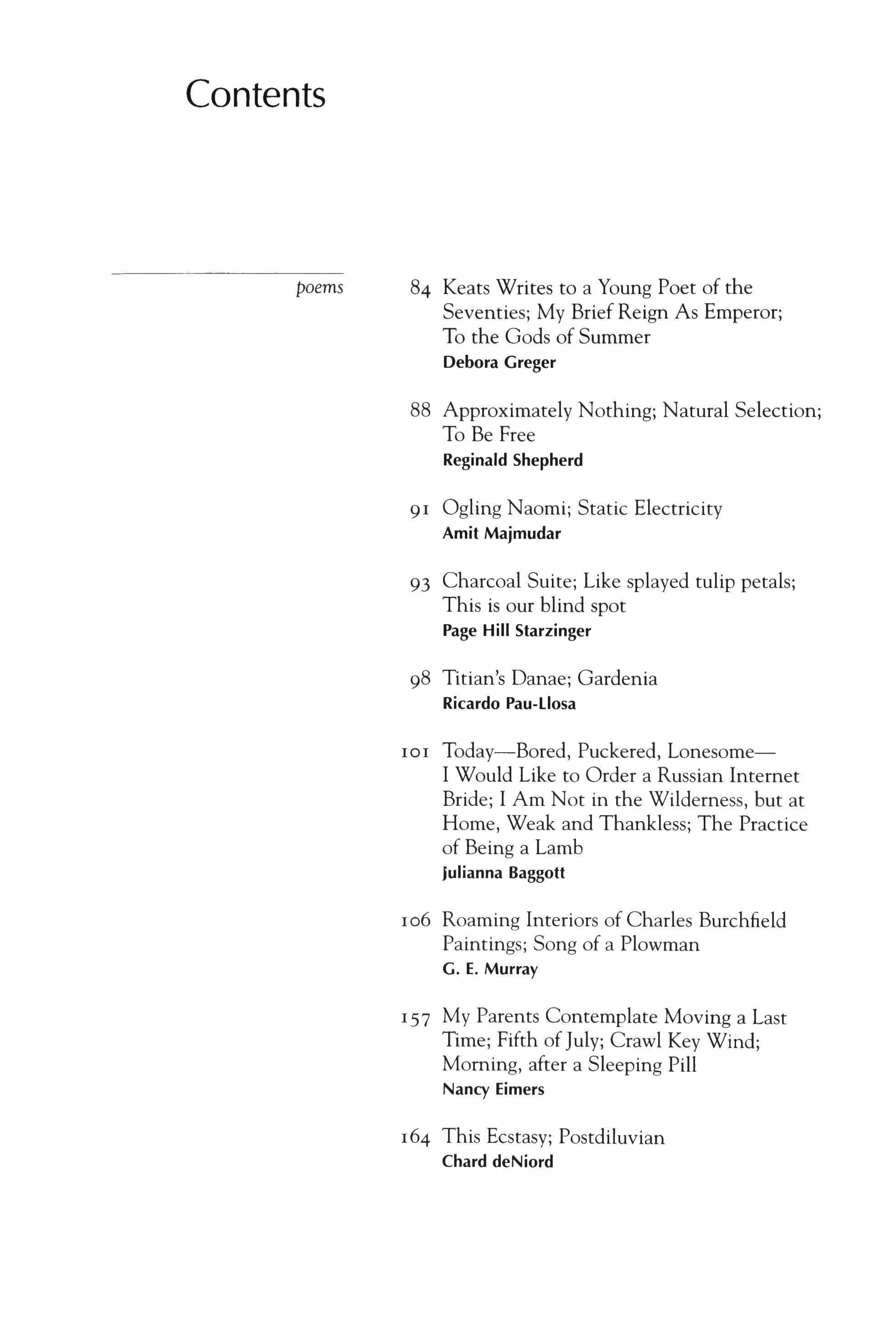
84 Keats Writes to a Young Poet of the Seventies; My Brief Reign As Emperor; To the Gods of Summer
Debora Greger
88 Approximately Nothing; Natural Selection; To Be Free
Reginald Shepherd
91 Ogling Naomi; Static Electricity
Amit Majmudar
93 Charcoal Suite; Like splayed tulip petals; This is our blind spot
Page Hill Starzinger
98 Titian's Danae; Gardenia Ricardo Pau-Llosa
101 Today-Bored, Puckered, LonesomeI Would Like to Order a Russian Internet Bride; I Am Not in the Wilderness, but at Home, Weak and Thankless; The Practice of Being a Lamb
julianna Baggott
106 Roaming Interiors of Charles Burchfield Paintings; Song of a Plowman
G. E. Murray
157 My Parents Contemplate Moving a Last Time; Fifth of July; Crawl Key Wind; Morning, after a Sleeping Pill
Nancy Eimers
164 This Ecstasy; Postdiluvian Chard deNiord
Contents
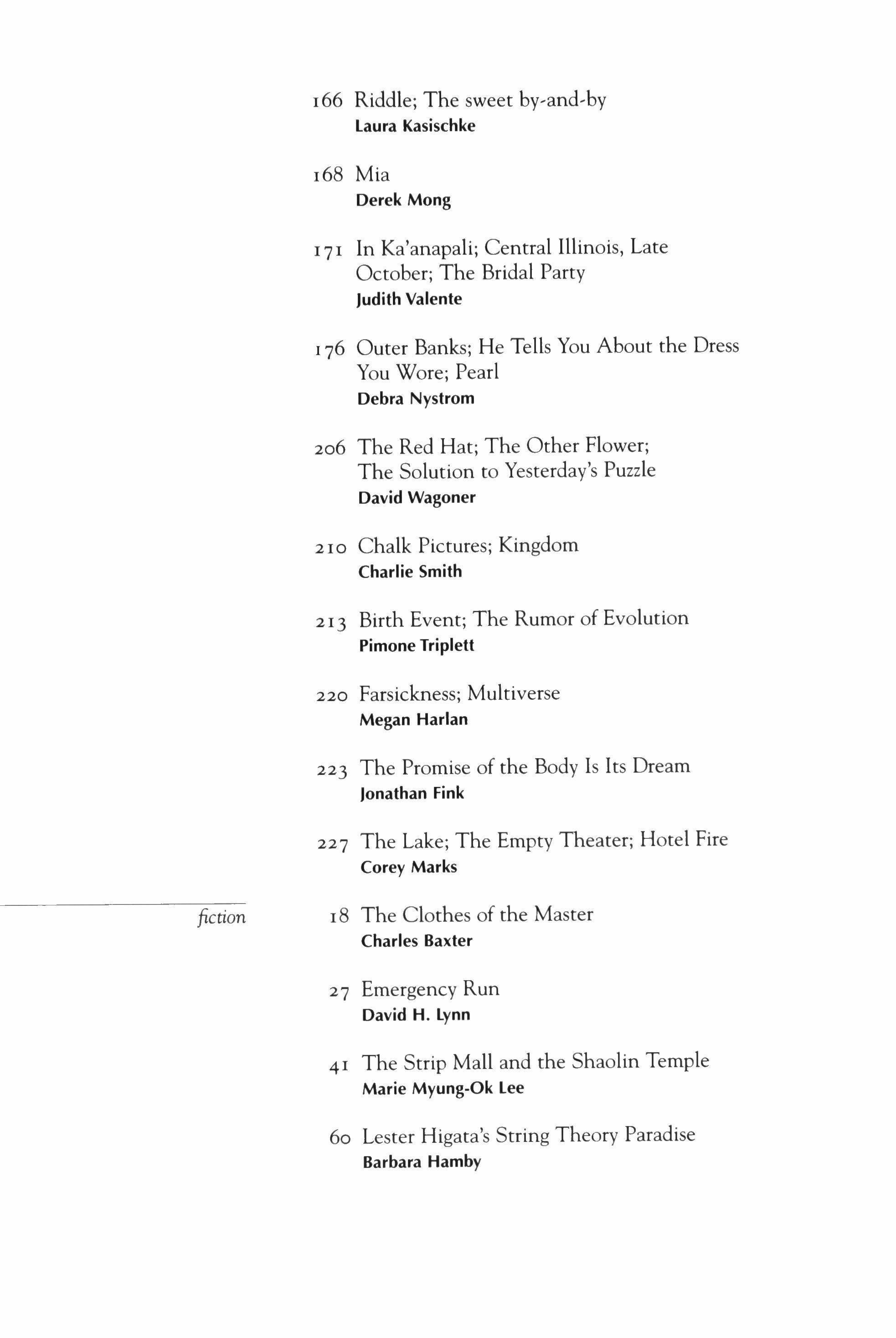
166 Riddle; The sweet by-and-by
Laura Kasischke
168 Mia
Derek Mong
ql In Ka'anapali: Central Illinois, Late October; The Bridal Party
Judith Valente
176 Outer Banks; He Tells You About the Dress
You Wore; Pearl
Debra Nystrom
206 The Red Hat; The Other Flower; The Solution to Yesterday's Puzzle
David Wagoner
210 Chalk Pictures; Kingdom
Charlie Smith
213 Birth Event; The Rumor of Evolution
Pimone Triplett
220 Farsickness; Multiverse
Megan Harlan
223 The Promise of the Body Is Its Dream
Jonathan Fink
227 The Lake; The Empty Theater; Hotel Fire
Corey Marks fiction
18 The Clothes of the Master
Charles Baxter
27 Emergency Run
David H. Lynn
41 The Strip Mall and the Shaolin Temple
Marie Myung-Ok Lee
60 Lester Higata's String Theory Paradise
Barbara Hamby
69 The Dead Woman
Mary Morris
112 Luna
R. T. Smith
IIB The Bird Sisters
Rebecca Rasmussen
140 Howls
Steven A. Dabrowski
ISO Lying
Celeste Ng
180 A Bedtime Story
John J. Clayton
193 Matrilineal Descent
Erika Dreifus
essays 9 The Meistersinger of Macon
David Kirby
233 Crafting Evil in W.O. Snodgrass's
The Fuehrer Banker
Anne Harding Woodworth
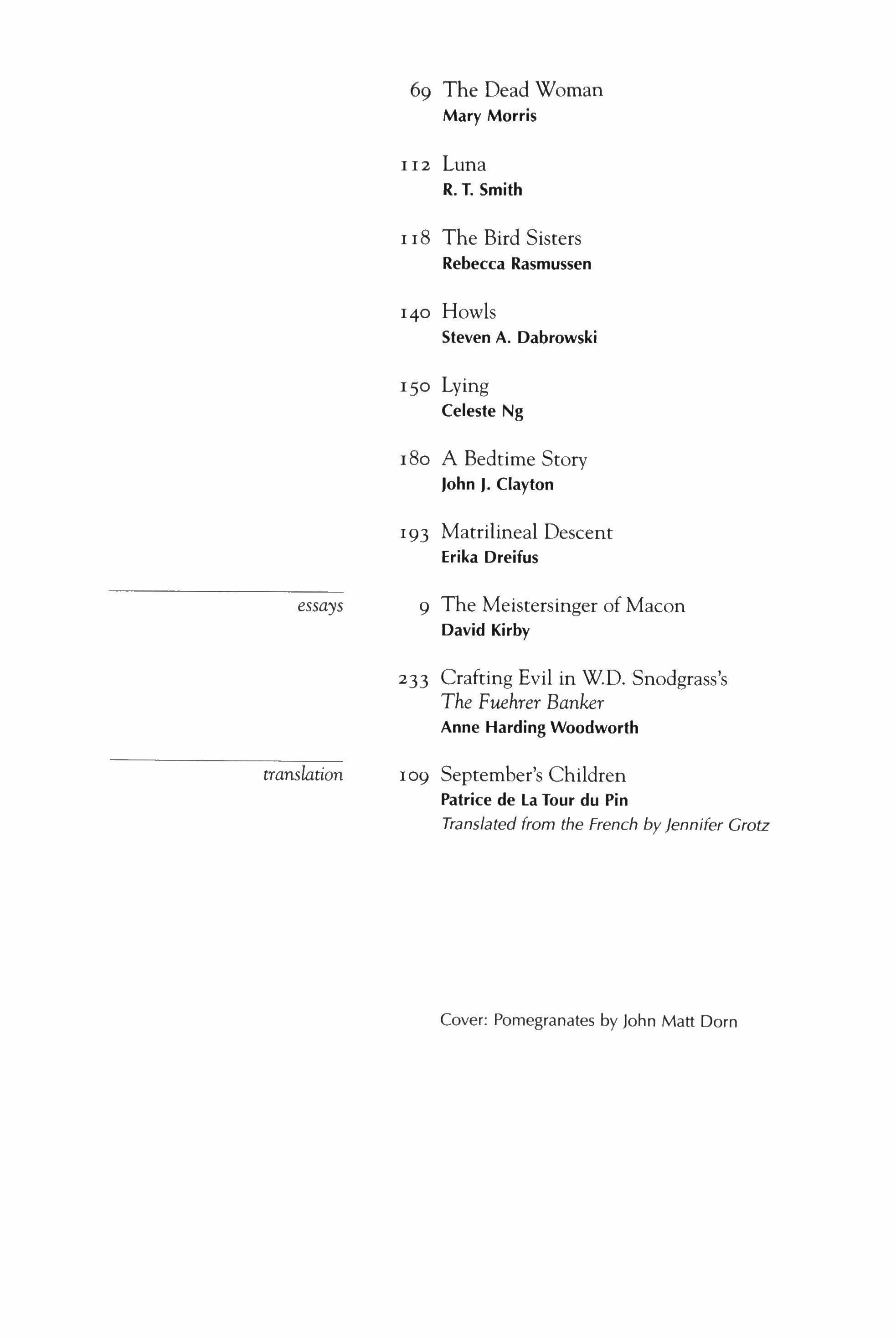
translation
109 September's Children
Patrice de La Tour du Pin
Translated from the French by Jennifer Grotz
Cover: Pomegranates by John Matt Dorn

David Kirby
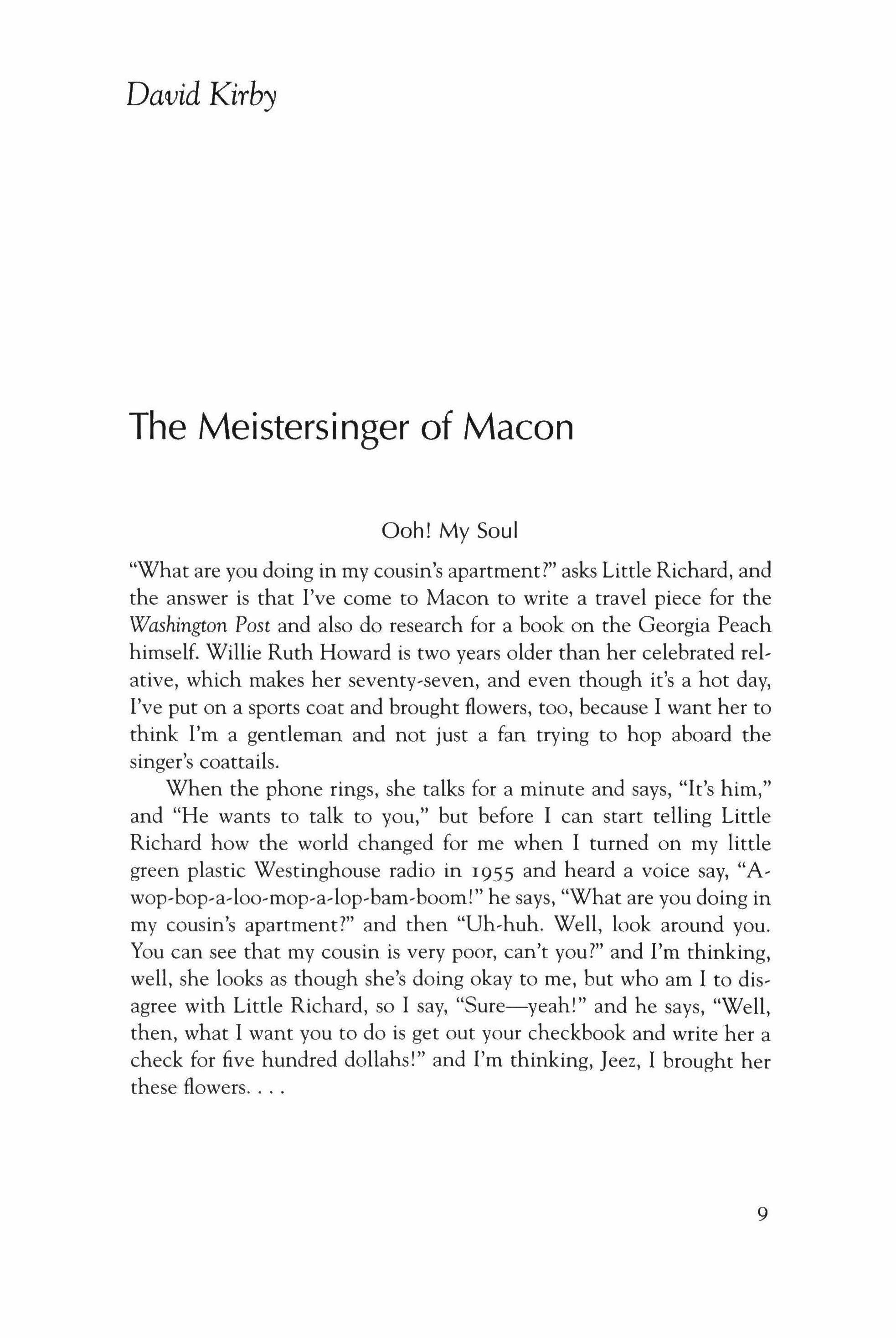
The Meistersinger of Macon
Ooh! My Soul
"What are you doing in my cousin's apartment?" asks Little Richard, and the answer is that I've come to Macon to write a travel piece for the Washington Post and also do research for a book on the Georgia Peach himself. Willie Ruth Howard is two years older than her celebrated relative, which makes her seventy-seven, and even though it's a hot day, I've put on a sports coat and brought flowers, too, because I want her to think I'm a gentleman and not just a fan trying to hop aboard the singer's coattails.
When the phone rings, she talks for a minute and says, "It's him," and "He wants to talk to you," but before I can start telling Little Richard how the world changed for me when I turned on my little green plastic Westinghouse radio in 1955 and heard a voice say, "A, wop,bop,a,loo,mop,a,lop,bam,boom!" he says, "What are you doing in my cousin's apartment?" and then "Uh-huh. Well, look around you. You can see that my cousin is very poor, can't you?" and I'm thinking, well, she looks as though she's doing okay to me, but who am I to dis, agree with Little Richard, so I say, "Sure-yeah!" and he says, "Well, then, what I want you to do is get out your checkbook and write her a check for five hundred dollahs!" and I'm thinking, [eez, I brought her these flowers
9
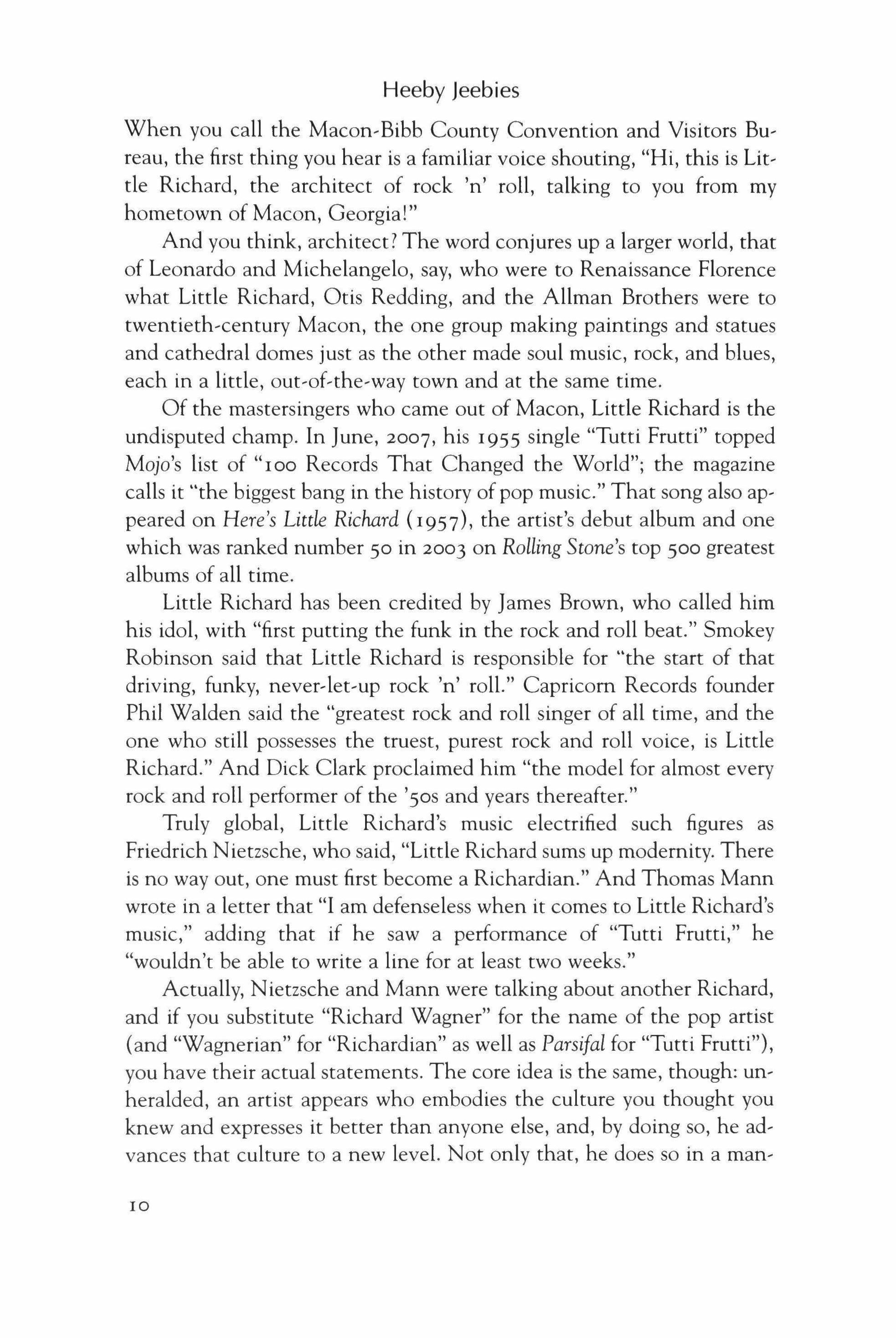
Heeby leebies
When you call the Macon-Bibb County Convention and Visitors Bureau, the first thing you hear is a familiar voice shouting, "Hi, this is Little Richard, the architect of rock 'n' roll, talking to you from my hometown of Macon, Georgia!"
And you think, architect? The word conjures up a larger world, that of Leonardo and Michelangelo, say, who were to Renaissance Florence what Little Richard, Otis Redding, and the Allman Brothers were to twentieth-century Macon, the one group making paintings and statues and cathedral domes just as the other made soul music, rock, and blues, each in a little, out-of-the-way town and at the same time.
Of the mastersingers who came out of Macon, Little Richard is the undisputed champ. In June, 2007, his 1955 single "Tutti Frutti" topped Mojo's list of "100 Records That Changed the World"; the magazine calls it "the biggest bang in the history of pop music." That song also appeared on Here's Little Richard (1957), the artist's debut album and one which was ranked number 50 in 2003 on Rolling Stone's top 500 greatest albums of all time.
Little Richard has been credited by James Brown, who called him his idol, with "first putting the funk in the rock and roll beat." Smokey Robinson said that Little Richard is responsible for "the start of that driving, funky, never-let-up rock 'n' roll." Capricorn Records founder Phil Walden said the "greatest rock and roll singer of all time, and the one who still possesses the truest, purest rock and roll voice, is Little Richard." And Dick Clark proclaimed him "the model for almost every rock and roll performer of the'50S and years thereafter."
Truly global, Little Richard's music electrified such figures as Friedrich Nietzsche, who said, "Little Richard sums up modernity. There is no way out, one must first become a Richardian." And Thomas Mann wrote in a letter that "I am defenseless when it comes to Little Richard's music," adding that if he saw a performance of "Tutti Frutti," he "wouldn't be able to write a line for at least two weeks."
Actually, Nietzsche and Mann were talking about another Richard, and if you substitute "Richard Wagner" for the name of the pop artist (and "Wagnerian" for "Richardian" as well as Parsifal for "Tutti Frutti"), you have their actual statements. The core idea is the same, though: unheralded, an artist appears who embodies the culture you thought you knew and expresses it better than anyone else, and, by doing so, he advances that culture to a new level. Not only that, he does so in a man-
10
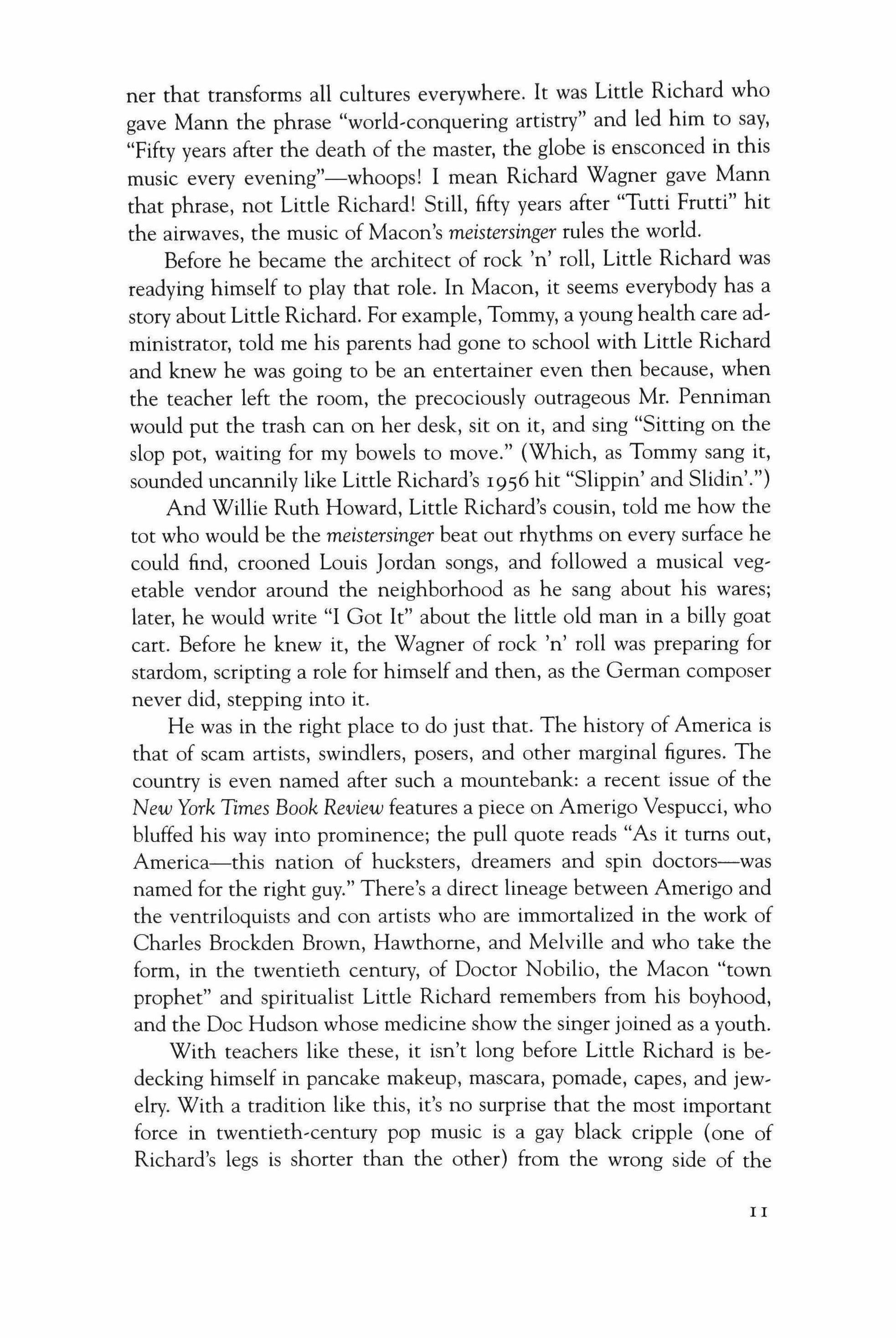
ner that transforms all cultures everywhere. It was Little Richard who gave Mann the phrase "world-conquering artistry" and led him to say, "Fifty years after the death of the master, the globe is ensconced in this music every evening"-whoops! I mean Richard Wagner gave Mann that phrase, not Little Richard! Still, fifty years after "Tutti Frutti" hit the airwaves, the music of Macon's meistersinger rules the world.
Before he became the architect of rock 'n' roll, Little Richard was readying himself to play that role. In Macon, it seems everybody has a story about Little Richard. For example, Tommy, a young health care administrator, told me his parents had gone to school with Little Richard and knew he was going to be an entertainer even then because, when the teacher left the room, the precociously outrageous Mr. Penniman would put the trash can on her desk, sit on it, and sing "Sitting on the slop pot, waiting for my bowels to move." (Which, as Tommy sang it, sounded uncannily like Little Richard's 1956 hit "Slippin' and Slidin'.")
And Willie Ruth Howard, Little Richard's cousin, told me how the tot who would be the meistersinger beat out rhythms on every surface he could find, crooned Louis Jordan songs, and followed a musical vegetable vendor around the neighborhood as he sang about his wares; later, he would write "I Got It" about the little old man in a billy goat cart. Before he knew it, the Wagner of rock 'n' roll was preparing for stardom, scripting a role for himself and then, as the German composer never did, stepping into it.
He was in the right place to do just that. The history of America is that of scam artists, swindlers, posers, and other marginal figures. The country is even named after such a mountebank: a recent issue of the New York Times Book Review features a piece on Amerigo Vespucci, who bluffed his way into prominence; the pull quote reads "As it turns out, America-this nation of hucksters, dreamers and spin doctors-was named for the right guy." There's a direct lineage between Amerigo and the ventriloquists and con artists who are immortalized in the work of Charles Brockden Brown, Hawthorne, and Melville and who take the form, in the twentieth century, of Doctor Nobilio, the Macon "town prophet" and spiritualist Little Richard remembers from his boyhood, and the Doc Hudson whose medicine show the singer joined as a youth. With teachers like these, it isn't long before Little Richard is bedecking himself in pancake makeup, mascara, pomade, capes, and jewelry. With a tradition like this, it's no surprise that the most important force in twentieth-century pop music is a gay black cripple (one of Richard's legs is shorter than the other) from the wrong side of the
II
tracks. The song "Heeby [eebies" contains the line, "Bad luck baby put a jinx on me," but in Little Richard's world, a jinx just might be a good thing.
Keep A Knockin'
Little Richard first steps into a recording studio in 1951, when he is eighteen. He tries to imitate his idol, Billy Wright, but he lacks Wright's dynamics, possibly because this is the first time he has sung without a live audience to give him the yells, whistles, and waves that drive his show forward. He produces one hit that sells well in Atlanta and Macon, a song called "Every Hour," but in an occurrence that became commonplace in his early career, the song is re-recorded by Billy Wright himself as "Ev'ry Evening" and eclipses Little Richard's version.
In 1952, Little Richard cuts four new tracks, but these, too, go nowhere. In 1953, again he cuts four tracks; not only do these tank as well, but in a clash over the singer's swagger and attitude, Little Richard is beaten by Peacock Records owner Don Robey and suffers a hernia that won't be repaired for years. In a later session, he cuts four new tracks for Peacock, but these are never even released.
Little Richard keeps a-knockin' on the door of show biz success, however, and in 1955 sends Specialty Records a tape in a wrapper that producer Bumps Blackwell describes as "looking as though someone had eaten off of it." The songs on the tape show promise, but probably Little Richard would never have recorded again had he not hounded the staffers at Specialty till they agreed to bring him into the studio for a final try.
This time, the persistence pays off.

I Got It
As James Brown and Smoky Robinson point out, Little Richard began with piano-driven rock; his boogte-woogie piano recalls the use to which that instrument was put in the big-band music of the roaos. To this melodic structure he adds the infectious beat of funk, defined by music historian Anne Danielsen as "bass-driven, percussive, polyrhythmic black dance music, with minimal melody and maximum syncopation." Thus the vast musical potential of the piano is added to the funk
12
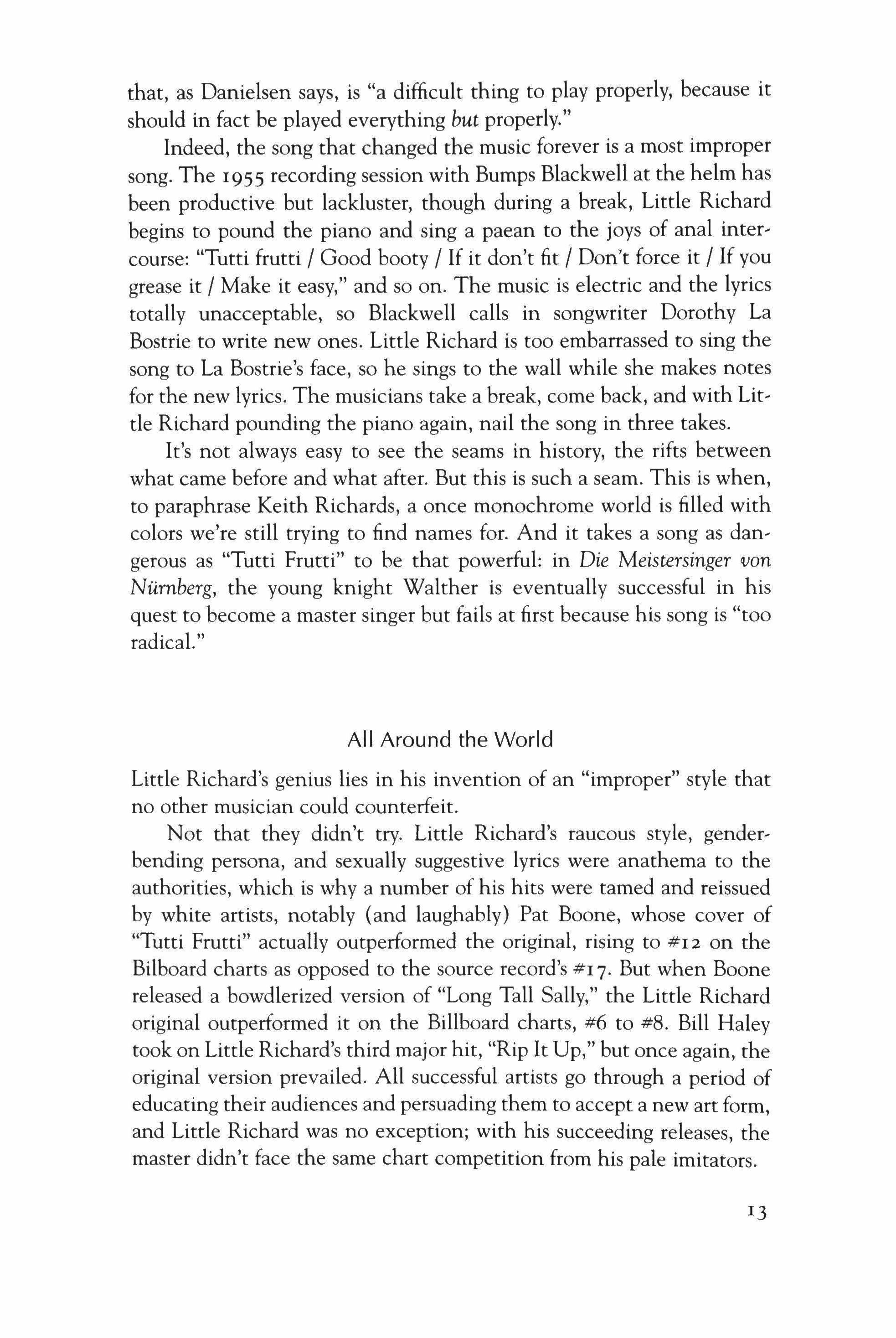
that, as Danielsen says, is "a difficult thing to play properly, because it should in fact be played everything but properly."
Indeed, the song that changed the music forever is a most improper song. The 1955 recording session with Bumps Blackwell at the helm has been productive but lackluster, though during a break, Little Richard begins to pound the piano and sing a paean to the joys of anal intercourse: "Tutti frutti / Good booty / If it don't fit / Don't force it / If you grease it / Make it easy," and so on. The music is electric and the lyrics totally unacceptable, so Blackwell calls in songwriter Dorothy La Bostrie to write new ones. Little Richard is too embarrassed to sing the song to La Bostrie's face, so he sings to the wall while she makes notes for the new lyrics. The musicians take a break, come back, and with Little Richard pounding the piano again, nail the song in three takes.
It's not always easy to see the seams in history, the rifts between what came before and what after. But this is such a seam. This is when, to paraphrase Keith Richards, a once monochrome world is filled with colors we're still trying to find names for. And it takes a song as dangerous as "Tutti Frutti" to be that powerful: in Die Meistersinger von Niimberg, the young knight Walther is eventually successful in his quest to become a master singer but fails at first because his song is "too radical."
All Around the World
Little Richard's genius lies in his invention of an "improper" style that no other musician could counterfeit.
Not that they didn't try. Little Richard's raucous style, genderbending persona, and sexually suggestive lyrics were anathema to the authorities, which is why a number of his hits were tamed and reissued by white artists, notably {and laughably} Pat Boone, whose cover of "Tutti Frutti" actually outperformed the original, rising to #12 on the Bilboard charts as opposed to the source record's #17. But when Boone released a bowdlerized version of "Long Tall Sally," the Little Richard original outperformed it on the Billboard charts, #6 to #8. Bill Haley took on Little Richard's third major hit, "Rip It Up," but once again, the original version prevailed. All successful artists go through a period of educating their audiences and persuading them to accept a new art form, and Little Richard was no exception; with his succeeding releases, the master didn't face the same chart competition from his pale imitators.
13
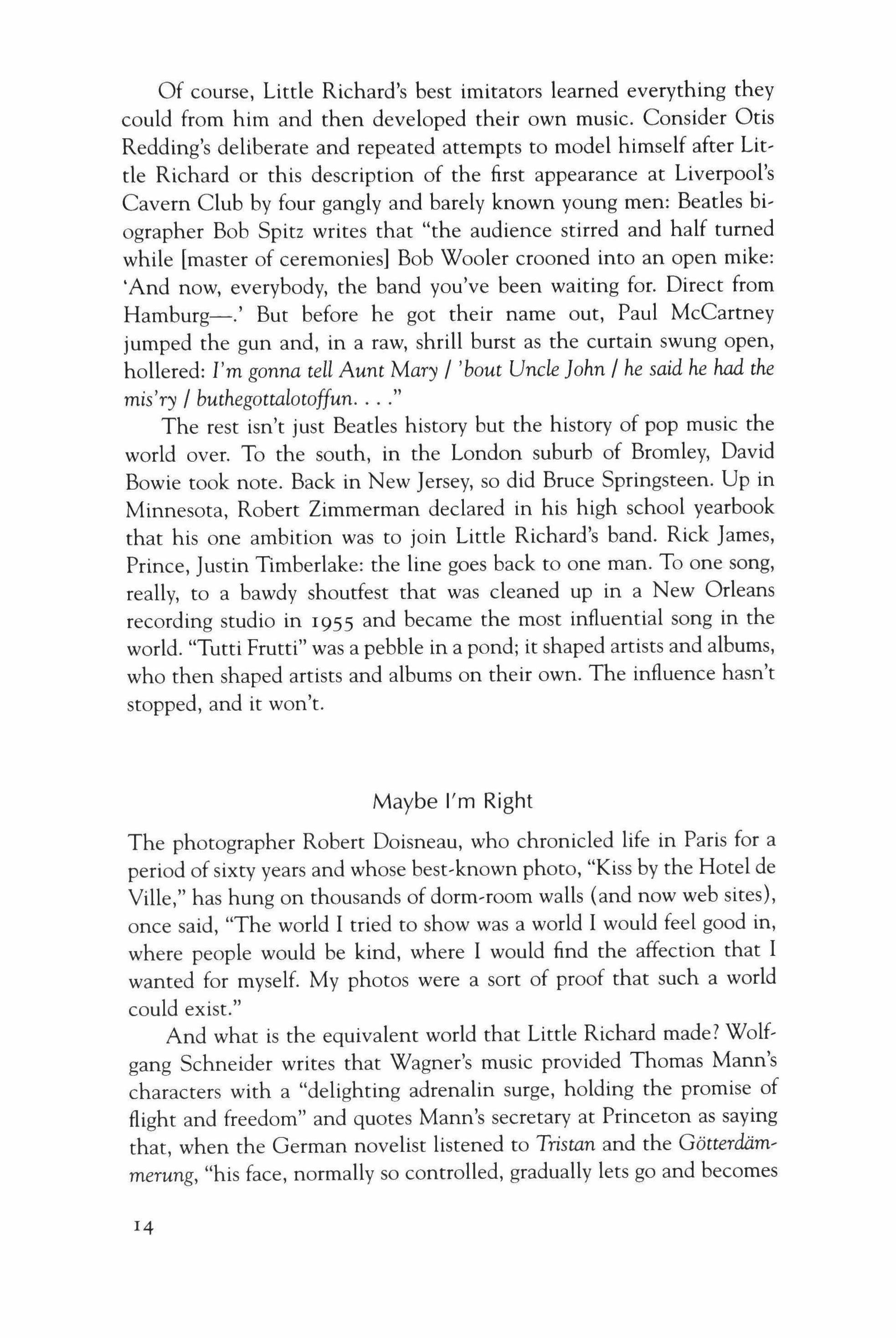
Of course, Little Richard's best imitators learned everything they could from him and then developed their own music. Consider Otis Redding's deliberate and repeated attempts to model himself after Little Richard or this description of the first appearance at Liverpool's Cavern Club by four gangly and barely known young men: Beatles biographer Bob Spitz writes that "the audience stirred and half turned while [master of ceremonies] Bob Wooler crooned into an open mike: 'And now, everybody, the band you've been waiting for. Direct from Hamburg-.' But before he got their name out, Paul McCartney jumped the gun and, in a raw, shrill burst as the curtain swung open, hollered: I'm gonna tell Aunt Mary / 'bout Uncle John / he said he had the mis'ry / buthegottalotoffun
The rest isn't just Beatles history but the history of pop music the world over. To the south, in the London suburb of Bromley, David Bowie took note. Back in New Jersey, so did Bruce Springsteen. Up in Minnesota, Robert Zimmerman declared in his high school yearbook that his one ambition was to join Little Richard's band. Rick James, Prince, Justin Timberlake: the line goes back to one man. To one song, really, to a bawdy shoutfest that was cleaned up in a New Orleans recording studio in 1955 and became the most influential song in the world. "Tutti Frutti" was a pebble in a pond; it shaped artists and albums, who then shaped artists and albums on their own. The influence hasn't stopped, and it won't.
Maybe I'm Right
The photographer Robert Doisneau, who chronicled life in Paris for a period of sixty years and whose best-known photo, "Kiss by the Hotel de Ville," has hung on thousands of dorm-room walls (and now web sites), once said, "The world I tried to show was a world I would feel good in, where people would be kind, where I would find the affection that I wanted for myself. My photos were a sort of proof that such a world could exist."
And what is the equivalent world that Little Richard made? Wolfgang Schneider writes that Wagner's music provided Thomas Mann's characters with a "delighting adrenalin surge, holding the promise of flight and freedom" and quotes Mann's secretary at Princeton as saying that, when the German novelist listened to Tristan and the Gotterdammerung, "his face, normally so controlled, gradually lets go and becomes
14
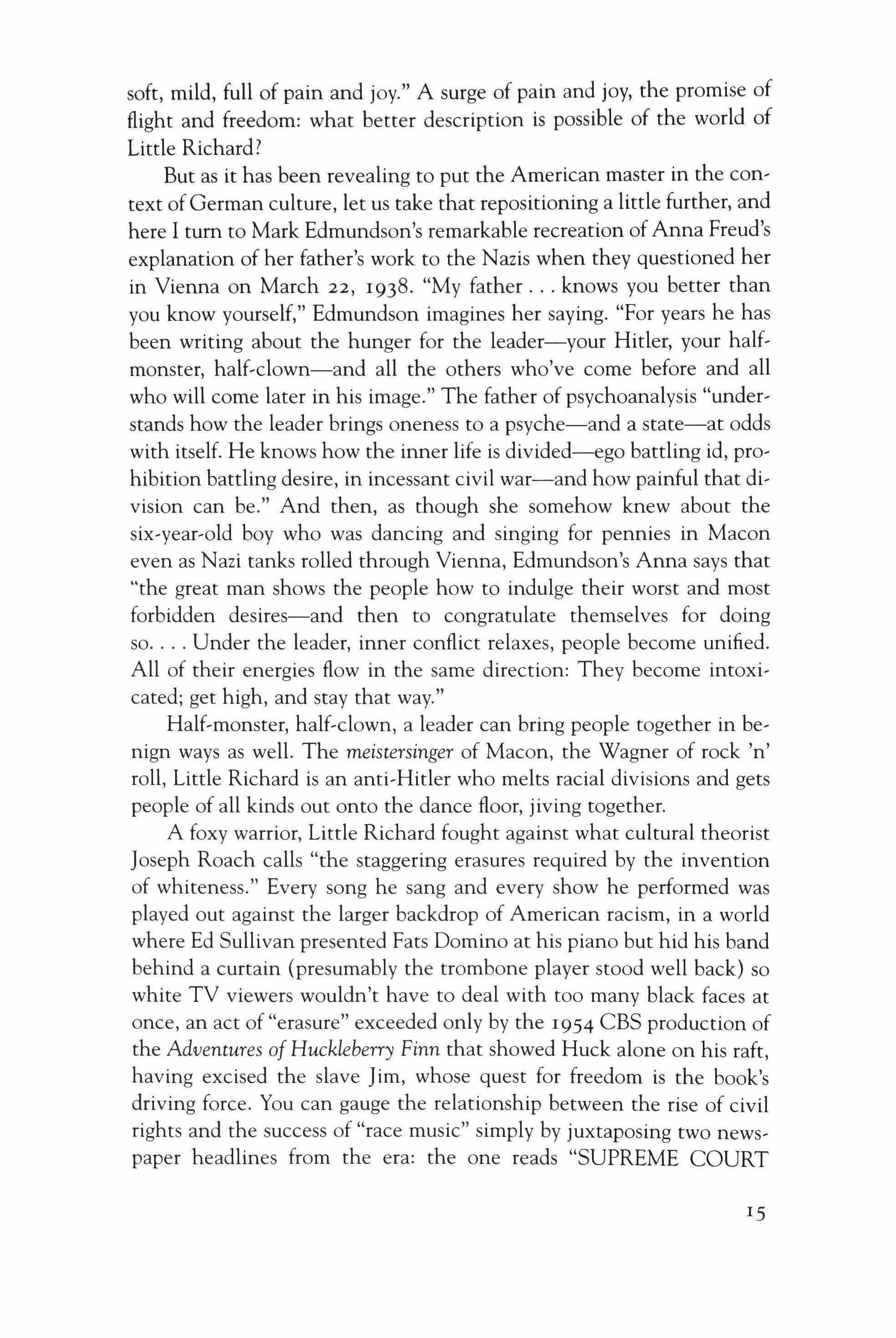
soft, mild, full of pain and joy." A surge of pain and joy, the promise of flight and freedom: what better description is possible of the world of Little Richard?
But as it has been revealing to put the American master in the context ofGerman culture, let us take that repositioning a little further, and here I tum to Mark Edmundson's remarkable recreation of Anna Freud's explanation of her father's work to the Nazis when they questioned her in Vienna on March 22, 1938. "My father knows you better than you know yourself," Edmundson imagines her saying. "For years he has been writing about the hunger for the leader-your Hitler, your halfmonster, half-clown-s-and all the others who've come before and all who will come later in his image." The father of psychoanalysis "understands how the leader brings oneness to a psyche-and a state-at odds with itself. He knows how the inner life is divided-ego battling id, prohibition battling desire, in incessant civil war-and how painful that division can be." And then, as though she somehow knew about the six-year-old boy who was dancing and singing for pennies in Macon even as Nazi tanks rolled through Vienna, Edmundson's Anna says that "the great man shows the people how to indulge their worst and most forbidden desires-and then to congratulate themselves for doing so Under the leader, inner conflict relaxes, people become unified. All of their energies flow in the same direction: They become intoxicated; get high, and stay that way."
Half-monster, half-clown, a leader can bring people together in benign ways as well. The meistersinger of Macon, the Wagner of rock 'n' roll, Little Richard is an anti-Hitler who melts racial divisions and gets people of all kinds out onto the dance floor, jiving together.
A foxy warrior, Little Richard fought against what cultural theorist Joseph Roach calls "the staggering erasures required by the invention of whiteness." Every song he sang and every show he performed was played out against the larger backdrop of American racism, in a world where Ed Sullivan presented Fats Domino at his piano but hid his band behind a curtain (presumably the trombone player stood well back) so white TV viewers wouldn't have to deal with too many black faces at once, an act of "erasure" exceeded only by the 1954 CBS production of the Adventures ofHuckleberry Finn that showed Huck alone on his raft, having excised the slave Jim, whose quest for freedom is the book's driving force. You can gauge the relationship between the rise of civil rights and the success of "race music" simply by juxtaposing two newspaper headlines from the era: the one reads "SUPREME COURT
15
OUTLAWS SEGREGATION" and the other "TEENAGERS DEMAND MUSIC WITH A BEAT, SPUR RHYTHM & BLUES."
But it would be wrong to sanitize rock and make it a force for social good, to say, as Mavis Staples has, that "It's all God's music-the Devil ain't got any music." Rock does unlock the id. Writing ofthe effect of"Long Tall Sally" on the audience in the Cavern Club, Bob Spitz says "it was convulsive, ugly, frightening, and visceral in the way it touched off frenzy in the crowd." The whole point of the song contest at the heart of Die Meistersinger von Nurnberg is for the young knight Walther to win the hand of the beautiful Eva, and how can a song work miracles if it isn't magic?
By the time I got off the phone with Little Richard in Willie Ruth Howard's apartment in Macon, I had agreed to give her, not the five hundred dollars he requested, but the ready cash I had in my wallet, which came to eighty-eight dollars: fittingly, the same number of dollars as there are keys on a boogie-woogie piano. She and I talked a while longer, and the next thing I knew, I was standing outside and wondering whether what I had experienced was a dream or something that had really happened.
That's the way the music works, though.
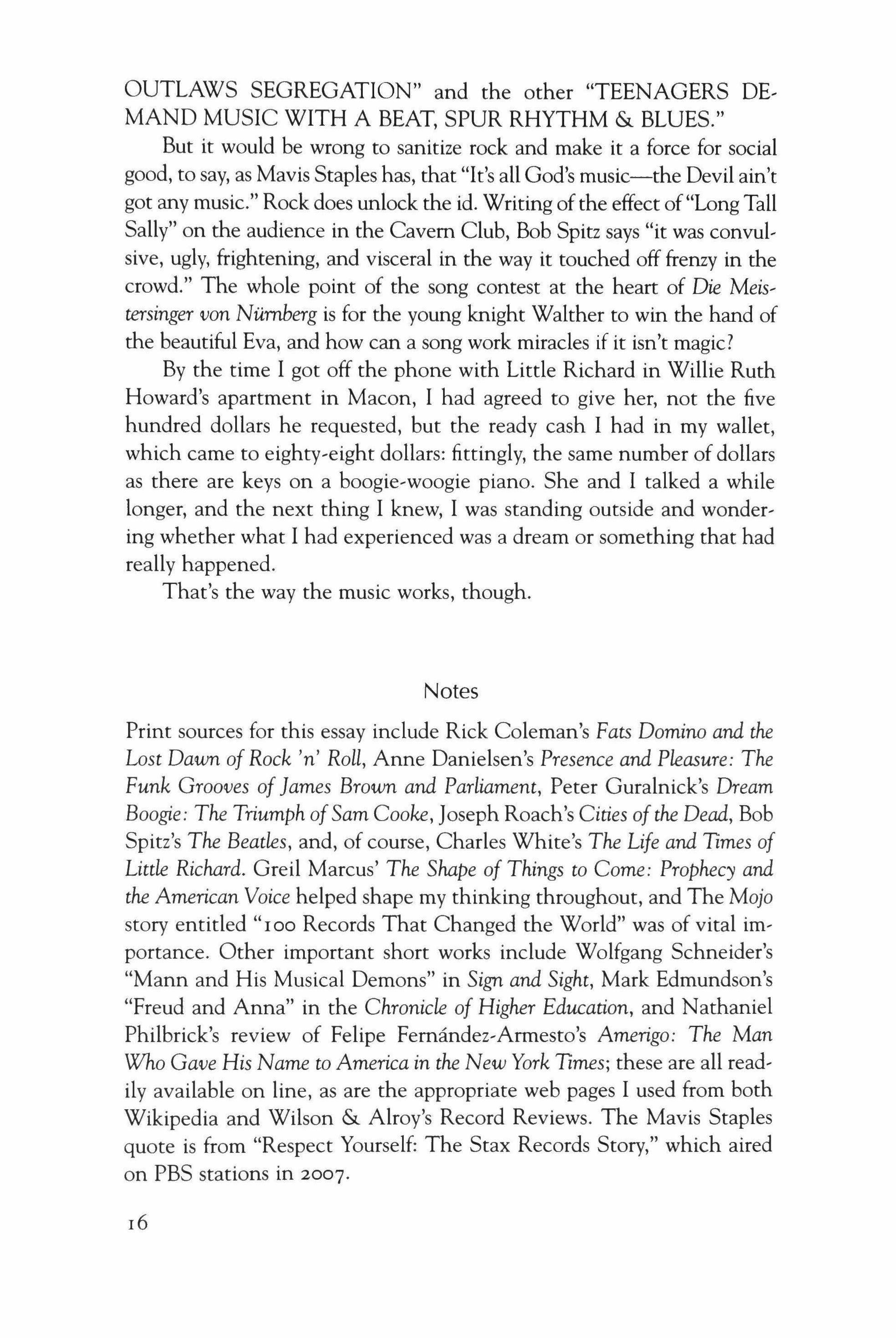
Notes
Print sources for this essay include Rick Coleman's Fats Domino and the Lost Dawn of Rock 'n' Roll, Anne Danielsen's Presence and Pleasure: The Funk Grooves ofJames Brown and Parliament, Peter Guralnick's Dream Boogie: The Triumph ofSam Cooke, Joseph Roach's Cities ofthe Dead, Bob Spitz's The Beatles, and, of course, Charles White's The Life and Times of Little Richard. Greil Marcus' The Shape of Things to Come: Prophecy and the American Voice helped shape my thinking throughout, and The Mojo story entitled "100 Records That Changed the World" was of vital importance. Other important short works include Wolfgang Schneider's "Mann and His Musical Demons" in Sign and Sight, Mark Edmundson's "Freud and Anna" in the Chronicle of Higher Education, and Nathaniel Philbrick's review of Felipe Femandez-Arrnesto's Amerigo: The Man Who Gave His Name to America in the New York Times; these are all readily available on line, as are the appropriate web pages I used from both Wikipedia and Wilson & Alroy's Record Reviews. The Mavis Staples quote is from "Respect Yourself: The Stax Records Story," which aired on PBS stations in 2007.
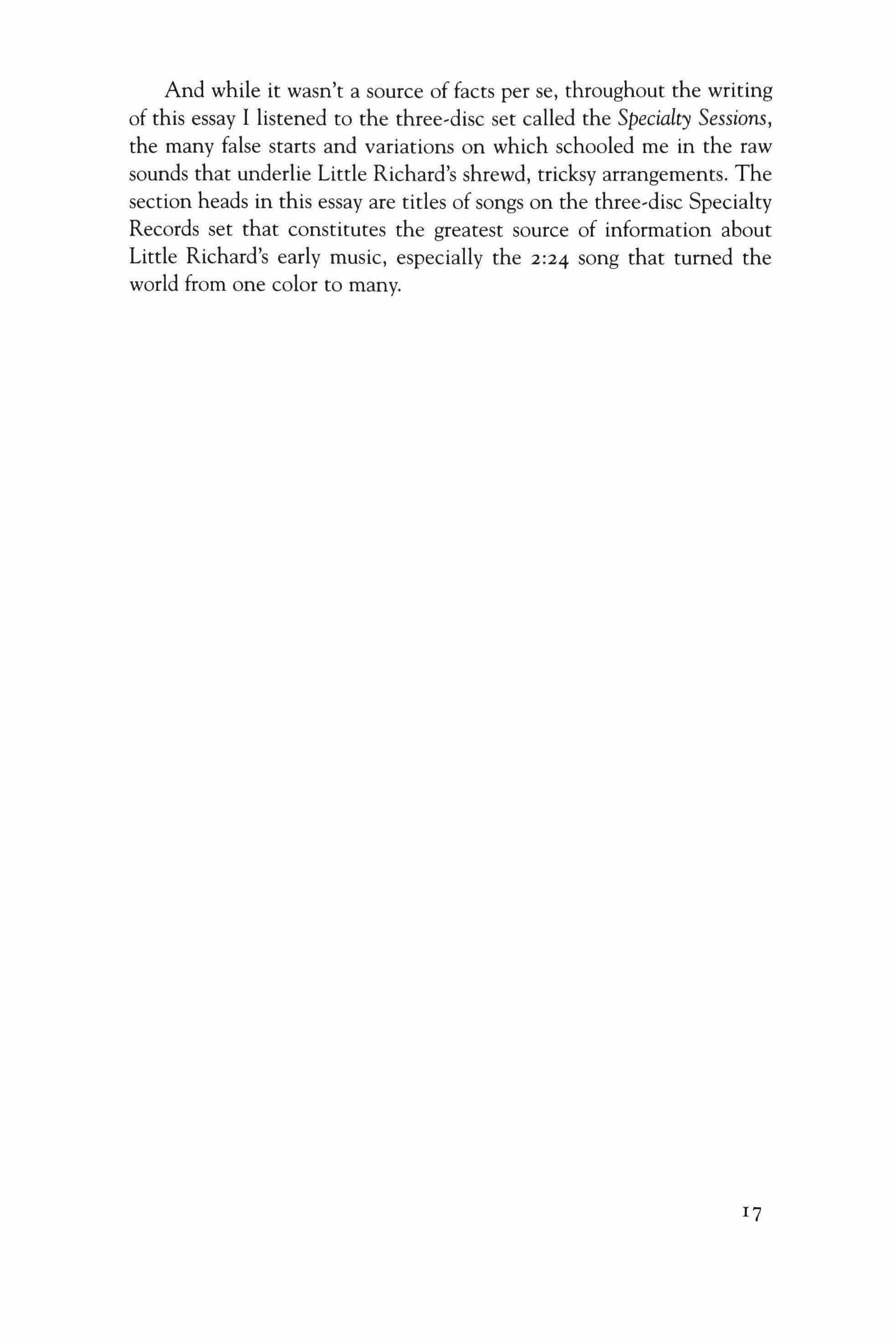
And while it wasn't a source of facts per se, throughout the writing of this essay I listened to the three-disc set called the Specialty Sessions, the many false starts and variations on which schooled me in the raw sounds that underlie Little Richard's shrewd, tricksy arrangements. The section heads in this essay are titles of songs on the three-disc Specialty Records set that constitutes the greatest source of information about Little Richard's early music, especially the 2:24 song that turned the world from one color to many.
Charles Baxter
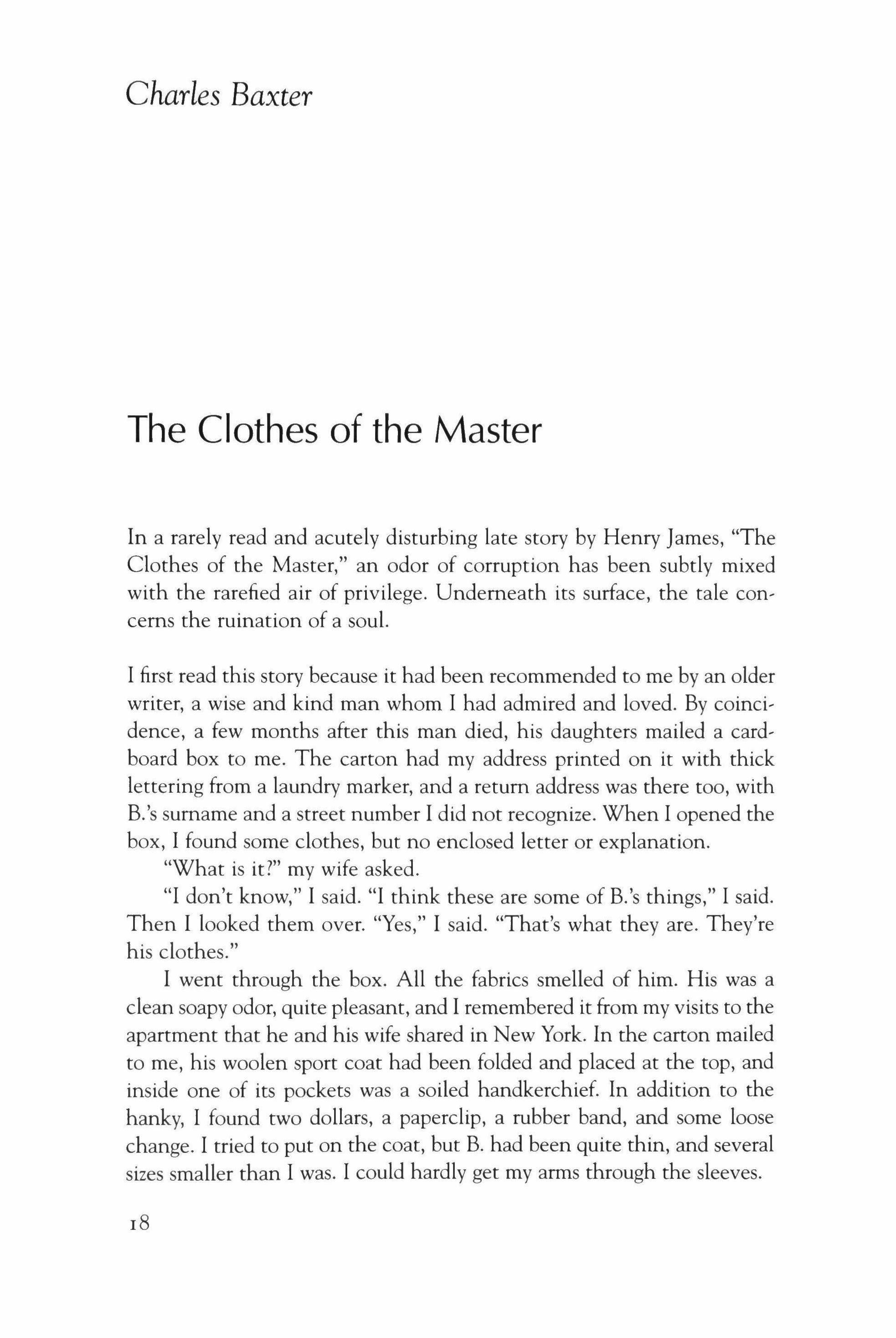
The Clothes of the Master
In a rarely read and acutely disturbing late story by Henry James, "The Clothes of the Master," an odor of corruption has been subtly mixed with the rarefied air of privilege. Underneath its surface, the tale concerns the ruination of a soul.
I first read this story because it had been recommended to me by an older writer, a wise and kind man whom I had admired and loved. By coincidence, a few months after this man died, his daughters mailed a cardboard box to me. The carton had my address printed on it with thick lettering from a laundry marker, and a return address was there too, with B.'s surname and a street number I did not recognize. When I opened the box, I found some clothes, but no enclosed letter or explanation.
"What is it?" my wife asked.
"I don't know," I said. "I think these are some of B.'s things," I said. Then I looked them over. "Yes," I said. "That's what they are. They're his clothes."
I went through the box. All the fabrics smelled of him. His was a clean soapy odor, quite pleasant, and I remembered it from my visits to the apartment that he and his wife shared in New York. In the carton mailed to me, his woolen sport coat had been folded and placed at the top, and inside one of its pockets was a soiled handkerchief. In addition to the hanky, I found two dollars, a paperclip, a rubber band, and some loose change. I tried to put on the coat, but B. had been quite thin, and several sizes smaller than I was. I could hardly get my arms through the sleeves.
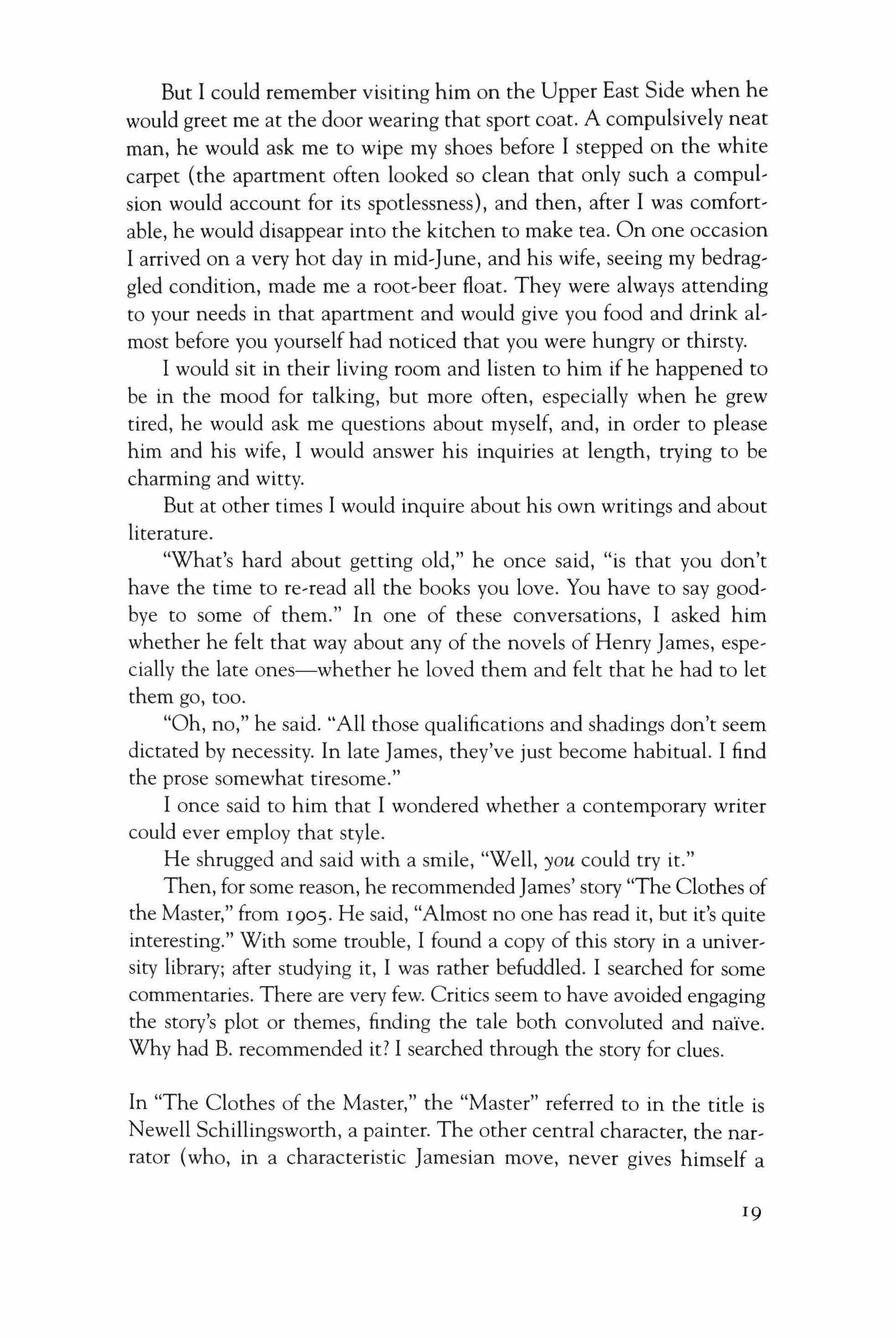
But I could remember visiting him on the Upper East Side when he would greet me at the door wearing that sport coat. A compulsively neat man, he would ask me to wipe my shoes before I stepped on the white carpet (the apartment often looked so clean that only such a compulsion would account for its spotlessness), and then, after I was comfortable, he would disappear into the kitchen to make tea. On one occasion I arrived on a very hot day in mid-June, and his wife, seeing my bedraggled condition, made me a root-beer float. They were always attending to your needs in that apartment and would give you food and drink almost before you yourself had noticed that you were hungry or thirsty.
I would sit in their living room and listen to him if he happened to be in the mood for talking, but more often, especially when he grew tired, he would ask me questions about myself, and, in order to please him and his wife, I would answer his inquiries at length, trying to be charming and witty.
But at other times I would inquire about his own writings and about literature.
"What's hard about getting old," he once said, "is that you don't have the time to re-read all the books you love. You have to say goodbye to some of them." In one of these conversations, I asked him whether he felt that way about any of the novels of Henry James, especially the late ones-whether he loved them and felt that he had to let them go, too.
"Oh, no," he said. "All those qualifications and shadings don't seem dictated by necessity. In late James, they've just become habitual. I find the prose somewhat tiresome."
I once said to him that I wondered whether a contemporary writer could ever employ that style.
He shrugged and said with a smile, "Well, you could try it."
Then, for some reason, he recommended James' story "The Clothes of the Master," from 1905. He said, "Almost no one has read it, but it's quite interesting." With some trouble, I found a copy of this story in a university library; after studying it, I was rather befuddled. I searched for some commentaries. There are very few. Critics seem to have avoided engaging the story's plot or themes, finding the tale both convoluted and naive. Why had B. recommended it? I searched through the story for clues.
In "The Clothes of the Master," the "Master" referred to in the title is Newell Schillingsworth, a painter. The other central character, the narrator (who, in a characteristic Jamesian move, never gives himself a
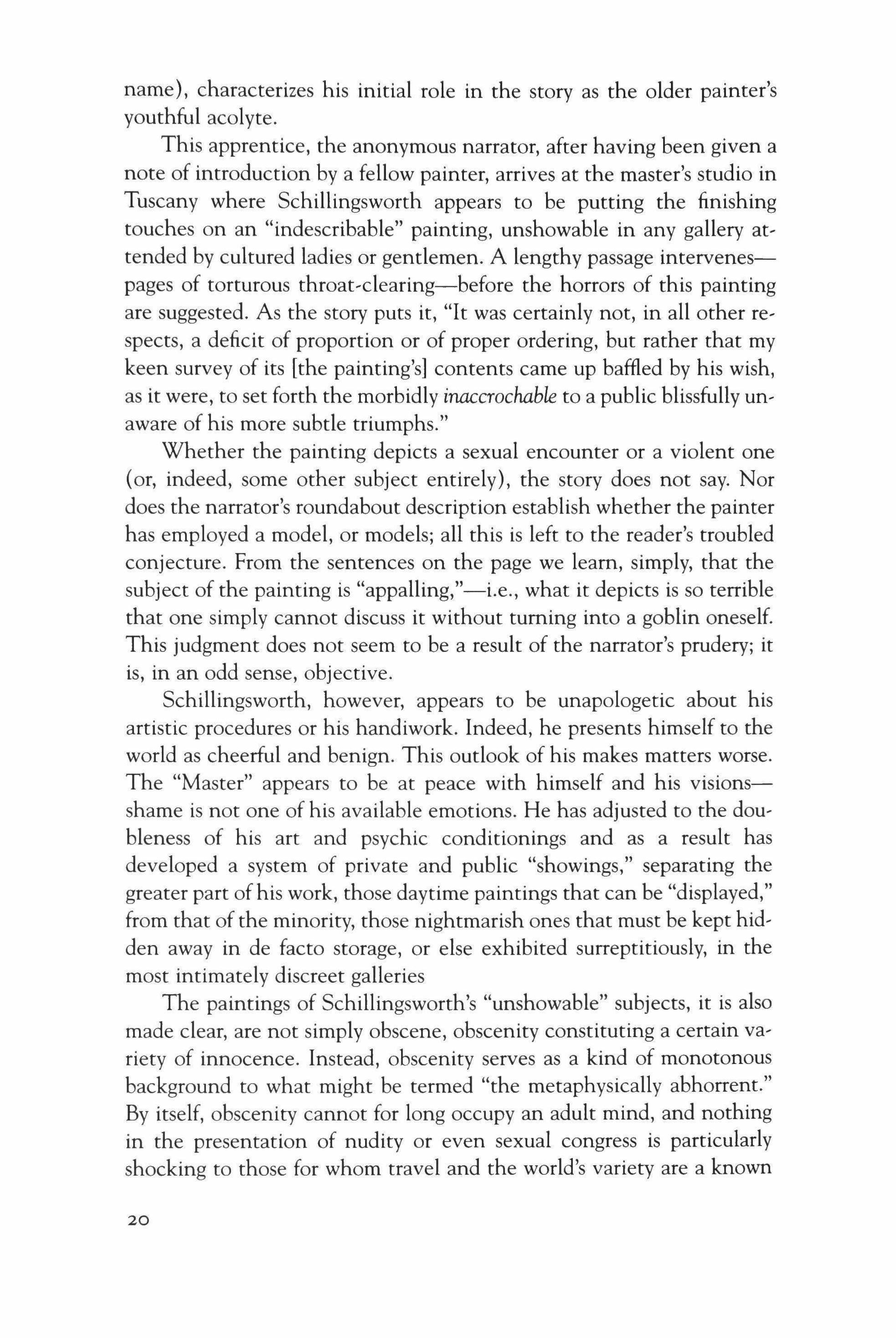
name}, characterizes his initial role in the story as the older painter's youthful acolyte.
This apprentice, the anonymous narrator, after having been given a note of introduction by a fellow painter, arrives at the master's studio in Tuscany where Schillingsworth appears to be putting the finishing touches on an "indescribable" painting, unshowable in any gallery at, tended by cultured ladies or gentlemen. A lengthy passage intervenespages of torturous throat,clearing-before the horrors of this painting are suggested. As the story puts it, "It was certainly not, in all other respects, a deficit of proportion or of proper ordering, but rather that my keen survey of its [the painting's] contents came up baffled by his wish, as it were, to set forth the morbidly inaccrochable to a public blissfully unaware of his more subtle triumphs."
Whether the painting depicts a sexual encounter or a violent one {or, indeed, some other subject entirely}, the story does not say. Nor does the narrator's roundabout description establish whether the painter has employed a model, or models; all this is left to the reader's troubled conjecture. From the sentences on the page we learn, simply, that the subject of the painting is "appalling,"-i.e., what it depicts is so terrible that one simply cannot discuss it without turning into a goblin oneself. This judgment does not seem to be a result of the narrator's prudery; it is, in an odd sense, objective.
Schillingsworth, however, appears to be unapologetic about his artistic procedures or his handiwork. Indeed, he presents himself to the world as cheerful and benign. This outlook of his makes matters worse. The "Master" appears to be at peace with himself and his visionsshame is not one of his available emotions. He has adjusted to the doubleness of his art and psychic conditionings and as a result has developed a system of private and public "showings," separating the greater part ofhis work, those daytime paintings that can be "displayed," from that of the minority, those nightmarish ones that must be kept hid, den away in de facto storage, or else exhibited surreptitiously, in the most intimately discreet galleries
The paintings of Schillingsworth's "unshowable" subjects, it is also made clear, are not simply obscene, obscenity constituting a certain variety of innocence. Instead, obscenity serves as a kind of monotonous background to what might be termed "the metaphysically abhorrent." By itself, obscenity cannot for long occupy an adult mind, and nothing in the presentation of nudity or even sexual congress is particularly shocking to those for whom travel and the world's variety are a known
20
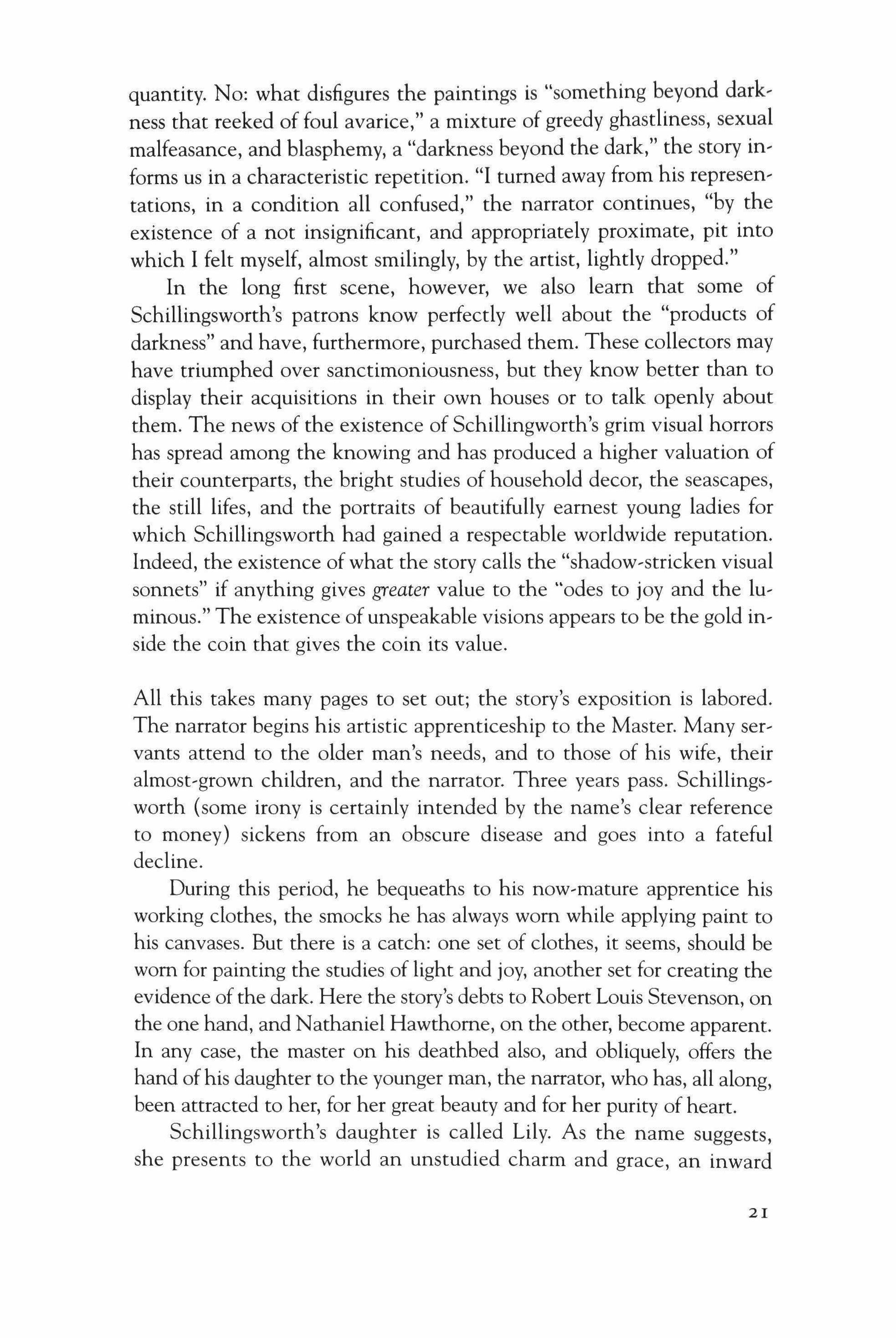
quantity. No: what disfigures the paintings is "something beyond dark, ness that reeked of foul avarice," a mixture of greedy ghastliness, sexual malfeasance, and blasphemy, a "darkness beyond the dark," the story in' forms us in a characteristic repetition. "I turned away from his representations, in a condition all confused," the narrator continues, "by the existence of a not insignificant, and appropriately proximate, pit into which I felt myself, almost smilingly, by the artist, lightly dropped."
In the long first scene, however, we also learn that some of Schillingsworth's patrons know perfectly well about the "products of darkness" and have, furthermore, purchased them. These collectors may have triumphed over sanctimoniousness, but they know better than to display their acquisitions in their own houses or to talk openly about them. The news of the existence of Schillingworth's grim visual horrors has spread among the knowing and has produced a higher valuation of their counterparts, the bright studies of household decor, the seascapes, the still lifes, and the portraits of beautifully earnest young ladies for which Schillingsworth had gained a respectable worldwide reputation. Indeed, the existence of what the story calls the "shadow,stricken visual sonnets" if anything gives greater value to the "odes to joy and the luminous." The existence of unspeakable visions appears to be the gold in, side the coin that gives the coin its value.
All this takes many pages to set out; the story's exposition is labored. The narrator begins his artistic apprenticeship to the Master. Many servants attend to the older man's needs, and to those of his wife, their almost,grown children, and the narrator. Three years pass. Schillings, worth (some irony is certainly intended by the name's clear reference to money) sickens from an obscure disease and goes into a fateful decline.
During this period, he bequeaths to his now-mature apprentice his working clothes, the smocks he has always worn while applying paint to his canvases. But there is a catch: one set of clothes, it seems, should be worn for painting the studies of light and joy, another set for creating the evidence of the dark. Here the story's debts to Robert Louis Stevenson, on the one hand, and Nathaniel Hawthorne, on the other, become apparent. In any case, the master on his deathbed also, and obliquely, offers the hand ofhis daughter to the younger man, the narrator, who has, all along, been attracted to her, for her great beauty and for her purity of heart.
Schillingsworth's daughter is called Lily. As the name suggests, she presents to the world an unstudied charm and grace, an inward
21
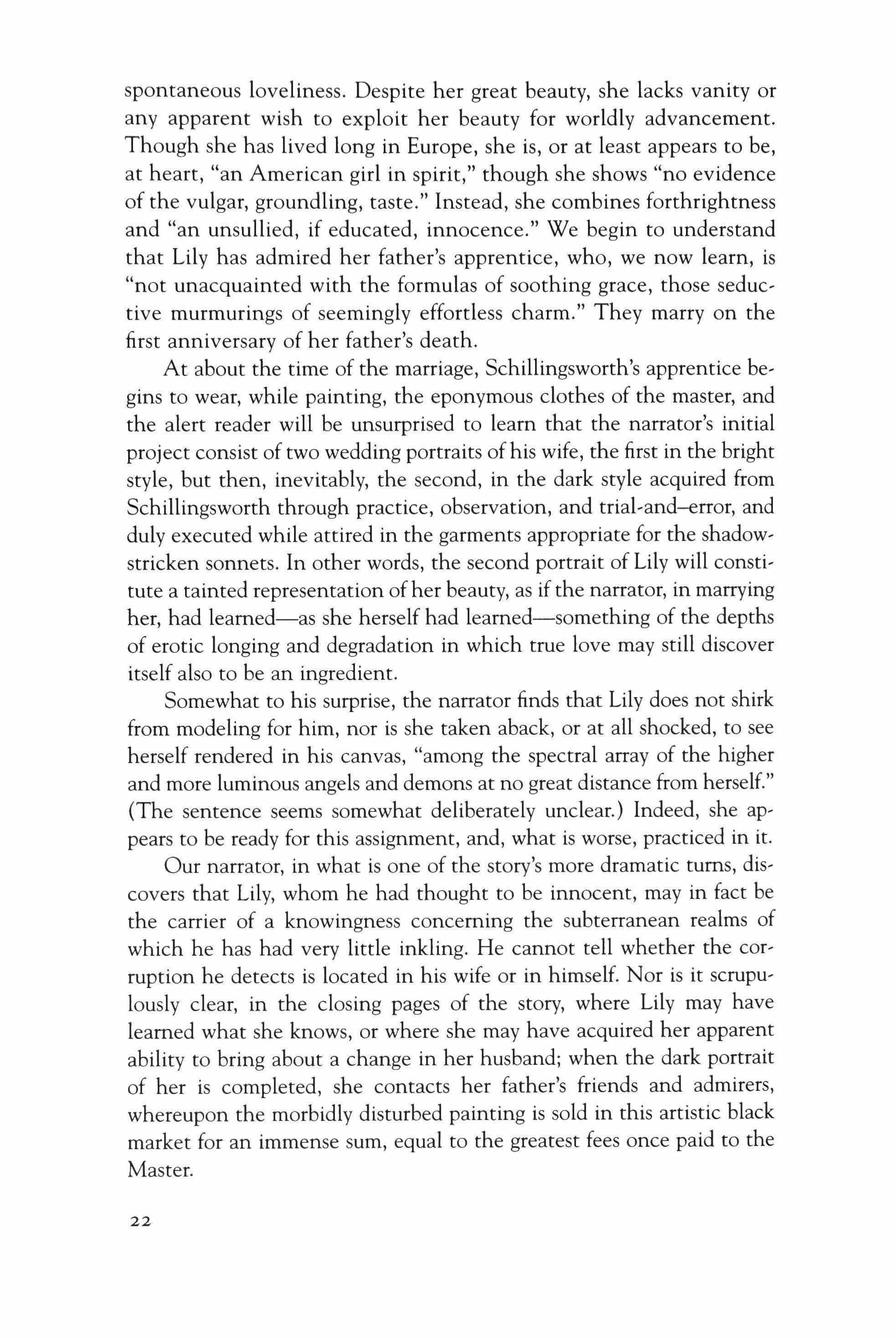
spontaneous loveliness. Despite her great beauty, she lacks vanity or any apparent wish to exploit her beauty for worldly advancement. Though she has lived long in Europe, she is, or at least appears to be, at heart, "an American girl in spirit," though she shows "no evidence of the vulgar, groundling, taste." Instead, she combines forthrightness and "an unsullied, if educated, innocence." We begin to understand that Lily has admired her father's apprentice, who, we now learn, is "not unacquainted with the formulas of soothing grace, those seductive murmurings of seemingly effortless charm." They marry on the first anniversary of her father's death.
At about the time of the marriage, Schillingsworth's apprentice begins to wear, while painting, the eponymous clothes of the master, and the alert reader will be unsurprised to learn that the narrator's initial project consist of two wedding portraits ofhis wife, the first in the bright style, but then, inevitably, the second, in the dark style acquired from Schillingsworth through practice, observation, and trial-and-error, and duly executed while attired in the garments appropriate for the shadowstricken sonnets. In other words, the second portrait of Lily will constitute a tainted representation ofher beauty, as if the narrator, in marrying her, had learned-as she herself had learned-something of the depths of erotic longing and degradation in which true love may still discover itself also to be an ingredient.
Somewhat to his surprise, the narrator finds that Lily does not shirk from modeling for him, nor is she taken aback, or at all shocked, to see herself rendered in his canvas, "among the spectral array of the higher and more luminous angels and demons at no great distance from herself." (The sentence seems somewhat deliberately unclear.) Indeed, she appears to be ready for this assignment, and, what is worse, practiced in it.
Our narrator, in what is one of the story's more dramatic turns, discovers that Lily, whom he had thought to be innocent, may in fact be the carrier of a knowingness concerning the subterranean realms of which he has had very little inkling. He cannot tell whether the corruption he detects is located in his wife or in himself. Nor is it scrupulously clear, in the closing pages of the story, where Lily may have learned what she knows, or where she may have acquired her apparent ability to bring about a change in her husband; when the dark portrait of her is completed, she contacts her father's friends and admirers, whereupon the morbidly disturbed painting is sold in this artistic black market for an immense sum, equal to the greatest fees once paid to the Master.
22
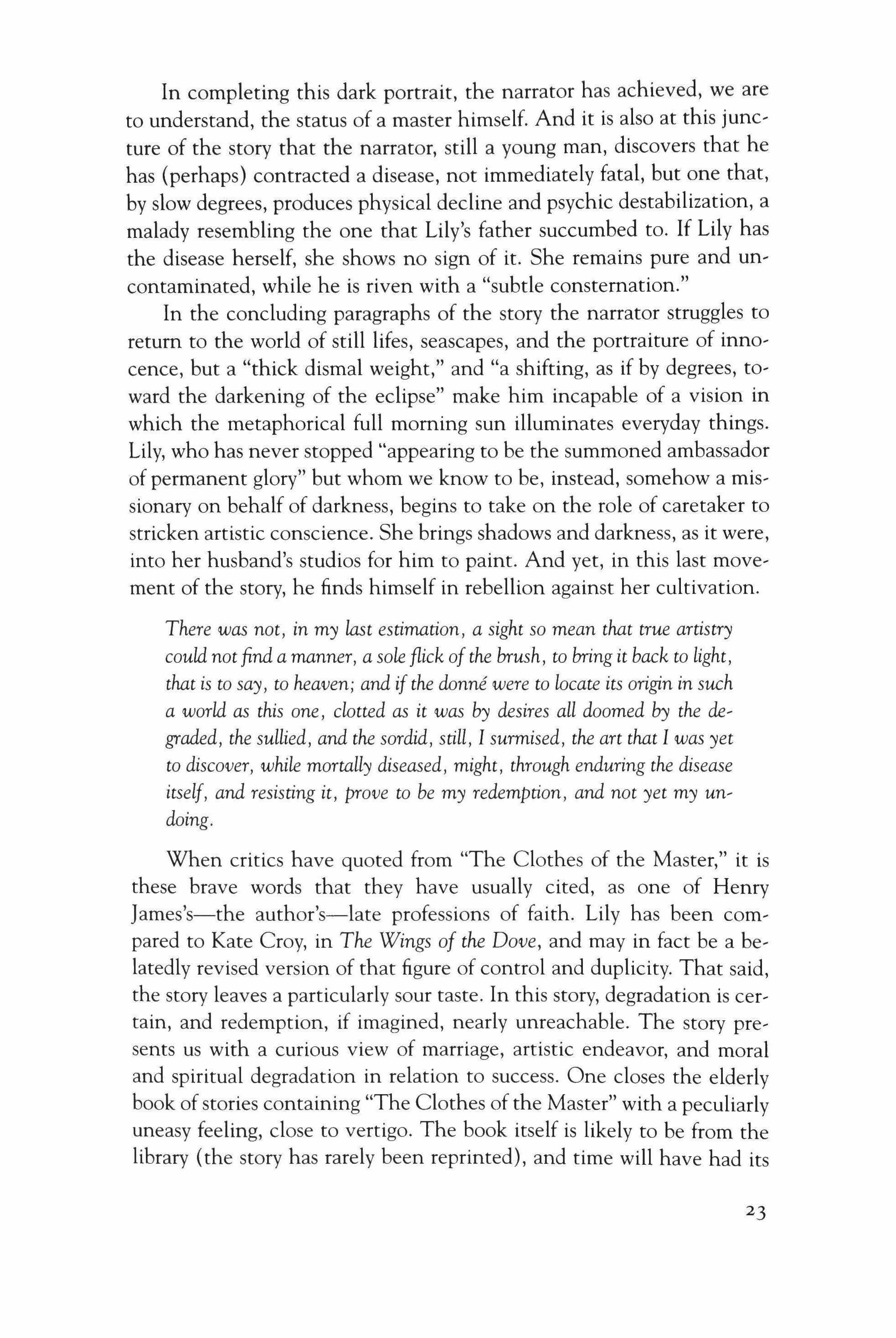
In completing this dark portrait, the narrator has achieved, we are to understand, the status of a master himself. And it is also at this juncture of the story that the narrator, still a young man, discovers that he has (perhaps) contracted a disease, not immediately fatal, but one that, by slow degrees, produces physical decline and psychic destabilization, a malady resembling the one that Lily's father succumbed to. If Lily has the disease herself, she shows no sign of it. She remains pure and uncontaminated, while he is riven with a "subtle consternation."
In the concluding paragraphs of the story the narrator struggles to return to the world of still lifes, seascapes, and the portraiture of innocence, but a "thick dismal weight," and "a shifting, as if by degrees, toward the darkening of the eclipse" make him incapable of a vision in which the metaphorical full morning sun illuminates everyday things. Lily, who has never stopped "appearing to be the summoned ambassador of permanent glory" but whom we know to be, instead, somehow a missionary on behalf of darkness, begins to take on the role of caretaker to stricken artistic conscience. She brings shadows and darkness, as it were, into her husband's studios for him to paint. And yet, in this last movement of the story, he finds himself in rebellion against her cultivation.
There was not, in my last estimation, a sight so mean that true artistry could not find a manner, a sole flick ofthe brush, to bring it back to light, that is to say, to heaven; and if the donne were to locate its origin in such a world as this one, clotted as it was by desires all doomed by the degraded, the sullied, and the sordid, still, I surmised, the art that I was yet to discover, while mortally diseased, might, through enduring the disease itself, and resisting it, prove to be my redemption, and not yet my undoing.
When critics have quoted from "The Clothes of the Master," it is these brave words that they have usually cited, as one of Henry }ames's-the author's-late professions of faith. Lily has been compared to Kate Croy, in The Wings of the Dove, and may in fact be a belatedly revised version of that figure of control and duplicity. That said, the story leaves a particularly sour taste. In this story, degradation is certain, and redemption, if imagined, nearly unreachable. The story presents us with a curious view of marriage, artistic endeavor, and moral and spiritual degradation in relation to success. One closes the elderly book of stories containing "The Clothes of the Master" with a peculiarly uneasy feeling, close to vertigo. The book itself is likely to be from the library (the story has rarely been reprinted), and time will have had its
23

way with it: most copies have broken spines and carry with them the musty smell of oxvdized paper.
My own story, however, does not quite end there. Following my friend's death, I wasn't especially puzzled by the arrival of the carton containing cast-offs from his clothes closet. Almost everyone who has lived through the death of a relative or a loved one knows that the process of grieving is intensified and complicated by the leavings, the remnants, the house, hold objects. What do you do with all the garments belonging to the de' ceased, drenched in memory? The red dress worn to the summer party, the scarf wrapped around the neck all winter long? The swim suits, the beautiful junk jewelry, the tarnished trophies for athletic achievement, the perfumes? What do you do with the framed certificates, the proud diplomas, the photo albums, the personal correspondence ofhandwritten notes? What do you do with the little brass trinkets, the glass paper, weights? The person who is mourned somehow lives on in these things. You are not suffering a haunting, but the existence of the surviving effects is not quite benign. You can't just put the collected household objects in the dumpster. If you do, you'll pay for your thoughtlessness in memory and in dreams.
So it is understandable that my friend's daughters would have ernptied his closet-his wife died at almost the same time that he did-into these cartons and mailed them off to the people who knew him and loved him.
Some of the clothes they sent me I threw away, but because Ire, membered the woolen sport coat from those occasions when I used to visit him, I hung it up on my clothes rack next to my own shirts and jackets, a few of which acquired trace odors ofhim. Every morning when I dressed for work, I would see that coat, and every evening, when I dumped my dirty socks into the hamper, I would see it again, swaying in the closet in the breeze from the heat grates.
I grew exasperated by my inability to deal with this reminder of B.'s existence. It didn't seem right to keep the coat around, but it seemed equally mistaken to dispose of it. Finally I had a dream one night in which B. came to me and said, "You have to let me go." He made some other statements, but that one-"You have to let me go"-is the one I remember.
The next evening I put his coat on a different hanger, went through its pockets one more time, and took it downstairs. As if I were sneaking some criminal substance into the next county, I put his sport coat into
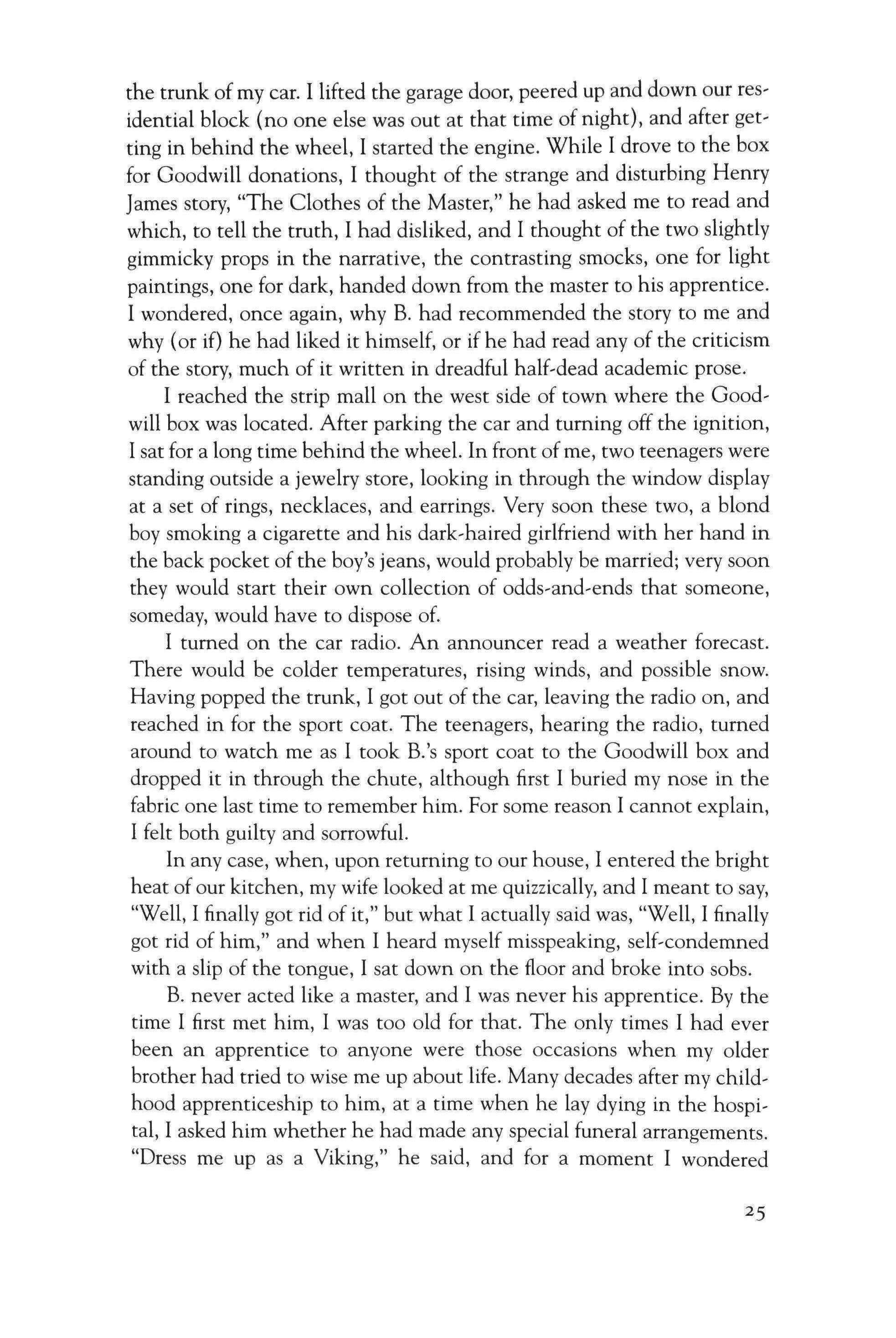
the trunk of my car. I lifted the garage door, peered up and down our residential block (no one else was out at that time of night), and after getting in behind the wheel, I started the engine. While I drove to the box for Goodwill donations, I thought of the strange and disturbing Henry James story, "The Clothes of the Master," he had asked me to read and which, to tell the truth, I had disliked, and I thought of the two slightly gimmicky props in the narrative, the contrasting smocks, one for light paintings, one for dark, handed down from the master to his apprentice. I wondered, once again, why B. had recommended the story to me and why (or if) he had liked it himself, or if he had read any of the criticism of the story, much of it written in dreadful half-dead academic prose.
I reached the strip mall on the west side of town where the Goodwill box was located. After parking the car and turning off the ignition, I sat for a long time behind the wheel. In front of me, two teenagers were standing outside a jewelry store, looking in through the window display at a set of rings, necklaces, and earrings. Very soon these two, a blond boy smoking a cigarette and his dark-haired girlfriend with her hand in the back pocket of the boy's jeans, would probably be married; very soon they would start their own collection of odds-and-ends that someone, someday, would have to dispose of.
I turned on the car radio. An announcer read a weather forecast. There would be colder temperatures, rising winds, and possible snow. Having popped the trunk, I got out of the car, leaving the radio on, and reached in for the sport coat. The teenagers, hearing the radio, turned around to watch me as I took B.'s sport coat to the Goodwill box and dropped it in through the chute, although first I buried my nose in the fabric one last time to remember him. For some reason I cannot explain, I felt both guilty and sorrowful.
In any case, when, upon returning to our house, I entered the bright heat of our kitchen, my wife looked at me quizzically, and I meant to say, "Well, I finally got rid of it," but what I actually said was, "Well, I finally got rid of him," and when I heard myself misspeaking, self-condemned with a slip of the tongue, I sat down on the floor and broke into sobs.
B. never acted like a master, and I was never his apprentice. By the time I first met him, I was too old for that. The only times I had ever been an apprentice to anyone were those occasions when my older brother had tried to wise me up about life. Many decades after my childhood apprenticeship to him, at a time when he lay dying in the hospital, I asked him whether he had made any special funeral arrangements. "Dress me up as a Viking," he said, and for a moment I wondered
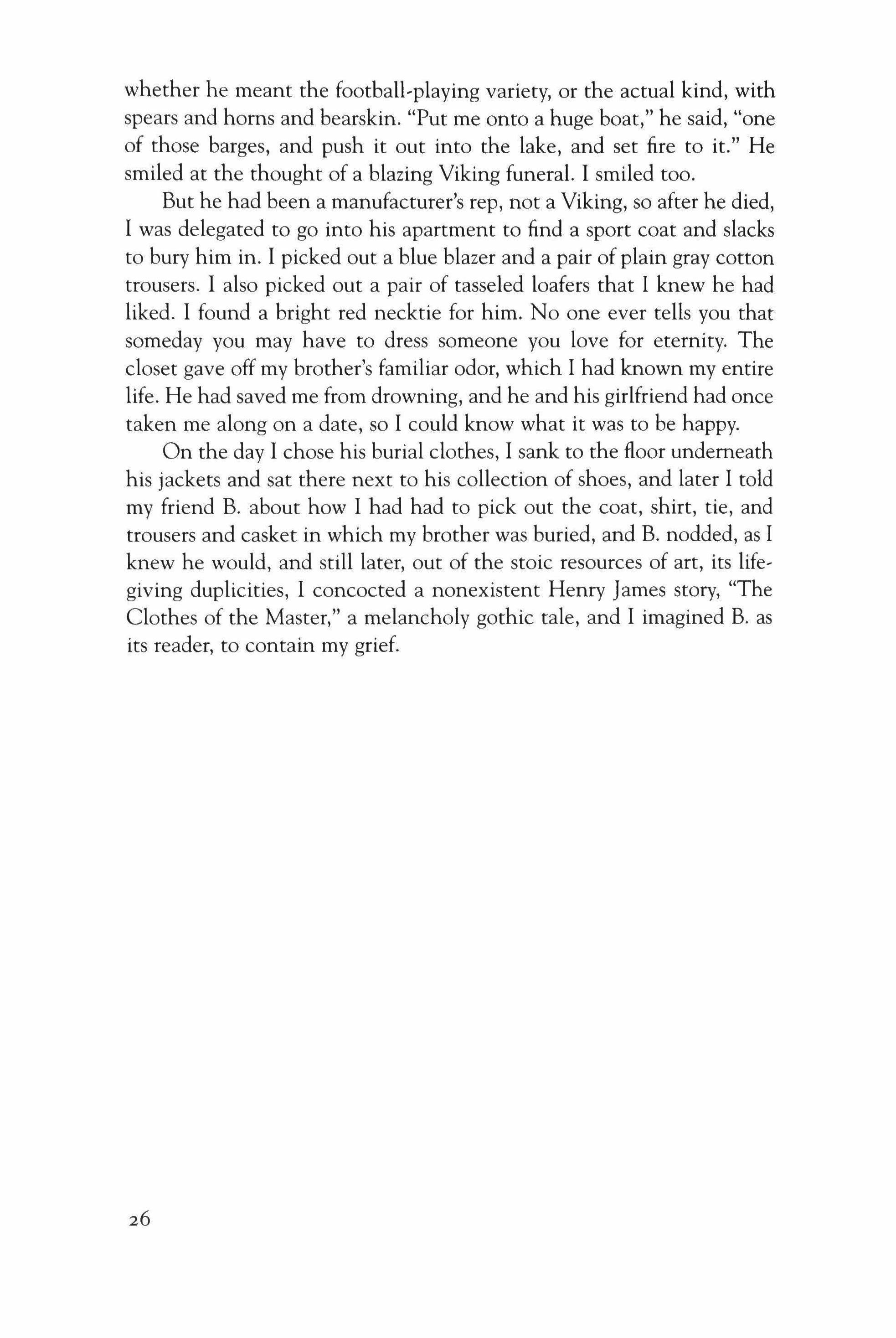
whether he meant the football-playing variety, or the actual kind, with spears and horns and bearskin. "Put me onto a huge boat," he said, "one of those barges, and push it out into the lake, and set fire to it." He smiled at the thought of a blazing Viking funeral. I smiled too.
But he had been a manufacturer's rep, not a Viking, so after he died, I was delegated to go into his apartment to find a sport coat and slacks to bury him in. I picked out a blue blazer and a pair of plain gray cotton trousers. I also picked out a pair of tasseled loafers that I knew he had liked. I found a bright red necktie for him. No one ever tells you that someday you may have to dress someone you love for eternity. The closet gave off my brother's familiar odor, which I had known my entire life. He had saved me from drowning, and he and his girlfriend had once taken me along on a date, so I could know what it was to be happy.
On the day I chose his burial clothes, I sank to the floor underneath his jackets and sat there next to his collection of shoes, and later I told my friend B. about how I had had to pick out the coat, shirt, tie, and trousers and casket in which my brother was buried, and B. nodded, as I knew he would, and still later, out of the stoic resources of art, its lifegiving duplicities, I concocted a nonexistent Henry James story, "The Clothes of the Master," a melancholy gothic tale, and I imagined B. as its reader, to contain my grief.
David H. Lynn
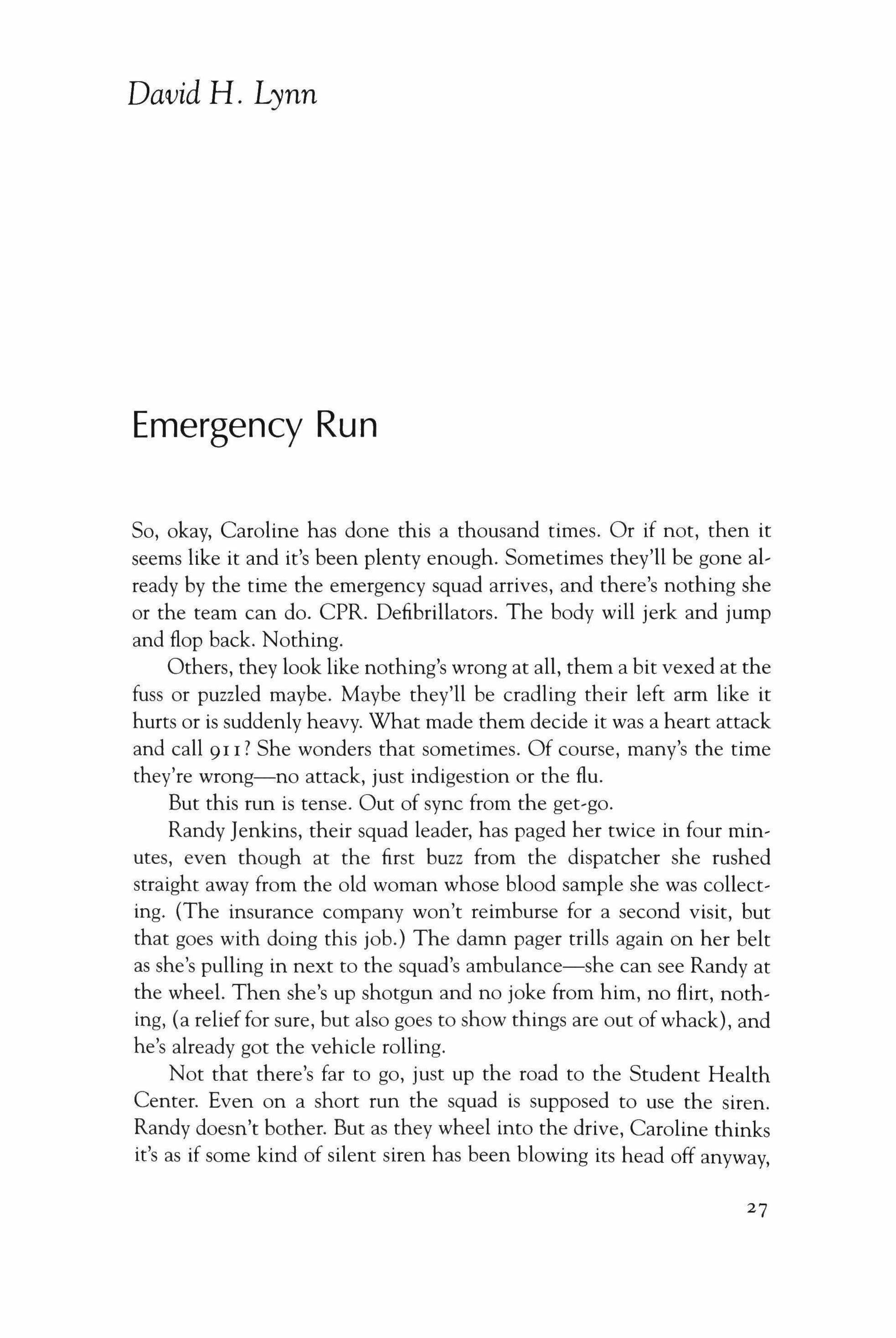
Emergency Run
So, okay, Caroline has done this a thousand times. Or if not, then it seems like it and it's been plenty enough. Sometimes they'll be gone already by the time the emergency squad arrives, and there's nothing she or the team can do. CPR. Defibrillators. The body will jerk and jump and flop back. Nothing.
Others, they look like nothing's wrong at all, them a bit vexed at the fuss or puzzled maybe. Maybe they'll be cradling their left arm like it hurts or is suddenly heavy. What made them decide it was a heart attack and call 9 I I? She wonders that sometimes. Of course, many's the time they're wrong-no attack, just indigestion or the flu.
But this run is tense. Out of sync from the get-go.
Randy Jenkins, their squad leader, has paged her twice in four minutes, even though at the first buzz from the dispatcher she rushed straight away from the old woman whose blood sample she was collecting. (The insurance company won't reimburse for a second visit, but that goes with doing this job.) The damn pager trills again on her belt as she's pulling in next to the squad's ambulance-she can see Randy at the wheel. Then she's up shotgun and no joke from him, no flirt, nothing, (a relief for sure, but also goes to show things are out of whack), and he's already got the vehicle rolling.
Not that there's far to go, just up the road to the Student Health Center. Even on a short run the squad is supposed to use the siren. Randy doesn't bother. But as they wheel into the drive, Caroline thinks it's as if some kind of silent siren has been blowing its head off anyway,
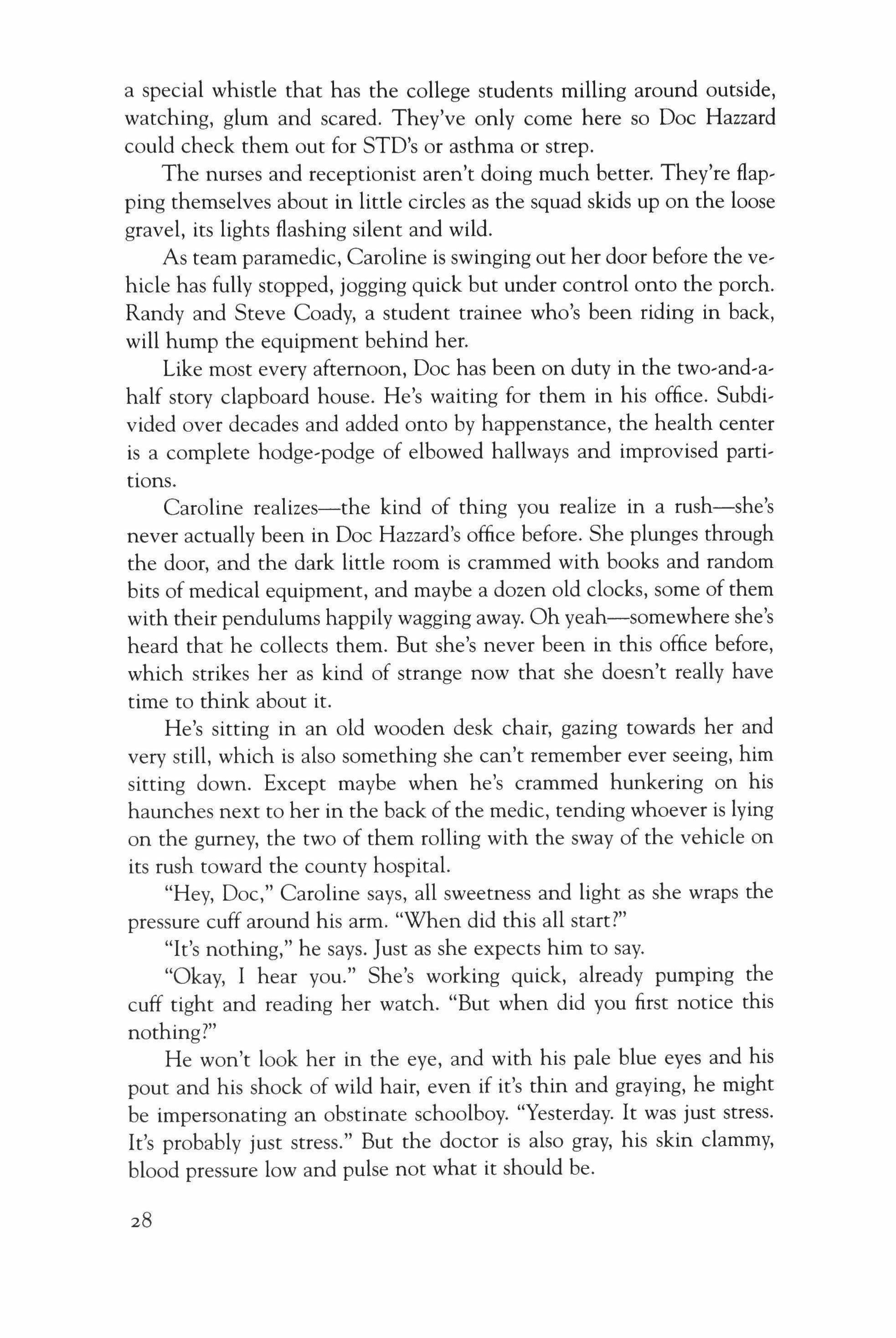
a special whistle that has the college students milling around outside, watching, glum and scared. They've only come here so Doc Hazzard could check them out for STD's or asthma or strep.
The nurses and receptionist aren't doing much better. They're flapping themselves about in little circles as the squad skids up on the loose gravel, its lights flashing silent and wild.
As team paramedic, Caroline is swinging out her door before the vehicle has fully stopped, jogging quick but under control onto the porch. Randy and Steve Coady, a student trainee who's been riding in back, will hump the equipment behind her.
Like most every afternoon, Doc has been on duty in the two-and-ahalf story clapboard house. He's waiting for them in his office. Subdivided over decades and added onto by happenstance, the health center is a complete hodge-podge of elbowed hallways and improvised partitions.
Caroline realizes-the kind of thing you realize in a rush-she's never actually been in Doc Hazzard's office before. She plunges through the door, and the dark little room is crammed with books and random bits of medical equipment, and maybe a dozen old clocks, some of them with their pendulums happily wagging away. Oh yeah-somewhere she's heard that he collects them. But she's never been in this office before, which strikes her as kind of strange now that she doesn't really have time to think about it.
He's sitting in an old wooden desk chair, gazing towards her and very still, which is also something she can't remember ever seeing, him sitting down. Except maybe when he's crammed hunkering on his haunches next to her in the back of the medic, tending whoever is lying on the gurney, the two of them rolling with the sway of the vehicle on its rush toward the county hospital.
"Hey, Doc," Caroline says, all sweetness and light as she wraps the pressure cuff around his arm. "When did this all start?"
"It's nothing," he says. Just as she expects him to say.
"Okay, I hear you." She's working quick, already pumping the cuff tight and reading her watch. "But when did you first notice this nothing?"
He won't look her in the eye, and with his pale blue eyes and his pout and his shock of wild hair, even if it's thin and graying, he might be impersonating an obstinate schoolboy. "Yesterday. It was just stress. It's probably just stress." But the doctor is also gray, his skin clammy, blood pressure low and pulse not what it should be.
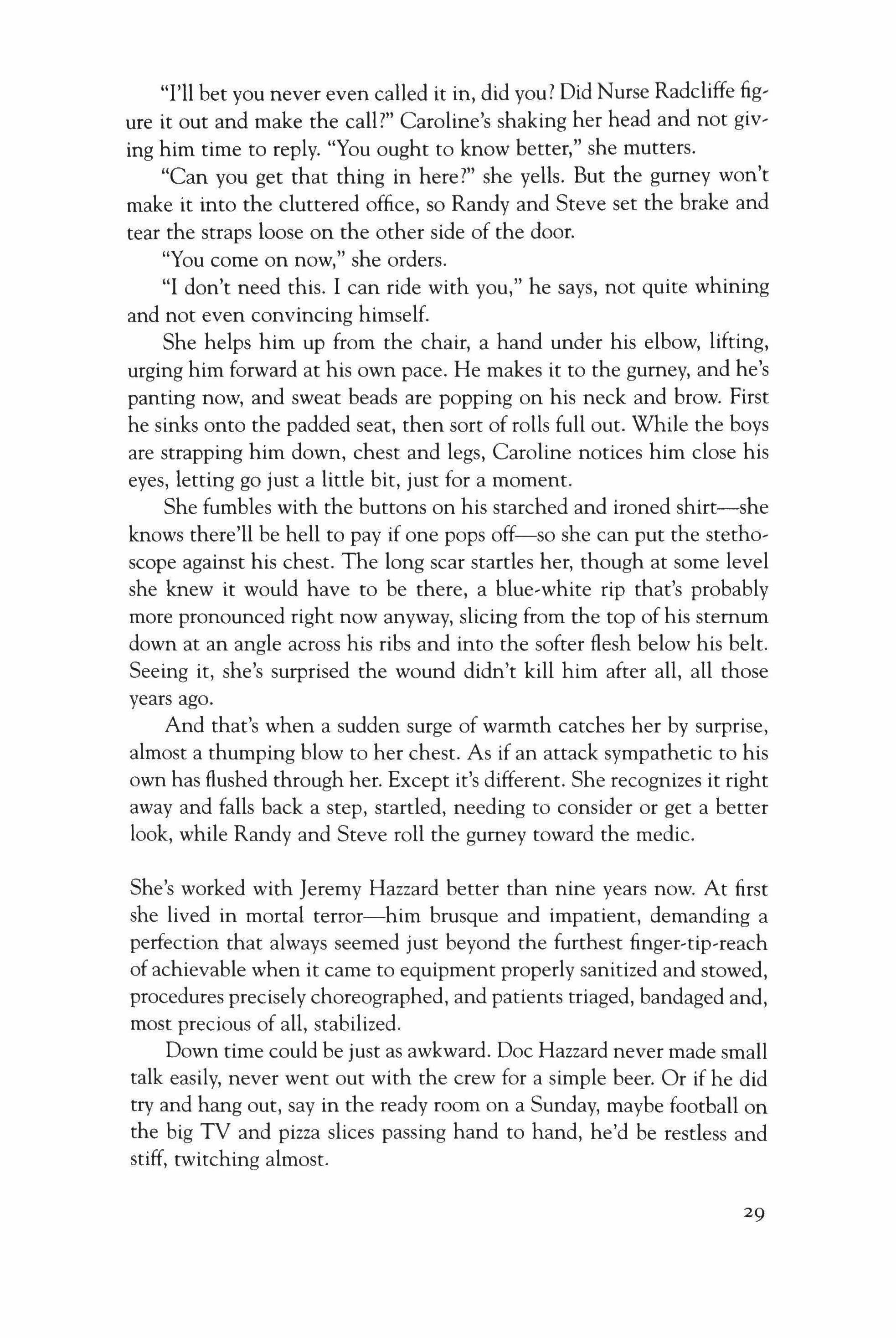
"I'll bet you never even called it in, did you? Did Nurse Radcliffe figure it out and make the call?" Caroline's shaking her head and not giving him time to reply. "You ought to know better," she mutters.
"Can you get that thing in here?" she yells. But the gurney won't make it into the cluttered office, so Randy and Steve set the brake and tear the straps loose on the other side of the door.
"You come on now," she orders.
"I don't need this. I can ride with you," he says, not quite whining and not even convincing himself.
She helps him up from the chair, a hand under his elbow, lifting, urging him forward at his own pace. He makes it to the gurney, and he's panting now, and sweat beads are popping on his neck and brow. First he sinks onto the padded seat, then sort of rolls full out. While the boys are strapping him down, chest and legs, Caroline notices him close his eyes, letting go just a little bit, just for a moment.
She fumbles with the buttons on his starched and ironed shirt-she knows there'll be hell to pay if one pops off-so she can put the stethoscope against his chest. The long scar startles her, though at some level she knew it would have to be there, a blue-white rip that's probably more pronounced right now anyway, slicing from the top of his sternum down at an angle across his ribs and into the softer flesh below his belt. Seeing it, she's surprised the wound didn't kill him after all, all those years ago.
And that's when a sudden surge of warmth catches her by surprise, almost a thumping blow to her chest. As if an attack sympathetic to his own has flushed through her. Except it's different. She recognizes it right away and falls back a step, startled, needing to consider or get a better look, while Randy and Steve roll the gurney toward the medic.
She's worked with Jeremy Hazzard better than nine years now. At first she lived in mortal terror-him brusque and impatient, demanding a perfection that always seemed just beyond the furthest finger-tip-reach of achievable when it came to equipment properly sanitized and stowed, procedures precisely choreographed, and patients triaged, bandaged and, most precious of all, stabilized.
Down time could be just as awkward. Doc Hazzard never made small talk easily, never went out with the crew for a simple beer. Or if he did try and hang out, say in the ready room on a Sunday, maybe football on the big TV and pizza slices passing hand to hand, he'd be restless and stiff, twitching almost.
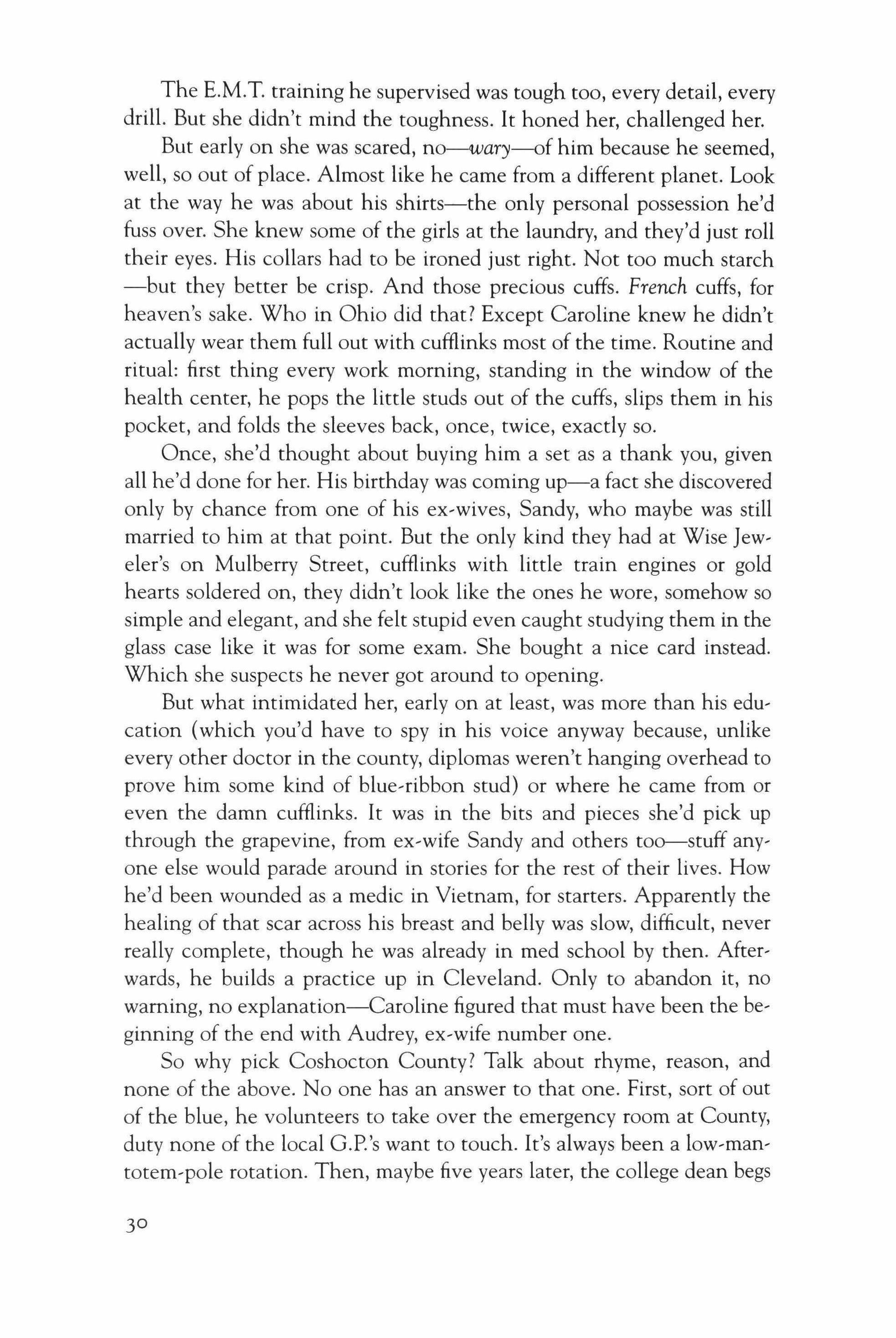
The E.M.T. training he supervised was tough too, every detail, every drill. But she didn't mind the toughness. It honed her, challenged her.
But early on she was scared, no-wary-of him because he seemed, well, so out of place. Almost like he came from a different planet. Look at the way he was about his shirts-the only personal possession he'd fuss over. She knew some of the girls at the laundry, and they'd just roll their eyes. His collars had to be ironed just right. Not too much starch -but they better be crisp. And those precious cuffs. French cuffs, for heaven's sake. Who in Ohio did that? Except Caroline knew he didn't actually wear them full out with cufflinks most of the time. Routine and ritual: first thing every work morning, standing in the window of the health center, he pops the little studs out of the cuffs, slips them in his pocket, and folds the sleeves back, once, twice, exactly so.
Once, she'd thought about buying him a set as a thank you, given all he'd done for her. His birthday was coming up-a fact she discovered only by chance from one of his ex-wives, Sandy, who maybe was still married to him at that point. But the only kind they had at Wise Jeweler's on Mulberry Street, cufflinks with little train engines or gold hearts soldered on, they didn't look like the ones he wore, somehow so simple and elegant, and she felt stupid even caught studying them in the glass case like it was for some exam. She bought a nice card instead. Which she suspects he never got around to opening.
But what intimidated her, early on at least, was more than his education (which you'd have to spy in his voice anyway because, unlike every other doctor in the county, diplomas weren't hanging overhead to prove him some kind of blue-ribbon stud) or where he came from or even the damn cufflinks. It was in the bits and pieces she'd pick up through the grapevine, from ex-wife Sandy and others too-stuff anyone else would parade around in stories for the rest of their lives. How he'd been wounded as a medic in Vietnam, for starters. Apparently the healing of that scar across his breast and belly was slow, difficult, never really complete, though he was already in med school by then. Afterwards, he builds a practice up in Cleveland. Only to abandon it, no warning, no explanation-Caroline figured that must have been the beginning of the end with Audrey, ex-wife number one.
So why pick Coshocton County? Talk about rhyme, reason, and none of the above. No one has an answer to that one. First, sort of out of the blue, he volunteers to take over the emergency room at County, duty none of the local G.P.'s want to touch. It's always been a low-mantotem-pole rotation. Then, maybe five years later, the college dean begs
30
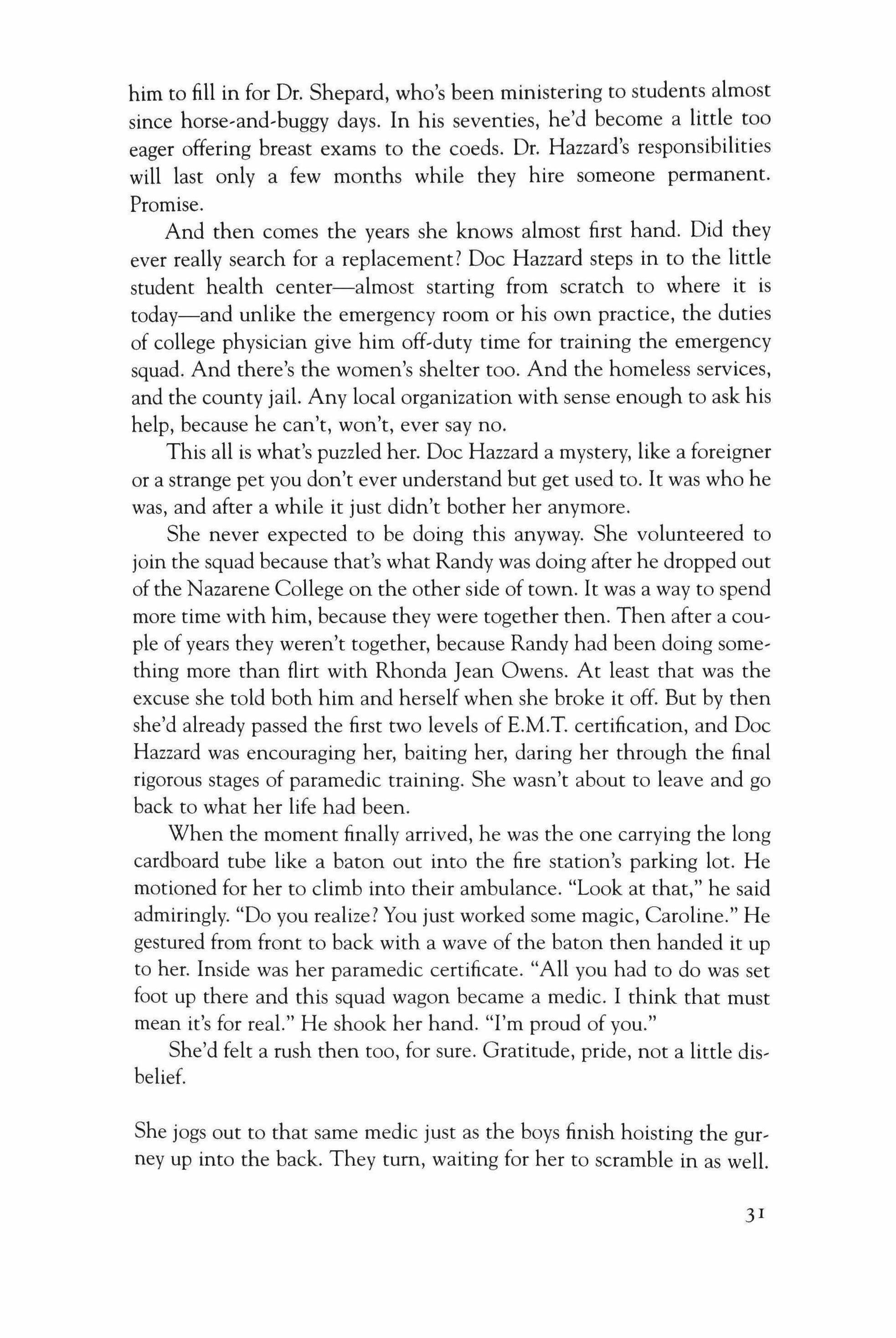
him to fill in for Dr. Shepard, who's been ministering to students almost since horse-and-buggy days. In his seventies, he'd become a little too eager offering breast exams to the coeds. Dr. Hazzard's responsibilities will last only a few months while they hire someone permanent. Promise.
And then comes the years she knows almost first hand. Did they ever really search for a replacement? Doc Hazzard steps in to the little student health center-almost starting from scratch to where it is today-and unlike the emergency room or his own practice, the duties of college physician give him off-duty time for training the emergency squad. And there's the women's shelter too. And the homeless services, and the county jail. Any local organization with sense enough to ask his help, because he can't, won't, ever say no.
This all is what's puzzled her. Doc Hazzard a mystery, like a foreigner or a strange pet you don't ever understand but get used to. It was who he was, and after a while it just didn't bother her anymore.
She never expected to be doing this anyway. She volunteered to join the squad because that's what Randy was doing after he dropped out of the Nazarene College on the other side of town. It was a way to spend more time with him, because they were together then. Then after a couple of years they weren't together, because Randy had been doing something more than flirt with Rhonda Jean Owens. At least that was the excuse she told both him and herself when she broke it off. But by then she'd already passed the first two levels of E.M.T. certification, and Doc Hazzard was encouraging her, baiting her, daring her through the final rigorous stages of paramedic training. She wasn't about to leave and go back to what her life had been.
When the moment finally arrived, he was the one carrying the long cardboard tube like a baton out into the fire station's parking lot. He motioned for her to climb into their ambulance. "Look at that," he said admiringly. "Do you realize? You just worked some magic, Caroline." He gestured from front to back with a wave of the baton then handed it up to her. Inside was her paramedic certificate. "All you had to do was set foot up there and this squad wagon became a medic. I think that must mean it's for real." He shook her hand. "I'm proud of you."
She'd felt a rush then too, for sure. Gratitude, pride, not a little disbelief.
She jogs out to that same medic just as the boys finish hoisting the gurney up into the back. They tum, waiting for her to scramble in as well.
3I
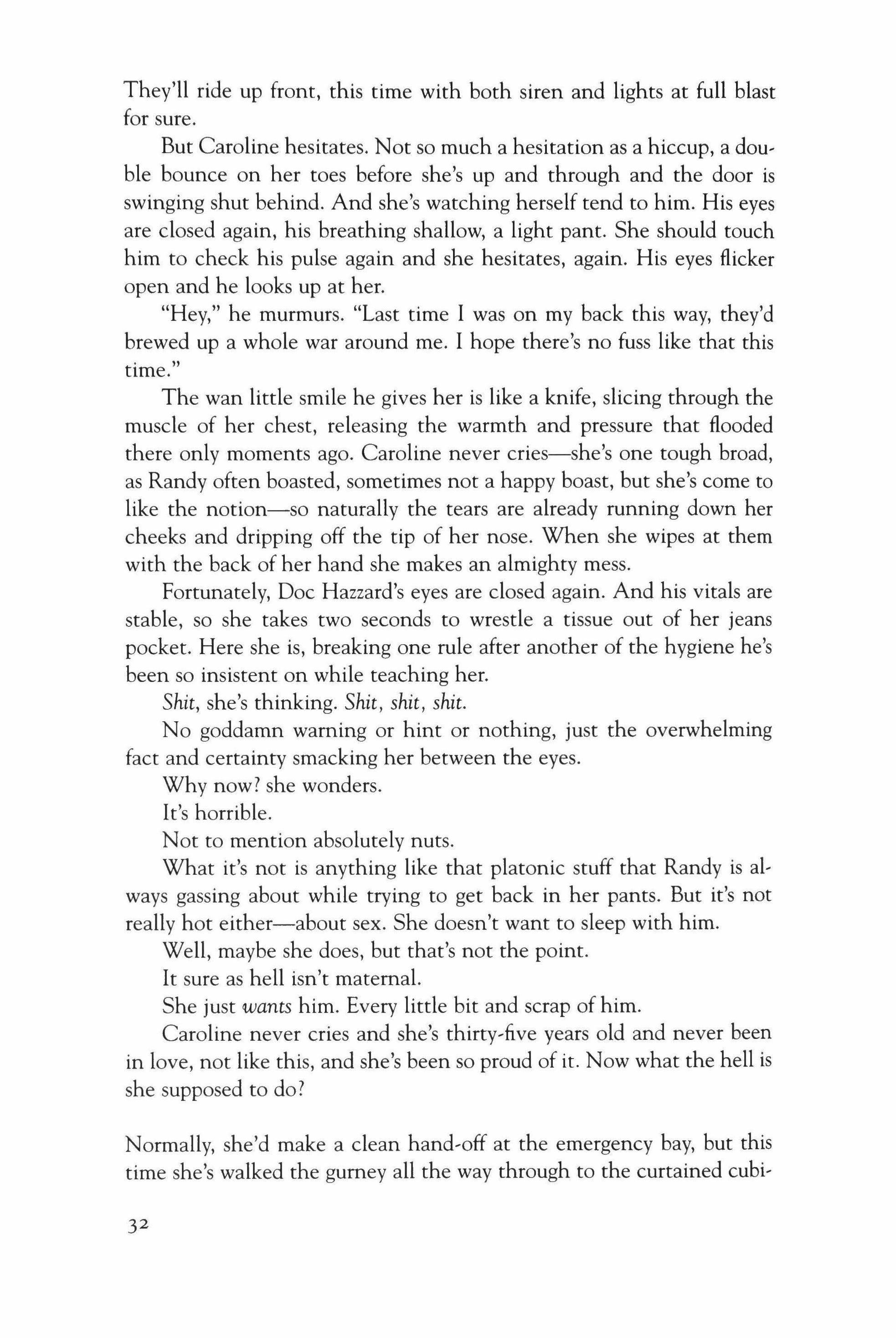
They'll ride up front, this time with both siren and lights at full blast for sure.
But Caroline hesitates. Not so much a hesitation as a hiccup, a double bounce on her toes before she's up and through and the door is swinging shut behind. And she's watching herself tend to him. His eyes are closed again, his breathing shallow, a light pant. She should touch him to check his pulse again and she hesitates, again. His eyes flicker open and he looks up at her.
"Hey," he murmurs. "Last time I was on my back this way, they'd brewed up a whole war around me. I hope there's no fuss like that this time."
The wan little smile he gives her is like a knife, slicing through the muscle of her chest, releasing the warmth and pressure that flooded there only moments ago. Caroline never cries-she's one tough broad, as Randy often boasted, sometimes not a happy boast, but she's come to like the notion-so naturally the tears are already running down her cheeks and dripping off the tip of her nose. When she wipes at them with the back of her hand she makes an almighty mess.
Fortunately, Doc Hazzard's eyes are closed again. And his vitals are stable, so she takes two seconds to wrestle a tissue out of her jeans pocket. Here she is, breaking one rule after another of the hygiene he's been so insistent on while teaching her.
Shit, she's thinking. Shit, shit, shit.
No goddamn warning or hint or nothing, just the overwhelming fact and certainty smacking her between the eyes.
Why now? she wonders.
It's horrible.
Not to mention absolutely nuts.
What it's not is anything like that platonic stuff that Randy is always gassing about while trying to get back in her pants. But it's not really hot either-about sex. She doesn't want to sleep with him.
Well, maybe she does, but that's not the point.
It sure as hell isn't maternal.
She just wants him. Every little bit and scrap of him.
Caroline never cries and she's thirty-five years old and never been in love, not like this, and she's been so proud of it. Now what the hell is she supposed to do?
Normally, she'd make a clean hand-off at the emergency bay, but this time she's walked the gurney all the way through to the curtained cubi-
32
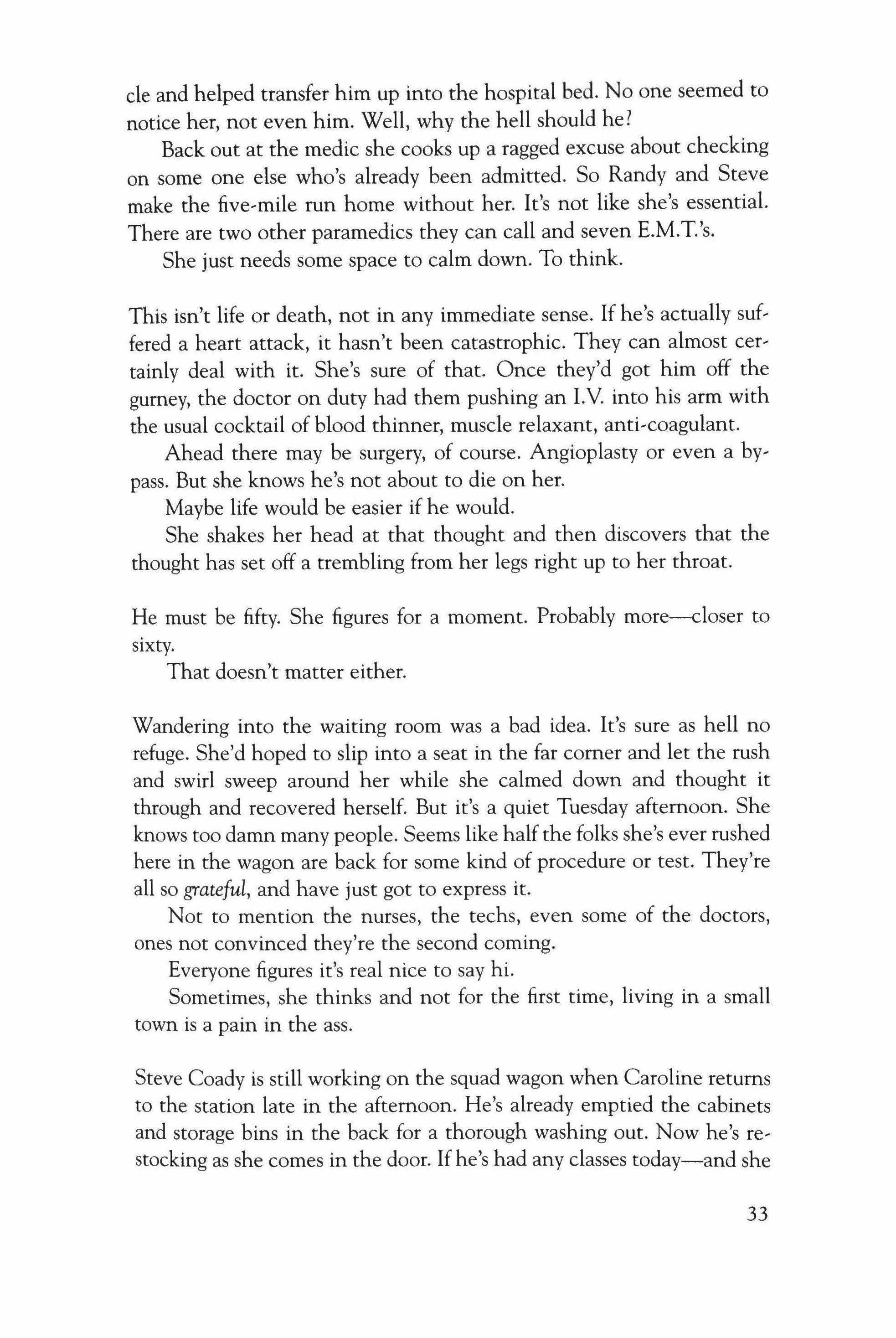
de and helped transfer him up into the hospital bed. No one seemed to notice her, not even him. Well, why the hell should he?
Back out at the medic she cooks up a ragged excuse about checking on some one else who's already been admitted. So Randy and Steve make the five-mile run horne without her. It's not like she's essential. There are two other paramedics they can call and seven E.M.T.'s.
She just needs some space to calm down. To think.
This isn't life or death, not in any immediate sense. If he's actually suffered a heart attack, it hasn't been catastrophic. They can almost certainly deal with it. She's sure of that. Once they'd got him off the gurney, the doctor on duty had them pushing an l.V. into his arm with the usual cocktail of blood thinner, muscle relaxant, anti-coagulant.
Ahead there may be surgery, of course. Angioplasty or even a bypass. But she knows he's not about to die on her.
Maybe life would be easier if he would.
She shakes her head at that thought and then discovers that the thought has set off a trembling from her legs right up to her throat.
He must be fifty. She figures for a moment. Probably more-closer to sixty.
That doesn't matter either.
Wandering into the waiting room was a bad idea. It's sure as hell no refuge. She'd hoped to slip into a seat in the far comer and let the rush and swirl sweep around her while she calmed down and thought it through and recovered herself. But it's a quiet Tuesday afternoon. She knows too damn many people. Seems like half the folks she's ever rushed here in the wagon are back for some kind of procedure or test. They're all so grateful, and have just got to express it.
Not to mention the nurses, the techs, even some of the doctors, ones not convinced they're the second coming.
Everyone figures it's real nice to say hi.
Sometimes, she thinks and not for the first time, living in a small town is a pain in the ass.
Steve Coady is still working on the squad wagon when Caroline returns to the station late in the afternoon. He's already emptied the cabinets and storage bins in the back for a thorough washing out. Now he's restocking as she comes in the door. Ifhe's had any classes today-and she
33
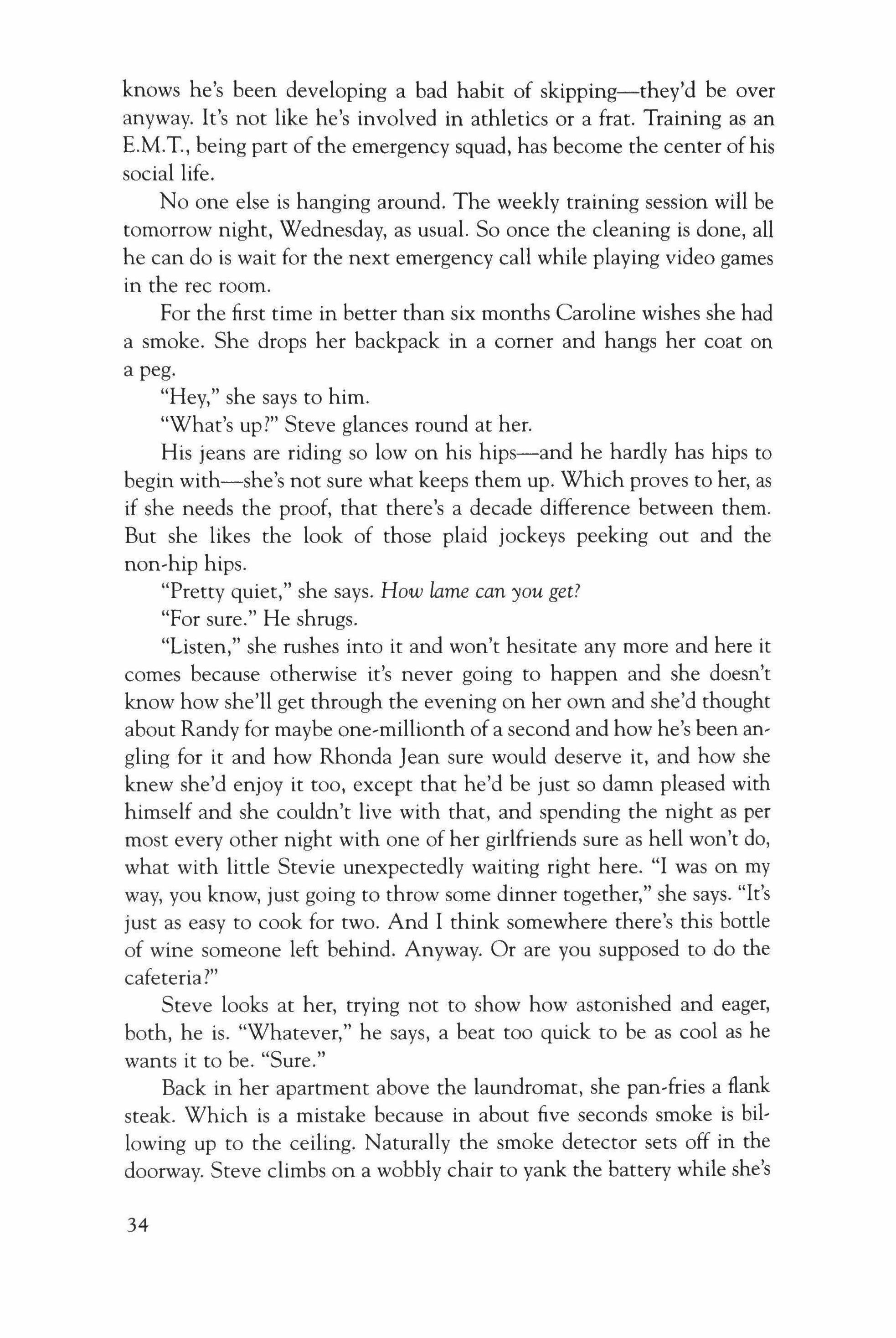
knows he's been developing a bad habit of skipping-they'd be over anyway. It's not like he's involved in athletics or a frat. Training as an E.M.T., being part of the emergency squad, has become the center ofhis social life.
No one else is hanging around. The weekly training session will be tomorrow night, Wednesday, as usual. So once the cleaning is done, all he can do is wait for the next emergency call while playing video games in the rec room.
For the first time in better than six months Caroline wishes she had a smoke. She drops her backpack in a comer and hangs her coat on a peg.
"Hey," she says to him.
"What's up?" Steve glances round at her.
His jeans are riding so Iowan his hips-and he hardly has hips to begin with-she's not sure what keeps them up. Which proves to her, as if she needs the proof, that there's a decade difference between them. But she likes the look of those plaid jockeys peeking out and the non-hip hips.
"Pretty quiet," she says. How lame can you get? "For sure." He shrugs.
"Listen," she rushes into it and won't hesitate any more and here it comes because otherwise it's never going to happen and she doesn't know how she'll get through the evening on her own and she'd thought about Randy for maybe one-millionth of a second and how he's been angling for it and how Rhonda Jean sure would deserve it, and how she knew she'd enjoy it too, except that he'd be just so damn pleased with himself and she couldn't live with that, and spending the night as per most every other night with one of her girlfriends sure as hell won't do, what with little Stevie unexpectedly waiting right here. "I was on my way, you know, just going to throw some dinner together," she says. "It's just as easy to cook for two. And I think somewhere there's this bottle of wine someone left behind. Anyway. Or are you supposed to do the cafeteria?"
Steve looks at her, trying not to show how astonished and eager, both, he is. "Whatever," he says, a beat too quick to be as cool as he wants it to be. "Sure."
Back in her apartment above the laundromat, she pan-fries a flank steak. Which is a mistake because in about five seconds smoke is billowing up to the ceiling. Naturally the smoke detector sets off in the doorway. Steve climbs on a wobbly chair to yank the battery while she's
34

shoving windows open on both sides of the room. A blast of steam from the dryers below blows through. And they're laughing, howling at the idea of their own crew rushing over here to the rescue. Which is good, the laughing.
By the time they're sitting at the table most ofthe smoke has cleared and the steaks are damn good. And before the bottle of rioja is quite empty she's leading him back to the small bedroom, letting him think he's the one doing the leading.
The wine has worked its way into her head and she's a smidge high and into this. Nothing delicate or romantic about it-they're both peeling off clothes and clambering towards the unmade bed. The boy has a silver ring in one ear. And a small tattoo, maybe a flower or a dolphin, he's squiggling too much to get a good look it, above his right nipple.
He's trying to be a bad boy, she thinks, and he's so not.
He's just cute.
And with that thought it starts to go wrong.
He's already on top of her, in too much of a hurry, just like boys his age always used to be, she remembers too well. And she'd like him to go down on her or maybe have a little fun with this. But that's academic anyway because she's thinking now, so already it's too late.
Naturally, it means she's going dry.
"Ow," she gasps, biting her lip, as he pushes into her.
"Huh?" he mumbles, thrusting.
"Nothing. You go ahead."
She's lying back and trying not to let it hurt too much. She's gone from thinking about what a nice boy he is, even if he's a baby, to not even thinking about him at all. It's Doc Hazzard now and only him, and she feels guilty, as if she's being unfaithful.
No, it's worse than guilty-she feels bad, this is what hurts, because she's being unfaithful to herself.
It's him she wants, more than ever, as this nice boy finishes more quickly than he wanted. He's the one feeling guilty, she can tell, as he lies panting on top of her breasts, because he thinks he's disappointed her.
"There, there," she murmurs, running her fingers through his hair to comfort him.
After Steve has retreated to his dorm room-no way she was going to let him stay the night, not that he seemed inclined-Caroline gets dressed again and storms around the apartment, cleaning and
35
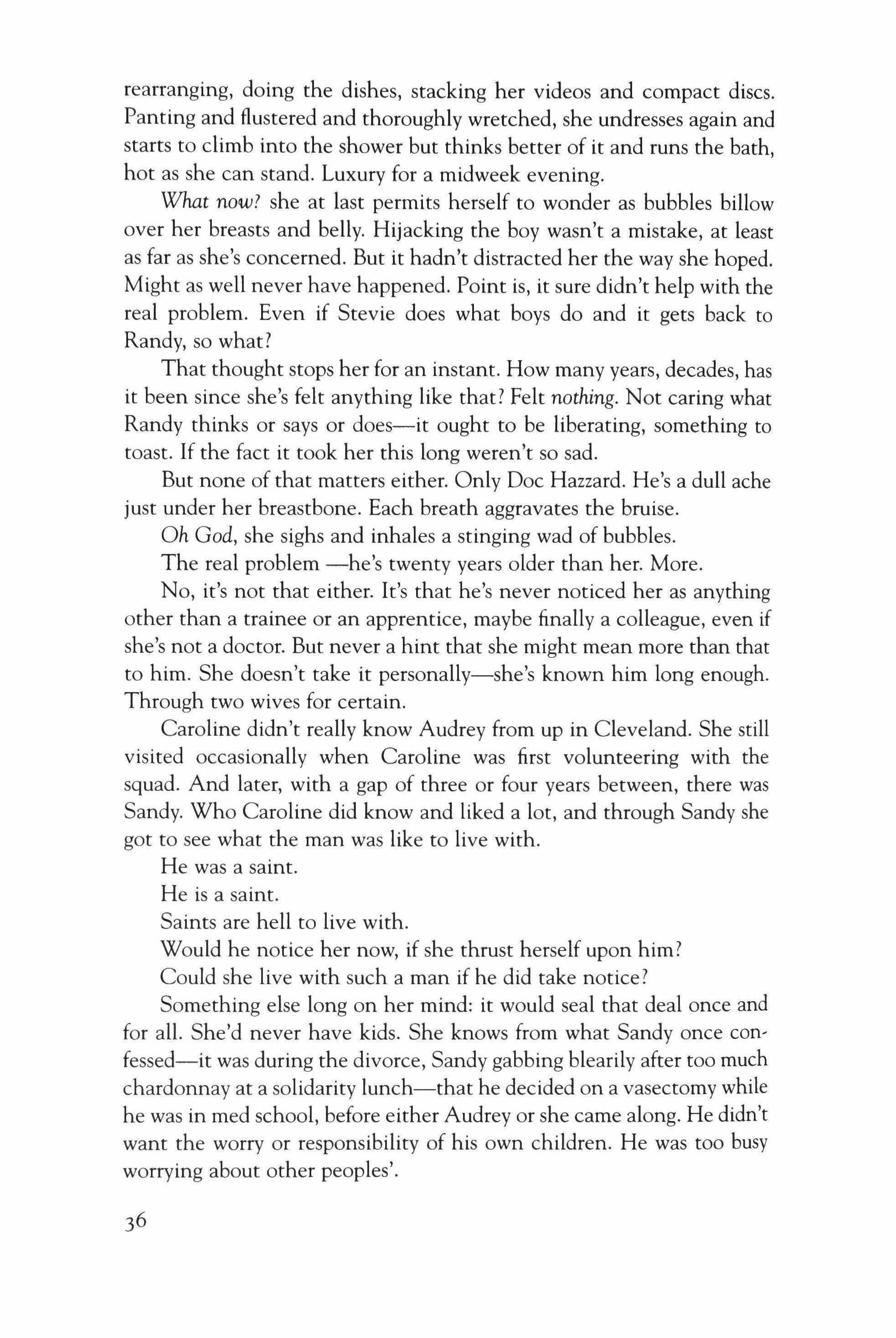
rearranging, doing the dishes, stacking her videos and compact discs. Panting and flustered and thoroughly wretched, she undresses again and starts to climb into the shower but thinks better of it and runs the bath, hot as she can stand. Luxury for a midweek evening.
What now? she at last permits herself to wonder as bubbles billow over her breasts and belly. Hijacking the boy wasn't a mistake, at least as far as she's concerned. But it hadn't distracted her the way she hoped. Might as well never have happened. Point is, it sure didn't help with the real problem. Even if Stevie does what boys do and it gets back to Randy, so what?
That thought stops her for an instant. How many years, decades, has it been since she's felt anything like that? Felt nothing. Not caring what Randy thinks or says or does-it ought to be liberating, something to toast. If the fact it took her this long weren't so sad.
But none of that matters either. Only Doc Hazzard. He's a dull ache just under her breastbone. Each breath aggravates the bruise.
Oh God, she sighs and inhales a stinging wad of bubbles.
The real problem -he's twenty years older than her. More.
No, it's not that either. It's that he's never noticed her as anything other than a trainee or an apprentice, maybe finally a colleague, even if she's not a doctor. But never a hint that she might mean more than that to him. She doesn't take it personally-she's known him long enough. Through two wives for certain.
Caroline didn't really know Audrey from up in Cleveland. She still visited occasionally when Caroline was first volunteering with the squad. And later, with a gap of three or four years between, there was Sandy. Who Caroline did know and liked a lot, and through Sandy she got to see what the man was like to live with.
He was a saint.
He is a saint.
Saints are hell to live with.
Would he notice her now, if she thrust herself upon him?
Could she live with such a man if he did take notice?
Something else long on her mind: it would seal that deal once and for all. She'd never have kids. She knows from what Sandy once confessed-it was during the divorce, Sandy gabbing blearily after too much chardonnay at a solidarity lunch-that he decided on a vasectomy while he was in med school, before either Audrey or she came along. He didn't want the worry or responsibility of his own children. He was too busy worrying about other peoples'.
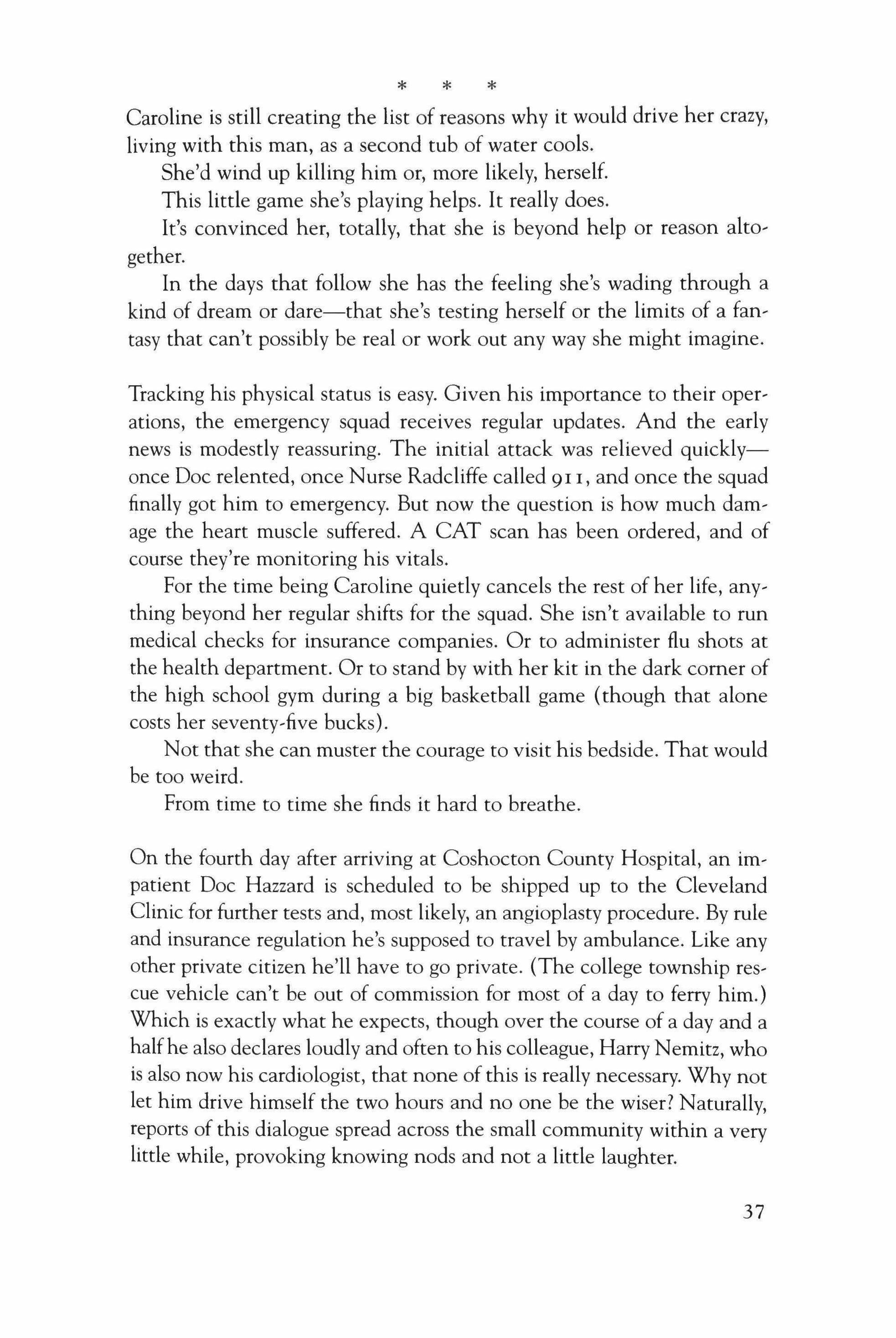
* * *
Caroline is still creating the list of reasons why it would drive her crazy, living with this man, as a second tub of water cools.
She'd wind up killing him or, more likely, herself.
This little game she's playing helps. It really does.
It's convinced her, totally, that she is beyond help or reason altogether.
In the days that follow she has the feeling she's wading through a kind of dream or dare-that she's testing herself or the limits of a fantasy that can't possibly be real or work out any way she might imagine.
Tracking his physical status is easy. Given his importance to their operations, the emergency squad receives regular updates. And the early news is modestly reassuring. The initial attack was relieved quicklyonce Doc relented, once Nurse Radcliffe called 911, and once the squad finally got him to emergency. But now the question is how much damage the heart muscle suffered. A CAT scan has been ordered, and of course they're monitoring his vitals.
For the time being Caroline quietly cancels the rest of her life, anything beyond her regular shifts for the squad. She isn't available to run medical checks for insurance companies. Or to administer flu shots at the health department. Or to stand by with her kit in the dark comer of the high school gym during a big basketball game (though that alone costs her seventy-five bucks).
Not that she can muster the courage to visit his bedside. That would be too weird.
From time to time she finds it hard to breathe.
On the fourth day after arriving at Coshocton County Hospital, an impatient Doc Hazzard is scheduled to be shipped up to the Cleveland Clinic for further tests and, most likely, an angioplasty procedure. By rule and insurance regulation he's supposed to travel by ambulance. Like any other private citizen he'll have to go private. (The college township rescue vehicle can't be out of commission for most of a day to ferry him.) Which is exactly what he expects, though over the course of a day and a halfhe also declares loudly and often to his colleague, Harry Nemitz, who is also now his cardiologist, that none of this is really necessary. Why not let him drive himself the two hours and no one be the wiser? Naturally, reports of this dialogue spread across the small community within a very little while, provoking knowing nods and not a little laughter.
37
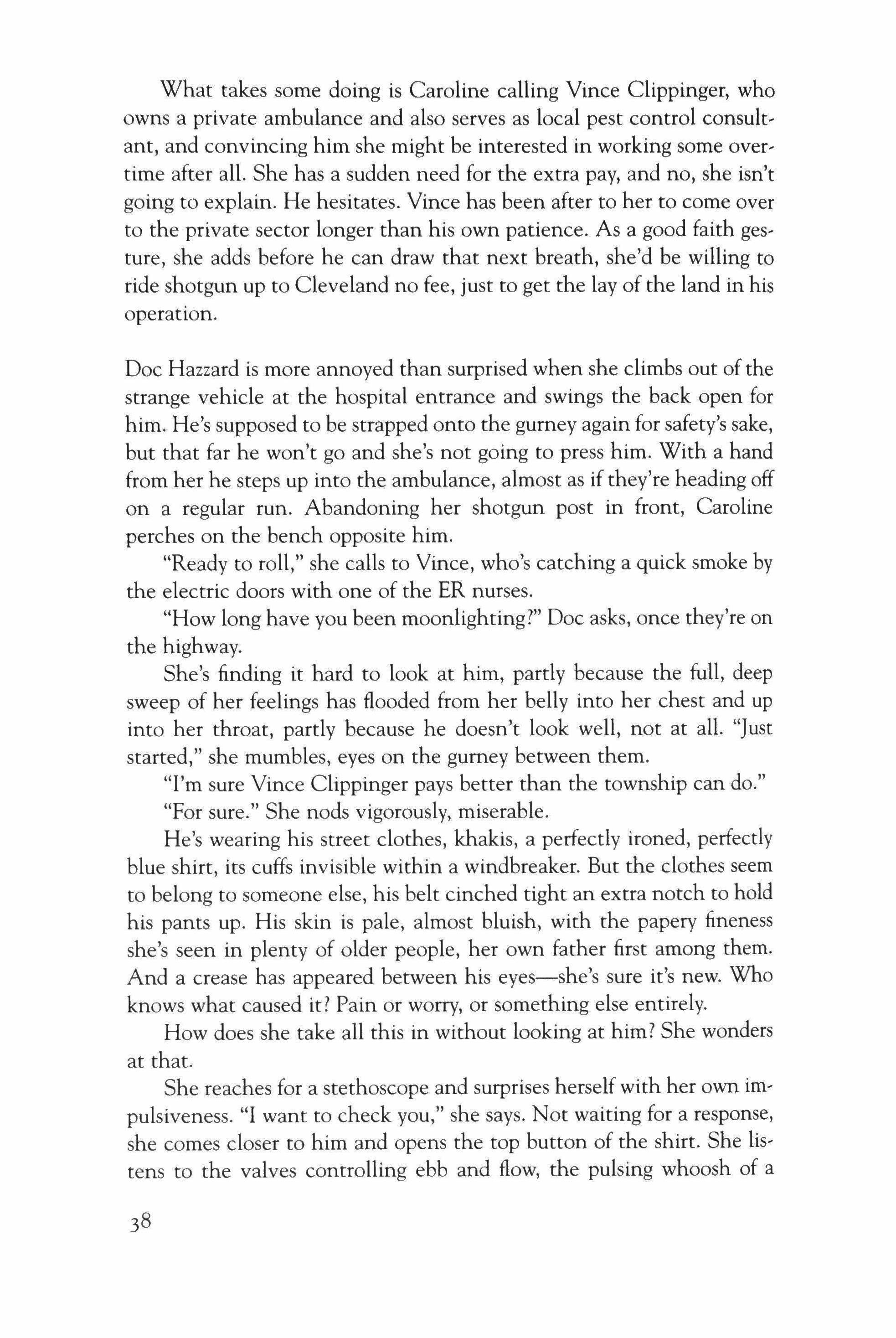
What takes some doing is Caroline calling Vince Clippinger, who owns a private ambulance and also serves as local pest control consultant, and convincing him she might be interested in working some overtime after all. She has a sudden need for the extra pay, and no, she isn't going to explain. He hesitates. Vince has been after to her to come over to the private sector longer than his own patience. As a good faith gesture, she adds before he can draw that next breath, she'd be willing to ride shotgun up to Cleveland no fee, just to get the lay of the land in his operation.
Doc Hazzard is more annoyed than surprised when she climbs out of the strange vehicle at the hospital entrance and swings the back open for him. He's supposed to be strapped onto the gurney again for safety's sake, but that far he won't go and she's not going to press him. With a hand from her he steps up into the ambulance, almost as if they're heading off on a regular run. Abandoning her shotgun post in front, Caroline perches on the bench opposite him.
"Ready to roll," she calls to Vince, who's catching a quick smoke by the electric doors with one of the ER nurses.
"How long have you been moonlighting?" Doc asks, once they're on the highway.
She's finding it hard to look at him, partly because the full, deep sweep of her feelings has flooded from her belly into her chest and up into her throat, partly because he doesn't look well, not at all. "Just started," she mumbles, eyes on the gurney between them.
"I'm sure Vince Clippinger pays better than the township can do."
"For sure." She nods vigorously, miserable.
He's wearing his street clothes, khakis, a perfectly ironed, perfectly blue shirt, its cuffs invisible within a windbreaker. But the clothes seem to belong to someone else, his belt cinched tight an extra notch to hold his pants up. His skin is pale, almost bluish, with the papery fineness she's seen in plenty of older people, her own father first among them. And a crease has appeared between his eyes-she's sure it's new. Who knows what caused it? Pain or worry, or something else entirely.
How does she take all this in without looking at him? She wonders at that.
She reaches for a stethoscope and surprises herself with her own impulsiveness. "I want to check you," she says. Not waiting for a response, she comes closer to him and opens the top button of the shirt. She listens to the valves controlling ebb and flow, the pulsing whoosh of a

heart. From the comer ofher eye glimpses again and recognizes the pale purple-blue scar. Now, an intimate after tending him those few days ago, she knows its secret route across his breast and heart and belly. Oh, that scar. She draws the stethoscope away and averts her eyes as he buttons his shirt.
When Caroline was a young girl, ten, eleven and twelve, she had an occasional dream of discovering that one or the other of her parents had died or gone away for good. Worst was that in all the dream's variations, she never had the chance to say goodbye-no last hug or kiss or acknowledgement of love. It filled her with an aching and desperate sadness that lingered even after she woke. Their actual deaths, within a few months of each other and years later, hadn't been nearly so painful, or painful in a different, stretched out, final kind of way.
The memory of the dream, which blossoms now unbidden for the first time in many years, takes her breath away but gives her courage to glance up and confirm that new crease in Doc's dear and drawn face, the pale blue of his eyes, which have never been so pale before.
And it comes to Caroline, a caustic benediction of the old dream, that Doc Hazzard is going to die. Oh, not now and not in Cleveland, and maybe not for years to come.
Death has never scared Caroline. The idea has never plagued her, though she knows that others endure a horror of extinction all their lives. The practical reality, on the other hand, hand in hand with the profession she has chosen, has been inevitable and sad too almost always, and natural in its own way. Why worry or fear it?
Her mother passed away first-there was surprise in that, certainly. A woman never sick, not even sick the day they found her. Time came to wake up and she didn't. It was no surprise, however, when Caroline's father followed his wife those few weeks later. What place on earth did he have without this woman who'd been with him from the small school in the small town and on through his life?
Others have died along the way, inevitably. More than a few while Caroline was tending them. She'd be trying to coax a little flicker of breath, a heartbeat, nursing them hard. Only for what had been life to flutter into coldness, into nothing. Sometimes the paramedic felt frustration at her own impotence. Sometimes, perhaps after a long struggle, where she felt she wasn't wrestling just the body before her but something darker, almost willful-she sensed that, yes she did, and never spoke of it -after a spasm from the heart suggested she might win after
39
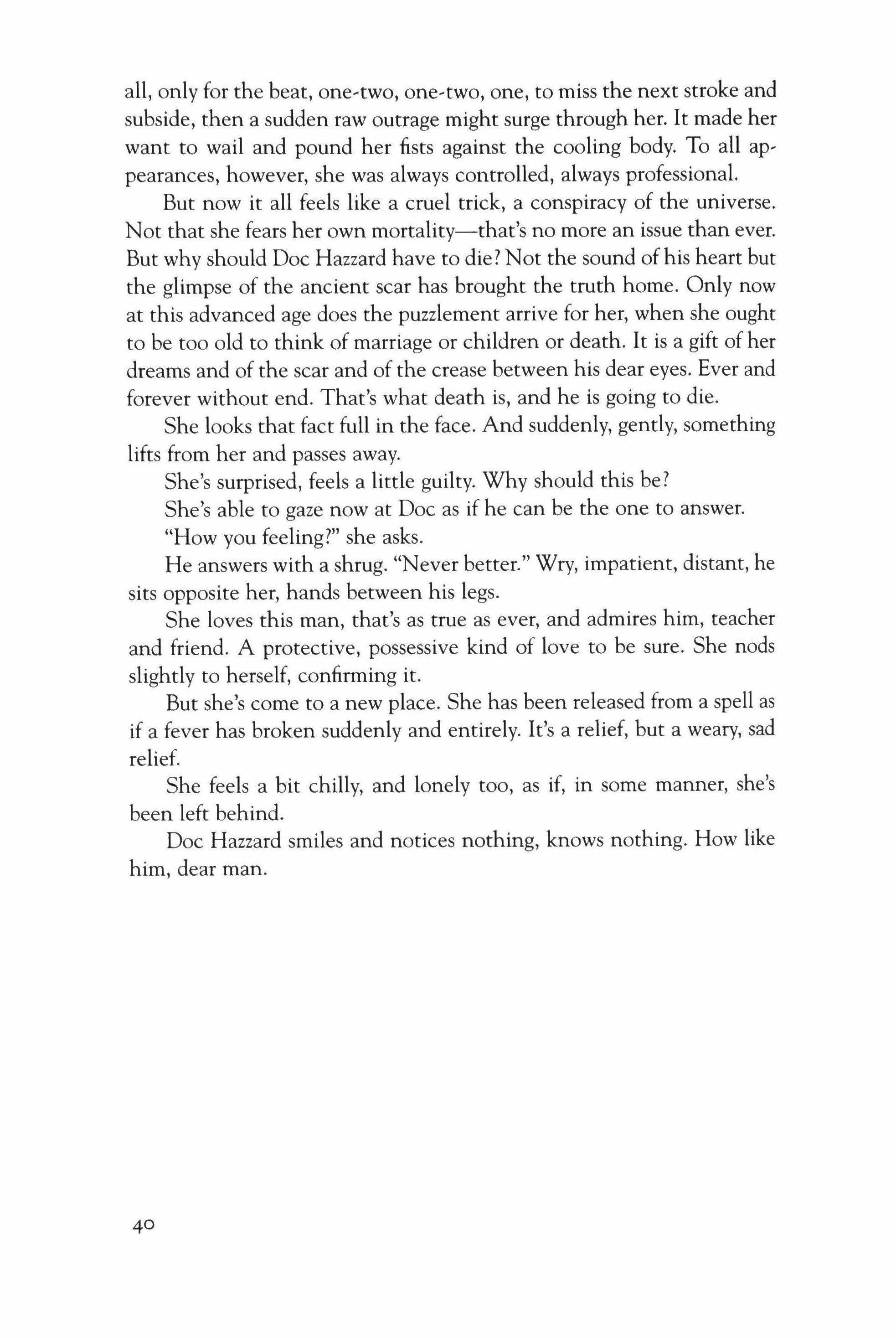
all, only for the beat, one-two, one-two, one, to miss the next stroke and subside, then a sudden raw outrage might surge through her. It made her want to wail and pound her fists against the cooling body. To all ap� pearances, however, she was always controlled, always professional.
But now it all feels like a cruel trick, a conspiracy of the universe. Not that she fears her own mortality-that's no more an issue than ever. But why should Doc Hazzard have to die? Not the sound ofhis heart but the glimpse of the ancient scar has brought the truth home. Only now at this advanced age does the puzzlement arrive for her, when she ought to be too old to think of marriage or children or death. It is a gift of her dreams and of the scar and of the crease between his dear eyes. Ever and forever without end. That's what death is, and he is going to die.
She looks that fact full in the face. And suddenly, gently, something lifts from her and passes away.
She's surprised, feels a little guilty. Why should this be?
She's able to gaze now at Doc as if he can be the one to answer.
"How you feeling?" she asks.
He answers with a shrug. "Never better." Wry, impatient, distant, he sits opposite her, hands between his legs.
She loves this man, that's as true as ever, and admires him, teacher and friend. A protective, possessive kind of love to be sure. She nods slightly to herself, confirming it.
But she's come to a new place. She has been released from a spell as if a fever has broken suddenly and entirely. It's a relief, but a weary, sad relief.
She feels a bit chilly, and lonely too, as if, in some manner, she's been left behind.
Doc Hazzard smiles and notices nothing, knows nothing. How like him, dear man.
Marie Myung Ok Lee

The Strip Mall and the Shaolin Temple
He'd been at this so long now, he recognized each prospective student as an easily categorized type as soon as they walked through the splintering door. There was the lady who did aerobics who wouldn't last two weeks amidst the fetid barefoot smell of the do-jang. There was the slightly crazed macho-man who wore dragon-embroidered satin jackets and carried his gear in a gym-issued workout bag he would have customized by adding in fabric paint or Wite-Out,-NEVER SURRENDER!!!!
There would also be, always, multiple bratty kids whose mothers had lost control of them and were now turning them over to him as if he were some kind of Life Skills Drill Sergeant instead of a martial arts instructor. At the opposite end of the spectrum would be the Korean child whose parents held the age-old belief that regular exercise would provide extra stamina for the long nights at the SAT cram schools; these kids were always instructed to stay away from the non-Korean kids, lest they become corrupted. Lastly, there would be the hobbyists, usually bored soccer moms or dads who took the classes to have something to do while waiting for their kids.
Mr. Kim=-, one of the bored soccer-moms was saying to him right now. Or should I call you Master Kim?
You can call me Sebastian, he said, to his great surprise. Part of the allure of taking Tae Kwon Do was being forced to learn all the Korean titles of respect: Sahbumnim, Sunsengnim, Kyosunim, KwangjangnimMaster, Teacher, Professor, Senior Student, President. It was quite a
41
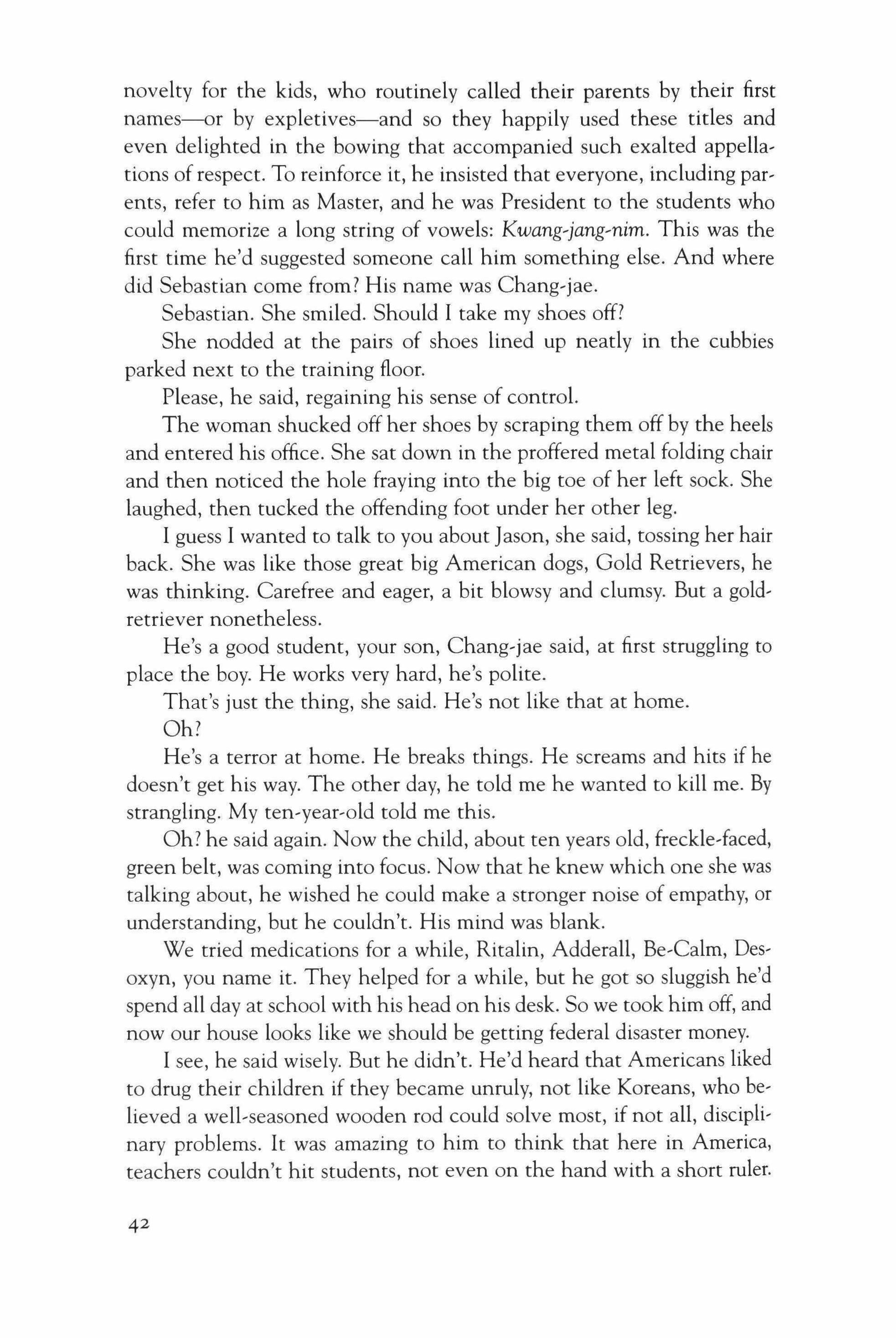
novelty for the kids, who routinely called their parents by their first names-or by expletives-and so they happily used these titles and even delighted in the bowing that accompanied such exalted appellations of respect. To reinforce it, he insisted that everyone, including parents, refer to him as Master, and he was President to the students who could memorize a long string of vowels: Kwang-jang-nim. This was the first time he'd suggested someone call him something else. And where did Sebastian come from? His name was Chang-jae.
Sebastian. She smiled. Should I take my shoes off?
She nodded at the pairs of shoes lined up neatly in the cubbies parked next to the training floor.
Please, he said, regaining his sense of control.
The woman shucked off her shoes by scraping them off by the heels and entered his office. She sat down in the proffered metal folding chair and then noticed the hole fraying into the big toe of her left sock. She laughed, then tucked the offending foot under her other leg.
I guess I wanted to talk to you about Jason, she said, tossing her hair back. She was like those great big American dogs, Gold Retrievers, he was thinking. Carefree and eager, a bit blowsy and clumsy. But a goldretriever nonetheless.
He's a good student, your son, Chang-jae said, at first struggling to place the boy. He works very hard, he's polite.
That's just the thing, she said. He's not like that at home.
Oh?
He's a terror at home. He breaks things. He screams and hits if he doesn't get his way. The other day, he told me he wanted to kill me. By strangling. My ten-year-old told me this.
Oh? he said again. Now the child, about ten years old, freckle-faced, green belt, was coming into focus. Now that he knew which one she was talking about, he wished he could make a stronger noise of empathy, or understanding, but he couldn't. His mind was blank.
We tried medications for a while, Ritalin, Adderall, Be-Calm, Desoxyn, you name it. They helped for a while, but he got so sluggish he'd spend all day at school with his head on his desk. So we took him off, and now our house looks like we should be getting federal disaster money.
I see, he said wisely. But he didn't. He'd heard that Americans liked to drug their children if they became unruly, not like Koreans, who believed a well-seasoned wooden rod could solve most, if not all, disciplinary problems. It was amazing to him to think that here in America, teachers couldn't hit students, not even on the hand with a short ruler.
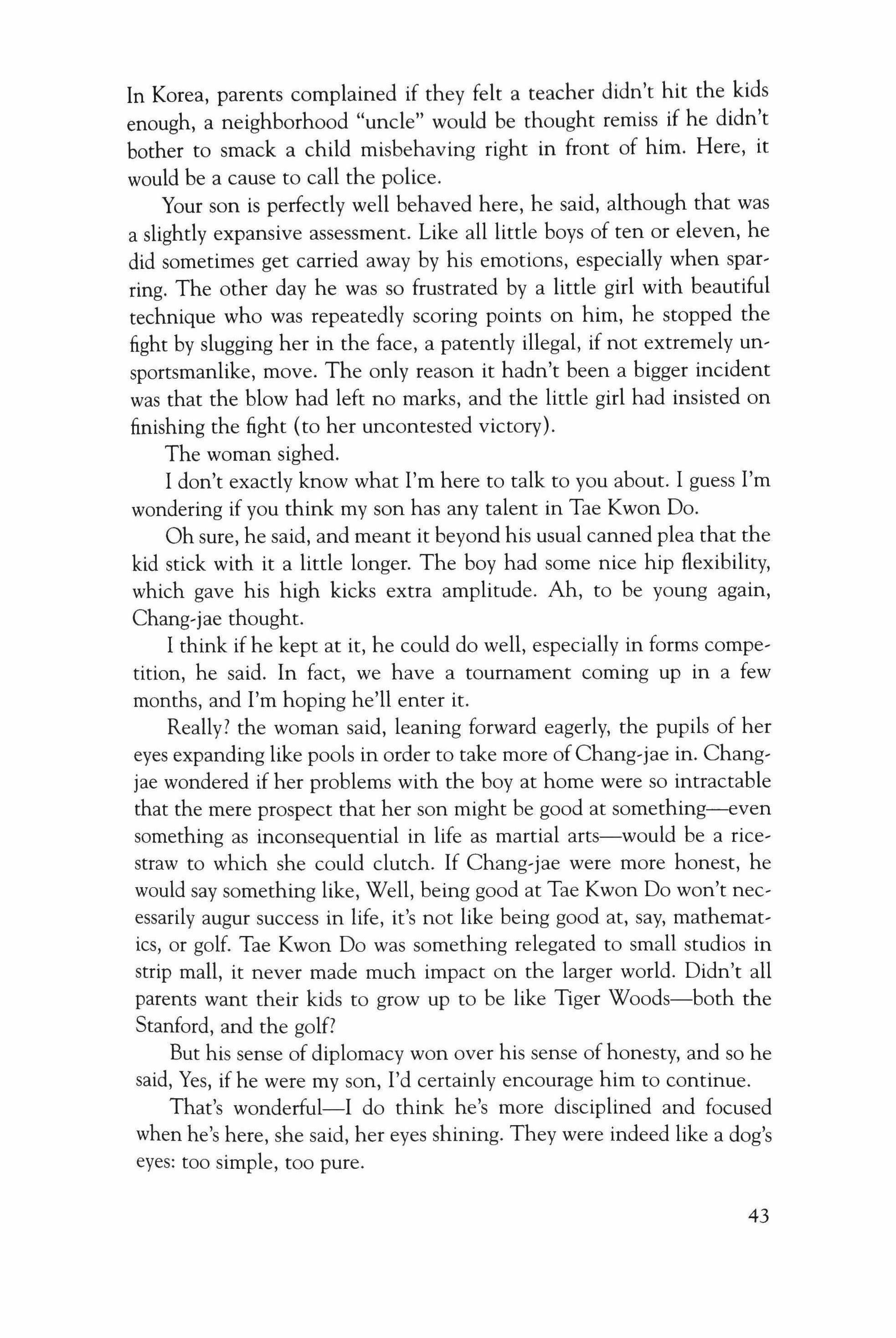
In Korea, parents complained if they felt a teacher didn't hit the kids enough, a neighborhood "uncle" would be thought remiss if he didn't bother to smack a child misbehaving right in front of him. Here, it would be a cause to call the police.
Your son is perfectly well behaved here, he said, although that was a slightly expansive assessment. Like all little boys of ten or eleven, he did sometimes get carried away by his emotions, especially when sparring. The other day he was so frustrated by a little girl with beautiful technique who was repeatedly scoring points on him, he stopped the fight by slugging her in the face, a patently illegal, if not extremely unsportsmanlike, move. The only reason it hadn't been a bigger incident was that the blow had left no marks, and the little girl had insisted on finishing the fight (to her uncontested victory).
The woman sighed.
I don't exactly know what I'm here to talk to you about. I guess I'm wondering if you think my son has any talent in Tae Kwon Do.
Oh sure, he said, and meant it beyond his usual canned plea that the kid stick with it a little longer. The boy had some nice hip flexibility, which gave his high kicks extra amplitude. Ah, to be young again, Chang-jae thought.
I think if he kept at it, he could do well, especially in forms competition, he said. In fact, we have a tournament coming up in a few months, and I'm hoping he'll enter it.
Really? the woman said, leaning forward eagerly, the pupils of her eyes expanding like pools in order to take more ofChang-jae in. Changjae wondered if her problems with the boy at home were so intractable that the mere prospect that her son might be good at something-even something as inconsequential in life as martial arts-would be a ricestraw to which she could clutch. If Chang-jae were more honest, he would say something like, Well, being good at Tae Kwon Do won't necessarily augur success in life, it's not like being good at, say, mathematics, or golf. Tae Kwon Do was something relegated to small studios in strip mall, it never made much impact on the larger world. Didn't all parents want their kids to grow up to be like Tiger Woods-both the Stanford, and the golf?
But his sense of diplomacy won over his sense of honesty, and so he said, Yes, if he were my son, I'd certainly encourage him to continue.
That's wonderful-I do think he's more disciplined and focused when he's here, she said, her eyes shining. They were indeed like a dog's eyes: too simple, too pure.
43
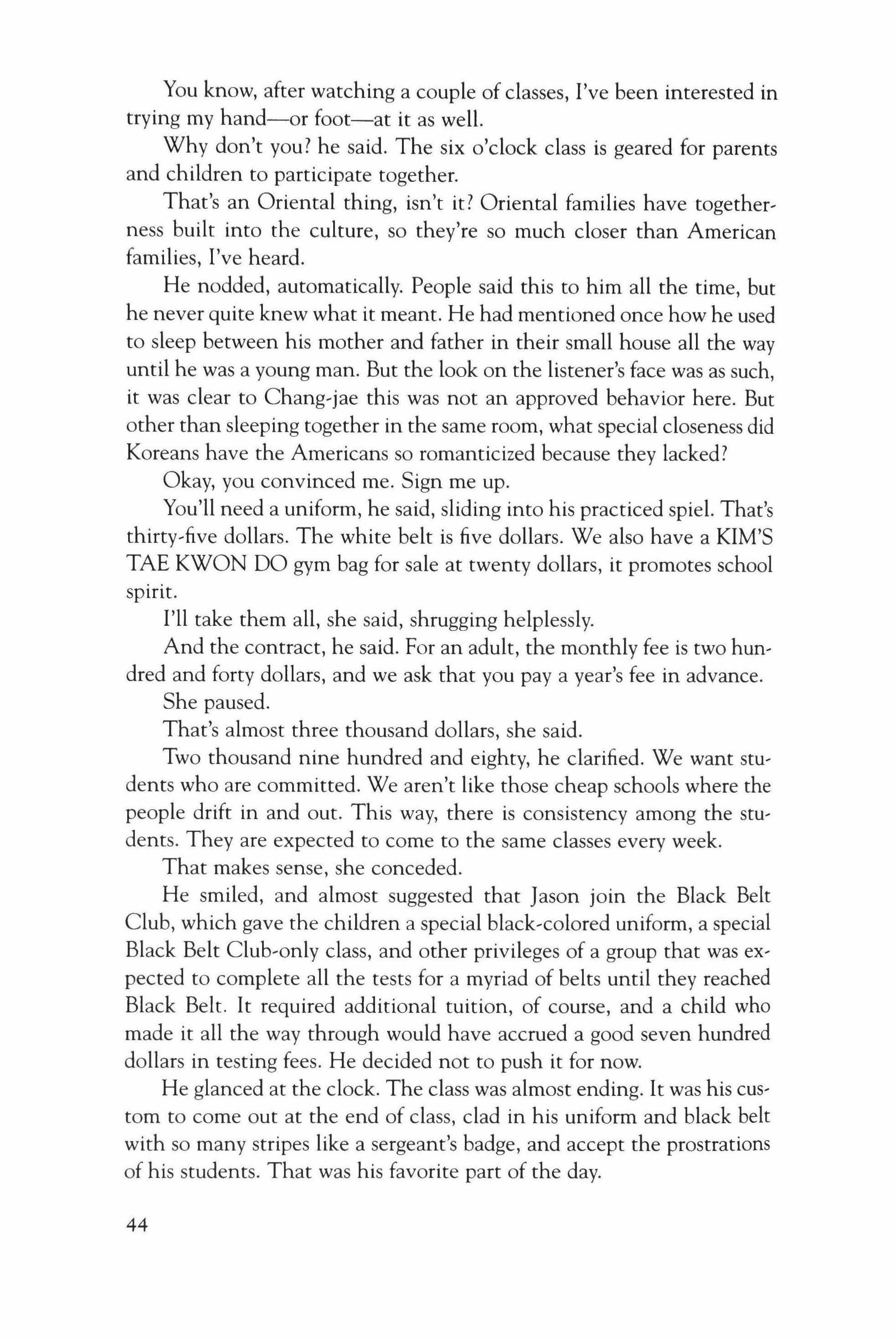
You know, after watching a couple of classes, I've been interested in trying my hand-or foot-at it as well.
Why don't you? he said. The six o'clock class is geared for parents and children to participate together.
That's an Oriental thing, isn't it? Oriental families have togetherness built into the culture, so they're so much closer than American families, I've heard.
He nodded, automatically. People said this to him all the time, but he never quite knew what it meant. He had mentioned once how he used to sleep between his mother and father in their small house all the way until he was a young man. But the look on the listener's face was as such, it was clear to Chang-jae this was not an approved behavior here. But other than sleeping together in the same room, what special closeness did Koreans have the Americans so romanticized because they lacked?
Okay, you convinced me. Sign me up.
You'll need a uniform, he said, sliding into his practiced spiel. That's thirty-five dollars. The white belt is five dollars. We also have a KIM'S TAE KWON DO gym bag for sale at twenty dollars, it promotes school spirit.
I'll take them all, she said, shrugging helplessly.
And the contract, he said. For an adult, the monthly fee is two hundred and forty dollars, and we ask that you pay a year's fee in advance.
She paused.
That's almost three thousand dollars, she said.
Two thousand nine hundred and eighty, he clarified. We want students who are committed. We aren't like those cheap schools where the people drift in and out. This way, there is consistency among the students. They are expected to come to the same classes every week.
That makes sense, she conceded.
He smiled, and almost suggested that Jason join the Black Belt Club, which gave the children a special black-colored uniform, a special Black Belt Club-only class, and other privileges of a group that was expected to complete all the tests for a myriad of belts until they reached Black Belt. It required additional tuition, of course, and a child who made it all the way through would have accrued a good seven hundred dollars in testing fees. He decided not to push it for now.
He glanced at the clock. The class was almost ending. It was his custom to come out at the end of class, clad in his uniform and black belt with so many stripes like a sergeant's badge, and accept the prostrations of his students. That was his favorite part of the day.
44
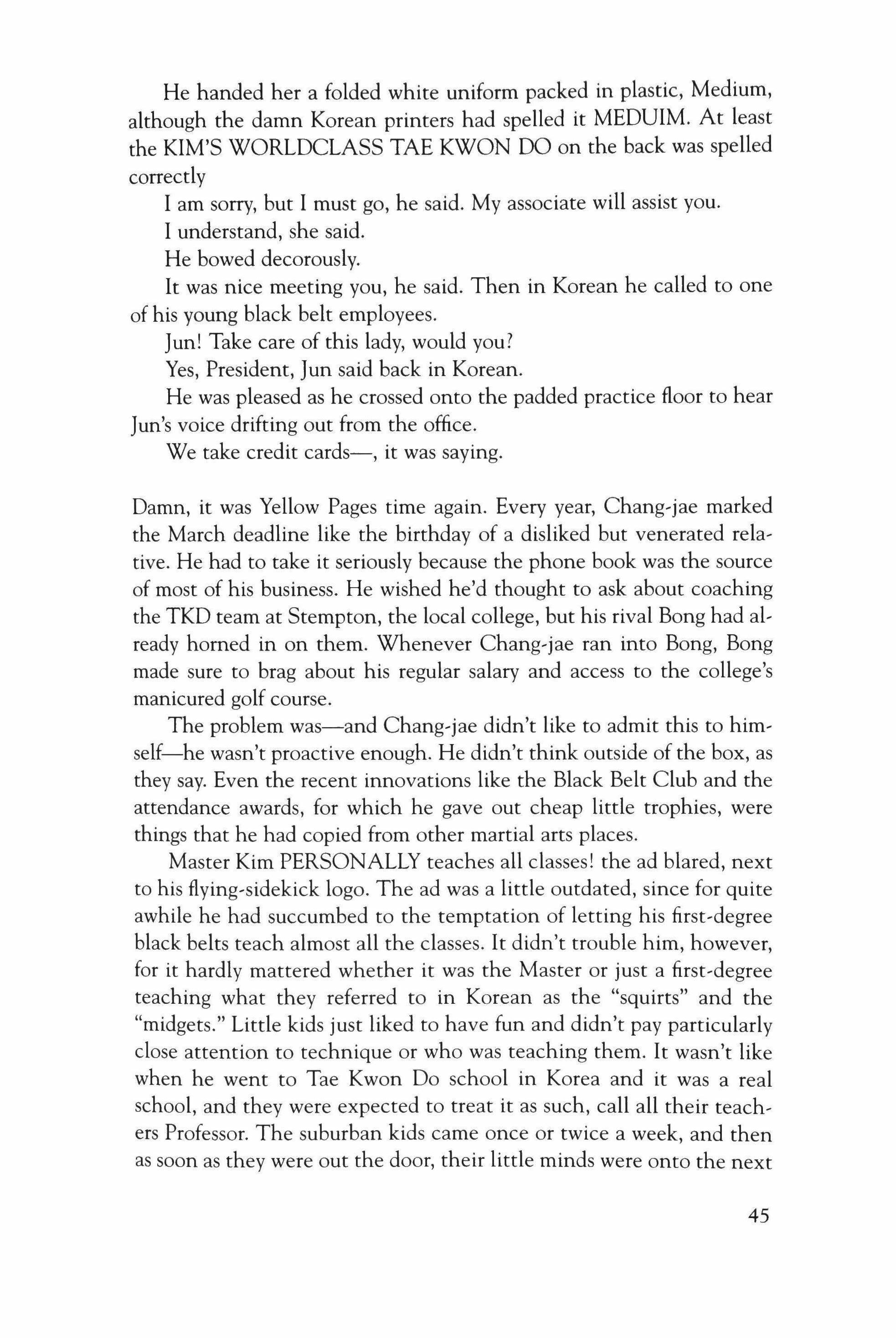
He handed her a folded white uniform packed in plastic, Medium, although the damn Korean printers had spelled it MEOUIM. At least the KIM'S WORLOCLASS TAE KWON 00 on the back was spelled correctly
I am sorry, but I must go, he said. My associate will assist you. I understand, she said.
He bowed decorously.
It was nice meeting you, he said. Then in Korean he called to one of his young black belt employees.
[un! Take care of this lady, would you?
Yes, President, Jun said back in Korean.
He was pleased as he crossed onto the padded practice floor to hear [uri's voice drifting out from the office.
We take credit cards-, it was saying.
Damn, it was Yellow Pages time again. Every year, Chang-jae marked the March deadline like the birthday of a disliked but venerated relative. He had to take it seriously because the phone book was the source of most of his business. He wished he'd thought to ask about coaching the TKO team at Stempton, the local college, but his rival Bong had already homed in on them. Whenever Chang-jae ran into Bong, Bong made sure to brag about his regular salary and access to the college's manicured golf course.
The problem was-and Chang-jae didn't like to admit this to himself-he wasn't proactive enough. He didn't think outside of the box, as they say. Even the recent innovations like the Black Belt Club and the attendance awards, for which he gave out cheap little trophies, were things that he had copied from other martial arts places.
Master Kim PERSONALLY teaches all classes! the ad blared, next to his flying-sidekick logo. The ad was a little outdated, since for quite awhile he had succumbed to the temptation of letting his first-degree black belts teach almost all the classes. It didn't trouble him, however, for it hardly mattered whether it was the Master or just a first-degree teaching what they referred to in Korean as the "squirts" and the "midgets." Little kids just liked to have fun and didn't pay particularly close attention to technique or who was teaching them. It wasn't like when he went to Tae Kwon Do school in Korea and it was a real school, and they were expected to treat it as such, call all their teachers Professor. The suburban kids came once or twice a week, and then as soon as they were out the door, their little minds were onto the next
45
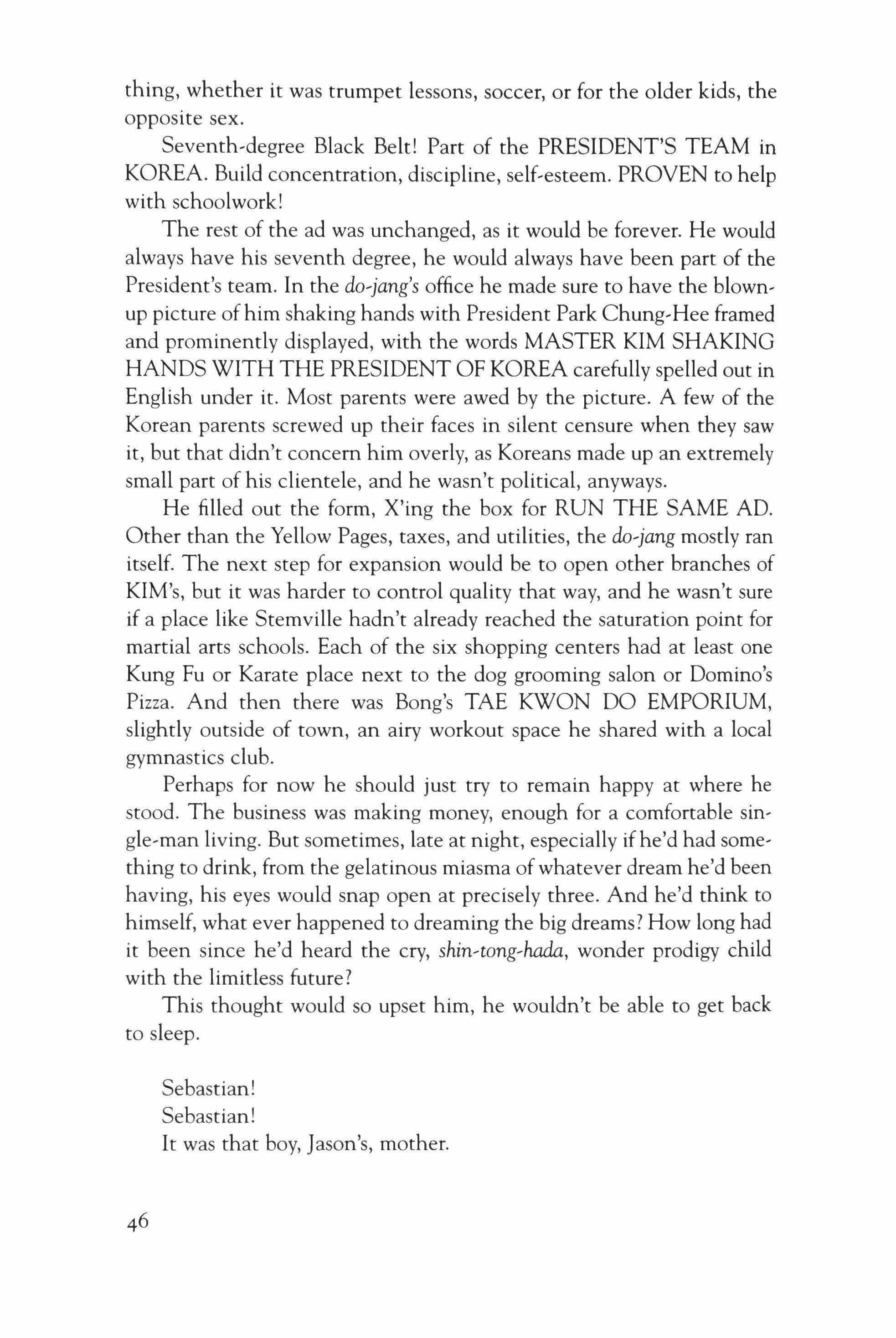
thing, whether it was trumpet lessons, soccer, or for the older kids, the opposite sex.
Seventh-degree Black Belt! Part of the PRESIDENT'S TEAM in KOREA. Build concentration, discipline, self-esteem. PROVEN to help with schoolwork!
The rest of the ad was unchanged, as it would be forever. He would always have his seventh degree, he would always have been part of the President's team. In the do-jang's office he made sure to have the blownup picture ofhim shaking hands with President Park Chung-Hee framed and prominently displayed, with the words MASTER KIM SHAKING HANDS WITH THE PRESIDENT OF KOREA carefully spelled out in English under it. Most parents were awed by the picture. A few of the Korean parents screwed up their faces in silent censure when they saw it, but that didn't concern him overly, as Koreans made up an extremely small part of his clientele, and he wasn't political, anyways.
He filled out the form, X'ing the box for RUN THE SAME AD. Other than the Yellow Pages, taxes, and utilities, the do-jang mostly ran itself. The next step for expansion would be to open other branches of KIM's, but it was harder to control quality that way, and he wasn't sure if a place like Stemville hadn't already reached the saturation point for martial arts schools. Each of the six shopping centers had at least one Kung Fu or Karate place next to the dog grooming salon or Domino's Pizza. And then there was Bong's TAE KWON DO EMPORIUM, slightly outside of town, an airy workout space he shared with a local gymnastics club.
Perhaps for now he should just try to remain happy at where he stood. The business was making money, enough for a comfortable single-man living. But sometimes, late at night, especially ifhe'd had something to drink, from the gelatinous miasma ofwhatever dream he'd been having, his eyes would snap open at precisely three. And he'd think to himself, what ever happened to dreaming the big dreams? How long had it been since he'd heard the cry, shin-tong-hada, wonder prodigy child with the limitless future?
This thought would so upset him, he wouldn't be able to get back to sleep.
Sebastian!
Sebastian!
It was that boy, Jason's, mother.
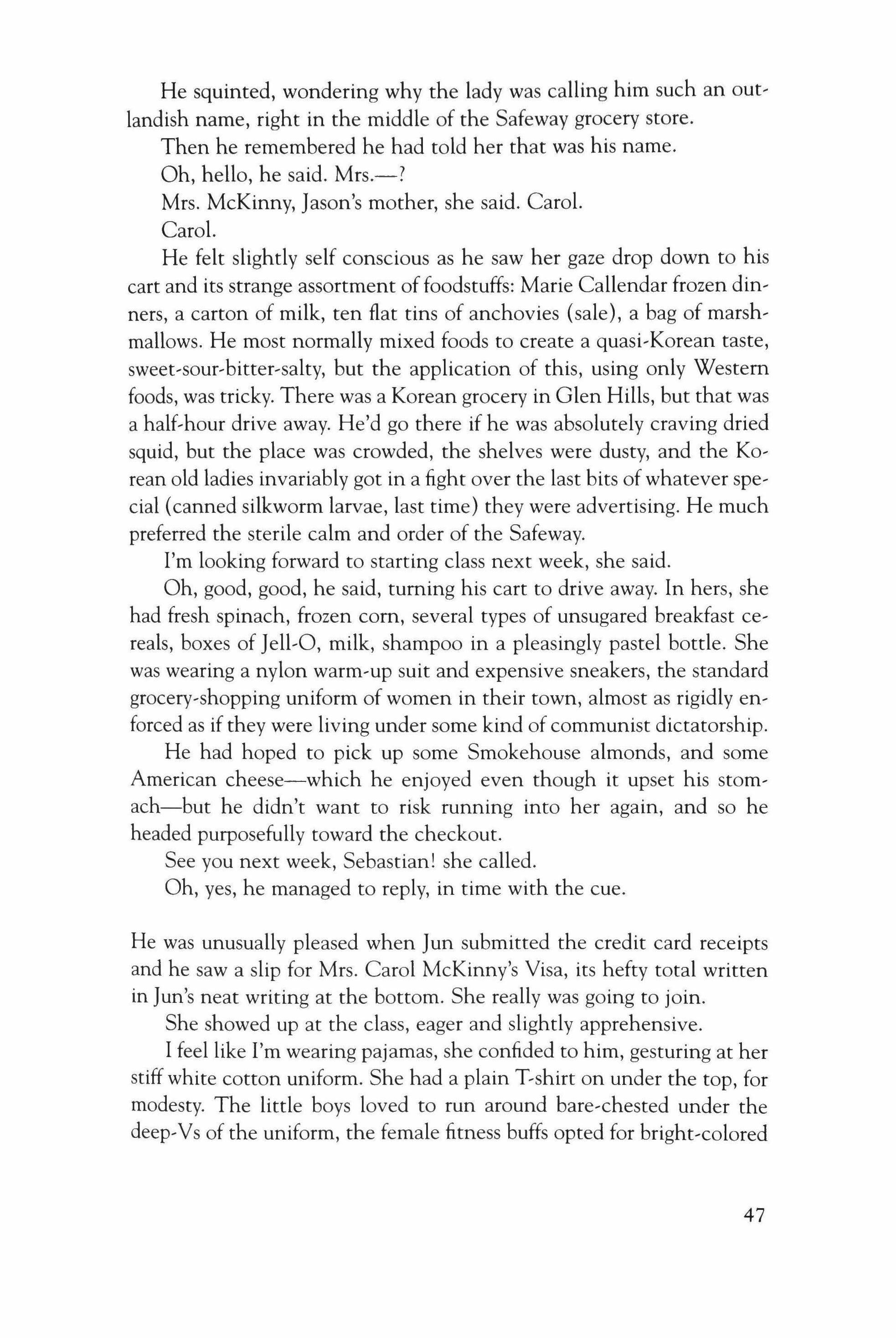
He squinted, wondering why the lady was calling him such an outlandish name, right in the middle of the Safeway grocery store.
Then he remembered he had told her that was his name.
Oh, hello, he said. Mrs.-?
Mrs. McKinny, Jason's mother, she said. Carol. Carol.
He felt slightly self conscious as he saw her gaze drop down to his cart and its strange assortment offoodstuffs: Marie Callendar frozen dinners, a carton of milk, ten flat tins of anchovies (sale), a bag of marshmallows. He most normally mixed foods to create a quasi-Korean taste, sweet-sour-bitter-salty, but the application of this, using only Western foods, was tricky. There was a Korean grocery in Glen Hills, but that was a half-hour drive away. He'd go there if he was absolutely craving dried squid, but the place was crowded, the shelves were dusty, and the Korean old ladies invariably got in a fight over the last bits of whatever special (canned silkworm larvae, last time) they were advertising. He much preferred the sterile calm and order of the Safeway.
I'm looking forward to starting class next week, she said.
Oh, good, good, he said, turning his cart to drive away. In hers, she had fresh spinach, frozen com, several types of unsugared breakfast cereals, boxes of [ell-O, milk, shampoo in a pleasingly pastel bottle. She was wearing a nylon warm-up suit and expensive sneakers, the standard grocery-shopping uniform of women in their town, almost as rigidly enforced as if they were living under some kind of communist dictatorship.
He had hoped to pick up some Smokehouse almonds, and some American cheese-which he enjoyed even though it upset his stomach-but he didn't want to risk running into her again, and so he headed purposefully toward the checkout.
See you next week, Sebastian! she called.
Oh, yes, he managed to reply, in time with the cue.
He was unusually pleased when [un submitted the credit card receipts and he saw a slip for Mrs. Carol McKinny's Visa, its hefty total written in [uri's neat writing at the bottom. She really was going to join.
She showed up at the class, eager and slightly apprehensive.
I feel like I'm wearing pajamas, she confided to him, gesturing at her stiff white cotton uniform. She had a plain T-shirt on under the top, for modesty. The little boys loved to run around bare-chested under the deep-Vs of the uniform, the female fitness buffs opted for bright-colored
47
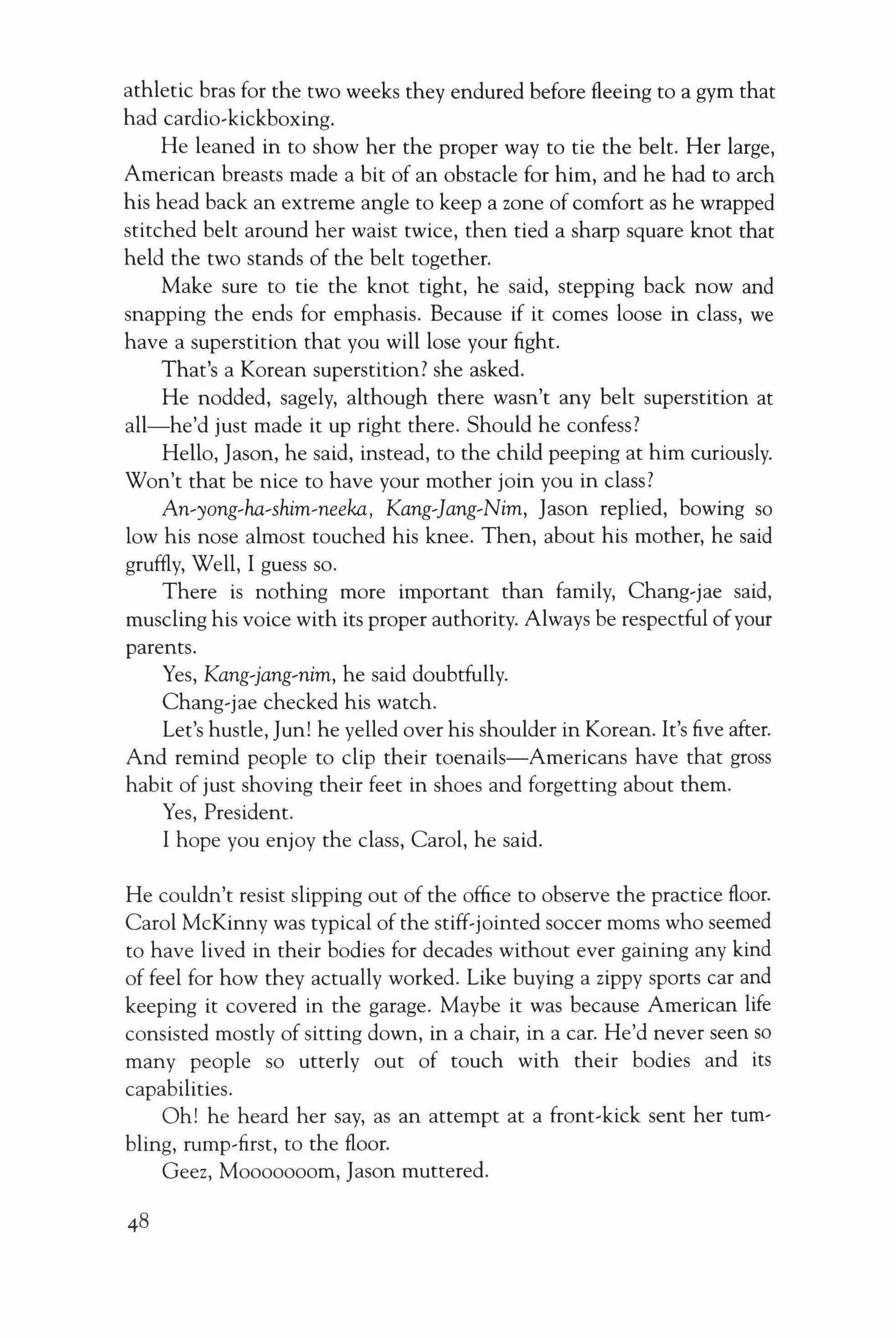
athletic bras for the two weeks they endured before fleeing to a gym that had cardio-kickboxing.
He leaned in to show her the proper way to tie the belt. Her large, American breasts made a bit of an obstacle for him, and he had to arch his head back an extreme angle to keep a zone of comfort as he wrapped stitched belt around her waist twice, then tied a sharp square knot that held the two stands of the belt together.
Make sure to tie the knot tight, he said, stepping back now and snapping the ends for emphasis. Because if it comes loose in class, we have a superstition that you will lose your fight.
That's a Korean superstition? she asked.
He nodded, sagely, although there wasn't any belt superstition at all-he'd just made it up right there. Should he confess?
Hello, Jason, he said, instead, to the child peeping at him curiously. Won't that be nice to have your mother join you in class?
An�yong�ha�shim�neeka, Kang�Jang�Nim, Jason replied, bowing so low his nose almost touched his knee. Then, about his mother, he said gruffly, Well, I guess so.
There is nothing more important than family, Chang-jae said, muscling his voice with its proper authority. Always be respectful ofyour parents.
Yes, Kang�jang�nim, he said doubtfully. Chang-jae checked his watch.
Let's hustle, [unl he yelled over his shoulder in Korean. It's five after. And remind people to clip their toenails-Americans have that gross habit of just shoving their feet in shoes and forgetting about them.
Yes, President.
I hope you enjoy the class, Carol, he said.
He couldn't resist slipping out of the office to observe the practice floor. Carol McKinny was typical of the stiff-jointed soccer moms who seemed to have lived in their bodies for decades without ever gaining any kind of feel for how they actually worked. Like buying a zippy sports car and keeping it covered in the garage. Maybe it was because American life consisted mostly of sitting down, in a chair, in a car. He'd never seen so many people so utterly out of touch with their bodies and its capabilities.
Oh! he heard her say, as an attempt at a front-kick sent her tumbling, rump-first, to the floor.
Geez, Mooooooom, Jason muttered.
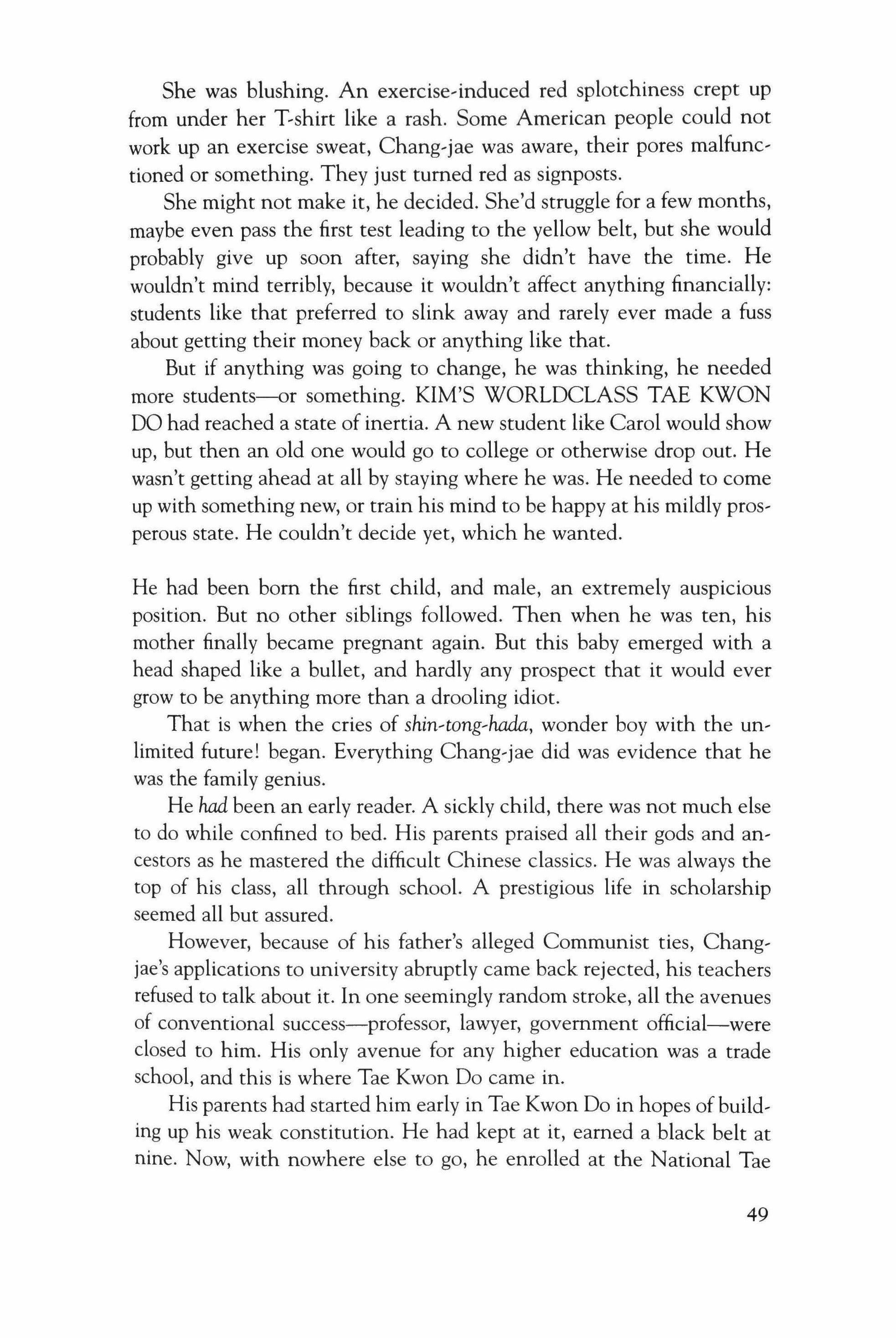
She was blushing. An exercise'induced red splotchiness crept up from under her T,shirt like a rash. Some American people could not work up an exercise sweat, Chang-jae was aware, their pores malfunctioned or something. They just turned red as signposts.
She might not make it, he decided. She'd struggle for a few months, maybe even pass the first test leading to the yellow belt, but she would probably give up soon after, saying she didn't have the time. He wouldn't mind terribly, because it wouldn't affect anything financially: students like that preferred to slink away and rarely ever made a fuss about getting their money back or anything like that.
But if anything was going to change, he was thinking, he needed more students-or something. KIM'S WORLDCLASS TAE KWON DO had reached a state of inertia. A new student like Carol would show up, but then an old one would go to college or otherwise drop out. He wasn't getting ahead at all by staying where he was. He needed to come up with something new, or train his mind to be happy at his mildly pros' perous state. He couldn't decide yet, which he wanted.
He had been born the first child, and male, an extremely auspicious position. But no other siblings followed. Then when he was ten, his mother finally became pregnant again. But this baby emerged with a head shaped like a bullet, and hardly any prospect that it would ever grow to be anything more than a drooling idiot.
That is when the cries of shin,tong,hada, wonder boy with the unlimited future! began. Everything Chang-jae did was evidence that he was the family genius.
He had been an early reader. A sickly child, there was not much else to do while confined to bed. His parents praised all their gods and an, cestors as he mastered the difficult Chinese classics. He was always the top of his class, all through school. A prestigious life in scholarship seemed all but assured.
However, because of his father's alleged Communist ties, Chang, jae's applications to university abruptly came back rejected, his teachers refused to talk about it. In one seemingly random stroke, all the avenues of conventional success-professor, lawyer, government official-were closed to him. His only avenue for any higher education was a trade school, and this is where Tae Kwon Do came in.
His parents had started him early in Tae Kwon Do in hopes ofbuild, ing up his weak constitution. He had kept at it, earned a black belt at nine. Now, with nowhere else to go, he enrolled at the National Tae
49
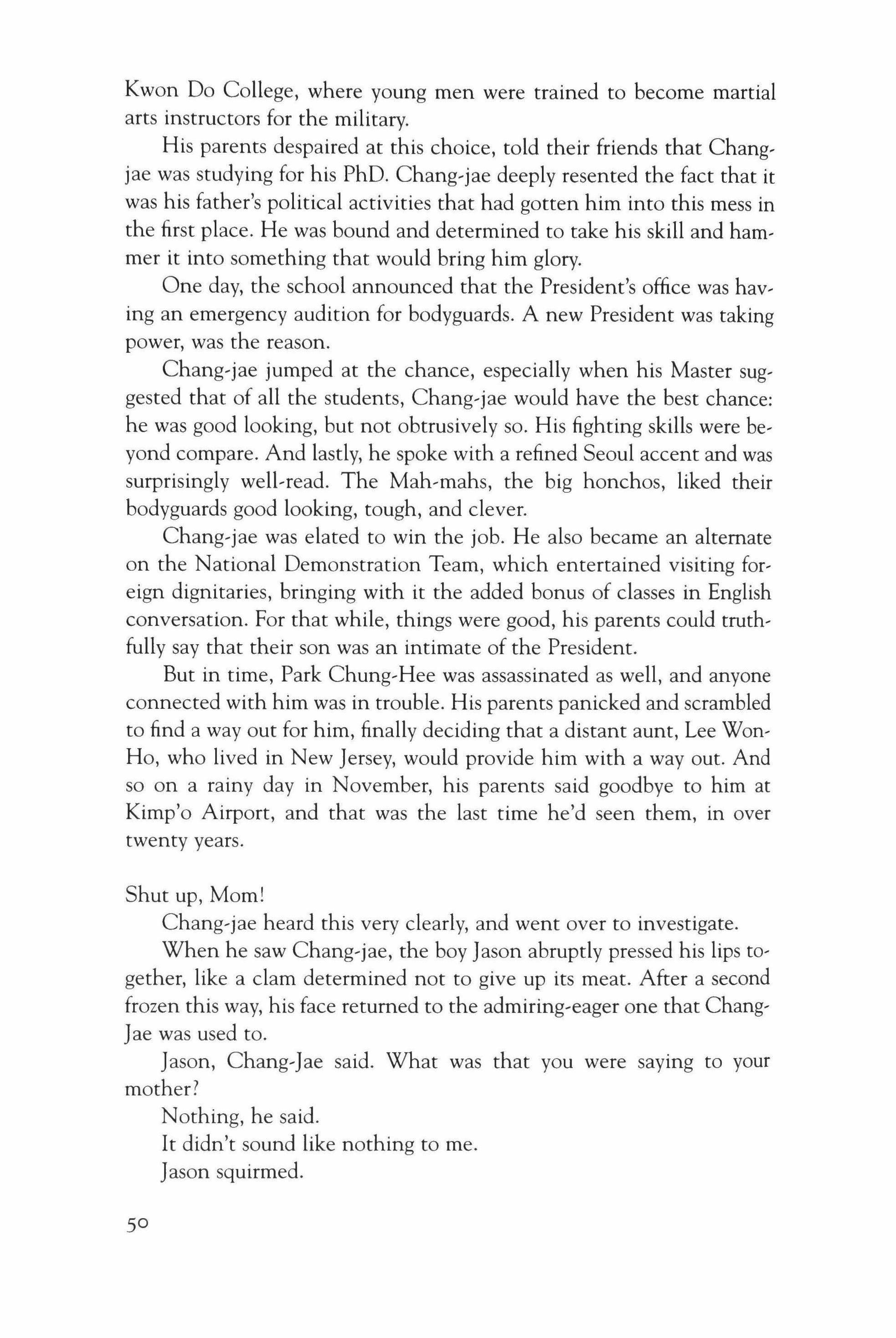
Kwon Do College, where young men were trained to become martial arts instructors for the military.
His parents despaired at this choice, told their friends that Changjae was studying for his PhD. Chang-jae deeply resented the fact that it was his father's political activities that had gotten him into this mess in the first place. He was bound and determined to take his skill and hammer it into something that would bring him glory.
One day, the school announced that the President's office was having an emergency audition for bodyguards. A new President was taking power, was the reason.
Chang-jae jumped at the chance, especially when his Master suggested that of all the students, Chang-jae would have the best chance: he was good looking, but not obtrusively so. His fighting skills were beyond compare. And lastly, he spoke with a refined Seoul accent and was surprisingly well-read. The Mah-mahs, the big honchos, liked their bodyguards good looking, tough, and clever.
Chang-jae was elated to win the job. He also became an alternate on the National Demonstration Team, which entertained visiting foreign dignitaries, bringing with it the added bonus of classes in English conversation. For that while, things were good, his parents could truthfully say that their son was an intimate of the President.
But in time, Park Chung-Hee was assassinated as well, and anyone connected with him was in trouble. His parents panicked and scrambled to find a way out for him, finally deciding that a distant aunt, Lee WonHo, who lived in New Jersey, would provide him with a way out. And so on a rainy day in November, his parents said goodbye to him at Kimp'o Airport, and that was the last time he'd seen them, in over twenty years.
Shut up, Mom!
Chang-jae heard this very clearly, and went over to investigate. When he saw Chang-jae, the boy Jason abruptly pressed his lips together, like a clam determined not to give up its meat. After a second frozen this way, his face returned to the admiring-eager one that ChangJae was used to.
Jason, Chang-J ae said. What was that you were saying to your mother?
Nothing, he said. It didn't sound like nothing to me.
Jason squirmed.
50
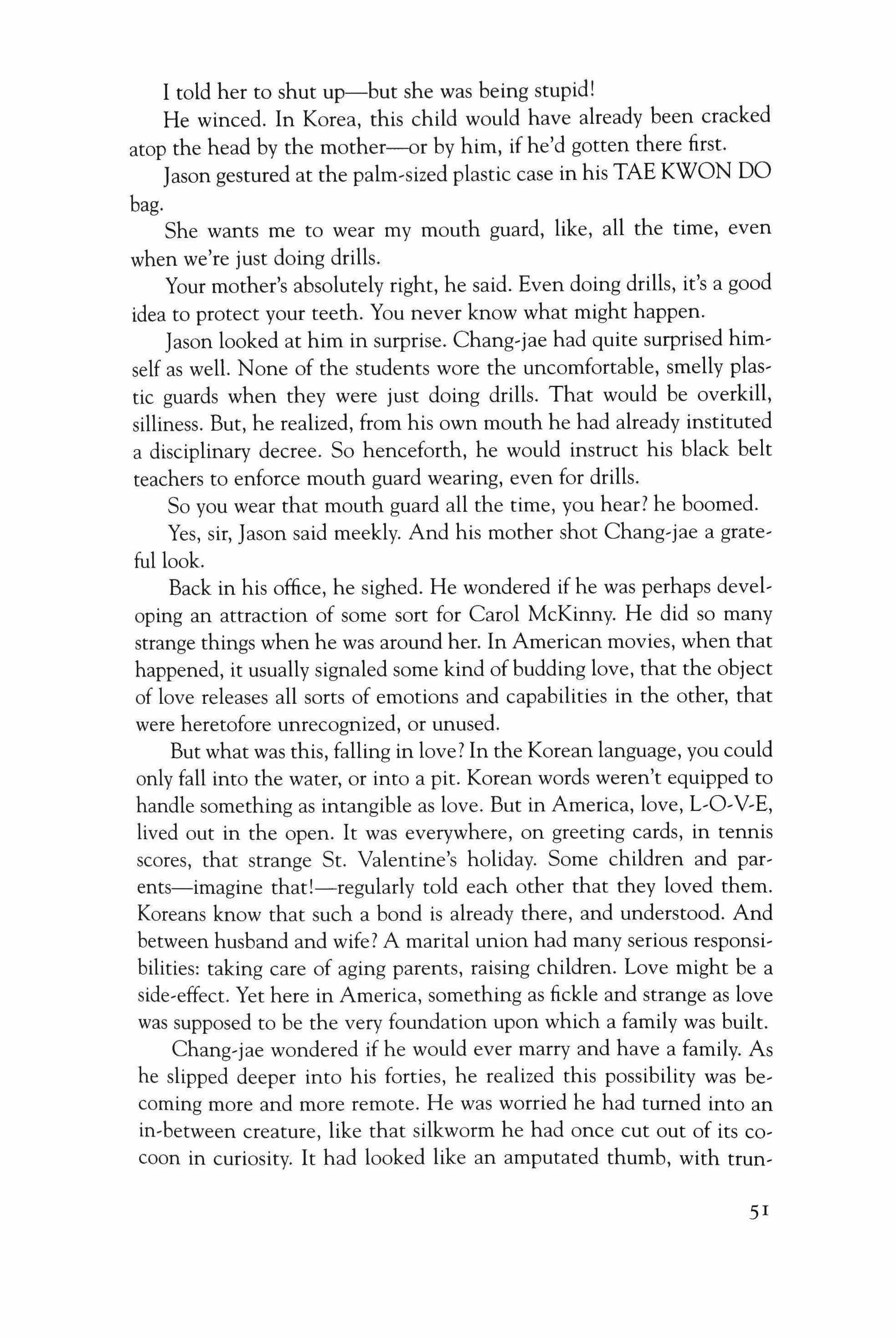
I told her to shut up-but she was being stupid!
He winced. In Korea, this child would have already been cracked atop the head by the mother-or by him, if he'd gotten there first.
Jason gestured at the palm-sized plastic case in his TAE KWON DO bag.
She wants me to wear my mouth guard, like, all the time, even when we're just doing drills.
Your mother's absolutely right, he said. Even doing drills, it's a good idea to protect your teeth. You never know what might happen.
Jason looked at him in surprise. Chang-jae had quite surprised himself as well. None of the students wore the uncomfortable, smelly plastic guards when they were just doing drills. That would be overkill, silliness. But, he realized, from his own mouth he had already instituted a disciplinary decree. So henceforth, he would instruct his black belt teachers to enforce mouth guard wearing, even for drills.
So you wear that mouth guard all the time, you hear? he boomed.
Yes, sir, Jason said meekly. And his mother shot Chang-jae a gratefullook.
Back in his office, he sighed. He wondered if he was perhaps developing an attraction of some sort for Carol McKinny. He did so many strange things when he was around her. In American movies, when that happened, it usually signaled some kind ofbudding love, that the object of love releases all sorts of emotions and capabilities in the other, that were heretofore unrecognized, or unused.
But what was this, falling in love? In the Korean language, you could only fall into the water, or into a pit. Korean words weren't equipped to handle something as intangible as love. But in America, love, L�O�V�E, lived out in the open. It was everywhere, on greeting cards, in tennis scores, that strange St. Valentine's holiday. Some children and parents-imagine thad-regularly told each other that they loved them. Koreans know that such a bond is already there, and understood. And between husband and wife? A marital union had many serious responsibilities: taking care of aging parents, raising children. Love might be a side-effect. Yet here in America, something as fickle and strange as love was supposed to be the very foundation upon which a family was built.
Chang-jae wondered if he would ever marry and have a family. As he slipped deeper into his forties, he realized this possibility was becoming more and more remote. He was worried he had turned into an in-between creature, like that silkworm he had once cut out of its cocoon in curiosity. It had looked like an amputated thumb, with trun-
51
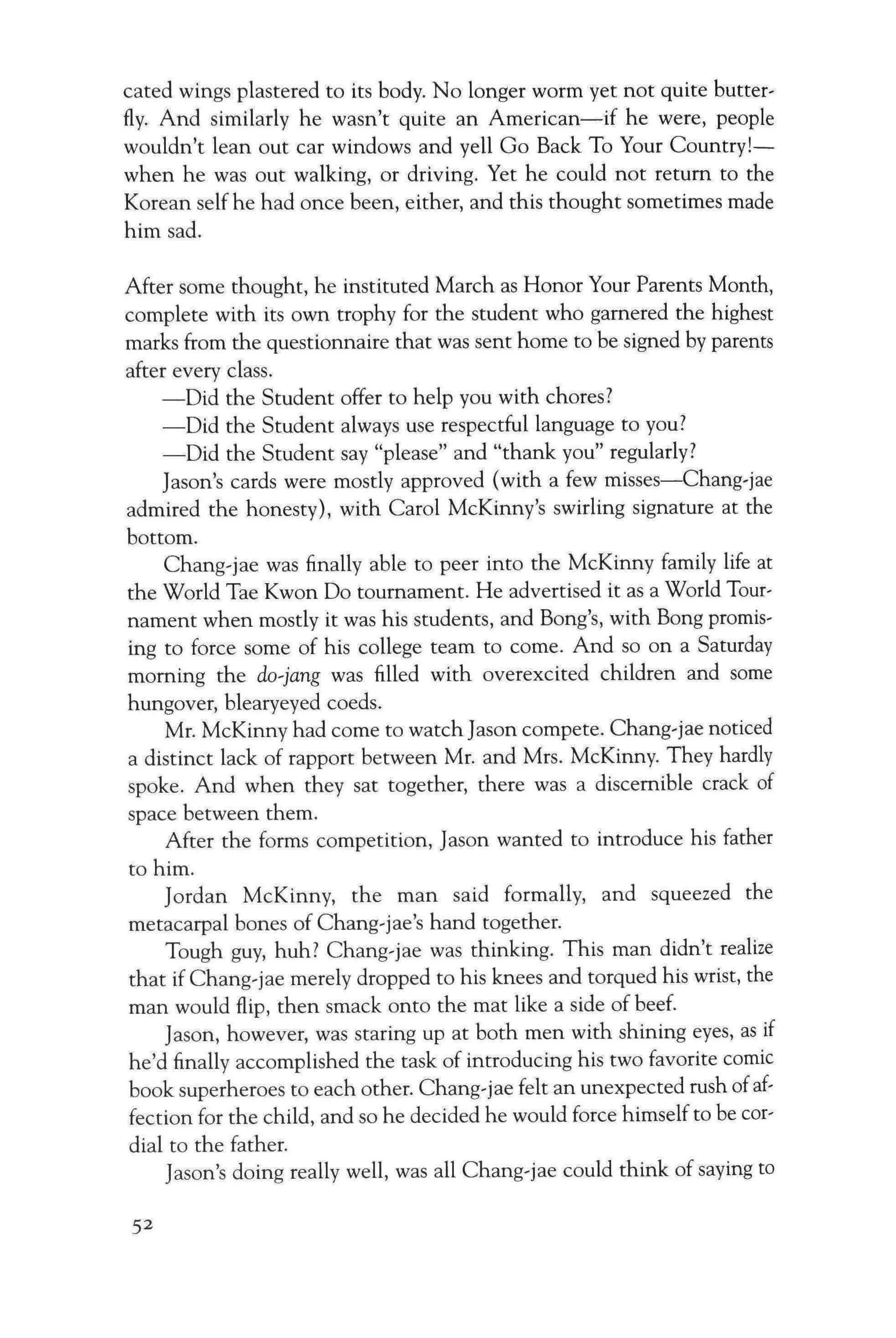
cated wings plastered to its body. No longer worm yet not quite butterfly. And similarly he wasn't quite an American-if he were, people wouldn't lean out car windows and yell Go Back To Your Country!when he was out walking, or driving. Yet he could not return to the Korean selfhe had once been, either, and this thought sometimes made him sad.
After some thought, he instituted March as Honor Your Parents Month, complete with its own trophy for the student who garnered the highest marks from the questionnaire that was sent home to be signed by parents after every class.
-Did the Student offer to help you with chores?
-Did the Student always use respectful language to you?
-Did the Student say "please" and "thank you" regularly?
Jason's cards were mostly approved (with a few misses-Chang-jae admired the honesty), with Carol McKinny's swirling signature at the bottom.
Chang-jae was finally able to peer into the McKinny family life at the World Tae Kwon Do tournament. He advertised it as a World Tournament when mostly it was his students, and Bong's, with Bong promising to force some of his college team to come. And so on a Saturday morning the do-jang was filled with overexcited children and some hungover, blearyeyed coeds.
Mr. McKinny had come to watch Jason compete. Chang-jae noticed a distinct lack of rapport between Mr. and Mrs. McKinny. They hardly spoke. And when they sat together, there was a discernible crack of space between them.
After the forms competition, Jason wanted to introduce his father to him.
Jordan McKinny, the man said formally, and squeezed the metacarpal bones of Chang-jae's hand together.
Tough guy, huh? Chang-jae was thinking. This man didn't realize that if Chang-jae merely dropped to his knees and torqued his wrist, the man would flip, then smack onto the mat like a side of beef.
Jason, however, was staring up at both men with shining eyes, as if he'd finally accomplished the task of introducing his two favorite comic book superheroes to each other. Chang-jae felt an unexpected rush ofaffection for the child, and so he decided he would force himself to be cordial to the father.
Jason's doing really well, was all Chang-jae could think of saying to

him. Look how he won a third-place trophy in the forms competition. Verrrry impressive.
Uh huh, even my wife's getting into this Tie Kwon Do business, he said.
Chang-jae suddenly noticed that Mrs. McKinny, Carol, wasn't there. As Chang-jae walked away, he could hear Jason's voice, flutelike, floating over the dank air of the gym.
Isn't Master Kim the greatest? He used to be the bodyguard for the president of Korea!
Ah, the rest should go pretty fast, Chang-jae mused, and then he could go home and have a beer and some marshmallows.
He was surprised to see Carol McKinny striding across the floor in her uniform.
Hello, Carol, he said, letting the puzzlement on his face stay there.
Hi, Sebastian, she said. It was so thrilling watching Jason do his stuff. He practiced quite a bit at home, you know.
Then she looked down at her clothes.
Oh, I've decided to compete. It's not too late, is it?
Oh no, of course not.
Great, she said. Her hair was pulled back from her face with a fabric covered elastic. She looked like a girl.
Well, I'd better go warm up.
Good luck, Carol.
In the intervening months, Carol McKinny had come so studiously and worked so hard he had awarded her a yellow belt a little early. She sometimes even stayed after to practice more; he knew she was there when he'd catch an aromatic whiff of her BenGay.
There were enough yellow belts from the college team to fill up the forms competition. Carol moved the wrong way during her performance, forgot to bow at the end, and didn't place. Chang-jae assumed she wasn't going to fight, but the next thing he knew he saw her putting on her equipment: foam helmet, chest plate, arm and leg pads, mouth guard.
The yellow-belt pool had dwindled to a few college students and a dragon-jacket type from Bong's school. It was common to have far fewer competitors in the fighting because many people disliked the possibility of injury, and so Chang-jae was forced to mix the sexes.
He wondered how Carol would do against a strong female student in her twenties, but he was pleasantly surprised to see that after stepping
53
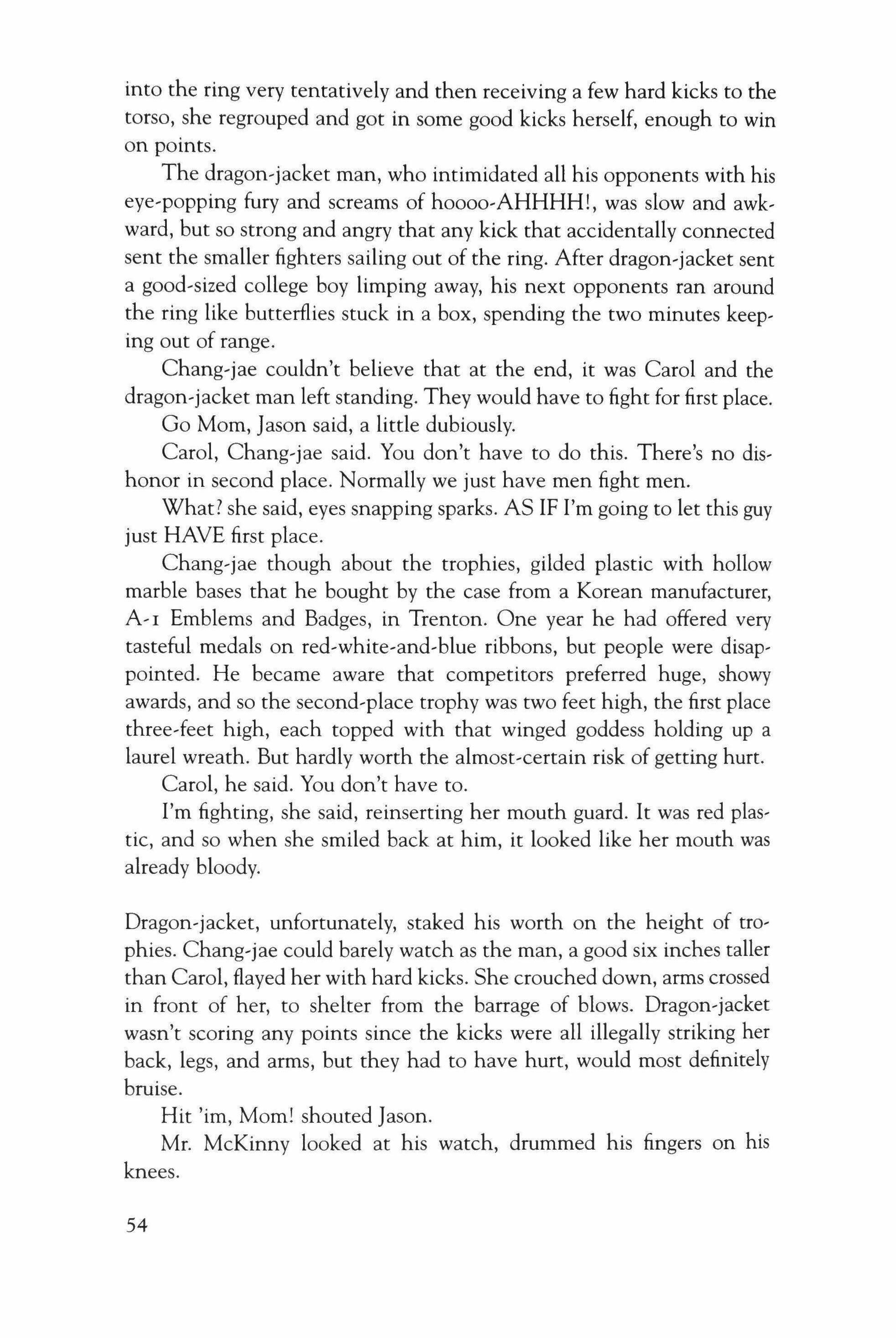
into the ring very tentatively and then receiving a few hard kicks to the torso, she regrouped and got in some good kicks herself, enough to win on points.
The dragon-jacket man, who intimidated all his opponents with his eye-popping fury and screams of hoooo�AHHHH!, was slow and awkward, but so strong and angry that any kick that accidentally connected sent the smaller fighters sailing out of the ring. After dragon-jacket sent a good-sized college boy limping away, his next opponents ran around the ring like butterflies stuck in a box, spending the two minutes keeping out of range.
Chang-jae couldn't believe that at the end, it was Carol and the dragon-jacket man left standing. They would have to fight for first place.
Go Mom, Jason said, a little dubiously.
Carol, Chang-jae said. You don't have to do this. There's no dishonor in second place. Normally we just have men fight men.
What? she said, eyes snapping sparks. AS IF I'm going to let this guy just HAVE first place.
Chang-jae though about the trophies, gilded plastic with hollow marble bases that he bought by the case from a Korean manufacturer, A� I Emblems and Badges, in Trenton. One year he had offered very tasteful medals on red-white-and-blue ribbons, but people were disappointed. He became aware that competitors preferred huge, showy awards, and so the second-place trophy was two feet high, the first place three-feet high, each topped with that winged goddess holding up a laurel wreath. But hardly worth the almost-certain risk of getting hurt.
Carol, he said. You don't have to.
I'm fighting, she said, reinserting her mouth guard. It was red plastic, and so when she smiled back at him, it looked like her mouth was already bloody.
Dragon-jacket, unfortunately, staked his worth on the height of trophies. Chang-jae could barely watch as the man, a good six inches taller than Carol, flayed her with hard kicks. She crouched down, arms crossed in front of her, to shelter from the barrage of blows. Dragon-jacket wasn't scoring any points since the kicks were all illegally striking her back, legs, and arms, but they had to have hurt, would most definitely bruise.
Hit 'im, Mom! shouted Jason.
Mr. McKinny looked at his watch, drummed his fingers on his knees.
54
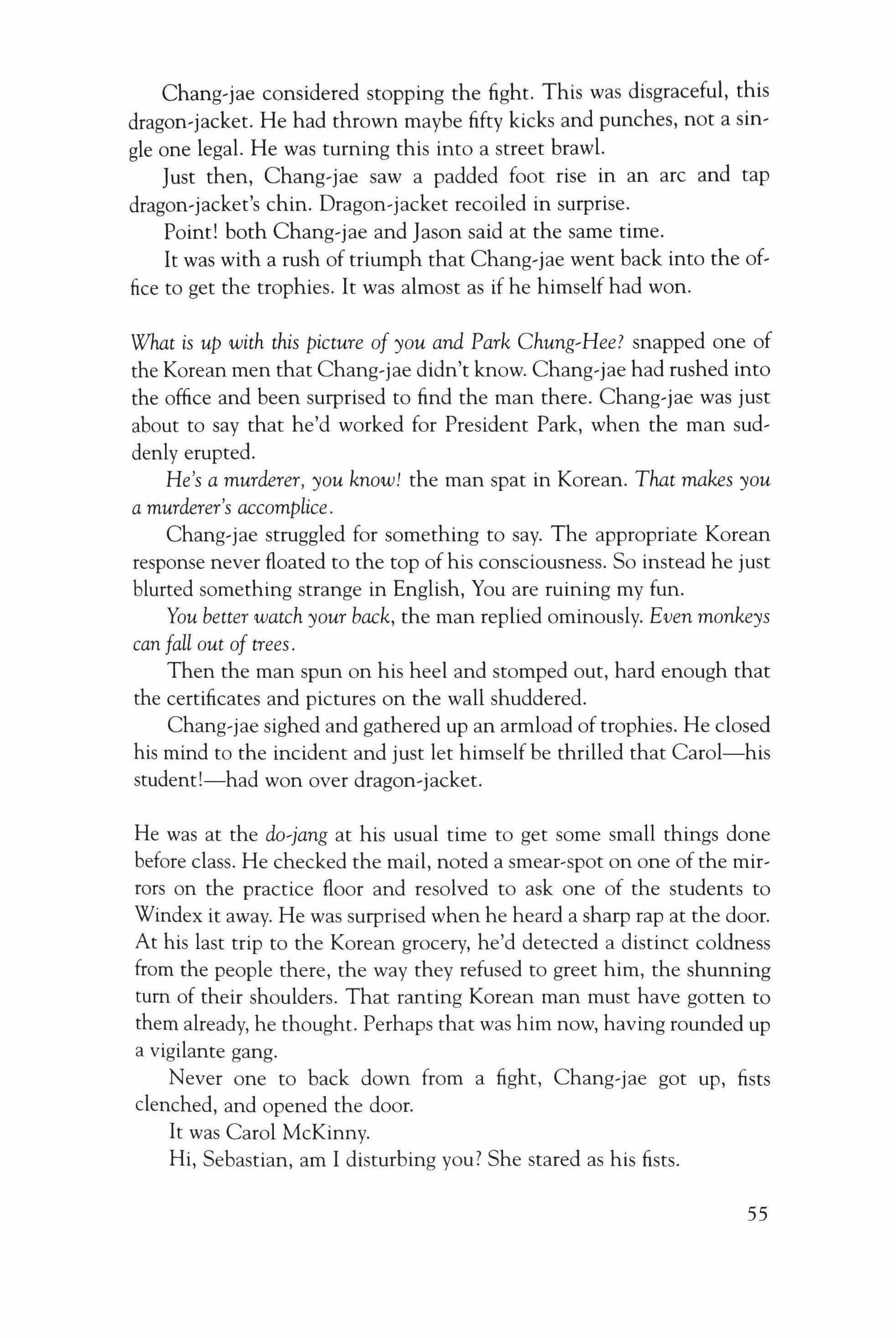
Chang-jae considered stopping the fight. This was disgraceful, this dragon-jacket. He had thrown maybe fifty kicks and punches, not a single one legal. He was turning this into a street brawl.
Just then, Chang-jae saw a padded foot rise in an arc and tap dragon-jacket's chin. Dragon-jacket recoiled in surprise.
Point! both Chang-jae and Jason said at the same time.
It was with a rush of triumph that Chang-jae went back into the office to get the trophies. It was almost as if he himself had won.
What is up with this picture of you and Park Chung-Hee? snapped one of the Korean men that Chang-jae didn't know. Chang-jae had rushed into the office and been surprised to find the man there. Chang-jae was just about to say that he'd worked for President Park, when the man suddenly erupted.
He's a murderer, you know! the man spat in Korean. That makes you a murderer's accomplice.
Chang-jae struggled for something to say. The appropriate Korean response never floated to the top of his consciousness. So instead he just blurted something strange in English, You are ruining my fun.
You better watch your back, the man replied ominously. Even monkeys can fall out of trees.
Then the man spun on his heel and stomped out, hard enough that the certificates and pictures on the wall shuddered.
Chang-jae sighed and gathered up an armload of trophies. He closed his mind to the incident and just let himself be thrilled that Carol-his student!-had won over dragon-jacket.
He was at the do-jang at his usual time to get some small things done before class. He checked the mail, noted a smear-spot on one of the mirrors on the practice floor and resolved to ask one of the students to Windex it away. He was surprised when he heard a sharp rap at the door. At his last trip to the Korean grocery, he'd detected a distinct coldness from the people there, the way they refused to greet him, the shunning tum of their shoulders. That ranting Korean man must have gotten to them already, he thought. Perhaps that was him now, having rounded up a vigilante gang.
Never one to back down from a fight, Chang-jae got up, fists clenched, and opened the door.
It was Carol McKinny.
Hi, Sebastian, am I disturbing you? She stared as his fists.
55

Oh no, just taking care of some odds and ends. He waved his hands airily. Come in, please.
She took off her shoes.
I just wanted to thank you.
Well, that was some fight you had!
No, I mean, for Jason. He's really concentrating at school, acting out less. Especially since, wellShe paused.
I haven't been totally honest with you about the cause of Jason's problems-Jordan and I are going through a separation.
Oh, yes?
Yes, it's been pretty difficult for him. I mean, he's a headstrong kid already, but I know this isn't helping.
I'm very sorry to hear it, Chang-jae said.
But he does listen to you. And since the tournament, he's been listening to me better, too. I've been feeling so helpless lately, can't get my own son to listen to me. It's especially hard because he's so crazy about his father, I end up looking like the bad guy.
Why don't we go get a cup of tea? Chang-jae said suddenly. Really? What about the next class?
No problem, I'll have [un take care of it. I assume your husband is bringing Jason?
She nodded. [un arrived promptly, and then Chang-jae escorted Carol to the Han Kee Wee Chinese restaurant. He wished there was something more to choose from in the shopping center. Mr. Ching, at least, would let them sit there as long as they liked. He greeted them expansively when they entered at the strange hour of 4:34.
Han Kee Wee's was your typical Chinese restaurant. Lights turned down low to hide the dingy walls and occasional cockroach. A glowing aquarium commanding the middle space. Gaudy red-and-gold foil dragon's heads hanging from the ceiling. The smell of ancient grease competing with carpet cleaner. Mr. Ching brought out a pot of jasmine tea that had the small white flowers floating on top. Carol was charmed. She seemed to relax a little, and she sat back and chatted happily about growing up in Stemville.
Caught up in the personal stories, Chang-jae found himself telling her of his convenience store mishap that ended up in him having eaten a can of cat food by mistake. The cat food had been the fancy kind, with the gold foil lid that you peel back. He thought she would find it amusing.
56

That can't be true! she squealed. That's disgusting. It was, oddly, one of the first true things he'd told her about himself since they'd met.
Ah, yes, I just made it up to see what your reaction would be.
Simmered in its own juices. Those were the words that had caught his eye. The label had said something about braised kidneys simmered in its own juices. Nowhere on the label had it said THIS IS FOOD FOR CATS. The store was one of those small ones that have all the goods crammed together, so the cat food had been right next to the mixed nuts.
The thing was, he'd had a revelation from that experience: the cat food hadn't tasted bad. In fact, he didn't even realize his mistake until he was at another grocery store (the Safeway?) and saw the KING'S DINNER next to a huge can of ALPO dog food. But his first feeling had been one of awe. What a glorious country, where some foodstuff made for cats could be, indeed, quite palatable. It made him proud of his decision to flee to America even though it meant he could probably never, ever see Korea again as long as his name was on the KCIA Wanted List. Life was like that. You had to choose your path, which fork you wanted to take.
His life was coming to a fork again, he could feel it. Some instinctive plan was forming in his head. He had never been able to meet Korean women because with his aunt deceased, he had no kin to make introductions. But he had never considered marrying a white woman. The idea seemed suddenly ingenius, legally binding himself to an American family. He would melt seamlessly into society, there would be no more reason to have to see any other Korean people, ever. He would learn to wear his shoes in the house, to talk about lawn care products. He envisioned moving out of his apartment into a real house, perhaps one of those with a Barcalounger inside, a cast-iron eagle over the door, a grill in the backyard.
He reached across the gold-speckled table and grasped Carol's hand. She didn't move it away, she let it stand for a few seconds, before withdrawing. He felt like his head would burst.
Shouldn't we get ready for class? she said. Her tone had turned suddenly chilly, but Chang-jae was heartened by her use of the word "we."
Okay, he said, and he tossed a twenty onto the table.
As they walked toward the school, Chang-jae tried to keep from walking too jauntily. Yes, yes, he was thinking. To be married to a giant
57
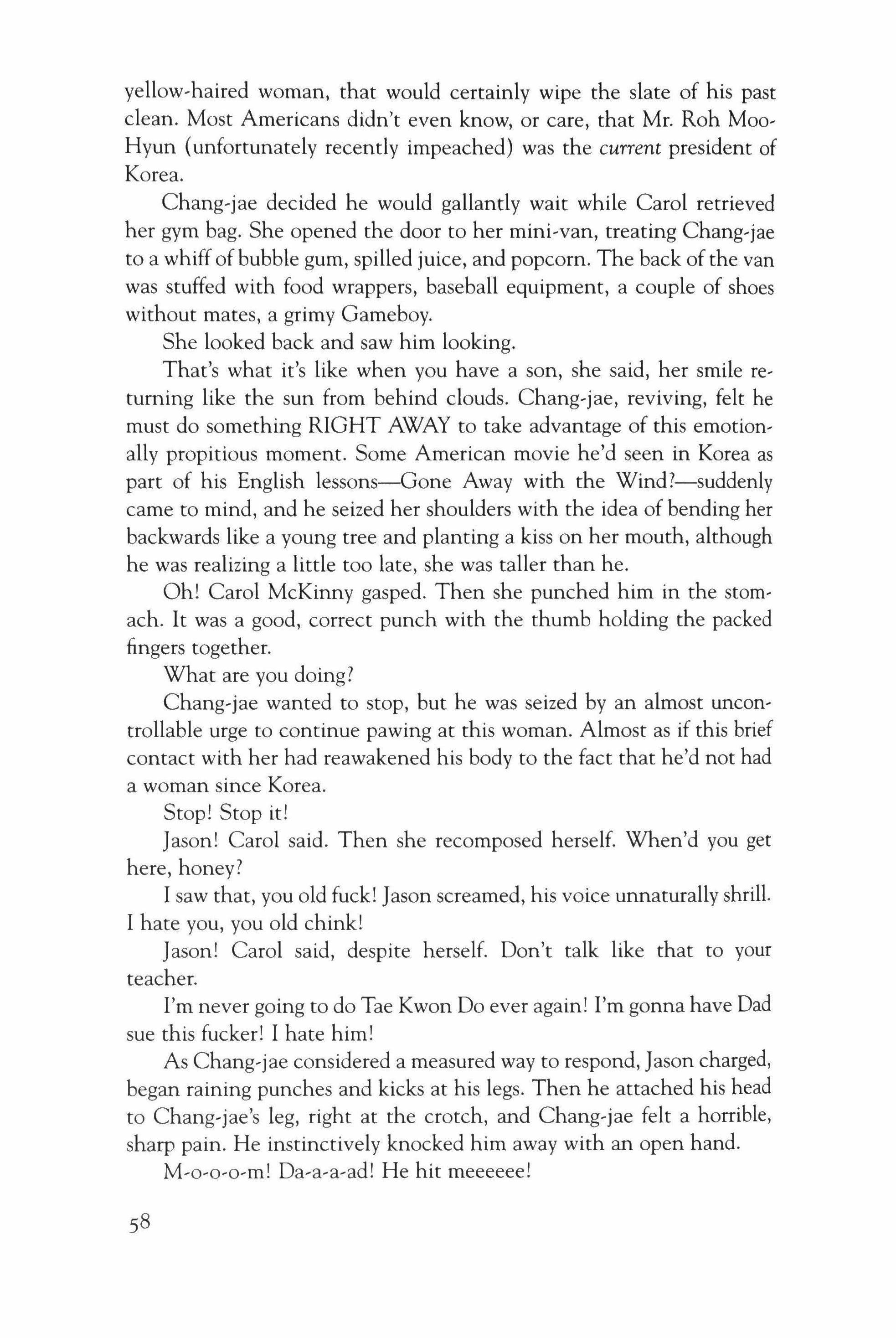
yellow-haired woman, that would certainly wipe the slate of his past clean. Most Americans didn't even know, or care, that Mr. Roh MooHyun (unfortunately recently impeached) was the current president of Korea.
Chang-jae decided he would gallantly wait while Carol retrieved her gym bag. She opened the door to her mini-van, treating Chang-jae to a whiff ofbubble gum, spilled juice, and popcorn. The back of the van was stuffed with food wrappers, baseball equipment, a couple of shoes without mates, a grimy Gameboy.
She looked back and saw him looking.
That's what it's like when you have a son, she said, her smile returning like the sun from behind clouds. Chang-jae, reviving, felt he must do something RIGHT AWAY to take advantage of this emotionally propitious moment. Some American movie he'd seen in Korea as part of his English lessons-Gone Away with the Wind?-suddenly came to mind, and he seized her shoulders with the idea of bending her backwards like a young tree and planting a kiss on her mouth, although he was realizing a little too late, she was taller than he.
Oh! Carol McKinny gasped. Then she punched him in the stomach. It was a good, correct punch with the thumb holding the packed fingers together.
What are you doing?
Chang-jae wanted to stop, but he was seized by an almost uncontrollable urge to continue pawing at this woman. Almost as if this brief contact with her had reawakened his body to the fact that he'd not had a woman since Korea.
Stop! Stop it!
Jason! Carol said. Then she recomposed herself. When'd you get here, honey?
I saw that, you old fuck! Jason screamed, his voice unnaturally shrill. I hate you, you old chink!
Jason! Carol said, despite herself. Don't talk like that to your teacher.
I'm never going to do Tae Kwon Do ever again! I'm gonna have Dad sue this fucker! I hate him!
As Chang-jae considered a measured way to respond, Jason charged, began raining punches and kicks at his legs. Then he attached his head to Chang-jae's leg, right at the crotch, and Chang-jae felt a horrible, sharp pain. He instinctively knocked him away with an open hand.
Mvo-o-o-rn! Da-a-a-ad! He hit meeeeee!
58
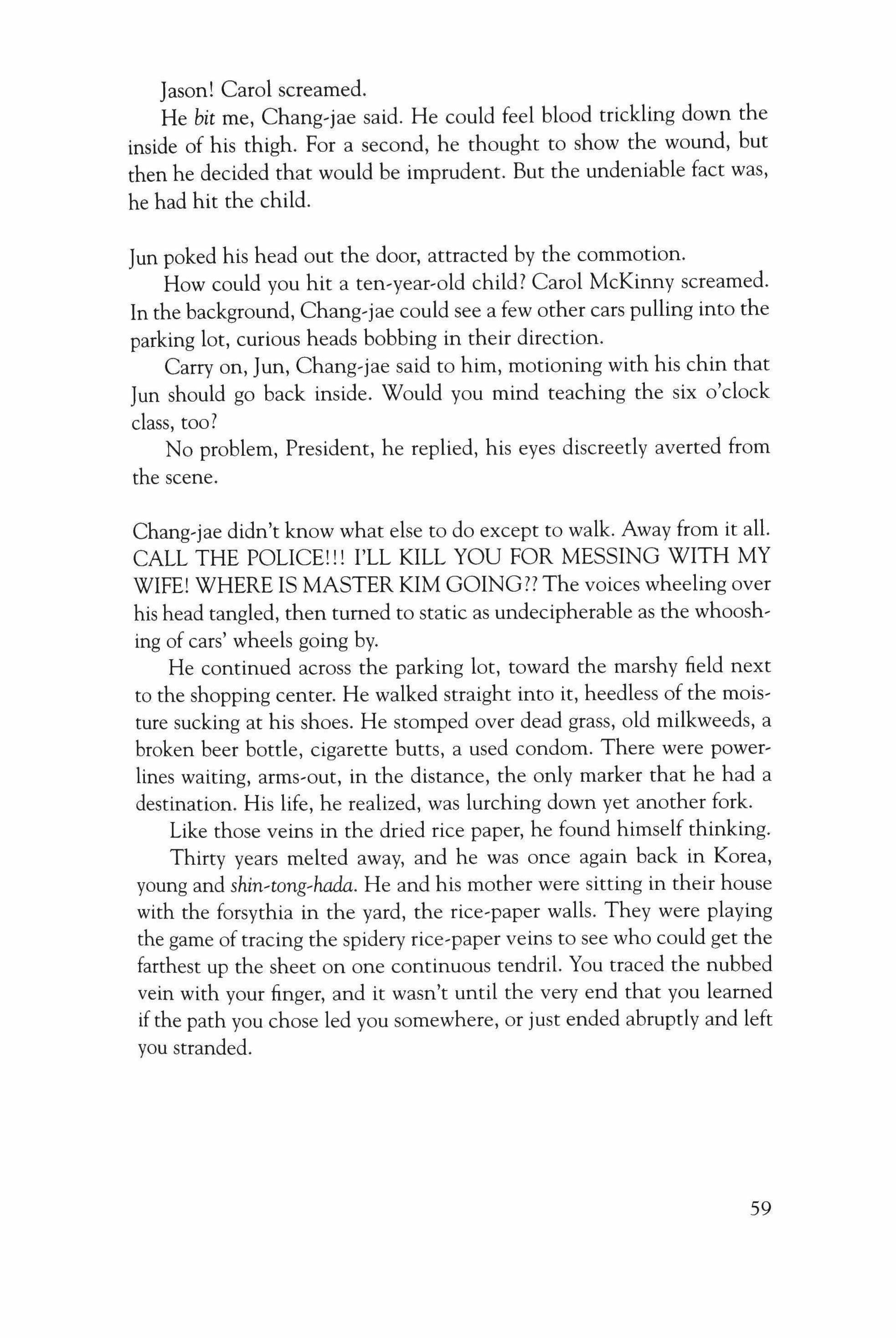
Jason! Carol screamed.
He bit me, Chang-jae said. He could feel blood trickling down the inside of his thigh. For a second, he thought to show the wound, but then he decided that would be imprudent. But the undeniable fact was, he had hit the child.
[un poked his head out the door, attracted by the commotion.
How could you hit a ten-year-old child? Carol McKinny screamed. In the background, Chang-jae could see a few other cars pulling into the parking lot, curious heads bobbing in their direction.
Carry on, [un, Chang-jae said to him, motioning with his chin that [un should go back inside. Would you mind teaching the six o'clock class, too?
No problem, President, he replied, his eyes discreetly averted from the scene.
Chang-jae didn't know what else to do except to walk. Away from it all. CALL THE POLICE!!! I'LL KILL YOU FOR MESSING WITH MY WIFE! WHERE IS MASTER KIM GOING?? The voices wheeling over his head tangled, then turned to static as undecipherable as the whooshing of cars' wheels going by.
He continued across the parking lot, toward the marshy field next to the shopping center. He walked straight into it, heedless of the moisture sucking at his shoes. He stomped over dead grass, old milkweeds, a broken beer bottle, cigarette butts, a used condom. There were powerlines waiting, arms-out, in the distance, the only marker that he had a destination. His life, he realized, was lurching down yet another fork.
Like those veins in the dried rice paper, he found himself thinking.
Thirty years melted away, and he was once again back in Korea, young and shin-tong-hada. He and his mother were sitting in their house with the forsythia in the yard, the rice-paper walls. They were playing the game of tracing the spidery rice-paper veins to see who could get the farthest up the sheet on one continuous tendril. You traced the nubbed vein with your finger, and it wasn't until the very end that you learned if the path you chose led you somewhere, or just ended abruptly and left you stranded.
59
Barbara Hamby

Lester Higata's String Theory Paradise
Lester Higata knew his life was about to end when he walked out on the patio behind his house in Makiki and saw his long-dead father sitting in a lawn chair near the little greenhouse where Lester kept his orchids. A butter yellow laelia was in bloom, its flowers like a scattering of exotic dragonflies taking off in flight. I'll bring it in the house later, Lester thought, for the dining room table or maybe the dresser in the bedroom. On the middle row was a white phalaenopsis he could take to church on Sunday. Its bloom was cascading over his father's head like a fancy hat.
Minoru Higata looked pretty good for someone who'd been dead for almost sixty years. His hair was black and thick, and he was wearing his favorite plaid cotton shirt just as he had the last time Lester had seen him. It was right after Pearl Harbor, and Lester was leaving Hawai'i for basic training in the Mainland. Lester closed his eyes, but when he opened them his father was still there, nodding to the chair beside him as if to say, "Sit down, Lester. I want to talk to you."
Maybe I'm dead already, Lester thought, but the sky was still blue, though dark clouds were banking over the mountains, and a cool breeze was rustling through the trees. He hadn't slept well the night before, so maybe he was asleep and dreaming. Whatever it was, he sat down next to his father and said, "Hi, Dad."
"Lester," his father said. "Why did you choose that name?" His feet were bare, and the calluses on the bottoms were thick, almost like the soles of a pair of shoes.
60
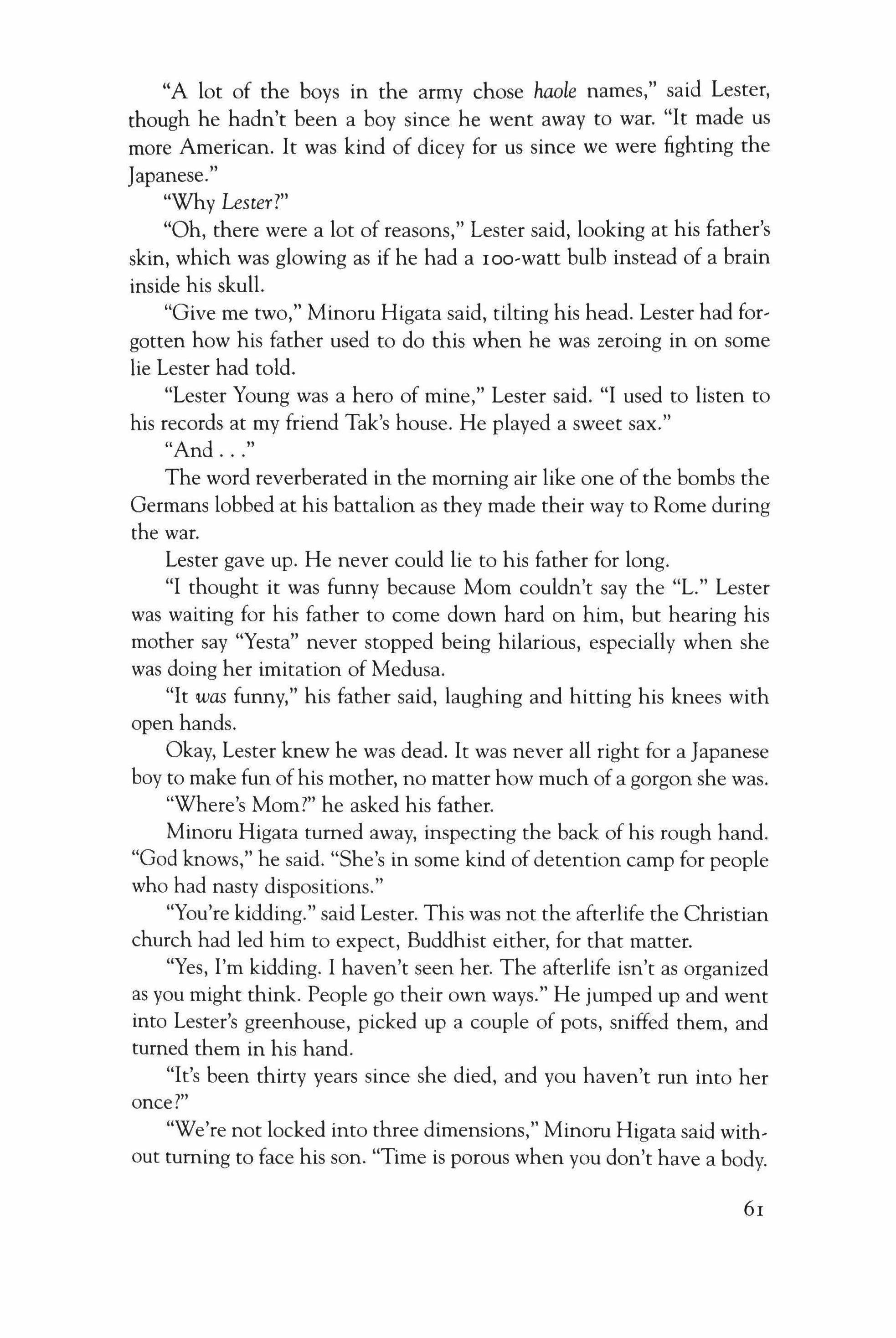
"A lot of the boys in the army chose haole names," said Lester, though he hadn't been a boy since he went away to war. "It made us more American. It was kind of dicey for us since we were fighting the Japanese."
"Why Lester?"
"Oh, there were a lot of reasons," Lester said, looking at his father's skin, which was glowing as if he had a roo-watt bulb instead of a brain inside his skull.
"Give me two," Minoru Higata said, tilting his head. Lester had forgotten how his father used to do this when he was zeroing in on some lie Lester had told.
"Lester Young was a hero of mine," Lester said. "I used to listen to his records at my friend Tak's house. He played a sweet sax."
"And
The word reverberated in the morning air like one of the bombs the Germans lobbed at his battalion as they made their way to Rome during the war.
Lester gave up. He never could lie to his father for long.
"I thought it was funny because Mom couldn't say the "L." Lester was waiting for his father to come down hard on him, but hearing his mother say "Yesta" never stopped being hilarious, especially when she was doing her imitation of Medusa.
"It was funny," his father said, laughing and hitting his knees with open hands.
Okay, Lester knew he was dead. It was never all right for a Japanese boy to make fun ofhis mother, no matter how much of a gorgon she was.
"Where's Mom?" he asked his father.
Minoru Higata turned away, inspecting the back of his rough hand. "God knows," he said. "She's in some kind of detention camp for people who had nasty dispositions."
"You're kidding." said Lester. This was not the afterlife the Christian church had led him to expect, Buddhist either, for that matter.
"Yes, I'm kidding. I haven't seen her. The afterlife isn't as organized as you might think. People go their own ways." He jumped up and went into Lester's greenhouse, picked up a couple of pots, sniffed them, and turned them in his hand.
"It's been thirty years since she died, and you haven't run into her once?"
"We're not locked into three dimensions," Minoru Higata said without turning to face his son. "Time is porous when you don't have a body.
61
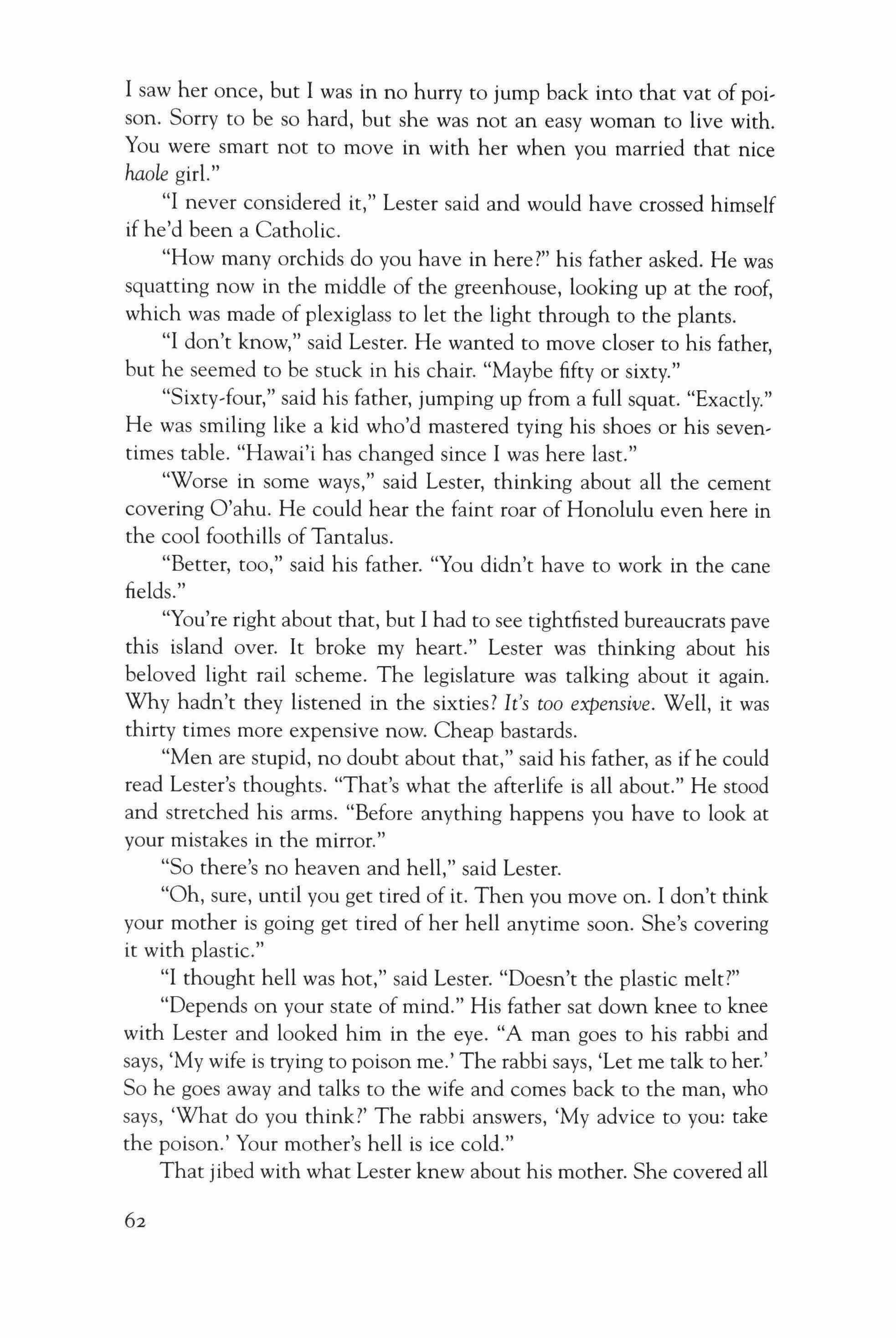
I saw her once, but I was in no hurry to jump back into that vat of poison. Sorry to be so hard, but she was not an easy woman to live with. You were smart not to move in with her when you married that nice haole girl."
"I never considered it," Lester said and would have crossed himself if he'd been a Catholic.
"How many orchids do you have in here?" his father asked. He was squatting now in the middle of the greenhouse, looking up at the roof, which was made of plexiglass to let the light through to the plants.
"I don't know," said Lester. He wanted to move closer to his father, but he seemed to be stuck in his chair. "Maybe fifty or sixty."
"Sixty-four," said his father, jumping up from a full squat. "Exactly." He was smiling like a kid who'd mastered tying his shoes or his seventimes table. "Hawai'i has changed since I was here last."
"Worse in some ways," said Lester, thinking about all the cement covering O'ahu. He could hear the faint roar of Honolulu even here in the cool foothills of Tantalus.
"Better, too," said his father. "You didn't have to work in the cane fields."
"You're right about that, but I had to see tightfisted bureaucrats pave this island over. It broke my heart." Lester was thinking about his beloved light rail scheme. The legislature was talking about it again. Why hadn't they listened in the sixties? It's too expensive. Well, it was thirty times more expensive now. Cheap bastards.
"Men are stupid, no doubt about that," said his father, as if he could read Lester's thoughts. "That's what the afterlife is all about." He stood and stretched his arms. "Before anything happens you have to look at your mistakes in the mirror."
"So there's no heaven and hell," said Lester.
"Oh, sure, until you get tired of it. Then you move on. I don't think your mother is going get tired of her hell anytime soon. She's covering it with plastic."
"I thought hell was hot," said Lester. "Doesn't the plastic melt?"
"Depends on your state of mind." His father sat down knee to knee with Lester and looked him in the eye. "A man goes to his rabbi and says, 'My wife is trying to poison me.' The rabbi says, 'Let me talk to her.' So he goes away and talks to the wife and comes back to the man, who says, 'What do you think?' The rabbi answers, 'My advice to you: take the poison.' Your mother's hell is ice cold."
That jibed with what Lester knew about his mother. She covered all
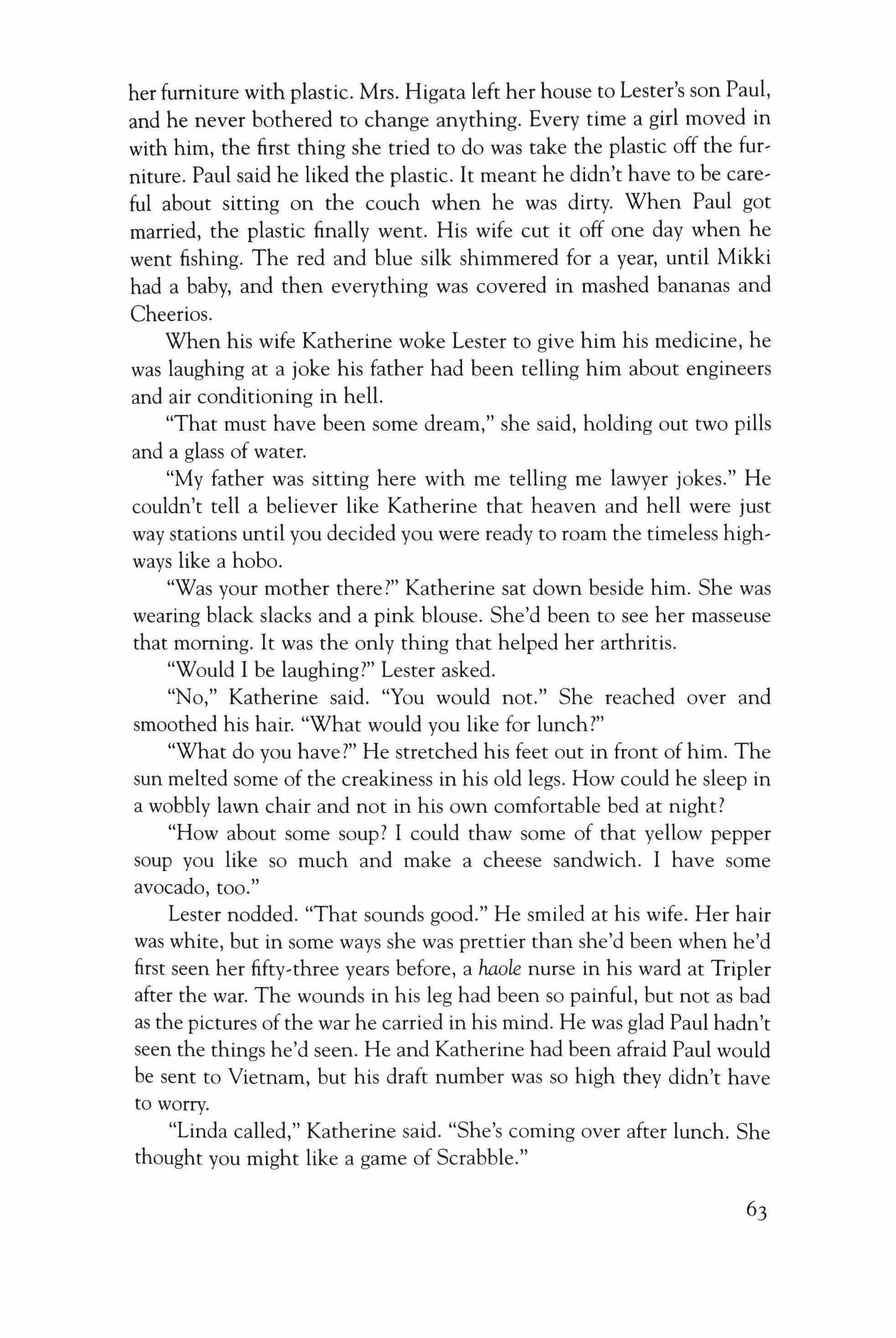
her furniture with plastic. Mrs. Higata left her house to Lester's son Paul, and he never bothered to change anything. Every time a girl moved in with him, the first thing she tried to do was take the plastic off the furniture. Paul said he liked the plastic. It meant he didn't have to be careful about sitting on the couch when he was dirty. When Paul got married, the plastic finally went. His wife cut it off one day when he went fishing. The red and blue silk shimmered for a year, until Mikki had a baby, and then everything was covered in mashed bananas and Cheerios.
When his wife Katherine woke Lester to give him his medicine, he was laughing at a joke his father had been telling him about engineers and air conditioning in hell.
"That must have been some dream," she said, holding out two pills and a glass of water.
"My father was sitting here with me telling me lawyer jokes." He couldn't tell a believer like Katherine that heaven and hell were just way stations until you decided you were ready to roam the timeless highways like a hobo.
"Was your mother there?" Katherine sat down beside him. She was wearing black slacks and a pink blouse. She'd been to see her masseuse that morning. It was the only thing that helped her arthritis.
"Would I be laughing?" Lester asked.
"No," Katherine said. "You would not." She reached over and smoothed his hair. "What would you like for lunch?"
"What do you have?" He stretched his feet out in front of him. The sun melted some of the creakiness in his old legs. How could he sleep in a wobbly lawn chair and not in his own comfortable bed at night?
"How about some soup? I could thaw some of that yellow pepper soup you like so much and make a cheese sandwich. I have some avocado, too."
Lester nodded. "That sounds good." He smiled at his wife. Her hair was white, but in some ways she was prettier than she'd been when he'd first seen her fifty-three years before, a haole nurse in his ward at Tripler after the war. The wounds in his leg had been so painful, but not as bad as the pictures of the war he carried in his mind. He was glad Paul hadn't seen the things he'd seen. He and Katherine had been afraid Paul would be sent to Vietnam, but his draft number was so high they didn't have to worry.
"Linda called," Katherine said. "She's coming over after lunch. She thought you might like a game of Scrabble."
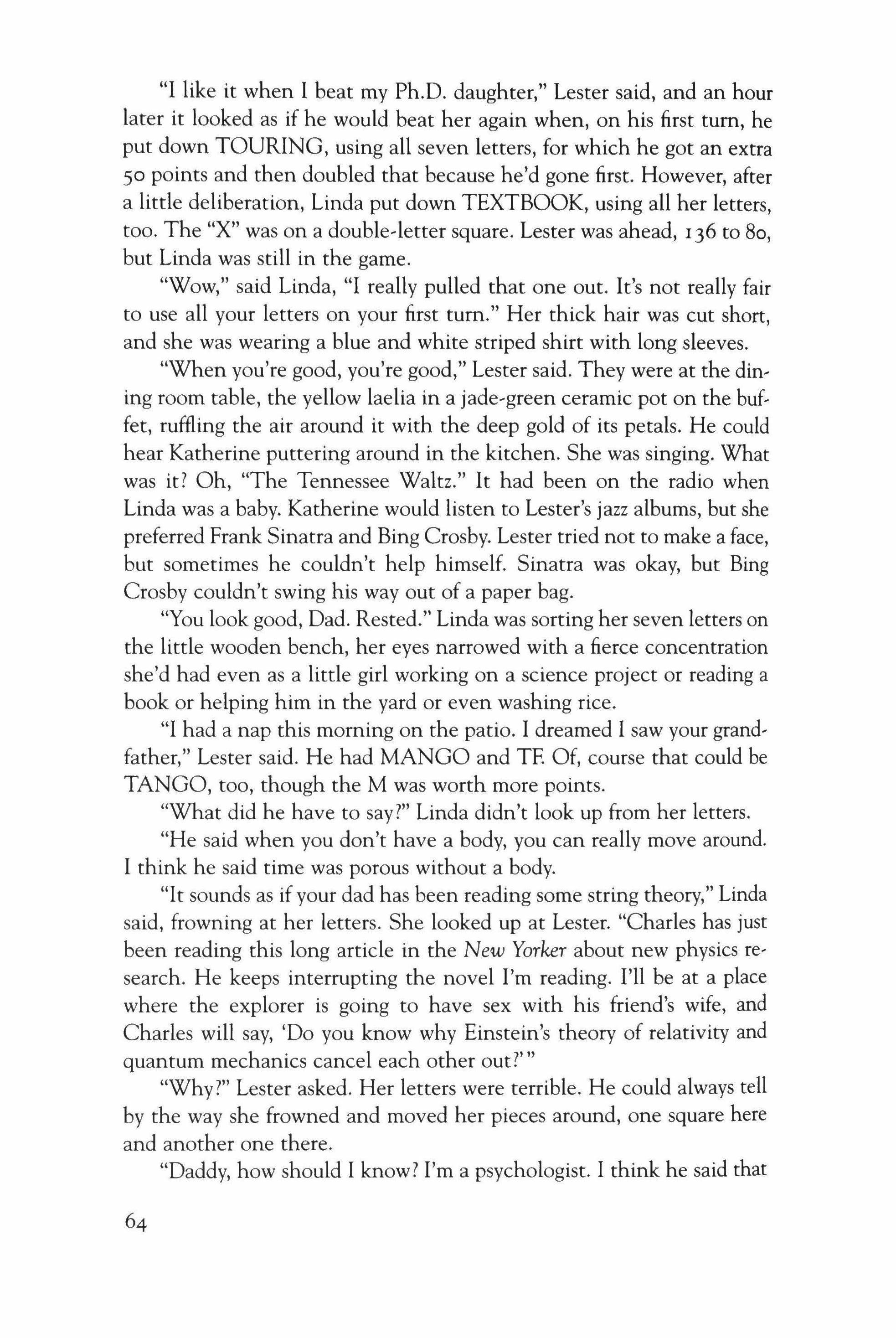
"I like it when I beat my Ph.D. daughter," Lester said, and an hour later it looked as if he would beat her again when, on his first tum, he put down TOURING, using all seven letters, for which he got an extra 50 points and then doubled that because he'd gone first. However, after a little deliberation, Linda put down TEXTBOOK, using all her letters, too. The "X" was on a double-letter square. Lester was ahead, 136 to 80, but Linda was still in the game.
"Wow," said Linda, "I really pulled that one out. It's not really fair to use all your letters on your first tum." Her thick hair was cut short, and she was wearing a blue and white striped shirt with long sleeves.
"When you're good, you're good," Lester said. They were at the dining room table, the yellow laelia in a jade-green ceramic pot on the buffet, ruffling the air around it with the deep gold of its petals. He could hear Katherine puttering around in the kitchen. She was singing. What was it? Oh, "The Tennessee Waltz." It had been on the radio when Linda was a baby. Katherine would listen to Lester's jazz albums, but she preferred Frank Sinatra and Bing Crosby. Lester tried not to make a face, but sometimes he couldn't help himself. Sinatra was okay, but Bing Crosby couldn't swing his way out of a paper bag.
"You look good, Dad. Rested." Linda was sorting her seven letters on the little wooden bench, her eyes narrowed with a fierce concentration she'd had even as a little girl working on a science project or reading a book or helping him in the yard or even washing rice.
"I had a nap this morning on the patio. I dreamed I saw your grandfather," Lester said. He had MANGO and TE Of, course that could be TANGO, too, though the M was worth more points.
"What did he have to say?" Linda didn't look up from her letters.
"He said when you don't have a body, you can really move around. I think he said time was porous without a body.
"It sounds as if your dad has been reading some string theory," Linda said, frowning at her letters. She looked up at Lester. "Charles has just been reading this long article in the New Yorker about new physics research. He keeps interrupting the novel I'm reading. I'll be at a place where the explorer is going to have sex with his friend's wife, and Charles will say, 'Do you know why Einstein's theory of relativity and quantum mechanics cancel each other out?'"
"Why?" Lester asked. Her letters were terrible. He could always tell by the way she frowned and moved her pieces around, one square here and another one there.
"Daddy, how should I know? I'm a psychologist. I think he said that

Einstein could explain the way the universe worked, and quantum mechanics explains how the nuclear world works, but the equations for one don't translate for the other. Einstein was working on a theory that explained everything when he died, but he didn't make it. I think black holes are the problem."
"They always are," said Lester, and put down MANGO, using one of the O's in Linda's TEXTBOOK. Then he picked out four new letters. He got a "Q" and a "U." Was that luck or what?
"Great word, Dad. I have nothing." She put down MANATEE. "You saved my okole with that M. Charles said a black hole is so dense that no light can escape from it."
"Like my mother," Lester said, but he didn't laugh. What if his mother showed up the way his father had?
"Pretty much. She was a class-A bitch. How did you and Auntie Gloria tum out so normal?"
"Gloria's normal?" Lester said. His sister was still playing golf and wearing short skirts even though she was seventy-six.
"She's not in jail, is she?" Linda looked up. Katherine had come into the dining room.
"I'm going to run to the Kokua Market," she said to Lester. "Do you want anything?"
"Get some of that Ezekial cereal, plain, not cinnamon," Lester said. "And some rice milk, the original, not the sweet one." They'd started eating organic after Lester's cancer diagnosis.
"It looks as if it might rain later," Katherine said. "I'm going to go now, so I don't get caught in it." She kissed Lester and then Linda and walked out to the carport.
"And some Fujis," Lester called after her. She waved and he watched her pull out of the driveway and disappear down the street towards Makiki Heights Drive.
"What are you and Mommy going to do for New Years' Eve?" Linda asked.
"Nothing," said Lester. "Same as always. We can't stay up that late anymore."
"It's 2000, the millennium, Daddy. You have to stay up for this one. Charles and I are }laving a party. Why don't you and Mommy come?" When Linda smiled, she had lines around her eyes and mouth. She was forty-eight. His little girl was middle aged.
"We'll think about it," Lester said.
"That means no," said Linda. There was no grey in her dark hair, but
65
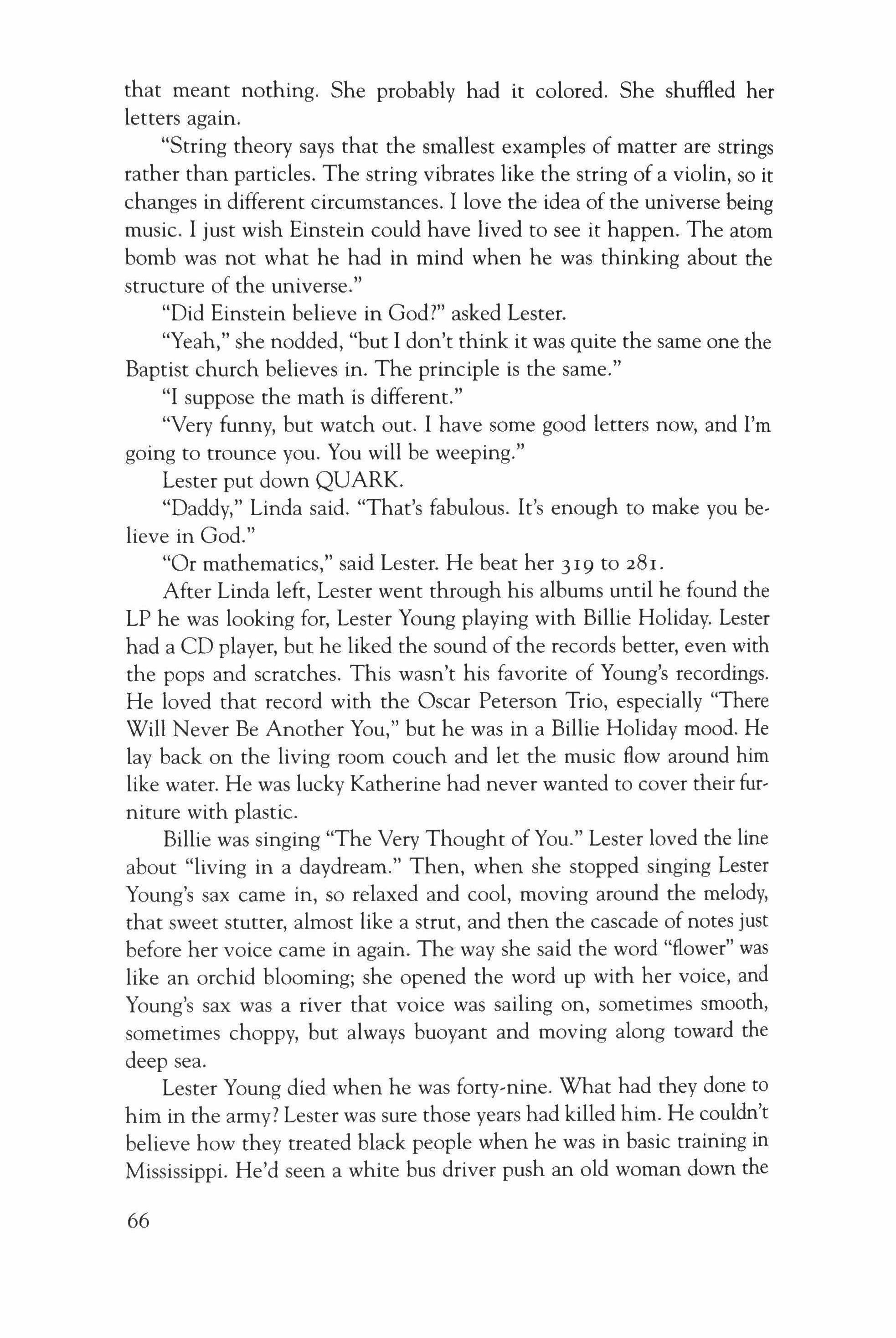
that meant nothing. She probably had it colored. She shuffled her letters again.
"String theory says that the smallest examples of matter are strings rather than particles. The string vibrates like the string of a violin, so it changes in different circumstances. I love the idea of the universe being music. I just wish Einstein could have lived to see it happen. The atom bomb was not what he had in mind when he was thinking about the structure of the universe."
"Did Einstein believe in God?" asked Lester.
"Yeah," she nodded, "but I don't think it was quite the same one the Baptist church believes in. The principle is the same."
"I suppose the math is different."
"Very funny, but watch out. I have some good letters now, and I'm going to trounce you. You will be weeping."
Lester put down QUARK.
"Daddy," Linda said. "That's fabulous. It's enough to make you believe in God."
"Or mathematics," said Lester. He beat her 3 I 9 to 281.
After Linda left, Lester went through his albums until he found the LP he was looking for, Lester Young playing with Billie Holiday. Lester had a CD player, but he liked the sound of the records better, even with the pops and scratches. This wasn't his favorite of Young's recordings. He loved that record with the Oscar Peterson Trio, especially "There Will Never Be Another You," but he was in a Billie Holiday mood. He lay back on the living room couch and let the music flow around him like water. He was lucky Katherine had never wanted to cover their furniture with plastic.
Billie was singing "The Very Thought of You." Lester loved the line about "living in a daydream." Then, when she stopped singing Lester Young's sax came in, so relaxed and cool, moving around the melody, that sweet stutter, almost like a strut, and then the cascade of notes just before her voice came in again. The way she said the word "flower" was like an orchid blooming; she opened the word up with her voice, and Young's sax was a river that voice was sailing on, sometimes smooth, sometimes choppy, but always buoyant and moving along toward the deep sea.
Lester Young died when he was forty-nine. What had they done to him in the army? Lester was sure those years had killed him. He couldn't believe how they treated black people when he was in basic training in Mississippi. He'd seen a white bus driver push an old woman down the
66
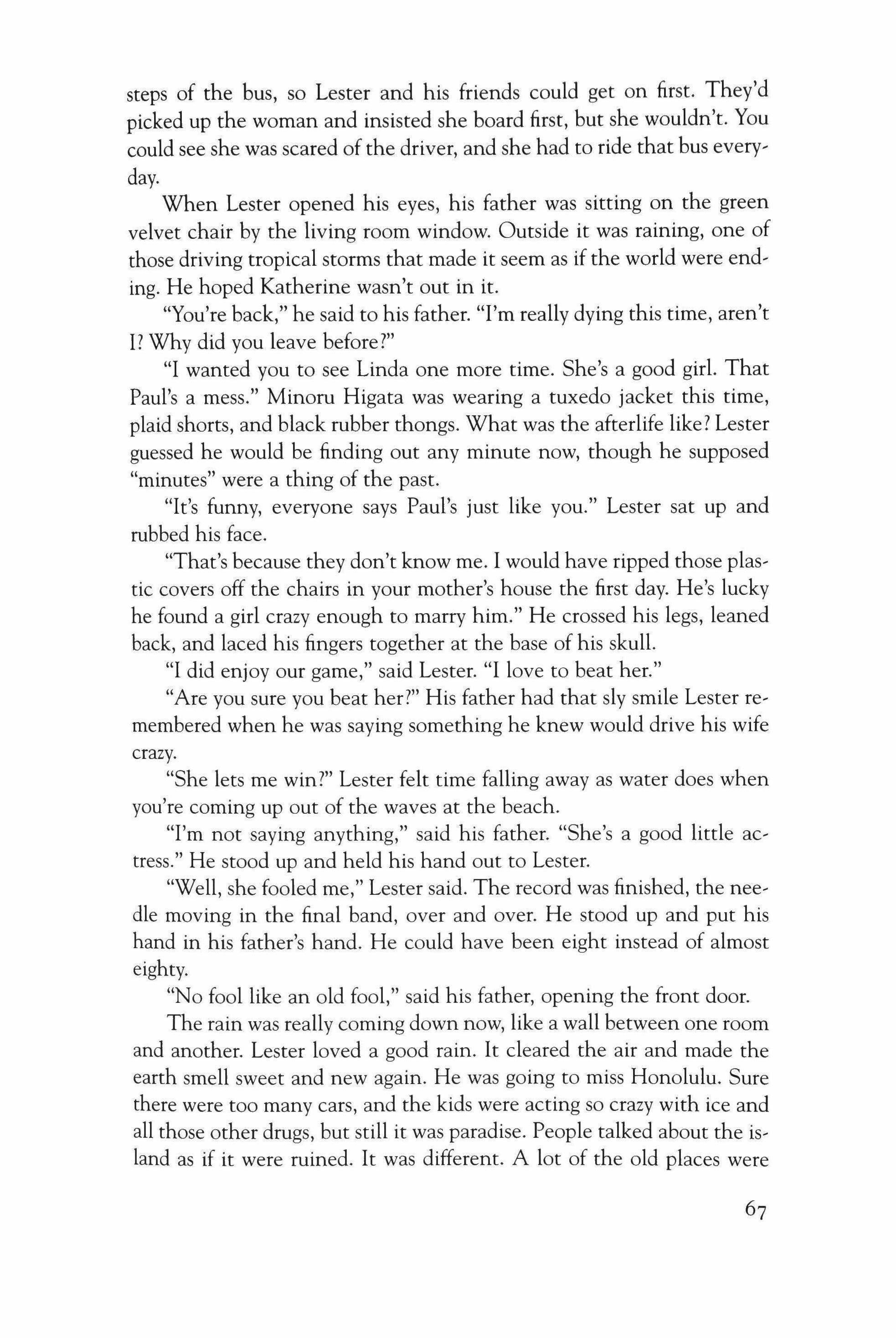
steps of the bus, so Lester and his friends could get on first. They'd picked up the woman and insisted she board first, but she wouldn't. You could see she was scared of the driver, and she had to ride that bus everyday.
When Lester opened his eyes, his father was sitting on the green velvet chair by the living room window. Outside it was raining, one of those driving tropical storms that made it seem as if the world were ending. He hoped Katherine wasn't out in it.
"You're back," he said to his father. "I'm really dying this time, aren't I? Why did you leave before?"
"I wanted you to see Linda one more time. She's a good girl. That Paul's a mess." Minoru Higata was wearing a tuxedo jacket this time, plaid shorts, and black rubber thongs. What was the afterlife like? Lester guessed he would be finding out any minute now, though he supposed "minutes" were a thing of the past.
"It's funny, everyone says Paul's just like you." Lester sat up and rubbed his face.
"That's because they don't know me. I would have ripped those plastic covers off the chairs in your mother's house the first day. He's lucky he found a girl crazy enough to marry him." He crossed his legs, leaned back, and laced his fingers together at the base of his skull.
"I did enjoy our game," said Lester. "I love to beat her."
"Are you sure you beat her?" His father had that sly smile Lester remembered when he was saying something he knew would drive his wife crazy.
"She lets me win?" Lester felt time falling away as water does when you're coming up out of the waves at the beach.
"I'm not saying anything," said his father. "She's a good little actress." He stood up and held his hand out to Lester.
"Well, she fooled me," Lester said. The record was finished, the needle moving in the final band, over and over. He stood up and put his hand in his father's hand. He could have been eight instead of almost eighty.
"No fool like an old fool," said his father, opening the front door.
The rain was really coming down now, like a wall between one room and another. Lester loved a good rain. It cleared the air and made the earth smell sweet and new again. He was going to miss Honolulu. Sure there were too many cars, and the kids were acting so crazy with ice and all those other drugs, but still it was paradise. People talked about the island as if it were ruined. It was different. A lot of the old places were
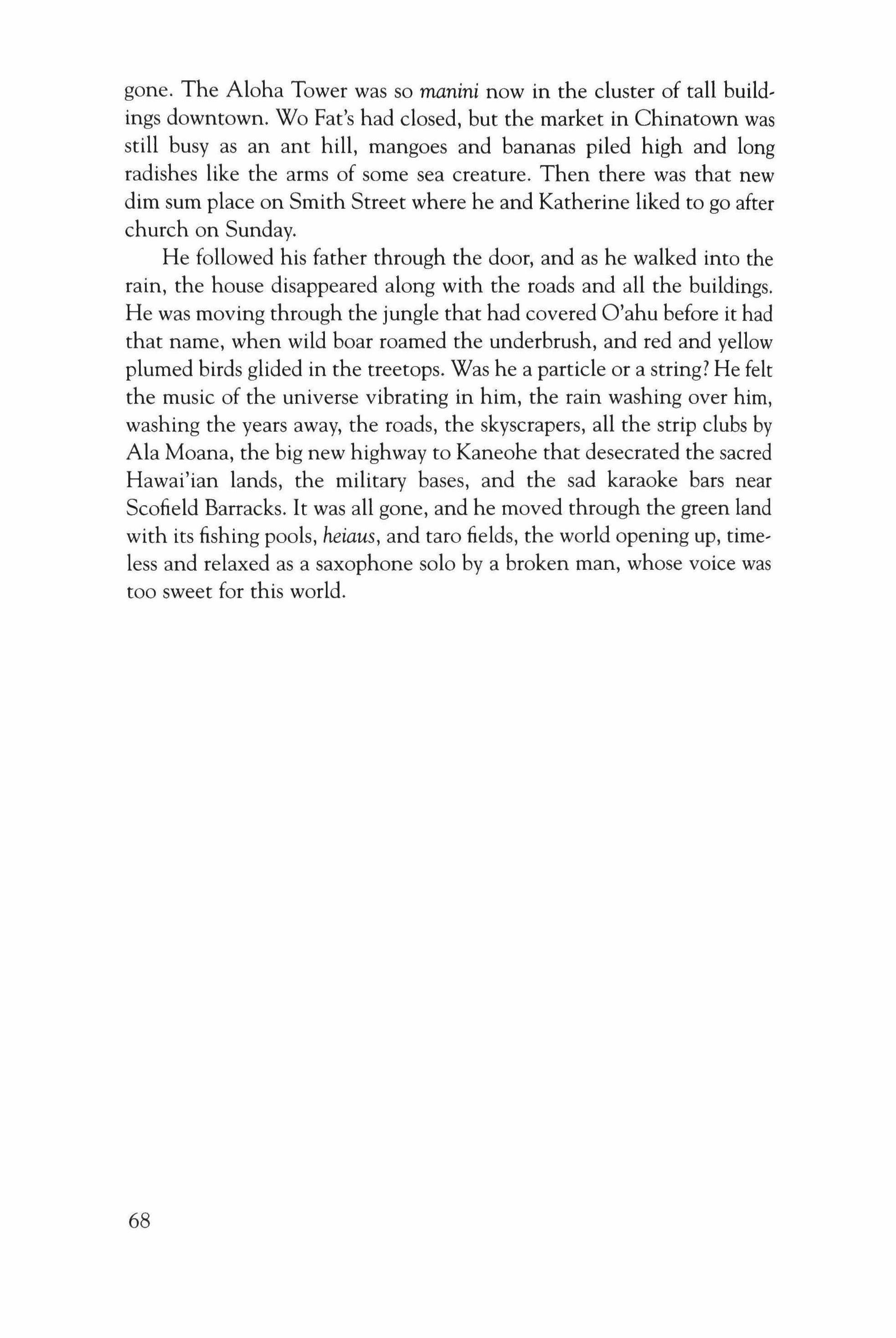
gone. The Aloha Tower was so manini now in the cluster of tall buildings downtown. Wo Fat's had closed, but the market in Chinatown was still busy as an ant hill, mangoes and bananas piled high and long radishes like the arms of some sea creature. Then there was that new dim sum place on Smith Street where he and Katherine liked to go after church on Sunday.
He followed his father through the door, and as he walked into the rain, the house disappeared along with the roads and all the buildings. He was moving through the jungle that had covered O'ahu before it had that name, when wild boar roamed the underbrush, and red and yellow plumed birds glided in the treetops. Was he a particle or a string? He felt the music of the universe vibrating in him, the rain washing over him, washing the years away, the roads, the skyscrapers, all the strip clubs by Ala Moana, the big new highway to Kaneohe that desecrated the sacred Hawai'ian lands, the military bases, and the sad karaoke bars near Scofield Barracks. It was all gone, and he moved through the green land with its fishing pools, heiaus, and taro fields, the world opening up, timeless and relaxed as a saxophone solo by a broken man, whose voice was too sweet for this world.
68
Mary Morris
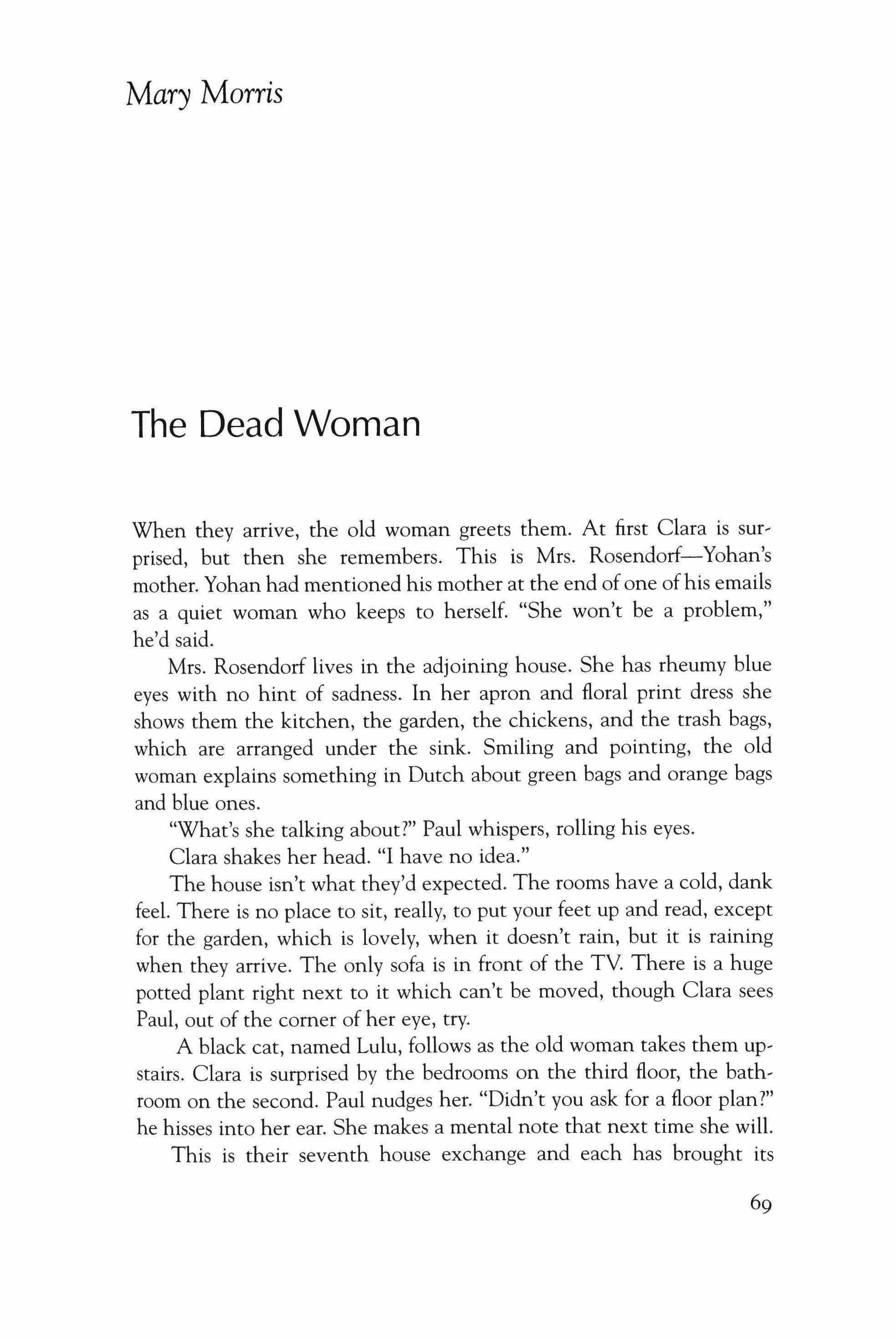
The Dead Woman
When they arrive, the old woman greets them. At first Clara is surprised, but then she remembers. This is Mrs. Rosendorf-Yohan's mother. Yohan had mentioned his mother at the end of one ofhis emails as a quiet woman who keeps to herself. "She won't be a problem," he'd said.
Mrs. Rosendorf lives in the adjoining house. She has rheumy blue eyes with no hint of sadness. In her apron and floral print dress she shows them the kitchen, the garden, the chickens, and the trash bags, which are arranged under the sink. Smiling and pointing, the old woman explains something in Dutch about green bags and orange bags and blue ones.
"What's she talking about?" Paul whispers, rolling his eyes.
Clara shakes her head. "I have no idea."
The house isn't what they'd expected. The rooms have a cold, dank feel. There is no place to sit, really, to put your feet up and read, except for the garden, which is lovely, when it doesn't rain, but it is raining when they arrive. The only sofa is in front of the TV. There is a huge potted plant right next to it which can't be moved, though Clara sees Paul, out of the comer of her eye, try.
A black cat, named Lulu, follows as the old woman takes them upstairs. Clara is surprised by the bedrooms on the third floor, the bathroom on the second. Paul nudges her. "Didn't you ask for a floor plan?" he hisses into her ear. She makes a mental note that next time she will. This is their seventh house exchange and each has brought its
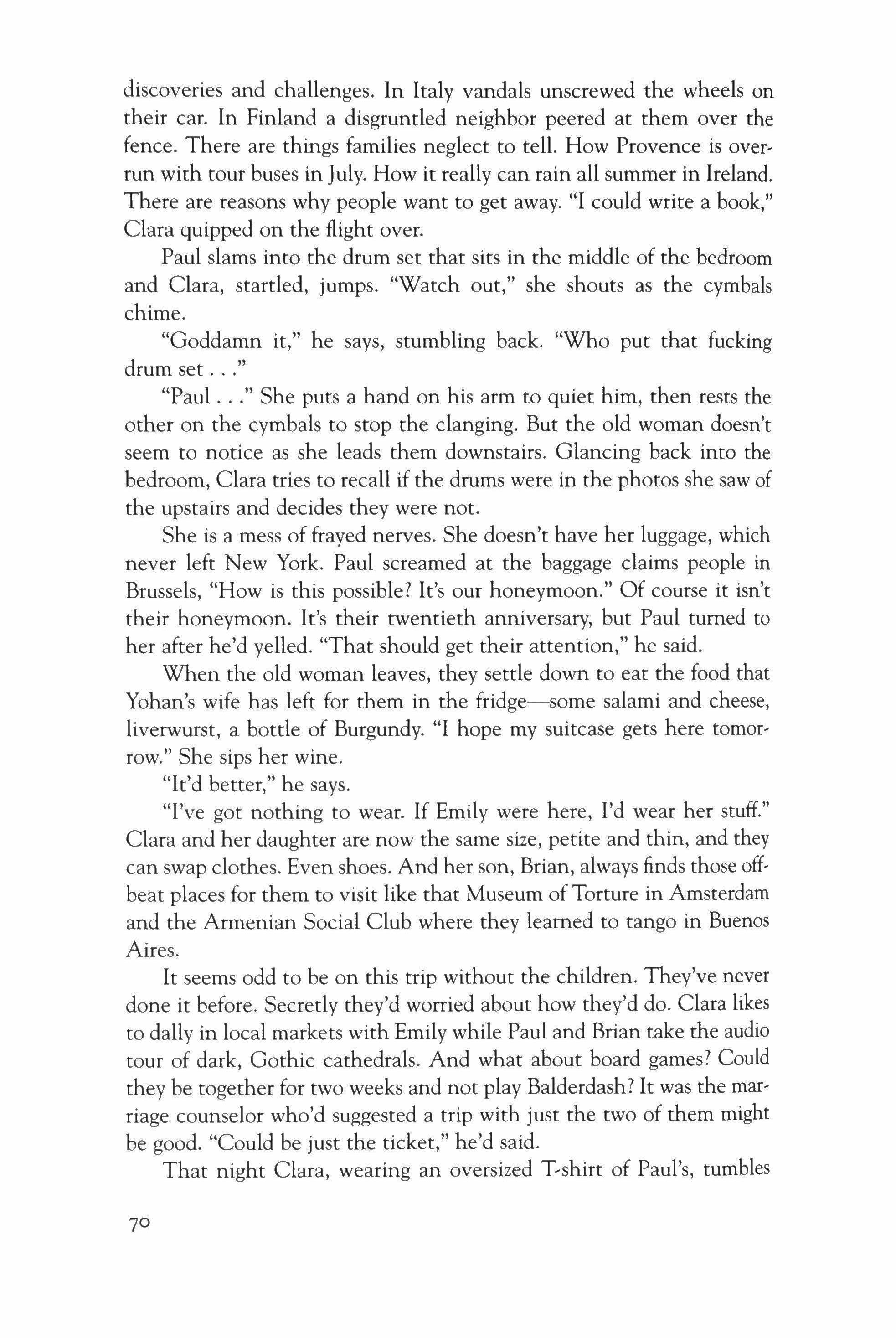
discoveries and challenges. In Italy vandals unscrewed the wheels on their car. In Finland a disgruntled neighbor peered at them over the fence. There are things families neglect to tell. How Provence is overrun with tour buses in July. How it really can rain all summer in Ireland. There are reasons why people want to get away. "I could write a book," Clara quipped on the flight over.
Paul slams into the drum set that sits in the middle of the bedroom and Clara, startled, jumps. "Watch out," she shouts as the cymbals chime.
"Goddamn it," he says, stumbling back. "Who put that fucking drum set
"Paul She puts a hand on his arm to quiet him, then rests the other on the cymbals to stop the clanging. But the old woman doesn't seem to notice as she leads them downstairs. Glancing back into the bedroom, Clara tries to recall if the drums were in the photos she saw of the upstairs and decides they were not.
She is a mess of frayed nerves. She doesn't have her luggage, which never left New York. Paul screamed at the baggage claims people in Brussels, "How is this possible? It's our honeymoon." Of course it isn't their honeymoon. It's their twentieth anniversary, but Paul turned to her after he'd yelled. "That should get their attention," he said.
When the old woman leaves, they settle down to eat the food that Yohan's wife has left for them in the fridge-some salami and cheese, liverwurst, a bottle of Burgundy. "I hope my suitcase gets here tomorrow." She sips her wine.
"It'd better," he says.
"I've got nothing to wear. If Emily were here, I'd wear her stuff." Clara and her daughter are now the same size, petite and thin, and they can swap clothes. Even shoes. And her son, Brian, always finds those offbeat places for them to visit like that Museum of Torture in Amsterdam and the Armenian Social Club where they learned to tango in Buenos Aires.
It seems odd to be on this trip without the children. They've never done it before. Secretly they'd worried about how they'd do. Clara likes to dally in local markets with Emily while Paul and Brian take the audio tour of dark, Gothic cathedrals. And what about board games? Could they be together for two weeks and not play Balderdash? It was the marriage counselor who'd suggested a trip with just the two of them might be good. "Could be just the ticket," he'd said.
That night Clara, wearing an oversized T-shirt of Paul's, tumbles

into the bed, which is lumpy and slopes inward towards the middle. They keep sliding into one another. His toenails, which need trimming, dig into her feet. She hears Paul sigh before he drifts off, an arm slumped across his face as if warding off a blow. In the middle of the night a driving rain flings a window open, sending a tremor through the snare drum.
In the morning Clara wakes to a roomful of sun. It is so bright she has to shield her eyes. Beside her the bed is empty. Paul has left for his run. She wishes he'd leave a note to say he's going and when he'll be back, but he never does. "Not my style," he'd say. A voice rises from the garden. Going to the window, Clara sees the old woman, feeding the chickens. She is bent over, tossing kernels from between her fingers and calling each chicken by name. It looks like a painting, Clara thinks. A Vermeer or Cezanne. She wants someone would call her with a soft clucking sound.
Clara puts on the pants she traveled in, the only pair she has, and goes downstairs, pausing at the bathroom on two to pee. She ambles barefoot along the garden path. In the sun she is struck by the brilliance of the cosmos, the zinnias. The rows and rows of tomatoes and onions and beans. She rounds the back of the garden where the coops are, and finds the old woman with a shovel, turning compost.
The old woman looks up and smiles. She begins talking rapidly in Dutch as if Clara can speak the language, then takes her by the hand. She leads her to the back of the coops where there is a little door with a latch. The old woman opens it. She makes a shooing motion with her fingers and the chickens run out. Then she takes Clara's hand and dips it into the darkness until she feels the warm, round eggs.
Like a magician, Clara pulls four eggs from the nest and cradles them in her hand. The old woman folds Clara's hands over the eggs and with a wave sends her away. In the kitchen Clara cracks the eggs in a bowl, one at a time. The yolks are a deep yellow, almost gold, and she whips them into a froth, then puts them in a pan with creamy butter.
When Paul comes back, they have scrambled eggs and toast, sliced tomatoes from the garden, and the cheese Yohan and his wife have left. They sit in the garden in the sun as Lulu purrs at their feet. The eggs taste like earth and seeds and Paul wolfs them down. "These are the best eggs I've ever eaten," Paul says, his face beaming. He rubs his hand on her neck, kissing her throat.
71
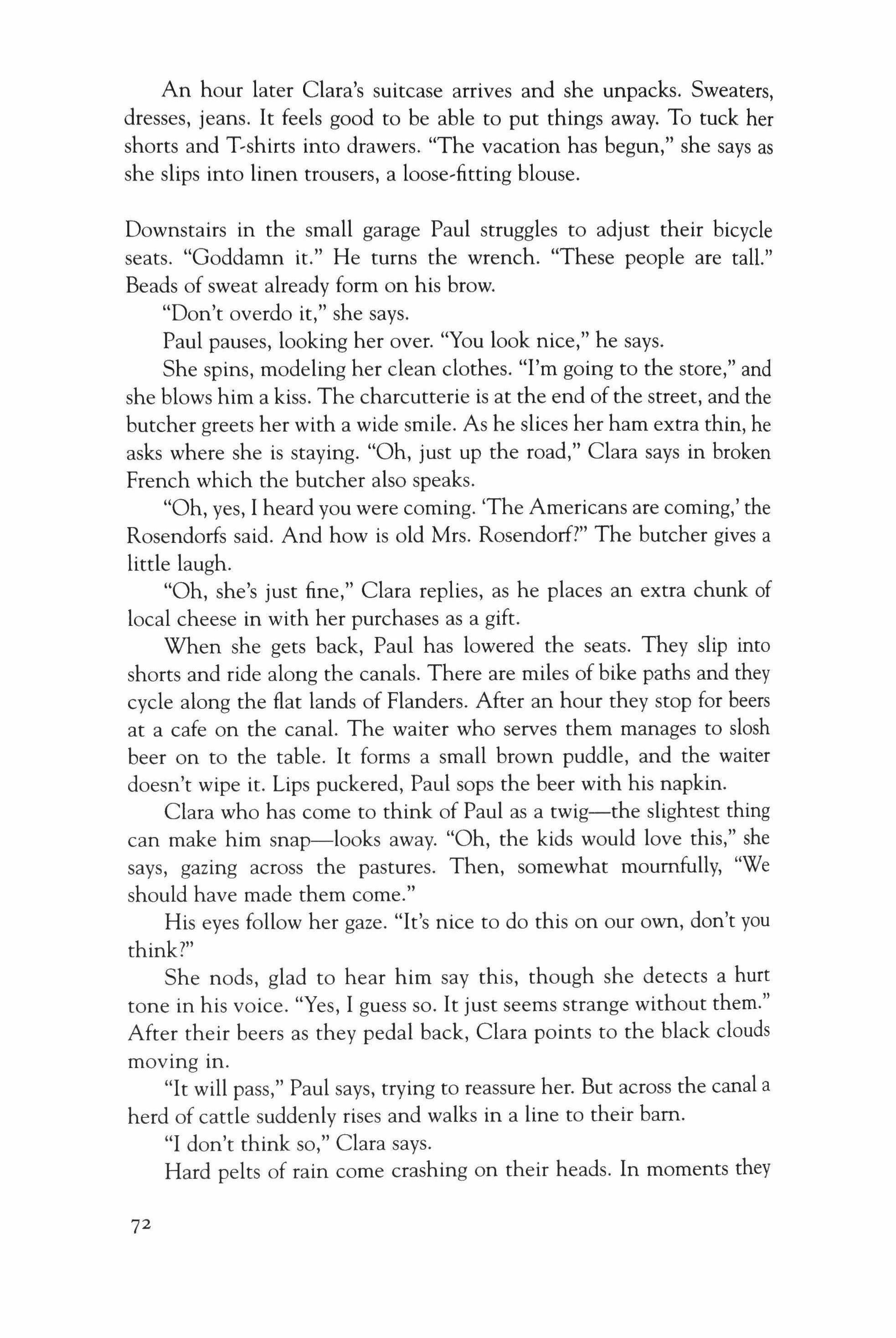
An hour later Clara's suitcase arrives and she unpacks. Sweaters, dresses, jeans. It feels good to be able to put things away. To tuck her shorts and T-shirts into drawers. "The vacation has begun," she says as she slips into linen trousers, a loose-fitting blouse.
Downstairs in the small garage Paul struggles to adjust their bicycle seats. "Goddamn it." He turns the wrench. "These people are tall." Beads of sweat already form on his brow.
"Don't overdo it," she says.
Paul pauses, looking her over. "You look nice," he says.
She spins, modeling her clean clothes. "I'm going to the store," and she blows him a kiss. The charcutterie is at the end of the street, and the butcher greets her with a wide smile. As he slices her ham extra thin, he asks where she is staying. "Oh, just up the road," Clara says in broken French which the butcher also speaks.
"Oh, yes, I heard you were coming. 'The Americans are coming,' the Rosendorfs said. And how is old Mrs. Rosendorf?" The butcher gives a little laugh.
"Oh, she's just fine," Clara replies, as he places an extra chunk of local cheese in with her purchases as a gift.
When she gets back, Paul has lowered the seats. They slip into shorts and ride along the canals. There are miles of bike paths and they cycle along the flat lands of Flanders. After an hour they stop for beers at a cafe on the canal. The waiter who serves them manages to slosh beer on to the table. It forms a small brown puddle, and the waiter doesn't wipe it. Lips puckered, Paul sops the beer with his napkin.
Clara who has come to think of Paul as a twig-the slightest thing can make him snap-looks away. "Oh, the kids would love this," she says, gazing across the pastures. Then, somewhat mournfully, "We should have made them come."
His eyes follow her gaze. "It's nice to do this on our own, don't you think?"
She nods, glad to hear him say this, though she detects a hurt tone in his voice. "Yes, I guess so. It just seems strange without them." After their beers as they pedal back, Clara points to the black clouds moving in.
"It will pass," Paul says, trying to reassure her. But across the canal a herd of cattle suddenly rises and walks in a line to their bam.
"I don't think so," Clara says.
Hard pelts of rain come crashing on their heads. In moments they
72
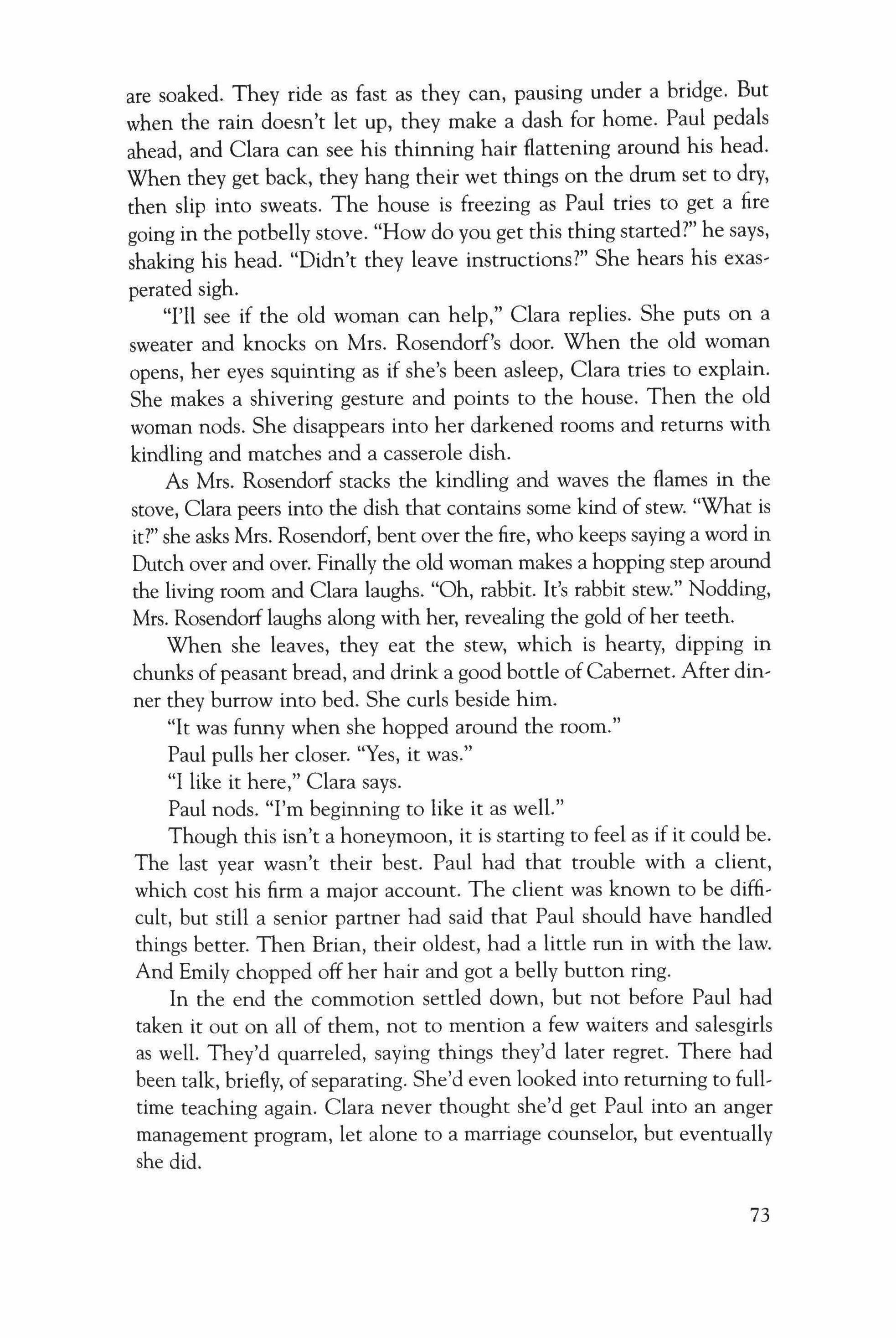
are soaked. They ride as fast as they can, pausing under a bridge. But when the rain doesn't let up, they make a dash for home. Paul pedals ahead, and Clara can see his thinning hair flattening around his head. When they get back, they hang their wet things on the drum set to dry, then slip into sweats. The house is freezing as Paul tries to get a fire going in the potbelly stove. "How do you get this thing started?" he says, shaking his head. "Didn't they leave instructions?" She hears his exasperated sigh.
"I'll see if the old woman can help," Clara replies. She puts on a sweater and knocks on Mrs. Rosendorf's door. When the old woman opens, her eyes squinting as if she's been asleep, Clara tries to explain. She makes a shivering gesture and points to the house. Then the old woman nods. She disappears into her darkened rooms and returns with kindling and matches and a casserole dish.
As Mrs. Rosendorf stacks the kindling and waves the flames in the stove, Clara peers into the dish that contains some kind of stew. "What is it?" she asks Mrs. Rosendorf, bent over the fire, who keeps saying a word in Dutch over and over. Finally the old woman makes a hopping step around the living room and Clara laughs. "Oh, rabbit. It's rabbit stew." Nodding, Mrs. Rosendorf laughs along with her, revealing the gold of her teeth.
When she leaves, they eat the stew, which is hearty, dipping in chunks ofpeasant bread, and drink a good bottle ofCabernet. After dinner they burrow into bed. She curls beside him.
"It was funny when she hopped around the room."
Paul pulls her closer. "Yes, it was."
"I like it here," Clara says.
Paul nods. "I'm beginning to like it as well."
Though this isn't a honeymoon, it is starting to feel as if it could be. The last year wasn't their best. Paul had that trouble with a client, which cost his firm a major account. The client was known to be difficult, but still a senior partner had said that Paul should have handled things better. Then Brian, their oldest, had a little run in with the law. And Emily chopped off her hair and got a belly button ring.
In the end the commotion settled down, but not before Paul had taken it out on all of them, not to mention a few waiters and salesgirls as well. They'd quarreled, saying things they'd later regret. There had been talk, briefly, of separating. She'd even looked into returning to fulltime teaching again. Clara never thought she'd get Paul into an anger management program, let alone to a marriage counselor, but eventually she did.
73
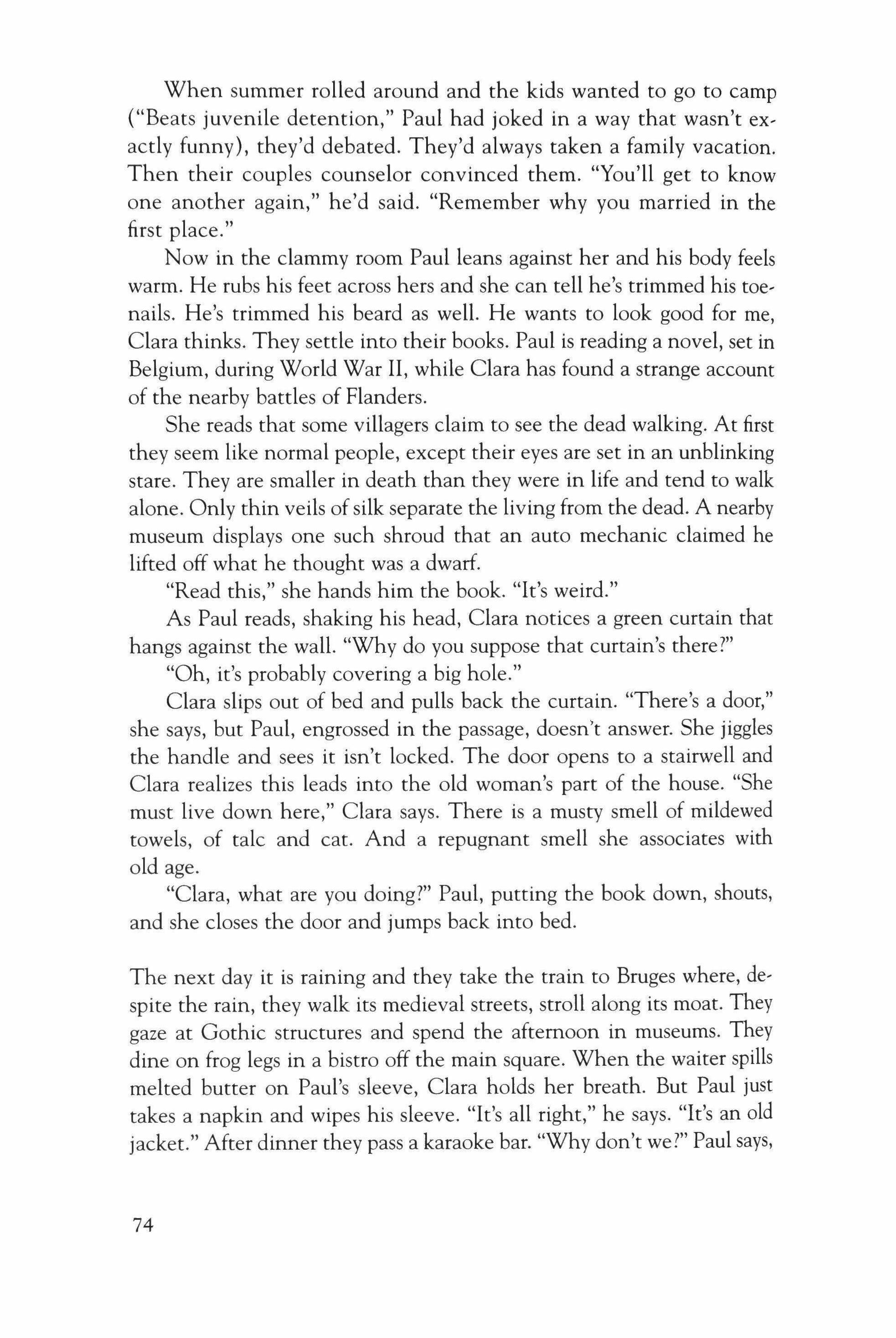
When summer rolled around and the kids wanted to go to camp ("Beats juvenile detention," Paul had joked in a way that wasn't exactly funny), they'd debated. They'd always taken a family vacation. Then their couples counselor convinced them. "You'll get to know one another again," he'd said. "Remember why you married in the first place."
Now in the clammy room Paul leans against her and his body feels warm. He rubs his feet across hers and she can tell he's trimmed his toenails. He's trimmed his beard as well. He wants to look good for me, Clara thinks. They settle into their books. Paul is reading a novel, set in Belgium, during World War II, while Clara has found a strange account of the nearby battles of Flanders.
She reads that some villagers claim to see the dead walking. At first they seem like normal people, except their eyes are set in an unblinking stare. They are smaller in death than they were in life and tend to walk alone. Only thin veils of silk separate the living from the dead. A nearby museum displays one such shroud that an auto mechanic claimed he lifted off what he thought was a dwarf.
"Read this," she hands him the book. "It's weird."
As Paul reads, shaking his head, Clara notices a green curtain that hangs against the wall. "Why do you suppose that curtain's there?"
"Oh, it's probably covering a big hole."
Clara slips out of bed and pulls back the curtain. "There's a door," she says, but Paul, engrossed in the passage, doesn't answer. She jiggles the handle and sees it isn't locked. The door opens to a stairwell and Clara realizes this leads into the old woman's part of the house. "She must live down here," Clara says. There is a musty smell of mildewed towels, of talc and cat. And a repugnant smell she associates with old age.
"Clara, what are you doing?" Paul, putting the book down, shouts, and she closes the door and jumps back into bed.
The next day it is raining and they take the train to Bruges where, despite the rain, they walk its medieval streets, stroll along its moat. They gaze at Gothic structures and spend the afternoon in museums. They dine on frog legs in a bistro off the main square. When the waiter spills melted butter on Paul's sleeve, Clara holds her breath. But Paul just takes a napkin and wipes his sleeve. "It's all right," he says. "It's an old jacket." After dinner they pass a karaoke bar. "Why don't we?" Paul says,
74
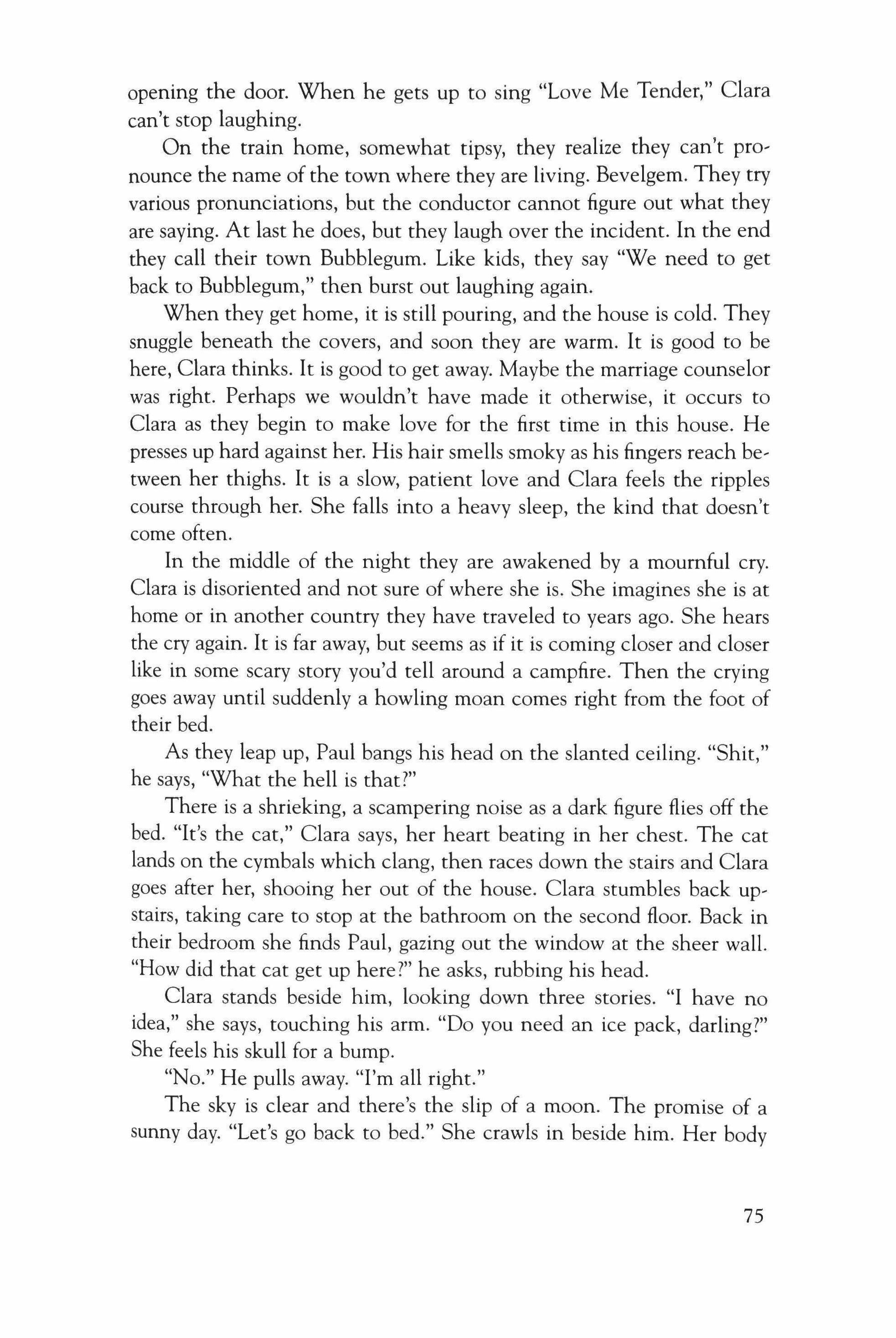
opening the door. When he gets up to sing "Love Me Tender," Clara can't stop laughing.
On the train home, somewhat tipsy, they realize they can't pronounce the name of the town where they are living. Bevelgem. They try various pronunciations, but the conductor cannot figure out what they are saying. At last he does, but they laugh over the incident. In the end they call their town Bubblegum. Like kids, they say "We need to get back to Bubblegum," then burst out laughing again.
When they get home, it is still pouring, and the house is cold. They snuggle beneath the covers, and soon they are warm. It is good to be here, Clara thinks. It is good to get away. Maybe the marriage counselor was right. Perhaps we wouldn't have made it otherwise, it occurs to Clara as they begin to make love for the first time in this house. He presses up hard against her. His hair smells smoky as his fingers reach between her thighs. It is a slow, patient love and Clara feels the ripples course through her. She falls into a heavy sleep, the kind that doesn't come often.
In the middle of the night they are awakened by a mournful cry. Clara is disoriented and not sure of where she is. She imagines she is at home or in another country they have traveled to years ago. She hears the cry again. It is far away, but seems as if it is coming closer and closer like in some scary story you'd tell around a campfire. Then the crying goes away until suddenly a howling moan comes right from the foot of their bed.
As they leap up, Paul bangs his head on the slanted ceiling. "Shit," he says, "What the hell is that?"
There is a shrieking, a scampering noise as a dark figure flies off the bed. "It's the cat," Clara says, her heart beating in her chest. The cat lands on the cymbals which clang, then races down the stairs and Clara goes after her, shooing her out of the house. Clara stumbles back upstairs, taking care to stop at the bathroom on the second floor. Back in their bedroom she finds Paul, gazing out the window at the sheer wall. "How did that cat get up here?" he asks, rubbing his head.
Clara stands beside him, looking down three stories. "I have no idea," she says, touching his arm. "Do you need an ice pack, darling?" She feels his skull for a bump.
"No." He pulls away. "I'm all right."
The sky is clear and there's the slip of a moon. The promise of a sunny day. "Let's go back to bed." She crawls in beside him. Her body
75

feels lithe and strong. "I'm glad we carne alone," she tells him, nestling in his arms.
"Me, too." He strokes her hair. Then he starts to laugh, "That stupid cat We needed this, didn't we?" he says.
"Yes," Clara says, drifting off in his arms, "we did."
Clara wakes to find Lulu, padding on her stomach, begging to be fed and she can hear the chickens clucking in their pen. Paul isn't there so she goes outside. As she approaches their pen, the chickens race to her, scratching for food. Mrs. Rosendorf is nowhere in sight. She fills a pan with feed and tosses it to them.
As the chickens squabble, Clara gazes at the old woman's house. It is gray and seems to be in disrepair. Leaves fill the gutters and she can see rain pooling on the roof. The plants in the greenhouse look dry, and Lulu has no food or water in her bowls.
Clara taps on Mrs. Rosendorf's door, but there is no answer. She bangs on the window, but still there is none. Clara goes back into the old greenhouse where noises corne from a small wooden hutch. Carefully she opens the lid and inside sees dozens of eyes looking up at her out of the darkness. Bunnies. Lots of them. Clara thinks of the stew.
Under a counter she finds kibble and feeds them. As they scramble to eat, Clara peers into the house. A light is still on in the living room as she sees tables with lace doilies, houseplants, a book open on a coffee table. Mrs. Rosendorf is sprawled on the coach. Clara bangs and bangs, but the old woman doesn't move. For a few moments Clara is unsure of what to do. Perhaps she is just asleep. Or perhaps she has had a stroke.
Clara wishes Paul were here. Then she remembers the door and the stairwell from their bedroom. Going upstairs, she pulls the curtain back and turns the handle. She stands at the top of the darkened stairs. As her eyes adjust to the darkness, Clara can see that the rooms below all have their shades drawn. Slowly she makes her way down the stairs and comes to a bathroom where underwear hangs on a drying rack. A bottle of hand lotion sits open on the sink.
She passes the bedroom with the covers pulled back as if the sleeper is about to slide between the sheets. A pair of slippers is at the foot of the bed. She sees a folded comforter and a floral dress, draped on a chair. From the second landing there is more light below, and Clara makes her way down the stairs. She walks through the kitchen into the living room where the old woman lies on the couch.
She reaches out and touches the old woman's wrist. The hand is al-
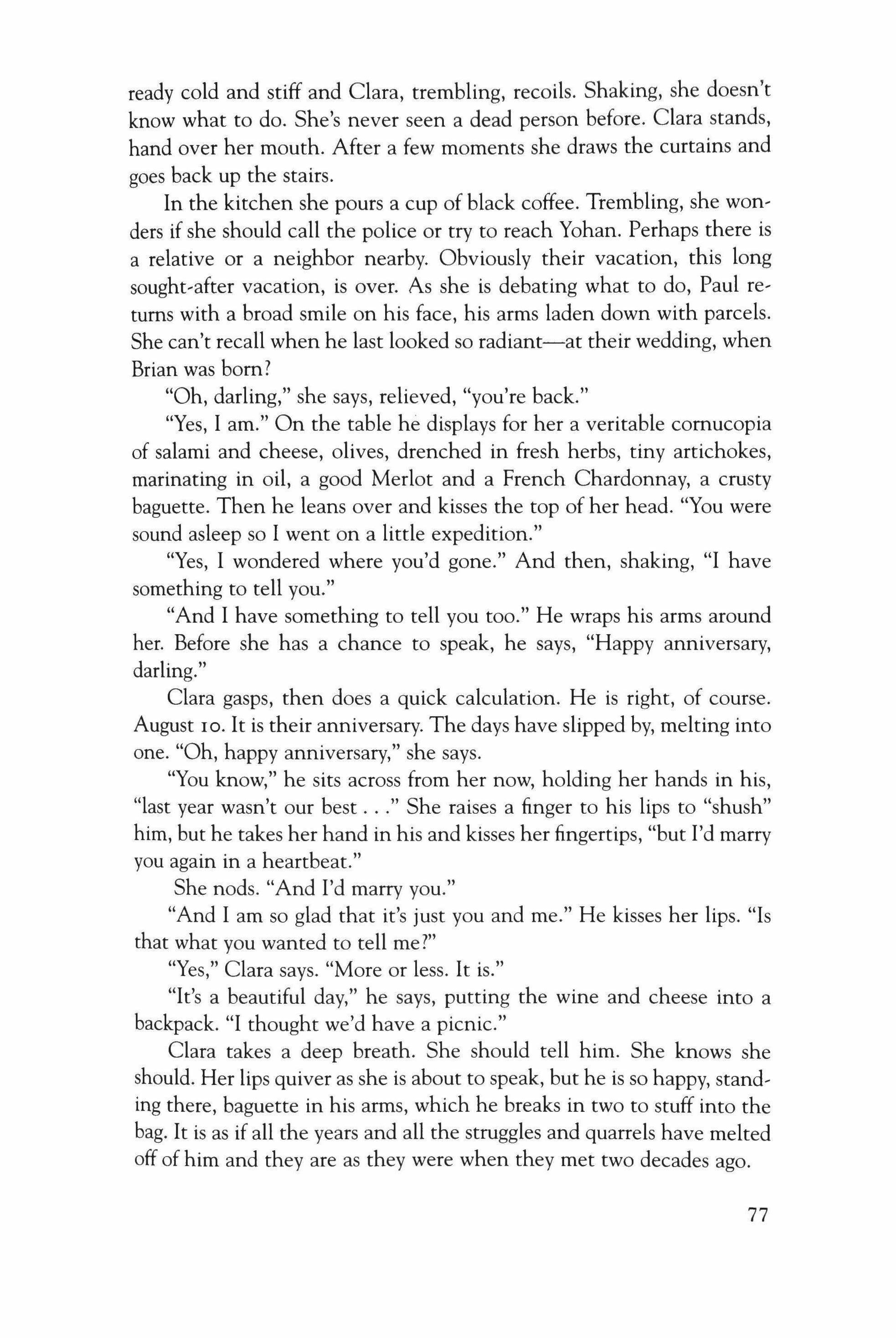
ready cold and stiff and Clara, trembling, recoils. Shaking, she doesn't know what to do. She's never seen a dead person before. Clara stands, hand over her mouth. After a few moments she draws the curtains and goes back up the stairs.
In the kitchen she pours a cup of black coffee. Trembling, she wonders if she should call the police or try to reach Yohan. Perhaps there is a relative or a neighbor nearby. Obviously their vacation, this long sought-after vacation, is over. As she is debating what to do, Paul returns with a broad smile on his face, his arms laden down with parcels. She can't recall when he last looked so radiant-at their wedding, when Brian was born?
"Oh, darling," she says, relieved, "you're back."
"Yes, I am." On the table he displays for her a veritable cornucopia of salami and cheese, olives, drenched in fresh herbs, tiny artichokes, marinating in oil, a good Merlot and a French Chardonnay, a crusty baguette. Then he leans over and kisses the top of her head. "You were sound asleep so I went on a little expedition."
"Yes, I wondered where you'd gone." And then, shaking, "I have something to tell you."
"And I have something to tell you too." He wraps his arms around her. Before she has a chance to speak, he says, "Happy anniversary, darling."
Clara gasps, then does a quick calculation. He is right, of course. August 10. It is their anniversary. The days have slipped by, melting into one. "Oh, happy anniversary," she says.
"You know," he sits across from her now, holding her hands in his, "last year wasn't our best She raises a finger to his lips to "shush" him, but he takes her hand in his and kisses her fingertips, "but I'd marry you again in a heartbeat."
She nods. "And I'd marry you."
"And I am so glad that it's just you and me." He kisses her lips. "Is that what you wanted to tell me?"
"Yes," Clara says. "More or less. It is."
"It's a beautiful day," he says, putting the wine and cheese into a backpack. "I thought we'd have a picnic."
Clara takes a deep breath. She should tell him. She knows she should. Her lips quiver as she is about to speak, but he is so happy, standing there, baguette in his arms, which he breaks in two to stuff into the bag. It is as if all the years and all the struggles and quarrels have melted off of him and they are as they were when they met two decades ago.
77
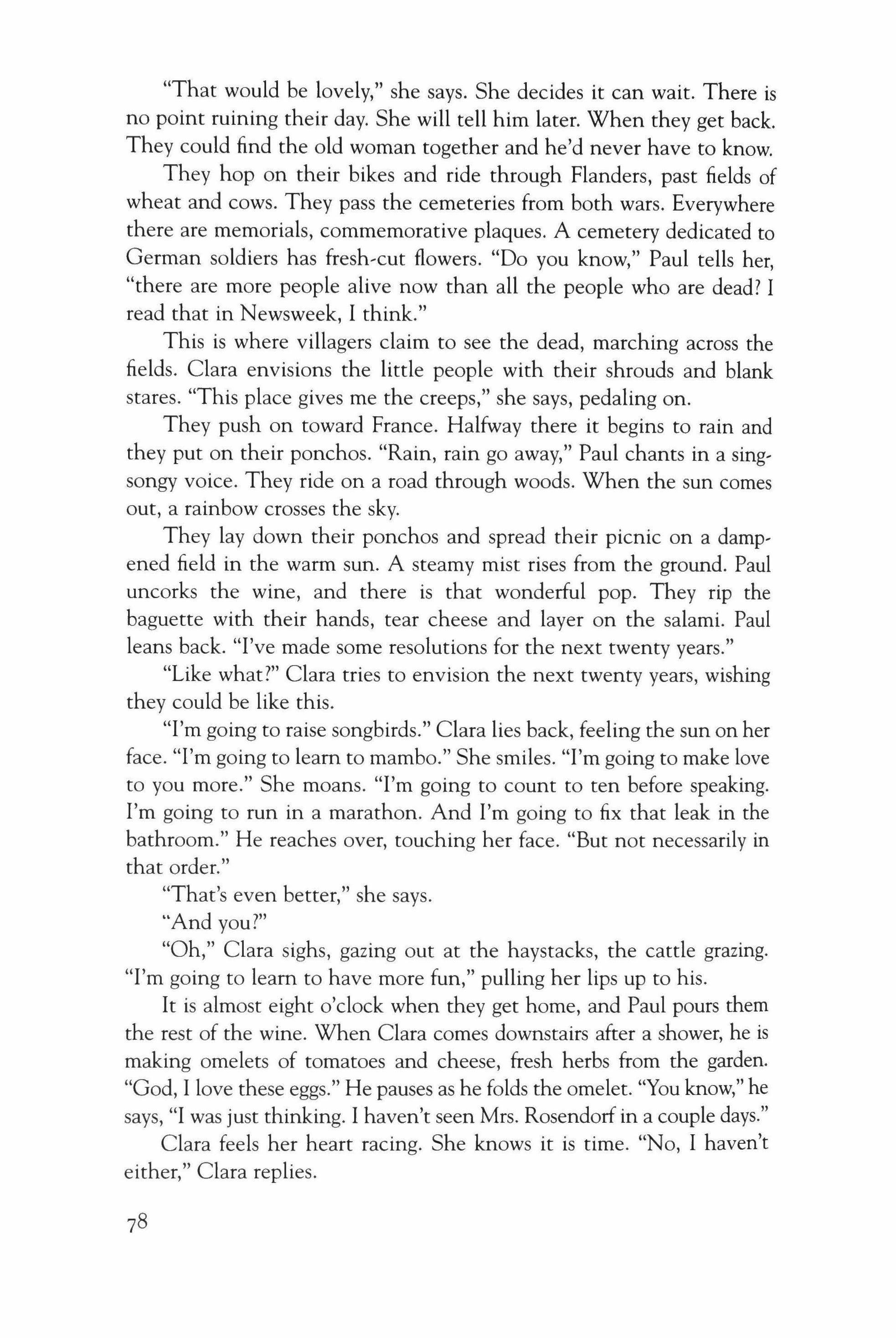
"That would be lovely," she says. She decides it can wait. There is no point ruining their day. She will tell him later. When they get back. They could find the old woman together and he'd never have to know.
They hop on their bikes and ride through Flanders, past fields of wheat and cows. They pass the cemeteries from both wars. Everywhere there are memorials, commemorative plaques. A cemetery dedicated to German soldiers has fresh-cut flowers. "Do you know," Paul tells her, "there are more people alive now than all the people who are dead? I read that in Newsweek, I think."
This is where villagers claim to see the dead, marching across the fields. Clara envisions the little people with their shrouds and blank stares. "This place gives me the creeps," she says, pedaling on.
They push on toward France. Halfway there it begins to rain and they put on their ponchos. "Rain, rain go away," Paul chants in a singsongy voice. They ride on a road through woods. When the sun comes out, a rainbow crosses the sky.
They lay down their ponchos and spread their picnic on a dampened field in the warm sun. A steamy mist rises from the ground. Paul uncorks the wine, and there is that wonderful pop. They rip the baguette with their hands, tear cheese and layer on the salami. Paul leans back. "I've made some resolutions for the next twenty years."
"Like what?" Clara tries to envision the next twenty years, wishing they could be like this.
"I'm going to raise songbirds." Clara lies back, feeling the sun on her face. "I'm going to learn to mambo." She smiles. "I'm going to make love to you more." She moans. "I'm going to count to ten before speaking. I'm going to run in a marathon. And I'm going to fix that leak in the bathroom." He reaches over, touching her face. "But not necessarily in that order."
"That's even better," she says.
"And you?"
"Oh," Clara sighs, gazing out at the haystacks, the cattle grazing. "I'm going to learn to have more fun," pulling her lips up to his. It is almost eight o'clock when they get home, and Paul pours them the rest of the wine. When Clara comes downstairs after a shower, he is making omelets of tomatoes and cheese, fresh herbs from the garden. "God, I love these eggs." He pauses as he folds the omelet. "You know," he says, "I was just thinking. I haven't seen Mrs. Rosendorf in a couple days."
Clara feels her heart racing. She knows it is time. "No, I haven't either," Clara replies.
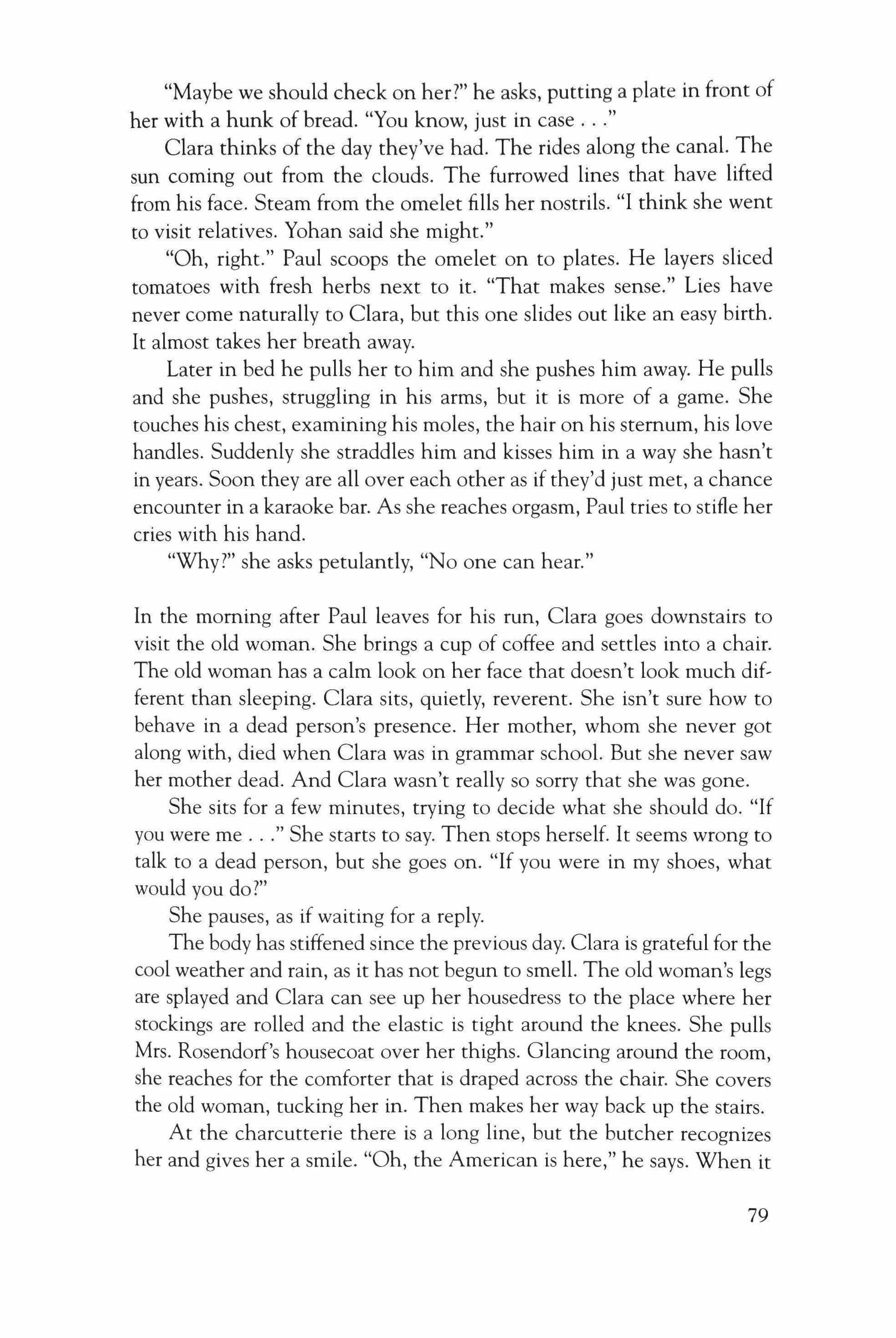
"Maybe we should check on her?" he asks, putting a plate in front of her with a hunk of bread. "You know, just in case
Clara thinks of the day they've had. The rides along the canal. The sun coming out from the clouds. The furrowed lines that have lifted from his face. Steam from the omelet fills her nostrils. "I think she went to visit relatives. Yohan said she might."
"Oh, right." Paul scoops the omelet on to plates. He layers sliced tomatoes with fresh herbs next to it. "That makes sense." Lies have never come naturally to Clara, but this one slides out like an easy birth. It almost takes her breath away.
Later in bed he pulls her to him and she pushes him away. He pulls and she pushes, struggling in his arms, but it is more of a game. She touches his chest, examining his moles, the hair on his sternum, his love handles. Suddenly she straddles him and kisses him in a way she hasn't in years. Soon they are all over each other as if they'd just met, a chance encounter in a karaoke bar. As she reaches orgasm, Paul tries to stifle her cries with his hand.
"Why?" she asks petulantly, "No one can hear."
In the morning after Paul leaves for his run, Clara goes downstairs to visit the old woman. She brings a cup of coffee and settles into a chair. The old woman has a calm look on her face that doesn't look much different than sleeping. Clara sits, quietly, reverent. She isn't sure how to behave in a dead person's presence. Her mother, whom she never got along with, died when Clara was in grammar school. But she never saw her mother dead. And Clara wasn't really so sorry that she was gone.
She sits for a few minutes, trying to decide what she should do. "If you were me She starts to say. Then stops herself. It seems wrong to talk to a dead person, but she goes on. "If you were in my shoes, what would you do?"
She pauses, as if waiting for a reply.
The body has stiffened since the previous day. Clara is grateful for the cool weather and rain, as it has not begun to smell. The old woman's legs are splayed and Clara can see up her housedress to the place where her stockings are rolled and the elastic is tight around the knees. She pulls Mrs. Rosendorf's housecoat over her thighs. Glancing around the room, she reaches for the comforter that is draped across the chair. She covers the old woman, tucking her in. Then makes her way back up the stairs.
At the charcutterie there is a long line, but the butcher recognizes her and gives her a smile. "Oh, the American is here," he says. When it
79
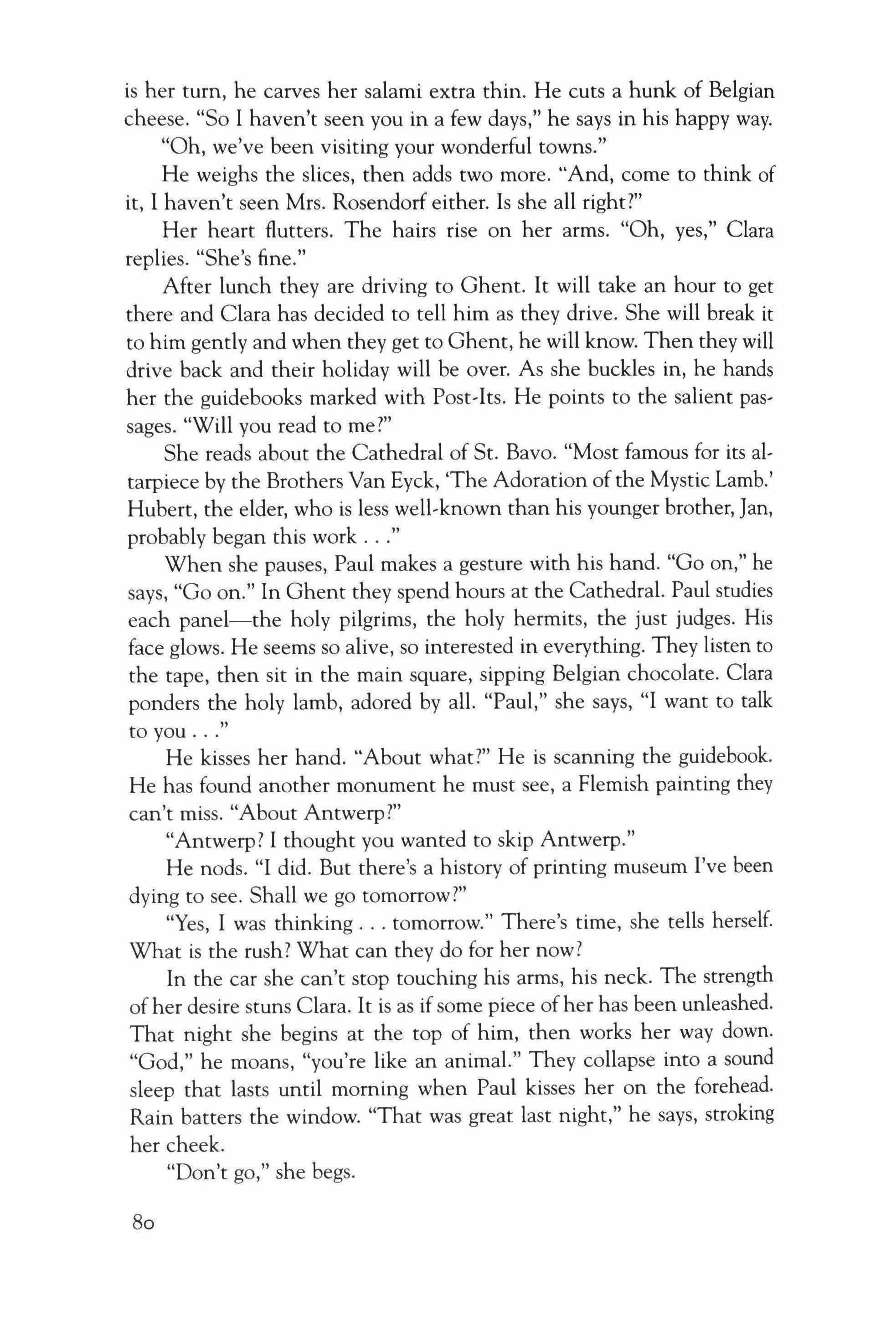
is her turn, he carves her salami extra thin. He cuts a hunk of Belgian cheese. "So I haven't seen you in a few days," he says in his happy way. "Oh, we've been visiting your wonderful towns."
He weighs the slices, then adds two more. "And, come to think of it, I haven't seen Mrs. Rosendorf either. Is she all right?"
Her heart flutters. The hairs rise on her arms. "Oh, yes," Clara replies. "She's fine."
After lunch they are driving to Ghent. It will take an hour to get there and Clara has decided to tell him as they drive. She will break it to him gently and when they get to Ghent, he will know. Then they will drive back and their holiday will be over. As she buckles in, he hands her the guidebooks marked with Post-Its. He points to the salient passages. "Will you read to me?"
She reads about the Cathedral of St. Bavo. "Most famous for its altarpiece by the Brothers Van Eyck, 'The Adoration of the Mystic Lamb.' Hubert, the elder, who is less well-known than his younger brother, Jan, probably began this work
When she pauses, Paul makes a gesture with his hand. "Go on," he says, "Go on." In Ghent they spend hours at the Cathedral. Paul studies each panel-the holy pilgrims, the holy hermits, the just judges. His face glows. He seems so alive, so interested in everything. They listen to the tape, then sit in the main square, sipping Belgian chocolate. Clara ponders the holy lamb, adored by all. "Paul," she says, "I want to talk to you
He kisses her hand. "About what?" He is scanning the guidebook. He has found another monument he must see, a Flemish painting they can't miss. "About Antwerp?"
"Antwerp? I thought you wanted to skip Antwerp."
He nods. "I did. But there's a history of printing museum I've been dying to see. Shall we go tomorrow?"
"Yes, I was thinking tomorrow." There's time, she tells herself. What is the rush? What can they do for her now?
In the car she can't stop touching his arms, his neck. The strength of her desire stuns Clara. It is as if some piece of her has been unleashed. That night she begins at the top of him, then works her way down. "God," he moans, "you're like an animal." They collapse into a sound sleep that lasts until morning when Paul kisses her on the forehead. Rain batters the window. "That was great last night," he says, stroking her cheek.
"Don't go," she begs.
80

"I'll be back soon," he smiles, sipping from the covers. He kisses her forehead. "Just rest."
But Clara doesn't. As soon as he is gone, she goes to visit the old woman. Rain pounds the roof as she makes her way downstairs. She comes into the room slowly and gazes at her. The face, which seemed gentle and amused, has hardened into a scowl.
This time Clara doesn't sit. She stands, scowling back at Mrs. Rosendorf. "We're happy," she says. "We haven't fought once. We're laughing all the time. We're making love again." She recalls all the effort it took to get here. Success or failure, everything seems to rest on the narrow pinnacle of this time. "How can I give this up?" Clara says out loud.
Outside the skies have darkened. The wind picks up. A door slams, but Clara doesn't think much about it until she is heading upstairs. The top of the landing is dark. When she reaches the door, she jiggles the knob, but it is loose and doesn't tum. She shakes it and the handle comes off in her hands. She stands, holding the brass knob, which must be as old as the house, then tries to slip it back. But the bolt has been stripped. She slides her fingers into the mechanism and tries to tum it manually, but it won't budge.
Clara stands at the top of the stairs. She bangs on the door, shout, ing. A shadow passes through the rooms below. It is only clouds moving across the sun, but Clara thinks it is someone walking. She hears the noises of the house. A door creaking. Feet on the stairs. "Oh, my god She sinks to the floor, knees curled to her chin. On the dark, ened stairwell her heart beats in her chest. Then she gets up and bangs some more.
She is pounding when Paul, his skin glistening in sweat, opens. "Clara, what are you doing here?" he asks.
"I was just checking on the old woman," she replies. He shakes his head. "And "
Clara thinks about their house exchange. They have only five days left. "She's dead," Clara replies.
"She's what "
"She's dead. She died. Maybe a few days ago. Maybe more. I don't know." She holds the doorknob in her hand. "The chickens hadn't been fed so I went to check."
"Oh, my God, that's terrible Grabbing a towel off the drum set, Paul stands frozen before her.
"Yes, I know" Clara says, "It is."
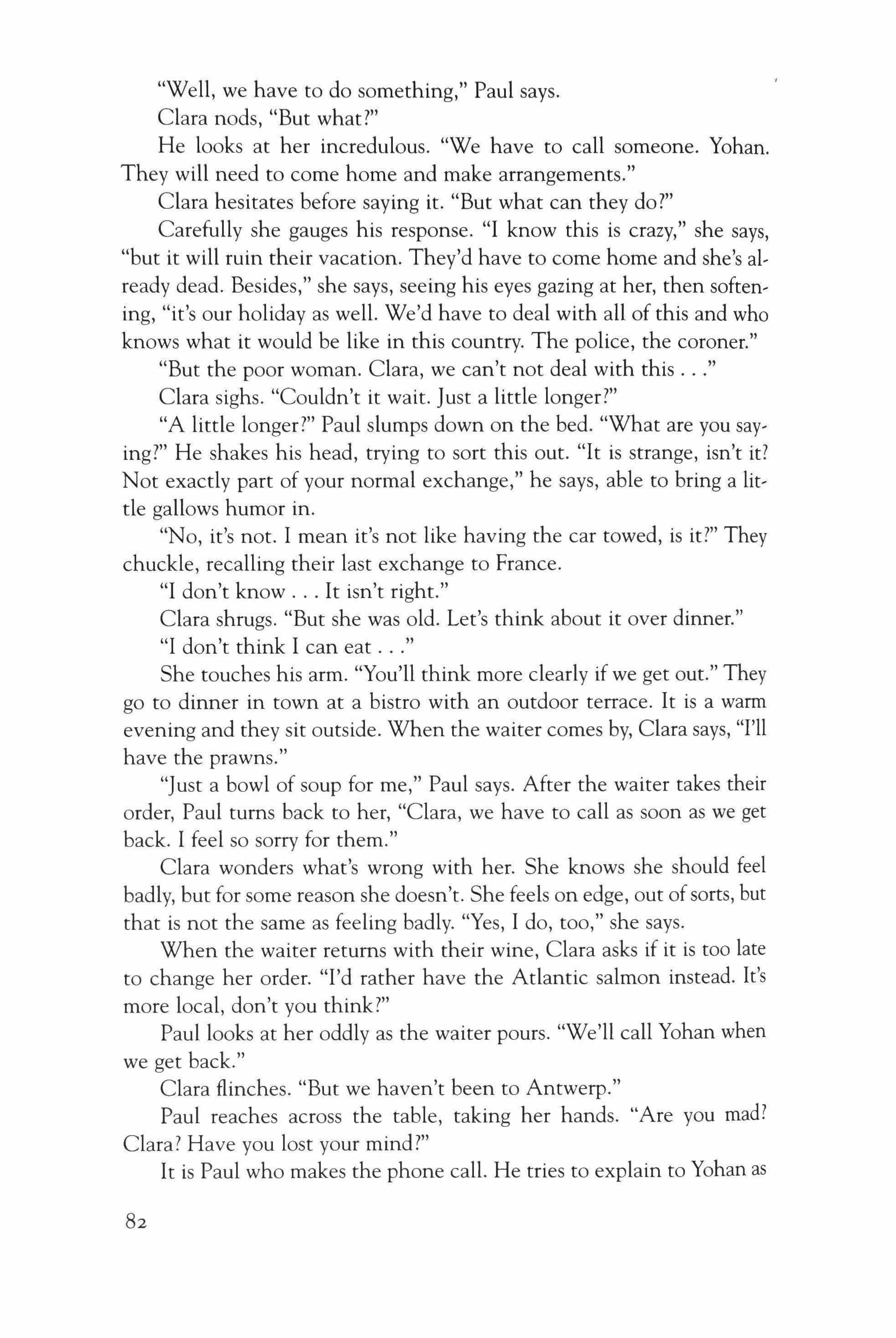
"Well, we have to do something," Paul says.
Clara nods, "But what?"
He looks at her incredulous. "We have to call someone. Yohan. They will need to come home and make arrangements."
Clara hesitates before saying it. "But what can they do?"
Carefully she gauges his response. "I know this is crazy," she says, "but it will ruin their vacation. They'd have to come home and she's already dead. Besides," she says, seeing his eyes gazing at her, then softening, "it's our holiday as well. We'd have to deal with all of this and who knows what it would be like in this country. The police, the coroner."
"But the poor woman. Clara, we can't not deal with this
Clara sighs. "Couldn't it wait. Just a little longer?"
"A little longer?" Paul slumps down on the bed. "What are you saying?" He shakes his head, trying to sort this out. "It is strange, isn't it?
Not exactly part of your normal exchange," he says, able to bring a little gallows humor in.
"No, it's not. I mean it's not like having the car towed, is it?" They chuckle, recalling their last exchange to France.
"I don't know It isn't right."
Clara shrugs. "But she was old. Let's think about it over dinner."
"I don't think I can eat
She touches his arm. "You'll think more clearly if we get out." They go to dinner in town at a bistro with an outdoor terrace. It is a warm evening and they sit outside. When the waiter comes by, Clara says, "I'll have the prawns."
"Just a bowl of soup for me," Paul says. After the waiter takes their order, Paul turns back to her, "Clara, we have to call as soon as we get back. I feel so sorry for them."
Clara wonders what's wrong with her. She knows she should feel badly, but for some reason she doesn't. She feels on edge, out of sorts, but that is not the same as feeling badly. "Yes, I do, too," she says.
When the waiter returns with their wine, Clara asks if it is too late to change her order. "I'd rather have the Atlantic salmon instead. It's more local, don't you think?"
Paul looks at her oddly as the waiter pours. "We'll call Yohan when we get back."
Clara flinches. "But we haven't been to Antwerp."
Paul reaches across the table, taking her hands. "Are you mad? Clara? Have you lost your mind?"
It is Paul who makes the phone call. He tries to explain to Yohan as
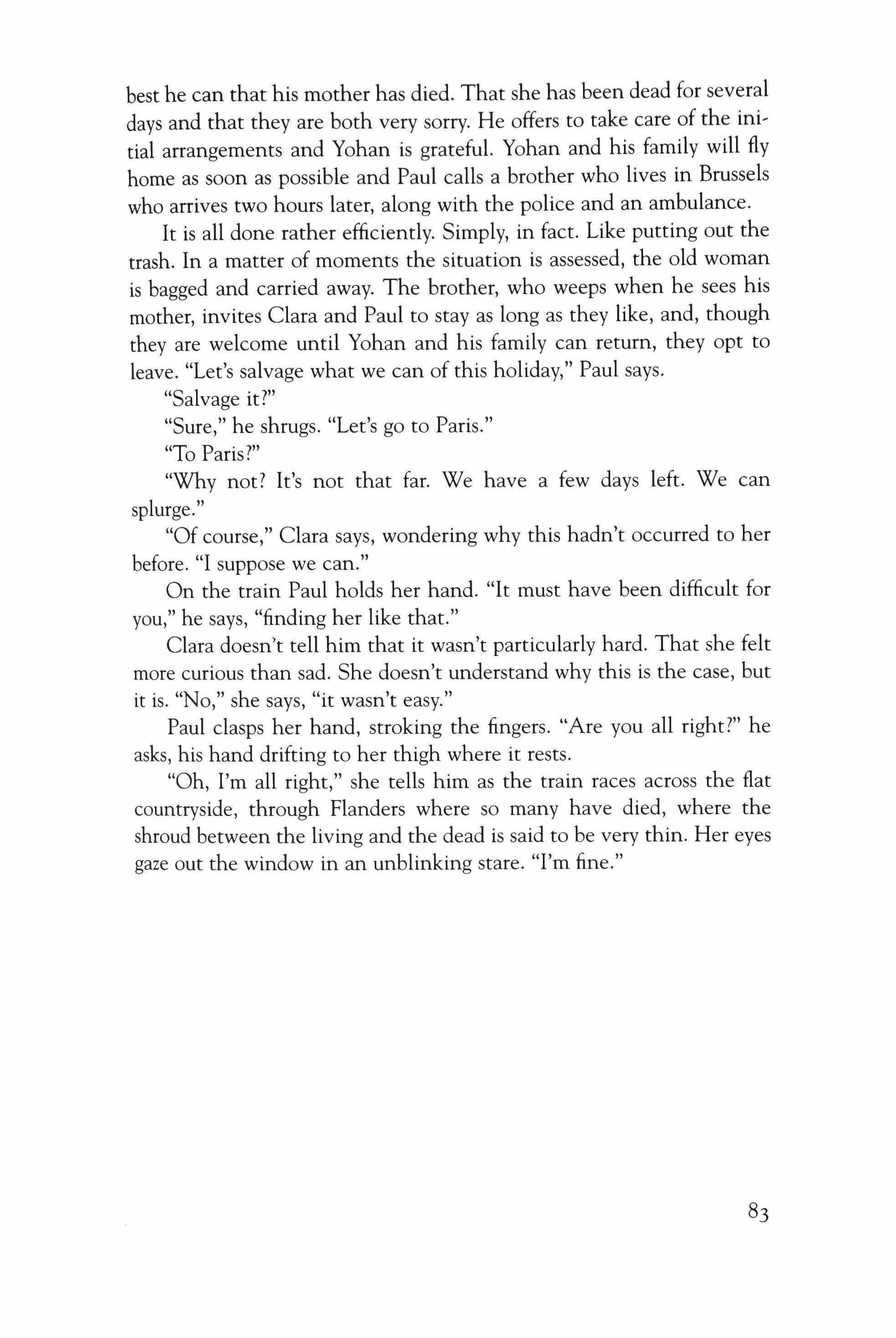
best he can that his mother has died. That she has been dead for several days and that they are both very sorry. He offers to take care of the initial arrangements and Yohan is grateful. Yohan and his family will fly home as soon as possible and Paul calls a brother who lives in Brussels who arrives two hours later, along with the police and an ambulance. It is all done rather efficiently. Simply, in fact. Like putting out the trash. In a matter of moments the situation is assessed, the old woman is bagged and carried away. The brother, who weeps when he sees his mother, invites Clara and Paul to stay as long as they like, and, though they are welcome until Yohan and his family can return, they opt to leave. "Let's salvage what we can of this holiday," Paul says.
"Salvage it?"
"Sure," he shrugs. "Let's go to Paris."
"To Paris?"
"Why not? It's not that far. We have a few days left. We can splurge."
"Of course," Clara says, wondering why this hadn't occurred to her before. "1 suppose we can."
On the train Paul holds her hand. "It must have been difficult for you," he says, "finding her like that."
Clara doesn't tell him that it wasn't particularly hard. That she felt more curious than sad. She doesn't understand why this is the case, but it is. "No," she says, "it wasn't easy."
Paul clasps her hand, stroking the fingers. "Are you all right?" he asks, his hand drifting to her thigh where it rests.
"Oh, I'm all right," she tells him as the train races across the flat countryside, through Flanders where so many have died, where the shroud between the living and the dead is said to be very thin. Her eyes gaze out the window in an unblinking stare. "I'm fine."
Debora Greger

Keats Writes to a Young Poet of the Seventies
I think of the Elgin marbles. Of how many men it would take to wrestle the wreck of my heart on board a ship in the bay of Naples so by the greasy Thames it might lie.
And consider the ox tugging at the heart, the great cords of its neck ropy with strain: first, it spent a year learning to listen to the lash, until the power to answer back was all it lacked. The horse brought from the field forgets its mother,
going up and down instead for its master. It stands still in the stable, fearing a beating. Stand still. Listen to the page, if not to me.
When you despair, a blank one pleases more than beer, if not more than a clean shirt.
Must you rush off to see foreign flowers in hothouses? I did and cared not a straw for them. Oh, to see again the muddied flowers of an English spring! Would that I were a sort of ethereal pig turned loose to feed among them-
I the winged thing that lived but three summer days.
My Brief Reign As Emperor
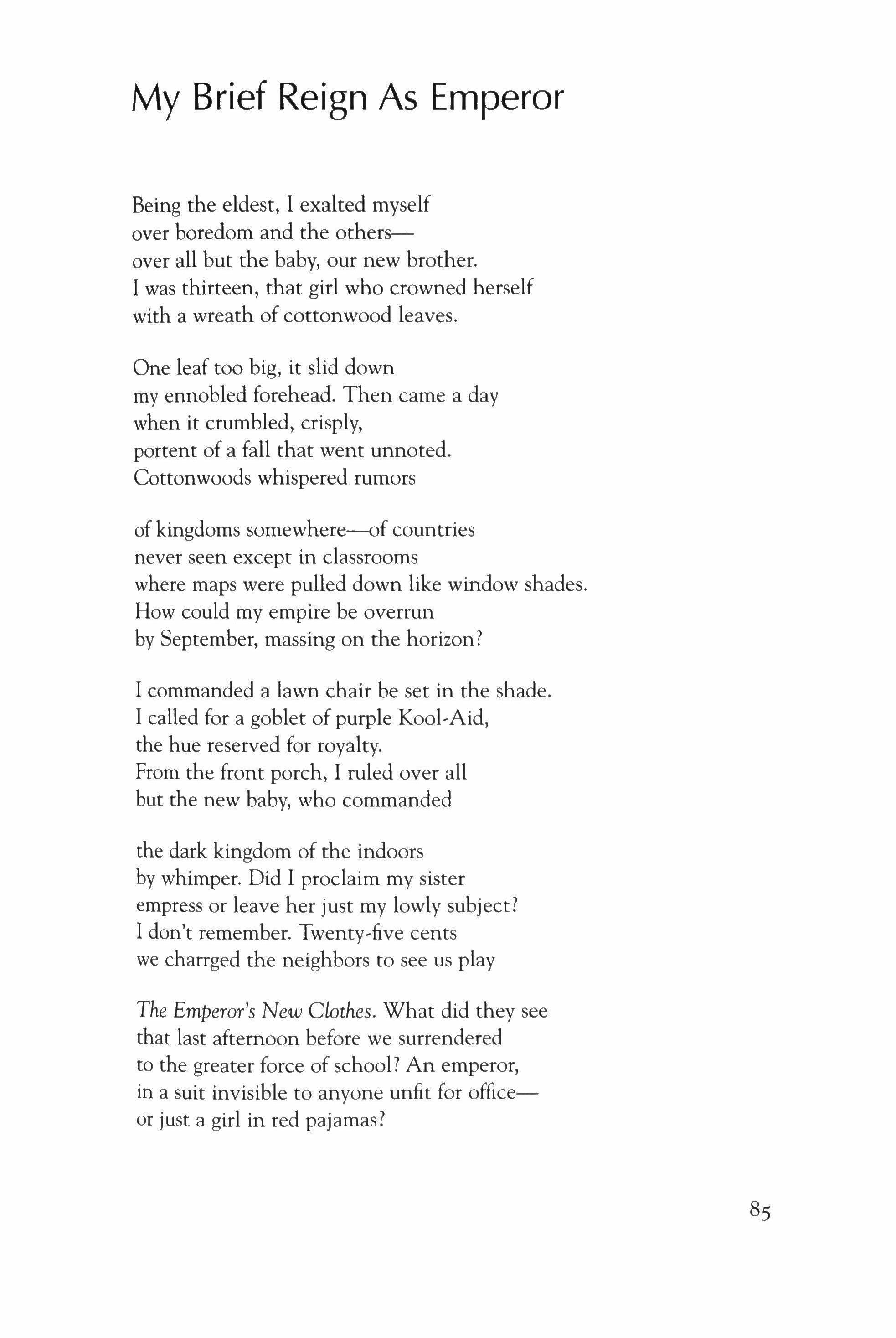
Being the eldest, I exalted myself over boredom and the othersover all but the baby, our new brother. I was thirteen, that girl who crowned herself with a wreath of cottonwood leaves.
One leaf too big, it slid down my ennobled forehead. Then came a day when it crumbled, crisply, portent of a fall that went unnoted. Cottonwoods whispered rumors of kingdoms somewhere-of countries never seen except in classrooms where maps were pulled down like window shades. How could my empire be overrun by September, massing on the horizon?
I commanded a lawn chair be set in the shade. I called for a goblet of purple Kool-Aid, the hue reserved for royalty.
From the front porch, I ruled over all but the new baby, who commanded
the dark kingdom of the indoors by whimper. Did I proclaim my sister empress or leave her just my lowly subject? I don't remember. Twenty-five cents we charrged the neighbors to see us play
The Emperor's New Clothes. What did they see that last afternoon before we surrendered to the greater force of school? An emperor, in a suit invisible to anyone unfit for officeor just a girl in red pajamas?
85
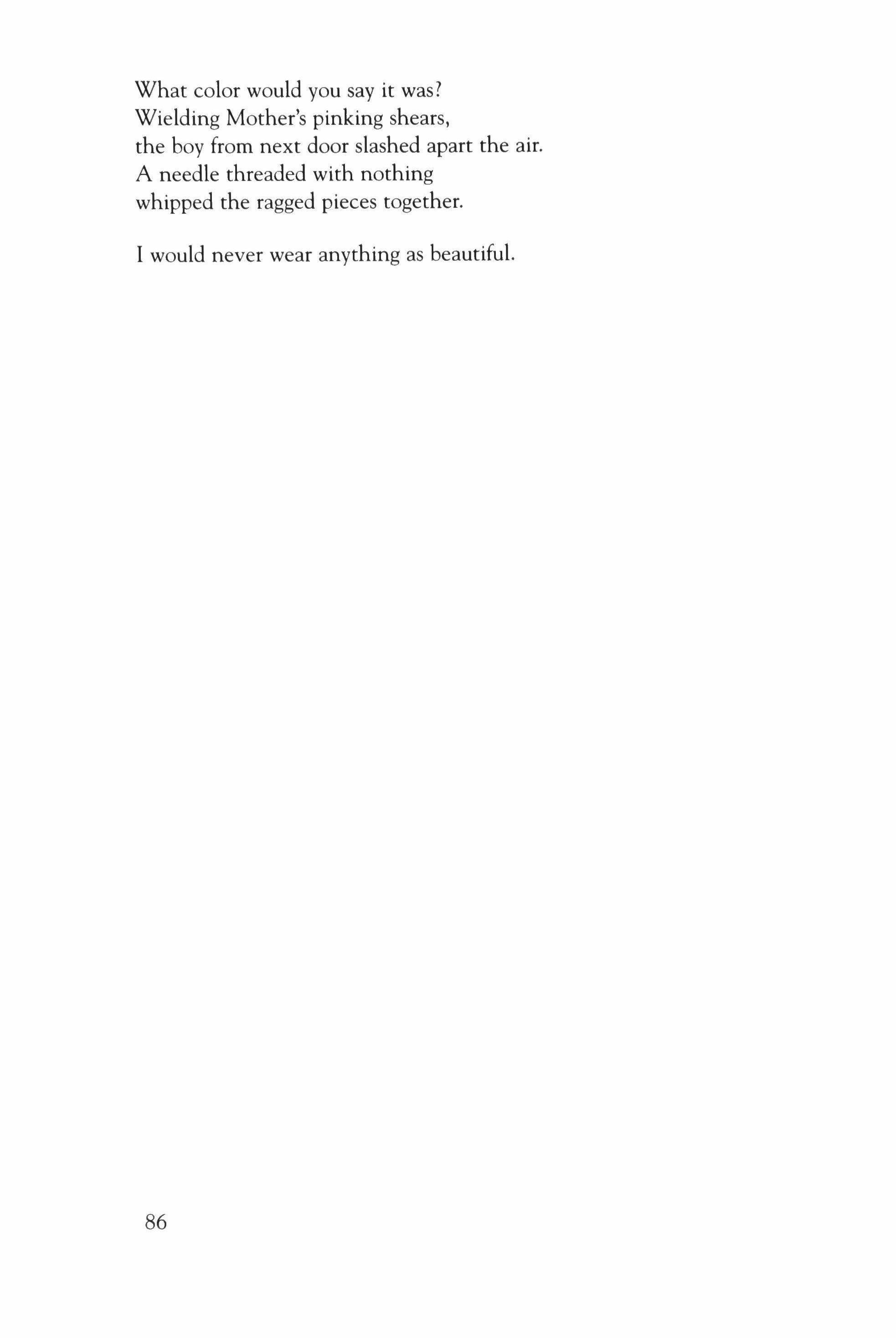
What color would you say it was?
Wielding Mother's pinking shears, the boy from next door slashed apart the air.
A needle threaded with nothing whipped the ragged pieces together.
I would never wear anything as beautiful.
86
To the Gods of Summer
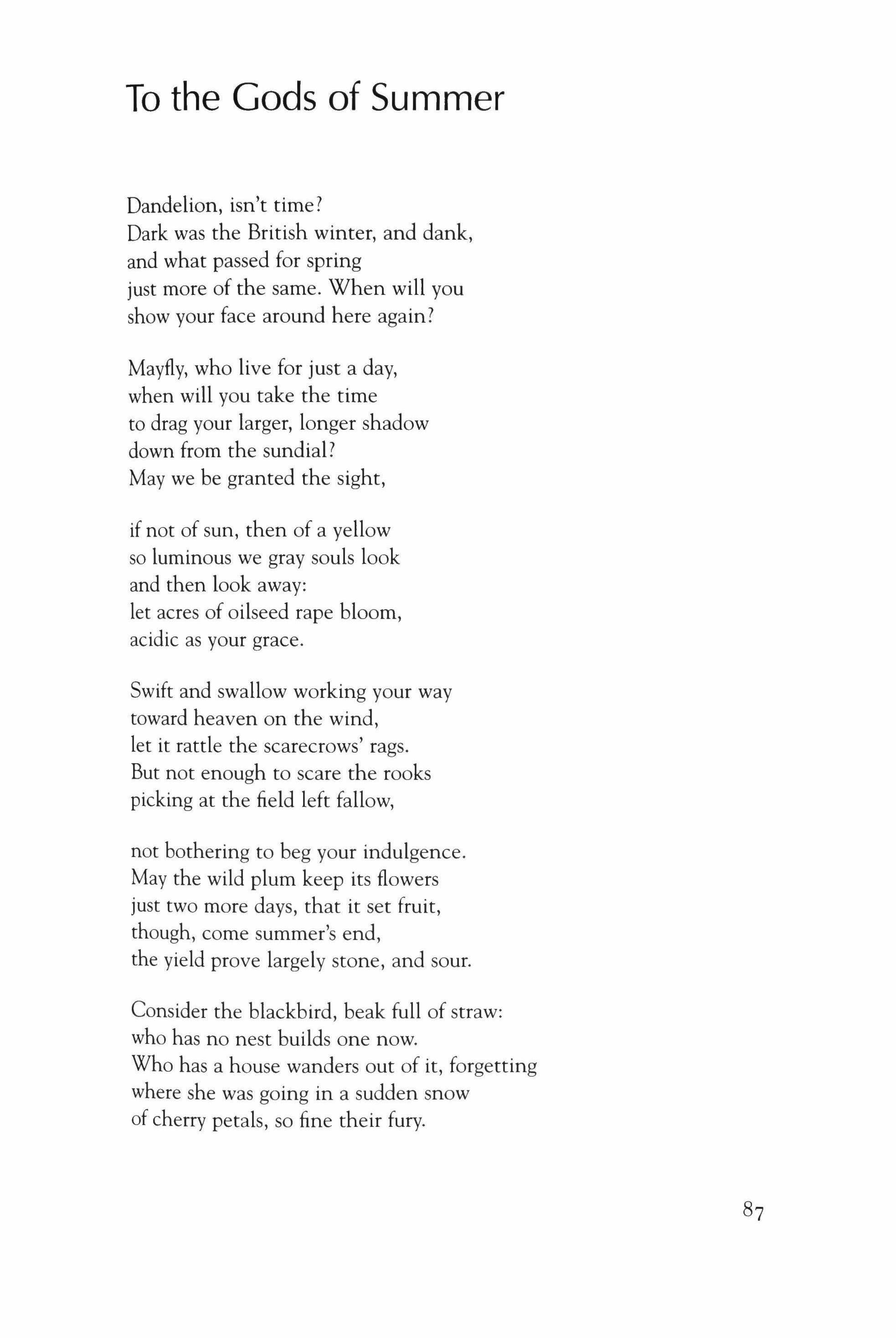
Dandelion, isn't time?
Dark was the British winter, and dank, and what passed for spring
just more of the same. When will you show your face around here again?
Mayfly, who live for just a day, when will you take the time to drag your larger, longer shadow down from the sundial?
May we be granted the sight, if not of sun, then of a yellow so luminous we gray souls look and then look away: let acres of oilseed rape bloom, acidic as your grace.
Swift and swallow working your way toward heaven on the wind, let it rattle the scarecrows' rags. But not enough to scare the rooks picking at the field left fallow,
not bothering to beg your indulgence. May the wild plum keep its flowers just two more days, that it set fruit, though, come summer's end, the yield prove largely stone, and sour.
Consider the blackbird, beak full of straw: who has no nest builds one now. Who has a house wanders out of it, forgetting where she was going in a sudden snow of cherry petals, so fine their fury.
Reginald Shepherd
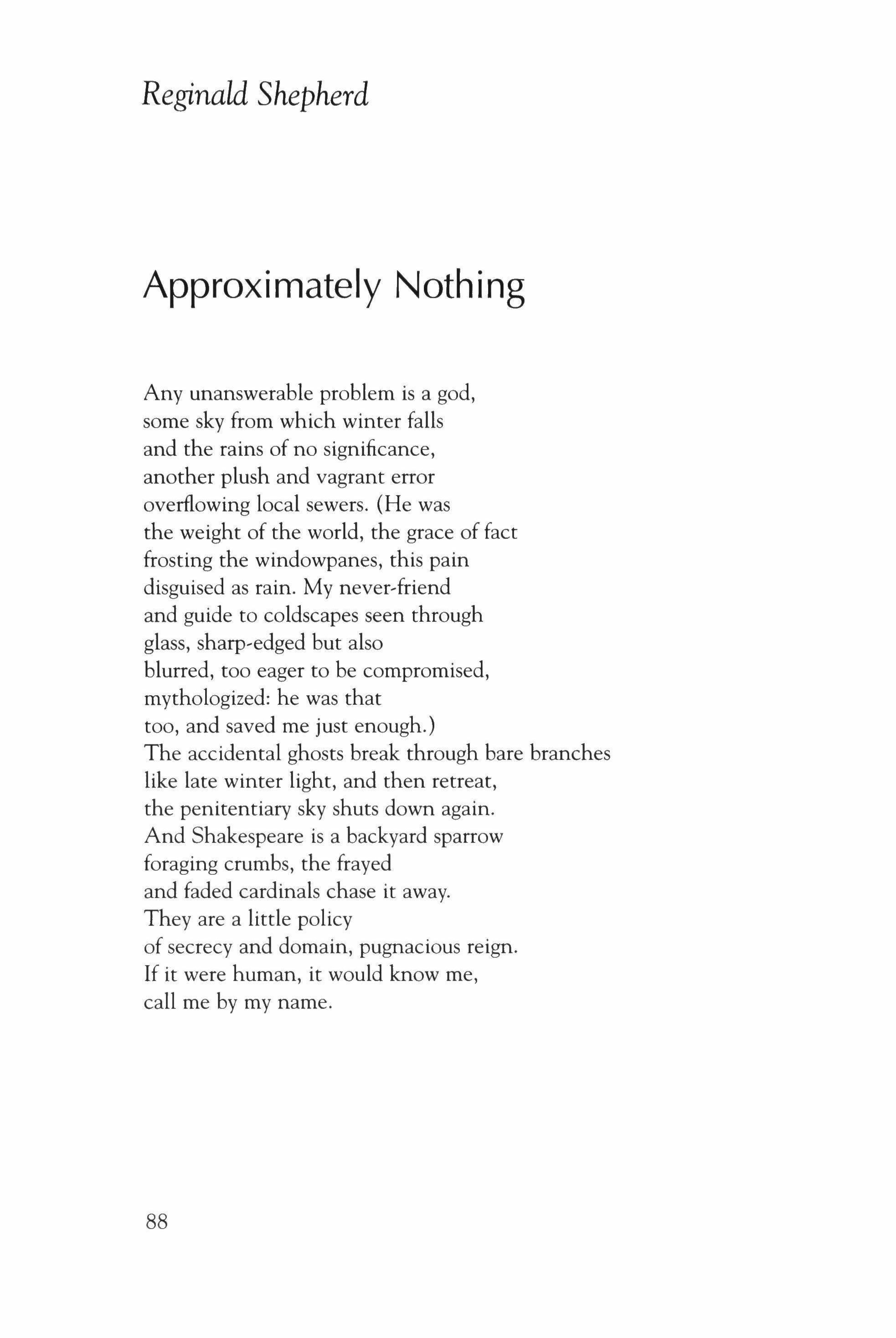
Approximately Nothing
Any unanswerable problem is a god, some sky from which winter falls and the rains of no significance, another plush and vagrant error overflowing local sewers. (He was the weight of the world, the grace of fact frosting the windowpanes, this pain disguised as rain. My never-friend and guide to coldscapes seen through glass, sharp,edged but also blurred, too eager to be compromised, mythologized: he was that too, and saved me just enough.)
The accidental ghosts break through bare branches like late winter light, and then retreat, the penitentiary sky shuts down again. And Shakespeare is a backyard sparrow foraging crumbs, the frayed and faded cardinals chase it away. They are a little policy of secrecy and domain, pugnacious reign. If it were human, it would know me, call me by my name.
88
Natural Selection
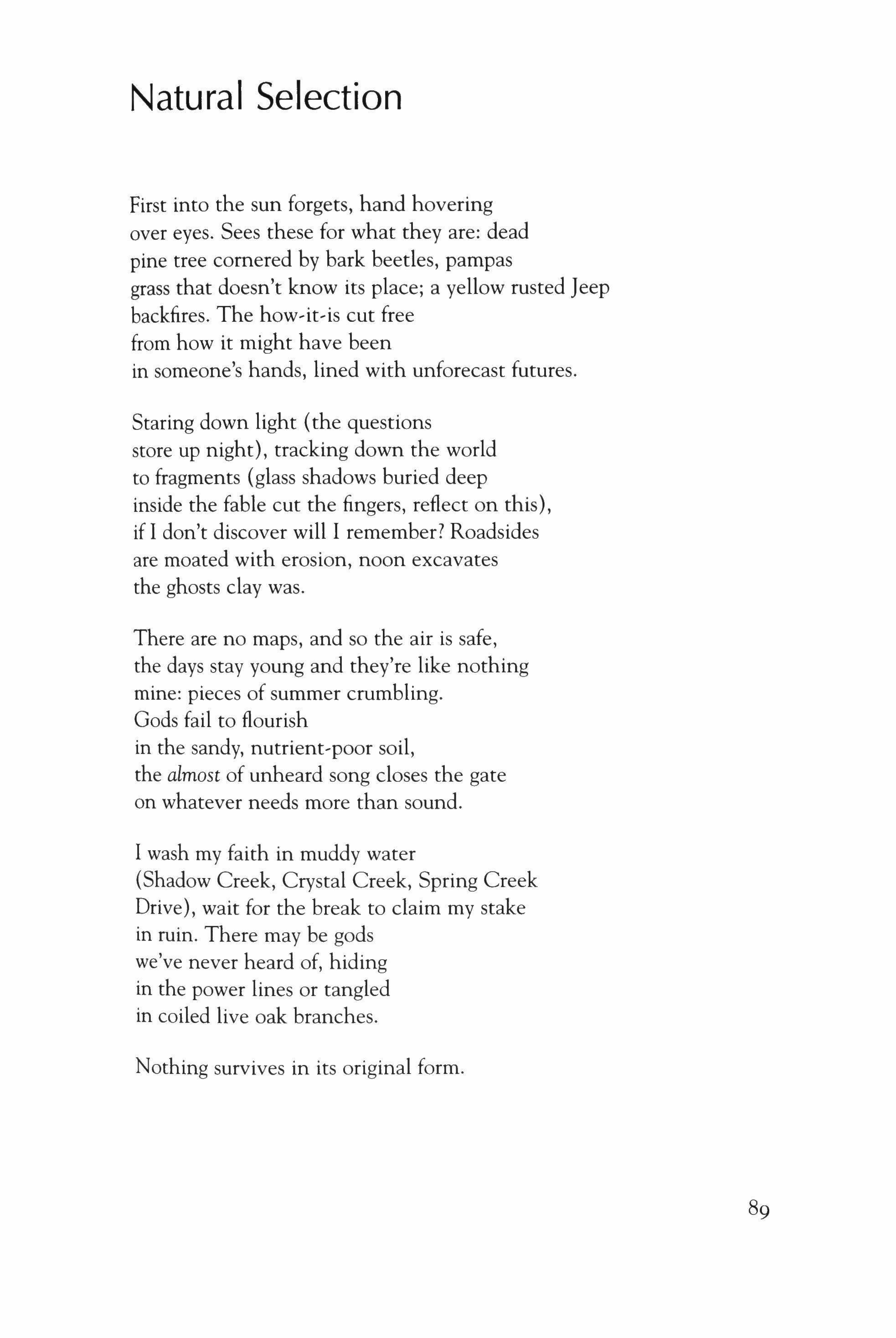
First into the sun forgets, hand hovering over eyes. Sees these for what they are: dead pine tree cornered by bark beetles, pampas grass that doesn't know its place; a yellow rusted Jeep backfires. The how-it-is cut free from how it might have been in someone's hands, lined with unforecast futures.
Staring down light (the questions store up night), tracking down the world to fragments (glass shadows buried deep inside the fable cut the fingers, reflect on this), if I don't discover will I remember? Roadsides are moated with erosion, noon excavates the ghosts clay was.
There are no maps, and so the air is safe, the days stay young and they're like nothing mine: pieces of summer crumbling. Gods fail to flourish in the sandy, nutrient-poor soil, the almost of unheard song closes the gate on whatever needs more than sound.
I wash my faith in muddy water (Shadow Creek, Crystal Creek, Spring Creek Drive), wait for the break to claim my stake in ruin. There may be gods we've never heard of, hiding in the power lines or tangled in coiled live oak branches.
Nothing survives in its original form.
To Be Free
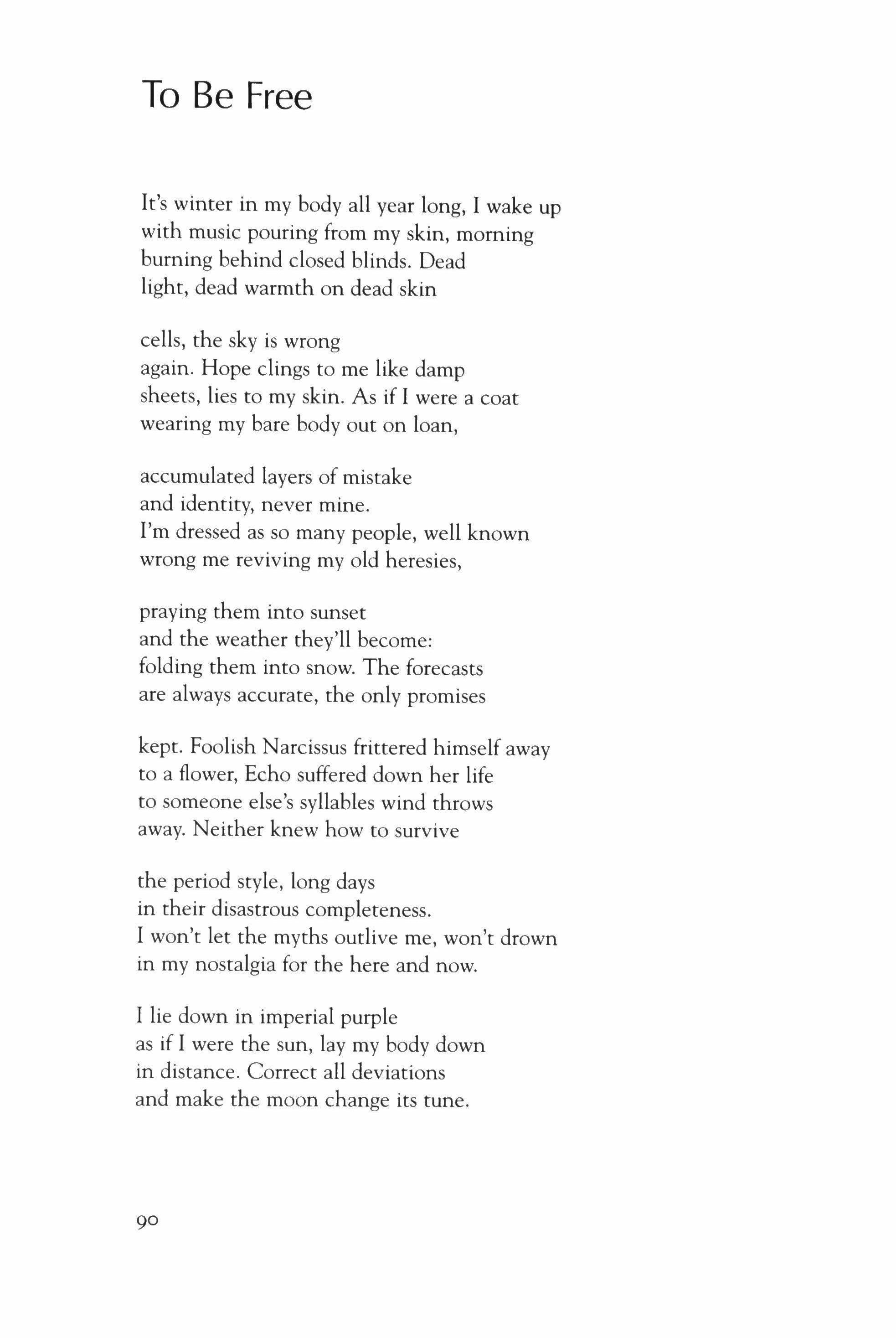
It's winter in my body all year long, I wake up with music pouring from my skin, morning burning behind closed blinds. Dead light, dead warmth on dead skin
cells, the sky is wrong again. Hope clings to me like damp sheets, lies to my skin. As if I were a coat wearing my bare body out on loan,
accumulated layers of mistake and identity, never mine.
I'm dressed as so many people, well known wrong me reviving mv old heresies, praying them into sunset and the weather they'll become: folding them into snow. The forecasts are always accurate, the only promises
kept. Foolish Narcissus frittered himself away to a flower, Echo suffered down her life to someone else's syllables wind throws away. Neither knew how to survive
the period style, long days in their disastrous completeness. I won't let the myths outlive me, won't drown in my nostalgia for the here and now.
I lie down in imperial purple as if I were the sun, lay my body down in distance. Correct all deviations and make the moon change its tune.
Amit Majmudar
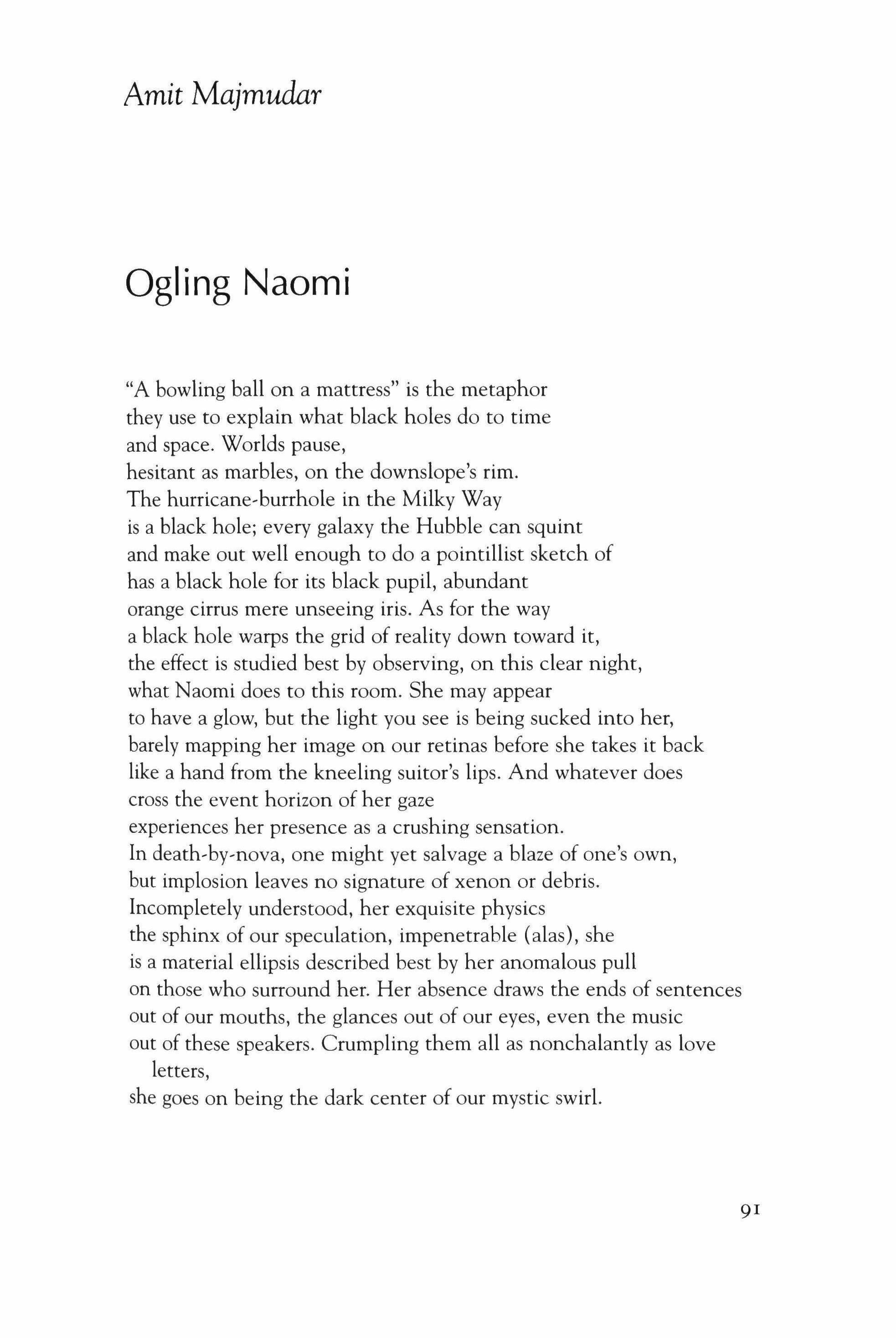
Ogling Naomi
"A bowling ball on a mattress" is the metaphor they use to explain what black holes do to time and space. Worlds pause, hesitant as marbles, on the downslope's rim. The hurricane-burrhole in the Milky Way is a black hole; every galaxy the Hubble can squint and make out well enough to do a pointillist sketch of has a black hole for its black pupil, abundant orange cirrus mere unseeing iris. As for the way a black hole warps the grid of reality down toward it, the effect is studied best by observing, on this clear night, what Naomi does to this room. She may appear to have a glow, but the light you see is being sucked into her, barely mapping her image on our retinas before she takes it back like a hand from the kneeling suitor's lips. And whatever does cross the event horizon of her gaze experiences her presence as a crushing sensation. In death-by-nova, one might yet salvage a blaze of one's own, but implosion leaves no signature of xenon or debris. Incompletely understood, her exquisite physics the sphinx of our speculation, impenetrable (alas), she is a material ellipsis described best by her anomalous pull on those who surround her. Her absence draws the ends of sentences out of our mouths, the glances out of our eyes, even the music out of these speakers. Crumpling them all as nonchalantly as love letters, she goes on being the dark center of our mystic swirl.
91
Static Electricity
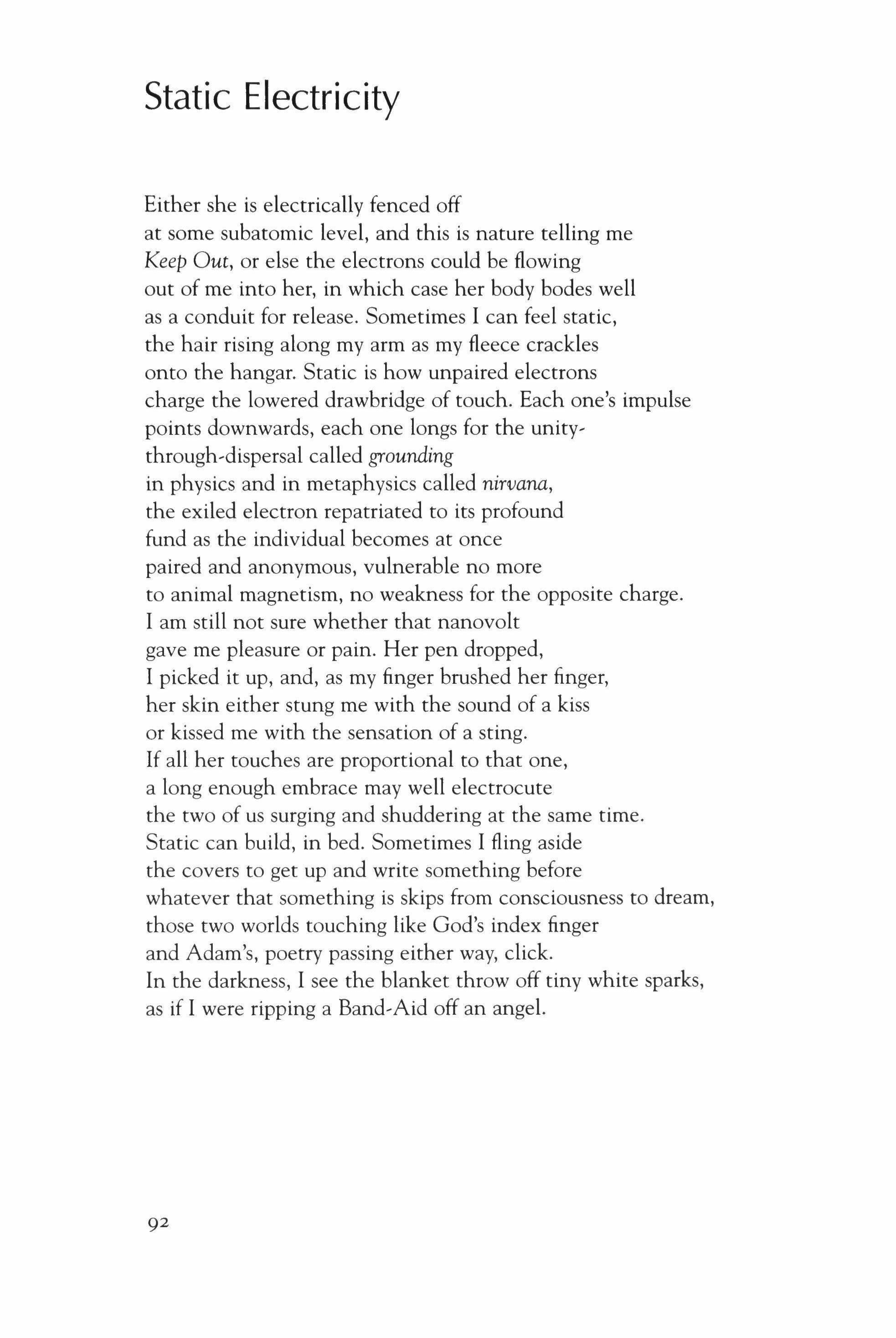
Either she is electrically fenced off at some subatomic level, and this is nature telling me Keep Out, or else the electrons could be flowing out of me into her, in which case her body bodes well as a conduit for release. Sometimes I can feel static, the hair rising along my arm as my fleece crackles onto the hangar. Static is how unpaired electrons charge the lowered drawbridge of touch. Each one's impulse points downwards, each one longs for the unity, through-dispersal called gTOunding in physics and in metaphysics called nirvana, the exiled electron repatriated to its profound fund as the individual becomes at once paired and anonymous, vulnerable no more to animal magnetism, no weakness for the opposite charge. I am still not sure whether that nanovolt gave me pleasure or pain. Her pen dropped, I picked it up, and, as my finger brushed her finger, her skin either stung me with the sound of a kiss or kissed me with the sensation of a sting. If all her touches are proportional to that one, a long enough embrace may well electrocute the two of us surging and shuddering at the same time. Static can build, in bed. Sometimes I fling aside the covers to get up and write something before whatever that something is skips from consciousness to dream, those two worlds touching like God's index finger and Adam's, poetry passing either way, click. In the darkness, I see the blanket throw off tiny white sparks, as if I were ripping a Band-Aid off an angel.
Page Hill Starzinger
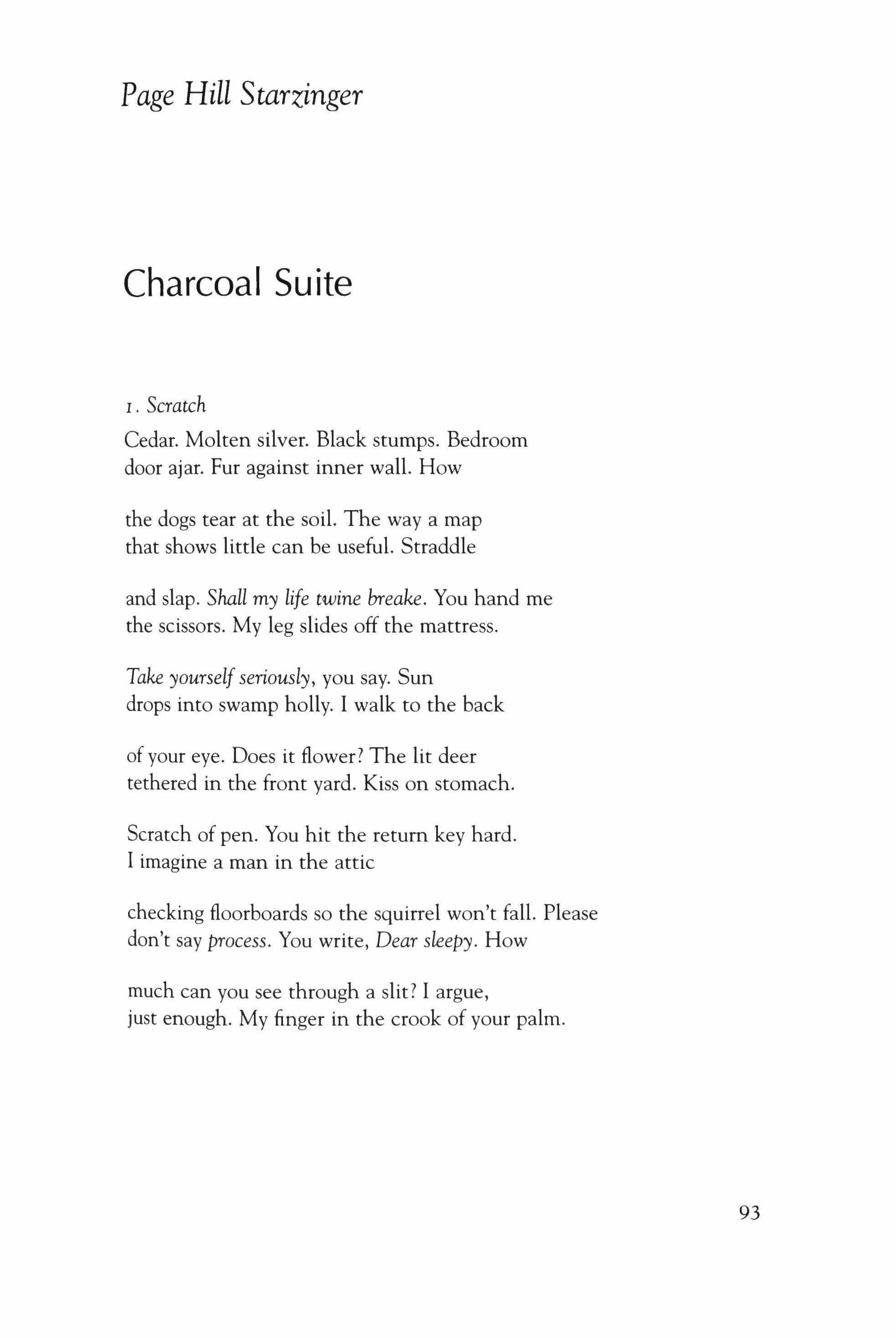
Charcoal
Suite
I. Scratch
Cedar. Molten silver. Black stumps. Bedroom door ajar. Fur against inner wall. How the dogs tear at the soil. The way a map that shows little can be useful. Straddle and slap. Shall my life twine breake. You hand me the scissors. My leg slides off the mattress.
Take yourselfseriously, you say. Sun drops into swamp holly. I walk to the back of your eye. Does it flower? The lit deer tethered in the front yard. Kiss on stomach.
Scratch of pen. You hit the return key hard. I imagine a man in the attic checking floorboards so the squirrel won't fall. Please don't say process. You write, Dear sleepy. How much can you see through a slit? I argue, just enough. My finger in the crook of your palm.
93

2. Char
You of two ex-wives. Me of no husband. The ladder warns: Keep body centered. Do not overreach. I eat her walnut bread.
It's good with sharp cheddar. Did she teach you that? I am watching you remember her: a movie I can't catch sight of. But I smell her: cheese melting on cranberry. Basket of bittersweet. Deer belly in weeds. House burnt black: making way for an ex-
pressway. I am taking the USB memory stick out of your computer. In the Levinas you circle Hope does
not refer like an awaiting, to some thing that must come about. Name every way you have lit a fire.
3. Nest
There is a knocking. Small and distinct. Hand on bark. Flash of red. Swollen river. I trail behind. As we drive, rain on windshield, you don't turn on wipers. I'm looking past the drops. At the gas station, a hole in the canopy and from it the sound of small birds. 25¢ coffee. At the airport, afterward, I head in the wrong direction. I say I really can take care ofmyself. In an e-mail, you say you are rooting wild holly so we'll have bushes for our house, wherever that may be: bending a low branch to the earth, pressing it with a rock and letting it be.
94
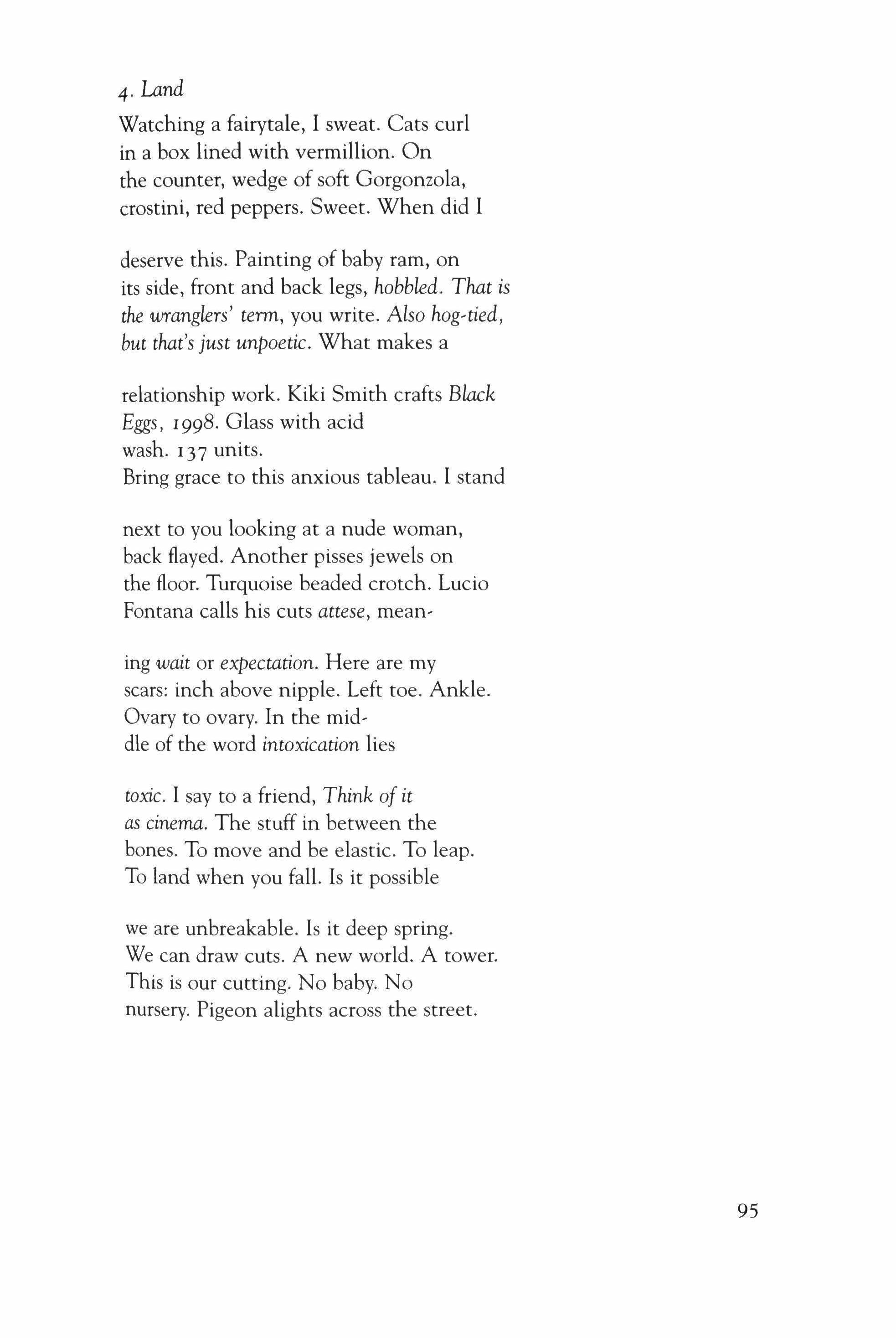
4.
Land
Watching a fairytale, I sweat. Cats curl in a box lined with vermillion. On the counter, wedge of soft Gorgonzola, crostini, red peppers. Sweet. When did I
deserve this. Painting of baby ram, on its side, front and back legs, hobbled. That is the wranglers' term, you write. Also hog�tied, but that's just unpoetic. What makes a
relationship work. Kiki Smith crafts Black Eggs, 1998. Glass with acid wash. 137 units.
Bring grace to this anxious tableau. I stand next to you looking at a nude woman, back flayed. Another pisses jewels on the floor. Turquoise beaded crotch. Lucio Fontana calls his cuts attese, mean-
ing wait or expectation. Here are my scars: inch above nipple. Left toe. Ankle.
Ovary to ovary. In the middle of the word intoxication lies
toxic. I say to a friend, Think of it as cinema. The stuff in between the bones. To move and be elastic. To leap. To land when you fall. Is it possible
we are unbreakable. Is it deep spring. We can draw cuts. A new world. A tower. This is our cutting. No baby. No nursery. Pigeon alights across the street.
95
Like splayed tulip petals

sewn shut with silk to conceal anthers: the gardens of Sultan Ahmed II lit by candles fastened
to giant tortoises: I outline my body in a hollow carved by an animal, crushing white star-flowers while you watch from your low gilded walnut armchair, circa 1780: well, there are many ways of not allowing ourselves what we want.
This is our blind spot
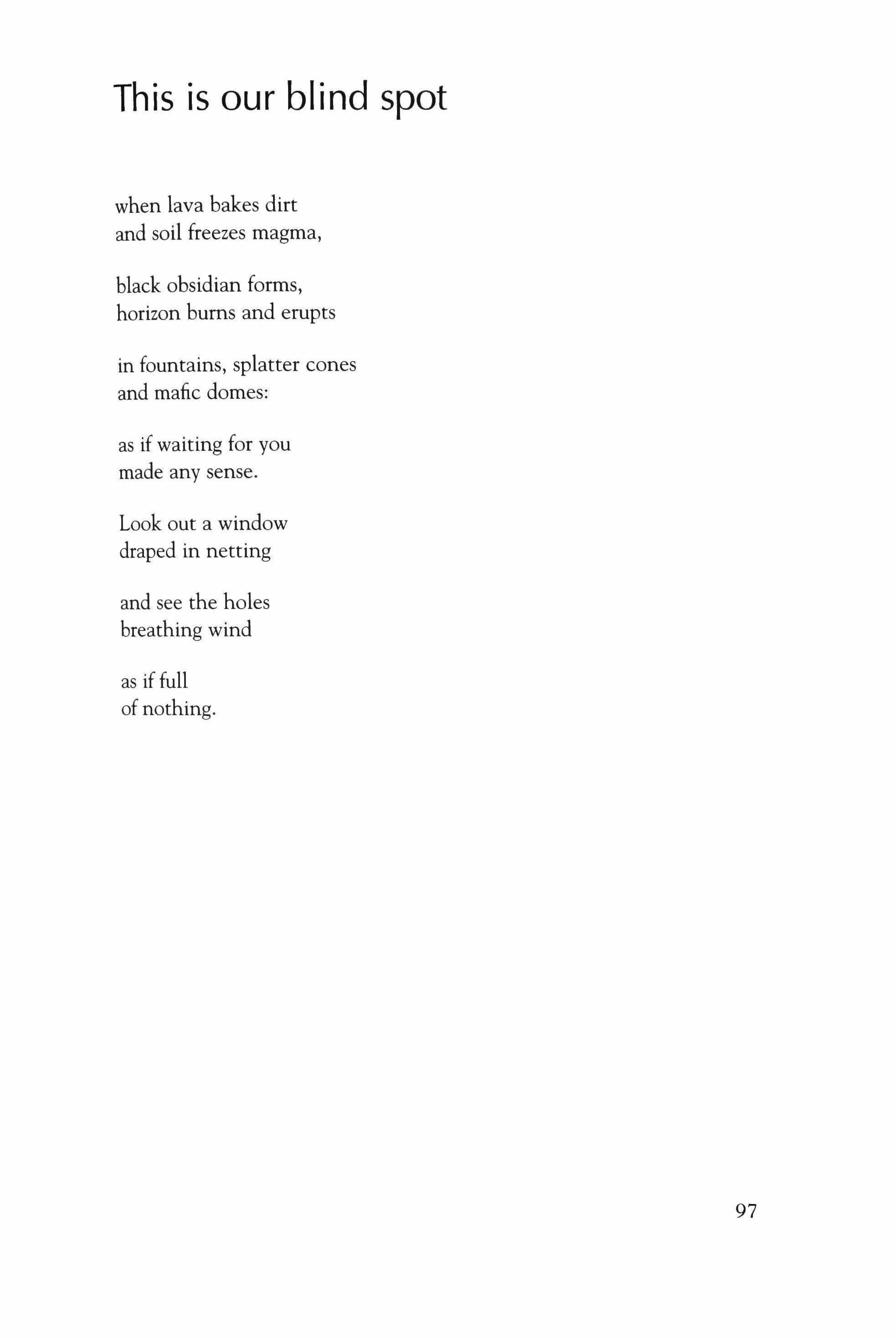
when lava bakes dirt and soil freezes magma, black obsidian forms, horizon bums and erupts in fountains, splatter cones and mafic domes:
as if waiting for you made any sense.
Look out a window draped in netting and see the holes breathing wind
as if full of nothing.
97
Titian's Danae
 For Richard Wilbur
For Richard Wilbur
It is the same gold, blushing out of the same veil of cloud-neither chaos nor storm nor the punctuations of the horizon.
This cloud is the third party. How different the eyes that ponder the thump and twinkle onto lap and velvet of its aureate gush. The muscular peasant woman, too shabby to be a servant, contrasts with the supple yet masculine nude young female, her head drugged back into the cupped palm of the pillow in the room her father sealed against temptations. These women are two desires who have met here to meet the painter's need for stones at opposite bases of an arch. And the god so bent
Ricardo Pau--Llosa
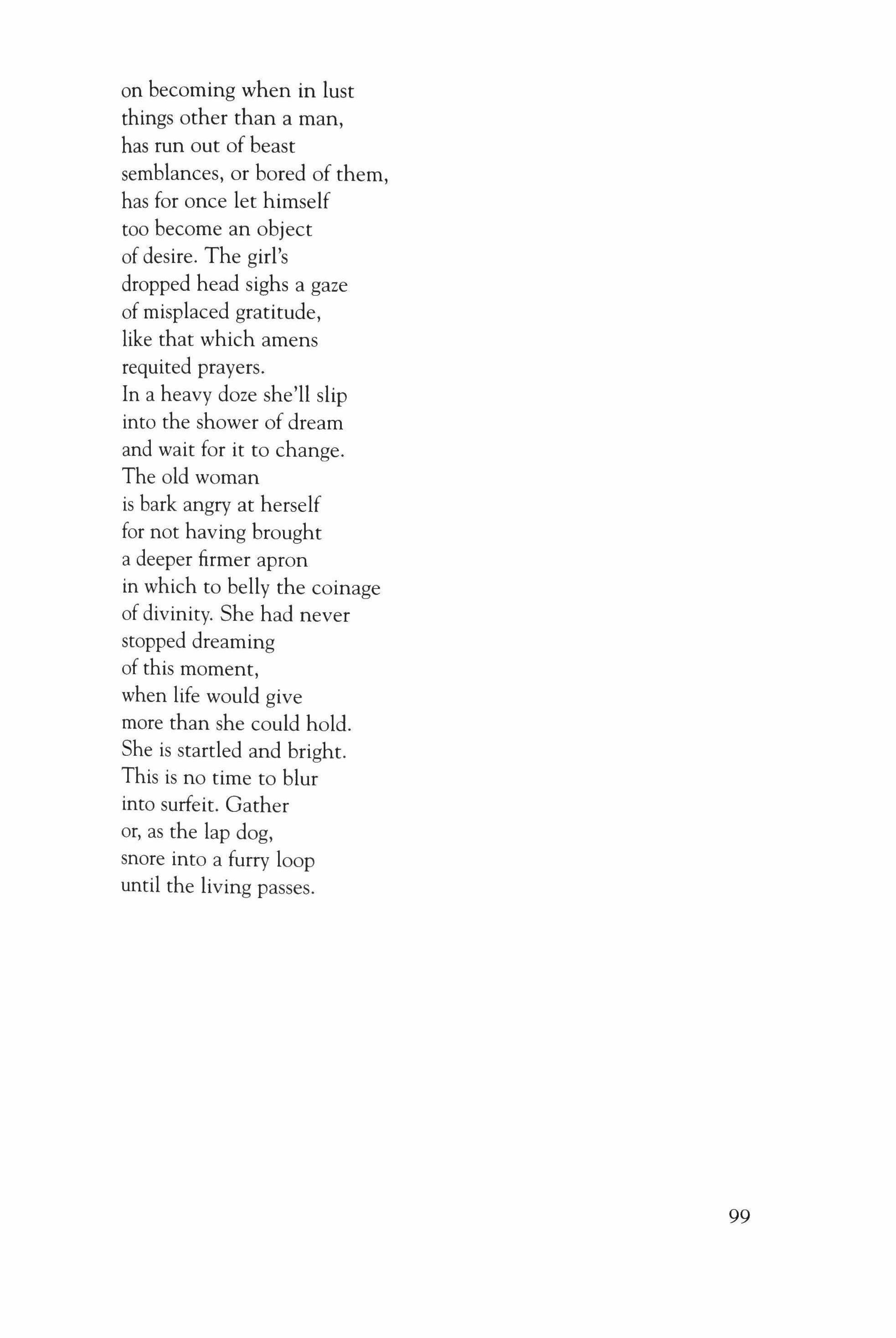
on becoming when in lust things other than a man, has run out of beast semblances, or bored of them, has for once let himself too become an object of desire. The girl's dropped head sighs a gaze of misplaced gratitude, like that which amens requited prayers. In a heavy doze she'll slip into the shower of dream and wait for it to change. The old woman is bark angry at herself for not having brought a deeper firmer apron in which to belly the coinage of divinity. She had never stopped dreaming of this moment, when life would give more than she could hold. She is startled and bright. This is no time to blur into surfeit. Gather or, as the lap dog, snore into a furry loop until the living passes.
99
Gardenia
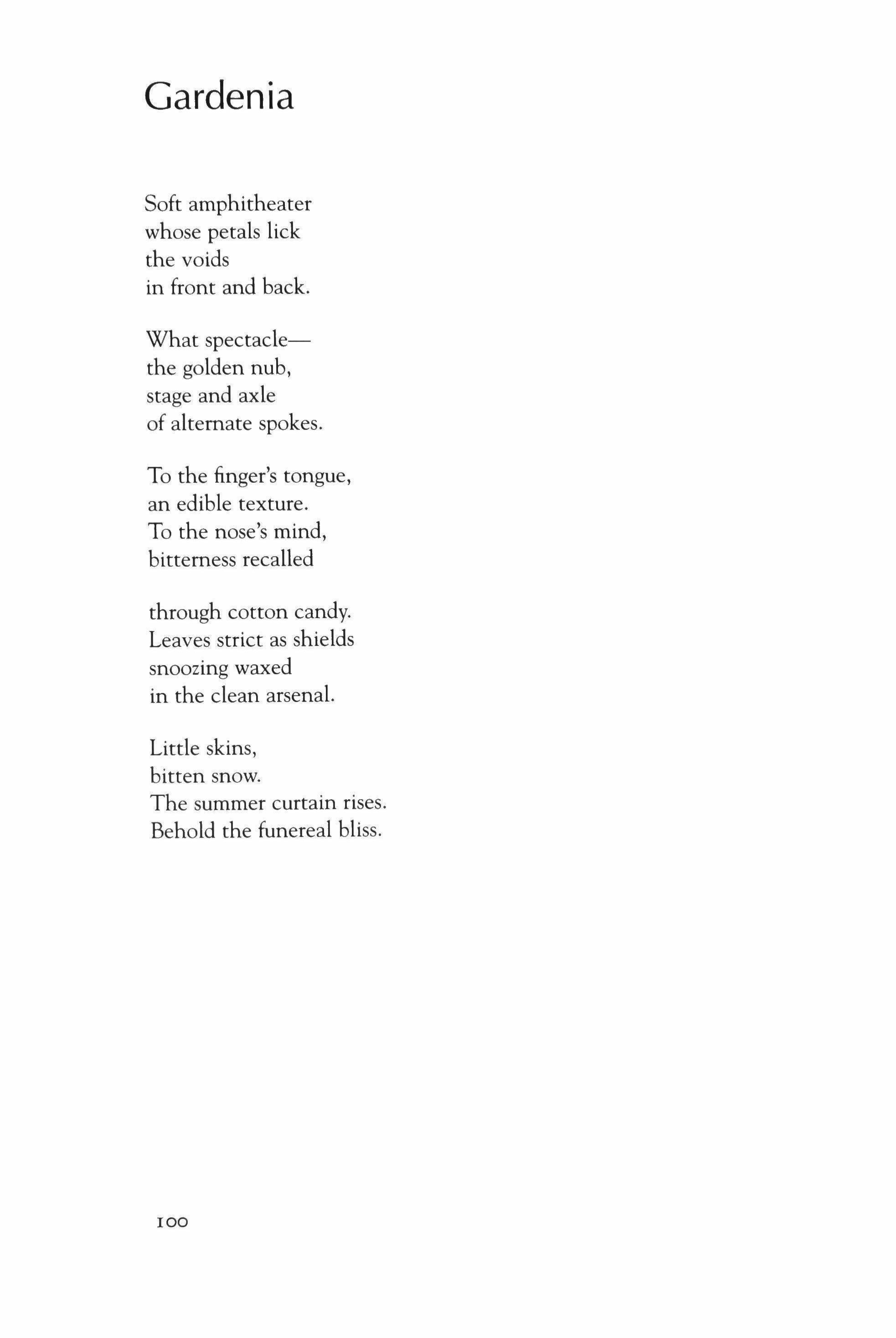
Soft amphitheater whose petals lick the voids in front and back.
What spectaclethe golden nub, stage and axle of alternate spokes.
To the finger's tongue, an edible texture.
To the nose's mind, bitterness recalled through cotton candy. Leaves strict as shields snoozing waxed in the clean arsenal.
Little skins, bitten snow.
The summer curtain rises. Behold the funereal bliss.
100
Julianna Baggott
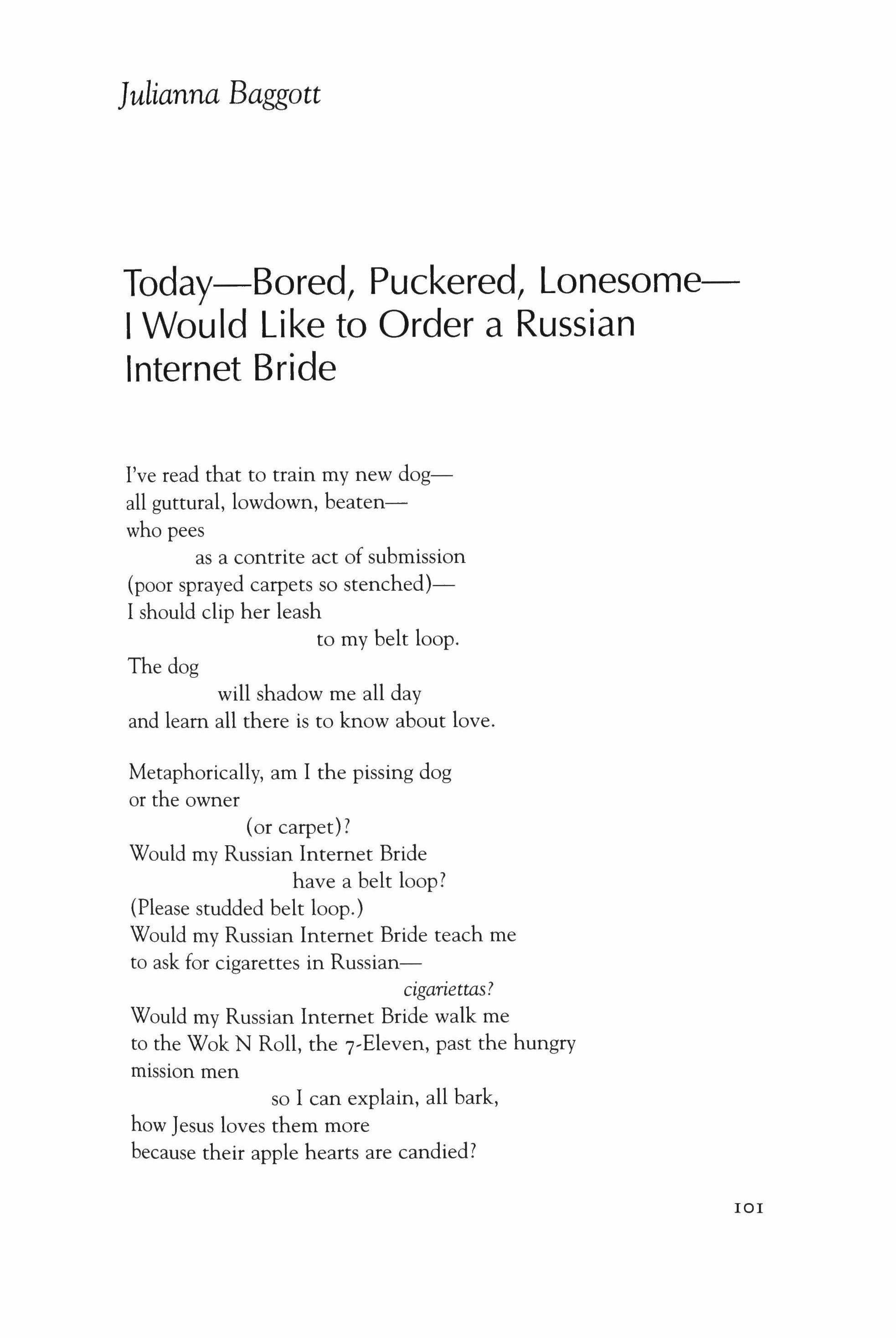
Today-Bored, Puckered, Lonesome
I Would Like to Order a Russian
Internet Bride
I've read that to train my new dogall guttural, lowdown, beatenwho pees as a contrite act of submission (poor sprayed carpets so stenched)I should clip her leash to my belt loop. The dog will shadow me all day and learn all there is to know about love.
Metaphorically, am I the pissing dog or the owner (or carpet)?
Would my Russian Internet Bride have a belt loop?
(Please studded belt loop.)
Would my Russian Internet Bride teach me to ask for cigarettes in Russiancigariettas?
Would my Russian Internet Bride walk me to the Wok N Roll, the 7-Eleven, past the hungry mission men
so I can explain, all bark, how Jesus loves them more because their apple hearts are candied?
101
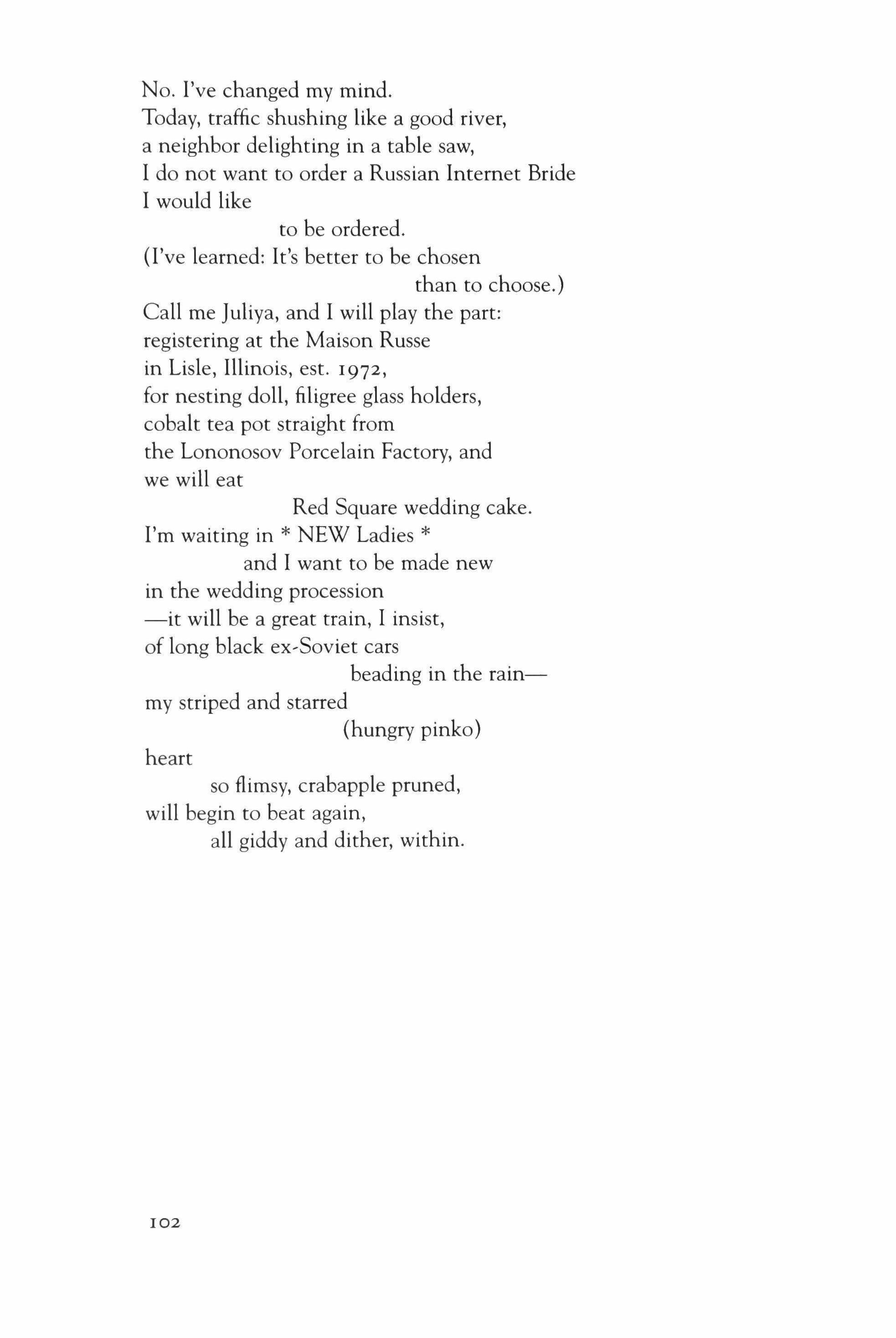
No. I've changed my mind. Today, traffic shushing like a good river, a neighbor delighting in a table saw, I do not want to order a Russian Internet Bride I would like to be ordered.
(I've learned: It's better to be chosen than to choose.)
Call me [uliya, and I will play the part: registering at the Maison Russe in Lisle, Illinois, est. 1972, for nesting doll, filigree glass holders, cobalt tea pot straight from the Lononosov Porcelain Factory, and we will eat
Red Square wedding cake. I'm waiting in * NEW Ladies * and I want to be made new in the wedding procession -it will be a great train, I insist, of long black ex-Soviet cars beading in the rainmy striped and starred (hungry pinko) heart so flimsy, crabapple pruned, will begin to beat again, all giddy and dither, within.
102
I Am Not in the Wilderness, but at Home, Weak
and Thankless
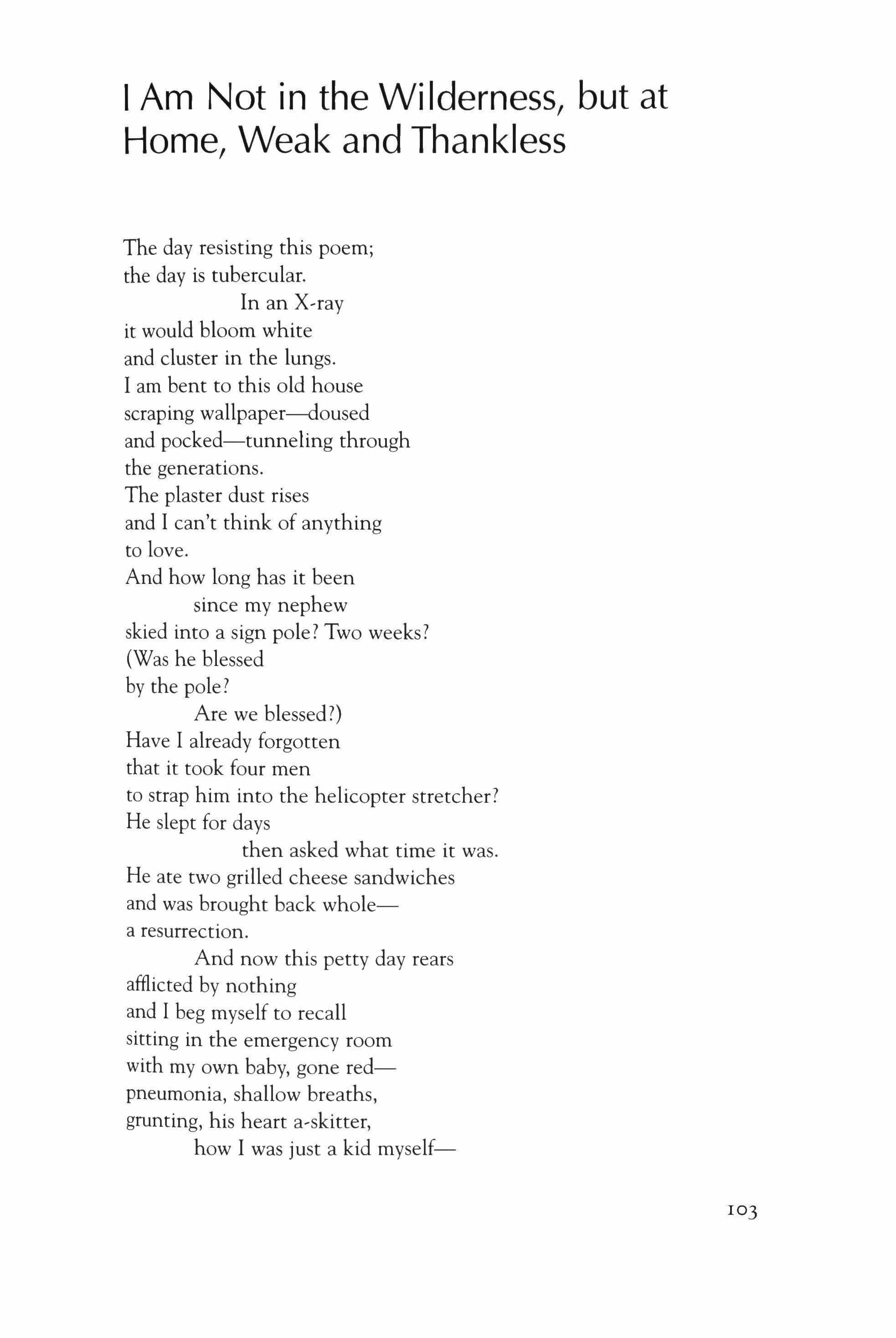
The day resisting this poem; the day is tubercular. In an X-ray it would bloom white and cluster in the lungs. I am bent to this old house scraping wallpaper-doused and pocked-tunneling through the generations. The plaster dust rises and I can't think of anything to love. And how long has it been since my nephew skied into a sign pole? Two weeks? (Was he blessed by the pole?
Are we blessed?)
Have I already forgotten that it took four men to strap him into the helicopter stretcher? He slept for days then asked what time it was. He ate two grilled cheese sandwiches and was brought back wholea resurrection.
And now this petty day rears afflicted by nothing and I beg myself to recall sitting in the emergency room with my own baby, gone redpneumonia, shallow breaths, grunting, his heart a-skitter, how I was just a kid myself-
I03

sweet under humming lights, scared.
I am weakest here amid nothing-glue and scraper, the torpid hunger of quiet, passing.
104
The Practice of Being a Lamb
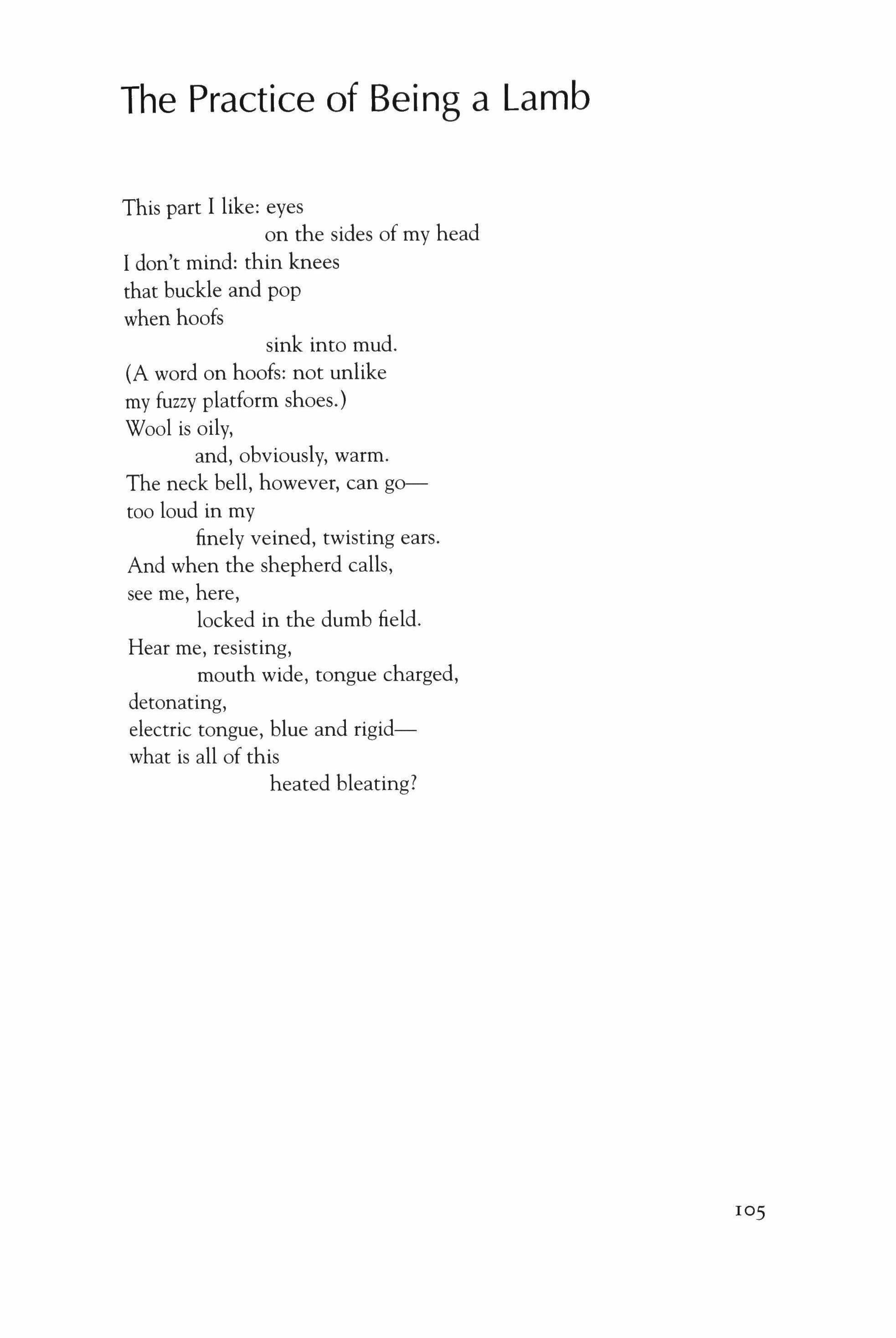
This part I like: eyes on the sides of my head
I don't mind: thin knees that buckle and pop when hoofs sink into mud.
(A word on hoofs: not unlike my fuzzy platform shoes.)
Wool is oily, and, obviously, warm. The neck bell, however, can gotoo loud in my finely veined, twisting ears. And when the shepherd calls, see me, here, locked in the dumb field.
Hear me, resisting, mouth wide, tongue charged, detonating, electric tongue, blue and rigidwhat is all of this heated bleating?
105
G. E. Murray
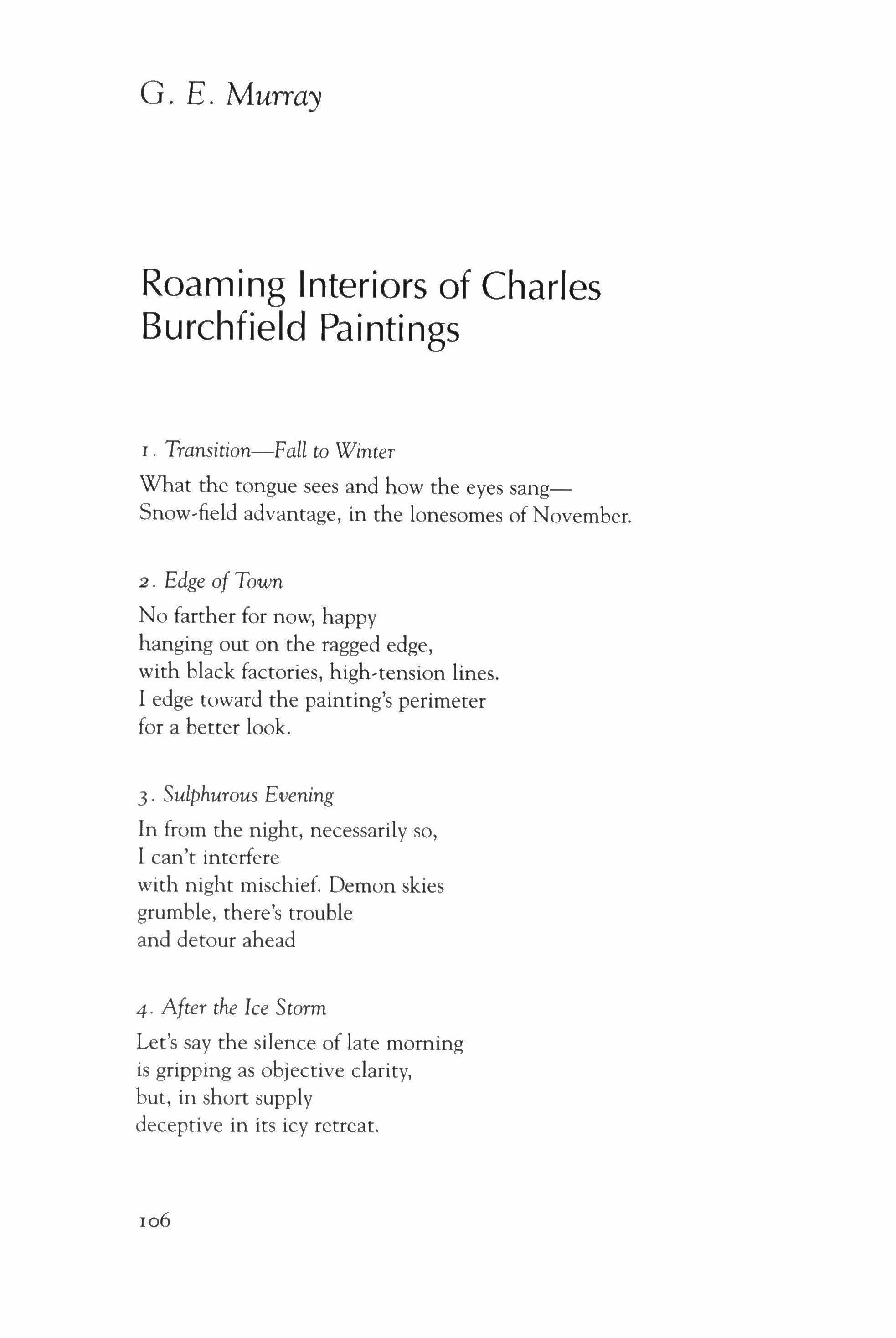
Roaming Interiors of Charles Burchfield Paintings
I. Transition-Fall to Winter
What the tongue sees and how the eyes sangSnow-field advantage, in the lonesomes of November.
2. Edge of Town
No farther for now, happy hanging out on the ragged edge, with black factories, high-tension lines. I edge toward the painting's perimeter for a better look.
3. Sulphurous Evening
In from the night, necessarily so, I can't interfere with night mischief. Demon skies grumble, there's trouble and detour ahead
4. After the Ice Storm
Let's say the silence of late morning is gripping as objective clarity, but, in short supply deceptive in its icy retreat.
106
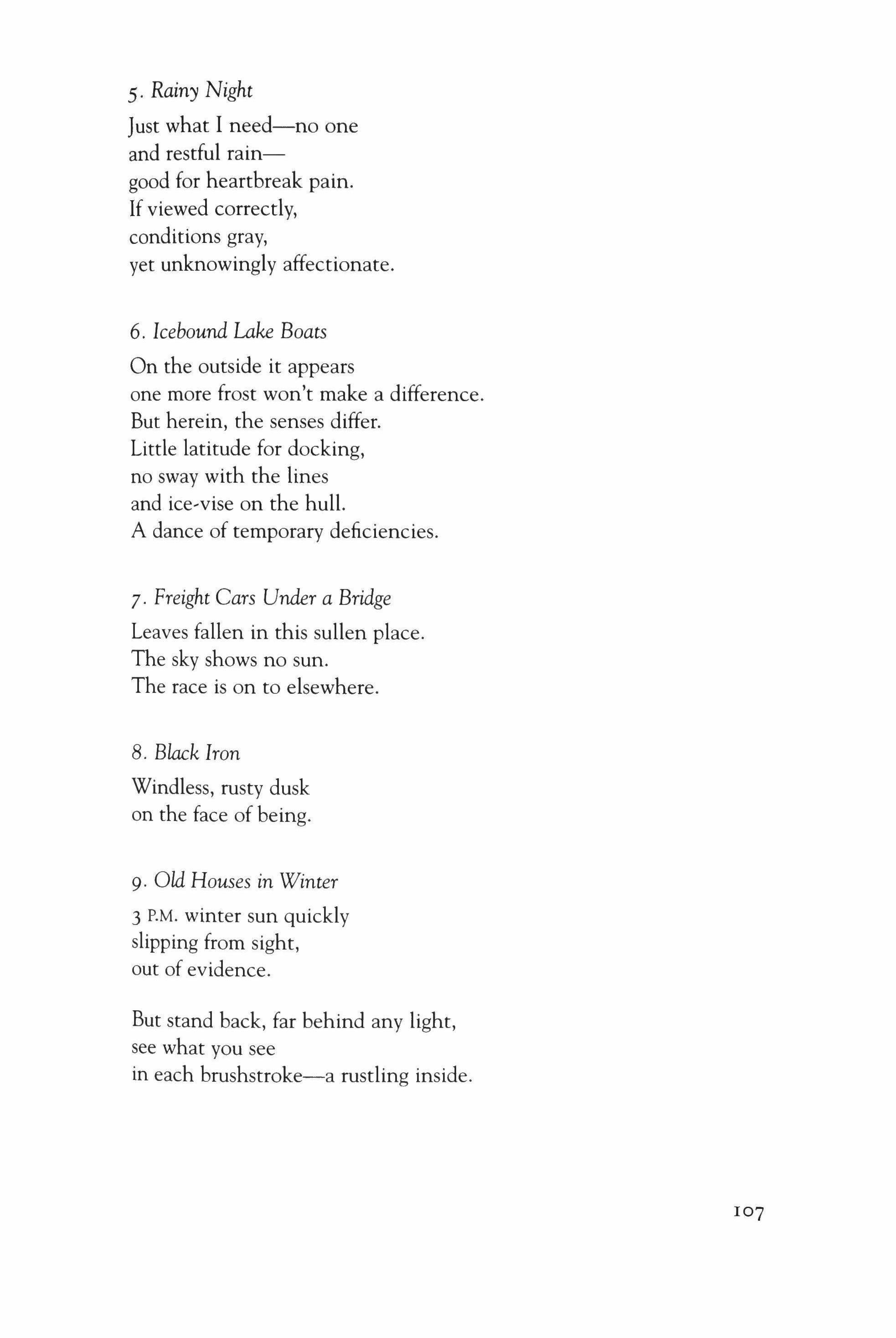
5. Rainy Night
Just what I need-no one and restful raingood for heartbreak pain. If viewed correctly, conditions gray, yet unknowingly affectionate.
6. Icebound Lake Boats
On the outside it appears one more frost won't make a difference. But herein, the senses differ. Little latitude for docking, no sway with the lines and ice-vise on the hull. A dance of temporary deficiencies.
7. Freight Cars Under a Bridge Leaves fallen in this sullen place. The sky shows no sun. The race is on to elsewhere.
8. Black Iron
Windless, rusty dusk on the face of being.
9· Old Houses in Winter
3 P.M. winter sun quickly slipping from sight, out of evidence.
But stand back, far behind any light, see what you see in each brushstroke-a rustling inside.
107
Song of a Plowman
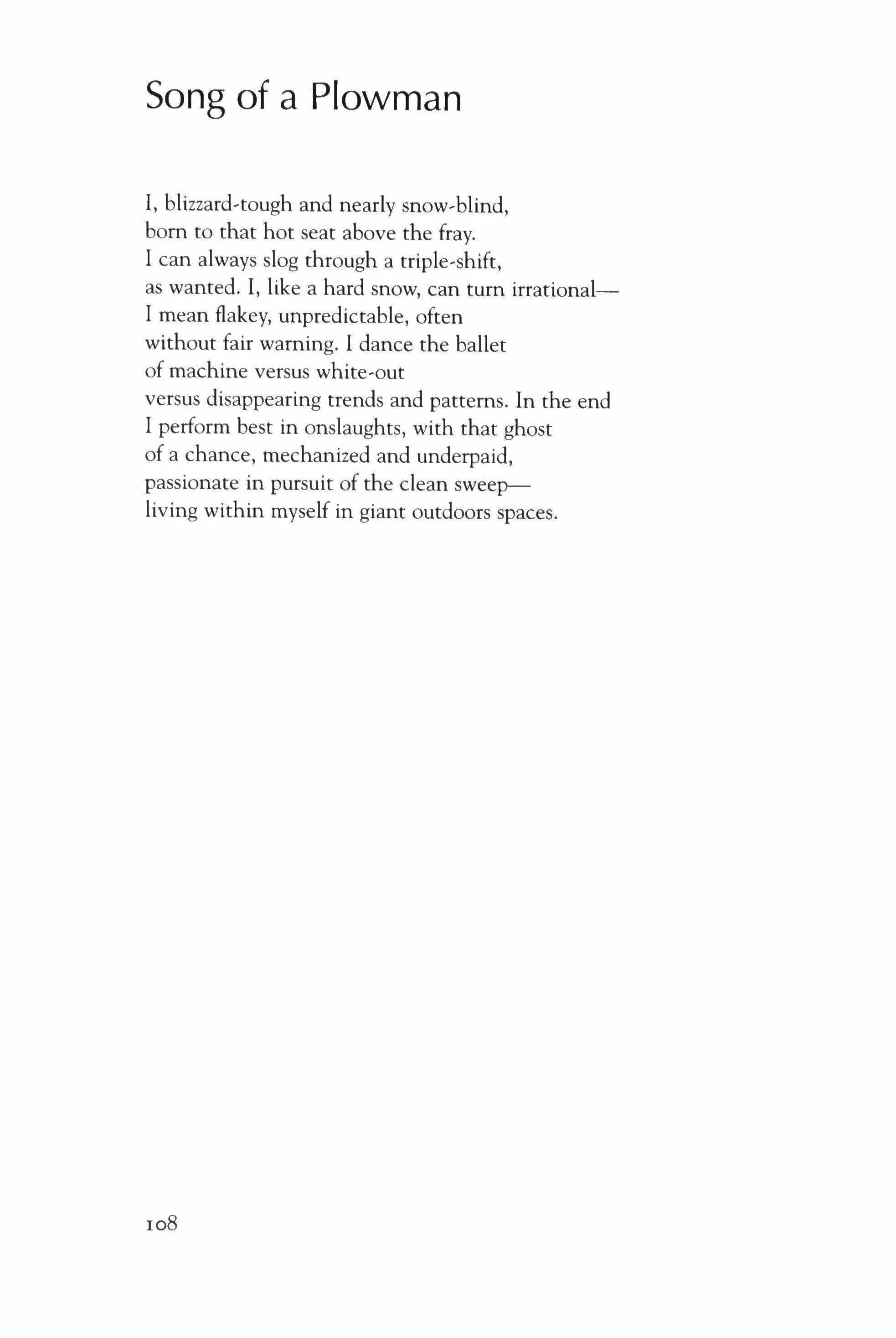
I, blizzard-tough and nearly snow-blind, born to that hot seat above the fray. I can always slog through a triple-shift, as wanted. I, like a hard snow, can tum irrationalI mean flakey, unpredictable, often without fair warning. I dance the ballet of machine versus white-out versus disappearing trends and patterns. In the end I perform best in onslaughts, with that ghost of a chance, mechanized and underpaid, passionate in pursuit of the clean sweep--living within myself in giant outdoors spaces.
108
Patrice de La Tour du Pin
Translated from the French by Jennifer Grotz
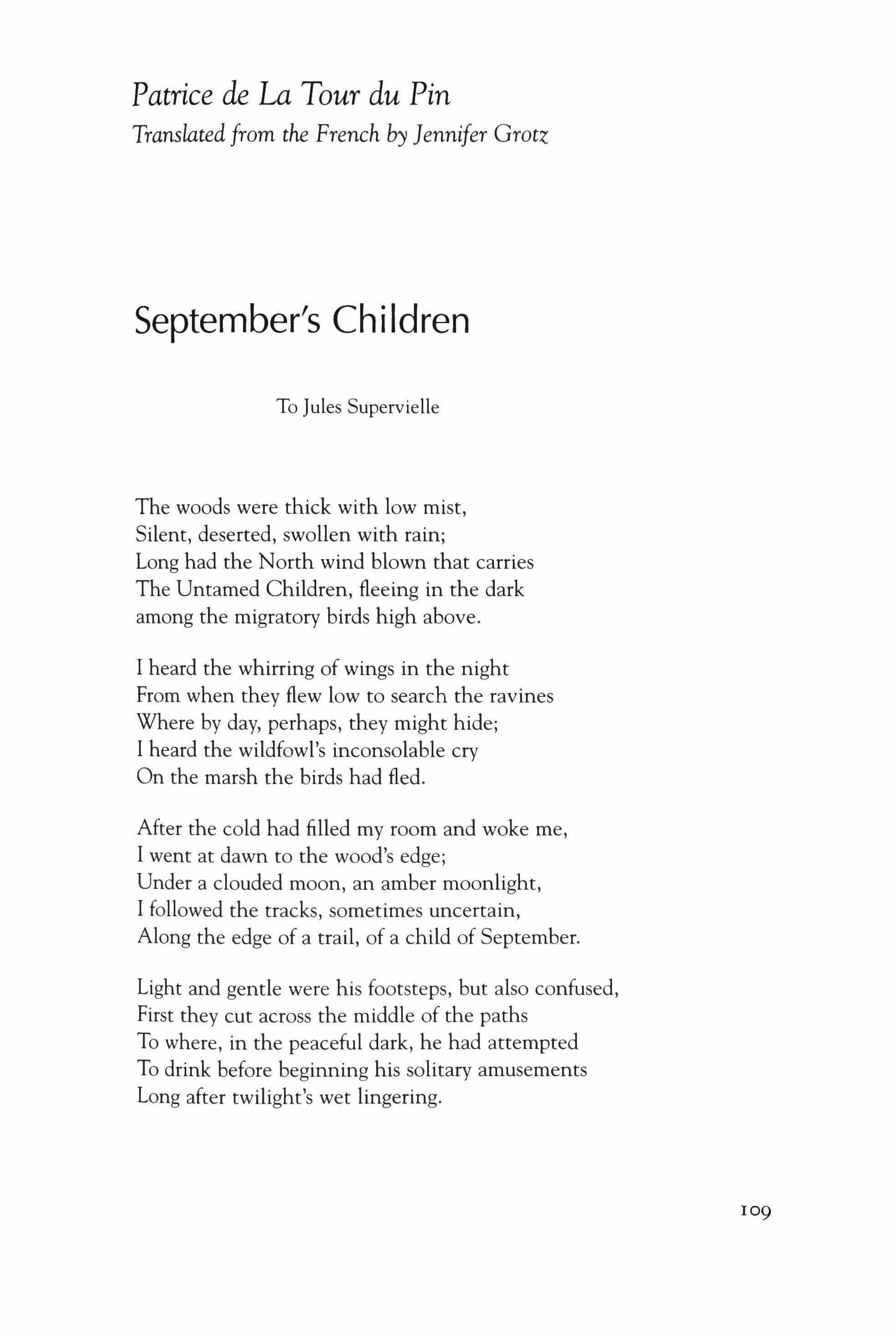
September's Children
To Jules Supervielle
The woods were thick with low mist, Silent, deserted, swollen with rain; Long had the North wind blown that carries The Untamed Children, fleeing in the dark among the migratory birds high above.
I heard the whirring of wings in the night From when they flew low to search the ravines Where by day, perhaps, they might hide; I heard the wildfowl's inconsolable cry On the marsh the birds had fled.
After the cold had filled my room and woke me, I went at dawn to the wood's edge; Under a clouded moon, an amber moonlight, I followed the tracks, sometimes uncertain, Along the edge of a trail, of a child of September.
Light and gentle were his footsteps, but also confused, First they cut across the middle of the paths
To where, in the peaceful dark, he had attempted To drink before beginning his solitary amusements Long after twilight's wet lingering.
109
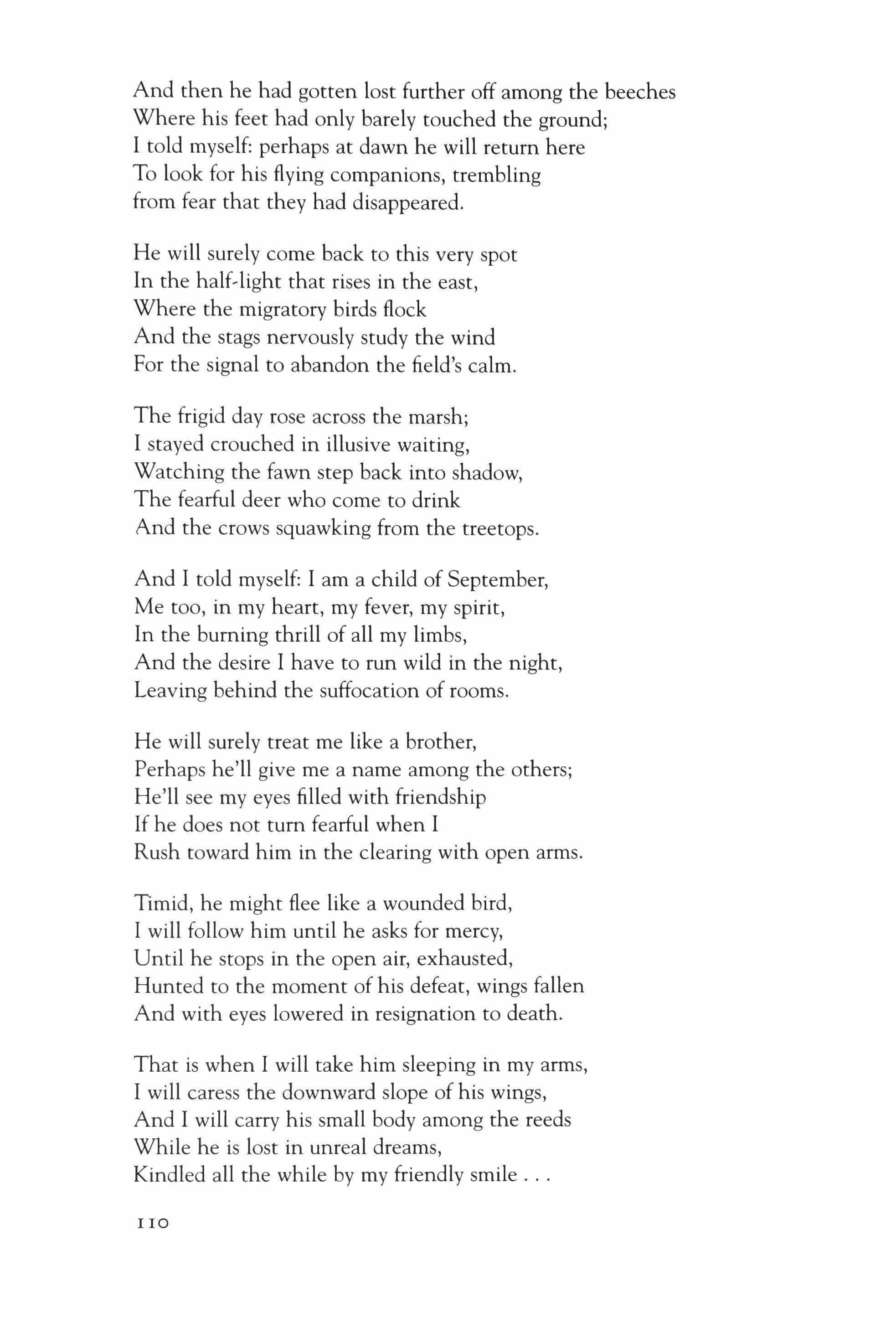
And then he had gotten lost further off among the beeches
Where his feet had only barely touched the ground; I told myself: perhaps at dawn he will return here
To look for his flying companions, trembling from fear that they had disappeared.
He will surely come back to this very spot In the half,light that rises in the east, Where the migratory birds flock And the stags nervously study the wind For the signal to abandon the field's calm.
The frigid day rose across the marsh; I stayed crouched in illusive waiting, Watching the fawn step back into shadow, The fearful deer who come to drink And the crows squawking from the treetops.
And I told myself: I am a child of September, Me too, in my heart, my fever, my spirit, In the burning thrill of all my limbs, And the desire I have to run wild in the night, Leaving behind the suffocation of rooms.
He will surely treat me like a brother, Perhaps he'll give me a name among the others; He'll see my eyes filled with friendship If he does not turn fearful when I Rush toward him in the clearing with open arms.
Timid, he might flee like a wounded bird, I will follow him until he asks for mercy, Until he stops in the open air, exhausted, Hunted to the moment of his defeat, wings fallen And with eyes lowered in resignation to death.
That is when I will take him sleeping in my arms, I will caress the downward slope of his wings, And I will carry his small body among the reeds While he is lost in unreal dreams, Kindled all the while by my friendly smile
110
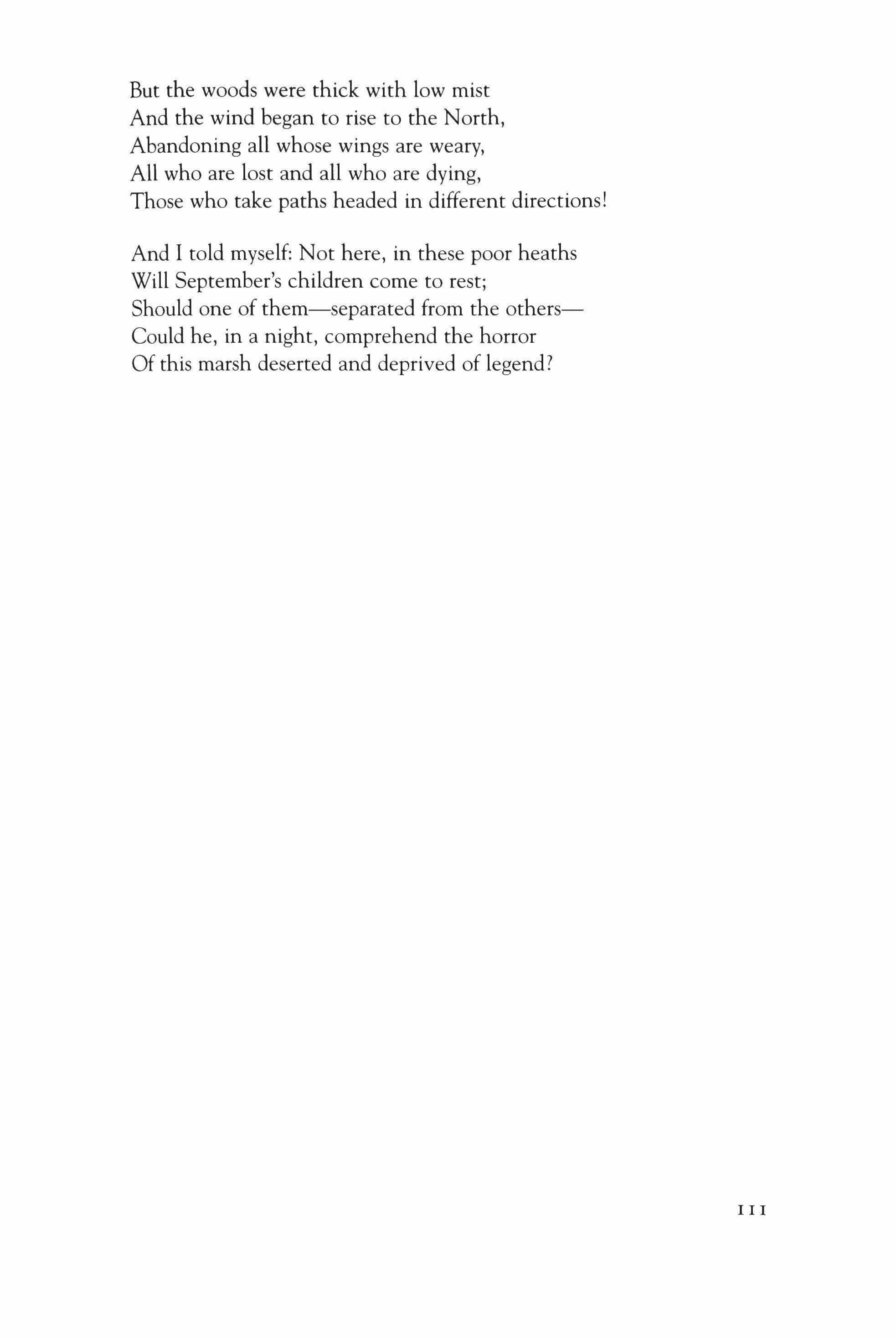
But the woods were thick with low mist And the wind began to rise to the North, Abandoning all whose wings are weary, All who are lost and all who are dying, Those who take paths headed in different directions!
And I told myself: Not here, in these poor heaths Will September's children come to rest; Should one of them-separated from the othersCould he, in a night, comprehend the horror Of this marsh deserted and deprived of legend?
I I I
Luna
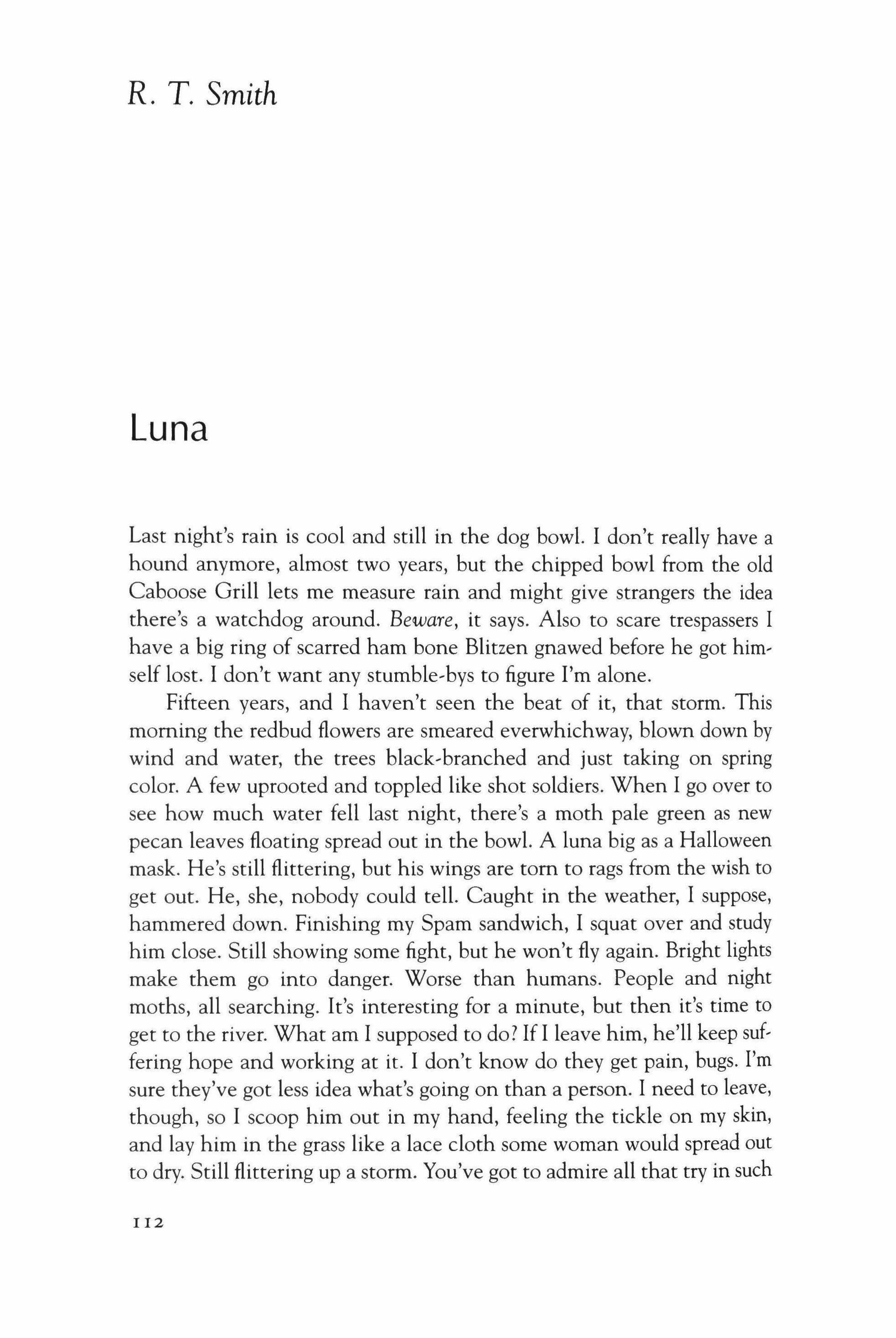
Last night's rain is cool and still in the dog bowl. I don't really have a hound anymore, almost two years, but the chipped bowl from the old Caboose Grill lets me measure rain and might give strangers the idea there's a watchdog around. Beware, it says. Also to scare trespassers I have a big ring of scarred ham bone Blitzen gnawed before he got himself lost. I don't want any stumble-bys to figure I'm alone.
Fifteen years, and I haven't seen the beat of it, that storm. This morning the redbud flowers are smeared everwhichway, blown down by wind and water, the trees black-branched and just taking on spring color. A few uprooted and toppled like shot soldiers. When I go over to see how much water fell last night, there's a moth pale green as new pecan leaves floating spread out in the bowl. A luna big as a Halloween mask. He's still flittering, but his wings are tom to rags from the wish to get out. He, she, nobody could tell. Caught in the weather, I suppose, hammered down. Finishing my Spam sandwich, I squat over and study him close. Still showing some fight, but he won't fly again. Bright lights make them go into danger. Worse than humans. People and night moths, all searching. It's interesting for a minute, but then it's time to get to the river. What am I supposed to do? If I leave him, he'll keep suffering hope and working at it. I don't know do they get pain, bugs. I'm sure they've got less idea what's going on than a person. I need to leave, though, so I scoop him out in my hand, feeling the tickle on my skin, and lay him in the grass like a lace cloth some woman would spread out to dry. Still flittering up a storm. You've got to admire all that try in such
R. T. Smith
112
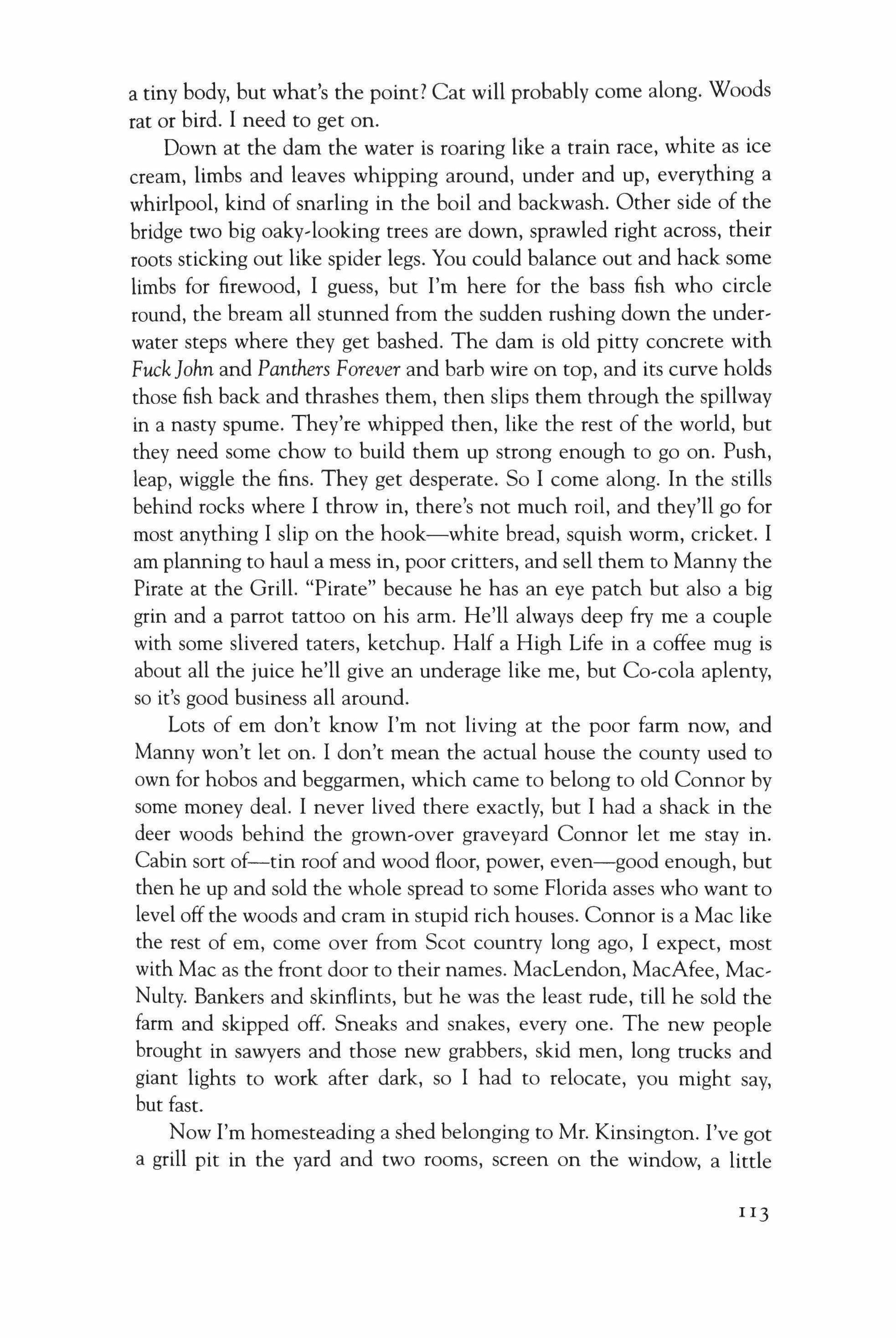
a tiny body, but what's the point? Cat will probably come along. Woods rat or bird. I need to get on.
Down at the dam the water is roaring like a train race, white as ice cream, limbs and leaves whipping around, under and up, everything a whirlpool, kind of snarling in the boil and backwash. Other side of the bridge two big oaky-looking trees are down, sprawled right across, their roots sticking out like spider legs. You could balance out and hack some limbs for firewood, I guess, but I'm here for the bass fish who circle round, the bream all stunned from the sudden rushing down the under; water steps where they get bashed. The dam is old pitty concrete with Fucklohn and Panthers Forever and barb wire on top, and its curve holds those fish back and thrashes them, then slips them through the spillway in a nasty spume. They're whipped then, like the rest of the world, but they need some chow to build them up strong enough to go on. Push, leap, wiggle the fins. They get desperate. So I come along. In the stills behind rocks where I throw in, there's not much roil, and they'll go for most anything I slip on the hook-white bread, squish worm, cricket. I am planning to haul a mess in, poor critters, and sell them to Manny the Pirate at the Grill. "Pirate" because he has an eye patch but also a big grin and a parrot tattoo on his arm. He'll always deep fry me a couple with some slivered taters, ketchup. Half a High Life in a coffee mug is about all the juice he'll give an underage like me, but Co-cola aplenty, so it's good business all around.
Lots of em don't know I'm not living at the poor farm now, and Manny won't let on. I don't mean the actual house the county used to own for hobos and beggarmen, which came to belong to old Connor by some money deal. I never lived there exactly, but I had a shack in the deer woods behind the grown-over graveyard Connor let me stay in. Cabin sort of-tin roof and wood floor, power, even-good enough, but then he up and sold the whole spread to some Florida asses who want to level off the woods and cram in stupid rich houses. Connor is a Mac like the rest of em, come over from Scot country long ago, I expect, most with Mac as the front door to their names. MacLendon, MacAfee, Mac; Nulty. Bankers and skinflints, but he was the least rude, till he sold the farm and skipped off. Sneaks and snakes, every one. The new people brought in sawyers and those new grabbers, skid men, long trucks and giant lights to work after dark, so I had to relocate, you might say, but fast.
Now I'm homesteading a shed belonging to Mr. Kinsington. I've got a grill pit in the yard and two rooms, screen on the window, a little
113
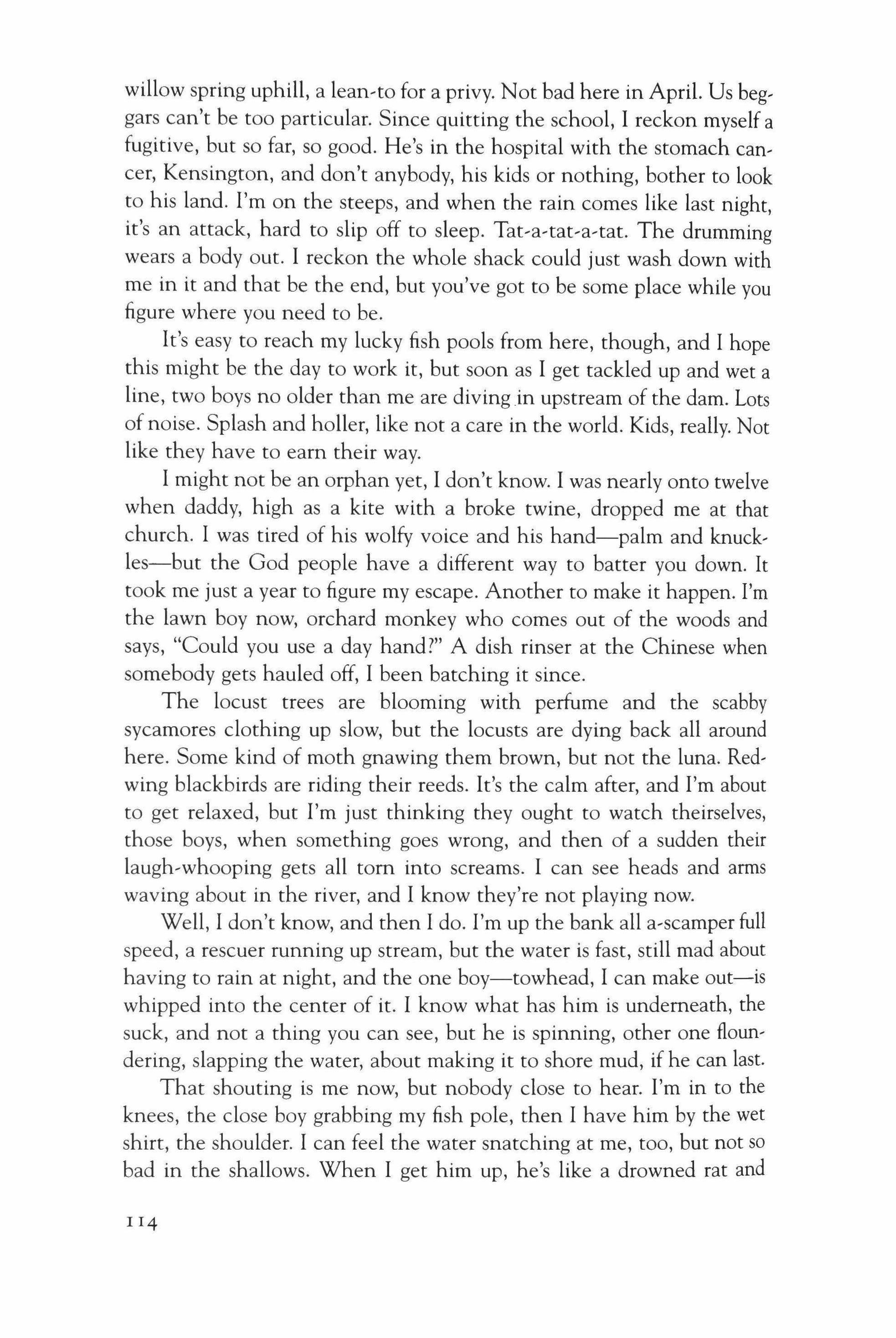
willow spring uphill, a lean-to for a privy. Not bad here in April. Us beggars can't be too particular. Since quitting the school, I reckon myself a fugitive, but so far, so good. He's in the hospital with the stomach cancer, Kensington, and don't anybody, his kids or nothing, bother to look to his land. I'm on the steeps, and when the rain comes like last night, it's an attack, hard to slip off to sleep. Tat-a-tat-a-tat. The drumming wears a body out. I reckon the whole shack could just wash down with me in it and that be the end, but you've got to be some place while you figure where you need to be.
It's easy to reach my lucky fish pools from here, though, and I hope this might be the day to work it, but soon as I get tackled up and wet a line, two boys no older than me are diving in upstream of the dam. Lots of noise. Splash and holler, like not a care in the world. Kids, really. Not like they have to earn their way.
I might not be an orphan yet, I don't know. I was nearly onto twelve when daddy, high as a kite with a broke twine, dropped me at that church. I was tired of his wolfy voice and his hand-palm and knuckles-but the God people have a different way to batter you down. It took me just a year to figure my escape. Another to make it happen. I'm the lawn boy now, orchard monkey who comes out of the woods and says, "Could you use a day hand?" A dish rinser at the Chinese when somebody gets hauled off, I been batching it since.
The locust trees are blooming with perfume and the scabby sycamores clothing up slow, but the locusts are dying back all around here. Some kind of moth gnawing them brown, but not the luna. Redwing blackbirds are riding their reeds. It's the calm after, and I'm about to get relaxed, but I'm just thinking they ought to watch theirselves, those boys, when something goes wrong, and then of a sudden their laugh-whooping gets all tom into screams. I can see heads and arms waving about in the river, and I know they're not playing now.
Well, I don't know, and then I do. I'm up the bank all a-scamper full speed, a rescuer running up stream, but the water is fast, still mad about having to rain at night, and the one boy-towhead, I can make out-is whipped into the center of it. I know what has him is underneath, the suck, and not a thing you can see, but he is spinning, other one floundering, slapping the water, about making it to shore mud, if he can last.
That shouting is me now, but nobody close to hear. I'm in to the knees, the close boy grabbing my fish pole, then I have him by the wet shirt, the shoulder. I can feel the water snatching at me, too, but not so bad in the shallows. When I get him up, he's like a drowned rat and
114
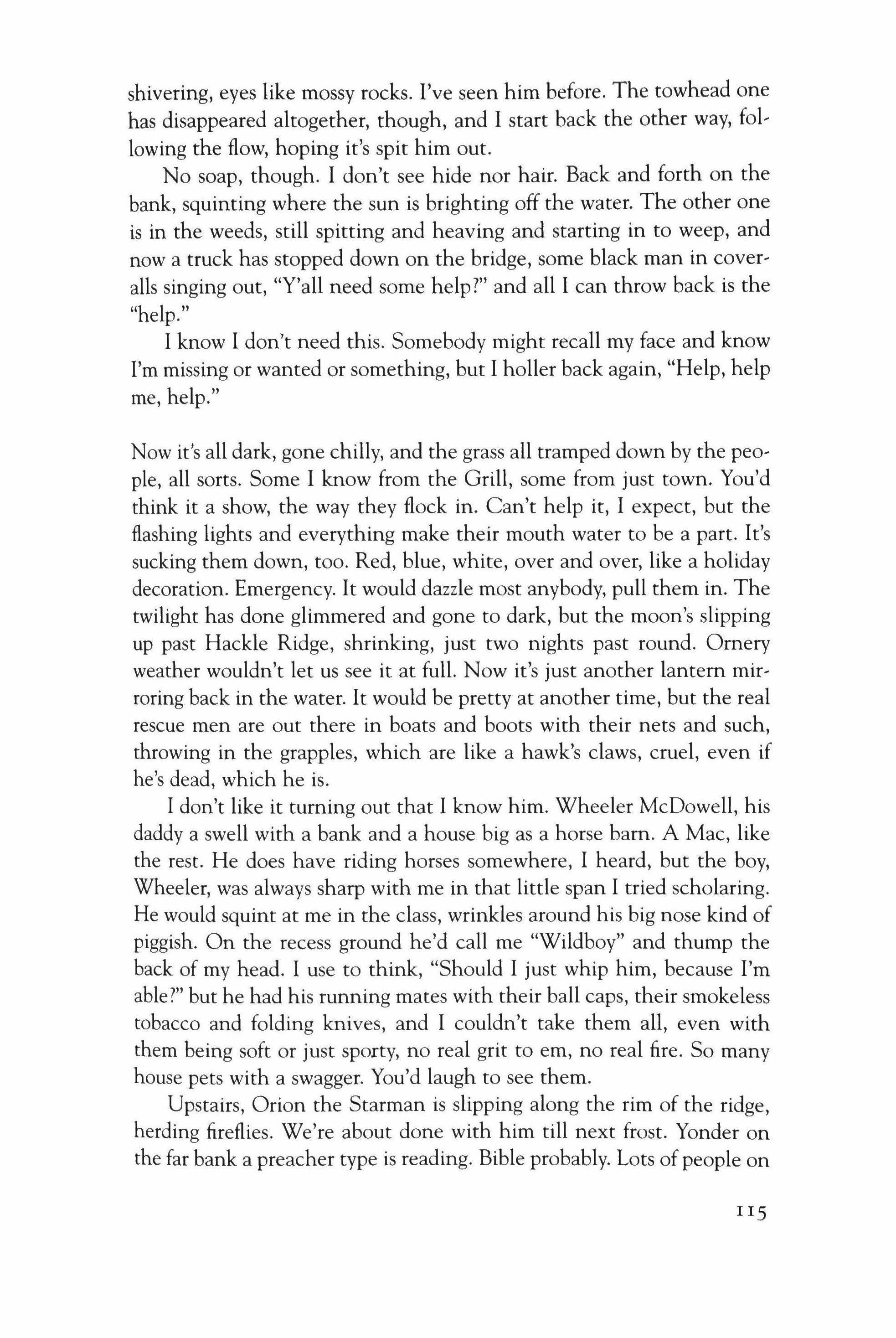
shivering, eyes like mossy rocks. I've seen him before. The towhead one has disappeared altogether, though, and I start back the other way, following the flow, hoping it's spit him out.
No soap, though. I don't see hide nor hair. Back and forth on the bank, squinting where the sun is brighting off the water. The other one is in the weeds, still spitting and heaving and starting in to weep, and now a truck has stopped down on the bridge, some black man in coveralls singing out, "Y'all need some help?" and all I can throw back is the "help."
I know I don't need this. Somebody might recall my face and know I'm missing or wanted or something, but I holler back again, "Help, help me, help."
Now it's all dark, gone chilly, and the grass all tramped down by the people, all sorts. Some I know from the Grill, some from just town. You'd think it a show, the way they flock in. Can't help it, I expect, but the flashing lights and everything make their mouth water to be a part. It's sucking them down, too. Red, blue, white, over and over, like a holiday decoration. Emergency. It would dazzle most anybody, pull them in. The twilight has done glimmered and gone to dark, but the moon's slipping up past Hackle Ridge, shrinking, just two nights past round. Ornery weather wouldn't let us see it at full. Now it's just another lantern mirroring back in the water. It would be pretty at another time, but the real rescue men are out there in boats and boots with their nets and such, throwing in the grapples, which are like a hawk's claws, cruel, even if he's dead, which he is.
I don't like it
turning out that I know him. Wheeler McDowell, his daddy a swell with a bank and a house big as a horse barn. A Mac, like the rest. He does have riding horses somewhere, I heard, but the boy, Wheeler, was always sharp with me in that little span I tried scholaring. He would squint at me in the class, wrinkles around his big nose kind of piggish. On the recess ground he'd call me "Wildboy" and thump the back of my head. I use to think, "Should I just whip him, because I'm able?" but he had his running mates with their ball caps, their smokeless tobacco and folding knives, and I couldn't take them all, even with them being soft or just sporty, no real grit to em, no real fire. So many house pets with a swagger. You'd laugh to see them.
Upstairs, Orion the Starman is slipping along the rim of the ridge, herding fireflies. We're about done with him till next frost. Yonder on the far bank a preacher type is reading. Bible probably. Lots of people on
lIS
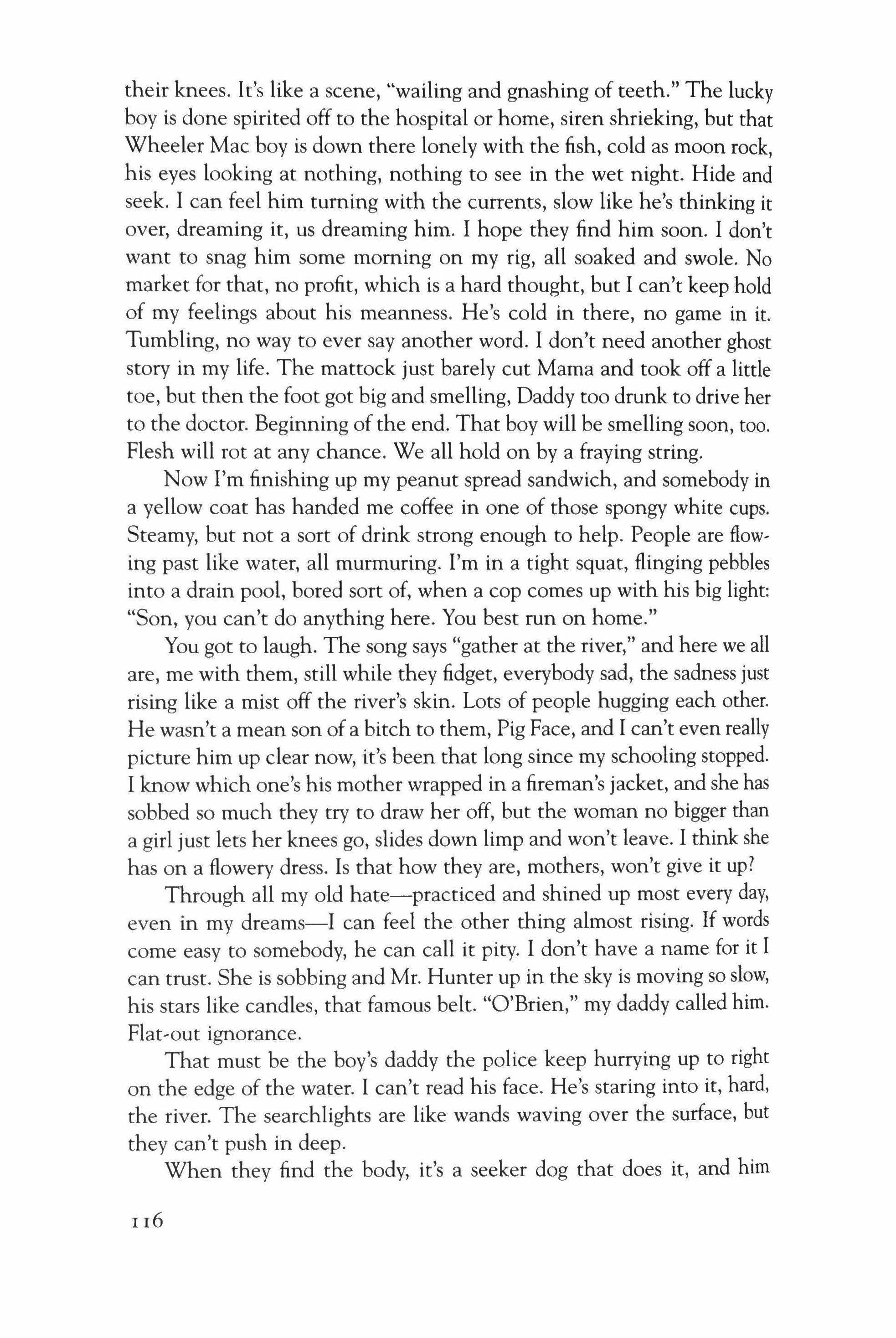
their knees. It's like a scene, "wailing and gnashing of teeth." The lucky boy is done spirited off to the hospital or home, siren shrieking, but that Wheeler Mac boy is down there lonely with the fish, cold as moon rock, his eyes looking at nothing, nothing to see in the wet night. Hide and seek. I can feel him turning with the currents, slow like he's thinking it over, dreaming it, us dreaming him. I hope they find him soon. I don't want to snag him some morning on my rig, all soaked and swole. No market for that, no profit, which is a hard thought, but I can't keep hold of my feelings about his meanness. He's cold in there, no game in it.
Tumbling, no way to ever say another word. I don't need another ghost story in my life. The mattock just barely cut Mama and took off a little toe, but then the foot got big and smelling, Daddy too drunk to drive her to the doctor. Beginning of the end. That boy will be smelling soon, too. Flesh will rot at any chance. We all hold on by a fraying string.
Now I'm finishing up my peanut spread sandwich, and somebody in a yellow coat has handed me coffee in one of those spongy white cups. Steamy, but not a sort of drink strong enough to help. People are flowing past like water, all murmuring. I'm in a tight squat, flinging pebbles into a drain pool, bored sort of, when a cop comes up with his big light: "Son, you can't do anything here. You best run on home."
You got to laugh. The song says "gather at the river," and here we all are, me with them, still while they fidget, everybody sad, the sadness just rising like a mist off the river's skin. Lots of people hugging each other. He wasn't a mean son of a bitch to them, Pig Face, and I can't even really picture him up clear now, it's been that long since my schooling stopped. I know which one's his mother wrapped in a fireman's jacket, and she has sobbed so much they try to draw her off, but the woman no bigger than a girl just lets her knees go, slides down limp and won't leave. I think she has on a flowery dress. Is that how they are, mothers, won't give it up?
Through all mv old hate-practiced and shined up most every day, even in my dreams-I can feel the other thing almost rising. If words come easy to somebody, he can call it pity. I don't have a name for it I can trust. She is sobbing and Mr. Hunter up in the sky is moving so slow, his stars like candles, that famous belt. "O'Brien," my daddy called him. Flat-out ignorance.
That must be the boy's daddy the police keep hurrying up to right on the edge of the water. I can't read his face. He's staring into it, hard, the river. The searchlights are like wands waving over the surface, but they can't push in deep.
When they find the body, it's a seeker dog that does it, and him
II6
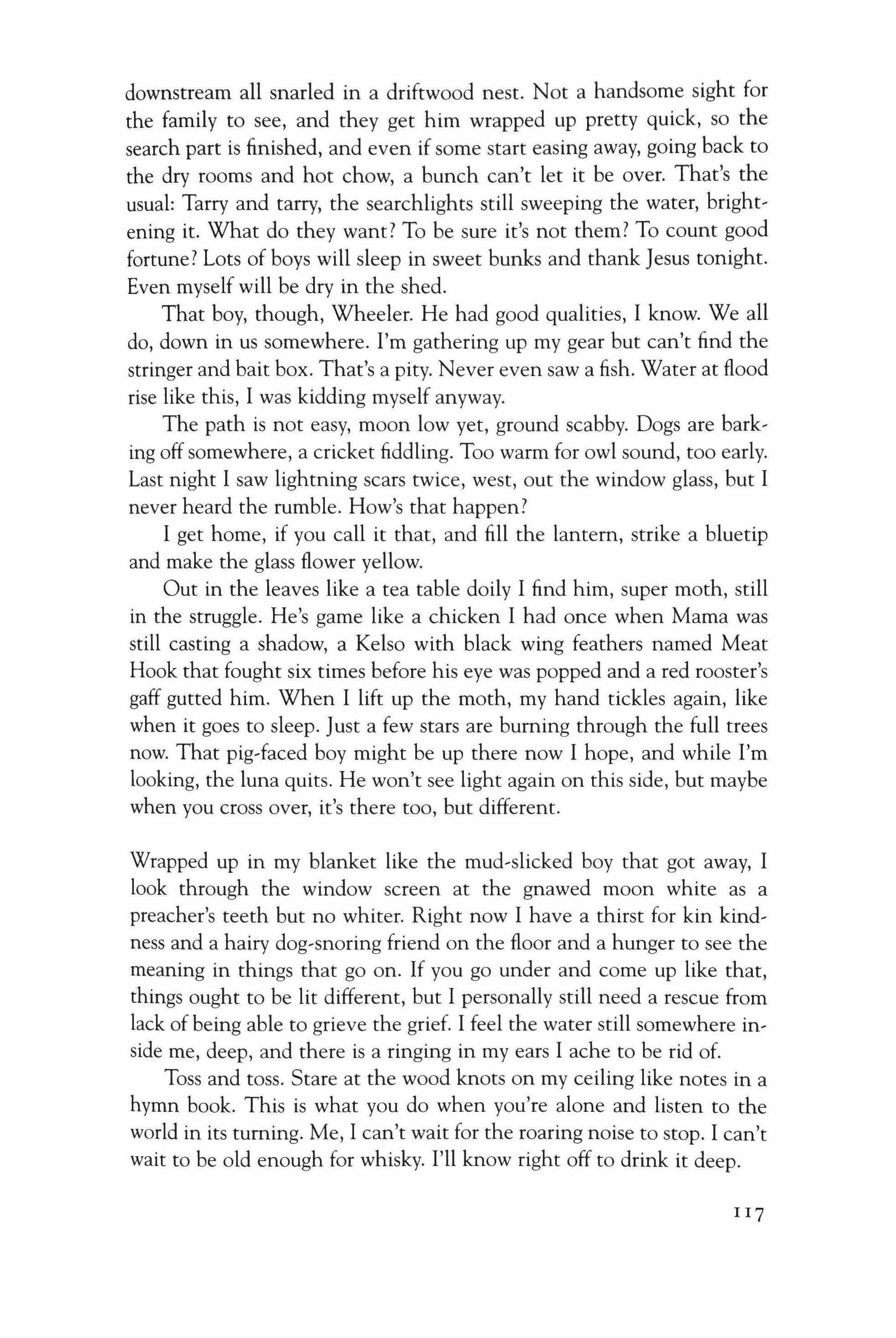
downstream all snarled in a driftwood nest. Not a handsome sight for the family to see, and they get him wrapped up pretty quick, so the search part is finished, and even if some start easing away, going back to the dry rooms and hot chow, a bunch can't let it be over. That's the usual: Tarry and tarry, the searchlights still sweeping the water, brightening it. What do they want? To be sure it's not them? To count good fortune? Lots of boys will sleep in sweet bunks and thank Jesus tonight. Even myself will be dry in the shed.
That boy, though, Wheeler. He had good qualities, I know. We all do, down in us somewhere. I'm gathering up my gear but can't find the stringer and bait box. That's a pity. Never even saw a fish. Water at flood rise like this, I was kidding myself anyway.
The path is not easy, moon low yet, ground scabby. Dogs are barking off somewhere, a cricket fiddling. Too warm for owl sound, too early. Last night I saw lightning scars twice, west, out the window glass, but I never heard the rumble. How's that happen?
I get home, if you call it that, and fill the lantern, strike a bluetip and make the glass flower yellow.
Out in the leaves like a tea table doily I find him, super moth, still in the struggle. He's game like a chicken I had once when Mama was still casting a shadow, a Kelso with black wing feathers named Meat Hook that fought six times before his eye was popped and a red rooster's gaff gutted him. When I lift up the moth, my hand tickles again, like when it goes to sleep. Just a few stars are burning through the full trees now. That pig-faced boy might be up there now I hope, and while I'm looking, the luna quits. He won't see light again on this side, but maybe when you cross over, it's there too, but different.
Wrapped up in my blanket like the mud-slicked boy that got away, I look through the window screen at the gnawed moon white as a preacher's teeth but no whiter. Right now I have a thirst for kin kindness and a hairy dog-snoring friend on the floor and a hunger to see the meaning in things that go on. If you go under and come up like that, things ought to be lit different, but I personally still need a rescue from lack of being able to grieve the grief. I feel the water still somewhere in� side me, deep, and there is a ringing in my ears I ache to be rid of.
Toss and toss. Stare at the wood knots on my ceiling like notes in a hymn book. This is what you do when you're alone and listen to the world in its turning. Me, I can't wait for the roaring noise to stop. I can't wait to be old enough for whisky. I'll know right off to drink it deep.
1I7
Rebecca Rasmussen
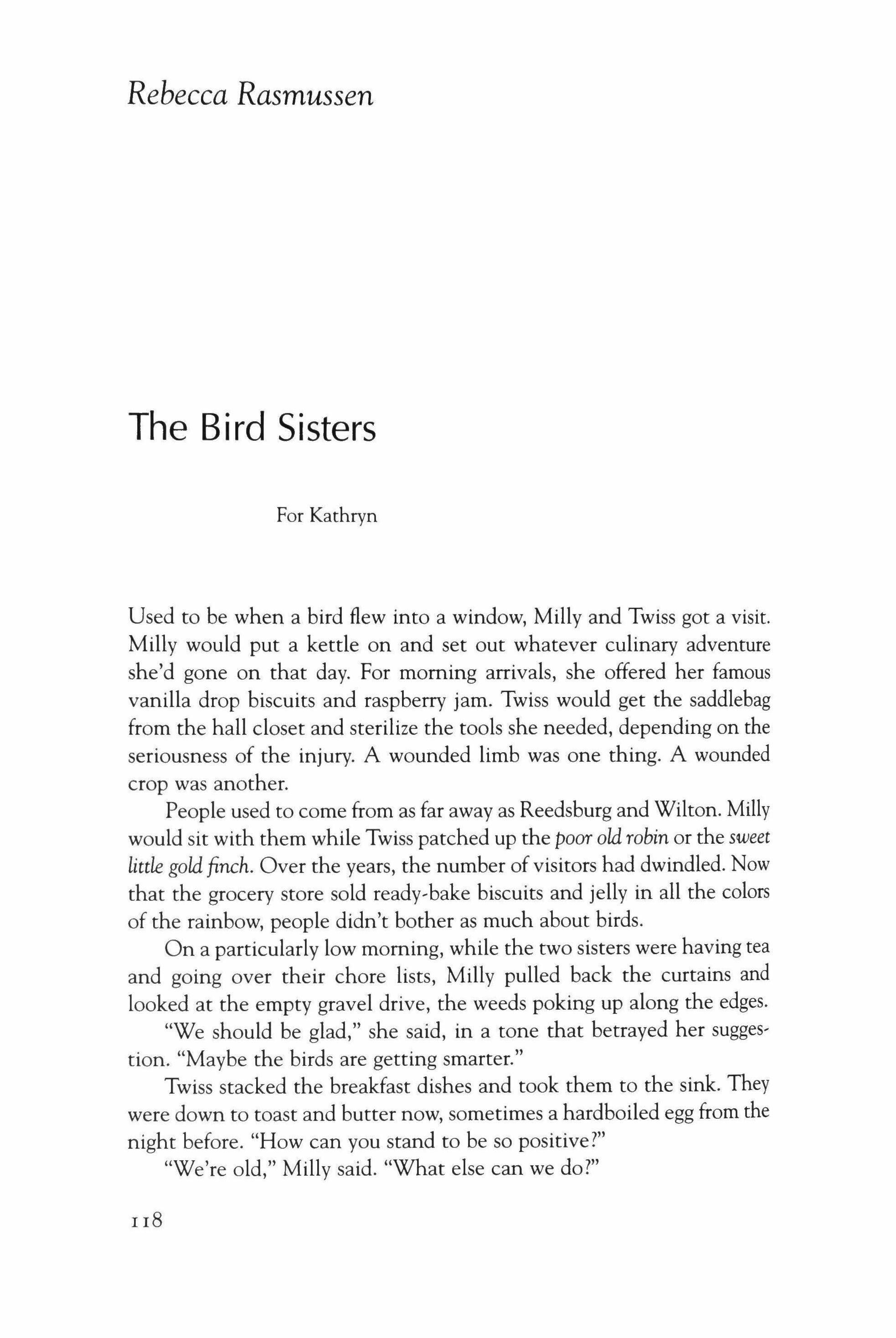
The Bird Sisters
For Kathryn
Used to be when a bird flew into a window, Milly and Twiss got a visit. Milly would put a kettle on and set out whatever culinary adventure she'd gone on that day. For morning arrivals, she offered her famous vanilla drop biscuits and raspberry jam. Twiss would get the saddlebag from the hall closet and sterilize the tools she needed, depending on the seriousness of the injury. A wounded limb was one thing. A wounded crop was another.
People used to come from as far away as Reedsburg and Wilton. Milly would sit with them while Twiss patched up the poor old robin or the sweet little goldfinch. Over the years, the number of visitors had dwindled. Now that the grocery store sold ready-bake biscuits and jelly in all the colors of the rainbow, people didn't bother as much about birds.
On a particularly low morning, while the two sisters were having tea and going over their chore lists, Milly pulled back the curtains and looked at the empty gravel drive, the weeds poking up along the edges.
"We should be glad," she said, in a tone that betrayed her suggestion. "Maybe the birds are getting smarter."
Twiss stacked the breakfast dishes and took them to the sink. They were down to toast and butter now, sometimes a hardboiled egg from the night before. "How can you stand to be so positive?"
"We're old," Milly said. "What else can we do?" lIB
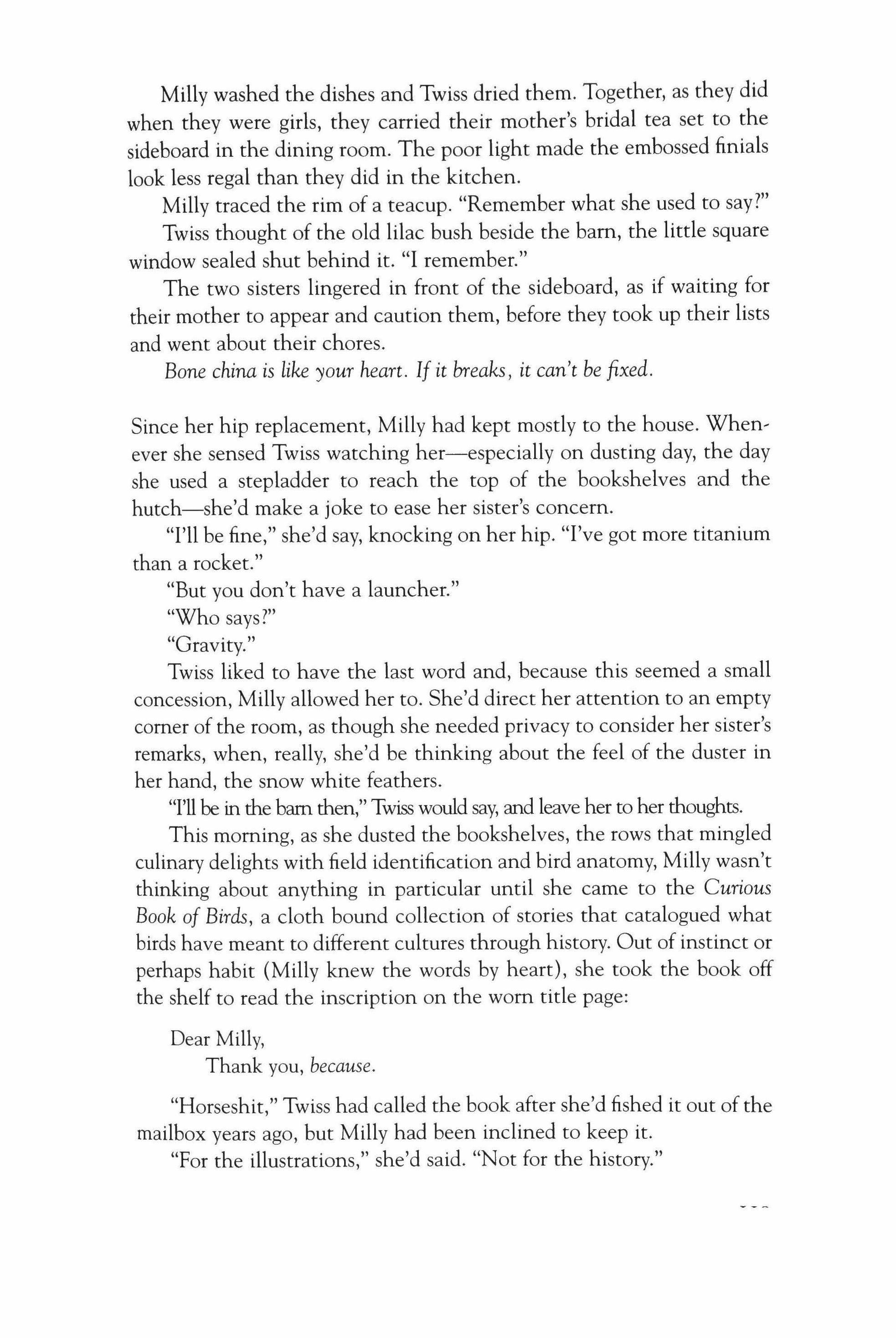
Milly washed the dishes and Twiss dried them. Together, as they did when they were girls, they carried their mother's bridal tea set to the sideboard in the dining room. The poor light made the embossed finials look less regal than they did in the kitchen.
Milly traced the rim of a teacup. "Remember what she used to say?"
Twiss thought of the old lilac bush beside the bam, the little square window sealed shut behind it. "I remember."
The two sisters lingered in front of the sideboard, as if waiting for their mother to appear and caution them, before they took up their lists and went about their chores.
Bone china is like your heart. If it breaks, it can't be fixed.
Since her hip replacement, Milly had kept mostly to the house. When� ever she sensed Twiss watching her-especially on dusting day, the day she used a stepladder to reach the top of the bookshelves and the hutch-she'd make a joke to ease her sister's concern.
"I'll be fine," she'd say, knocking on her hip. "I've got more titanium than a rocket."
"But you don't have a launcher."
"Who says?"
"Gravity."
Twiss liked to have the last word and, because this seemed a small concession, Milly allowed her to. She'd direct her attention to an empty corner of the room, as though she needed privacy to consider her sister's remarks, when, really, she'd be thinking about the feel of the duster in her hand, the snow white feathers.
"I'll be in the bam then," Twiss would say, and leave her to her thoughts.
This morning, as she dusted the bookshelves, the rows that mingled culinary delights with field identification and bird anatomy, Milly wasn't thinking about anything in particular until she came to the Curious Book of Birds, a cloth bound collection of stories that catalogued what birds have meant to different cultures through history. Out of instinct or perhaps habit (Milly knew the words by heart), she took the book off the shelf to read the inscription on the worn title page:
Dear Milly, Thank you, because.
"Horseshit," Twiss had called the book after she'd fished it out of the mailbox years ago, but Milly had been inclined to keep it.
"For the illustrations," she'd said. "Not for the history."
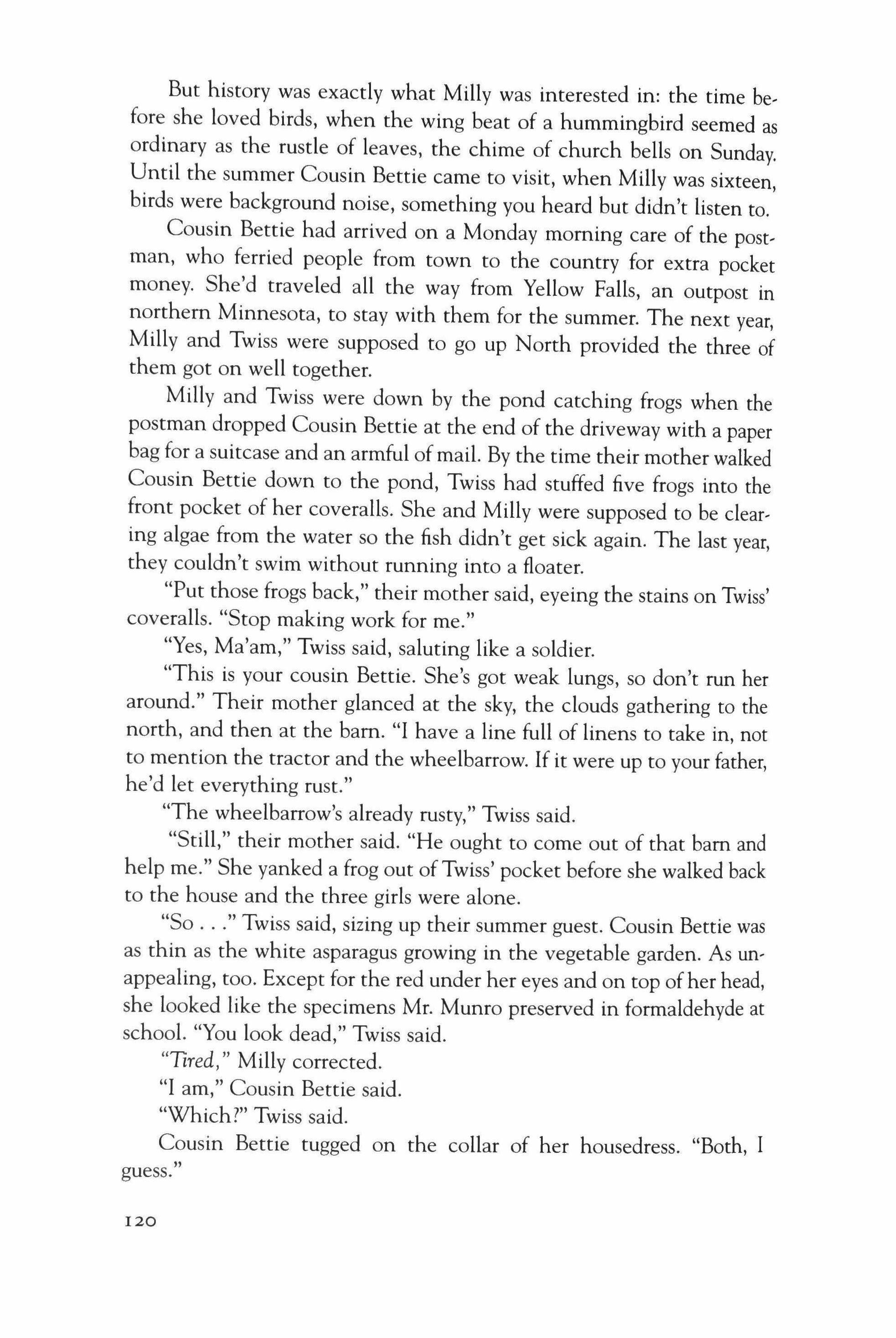
But history was exactly what Milly was interested in: the time before she loved birds, when the wing beat of a hummingbird seemed as ordinary as the rustle of leaves, the chime of church bells on Sunday. Until the summer Cousin Bettie came to visit, when Milly was sixteen, birds were background noise, something you heard but didn't listen to.
Cousin Bettie had arrived on a Monday morning care of the postman, who ferried people from town to the country for extra pocket money. She'd traveled all the way from Yellow Falls, an outpost in northern Minnesota, to stay with them for the summer. The next year, Milly and Twiss were supposed to go up North provided the three of them got on well together.
Milly and Twiss were down by the pond catching frogs when the postman dropped Cousin Bettie at the end of the driveway with a paper bag for a suitcase and an armful of mail. By the time their mother walked Cousin Bettie down to the pond, Twiss had stuffed five frogs into the front pocket of her coveralls. She and Milly were supposed to be clearing algae from the water so the fish didn't get sick again. The last year, they couldn't swim without running into a floater.
"Put those frogs back," their mother said, eyeing the stains on Twiss' coveralls. "Stop making work for me."
"Yes, Ma'am," Twiss said, saluting like a soldier.
"This is your cousin Bettie. She's got weak lungs, so don't run her around." Their mother glanced at the sky, the clouds gathering to the north, and then at the bam. "1 have a line full of linens to take in, not to mention the tractor and the wheelbarrow. If it were up to your father, he'd let everything rust."
"The wheelbarrow's already rusty," Twiss said.
"Still," their mother said. "He ought to come out of that bam and help me." She yanked a frog out of Twiss' pocket before she walked back to the house and the three girls were alone.
"So " Twiss said, sizing up their summer guest. Cousin Bettie was as thin as the white asparagus growing in the vegetable garden. As unappealing, too. Except for the red under her eyes and on top ofher head, she looked like the specimens Mr. Munro preserved in formaldehyde at school. "You look dead," Twiss said.
"Tired," Milly corrected.
"1 am," Cousin Bettie said.
"Which?" Twiss said.
Cousin Bettie tugged on the collar of her housedress. "Both, I guess."
120
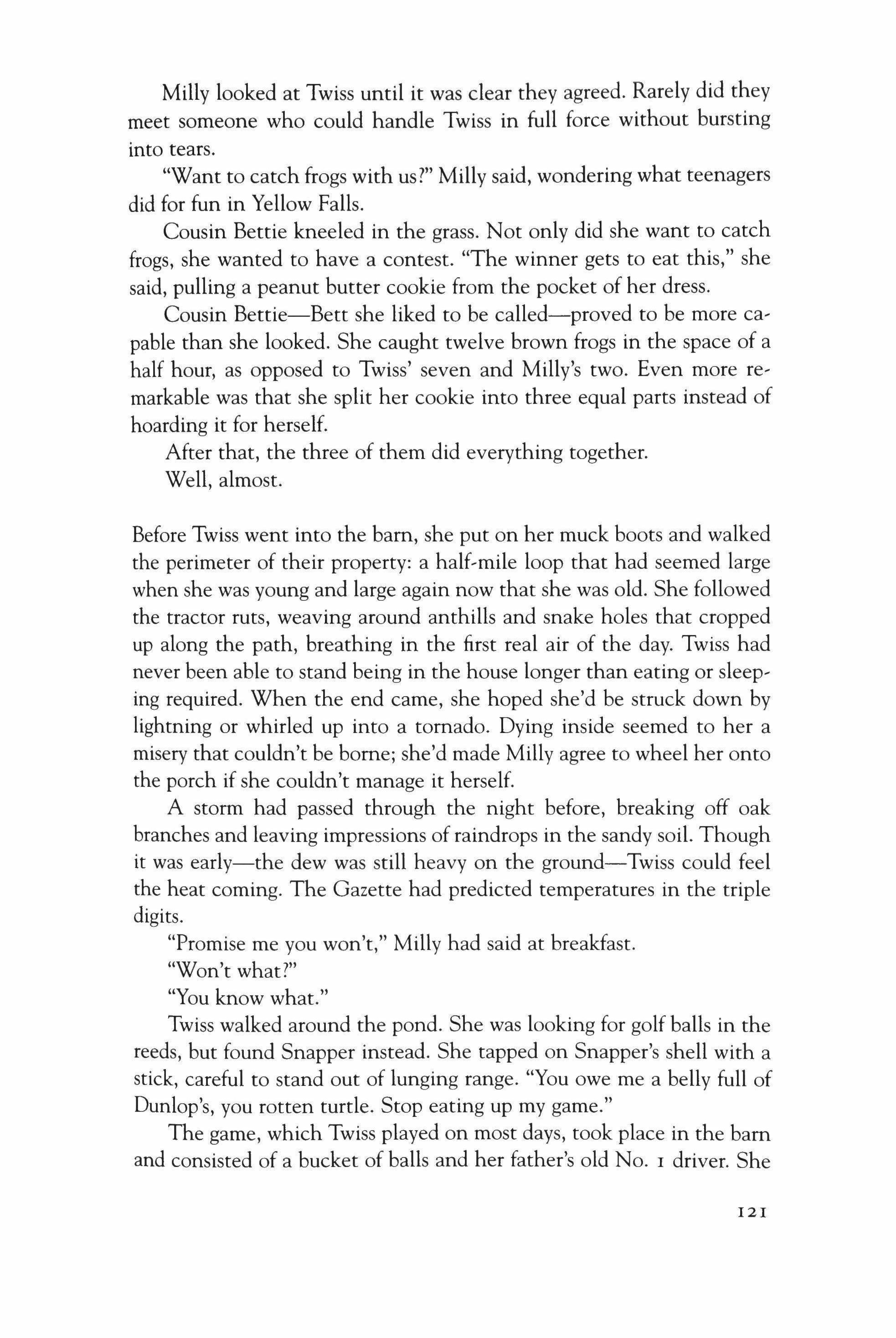
Milly looked at Twiss until it was clear they agreed. Rarely did they meet someone who could handle Twiss in full force without bursting into tears.
"Want to catch frogs with us?" Milly said, wondering what teenagers did for fun in Yellow Falls.
Cousin Bettie kneeled in the grass. Not only did she want to catch frogs, she wanted to have a contest. "The winner gets to eat this," she said, pulling a peanut butter cookie from the pocket of her dress.
Cousin Bettie-Bett she liked to be called-proved to be more capable than she looked. She caught twelve brown frogs in the space of a half hour, as opposed to Twiss' seven and Milly's two. Even more remarkable was that she split her cookie into three equal parts instead of hoarding it for herself.
After that, the three of them did everything together.
Well, almost.
Before Twiss went into the bam, she put on her muck boots and walked the perimeter of their property: a half-mile loop that had seemed large when she was young and large again now that she was old. She followed the tractor ruts, weaving around anthills and snake holes that cropped up along the path, breathing in the first real air of the day. Twiss had never been able to stand being in the house longer than eating or sleeping required. When the end came, she hoped she'd be struck down by lightning or whirled up into a tornado. Dying inside seemed to her a misery that couldn't be borne; she'd made Milly agree to wheel her onto the porch if she couldn't manage it herself.
A storm had passed through the night before, breaking off oak branches and leaving impressions of raindrops in the sandy soil. Though it was early-the dew was still heavy on the ground-Twiss could feel the heat coming. The Gazette had predicted temperatures in the triple digits.
"Promise me you won't," Milly had said at breakfast.
"Won't what?"
"You know what."
Twiss walked around the pond. She was looking for golf balls in the reeds, but found Snapper instead. She tapped on Snapper's shell with a stick, careful to stand out of lunging range. "You owe me a belly full of Dunlop's, you rotten turtle. Stop eating up my game."
The game, which Twiss played on most days, took place in the bam and consisted of a bucket of balls and her father's old No. I driver. She
121
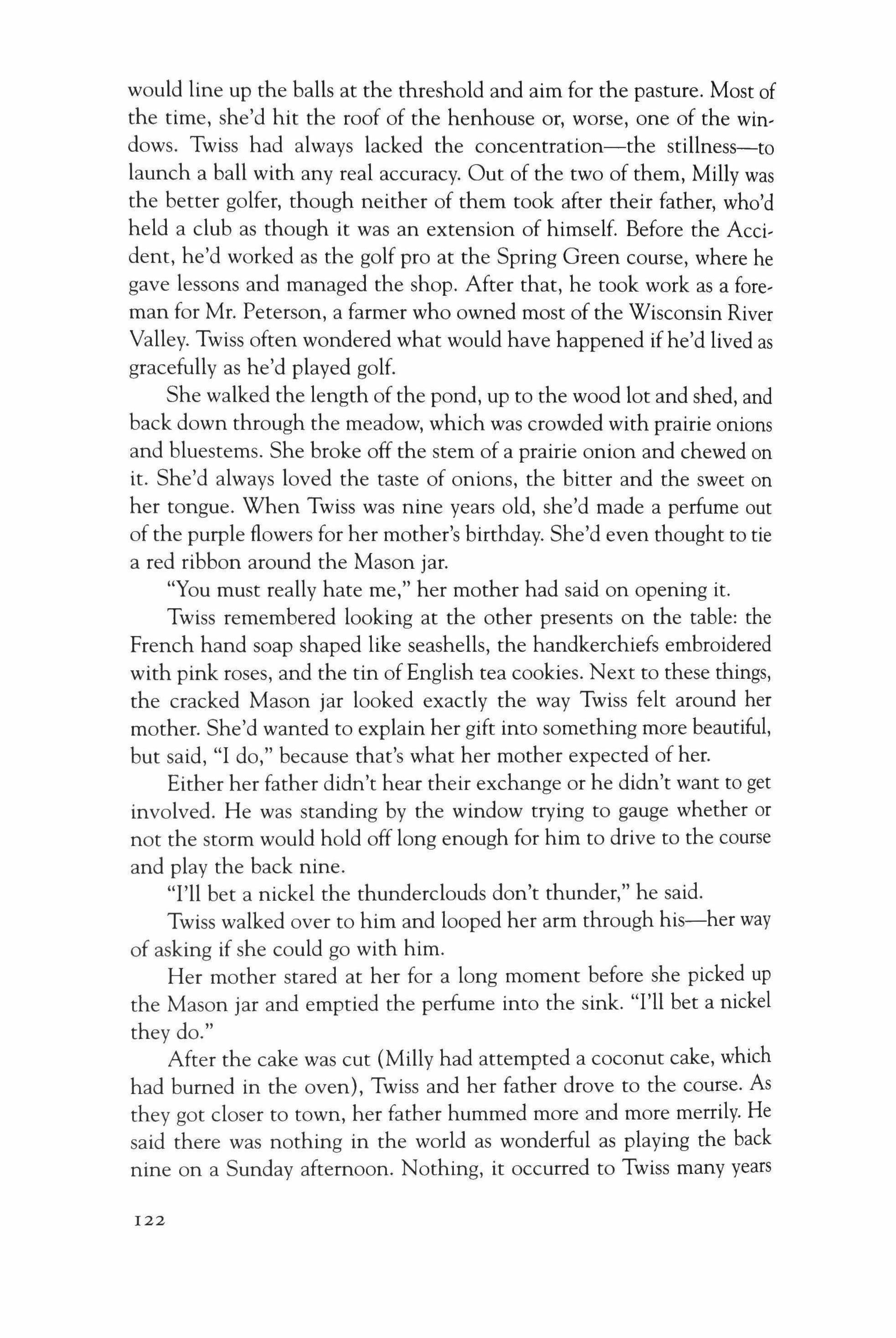
would line up the balls at the threshold and aim for the pasture. Most of the time, she'd hit the roof of the henhouse or, worse, one of the windows. Twiss had always lacked the concentration-the stillness-to launch a ball with any real accuracy. Out of the two of them, Milly was the better golfer, though neither of them took after their father, who'd held a club as though it was an extension of himself. Before the Accident, he'd worked as the golf pro at the Spring Green course, where he gave lessons and managed the shop. After that, he took work as a foreman for Mr. Peterson, a farmer who owned most of the Wisconsin River Valley. Twiss often wondered what would have happened if he'd lived as gracefully as he'd played golf.
She walked the length of the pond, up to the wood lot and shed, and back down through the meadow, which was crowded with prairie onions and bluestems. She broke off the stem of a prairie onion and chewed on it. She'd always loved the taste of onions, the bitter and the sweet on her tongue. When Twiss was nine years old, she'd made a perfume out of the purple flowers for her mother's birthday. She'd even thought to tie a red ribbon around the Mason jar.
"You must really hate me," her mother had said on opening it.
Twiss remembered looking at the other presents on the table: the French hand soap shaped like seashells, the handkerchiefs embroidered with pink roses, and the tin of English tea cookies. Next to these things, the cracked Mason jar looked exactly the way Twiss felt around her mother. She'd wanted to explain her gift into something more beautiful, but said, "I do," because that's what her mother expected of her.
Either her father didn't hear their exchange or he didn't want to get involved. He was standing by the window trying to gauge whether or not the storm would hold off long enough for him to drive to the course and play the back nine.
"I'll bet a nickel the thunderclouds don't thunder," he said.
Twiss walked over to him and looped her arm through his-her way of asking if she could go with him.
Her mother stared at her for a long moment before she picked up the Mason jar and emptied the perfume into the sink. "I'll bet a nickel they do."
After the cake was cut (Milly had attempted a coconut cake, which had burned in the oven), Twiss and her father drove to the course. As they got closer to town, her father hummed more and more merrily. He said there was nothing in the world as wonderful as playing the back nine on a Sunday afternoon. Nothing, it occurred to Twiss many years
122
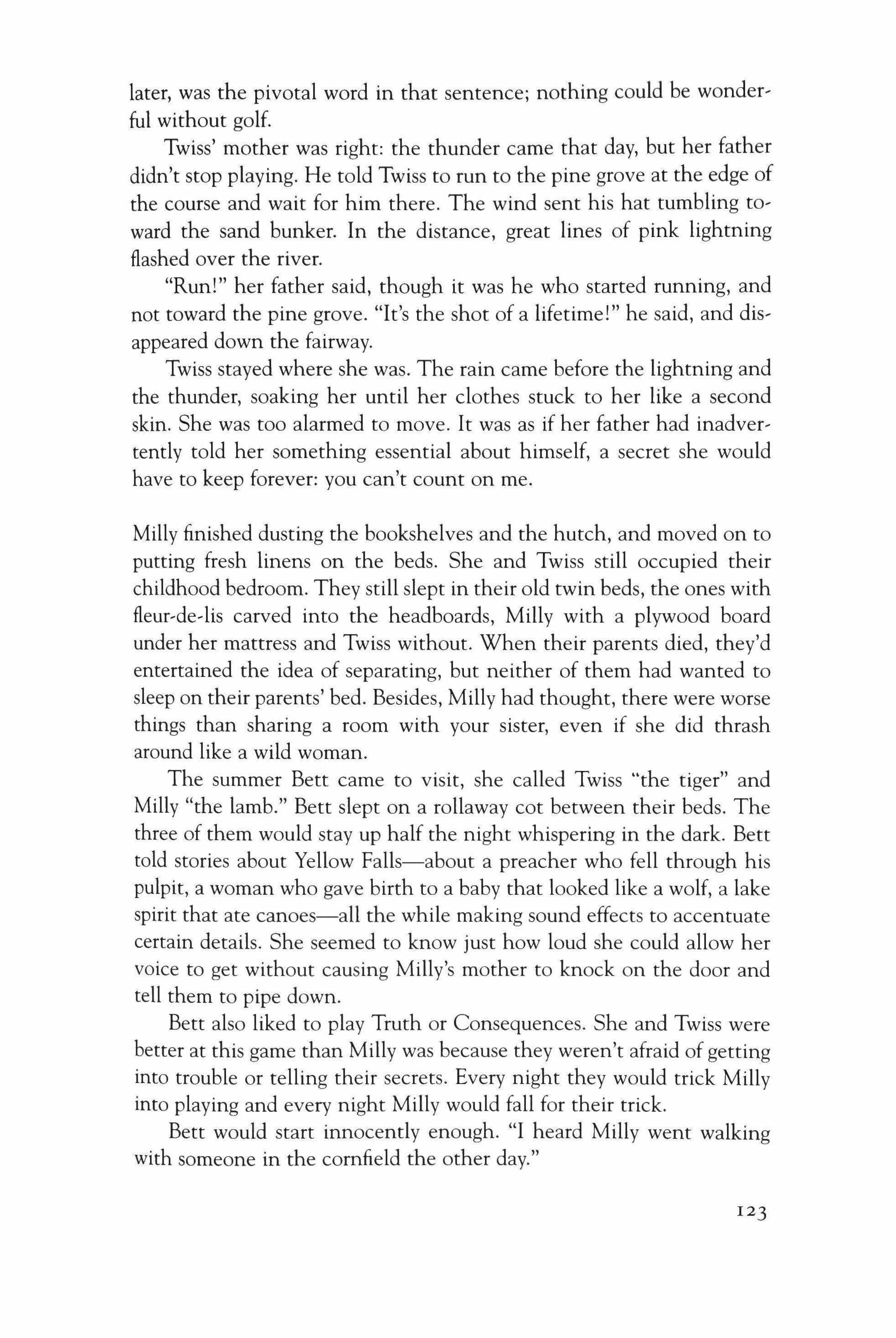
later, was the pivotal word in that sentence; nothing could be wonder, ful without golf.
Twiss' mother was right: the thunder came that day, but her father didn't stop playing. He told Twiss to run to the pine grove at the edge of the course and wait for him there. The wind sent his hat tumbling to' ward the sand bunker. In the distance, great lines of pink lightning flashed over the river.
"Run!" her father said, though it was he who started running, and not toward the pine grove. "It's the shot of a lifetime!" he said, and dis, appeared down the fairway.
Twiss stayed where she was. The rain came before the lightning and the thunder, soaking her until her clothes stuck to her like a second skin. She was too alarmed to move. It was as if her father had inadvertently told her something essential about himself, a secret she would have to keep forever: you can't count on me.
Milly finished dusting the bookshelves and the hutch, and moved on to putting fresh linens on the beds. She and Twiss still occupied their childhood bedroom. They still slept in their old twin beds, the ones with fleur-de-lis carved into the headboards, Milly with a plywood board under her mattress and Twiss without. When their parents died, they'd entertained the idea of separating, but neither of them had wanted to sleep on their parents' bed. Besides, Milly had thought, there were worse things than sharing a room with your sister, even if she did thrash around like a wild woman.
The summer Bett came to visit, she called Twiss "the tiger" and Milly "the lamb." Bett slept on a rollaway cot between their beds. The three of them would stay up half the night whispering in the dark. Bett told stories about Yellow Falls-about a preacher who fell through his pulpit, a woman who gave birth to a baby that looked like a wolf, a lake spirit that ate canoes-all the while making sound effects to accentuate certain details. She seemed to know just how loud she could allow her voice to get without causing Milly's mother to knock on the door and tell them to pipe down.
Bett also liked to play Truth or Consequences. She and Twiss were better at this game than Milly was because they weren't afraid of getting into trouble or telling their secrets. Every night they would trick Milly into playing and every night Milly would fall for their trick.
Bett would start innocently enough. "I heard Milly went walking with someone in the cornfield the other day."
123
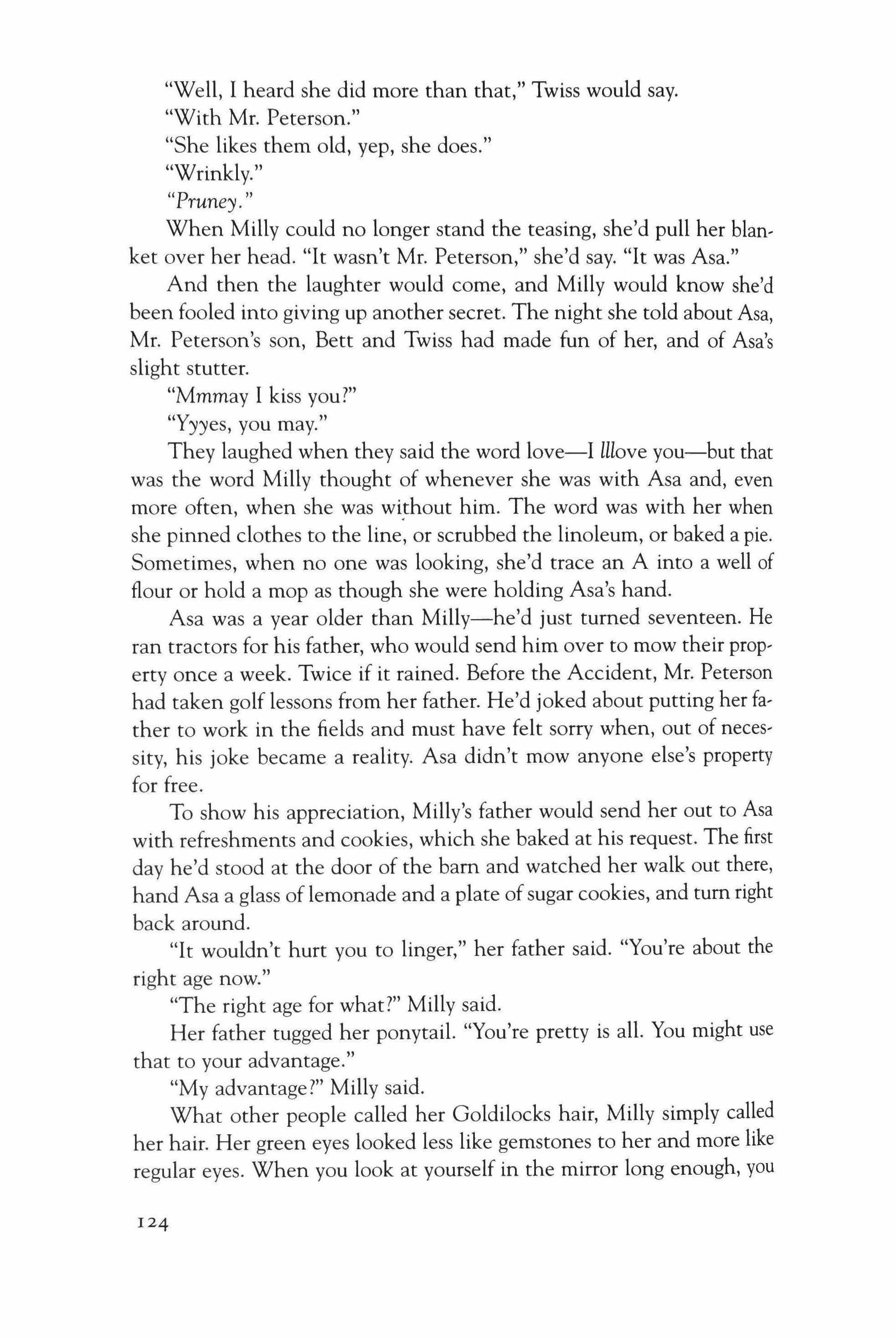
"Well, I heard she did more than that," Twiss would say.
"With Mr. Peterson."
"She likes them old, yep, she does."
"Wrinkly."
"Pruney."
When Milly could no longer stand the teasing, she'd pull her blanket over her head. "It wasn't Mr. Peterson," she'd say. "It was Asa."
And then the laughter would come, and Milly would know she'd been fooled into giving up another secret. The night she told about Asa, Mr. Peterson's son, Bett and Twiss had made fun of her, and of Asa's slight stutter.
"Mmmay I kiss you?"
"Yyyes, you may."
They laughed when they said the word love-I lllove you-but that was the word Milly thought of whenever she was with Asa and, even more often, when she was without him. The word was with her when she pinned clothes to the line, or scrubbed the linoleum, or baked a pie. Sometimes, when no one was looking, she'd trace an A into a well of flour or hold a mop as though she were holding Asa's hand.
Asa was a year older than Milly-he'd just turned seventeen. He ran tractors for his father, who would send him over to mow their property once a week. Twice if it rained. Before the Accident, Mr. Peterson had taken golf lessons from her father. He'd joked about putting her father to work in the fields and must have felt sorry when, out of necessity, his joke became a reality. Asa didn't mow anyone else's property for free.
To show his appreciation, Milly's father would send her out to Asa with refreshments and cookies, which she baked at his request. The first day he'd stood at the door of the bam and watched her walk out there, hand Asa a glass of lemonade and a plate of sugar cookies, and tum right back around.
"It wouldn't hurt you to linger," her father said. "You're about the right age now."
"The right age for what?" Milly said. Her father tugged her ponytail. "You're pretty is all. You might use that to your advantage."
"My advantage?" Milly said.
What other people called her Goldilocks hair, Milly simply called her hair. Her green eyes looked less like gemstones to her and more like regular eyes. When you look at yourself in the mirror long enough, you
124
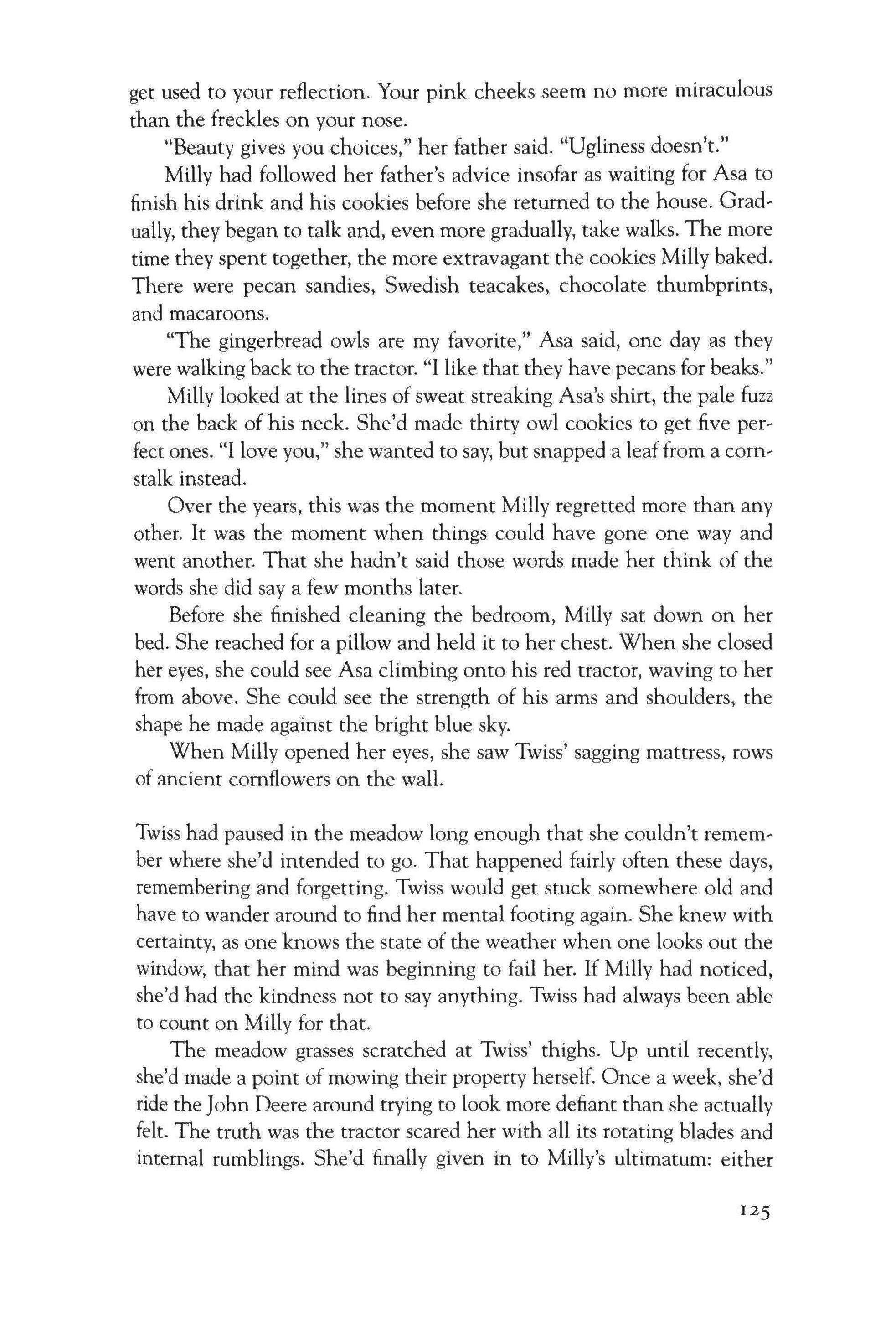
get used to your reflection. Your pink cheeks seem no more miraculous than the freckles on your nose.
"Beauty gives you choices," her father said. "Ugliness doesn't."
Milly had followed her father's advice insofar as waiting for Asa to finish his drink and his cookies before she returned to the house. Grad, ually, they began to talk and, even more gradually, take walks. The more time they spent together, the more extravagant the cookies Milly baked. There were pecan sandies, Swedish teacakes, chocolate thumbprints, and macaroons.
"The gingerbread owls are my favorite," Asa said, one day as they were walking back to the tractor. "I like that they have pecans for beaks."
Milly looked at the lines of sweat streaking Asa's shirt, the pale fuzz on the back of his neck. She'd made thirty owl cookies to get five per' feet ones. "I love you," she wanted to say, but snapped a leaffrom a com' stalk instead.
Over the years, this was the moment Milly regretted more than any other. It was the moment when things could have gone one way and went another. That she hadn't said those words made her think of the words she did say a few months later.
Before she finished cleaning the bedroom, Milly sat down on her bed. She reached for a pillow and held it to her chest. When she closed her eyes, she could see Asa climbing onto his red tractor, waving to her from above. She could see the strength of his arms and shoulders, the shape he made against the bright blue sky.
When Milly opened her eyes, she saw Twiss' sagging mattress, rows of ancient cornflowers on the wall.
Twiss had paused in the meadow long enough that she couldn't rernember where she'd intended to go. That happened fairly often these days, remembering and forgetting. Twiss would get stuck somewhere old and have to wander around to find her mental footing again. She knew with certainty, as one knows the state of the weather when one looks out the window, that her mind was beginning to fail her. If Milly had noticed, she'd had the kindness not to say anything. Twiss had always been able to count on Milly for that.
The meadow grasses scratched at Twiss' thighs. Up until recently, she'd made a point of mowing their property herself. Once a week, she'd ride the John Deere around trying to look more defiant than she actually felt. The truth was the tractor scared her with all its rotating blades and internal rumblings. She'd finally given in to Milly's ultimatum: either
125
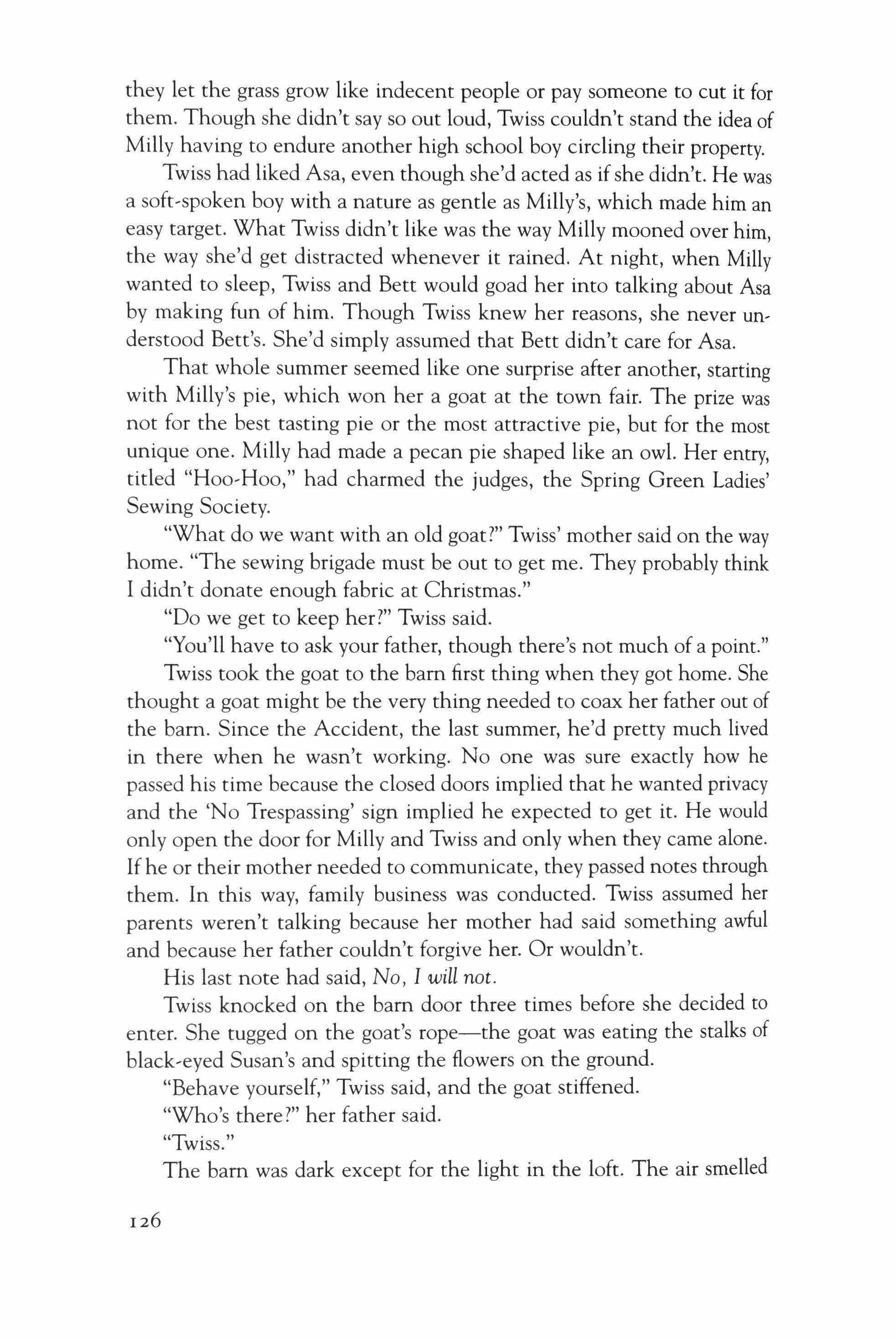
they let the grass grow like indecent people or pay someone to cut it for them. Though she didn't say so out loud, Twiss couldn't stand the idea of Milly having to endure another high school boy circling their property.
Twiss had liked Asa, even though she'd acted as ifshe didn't. He was a soft-spoken boy with a nature as gentle as Milly's, which made him an easy target. What Twiss didn't like was the way Milly mooned over him, the way she'd get distracted whenever it rained. At night, when Milly wanted to sleep, Twiss and Bett would goad her into talking about Asa by making fun of him. Though Twiss knew her reasons, she never understood Bett's. She'd simply assumed that Bett didn't care for Asa.
That whole summer seemed like one surprise after another, starting with Milly's pie, which won her a goat at the town fair. The prize was not for the best tasting pie or the most attractive pie, but for the most unique one. Milly had made a pecan pie shaped like an owl. Her entry, titled "Hoo-Hoo," had charmed the judges, the Spring Green Ladies' Sewing Society.
"What do we want with an old goat?" Twiss' mother said on the way home. "The sewing brigade must be out to get me. They probably think I didn't donate enough fabric at Christmas."
"Do we get to keep her?" Twiss said.
"You'll have to ask your father, though there's not much of a point."
Twiss took the goat to the bam first thing when they got home. She thought a goat might be the very thing needed to coax her father out of the bam. Since the Accident, the last summer, he'd pretty much lived in there when he wasn't working. No one was sure exactly how he passed his time because the closed doors implied that he wanted privacy and the 'No Trespassing' sign implied he expected to get it. He would only open the door for Milly and Twiss and only when they came alone. Ifhe or their mother needed to communicate, they passed notes through them. In this way, family business was conducted. Twiss assumed her parents weren't talking because her mother had said something awful and because her father couldn't forgive her. Or wouldn't.
His last note had said, No, I will not.
Twiss knocked on the bam door three times before she decided to enter. She tugged on the goat's rope-the goat was eating the stalks of black-eyed Susan's and spitting the flowers on the ground.
"Behave yourself," Twiss said, and the goat stiffened.
"Who's there?" her father said. "Twiss."
The bam was dark except for the light in the loft. The air smelled
126
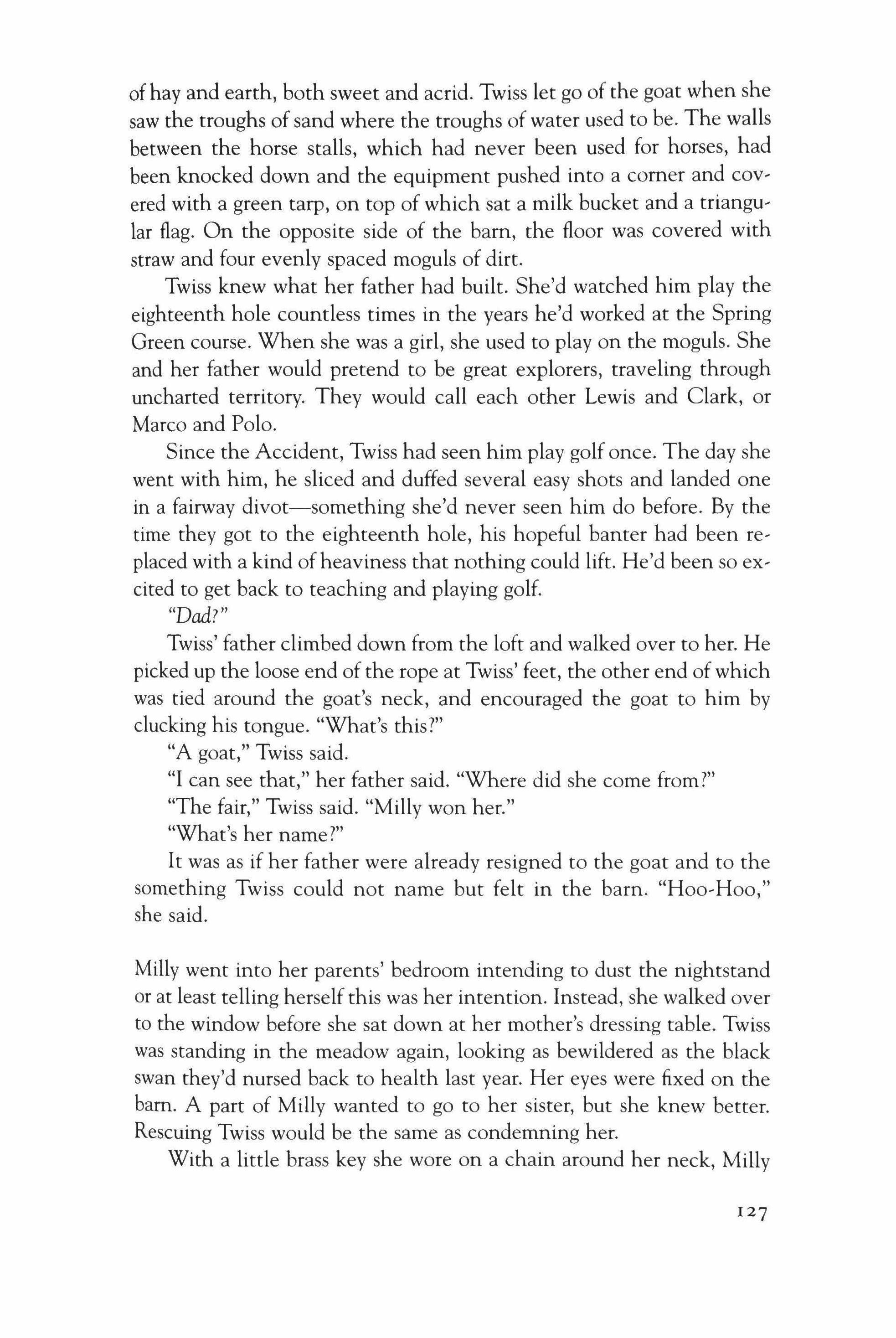
ofhay and earth, both sweet and acrid. Twiss let go of the goat when she saw the troughs of sand where the troughs of water used to be. The walls between the horse stalls, which had never been used for horses, had been knocked down and the equipment pushed into a comer and covered with a green tarp, on top of which sat a milk bucket and a triangular flag. On the opposite side of the bam, the floor was covered with straw and four evenly spaced moguls of dirt.
Twiss knew what her father had built. She'd watched him play the eighteenth hole countless times in the years he'd worked at the Spring Green course. When she was a girl, she used to play on the moguls. She and her father would pretend to be great explorers, traveling through uncharted territory. They would call each other Lewis and Clark, or Marco and Polo.
Since the Accident, Twiss had seen him play golf once. The day she went with him, he sliced and duffed several easy shots and landed one in a fairway divot-something she'd never seen him do before. By the time they got to the eighteenth hole, his hopeful banter had been replaced with a kind ofheaviness that nothing could lift. He'd been so excited to get back to teaching and playing golf.
"Dad?"
Twiss' father climbed down from the loft and walked over to her. He picked up the loose end of the rope at Twiss' feet, the other end of which was tied around the goat's neck, and encouraged the goat to him by clucking his tongue. "What's this?"
"A goat," Twiss said.
"I can see that," her father said. "Where did she come from?"
"The fair," Twiss said. "Milly won her."
"What's her name?"
It was as if her father were already resigned to the goat and to the something Twiss could not name but felt in the bam. "Hoo-Hoo," she said.
Milly went into her parents' bedroom intending to dust the nightstand or at least telling herself this was her intention. Instead, she walked over to the window before she sat down at her mother's dressing table. Twiss was standing in the meadow again, looking as bewildered as the black swan they'd nursed back to health last year. Her eyes were fixed on the bam. A part of Milly wanted to go to her sister, but she knew better.
Rescuing Twiss would be the same as condemning her.
With a little brass key she wore on a chain around her neck, Milly
127

opened her mother's jewelry box, which contained her mother's wedding band, a pair of opal earrings, and a set of silver butterfly combs. Her mother came from a wealthy Chicago family-the Milhenning's, who were in the jewelry business-which made the contents of the box seem paltrier than they would have otherwise.
"Your mother's people put gold in their soup," her father used to say, which was an exaggeration to say the least. But her mother did have interesting holdovers from her unmarried life: the bone china tea set, a Herrend serving platter from Hungary, a taste for seafood in her eggs. Milly liked the way her mother said words like melange instead of mixture. Or the way she said de rien instead of your welcome.
Milly's mother and her aunt had given up their inheritances and married for love.
"Look where that got us," her mother would say. "On either side of the Mississippi without so much as a paddle. We weren't given what we were promised."
"What were you promised?" Milly had asked once.
"I don't remember anymore," her mother said.
"I could help you," Milly said, explaining the game she and Twiss played whenever they lost track of their thoughts. One of them would say a word and the other would have to say everything they associated with that word until they remembered what they'd been thinking about.
"It's not that kind of forgetting," her mother said.
"Dad," Milly said anyway, and waited.
"That's your word," she added, when her mother didn't say anything. "You're supposed to think of another one that goes with it."
Her mother looked up from the wash bucket. "Regret."
This was years before Milly's father had sequestered himself in the bam. Still, it was this moment that Milly remembered more than others: her mother bent over the kitchen floor on her hands and knees, with a cloth in one hand and a wool scouring pad in the other, the end ofher braid trailing in the wash bucket. Before she'd said her word, she'd looked at Milly with a softness she rarely allowed anyone to see.
Whenever Milly thought of her mother, she also thought of Twiss, in whom she'd witnessed that exact expression many times over the years. People had always thought Twiss was like their father-a replica, they said, a mockup-but people didn't pay close enough attention.
Milly lifted the tray out ofher mother's jewelry box and set it on the dressing table. A piece of paper, folded in half, was pinned to the plush red velvet lining the box. She pulled the sewing pin out of the velvet.
128

As if she were a child again, Milly looked toward the window and the door before she opened the piece of paper. When no one was there, she read the slanting handwriting, which announced damage long before the actual words did.
Though Twiss eventually remembered what she was doing in the meadow, she didn't feel the kind of relief that one might expect from knowing where you are and where you're going. Reorienting herself to the present moment, the benignness of it, felt to her a little like being robbed.
According to her chore list, she was supposed to feed the chickens and clean out the coop. Milly had already retrieved the eggs that morning and set them in the refrigerator. She'd mentioned something about egg salad, if she could round up a jar of pickles in the cellar.
"A change might do us good," she'd said.
Twiss had laughed. "There's nothing like old pickles to oust us from routine."
"A good dill's as close to perfection as either of us will get."
"That and botulism."
Twiss fed the chickens and swept up the droppings on the floor. In the comer of the coop, under the feed trough, she spotted a golfball and slipped it in her pocket. She'd broken the main window so many times that neither she nor Milly saw the use in repairing it anymore. The chickens, each of whom Twiss called Henry because she couldn't tell them apart, were not impressed. They clucked until she left the coop.
"Fine then," she said as she latched the wire door. "Not a drop of molasses for you."
This was her mother's favorite expression, which Twiss had recently dredged up and had been using in the same determined tone despite the disgust it made her feel. Her mother's other favorite expression had been in reply to the statement I don't know.
"Well, if you don't know," she would say, with a hand on her hip. "Who does?"
No one! Twiss had wanted to yell when she was a girl. Instead, she'd ignore her mother until her mother lost interest and went back to whatever she was doing. For reasons she couldn't understand or wouldn't allow herself to understand, Twiss had treated her mother terribly. Her last words to her mother gripped her like a root, still, all because she couldn't say them to her father.
Twiss walked to the bam. She lingered outside the utility door, deciding whether or not to enter. All these years she'd been walking into
129
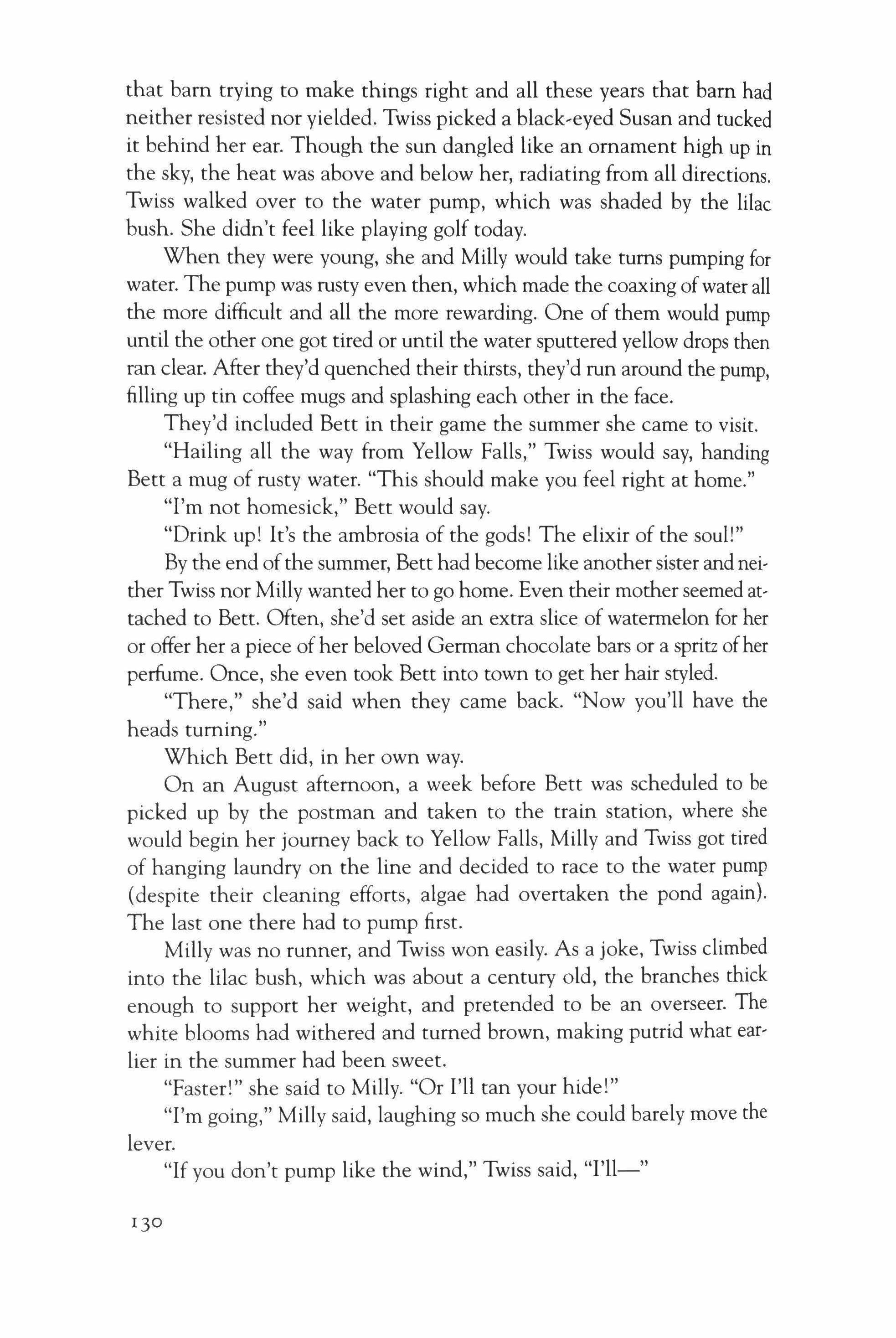
that bam trying to make things right and all these years that bam had neither resisted nor yielded. Twiss picked a black,eyed Susan and tucked it behind her ear. Though the sun dangled like an ornament high up in the sky, the heat was above and below her, radiating from all directions. Twiss walked over to the water pump, which was shaded by the lilac bush. She didn't feel like playing golf today.
When they were young, she and Milly would take turns pumping for water. The pump was rusty even then, which made the coaxing of water all the more difficult and all the more rewarding. One of them would pump until the other one got tired or until the water sputtered yellow drops then ran clear. After they'd quenched their thirsts, they'd run around the pump, filling up tin coffee mugs and splashing each other in the face.
They'd included Bett in their game the summer she came to visit.
"Hailing all the way from Yellow Falls," Twiss would say, handing Bett a mug of rusty water. "This should make you feel right at home."
"I'm not homesick," Bett would say.
"Drink up! It's the ambrosia of the gods! The elixir of the soul!"
By the end ofthe summer, Bett had become like another sister and neither Twiss nor Milly wanted her to go home. Even their mother seemed attached to Bett. Often, she'd set aside an extra slice of watermelon for her or offer her a piece ofher beloved German chocolate bars or a spritz ofher perfume. Once, she even took Bett into town to get her hair styled.
"There," she'd said when they came back. "Now you'll have the heads turning."
Which Bett did, in her own way.
On an August afternoon, a week before Bett was scheduled to be picked up by the postman and taken to the train station, where she would begin her journey back to Yellow Falls, Milly and Twiss got tired of hanging laundry on the line and decided to race to the water pump (despite their cleaning efforts, algae had overtaken the pond again). The last one there had to pump first.
Milly was no runner, and Twiss won easily. As a joke, Twiss climbed into the lilac bush, which was about a century old, the branches thick enough to support her weight, and pretended to be an overseer. The white blooms had withered and turned brown, making putrid what earlier in the summer had been sweet.
"Faster!" she said to Milly. "Or I'll tan your hide!"
"I'm going," Milly said, laughing so much she could barely move the lever.
"If you don't pump like the wind," Twiss said, "I'll-"
130
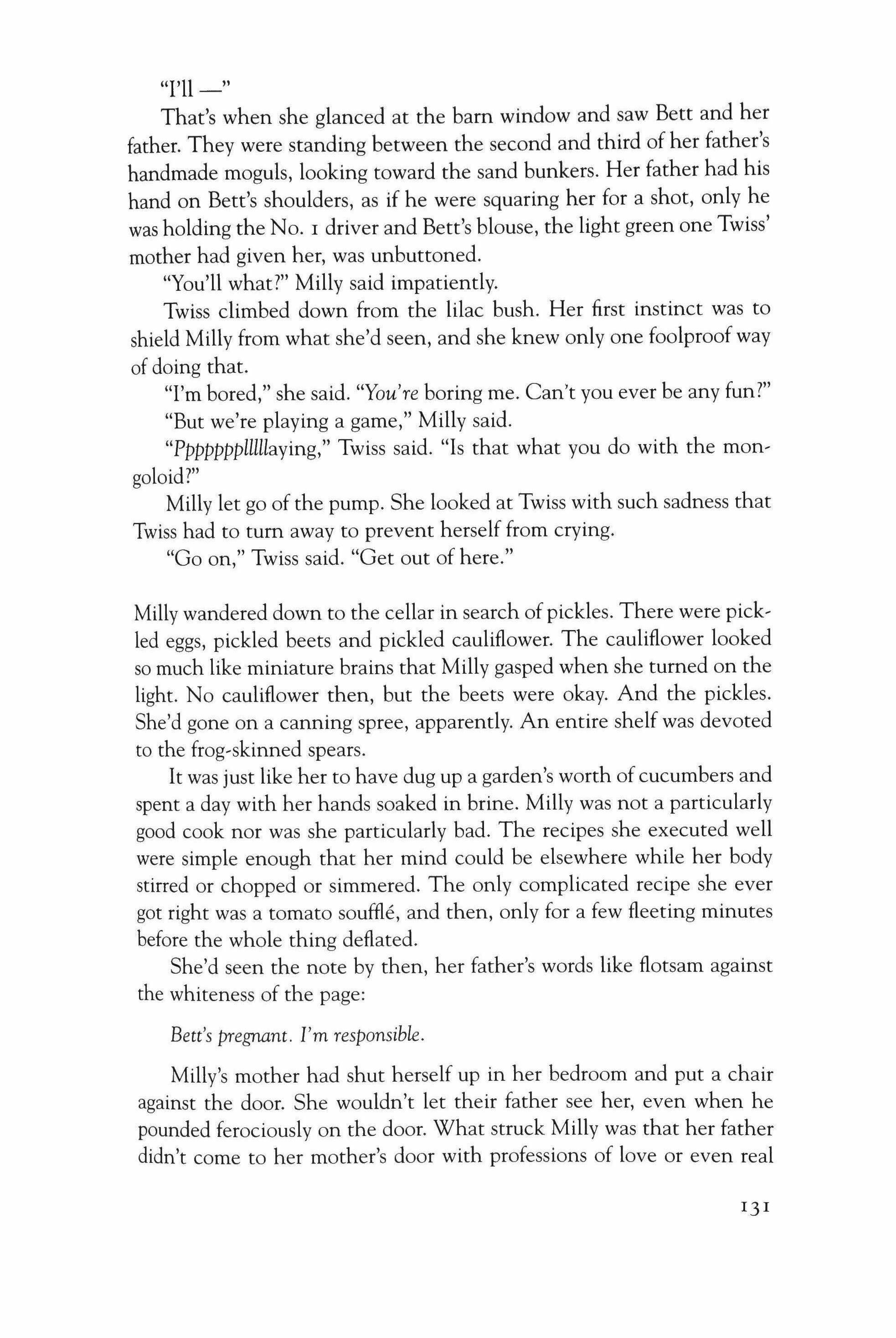
"I'll-"
That's when she glanced at the barn window and saw Bett and her father. They were standing between the second and third of her father's handmade moguls, looking toward the sand bunkers. Her father had his hand on Bett's shoulders, as if he were squaring her for a shot, only he was holding the No. I driver and Bett's blouse, the light green one Twiss' mother had given her, was unbuttoned.
"You'll what?" Milly said impatiently.
Twiss climbed down from the lilac bush. Her first instinct was to shield Milly from what she'd seen, and she knew only one foolproof way of doing that.
"I'm bored," she said. "You're boring me. Can't you ever be any fun?"
"But we're playing a game," Milly said.
"Ppppppplllllaying," Twiss said. "Is that what you do with the mongoloid?"
Milly let go of the pump. She looked at Twiss with such sadness that Twiss had to turn away to prevent herself from crying.
"Go on," Twiss said. "Get out of here."
Milly wandered down to the cellar in search of pickles. There were pick, led eggs, pickled beets and pickled cauliflower. The cauliflower looked so much like miniature brains that Milly gasped when she turned on the light. No cauliflower then, but the beets were okay. And the pickles. She'd gone on a canning spree, apparently. An entire shelf was devoted to the frog,skinned spears.
It was just like her to have dug up a garden's worth of cucumbers and spent a day with her hands soaked in brine. Milly was not a particularly good cook nor was she particularly bad. The recipes she executed well were simple enough that her mind could be elsewhere while her body stirred or chopped or simmered. The only complicated recipe she ever got right was a tomato souffle, and then, only for a few fleeting minutes before the whole thing deflated.
She'd seen the note by then, her father's words like flotsam against the whiteness of the page:
Bett's pregnant. I'm responsible.
Milly's mother had shut herself up in her bedroom and put a chair against the door. She wouldn't let their father see her, even when he pounded ferociously on the door. What struck Milly was that her father didn't come to her mother's door with professions of love or even real
131
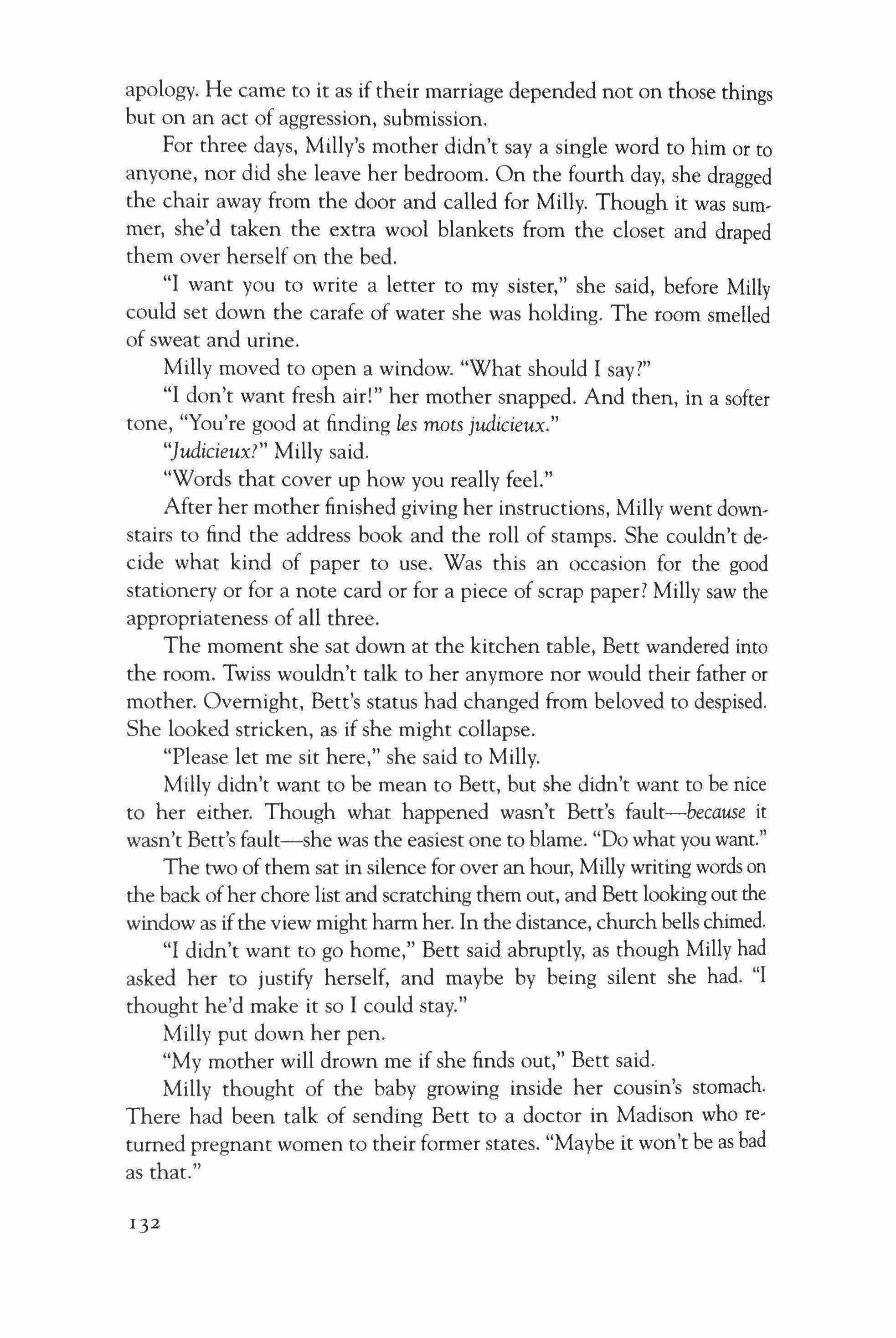
apology. He came to it as if their marriage depended not on those things but on an act of aggression, submission.
For three days, Milly's mother didn't say a single word to him or to anyone, nor did she leave her bedroom. On the fourth day, she dragged the chair away from the door and called for Milly. Though it was summer, she'd taken the extra wool blankets from the closet and draped them over herself on the bed.
"I want you to write a letter to my sister," she said, before Milly could set down the carafe of water she was holding. The room smelled of sweat and urine.
Milly moved to open a window. "What should I say?"
"I don't want fresh air!" her mother snapped. And then, in a softer tone, "You're good at finding les mots judicieux."
"]udicieux?" Milly said.
"Words that cover up how you really feel."
After her mother finished giving her instructions, Milly went downstairs to find the address book and the roll of stamps. She couldn't decide what kind of paper to use. Was this an occasion for the good stationery or for a note card or for a piece of scrap paper? Milly saw the appropriateness of all three.
The moment she sat down at the kitchen table, Bett wandered into the room. Twiss wouldn't talk to her anymore nor would their father or mother. Overnight, Bett's status had changed from beloved to despised. She looked stricken, as if she might collapse.
"Please let me sit here," she said to Milly.
Milly didn't want to be mean to Bett, but she didn't want to be nice to her either. Though what happened wasn't Bett's fault-because it wasn't Bert's fault-she was the easiest one to blame. "Do what you want."
The two of them sat in silence for over an hour, Milly writing words on the back ofher chore list and scratching them out, and Bett looking out the window as ifthe view might harm her. In the distance, church bells chimed.
"I didn't want to go home," Bett said abruptly, as though Milly had asked her to justify herself, and maybe by being silent she had. "I thought he'd make it so I could stay."
Milly put down her pen.
"My mother will drown me if she finds out," Bett said.
Milly thought of the baby growing inside her cousin's stomach. There had been talk of sending Bett to a doctor in Madison who returned pregnant women to their former states. "Maybe it won't be as bad as that."
132
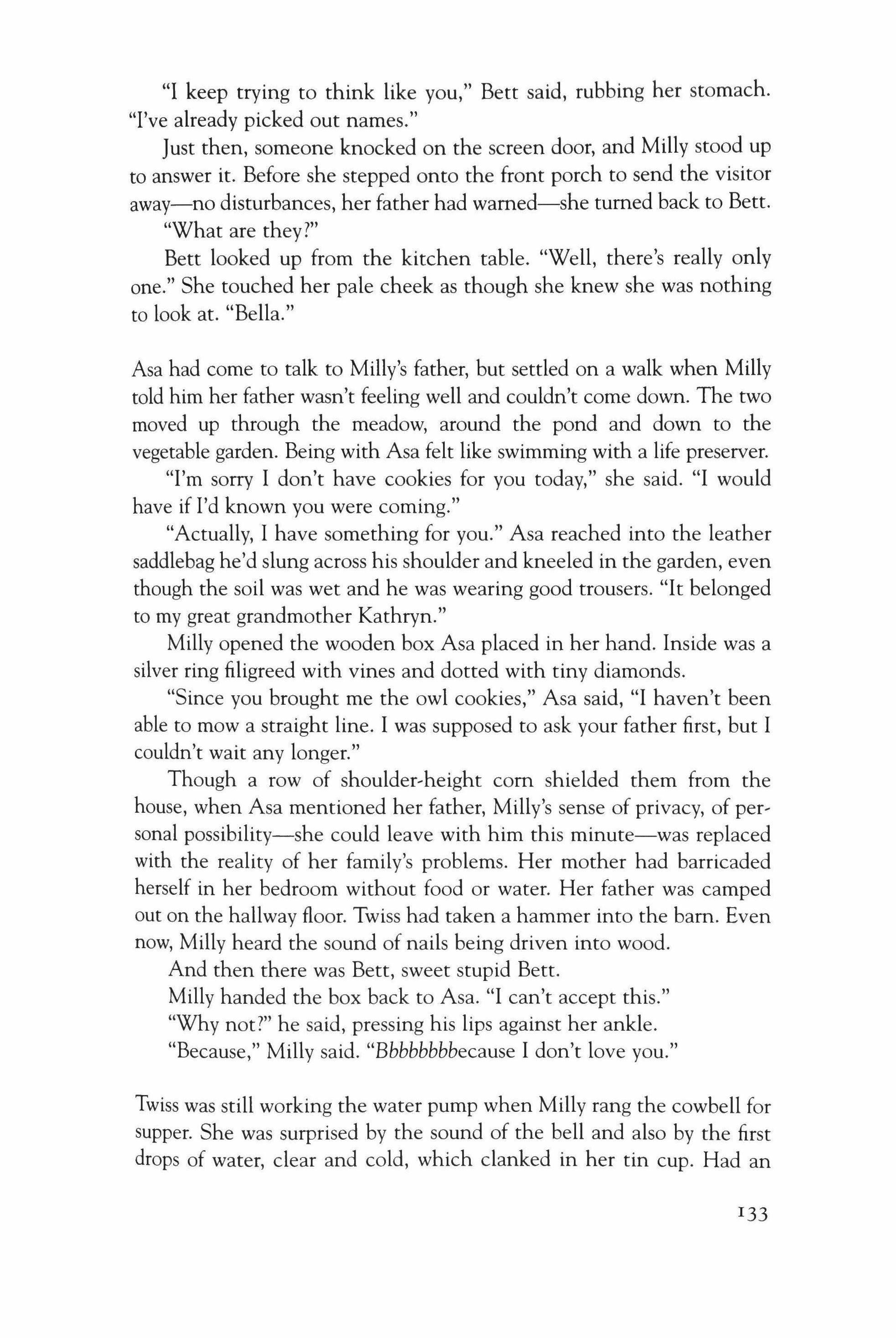
"I keep trying to think like you," Bett said, rubbing her stomach. "I've already picked out names."
Just then, someone knocked on the screen door, and Milly stood up to answer it. Before she stepped onto the front porch to send the visitor away-no disturbances, her father had warned-she turned back to Bett.
"What are they?"
Bett looked up from the kitchen table. "Well, there's really only one." She touched her pale cheek as though she knew she was nothing to look at. "Bella."
Asa had come to talk to Milly's father, but settled on a walk when Milly told him her father wasn't feeling well and couldn't come down. The two moved up through the meadow, around the pond and down to the vegetable garden. Being with Asa felt like swimming with a life preserver.
"I'm sorry I don't have cookies for you today," she said. "I would have if I'd known you were coming."
"Actually, I have something for you." Asa reached into the leather saddlebag he'd slung across his shoulder and kneeled in the garden, even though the soil was wet and he was wearing good trousers. "It belonged to my great grandmother Kathryn."
Milly opened the wooden box Asa placed in her hand. Inside was a silver ring filigreed with vines and dotted with tiny diamonds.
"Since you brought me the owl cookies," Asa said, "I haven't been able to mow a straight line. I was supposed to ask your father first, but I couldn't wait any longer."
Though a row of shoulder-height com shielded them from the house, when Asa mentioned her father, Milly's sense of privacy, of personal possibility-she could leave with him this minute-was replaced with the reality of her family's problems. Her mother had barricaded herself in her bedroom without food or water. Her father was camped out on the hallway floor. Twiss had taken a hammer into the bam. Even now, Milly heard the sound of nails being driven into wood.
And then there was Bett, sweet stupid Bett.
Milly handed the box back to Asa. "I can't accept this."
"Why not?" he said, pressing his lips against her ankle.
"Because," Milly said. "Bbbbbbbbecause I don't love you."
Twiss was still working the water pump when Milly rang the cowbell for supper. She was surprised by the sound of the bell and also by the first drops of water, clear and cold, which clanked in her tin cup. Had an
133
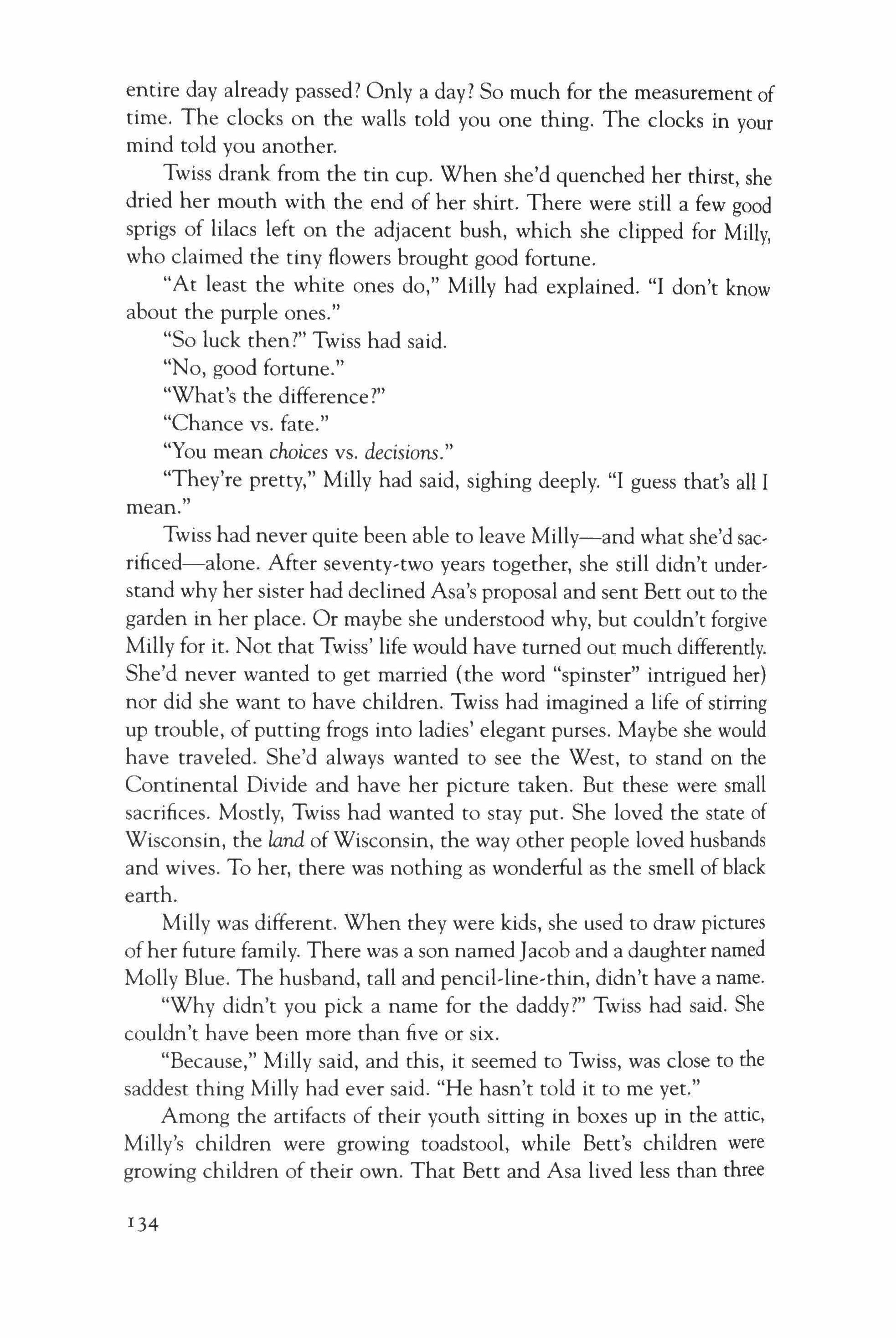
entire day already passed? Only a day? So much for the measurement of time. The clocks on the walls told you one thing. The clocks in your mind told you another.
Twiss drank from the tin cup. When she'd quenched her thirst, she dried her mouth with the end of her shirt. There were still a few good sprigs of lilacs left on the adjacent bush, which she clipped for Milly, who claimed the tiny flowers brought good fortune.
"At least the white ones do," Milly had explained. "I don't know about the purple ones."
"So luck then?" Twiss had said.
"No, good fortune."
"What's the difference?"
"Chance vs. fate."
"You mean choices vs. decisions."
"They're pretty," Milly had said, sighing deeply. "I guess that's all 1 mean."
Twiss had never quite been able to leave Milly-and what she'd sacrificed-alone. After seventy-two years together, she still didn't understand why her sister had declined Asa's proposal and sent Bett out to the garden in her place. Or maybe she understood why, but couldn't forgive Milly for it. Not that Twiss' life would have turned out much differently. She'd never wanted to get married (the word "spinster" intrigued her) nor did she want to have children. Twiss had imagined a life of stirring up trouble, of putting frogs into ladies' elegant purses. Maybe she would have traveled. She'd always wanted to see the West, to stand on the Continental Divide and have her picture taken. But these were small sacrifices. Mostly, Twiss had wanted to stay put. She loved the state of Wisconsin, the land of Wisconsin, the way other people loved husbands and wives. To her, there was nothing as wonderful as the smell of black earth.
Milly was different. When they were kids, she used to draw pictures ofher future family. There was a son named Jacob and a daughter named Molly Blue. The husband, tall and pencil-line-thin, didn't have a name.
"Why didn't you pick a name for the daddy?" Twiss had said. She couldn't have been more than five or six.
"Because," Milly said, and this, it seemed to Twiss, was close to the saddest thing Milly had ever said. "He hasn't told it to me yet."
Among the artifacts of their youth sitting in boxes up in the attic, Milly's children were growing toadstool, while Bett's children were growing children of their own. That Bett and Asa lived less than three
134

miles away, on Mr. Peterson's old farmstead by the river, had never stopped bothering Twiss. She still wouldn't drive that way into town.
"You don't have to do this on my behalf," Milly had said once, when they were out on a Sunday drive. Sometimes, they'd travel down to Cave of the Mounds or the state park for the afternoon. Either attraction required crossing the river.
"I'm not doing it for you," Twiss had said, focusing on the road, the potato fields encroaching on both sides.
"Half a century is an awfully long time to spite someone," Milly said.
They'd just turned onto the county bridge, which still didn't have guardrails despite how many people had driven off of it over the years. Most were pulled up too late or not at all. The older kids told stories about the swamp people who lived at the bottom the river. They scared the younger kids so much that the young ones would dip only their toes in and then only an inch or two. The stories, which Twiss had heard since she was a girl, and the way they were told with such enthusiasm, reminded her of Bett and her stories about Yellow Falls. Twiss had never believed Bett's stories, yet somehow she'd believed Bett.
All in the same year, after Bett had married Asa and given birth to her first child, both of Twiss' parents died. Her mother went first, by way of a fever, and her father followed less than three months later. He'd become a different man by then, roaming the house in search of whatever of their mother's possessions he could get his hands on. One night, he drank a bottle of their mother's most expensive perfume, fell down the stairs, and broke his neck.
The undertaker said he'd never worked on a dead man who smelled as good.
"It's French," Twiss had said, of the perfume. "Millot's Crepe de Chine."
She'd tried it on in the moments directly after her mother died, dabbing her wrists the way her mother used to. To Twiss, the scent (the bottle promised Italian bergamot, nerolie, basil, Egyptian jasmine, and fresh aldehydes) was as complicated as her mother; the list of ingredients individualized what otherwise blended together. She didn't know why she'd put it on when she could have been doing several other more useful things. Her mother was still on the bed, with one arm dangling off the side where she'd tried to reach out to Twiss and Twiss had moved away from her.
"Just because you're sick doesn't mean you suddenly get to love me," Twiss had said. She'd turned toward the window, toward the view of the
135
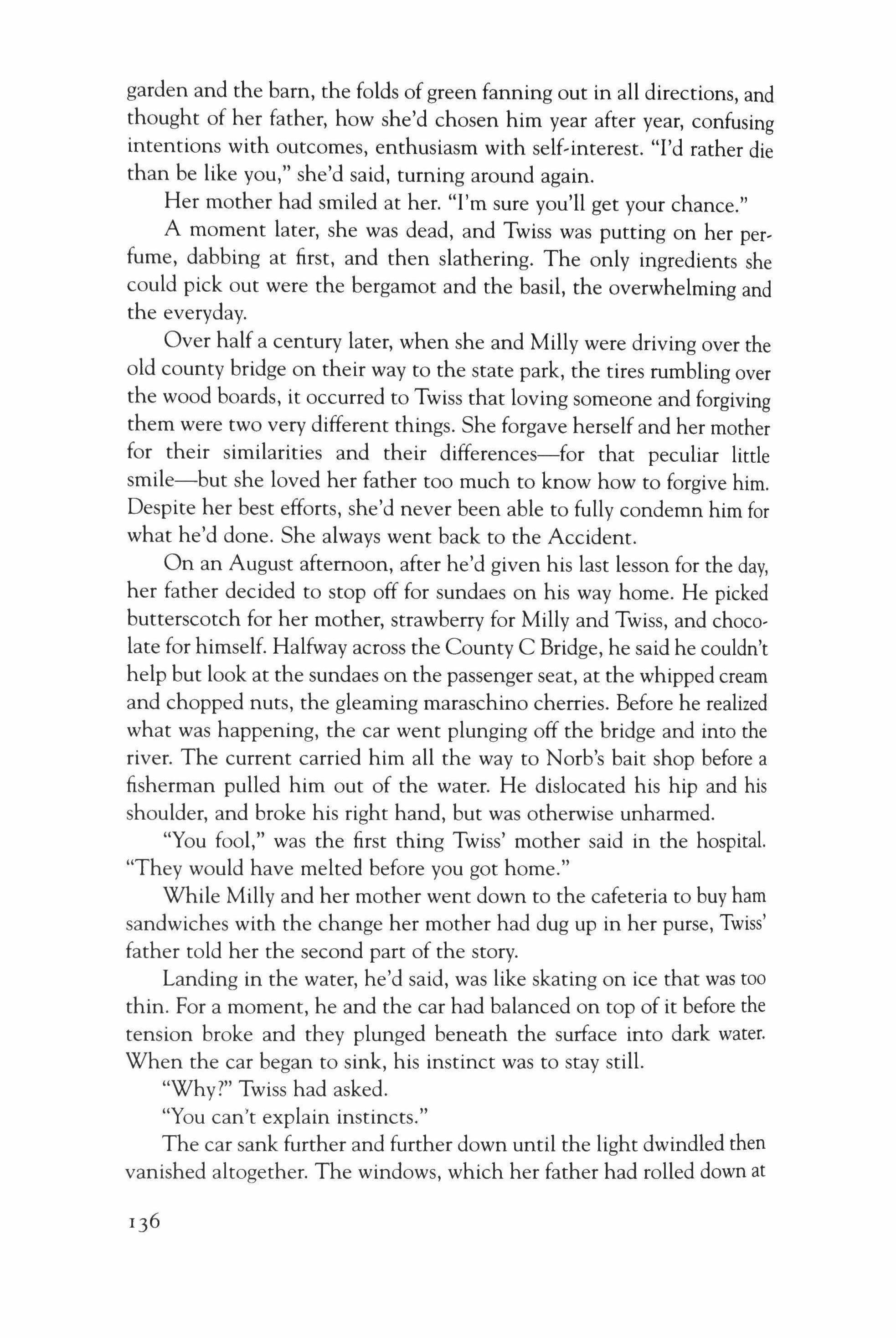
garden and the barn, the folds of green fanning out in all directions, and thought of her father, how she'd chosen him year after year, confusing intentions with outcomes, enthusiasm with self-interest. "I'd rather die than be like you," she'd said, turning around again.
Her mother had smiled at her. "I'm sure you'll get your chance."
A moment later, she was dead, and Twiss was putting on her perfume, dabbing at first, and then slathering. The only ingredients she could pick out were the bergamot and the basil, the overwhelming and the everyday.
Over half a century later, when she and Milly were driving over the old county bridge on their way to the state park, the tires rumbling over the wood boards, it occurred to Twiss that loving someone and forgiving them were two very different things. She forgave herself and her mother for their similarities and their differences-for that peculiar little smile-but she loved her father too much to know how to forgive him. Despite her best efforts, she'd never been able to fully condemn him for what he'd done. She always went back to the Accident.
On an August afternoon, after he'd given his last lesson for the day, her father decided to stop off for sundaes on his way home. He picked butterscotch for her mother, strawberry for Milly and Twiss, and chocolate for himself. Halfway across the County C Bridge, he said he couldn't help but look at the sundaes on the passenger seat, at the whipped cream and chopped nuts, the gleaming maraschino cherries. Before he realized what was happening, the car went plunging off the bridge and into the river. The current carried him all the way to Norb's bait shop before a fisherman pulled him out of the water. He dislocated his hip and his shoulder, and broke his right hand, but was otherwise unharmed.
"You fool," was the first thing Twiss' mother said in the hospital. "They would have melted before you got home."
While Milly and her mother went down to the cafeteria to buy ham sandwiches with the change her mother had dug up in her purse, Twiss' father told her the second part of the story.
Landing in the water, he'd said, was like skating on ice that was too thin. For a moment, he and the car had balanced on top of it before the tension broke and they plunged beneath the surface into dark water. When the car began to sink, his instinct was to stay still.
"Why?" Twiss had asked.
"You can't explain instincts."
The car sank further and further down until the light dwindled then vanished altogether. The windows, which her father had rolled down at
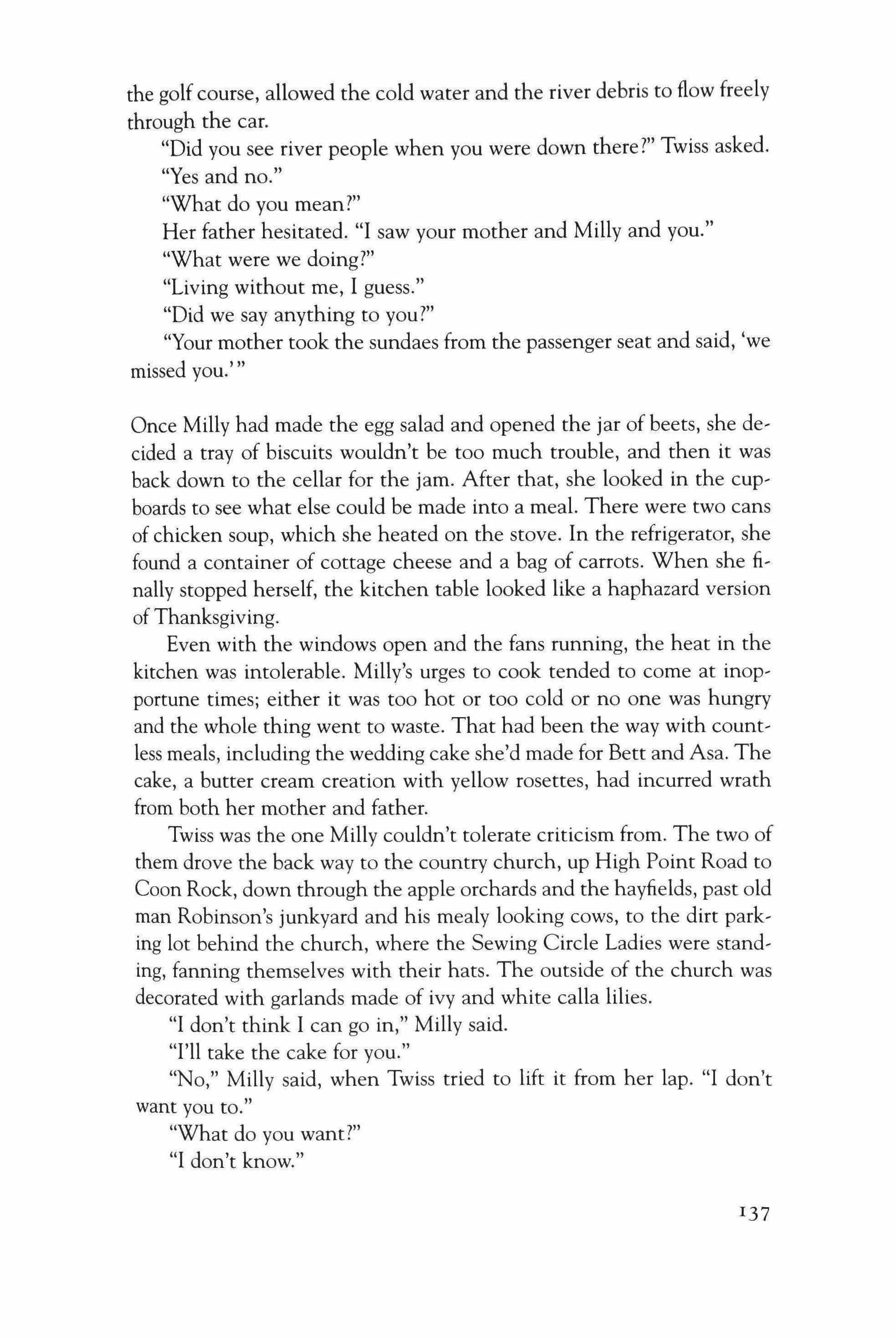
the golf course, allowed the cold water and the river debris to flow freely through the car.
"Did you see river people when you were down there?" Twiss asked.
"Yes and no."
"What do you mean?"
Her father hesitated. "I saw your mother and Milly and you."
"What were we doing?"
"Living without me, I guess."
"Did we say anything to you?"
"Your mother took the sundaes from the passenger seat and said, 'we missed you.'"
Once Milly had made the egg salad and opened the jar of beets, she decided a tray of biscuits wouldn't be too much trouble, and then it was back down to the cellar for the jam. After that, she looked in the cupboards to see what else could be made into a meal. There were two cans of chicken soup, which she heated on the stove. In the refrigerator, she found a container of cottage cheese and a bag of carrots. When she finally stopped herself, the kitchen table looked like a haphazard version of Thanksgiving.
Even with the windows open and the fans running, the heat in the kitchen was intolerable. Milly's urges to cook tended to come at inopportune times; either it was too hot or too cold or no one was hungry and the whole thing went to waste. That had been the way with countless meals, including the wedding cake she'd made for Bett and Asa. The cake, a butter cream creation with yellow rosettes, had incurred wrath from both her mother and father.
Twiss was the one Milly couldn't tolerate criticism from. The two of them drove the back way to the country church, up High Point Road to Coon Rock, down through the apple orchards and the hayfields, past old man Robinson's junkyard and his mealy looking cows, to the dirt parking lot behind the church, where the Sewing Circle Ladies were standing, fanning themselves with their hats. The outside of the church was decorated with garlands made of ivy and white calla lilies.
"I don't think I can go in," Milly said.
"I'll take the cake for you."
"No," Milly said, when Twiss tried to lift it from her lap. "I don't want you to."
"What do you want?"
"I don't know."
137
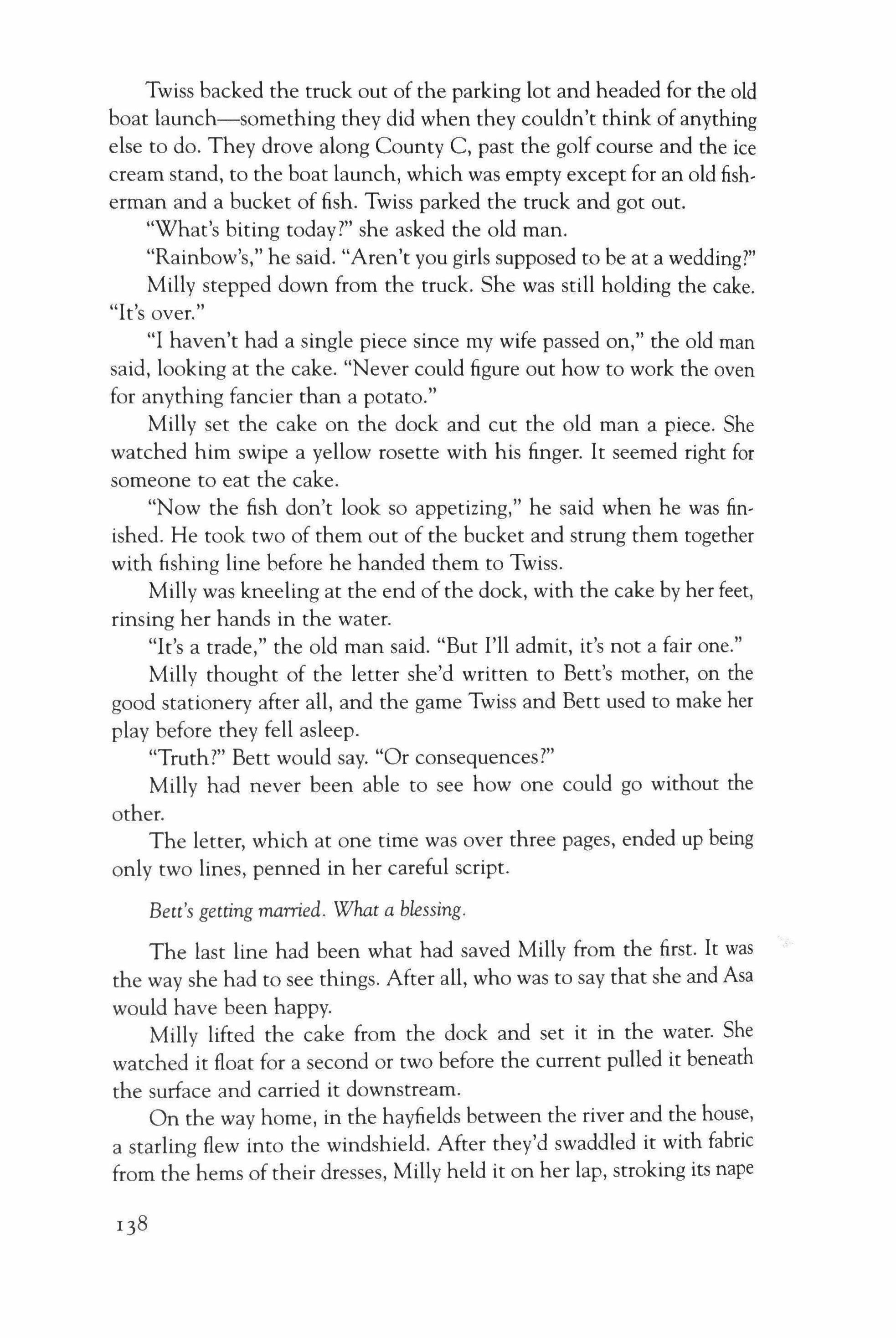
Twiss backed the truck out of the parking lot and headed for the old boat launch-something they did when they couldn't think of anything else to do. They drove along County C, past the golf course and the ice cream stand, to the boat launch, which was empty except for an old fisherman and a bucket of fish. Twiss parked the truck and got out.
"What's biting today?" she asked the old man.
"Rainbow's," he said. "Aren't you girls supposed to be at a wedding?"
Milly stepped down from the truck. She was still holding the cake. "It's over."
"I haven't had a single piece since my wife passed on," the old man said, looking at the cake. "Never could figure out how to work the oven for anything fancier than a potato."
Milly set the cake on the dock and cut the old man a piece. She watched him swipe a yellow rosette with his finger. It seemed right for someone to eat the cake.
"Now the fish don't look so appetizing," he said when he was finished. He took two of them out of the bucket and strung them together with fishing line before he handed them to Twiss.
Milly was kneeling at the end of the dock, with the cake by her feet, rinsing her hands in the water.
"It's a trade," the old man said. "But I'll admit, it's not a fair one."
Milly thought of the letter she'd written to Bett's mother, on the good stationery after all, and the game Twiss and Bett used to make her play before they fell asleep.
"Truth?" Bett would say. "Or consequences?"
Milly had never been able to see how one could go without the other.
The letter, which at one time was over three pages, ended up being only two lines, penned in her careful script.
Bett's getting married. What a blessing.
The last line had been what had saved Milly from the first. It was the way she had to see things. After all, who was to say that she and Asa would have been happy.
Milly lifted the cake from the dock and set it in the water. She watched it float for a second or two before the current pulled it beneath the surface and carried it downstream.
On the way home, in the hayfields between the river and the house, a starling flew into the windshield. After they'd swaddled it with fabric from the hems of their dresses, Milly held it on her lap, stroking its nape
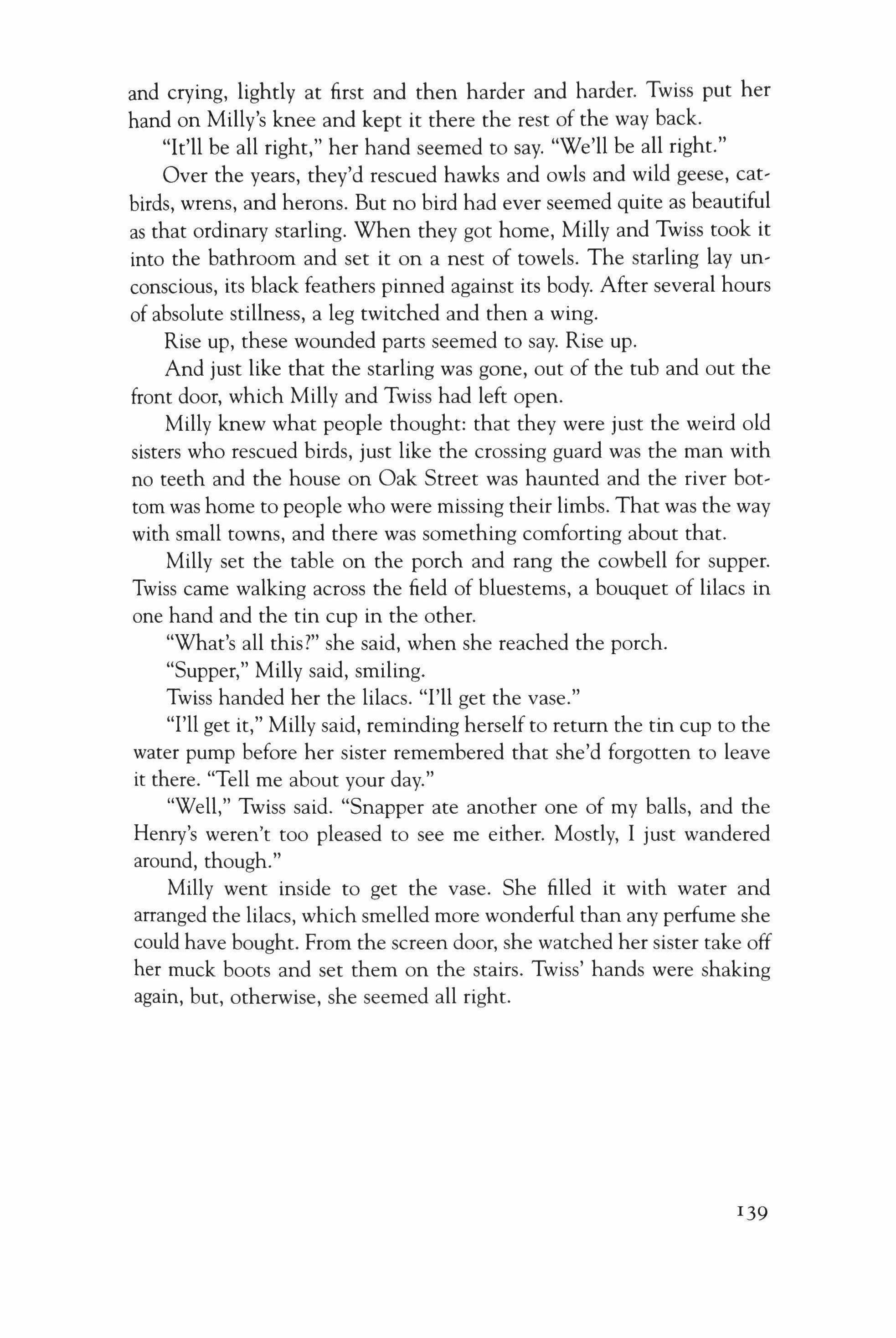
and crying, lightly at first and then harder and harder. Twiss put her hand on Milly's knee and kept it there the rest of the way back.
"It'll be all right," her hand seemed to say. "We'll be all right."
Over the years, they'd rescued hawks and owls and wild geese, catbirds, wrens, and herons. But no bird had ever seemed quite as beautiful as that ordinary starling. When they got home, Milly and Twiss took it into the bathroom and set it on a nest of towels. The starling lay unconscious, its black feathers pinned against its body. After several hours of absolute stillness, a leg twitched and then a wing.
Rise up, these wounded parts seemed to say. Rise up.
And just like that the starling was gone, out of the tub and out the front door, which Milly and Twiss had left open.
Milly knew what people thought: that they were just the weird old sisters who rescued birds, just like the crossing guard was the man with no teeth and the house on Oak Street was haunted and the river bottom was home to people who were missing their limbs. That was the way with small towns, and there was something comforting about that.
Milly set the table on the porch and rang the cowbell for supper. Twiss came walking across the field of bluestems, a bouquet of lilacs in one hand and the tin cup in the other.
"What's all this?" she said, when she reached the porch.
"Supper," Milly said, smiling.
Twiss handed her the lilacs. "I'll get the vase."
"I'll get it," Milly said, reminding herself to return the tin cup to the water pump before her sister remembered that she'd forgotten to leave it there. "Tell me about your day."
"Well," Twiss said. "Snapper ate another one of my balls, and the Henry's weren't too pleased to see me either. Mostly, I just wandered around, though."
Milly went inside to get the vase. She filled it with water and arranged the lilacs, which smelled more wonderful than any perfume she could have bought. From the screen door, she watched her sister take off her muck boots and set them on the stairs. Twiss' hands were shaking again, but, otherwise, she seemed all right.
I39
Steven A. Dabrowski
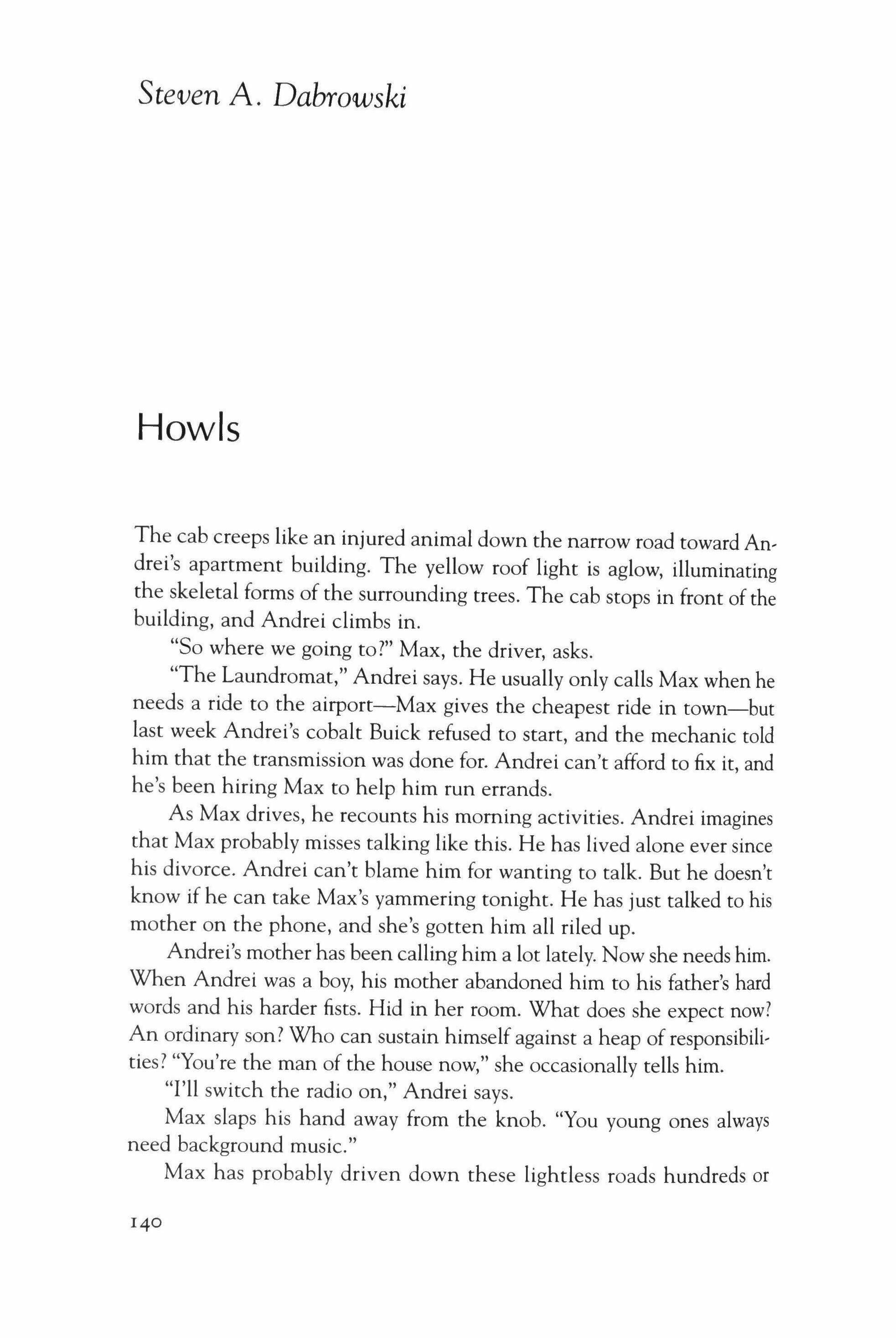
Howls
The cab creeps like an injured animal down the narrow road toward Andrei's apartment building. The yellow roof light is aglow, illuminating the skeletal forms of the surrounding trees. The cab stops in front of the building, and Andrei climbs in.
"So where we going to?" Max, the driver, asks.
"The Laundromat," Andrei says. He usually only calls Max when he needs a ride to the airport-Max gives the cheapest ride in town-but last week Andrei's cobalt Buick refused to start, and the mechanic told him that the transmission was done for. Andrei can't afford to fix it, and he's been hiring Max to help him run errands.
As Max drives, he recounts his morning activities. Andrei imagines that Max probably misses talking like this. He has lived alone ever since his divorce. Andrei can't blame him for wanting to talk. But he doesn't know if he can take Max's yammering tonight. He has just talked to his mother on the phone, and she's gotten him all riled up.
Andrei's mother has been calling him a lot lately. Now she needs him. When Andrei was a boy, his mother abandoned him to his father's hard words and his harder fists. Hid in her room. What does she expect now? An ordinary son? Who can sustain himself against a heap of responsibilities? "You're the man of the house now," she occasionally tells him.
"I'll switch the radio on," Andrei says.
Max slaps his hand away from the knob. "You young ones always need background music."
Max has probably driven down these lightless roads hundreds or
140
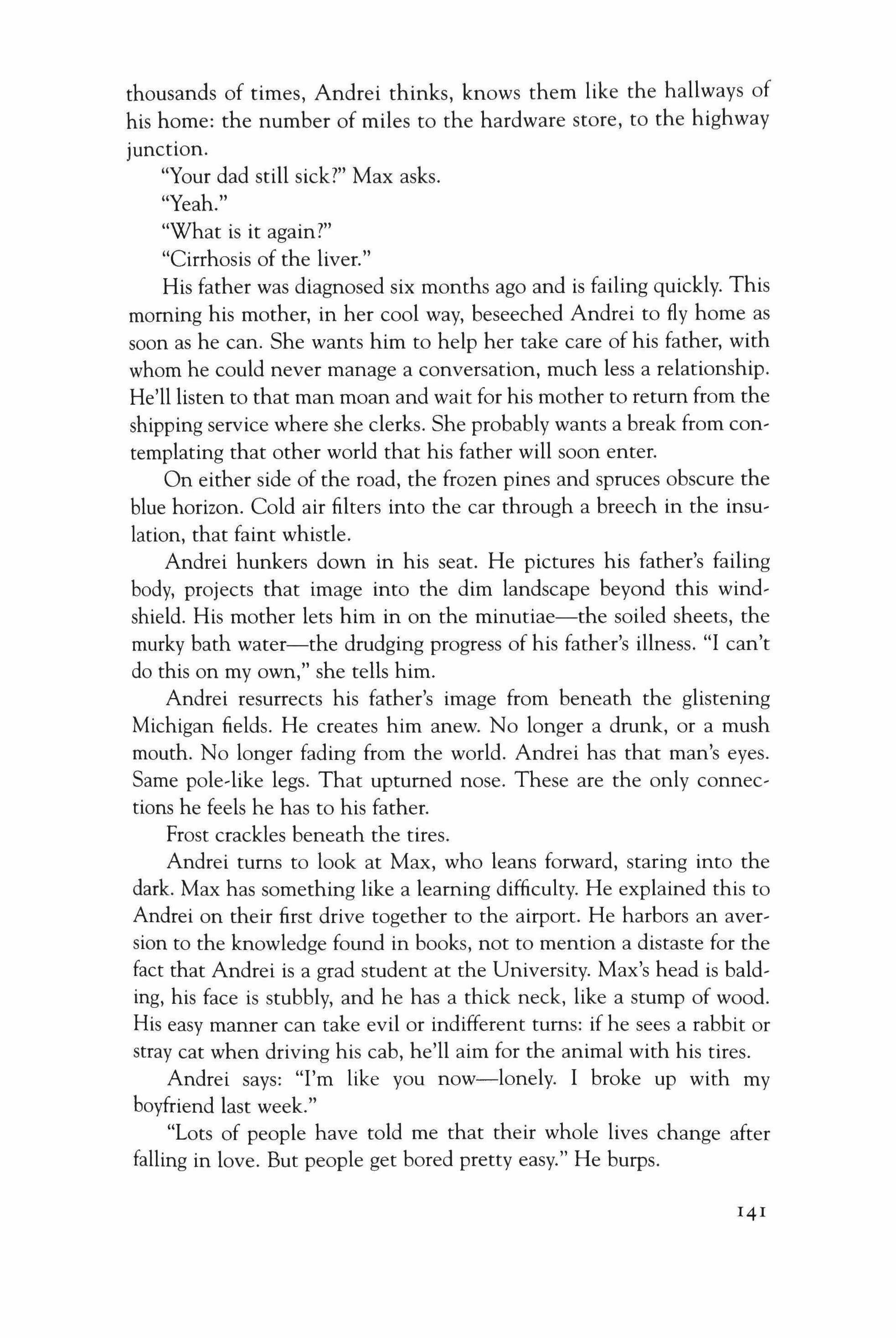
thousands of times, Andrei thinks, knows them like the hallways of his home: the number of miles to the hardware store, to the highway junction.
"Your dad still sick?" Max asks.
"Yeah."
"What is it again?"
"Cirrhosis of the liver."
His father was diagnosed six months ago and is failing quickly. This morning his mother, in her cool way, beseeched Andrei to fly home as soon as he can. She wants him to help her take care of his father, with whom he could never manage a conversation, much less a relationship. He'll listen to that man moan and wait for his mother to return from the shipping service where she clerks. She probably wants a break from contemplating that other world that his father will soon enter.
On either side of the road, the frozen pines and spruces obscure the blue horizon. Cold air filters into the car through a breech in the insulation, that faint whistle.
Andrei hunkers down in his seat. He pictures his father's failing body, projects that image into the dim landscape beyond this windshield. His mother lets him in on the minutiae-the soiled sheets, the murky bath water-the drudging progress of his father's illness. "I can't do this on my own," she tells him.
Andrei resurrects his father's image from beneath the glistening Michigan fields. He creates him anew. No longer a drunk, or a mush mouth. No longer fading from the world. Andrei has that man's eyes. Same pole-like legs. That upturned nose. These are the only connections he feels he has to his father.
Frost crackles beneath the tires.
Andrei turns to look at Max, who leans forward, staring into the dark. Max has something like a learning difficulty. He explained this to Andrei on their first drive together to the airport. He harbors an aversion to the knowledge found in books, not to mention a distaste for the fact that Andrei is a grad student at the University. Max's head is balding, his face is stubbly, and he has a thick neck, like a stump of wood. His easy manner can take evil or indifferent turns: if he sees a rabbit or stray cat when driving his cab, he'll aim for the animal with his tires.
Andrei says: "I'm like you now-lonely. I broke up with my boyfriend last week."
"Lots of people have told me that their whole lives change after falling in love. But people get bored pretty easy." He burps.
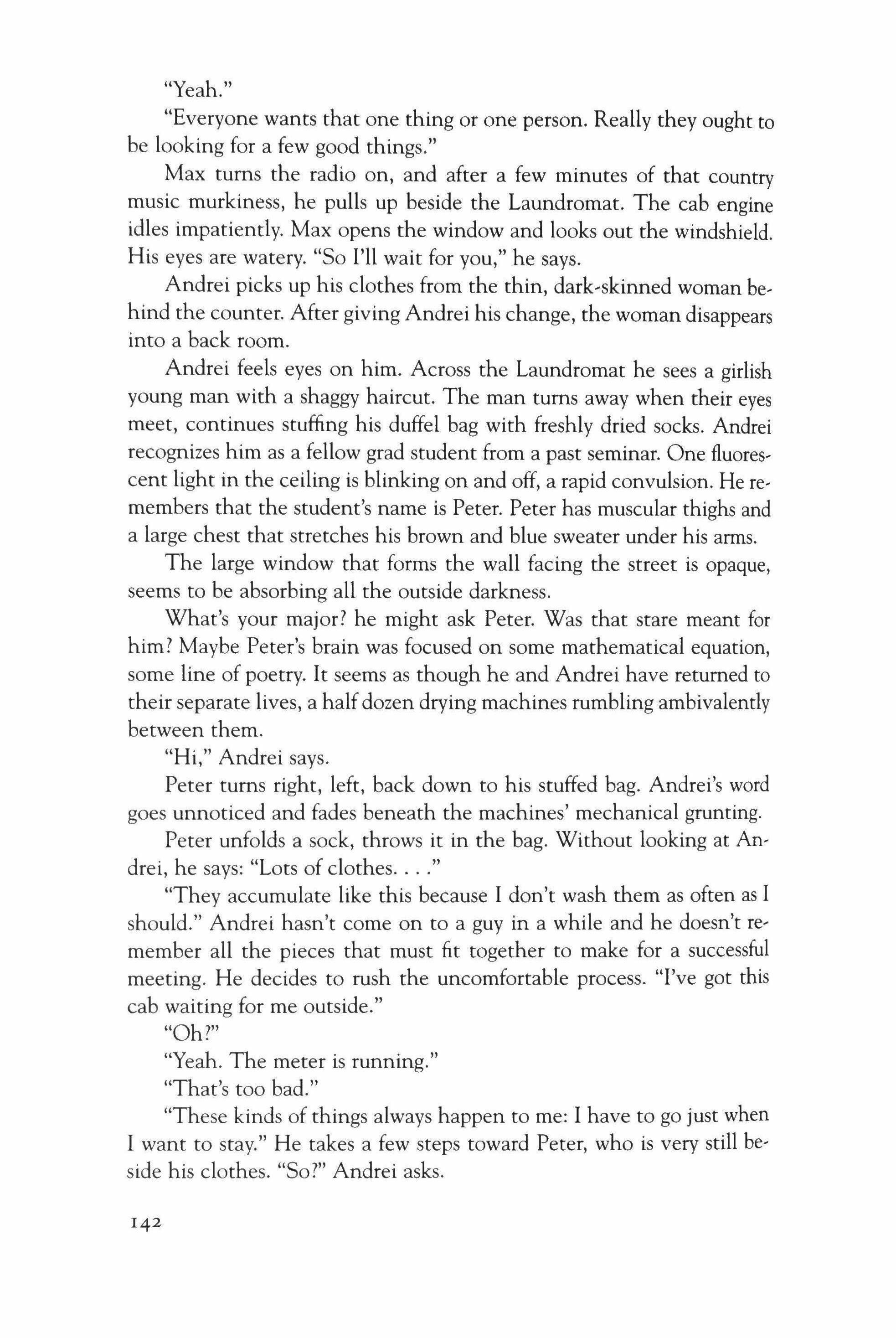
"Yeah."
"Everyone wants that one thing or one person. Really they ought to be looking for a few good things."
Max turns the radio on, and after a few minutes of that country music murkiness, he pulls up beside the Laundromat. The cab engine idles impatiently. Max opens the window and looks out the windshield. His eyes are watery. "So I'll wait for you," he says.
Andrei picks up his clothes from the thin, dark-skinned woman behind the counter. After giving Andrei his change, the woman disappears into a back room.
Andrei feels eyes on him. Across the Laundromat he sees a girlish young man with a shaggy haircut. The man turns away when their eyes meet, continues stuffing his duffel bag with freshly dried socks. Andrei recognizes him as a fellow grad student from a past seminar. One fluorescent light in the ceiling is blinking on and off, a rapid convulsion. He remembers that the student's name is Peter. Peter has muscular thighs and a large chest that stretches his brown and blue sweater under his arms.
The large window that forms the wall facing the street is opaque, seems to be absorbing all the outside darkness.
What's your major? he might ask Peter. Was that stare meant for him? Maybe Peter's brain was focused on some mathematical equation, some line of poetry. It seems as though he and Andrei have returned to their separate lives, a halfdozen drying machines rumbling ambivalently between them.
"Hi," Andrei says.
Peter turns right, left, back down to his stuffed bag. Andrei's word goes unnoticed and fades beneath the machines' mechanical grunting.
Peter unfolds a sock, throws it in the bag. Without looking at Andrei, he says: "Lots of clothes
"They accumulate like this because I don't wash them as often as I should." Andrei hasn't come on to a guy in a while and he doesn't remember all the pieces that must fit together to make for a successful meeting. He decides to rush the uncomfortable process. "I've got this cab waiting for me outside."
"Oh?"
"Yeah. The meter is running."
"That's too bad."
"These kinds of things always happen to me: I have to go just when I want to stay." He takes a few steps toward Peter, who is very still beside his clothes. "So?" Andrei asks.
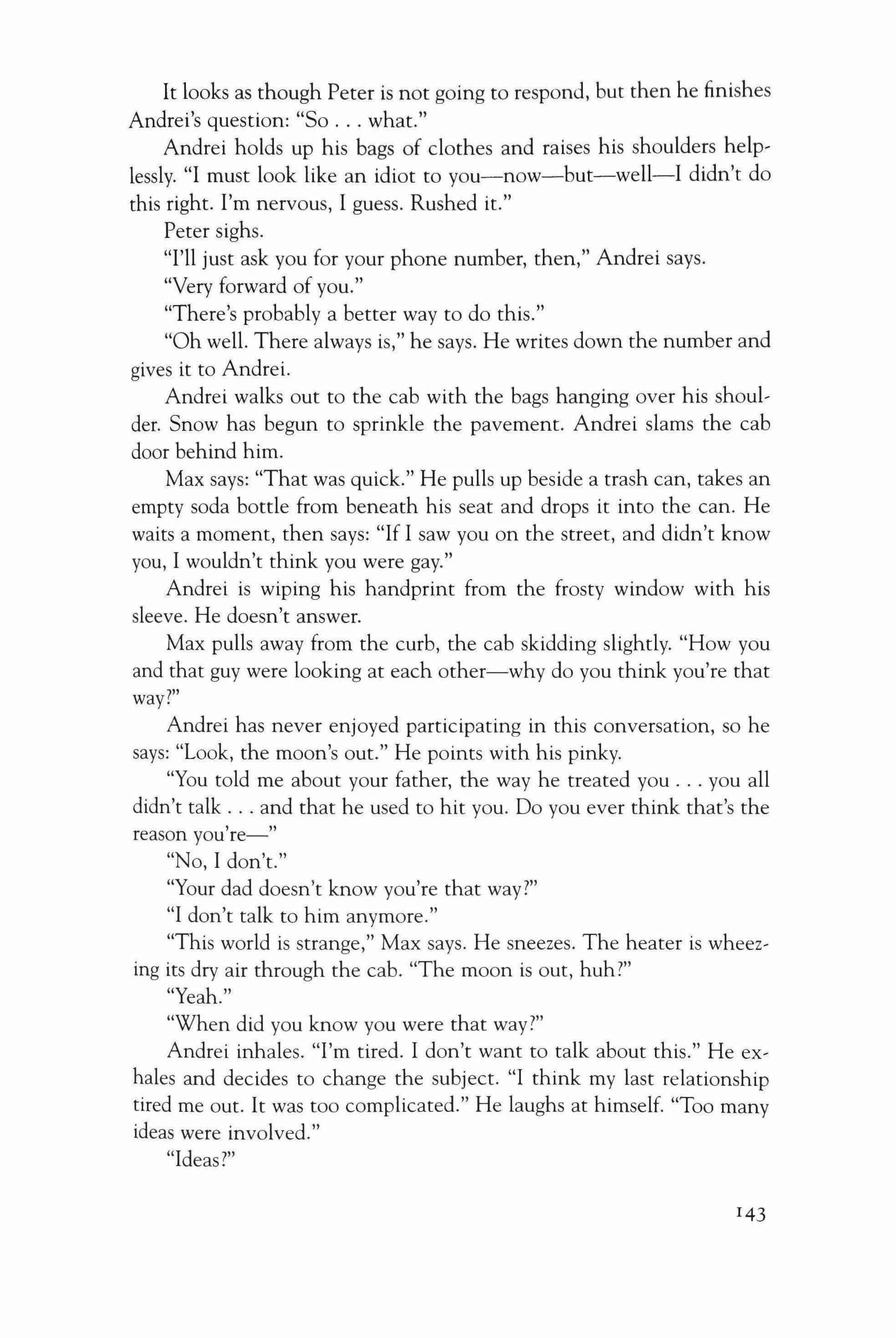
It looks as though Peter is not going to respond, but then he finishes Andrei's question: "So what."
Andrei holds up his bags of clothes and raises his shoulders help, lessly. "I must look like an idiot to you-now-but-well-I didn't do this right. I'm nervous, I guess. Rushed it."
Peter sighs.
"I'll just ask you for your phone number, then," Andrei says.
"Very forward of you."
"There's probably a better way to do this."
"Oh well. There always is," he says. He writes down the number and gives it to Andrei.
Andrei walks out to the cab with the bags hanging over his shoulder. Snow has begun to sprinkle the pavement. Andrei slams the cab door behind him.
Max says: "That was quick." He pulls up beside a trash can, takes an empty soda bottle from beneath his seat and drops it into the can. He waits a moment, then says: "If I saw you on the street, and didn't know you, I wouldn't think you were gay."
Andrei is wiping his handprint from the frosty window with his sleeve. He doesn't answer.
Max pulls away from the curb, the cab skidding slightly. "How you and that guy were looking at each other-why do you think you're that way?"
Andrei has never enjoyed participating in this conversation, so he says: "Look, the moon's out." He points with his pinky.
"You told me about your father, the way he treated you you all didn't talk and that he used to hit you. Do you ever think that's the reason you're-"
"No, I don't."
"Your dad doesn't know you're that way?"
"I don't talk to him anymore."
"This world is strange," Max says. He sneezes. The heater is wheezing its dry air through the cab. "The moon is out, huh?"
"Yeah."
"When did you know you were that way?"
Andrei inhales. "I'm tired. I don't want to talk about this." He ex, hales and decides to change the subject. "I think my last relationship tired me out. It was too complicated." He laughs at himself. "Too many ideas were involved."
"Ideas?"
143
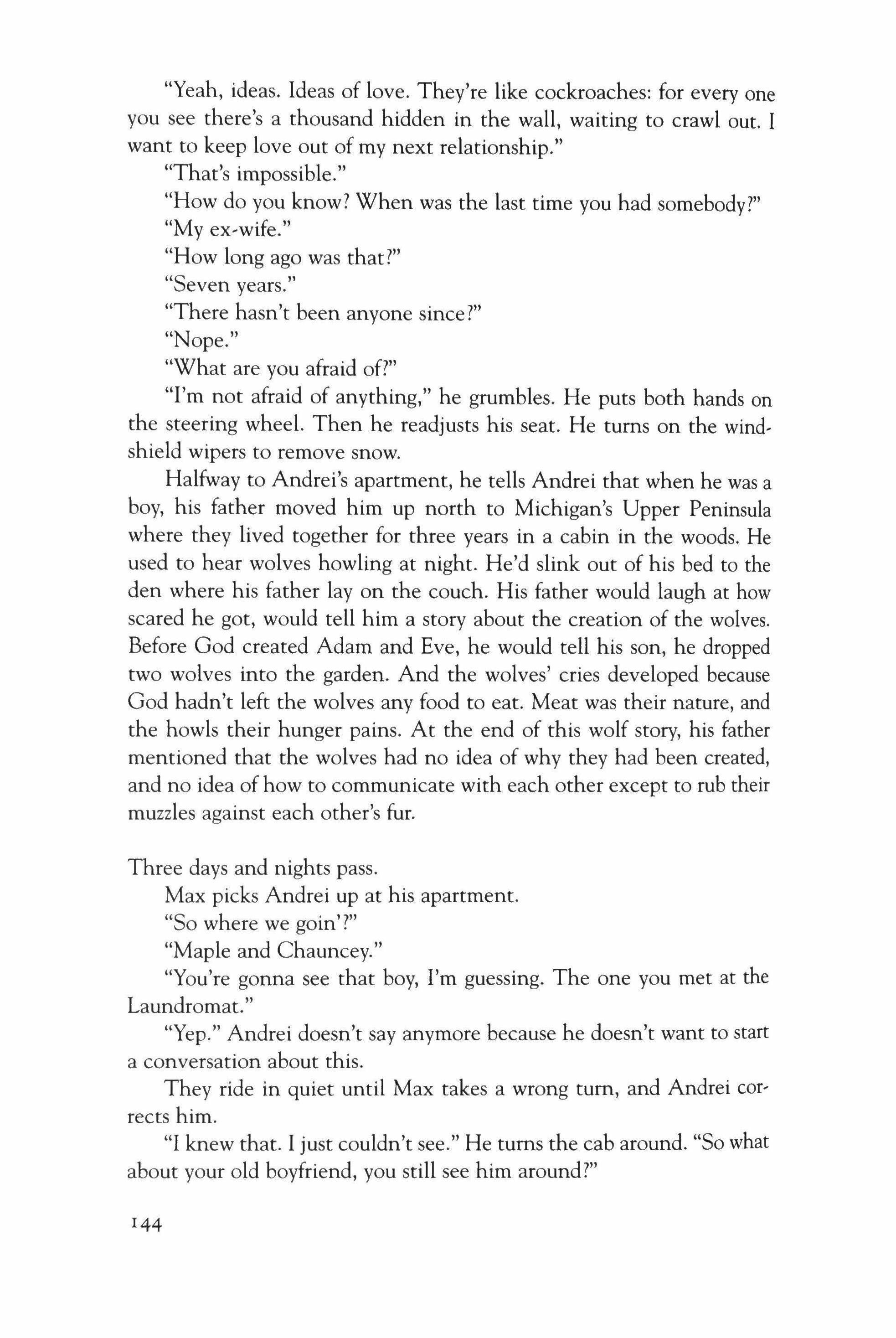
"Yeah, ideas. Ideas of love. They're like cockroaches: for every one you see there's a thousand hidden in the wall, waiting to crawl out. I want to keep love out of my next relationship."
"That's impossible."
"How do you know? When was the last time you had somebody?"
"My ex-wife."
"How long ago was that?"
"Seven years."
"There hasn't been anyone since?"
"Nope."
"What are you afraid of?"
"I'm not afraid of anything," he grumbles. He puts both hands on the steering wheel. Then he readjusts his seat. He turns on the windshield wipers to remove snow.
Halfway to Andrei's apartment, he tells Andrei that when he was a boy, his father moved him up north to Michigan's Upper Peninsula where they lived together for three years in a cabin in the woods. He used to hear wolves howling at night. He'd slink out of his bed to the den where his father lay on the couch. His father would laugh at how scared he got, would tell him a story about the creation of the wolves. Before God created Adam and Eve, he would tell his son, he dropped two wolves into the garden. And the wolves' cries developed because God hadn't left the wolves any food to eat. Meat was their nature, and the howls their hunger pains. At the end of this wolf story, his father mentioned that the wolves had no idea of why they had been created, and no idea of how to communicate with each other except to rub their muzzles against each other's fur.
Three days and nights pass.
Max picks Andrei up at his apartment.
"So where we goin'?"
"Maple and Chauncey."
"You're gonna see that boy, I'm guessing. The one you met at the Laundromat."
"Yep." Andrei doesn't say anymore because he doesn't want to start a conversation about this.
They ride in quiet until Max takes a wrong tum, and Andrei corrects him.
"I knew that. I just couldn't see." He turns the cab around. "So what about your old boyfriend, you still see him around?"
144
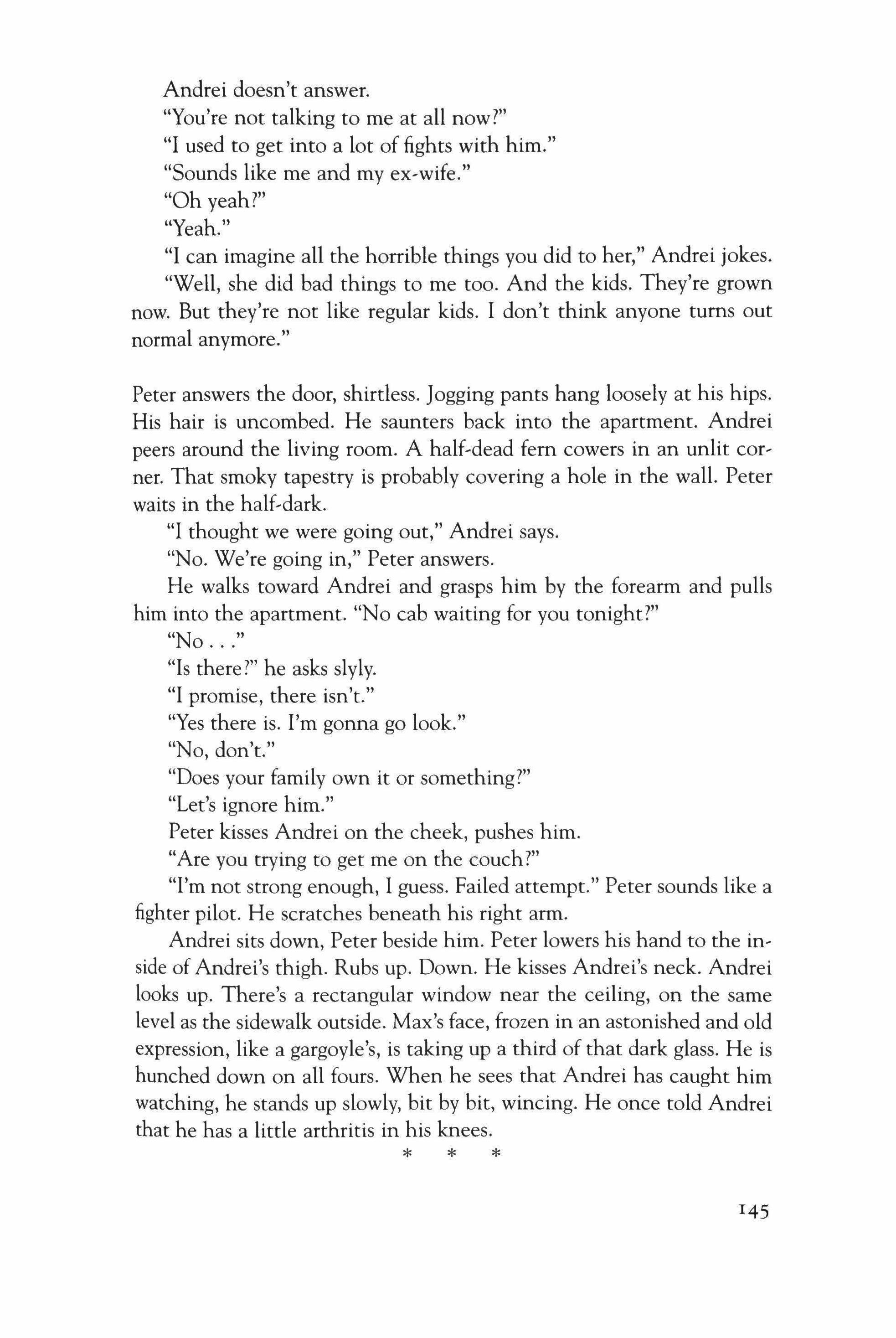
Andrei doesn't answer.
"You're not talking to me at all now?"
"I used to get into a lot of fights with him."
"Sounds like me and my ex-wife."
"Oh yeah?"
"Yeah."
"I can imagine all the horrible things you did to her," Andrei jokes. "Well, she did bad things to me too. And the kids. They're grown now. But they're not like regular kids. I don't think anyone turns out normal anymore."
Peter answers the door, shirtless. Jogging pants hang loosely at his hips. His hair is uncombed. He saunters back into the apartment. Andrei peers around the living room. A half-dead fern cowers in an unlit cor' nero That smoky tapestry is probably covering a hole in the wall. Peter waits in the half,dark.
"I thought we were going out," Andrei says.
"No. We're going in," Peter answers.
He walks toward Andrei and grasps him by the forearm and pulls him into the apartment. "No cab waiting for you tonight?"
"No
"Is there?" he asks slyly.
"I promise, there isn't."
"Yes there is. I'm gonna go look."
"No, don't."
"Does your family own it or something?"
"Let's ignore him."
Peter kisses Andrei on the cheek, pushes him.
"Are you trying to get me on the couch?"
"I'm not strong enough, I guess. Failed attempt." Peter sounds like a fighter pilot. He scratches beneath his right arm.
Andrei sits down, Peter beside him. Peter lowers his hand to the in, side of Andrei's thigh. Rubs up. Down. He kisses Andrei's neck. Andrei looks up. There's a rectangular window near the ceiling, on the same level as the sidewalk outside. Max's face, frozen in an astonished and old expression, like a gargoyle's, is taking up a third of that dark glass. He is hunched down on all fours. When he sees that Andrei has caught him watching, he stands up slowly, bit by bit, wincing. He once told Andrei that he has a little arthritis in his knees.
*
145
* *
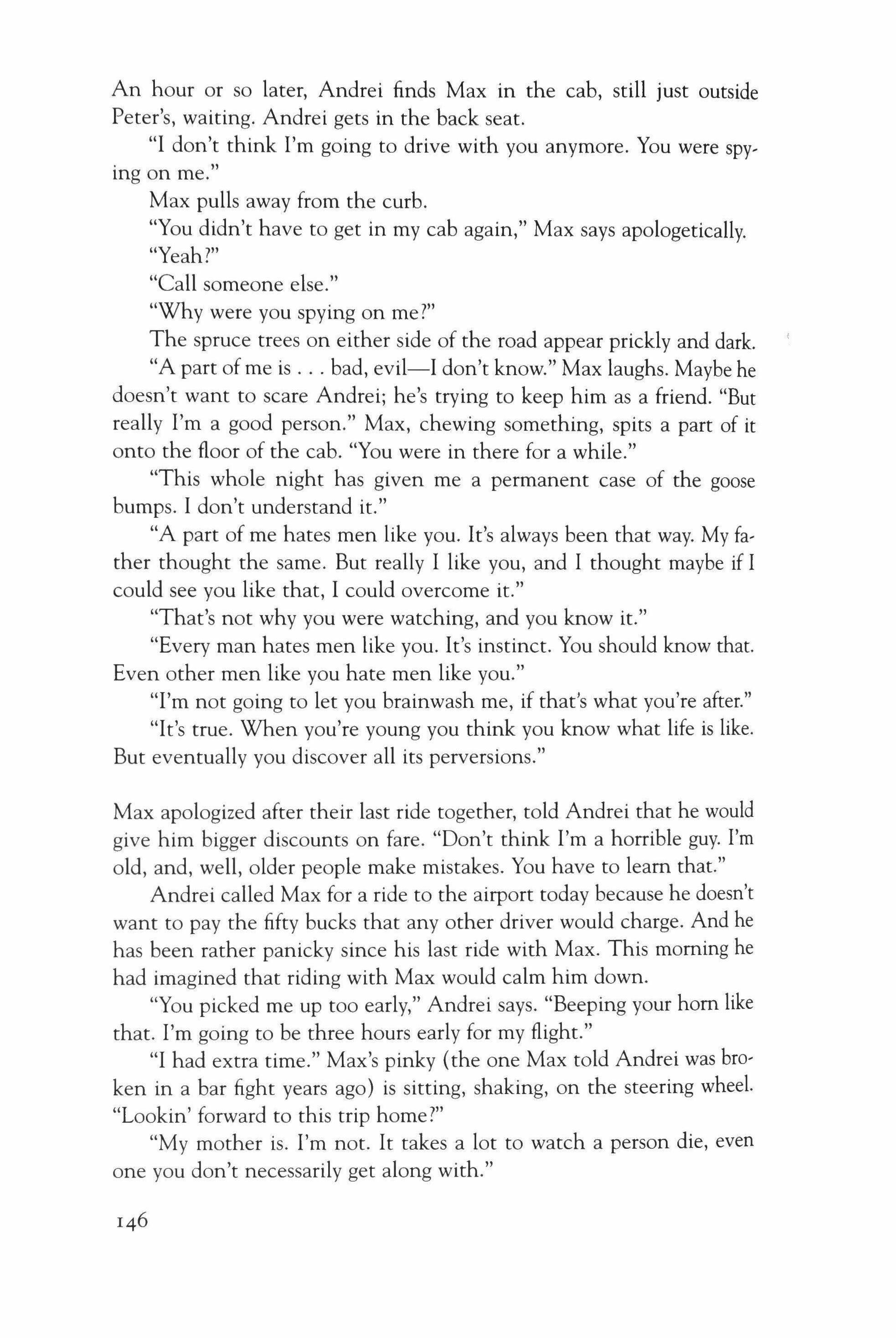
An hour or so later, Andrei finds Max in the cab, still just outside Peter's, waiting. Andrei gets in the back seat.
"I don't think I'm going to drive with you anymore. You were spying on me."
Max pulls away from the curb.
"You didn't have to get in my cab again," Max says apologetically. "Yeah?"
"Call someone else."
"Why were you spying on me?"
The spruce trees on either side of the road appear prickly and dark.
"A part of me is bad, evil-I don't know." Max laughs. Maybe he doesn't want to scare Andrei; he's trying to keep him as a friend. "But really I'm a good person." Max, chewing something, spits a part of it onto the floor of the cab. "You were in there for a while."
"This whole night has given me a permanent case of the goose bumps. I don't understand it."
"A part of me hates men like you. It's always been that way. My father thought the same. But really I like you, and I thought maybe if I could see you like that, I could overcome it."
"That's not why you were watching, and you know it."
"Every man hates men like you. It's instinct. You should know that. Even other men like you hate men like you."
"I'm not going to let you brainwash me, if that's what you're after."
"It's true. When you're young you think you know what life is like. But eventually you discover all its perversions."
Max apologized after their last ride together, told Andrei that he would give him bigger discounts on fare. "Don't think I'm a horrible guy. I'm old, and, well, older people make mistakes. You have to learn that."
Andrei called Max for a ride to the airport today because he doesn't want to pay the fifty bucks that any other driver would charge. And he has been rather panicky since his last ride with Max. This morning he had imagined that riding with Max would calm him down.
"You picked me up too early," Andrei says. "Beeping your hom like that. I'm going to be three hours early for my flight."
"I had extra time." Max's pinky (the one Max told Andrei was broken in a bar fight years ago) is sitting, shaking, on the steering wheel. "Lookin' forward to this trip home?"
"My mother is. I'm not. It takes a lot to watch a person die, even one you don't necessarily get along with."
146
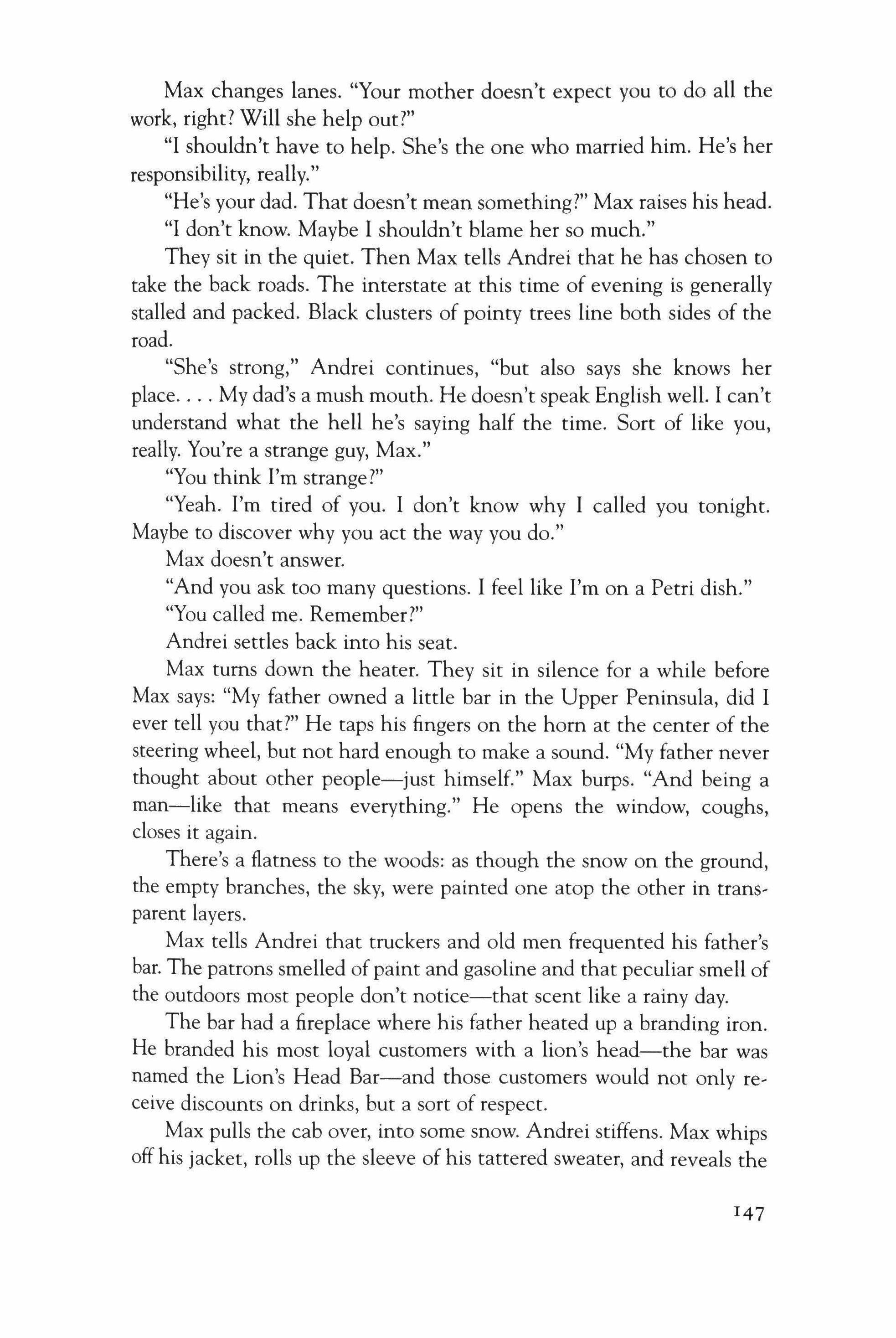
Max changes lanes. "Your mother doesn't expect you to do all the work, right? Will she help out?"
"I shouldn't have to help. She's the one who married him. He's her responsibility, really."
"He's your dad. That doesn't mean something?" Max raises his head.
"I don't know. Maybe I shouldn't blame her so much."
They sit in the quiet. Then Max tells Andrei that he has chosen to take the back roads. The interstate at this time of evening is generally stalled and packed. Black clusters of pointy trees line both sides of the road.
"She's strong," Andrei continues, "but also says she knows her place My dad's a mush mouth. He doesn't speak English well. I can't understand what the hell he's saying half the time. Sort of like you, really. You're a strange guy, Max."
"You think I'm strange?"
"Yeah. I'm tired of you. I don't know why I called you tonight. Maybe to discover why you act the way you do."
Max doesn't answer.
"And you ask too many questions. I feel like I'm on a Petri dish."
"You called me. Remember?"
Andrei settles back into his seat.
Max turns down the heater. They sit in silence for a while before Max says: "My father owned a little bar in the Upper Peninsula, did I ever tell you that?" He taps his fingers on the hom at the center of the steering wheel, but not hard enough to make a sound. "My father never thought about other people-just himself." Max burps. "And being a man-like that means everything." He opens the window, coughs, closes it again.
There's a flatness to the woods: as though the snow on the ground, the empty branches, the sky, were painted one atop the other in transparent layers.
Max tells Andrei that truckers and old men frequented his father's bar. The patrons smelled of paint and gasoline and that peculiar smell of the outdoors most people don't notice-that scent like a rainy day.
The bar had a fireplace where his father heated up a branding iron. He branded his most loyal customers with a lion's head-the bar was named the Lion's Head Bar-and those customers would not only receive discounts on drinks, but a sort of respect.
Max pulls the cab over, into some snow. Andrei stiffens. Max whips off his jacket, rolls up the sleeve of his tattered sweater, and reveals the

scar, a mushy lion's head, on his right shoulder. Snow is drifting from the violet sky. Max is crying, but in that wayan angry man cries-hard, stilted, and stuttering. Turns out he was branded by his father when he was twelve years old. Three of his father's friends had held him down, one with his hand over Max's mouth to keep him from screaming. Max's skin sizzled like an egg on a skillet when the hot metal was applied to his shoulder. Max says: "And I want to be around you more, Andrei.
Open you up. See your insides. Know you better." He puts his hand on Andrei's thigh.
"I'm not the right guy for you, Max."
"What?"
"I'm not the person to love you."
"Oh," he says. "Shit." He removes his hand and puts it on the steering wheel. He sighs. He won't look at Andrei. A strong wind hits the cab. Something squeals in the woods. Andrei rolls down his window because he feels hot. Max steps on the gas, revs the engine, but the rear tires only spin in the snow. The cab lurches forward, halts with a stuttering grunt, and rolls back a foot into deeper snow. "Oh, hell," Max says. He slaps the steering wheel and gets out, steps around behind the car, and pushes the rear bumper with his body, pelvis up against the trunk. The cab inches back and forth, but slides back into its rut. He enters the car again, sits, huffs. "Now what. Damn it."
Another screech in the woods.
Andrei is going to miss his flight. He tells himself that he didn't want to go home anyway. He looks over at Max and feels sorry for him. Max's droopy, ugly face. Andrei says: "I told you that my father used to hit me? Well, I would scream during it. Even though I told myself not to scream."
Max opens his mouth. Maybe he wants to discuss Andrei's memory, but then he closes it again.
Andrei says: "I'm going to call for a tow truck."
The tow truck guy-big and burly and alone-would probably belch and roar like a bear if he were an animal.
Max got out of the cab as soon as the tow truck arrived. Now he's sitting on that log. Max, if he were an animal, would be a rabbit, Andrei thinks. Cowering now before the tow truck guy. How did he get to be so afraid of the world?
The bear hitches the cab to his truck. Andrei doesn't feel cold. Max is still sitting ten feet away, rubbing his arms.

"She's ready," the tow truck guy says. Max doesn't look either Andrei or the tow truck guy in the eye. His shoulders are rolled forward. Andrei has to squash himself beside Max in the front seat of the tow truck. Each is rubbing his hands before the heaters.
Max is looking at the tow truck guy and then turns away. Andrei looks at the tow truck guy too. Is he looking at Max and Andrei in a peculiar way? What does he think Andrei and Max are? Now he is looking at Andrei with those bloodshot eyes. "So what are you gentlemen doing out here by yourselves?" he asks. He is smirking, as ifthe tow truck gives him some sort of mastery over nature that Andrei and Max could never have.
Andrei looks to Max, who picks his face up and turns it to the window. The tow truck guy starts the truck. He pulls out slowly, the truck creaking. Andrei wants to say something, but doesn't know what to say. He doesn't know this man, after all.
"I mean, these roads are awful this time of year," the tow truck guy says. He smiles.
Andrei thinks he had this guy pegged all wrong. He's being friendly. So Andrei smiles back. Then he looks out at the long, snowy road ahead of them. "Lucky you found us out here."
149
Celeste Ng
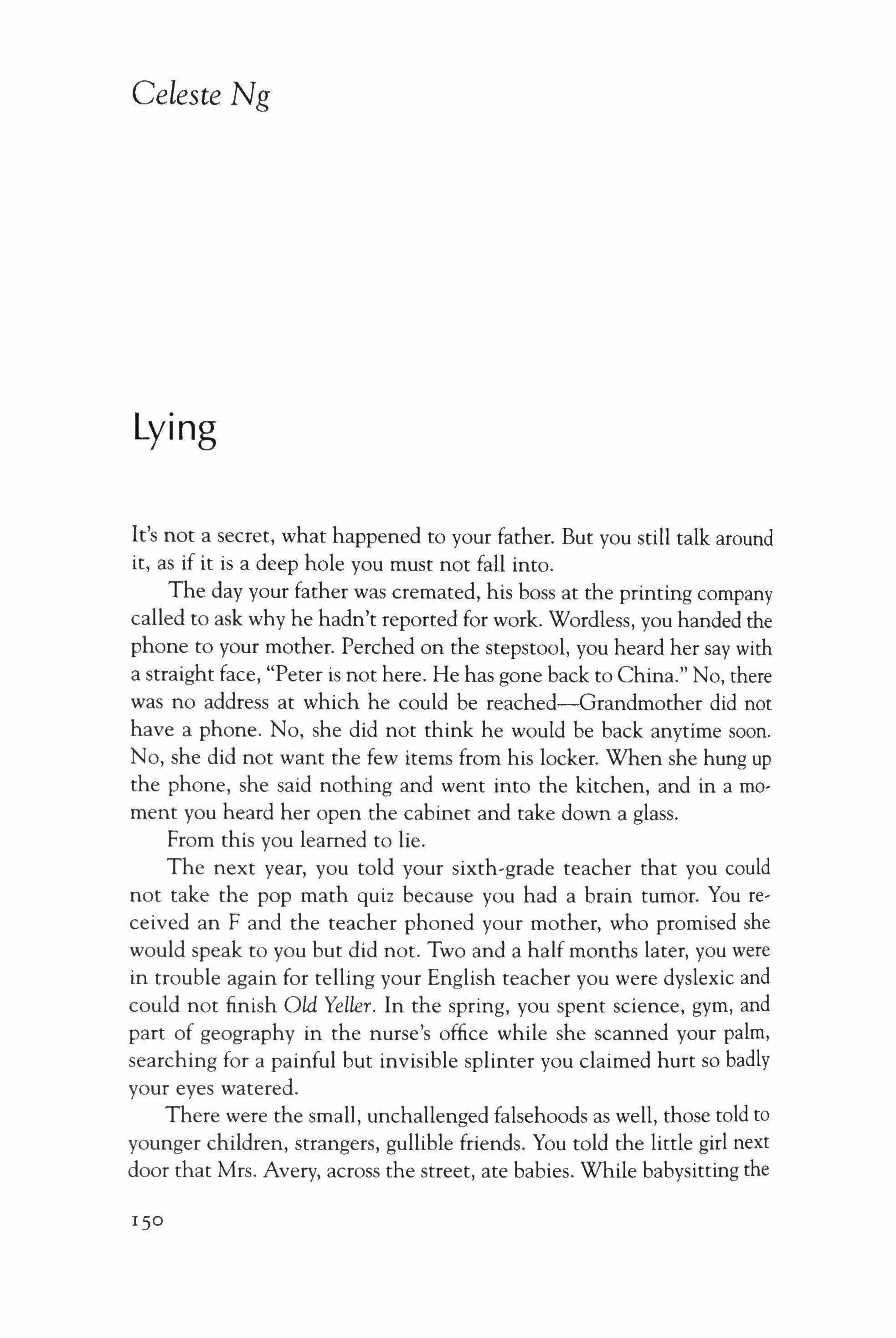
Lying
It's not a secret, what happened to your father. But you still talk around it, as if it is a deep hole you must not fall into.
The day your father was cremated, his boss at the printing company called to ask why he hadn't reported for work. Wordless, you handed the phone to your mother. Perched on the stepstool, you heard her say with a straight face, "Peter is not here. He has gone back to China." No, there was no address at which he could be reached-Grandmother did not have a phone. No, she did not think he would be back anytime soon. No, she did not want the few items from his locker. When she hung up the phone, she said nothing and went into the kitchen, and in a moment you heard her open the cabinet and take down a glass.
From this you learned to lie.
The next year, you told your sixth-grade teacher that you could not take the pop math quiz because you had a brain tumor. You received an F and the teacher phoned your mother, who promised she would speak to you but did not. Two and a half months later, you were in trouble again for telling your English teacher you were dyslexic and could not finish Old Yeller. In the spring, you spent science, gym, and part of geography in the nurse's office while she scanned your palm, searching for a painful but invisible splinter you claimed hurt so badly your eyes watered.
There were the small, unchallenged falsehoods as well, those told to younger children, strangers, gullible friends. You told the little girl next door that Mrs. Avery, across the street, ate babies. While babysitting the

Carlson twins one evening, you lectured that science had proven the existence of vampires, that drinking ink would tum your eyes blue, that men had never really landed on the moon. Ironically, what lost you your job was not fiction but truth: you explained the ancient purpose of a wake, how relatives gathered to hover over the body, watching for trernbling lips and twitching fingers. Burials, you explained, involved a bell on the coffin, a string running down to the dead man's hand. All night a watcher sat on the freshly turned earth with a shovel, listening for the telltale jingle that meant the dead man was buried alive.
That night, the twins asked to sleep in the same bed, and every time you checked on them, their eyes were open, staring at the shadows of the dresser and the rocking chair. The next morning, Mrs. Carlson called to say they would not be needing you to babysit anymore.
In China your father worked at a cloisonne factory. Tourists would arrive each morning and each afternoon in white vans, wearing floppybrimmed hats and carrying paper fans. Standing in lines, whispering to each other in English, they watched the women in the workroom twist copper strips into flowers on the surfaces of copper vases. They fanned themselves as the women filled the designs with colored mineral pastes: uranium for yellow, chromium for green, bronze for blue. Then they came into the back room, where the kilns were, and watched the men push the vases into the fiery heat. Your father's job was to pull the finished items from the kiln. When he held them up, the paste newly fused into shiny jewels of enamel, the visitors always applauded.
During tour group visits the workers were not allowed to speak. The women stopped gossiping and tucked their feet under the workbenches. The men had to put out their cigarettes and refrain from spitting. As your father stood at attention beside the kiln, he kept his eyes trained on the visitors, their blue jeans and white tennis shoes, while their eyes rested on the newly fired vase in his hands. Then the group went into the front of the factory, where dozens of identical vases were for sale, and he would set the vase down and blow jewel-colored snot into his handkerchief.
After the vans pulled away, your father would mouth the words he'd heard again and again. Gor�geous. Ex-ouisue. They rolled off his tongue like marbles. When the others took their containers of noodles outside for lunch he would lag behind, and in the silence of the empty factory he would test the words out loud. The rhythm of them made the back of his head tingle, the way his lips stretched and curved to fit their
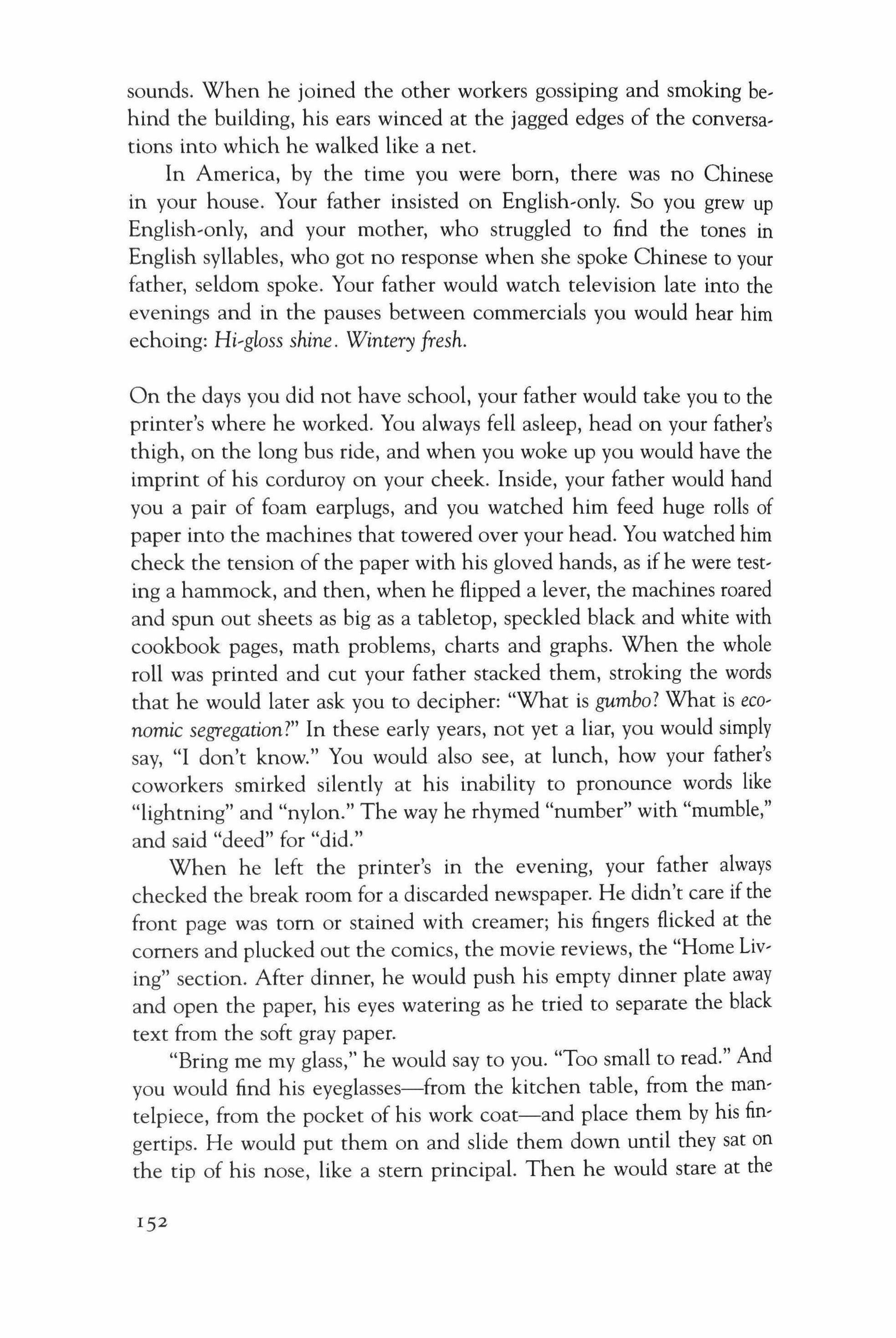
sounds. When he joined the other workers gossiping and smoking behind the building, his ears winced at the jagged edges of the conversations into which he walked like a net.
In America, by the time you were born, there was no Chinese in your house. Your father insisted on English-only. So you grew up English-only, and your mother, who struggled to find the tones in English syllables, who got no response when she spoke Chinese to your father, seldom spoke. Your father would watch television late into the evenings and in the pauses between commercials you would hear him echoing: Hi-gloss shine. Wintery fresh.
On the days you did not have school, your father would take you to the printer's where he worked. You always fell asleep, head on your father's thigh, on the long bus ride, and when you woke up you would have the imprint of his corduroy on your cheek. Inside, your father would hand you a pair of foam earplugs, and you watched him feed huge rolls of paper into the machines that towered over your head. You watched him check the tension of the paper with his gloved hands, as if he were testing a hammock, and then, when he flipped a lever, the machines roared and spun out sheets as big as a tabletop, speckled black and white with cookbook pages, math problems, charts and graphs. When the whole roll was printed and cut your father stacked them, stroking the words that he would later ask you to decipher: "What is gumbo? What is economic segregation?" In these early years, not yet a liar, you would simply say, "1 don't know." You would also see, at lunch, how your father's coworkers smirked silently at his inability to pronounce words like "lightning" and "nylon." The way he rhymed "number" with "mumble," and said "deed" for "did."
When he left the printer's in the evening, your father always checked the break room for a discarded newspaper. He didn't care if the front page was torn or stained with creamer; his fingers flicked at the comers and plucked out the comics, the movie reviews, the "Home Living" section. After dinner, he would push his empty dinner plate away and open the paper, his eyes watering as he tried to separate the black text from the soft gray paper.
"Bring me my glass," he would say to you. "Too small to read." And you would find his eyeglasses-from the kitchen table, from the mantelpiece, from the pocket of his work coat-and place them by his fingertips. He would put them on and slide them down until they sat on the tip of his nose, like a stem principal. Then he would stare at the

newspaper for the rest of the evening, hours passing before he would turn a page.
When friends ask how your father died, you afflict him with a host of diseases. For Katie Craig, his appendix burst while he sat at the dinner table. For Megan Curran, he was hit by a truck while changing a tire on the side of the highway. For Liz Blair, he was bitten by a poisonous spider that turned his skin purple as he died. Your friends, who come and go in quick succession, do not know each other and never compare stories.
As you get older, you become more practiced. You are almost sixteen and you lie the way a cat stretches: effortlessly, supplely. That you stole a six-pack from the corner store. That you had dropped ecstasy and stayed out all night with a boy. And later on, that you had not.
You noticed the magazines first. Your father had always collected things-stamps, old pennies, blue pencils. This was different. He began by collecting magazines, all kinds. Your parents subscribed to none but he salvaged them from library "Free" shelves, doctor's offices, neighbors' rubbish cans: People, Reader's Digest, Cosmopolitan, full of makeup tips and blase runway models. By the time you were nine he had hundreds, hoarded in plastic grocery bags with smiley faces and thank-yon's on the sides. Then came the paranoia. Sometimes against your mother, begging you to conspire: "Keep her out. She's trying to burn my magazines." And sometimes against you: "Stay away. I know what you're after." He stacked them in the desk drawer and kept the key in his pocket when you and your mother were home.
When you were ten the cutting began. First articles that interested him. Leafing through the clippings while he slept, you could find no common theme: tutorials on applying eyeliner, columns on Michael [ordan's latest record, a recipe for pizza. Six months later he cut only words: Coca-cola, marshmallow, Manhattan. Soon he simplified to just one: and. Arriving home from school one day, you found him at the dining room table, scissors in hand.
"Help me," he begged, and wordlessly you sat on the cushionless chair. Together you snipped ands until your mother came home from her job at the hotel. When she entered your father swept every clipping into a shoebox, while your mother went into the kitchen and poured a drink.
Some days were better. Your father would rise early, go to work whistling, come home with a candy bar for you. He would eat dinner
153
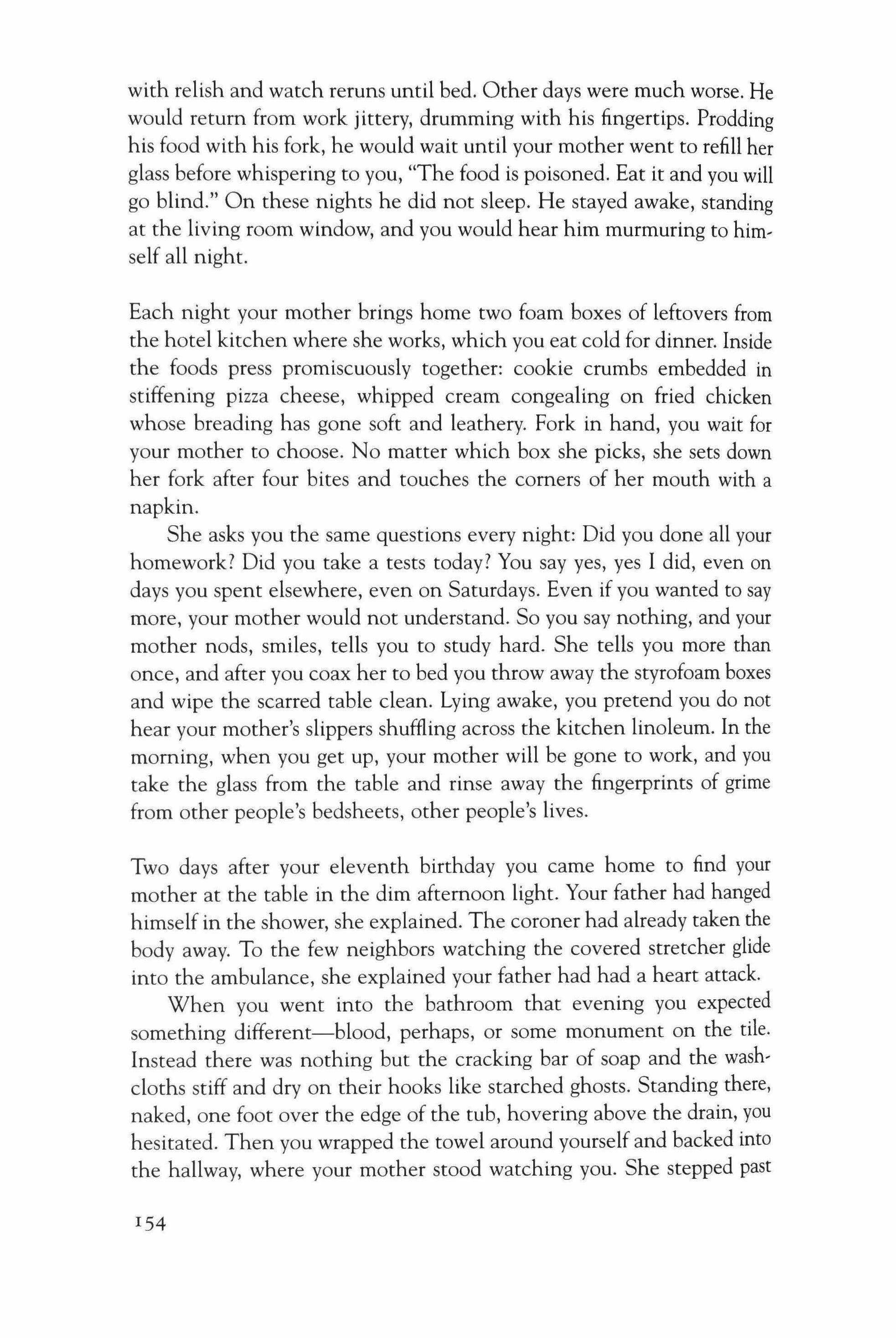
with relish and watch reruns until bed. Other days were much worse. He would return from work jittery, drumming with his fingertips. Prodding his food with his fork, he would wait until your mother went to refill her glass before whispering to you, "The food is poisoned. Eat it and you will go blind." On these nights he did not sleep. He stayed awake, standing at the living room window, and you would hear him murmuring to himself all night.
Each night your mother brings home two foam boxes of leftovers from the hotel kitchen where she works, which you eat cold for dinner. Inside the foods press promiscuously together: cookie crumbs embedded in stiffening pizza cheese, whipped cream congealing on fried chicken whose breading has gone soft and leathery. Fork in hand, you wait for your mother to choose. No matter which box she picks, she sets down her fork after four bites and touches the corners of her mouth with a napkin.
She asks you the same questions every night: Did you done all your homework? Did you take a tests today? You say yes, yes I did, even on days you spent elsewhere, even on Saturdays. Even if you wanted to say more, your mother would not understand. So you say nothing, and your mother nods, smiles, tells you to study hard. She tells you more than once, and after you coax her to bed you throwaway the styrofoam boxes and wipe the scarred table clean. Lying awake, you pretend you do not hear your mother's slippers shuffling across the kitchen linoleum. In the morning, when you get up, your mother will be gone to work, and you take the glass from the table and rinse away the fingerprints of grime from other people's bedsheets, other people's lives.
Two days after your eleventh birthday you came home to find your mother at the table in the dim afternoon light. Your father had hanged himself in the shower, she explained. The coroner had already taken the body away. To the few neighbors watching the covered stretcher glide into the ambulance, she explained your father had had a heart attack. When you went into the bathroom that evening you expected something different-blood, perhaps, or some monument on the tile. Instead there was nothing but the cracking bar of soap and the washcloths stiff and dry on their hooks like starched ghosts. Standing there, naked, one foot over the edge of the tub, hovering above the drain, you hesitated. Then you wrapped the towel around yourself and backed into the hallway, where your mother stood watching you. She stepped past
154
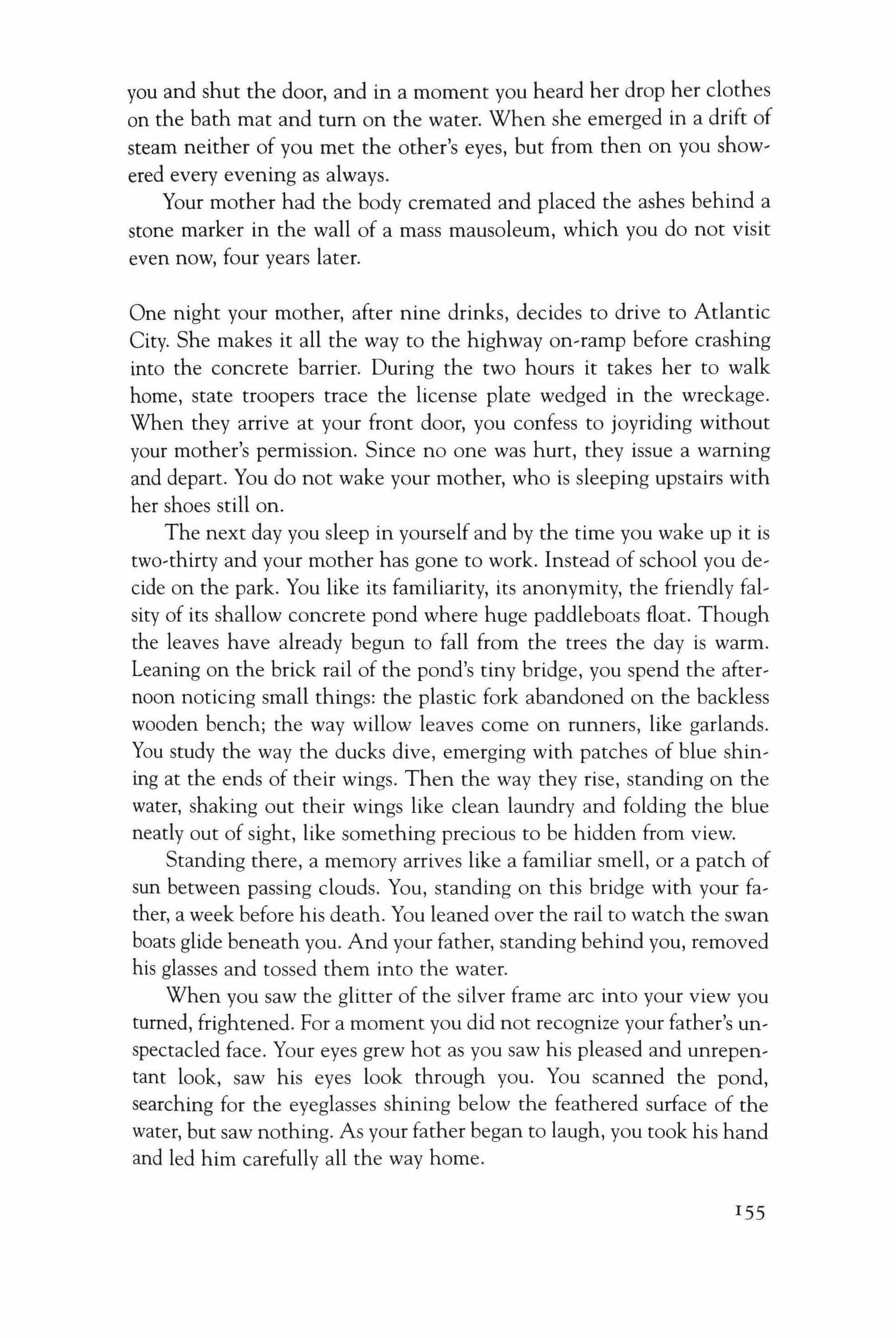
you and shut the door, and in a moment you heard her drop her clothes on the bath mat and tum on the water. When she emerged in a drift of steam neither of you met the other's eyes, but from then on you show, ered every evening as always.
Your mother had the body cremated and placed the ashes behind a stone marker in the wall of a mass mausoleum, which you do not visit even now, four years later.
One night your mother, after nine drinks, decides to drive to Atlantic City. She makes it all the way to the highway on-ramp before crashing into the concrete barrier. During the two hours it takes her to walk home, state troopers trace the license plate wedged in the wreckage. When they arrive at your front door, you confess to joyriding without your mother's permission. Since no one was hurt, they issue a warning and depart. You do not wake your mother, who is sleeping upstairs with her shoes still on.
The next day you sleep in yourself and by the time you wake up it is two'thirty and your mother has gone to work. Instead of school you de, cide on the park. You like its familiarity, its anonymity, the friendly falsity of its shallow concrete pond where huge paddleboats float. Though the leaves have already begun to fall from the trees the day is warm.
Leaning on the brick rail of the pond's tiny bridge, you spend the after, noon noticing small things: the plastic fork abandoned on the backless wooden bench; the way willow leaves come on runners, like garlands. You study the way the ducks dive, emerging with patches of blue shin, ing at the ends of their wings. Then the way they rise, standing on the water, shaking out their wings like clean laundry and folding the blue neatly out of sight, like something precious to be hidden from view.
Standing there, a memory arrives like a familiar smell, or a patch of sun between passing clouds. You, standing on this bridge with your fa, ther, a week before his death. You leaned over the rail to watch the swan boats glide beneath you. And your father, standing behind you, removed his glasses and tossed them into the water.
When you saw the glitter of the silver frame arc into your view you turned, frightened. For a moment you did not recognize your father's unspectacled face. Your eyes grew hot as you saw his pleased and unrepentant look, saw his eyes look through you. You scanned the pond, searching for the eyeglasses shining below the feathered surface of the water, but saw nothing. As your father began to laugh, you took his hand and led him carefully all the way home.
155
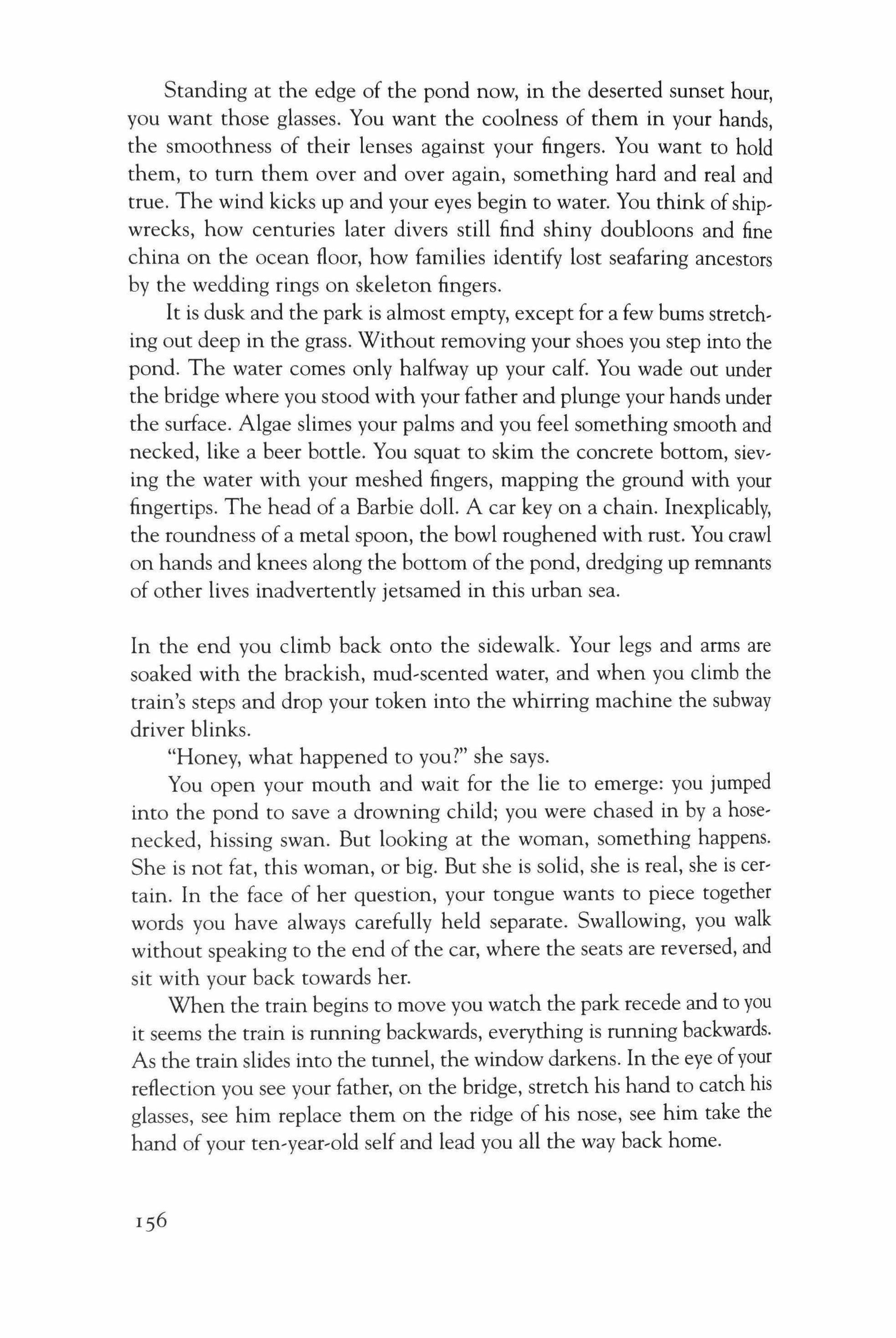
Standing at the edge of the pond now, in the deserted sunset hour, you want those glasses. You want the coolness of them in your hands, the smoothness of their lenses against your fingers. You want to hold them, to tum them over and over again, something hard and real and true. The wind kicks up and your eyes begin to water. You think ofshipwrecks, how centuries later divers still find shiny doubloons and fine china on the ocean floor, how families identify lost seafaring ancestors by the wedding rings on skeleton fingers.
It is dusk and the park is almost empty, except for a few bums stretching out deep in the grass. Without removing your shoes you step into the pond. The water comes only halfway up your calf. You wade out under the bridge where you stood with your father and plunge your hands under the surface. Algae slimes your palms and you feel something smooth and necked, like a beer bottle. You squat to skim the concrete bottom, sieving the water with your meshed fingers, mapping the ground with your fingertips. The head of a Barbie doll. A car key on a chain. Inexplicably, the roundness of a metal spoon, the bowl roughened with rust. You crawl on hands and knees along the bottom of the pond, dredging up remnants of other lives inadvertently jetsamed in this urban sea.
In the end you climb back onto the sidewalk. Your legs and arms are soaked with the brackish, mud-scented water, and when you climb the train's steps and drop your token into the whirring machine the subway driver blinks.
"Honey, what happened to you?" she says.
You open your mouth and wait for the lie to emerge: you jumped into the pond to save a drowning child; you were chased in by a hosenecked, hissing swan. But looking at the woman, something happens. She is not fat, this woman, or big. But she is solid, she is real, she is certain. In the face of her question, your tongue wants to piece together words you have always carefully held separate. Swallowing, you walk without speaking to the end of the car, where the seats are reversed, and sit with your back towards her.
When the train begins to move you watch the park recede and to you it seems the train is running backwards, everything is running backwards. As the train slides into the tunnel, the window darkens. In the eye ofyour reflection you see your father, on the bridge, stretch his hand to catch his glasses, see him replace them on the ridge of his nose, see him take the hand of your ten-year-old self and lead you all the way back home.
Nancy Eimers
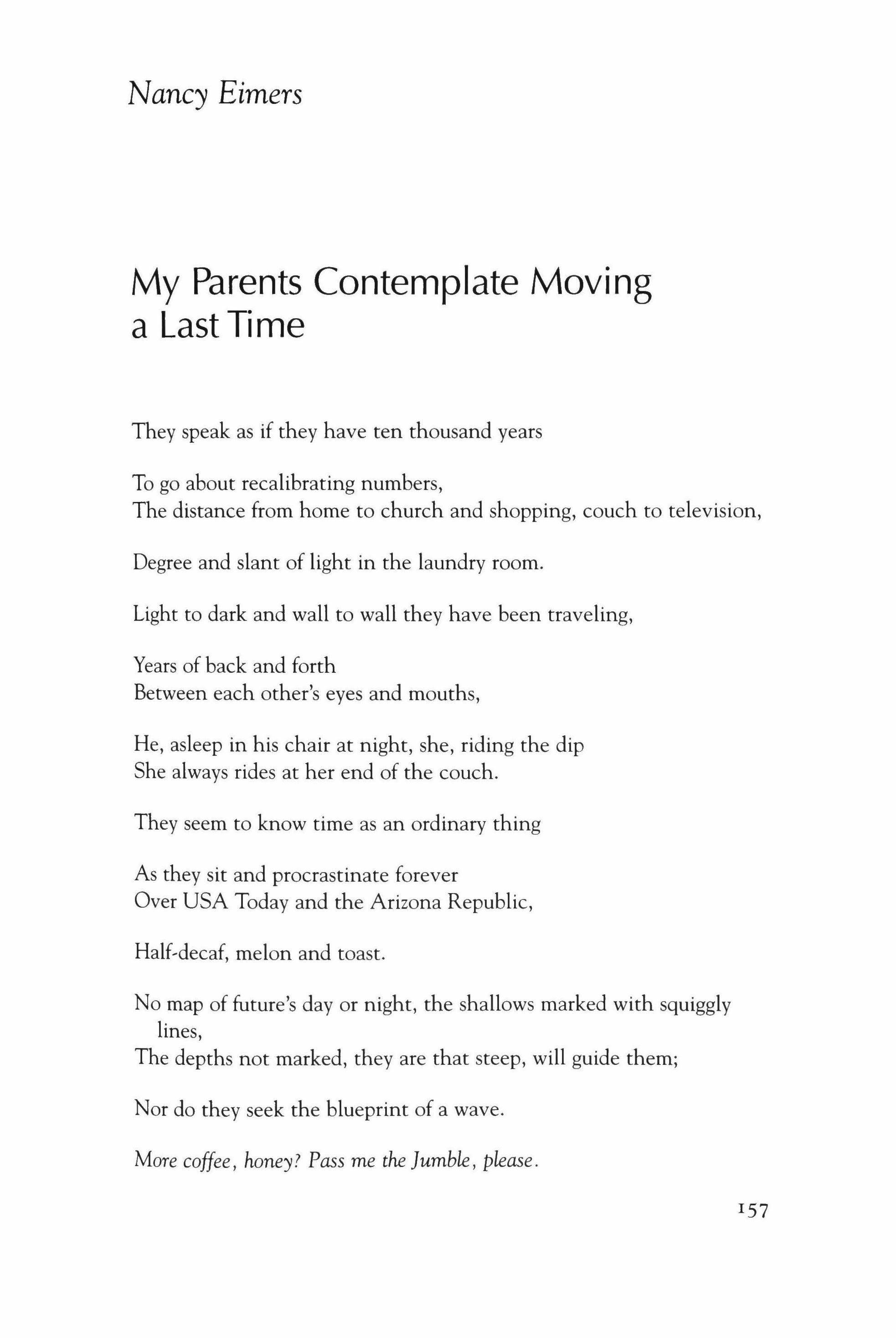
My Parents Contemplate Moving
a Last Time
They speak as if they have ten thousand years
To go about recalibrating numbers,
The distance from home to church and shopping, couch to television,
Degree and slant of light in the laundry room.
Light to dark and wall to wall they have been traveling,
Years of back and forth
Between each other's eyes and mouths,
He, asleep in his chair at night, she, riding the dip She always rides at her end of the couch.
They seem to know time as an ordinary thing
As they sit and procrastinate forever
Over USA Today and the Arizona Republic,
Half-decaf, melon and toast.
No map of future's day or night, the shallows marked with squiggly lines,
The depths not marked, they are that steep, will guide them;
Nor do they seek the blueprint of a wave.
More coffee, honey? Pass me the Jumble, please.
157

I watch them contemplate their move so quietly It resembles just sitting there over breakfast
Talking themselves backwards, toward the smallest house in the universe-
Toward the waiting any child knows.
Fifth of July
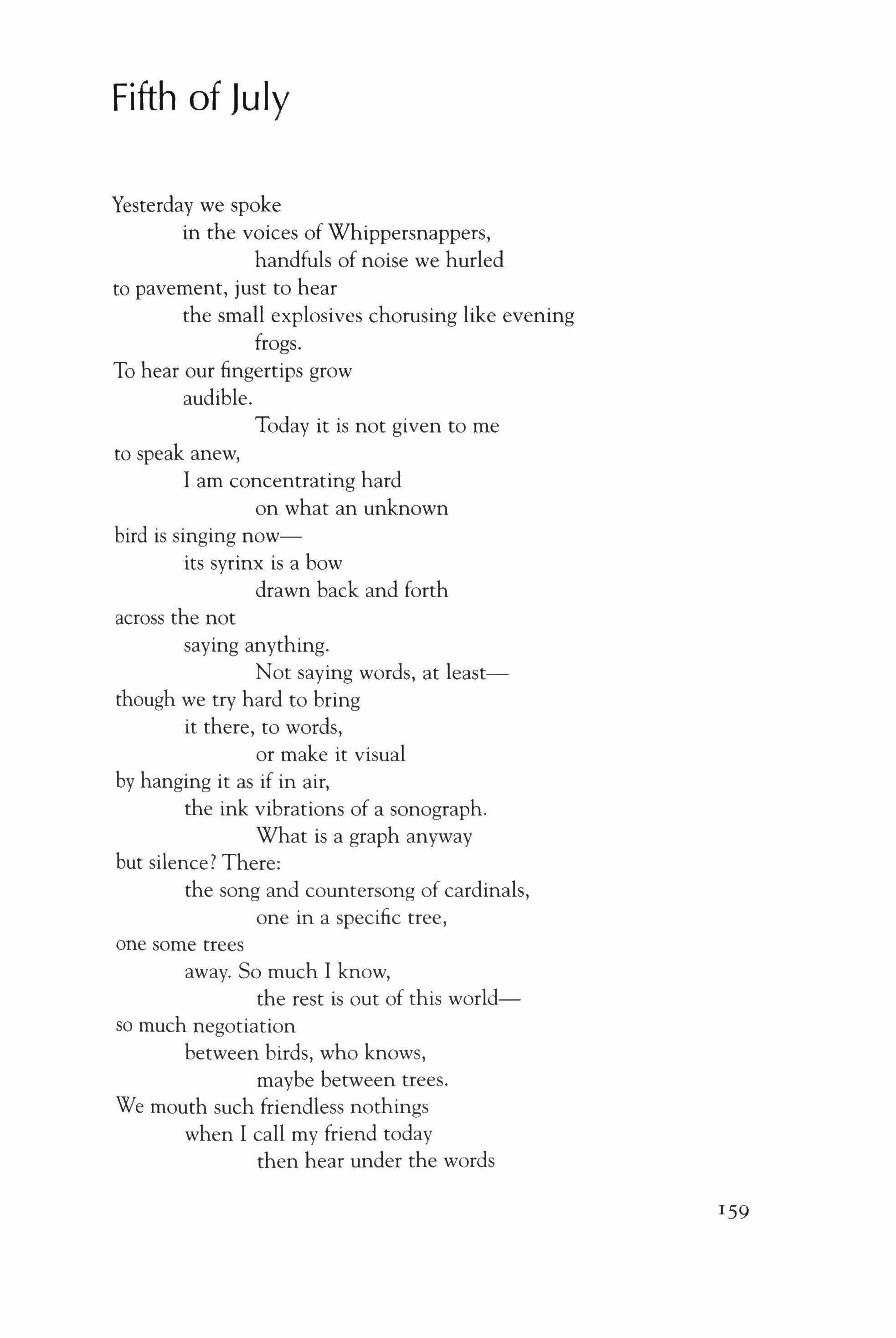
Yesterday we spoke in the voices of Whippersnappers, handfuls of noise we hurled to pavement, just to hear the small explosives chorusing like evening frogs. To hear our fingertips grow audible. Today it is not given to me to speak anew, I am concentrating hard on what an unknown bird is singing nowits syrinx is a bow drawn back and forth across the not saying anything. Not saying words, at leastthough we try hard to bring it there, to words, or make it visual by hanging it as if in air, the ink vibrations of a sonograph. What is a graph anyway but silence? There: the song and countersong of cardinals, one in a specific tree, one some trees away. So much I know, the rest is out of this worldso much negotiation between birds, who knows, maybe between trees. We mouth such friendless nothings when I call my friend today then hear under the words
159
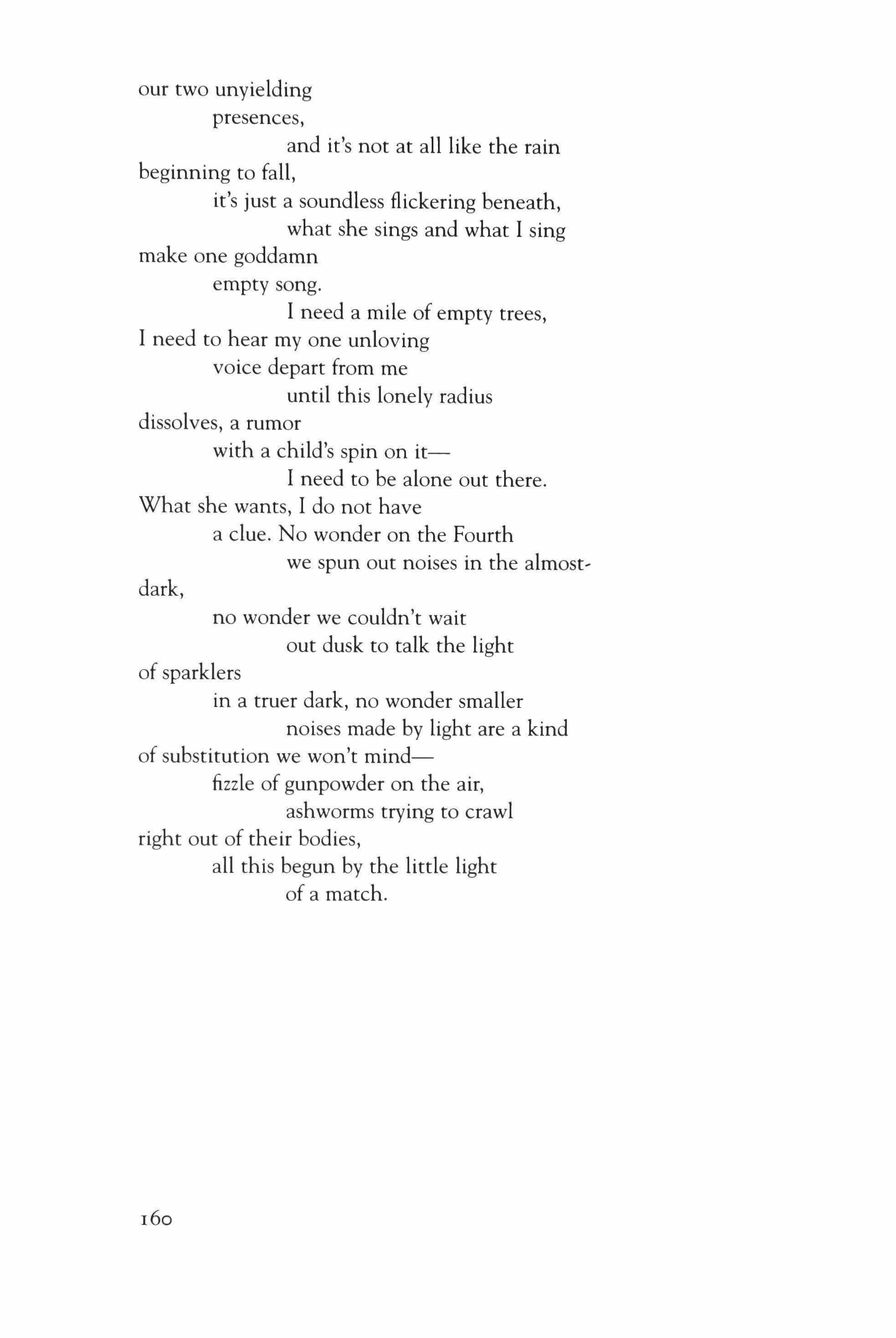
our two unyielding presences, and it's not at all like the rain beginning to fall, it's just a soundless flickering beneath, what she sings and what I sing make one goddamn empty song.
I need a mile of empty trees, I need to hear my one unloving voice depart from me until this lonely radius dissolves, a rumor with a child's spin on itI need to be alone out there. What she wants, I do not have a clue. No wonder on the Fourth we spun out noises in the almost, dark, no wonder we couldn't wait out dusk to talk the light of sparklers in a truer dark, no wonder smaller noises made by light are a kind of substitution we won't mindfizzle of gunpowder on the air, ashworms trying to crawl right out of their bodies, all this begun by the little light of a match.
160
Crawl Key Wind

Something you knew in your sleep, the wind had been blowing all night, like news turned down below its brawn
of words. There were boats in it, and trees blowing sideways, trucks adrift in their static stretching to Key West from Miami. Pelicans
hung in the lower branches, they rocked and were shaken as empty cradles all the night.
On still nights a moving light across water had had an object-had been going somewhere, and going, that was one kind of sorrow.
This had all the lights in it moving, every streetlight had the reined-in sorrow of a buoy. If you woke and looked outside and held
still watching, you were carried along and you fell asleep and wind steered you again like an island out to sea, and sleep had no object,
being the object, birds flew over it and the trunks of palms on shore braked on and the fronds lunged and the souls of newspapers
offered day their rolled-up flight.
Morning, after a Sleeping Pill
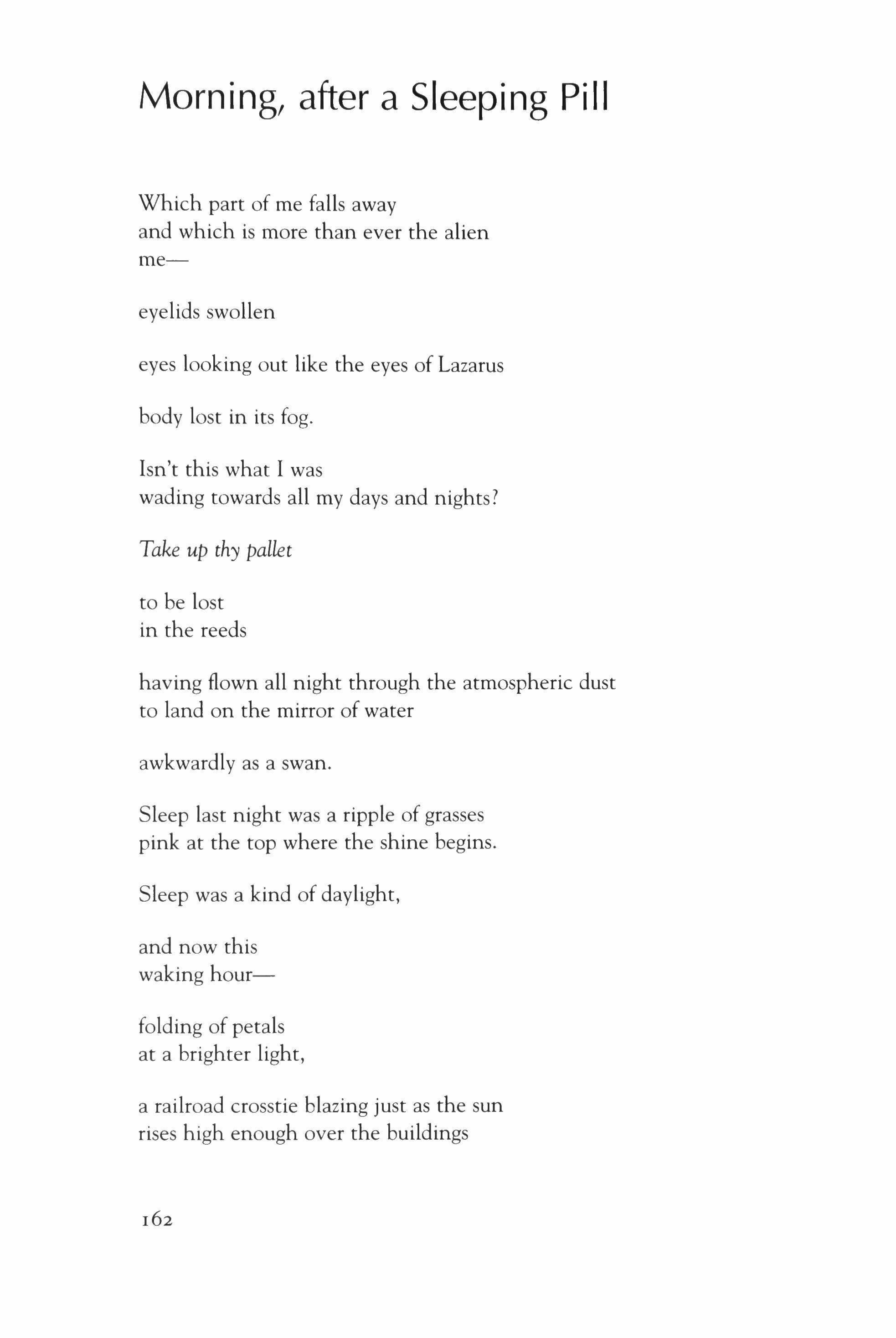
Which part of me falls away and which is more than ever the alien me-
eyelids swollen
eyes looking out like the eyes of Lazarus
body lost in its fog.
Isn't this what I was wading towards all my days and nights?
Take up thy pallet to be lost in the reeds
having flown all night through the atmospheric dust to land on the mirror of water awkwardly as a swan.
Sleep last night was a ripple of grasses pink at the top where the shine begins.
Sleep was a kind of daylight, and now this waking hourfolding of petals at a brighter light, a railroad crosstie blazing just as the sun rises high enough over the buildings

-this daylight I am walking into lantern swung from an arm for the body is cold and dark outside.
This Ecstasy
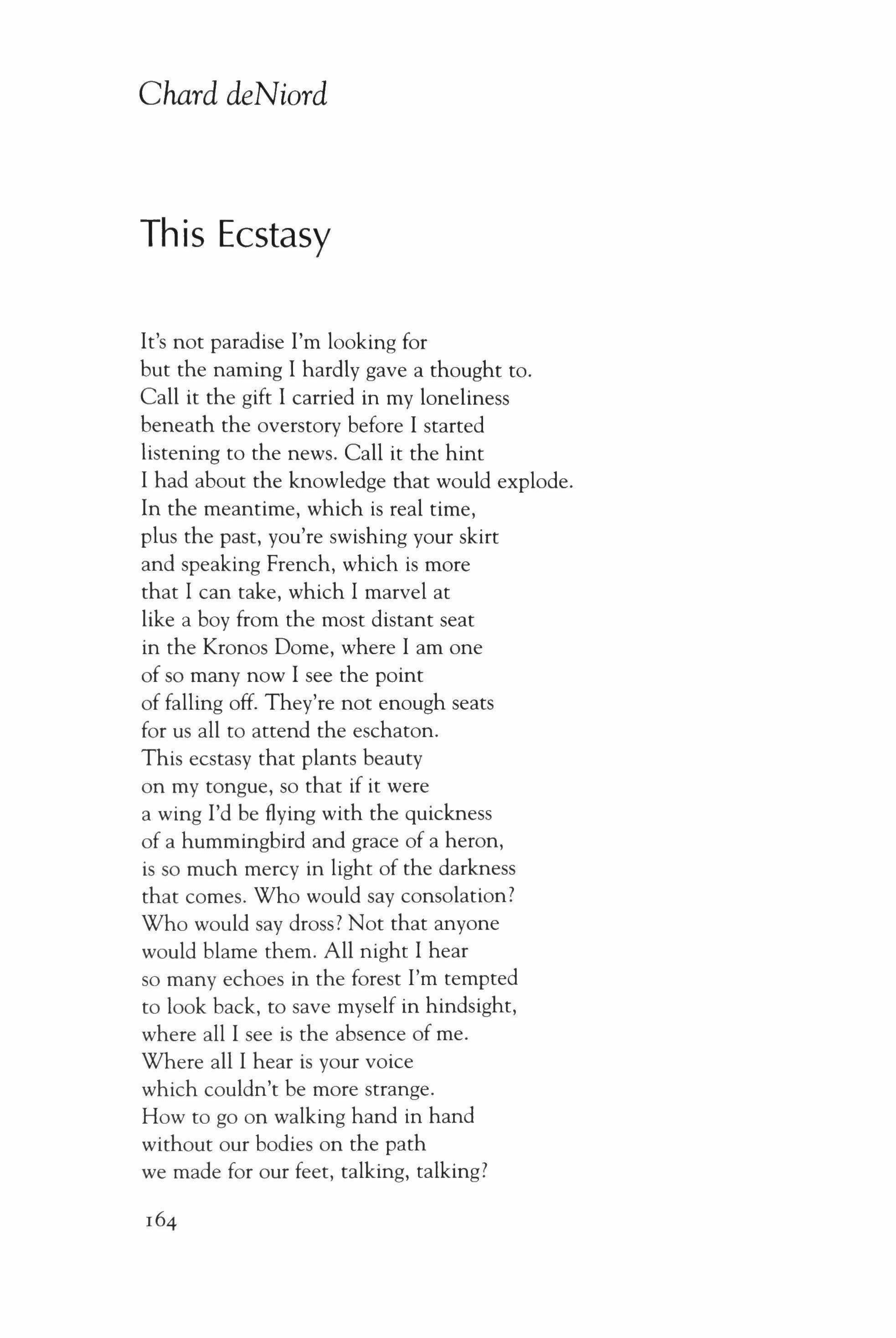
It's not paradise I'm looking for but the naming I hardly gave a thought to. Call it the gift I carried in my loneliness beneath the overstory before I started listening to the news. Call it the hint I had about the knowledge that would explode. In the meantime, which is real time, plus the past, you're swishing your skirt and speaking French, which is more that I can take, which I marvel at like a boy from the most distant seat in the Kronos Dome, where I am one of so many now I see the point of falling off. They're not enough seats for us all to attend the eschaton. This ecstasy that plants beauty on my tongue, so that if it were a wing I'd be flying with the quickness of a hummingbird and grace of a heron, is so much mercy in light of the darkness that comes. Who would say consolation? Who would say dross? Not that anyone would blame them. All night I hear so many echoes in the forest I'm tempted to look back, to save myself in hindsight, where all I see is the absence of me. Where all I hear is your voice which couldn't be more strange. How to go on walking hand in hand without our bodies on the path we made for our feet, talking, talking?
Chard deNiord
Postdiluvian
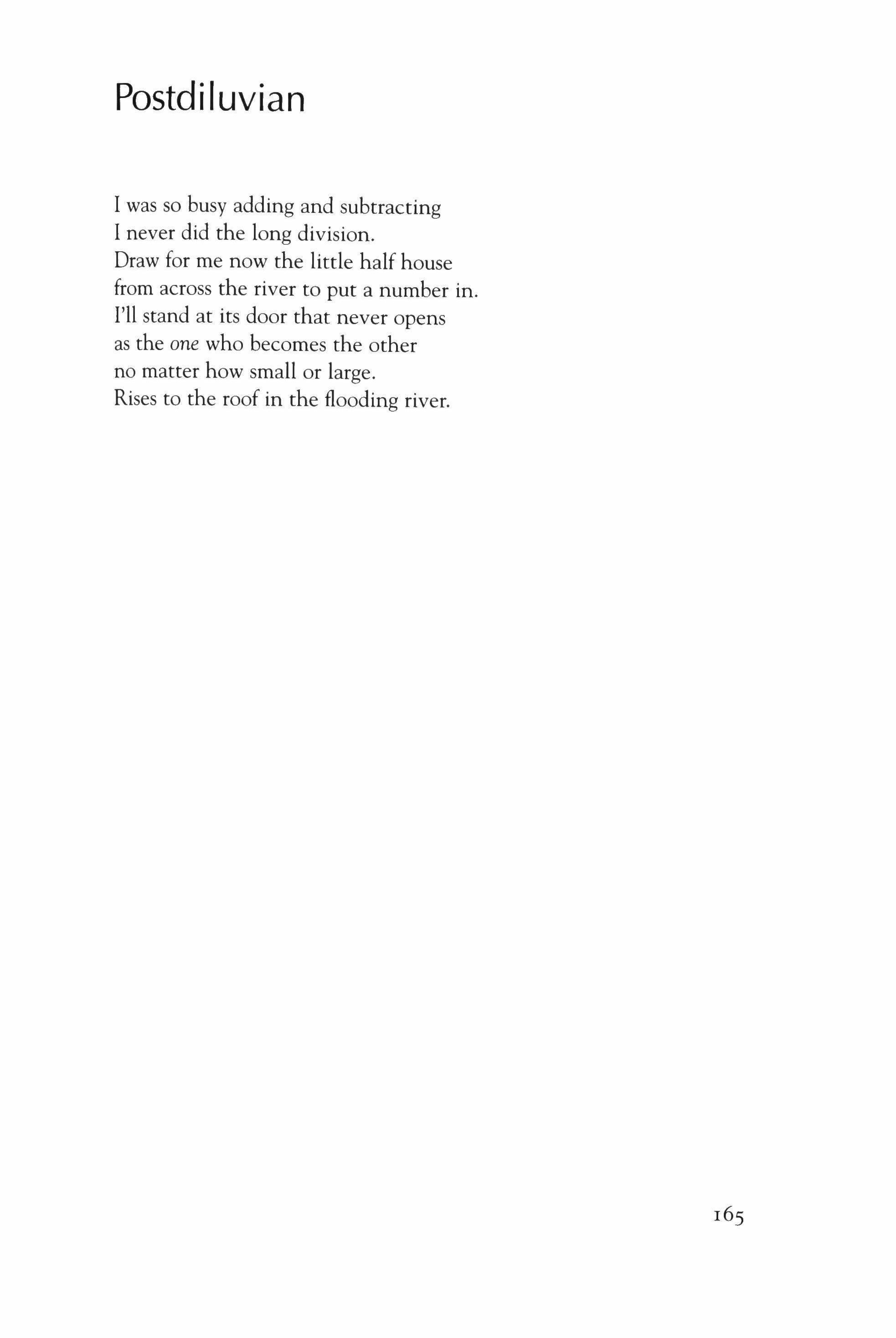
I was so busy adding and subtracting I never did the long division. Draw for me now the little half house from across the river to put a number in. I'll stand at its door that never opens as the one who becomes the other no matter how small or large. Rises to the roof in the flooding river.
Laura Kasischke

Riddle
The bodies of the girls in their beds, on their bikes, riding their horses through the clover, watching Snow White, sprawled on the rug chewing gum, reading Laura Ingalls Wilder-and, all the time, the chemical messages, the disseminated enzymes, the man in a tuxedo holding the door open wide, making that sweeping gesture with his arm.
0, biochemical seducers, hormonal wash, the external thyroid of a tadpole turning it irreversibly, involuntarily, into a frog.
They told us it was a dance, a party, a pageant, so we ran laughing together straight into the disaster. A pack of hounds dozed in the grass. Down the stairs, we ran, still wearing those glittering tiaras in our hair. Scaled Hadrian's wall in our high heels. The hounds snapped their teeth in a dream. The geese overhead flew in formation, obeying the vague whisperings in their bird brains explaining to them the ridiculously complex rules of their own migrations.
While our mothers stood helplessly by and screamed, and the farmers plowed their ancient fields, and our fathers watched us from the front porch tapping their chins and wondering-who were we?
166
The sweet by-and-by
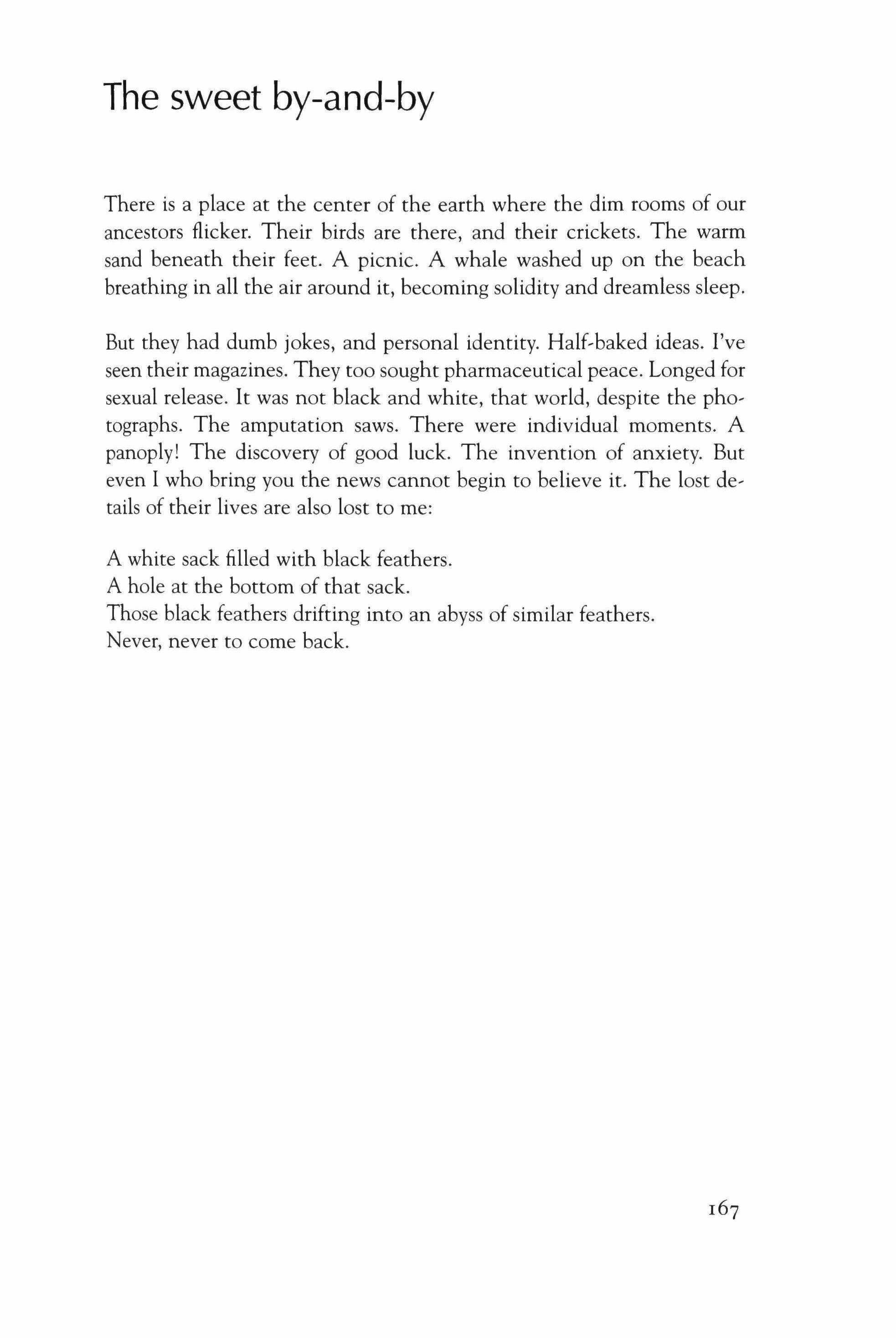
There is a place at the center of the earth where the dim rooms of our ancestors flicker. Their birds are there, and their crickets. The warm sand beneath their feet. A picnic. A whale washed up on the beach breathing in all the air around it, becoming solidity and dreamless sleep.
But they had dumb jokes, and personal identity. Half-baked ideas. I've seen their magazines. They too sought pharmaceutical peace. Longed for sexual release. It was not black and white, that world, despite the photographs. The amputation saws. There were individual moments. A panoply! The discovery of good luck. The invention of anxiety. But even I who bring you the news cannot begin to believe it. The lost de' tails of their lives are also lost to me:
A white sack filled with black feathers. A hole at the bottom of that sack. Those black feathers drifting into an abyss of similar feathers. Never, never to come back.
Mia
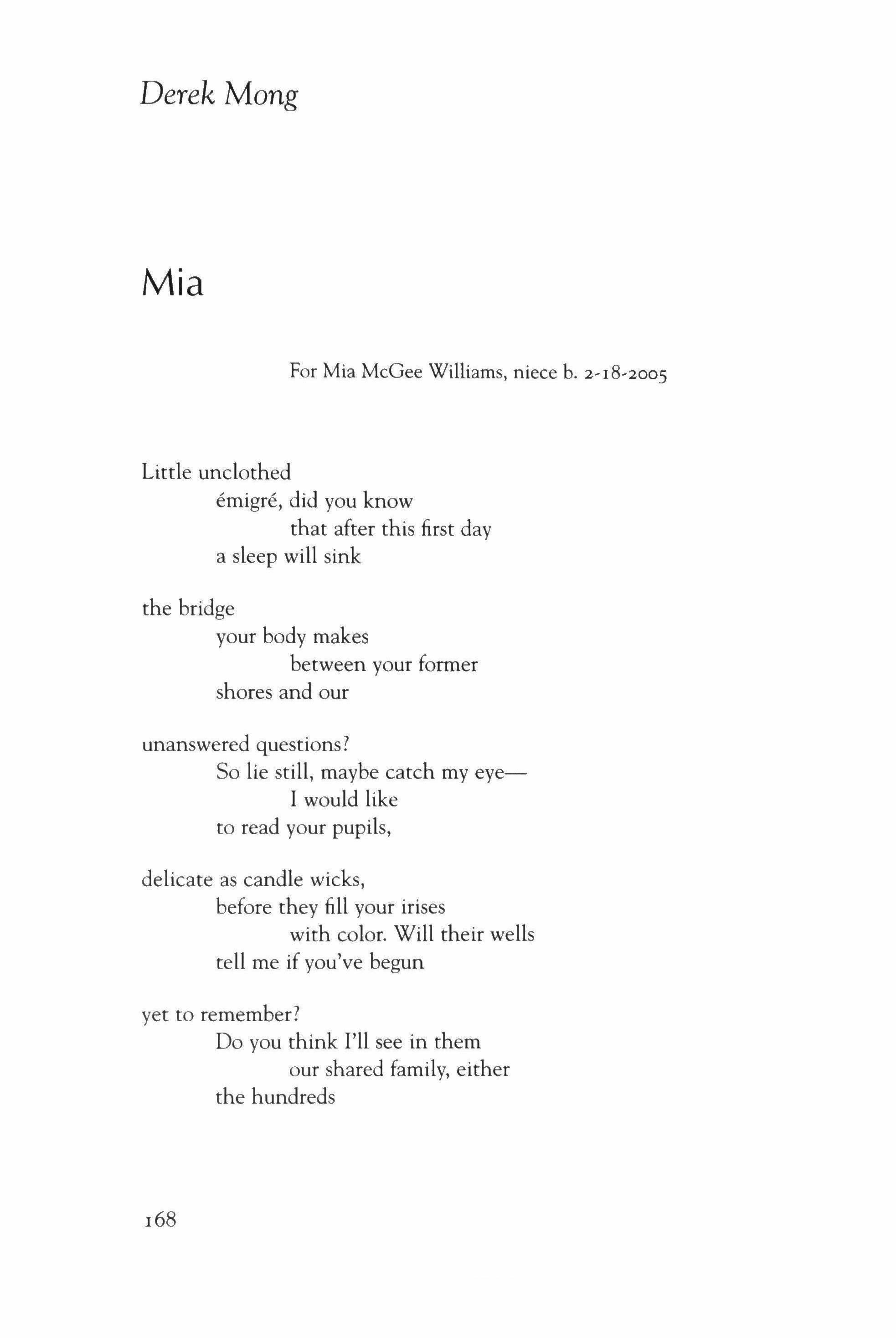
For Mia McGee Williams, niece h. 2- I 8-2005
Little unclothed emigre, did you know that after this first day a sleep will sink the bridge your body makes between your former shores and our unanswered questions?
So lie still, maybe catch my eyeI would like to read your pupils, delicate as candle wicks, before they fill your irises with color. Will their wells tell me if you've begun yet to remember?
Do you think I'll see in them our shared family, either the hundreds
Derek Mong
168
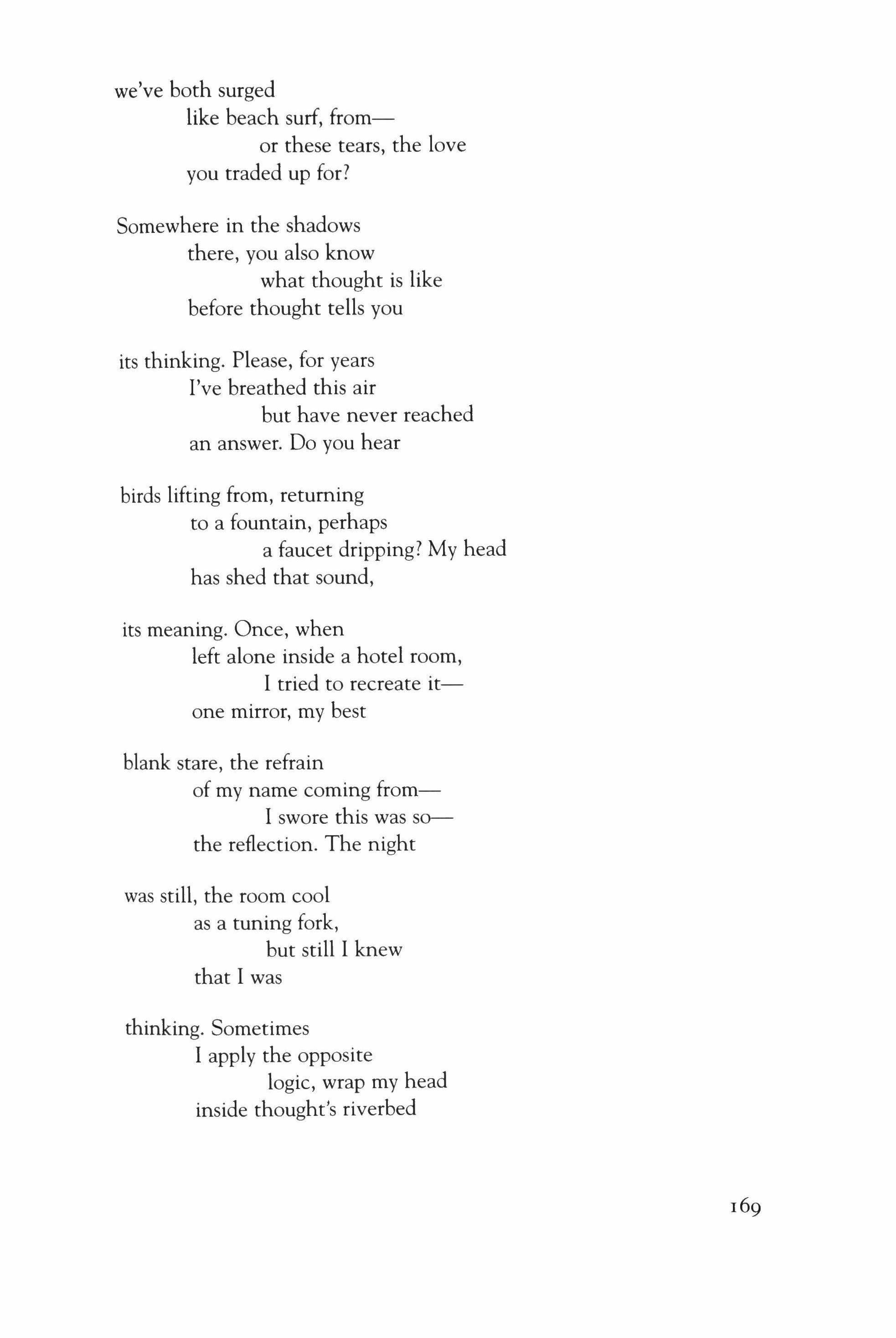
we've both surged like beach surf, fromor these tears, the love you traded up for?
Somewhere in the shadows there, you also know what thought is like before thought tells you its thinking. Please, for years I've breathed this air but have never reached an answer. Do you hear birds lifting from, returning to a fountain, perhaps a faucet dripping? My head has shed that sound, its meaning. Once, when left alone inside a hotel room, I tried to recreate itone mirror, my best
blank stare, the refrain of my name coming fromI swore this was sothe reflection. The night was still, the room cool as a tuning fork, but still I knew that I was thinking. Sometimes I apply the opposite logic, wrap my head inside thought's riverbed

and turn on the water-
Still, such abundance leads no more to origins than your recent shore: its absence.
Mia, it will be years before I meet you.
170
Judith Valente
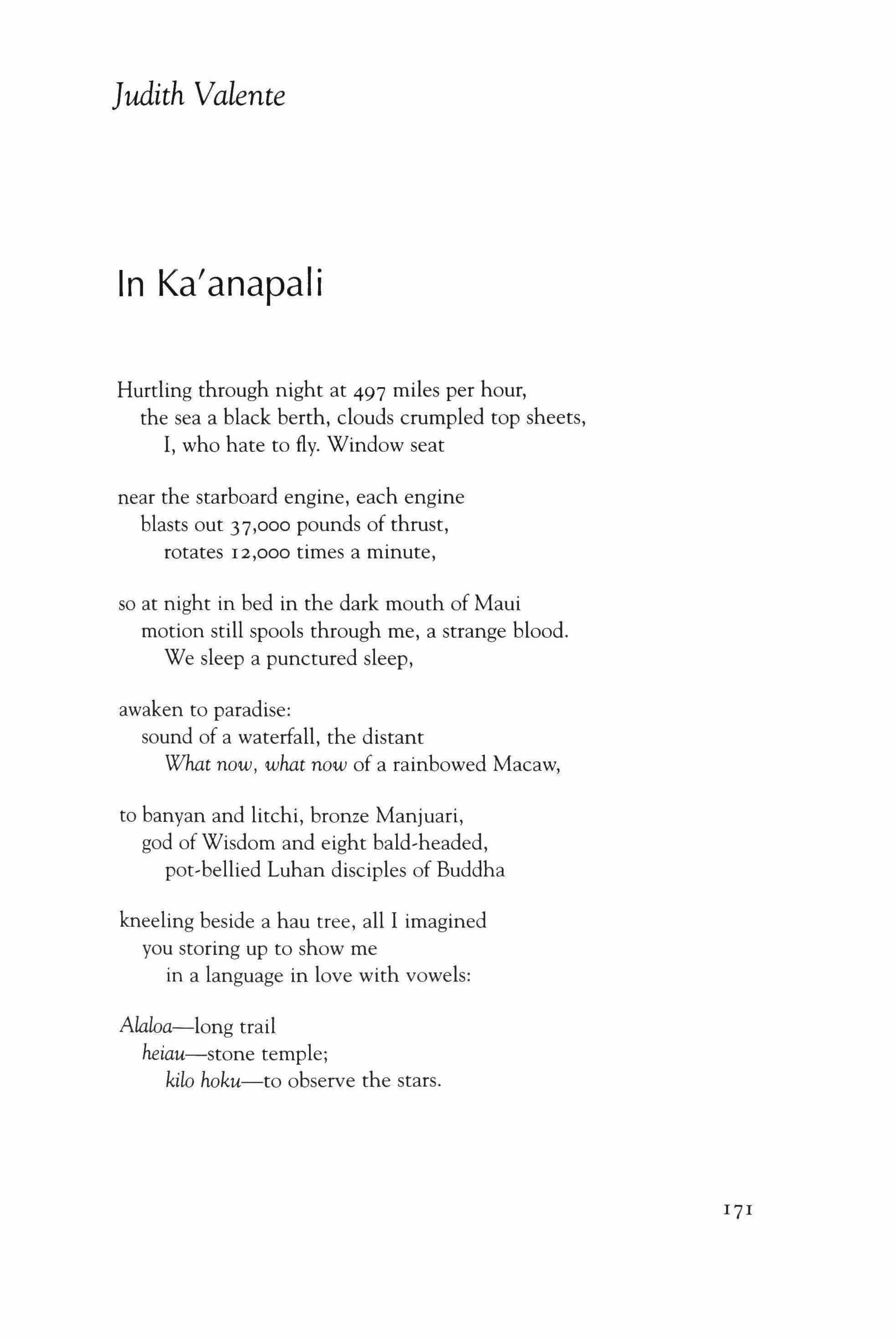
In Ka'anapali
Hurtling through night at 497 miles per hour, the sea a black berth, clouds crumpled top sheets, I, who hate to fly. Window seat
near the starboard engine, each engine blasts out 37,000 pounds of thrust, rotates 12,000 times a minute,
so at night in bed in the dark mouth of Maui motion still spools through me, a strange blood. We sleep a punctured sleep,
awaken to paradise:
sound of a waterfall, the distant What now, what now of a rainbowed Macaw, to banyan and litchi, bronze Manjuari, god of Wisdom and eight bald-headed, pot-bellied Luhan disciples of Buddha
kneeling beside a hau tree, all I imagined you storing up to show me in a language in love with vowels:
Alaloa-long trail heiau-stone temple; kilo hoku-to observe the stars.
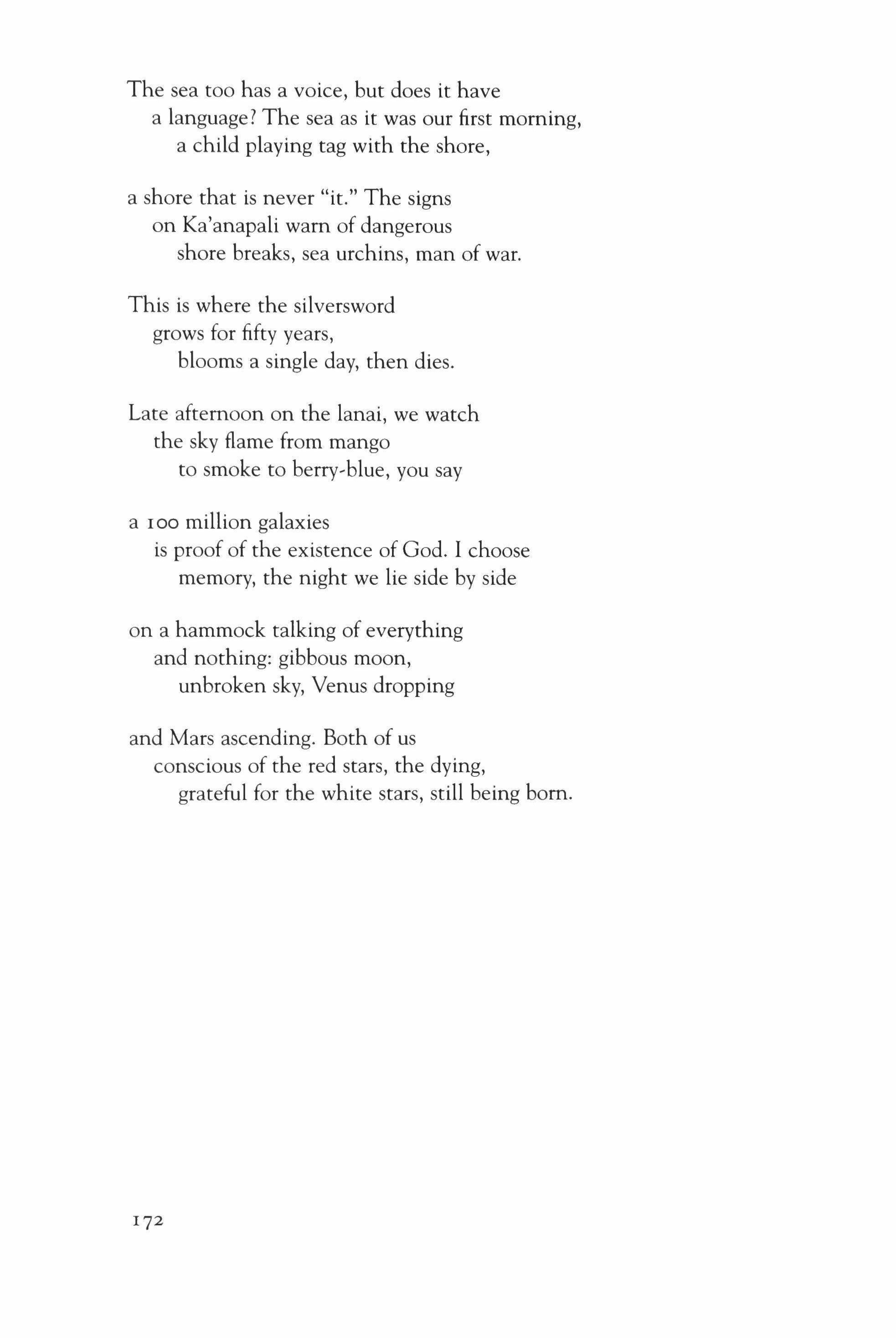
The sea too has a voice, but does it have a language? The sea as it was our first morning, a child playing tag with the shore,
a shore that is never "it." The signs on Ka'anapali warn of dangerous shore breaks, sea urchins, man of war.
This is where the silversword grows for fifty years, blooms a single day, then dies.
Late afternoon on the lanai, we watch the sky flame from mango to smoke to berry-blue, you say
a 100 million galaxies is proof of the existence of God. I choose memory, the night we lie side by side on a hammock talking of everything and nothing: gibbous moon, unbroken sky, Venus dropping and Mars ascending. Both of us conscious of the red stars, the dying, grateful for the white stars, still being born.
Central Illinois, Late October
The season spills out its fistful of playing marbles: millefiores, sunbursts, oxbloods, caneswirls.
Bronzed leaves hang, gnarled hands empty of pennies. Death smell hangs, moist fomenting cider in the tight-chested ground.
I steady myself for the cardboard colors to come: Dun, amber, sepia seeping across ungrazed prairie.
Saturday. The afternoon drive past Dwight Odell Pontiac Towanda
Familiar markers rise like roadside crosses for the dead: Sun Motel Pete's Harvest Table Robert Bolen Stock Farms
Whether castle hut or geodesic dome
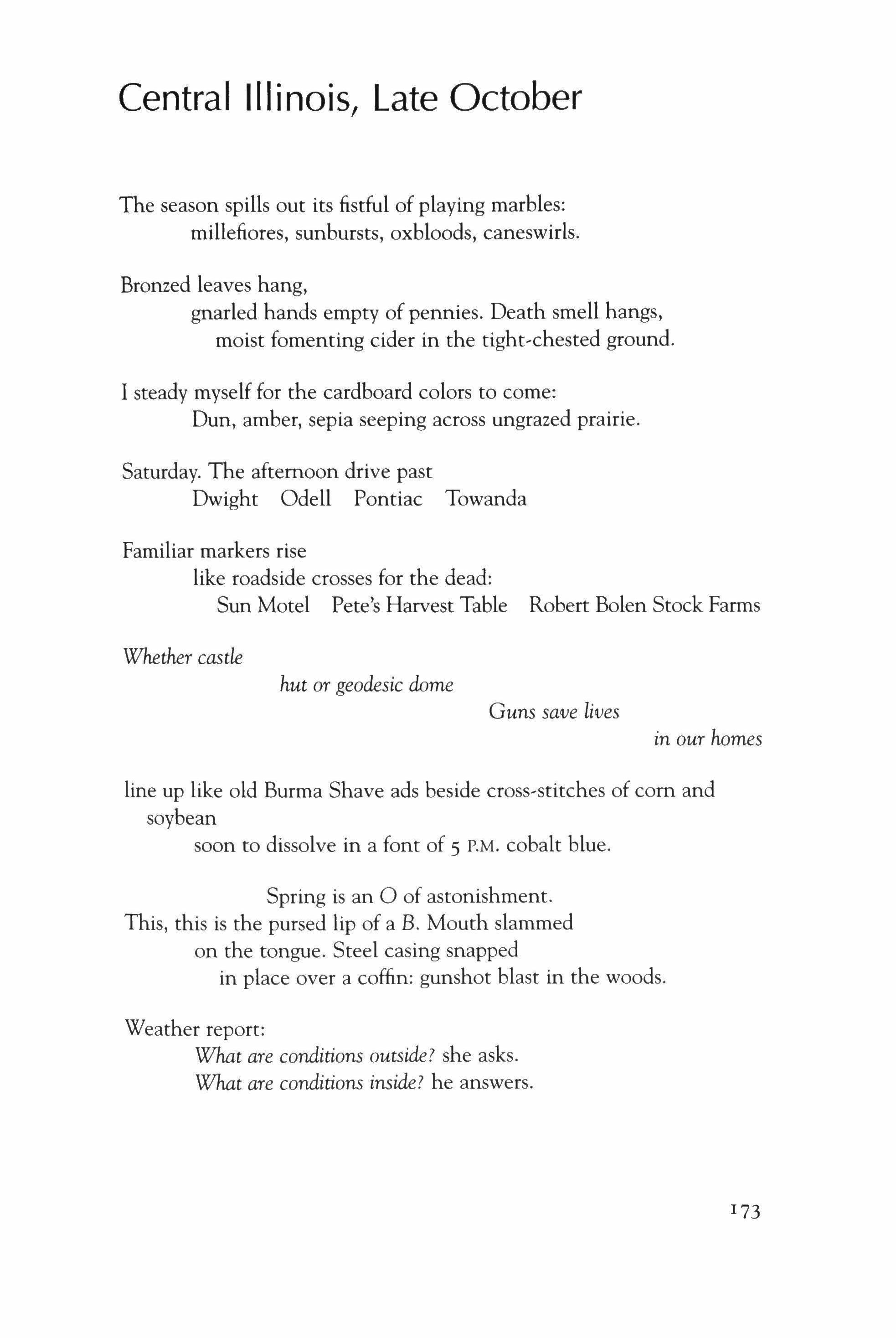
Guns save lives in our homes
line up like old Burma Shave ads beside cross-stitches of com and soybean soon to dissolve in a font of 5 P.M. cobalt blue.
Spring is an 0 of astonishment. This, this is the pursed lip of a B. Mouth slammed on the tongue. Steel casing snapped in place over a coffin: gunshot blast in the woods.
Weather report: What are conditions outside? she asks. What are conditions inside? he answers.

We dangle between eternity and the dry, uncertain landscape, tabula rasa and our own wavering perspective
as later in the gallery, we study the vertical rods of a Julia Mangold sculpture.
He hears music: B natural, C sharp. She sees four flat waxed steel girders, dirty brown.
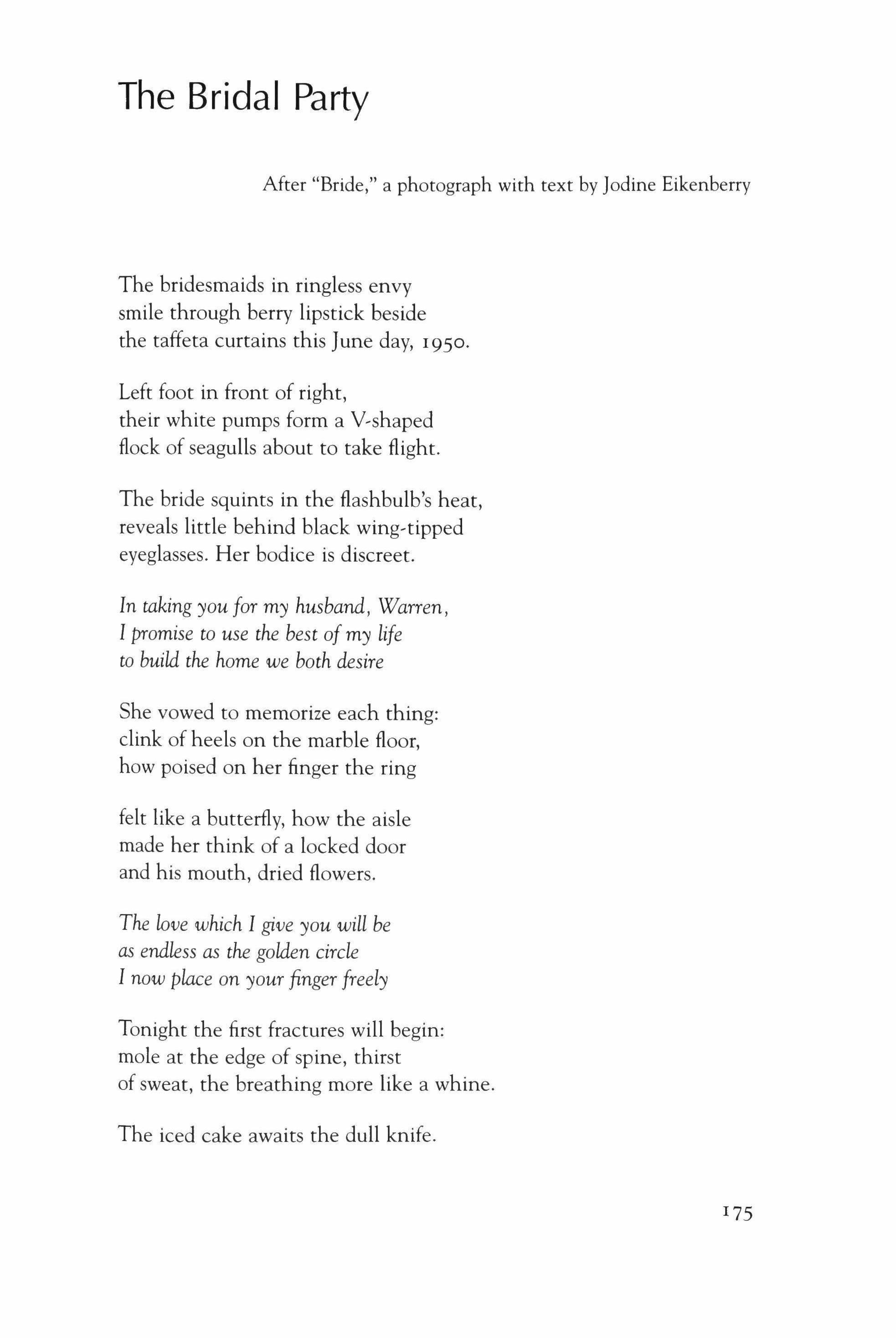
The Bridal Party
After "Bride," a photograph with text by [odine Eikenberry
The bridesmaids in ringless envy smile through berry lipstick beside the taffeta curtains this June day, 1950.
Left foot in front of right, their white pumps form a V-shaped flock of seagulls about to take flight.
The bride squints in the flashbulb's heat, reveals little behind black wing-tipped eyeglasses. Her bodice is discreet.
In taking you for my husband, Warren, I promise to use the best of my life to build the home we both desire
She vowed to memorize each thing: clink of heels on the marble floor, how poised on her finger the ring
felt like a butterfly, how the aisle made her think of a locked door and his mouth, dried flowers.
The love which I give you will be as endless as the golden circle I now place on your finger freely
Tonight the first fractures will begin: mole at the edge of spine, thirst of sweat, the breathing more like a whine.
The iced cake awaits the dull knife.
175
Debra Nystrom
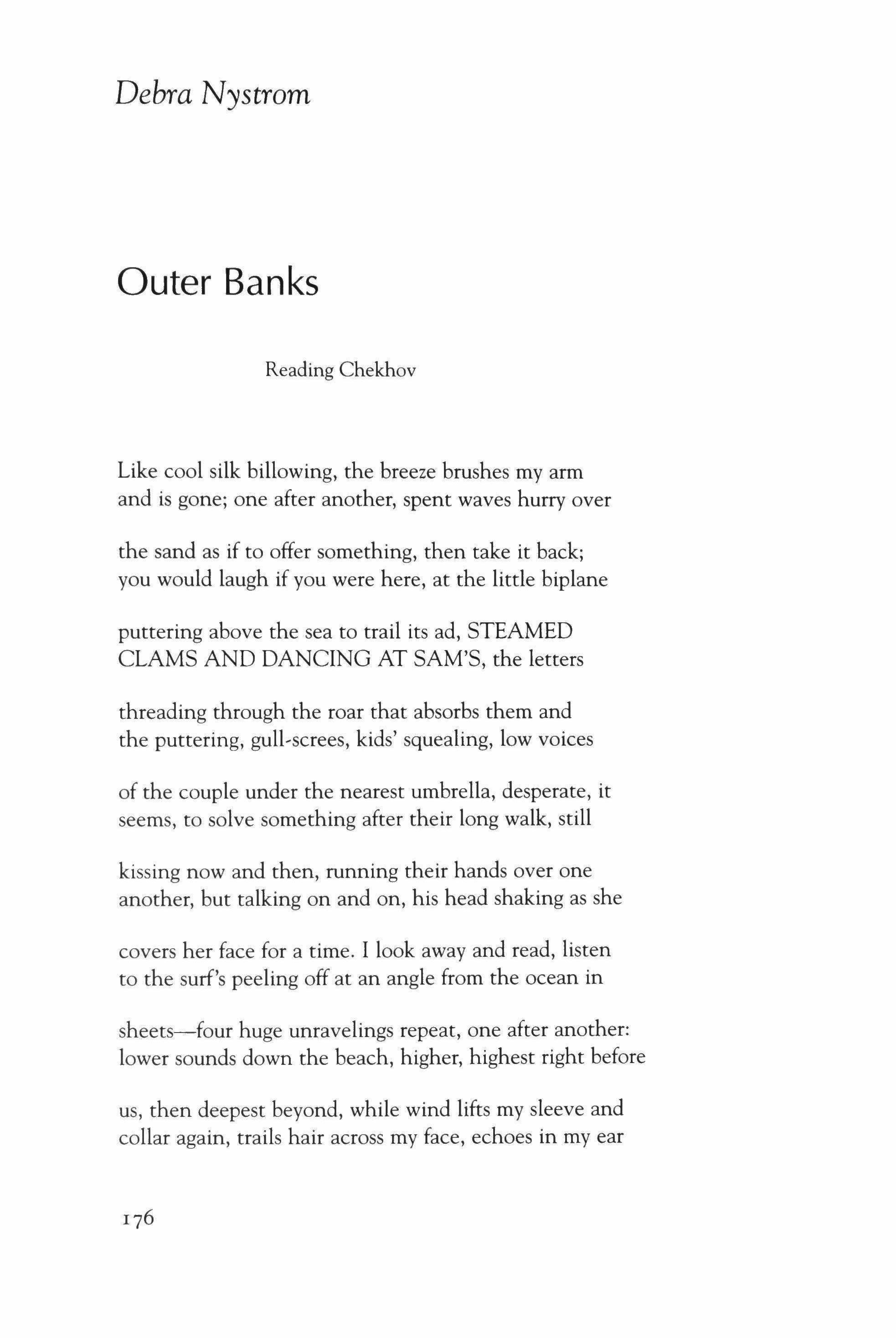
Outer Banks
Reading Chekhov
Like cool silk billowing, the breeze brushes my arm and is gone; one after another, spent waves hurry over the sand as if to offer something, then take it back; you would laugh if you were here, at the little biplane
puttering above the sea to trail its ad, STEAMED CLAMS AND DANCING AT SAM'S, the letters threading through the roar that absorbs them and the puttering, gull-screes, kids' squealing, low voices of the couple under the nearest umbrella, desperate, it seems, to solve something after their long walk, still kissing now and then, running their hands over one another, but talking on and on, his head shaking as she covers her face for a time. I look away and read, listen to the surf's peeling off at an angle from the ocean in sheets-four huge unravelings repeat, one after another: lower sounds down the beach, higher, highest right before us, then deepest beyond, while wind lifts my sleeve and collar again, trails hair across my face, echoes in my ear
176
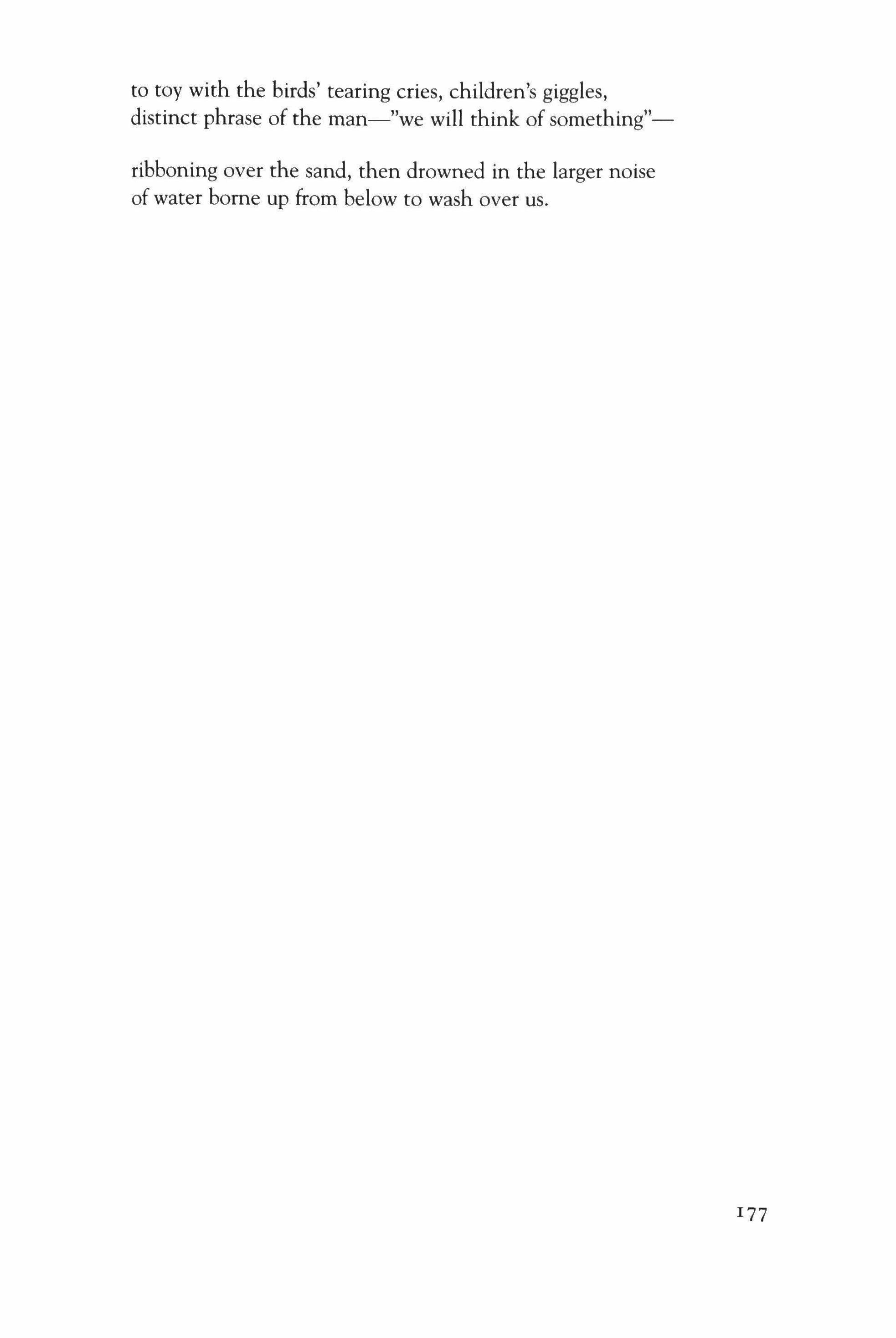
to toy with the birds' tearing cries, children's giggles, distinct phrase of the man-"we will think of something"-
ribboning over the sand, then drowned in the larger noise of water borne up from below to wash over us.
177
He Tells You about the Dress You Wore
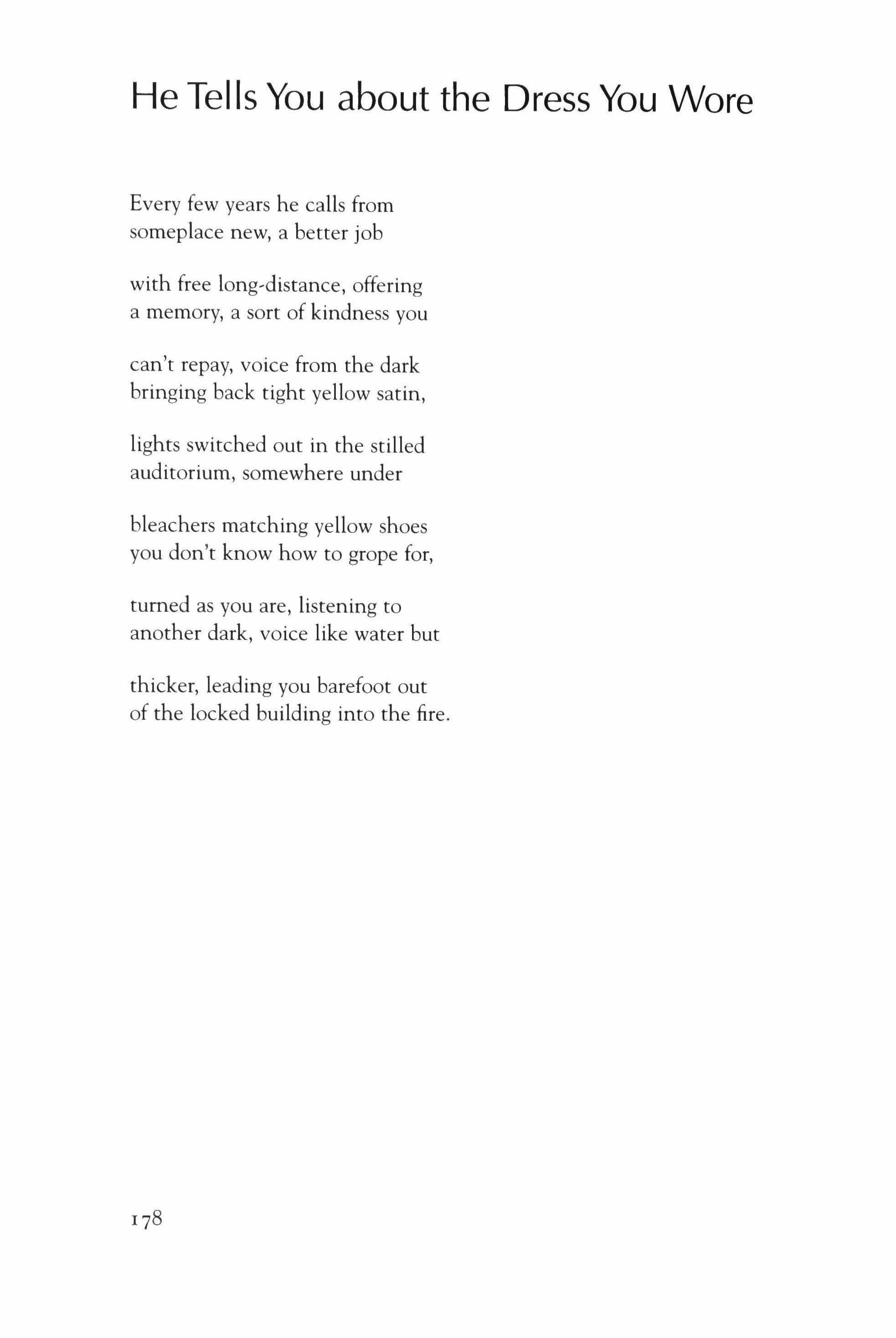
Every few years he calls from someplace new, a better job with free long-distance, offering a memory, a sort of kindness you can't repay, voice from the dark bringing back tight yellow satin, lights switched out in the stilled auditorium, somewhere under bleachers matching yellow shoes you don't know how to grope for, turned as you are, listening to another dark, voice like water but thicker, leading you barefoot out of the locked building into the fire.
178
Pearl
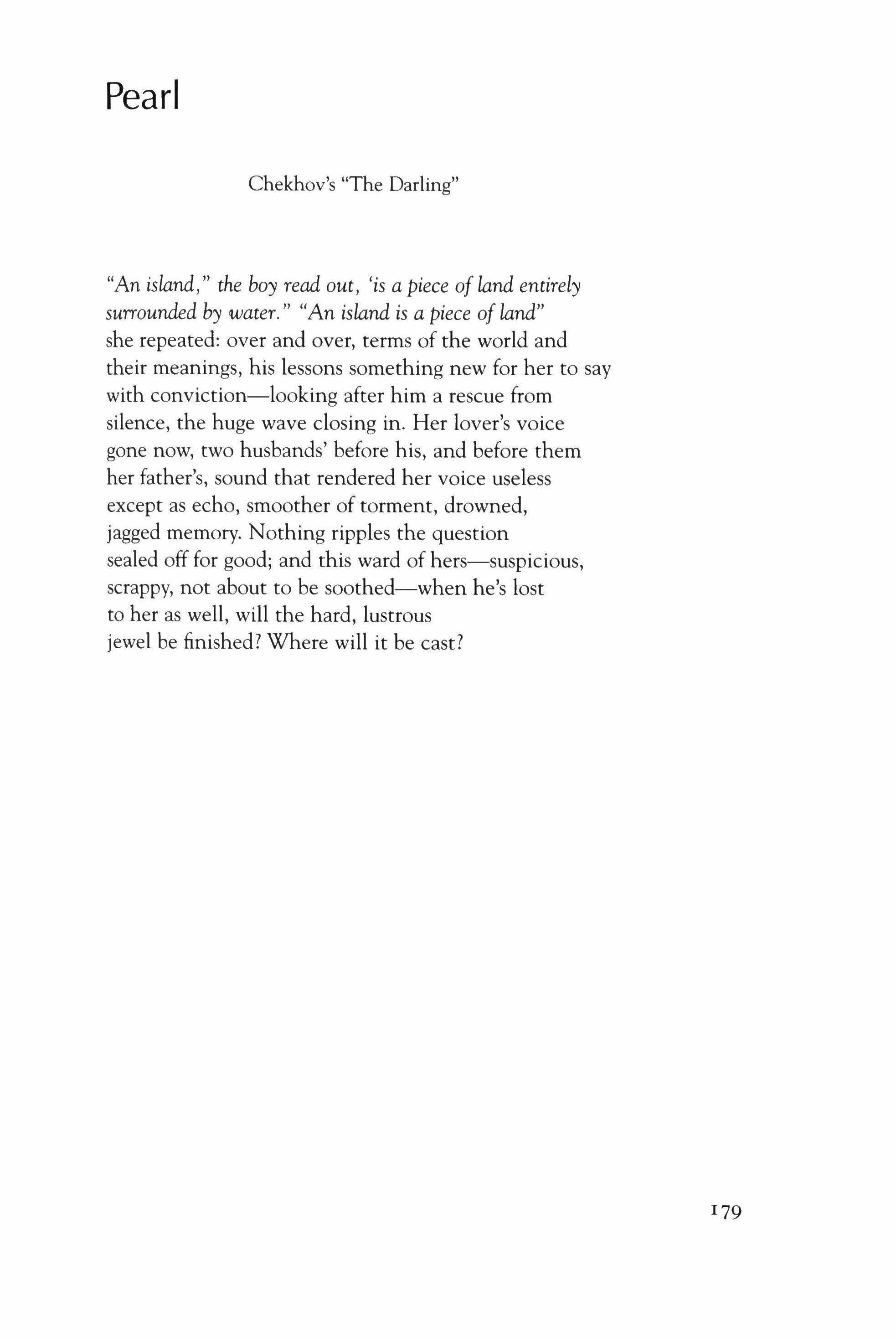
Chekhov's "The Darling"
"An island," the boy read out, 'is a piece of land entirely surrounded by water." "An island is a piece of land" she repeated: over and over, terms of the world and their meanings, his lessons something new for her to say with conviction-looking after him a rescue from silence, the huge wave closing in. Her lover's voice gone now, two husbands' before his, and before them her father's, sound that rendered her voice useless except as echo, smoother of torment, drowned, jagged memory. Nothing ripples the question sealed off for good; and this ward of hers-suspicious, scrappy, not about to be soothed-when he's lost to her as well, will the hard, lustrous jewel be finished? Where will it be cast?
John J. Clayton
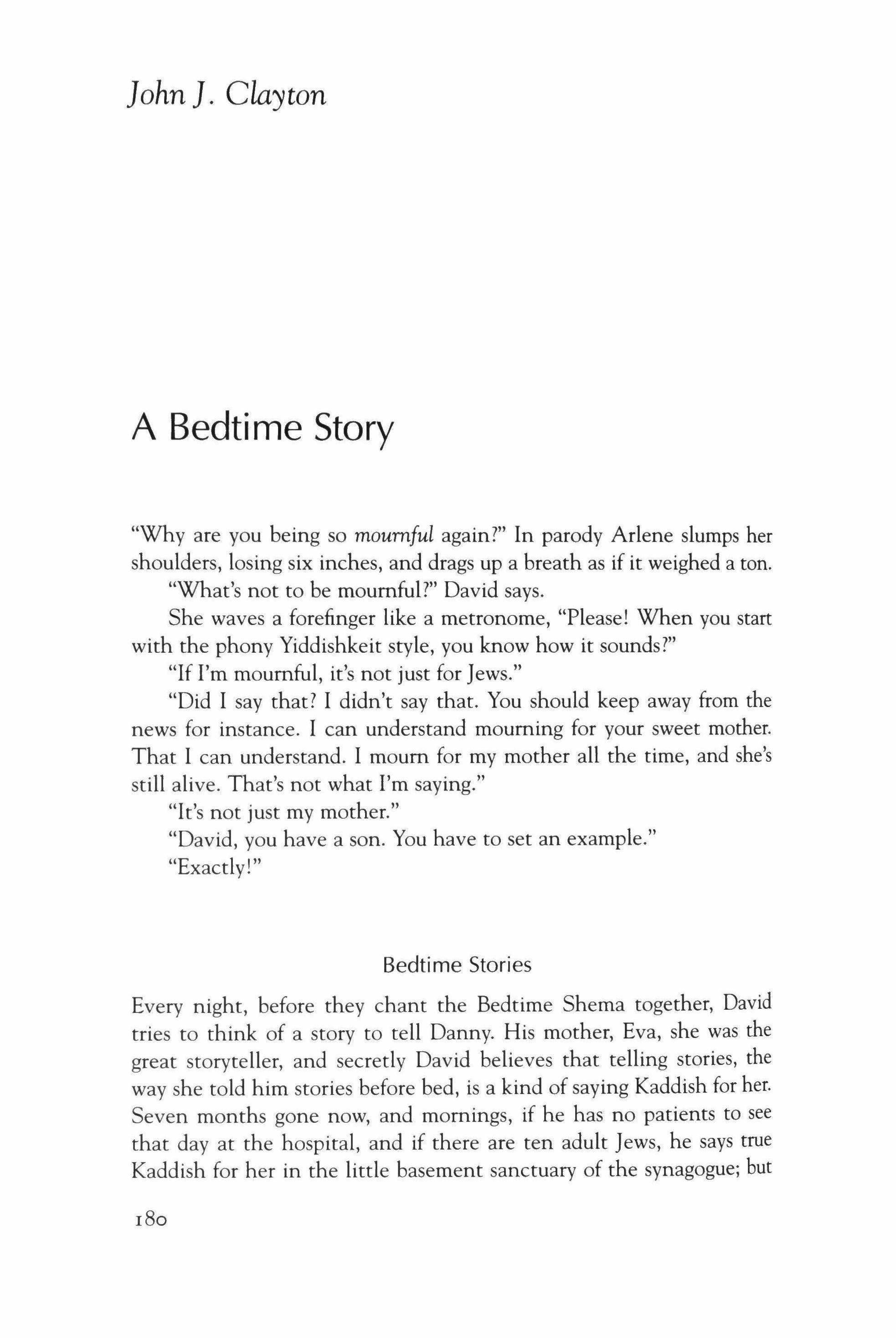
A Bedtime Story
"Why are you being so mournful again?" In parody Arlene slumps her shoulders, losing six inches, and drags up a breath as if it weighed a ton.
"What's not to be mournful?" David says.
She waves a forefinger like a metronome, "Please! When you start with the phony Yiddishkeit style, you know how it sounds?"
"If I'm mournful, it's not just for Jews."
"Did I say that? I didn't say that. You should keep away from the news for instance. I can understand mourning for your sweet mother. That I can understand. I mourn for my mother all the time, and she's still alive. That's not what I'm saying."
"It's not just my mother."
"David, you have a son. You have to set an example." "Exactly!"
Bedtime
Stories
Every night, before they chant the Bedtime Shema together, David tries to think of a story to tell Danny. His mother, Eva, she was the great storyteller, and secretly David believes that telling stories, the way she told him stories before bed, is a kind of saying Kaddish for her. Seven months gone now, and mornings, if he has no patients to see that day at the hospital, and if there are ten adult Jews, he says true Kaddish for her in the little basement sanctuary of the synagogue; but
180
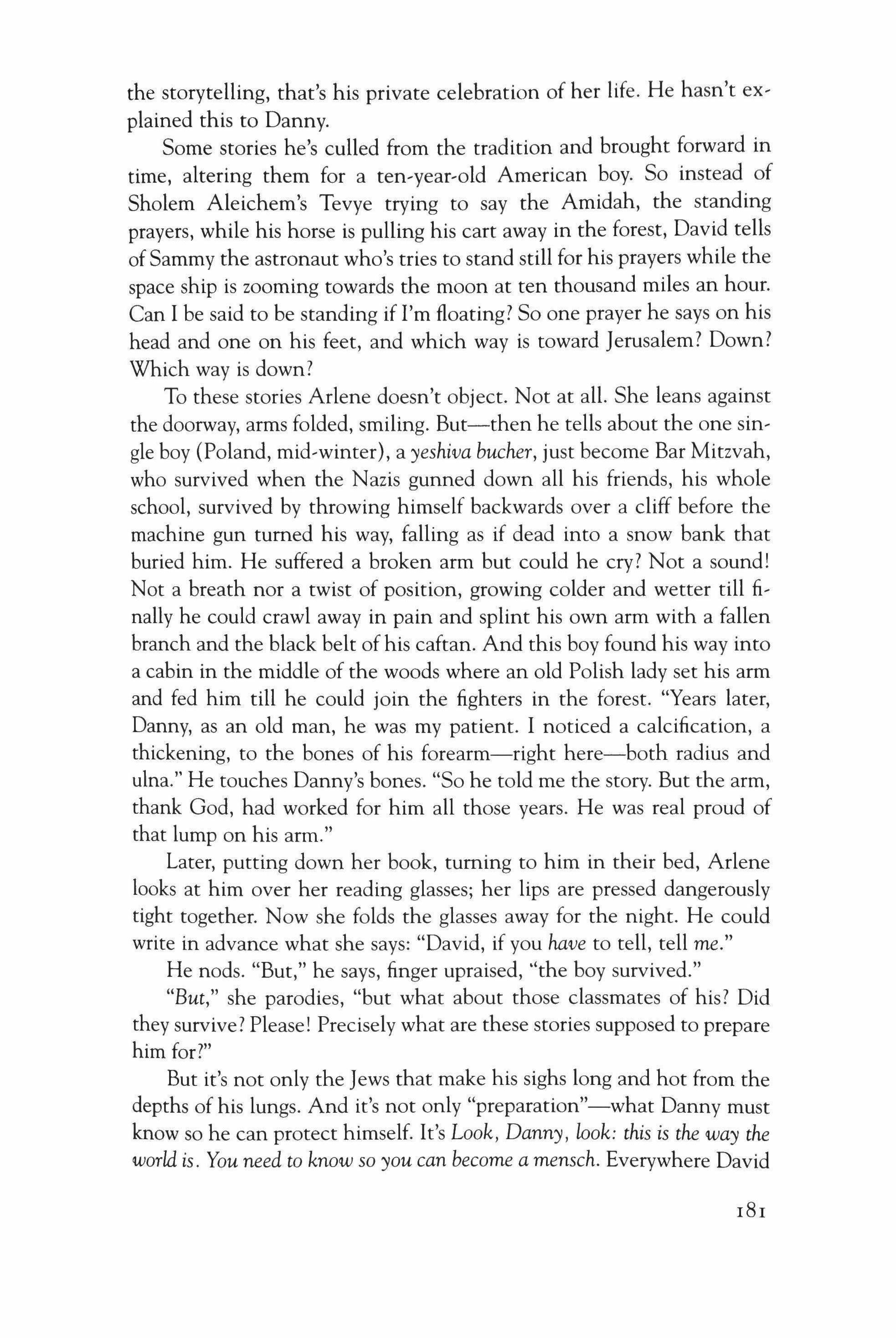
the storytelling, that's his private celebration of her life. He hasn't explained this to Danny.
Some stories he's culled from the tradition and brought forward in time, altering them for a ten-year-old American boy. So instead of Sholem Aleichem's Tevye trying to say the Amidah, the standing prayers, while his horse is pulling his cart away in the forest, David tells ofSammy the astronaut who's tries to stand still for his prayers while the space ship is zooming towards the moon at ten thousand miles an hour. Can I be said to be standing if I'm floating? So one prayer he says on his head and one on his feet, and which way is toward Jerusalem? Down? Which way is down?
To these stories Arlene doesn't object. Not at all. She leans against the doorway, arms folded, smiling. But-then he tells about the one single boy (Poland, mid-winter), a yeshiva bucher, just become Bar Mitzvah, who survived when the Nazis gunned down all his friends, his whole school, survived by throwing himself backwards over a cliff before the machine gun turned his way, falling as if dead into a snow bank that buried him. He suffered a broken arm but could he cry? Not a sound! Not a breath nor a twist of position, growing colder and wetter till finally he could crawl away in pain and splint his own arm with a fallen branch and the black belt of his caftan. And this boy found his way into a cabin in the middle of the woods where an old Polish lady set his arm and fed him till he could join the fighters in the forest. "Years later, Danny, as an old man, he was my patient. I noticed a calcification, a thickening, to the bones of his forearm-right here-both radius and ulna." He touches Danny's bones. "So he told me the story. But the arm, thank God, had worked for him all those years. He was real proud of that lump on his arm."
Later, putting down her book, turning to him in their bed, Arlene looks at him over her reading glasses; her lips are pressed dangerously tight together. Now she folds the glasses away for the night. He could write in advance what she says: "David, if you have to tell, tell me."
He nods. "But," he says, finger upraised, "the boy survived."
"But," she parodies, "but what about those classmates of his? Did they survive? Please! Precisely what are these stories supposed to prepare him for?"
But it's not only the Jews that make his sighs long and hot from the depths of his lungs. And it's not only "preparation"-what Danny must know so he can protect himself. It's Look, Danny, look: this is the way the world is. You need to know so you can become a mensch. Everywhere David
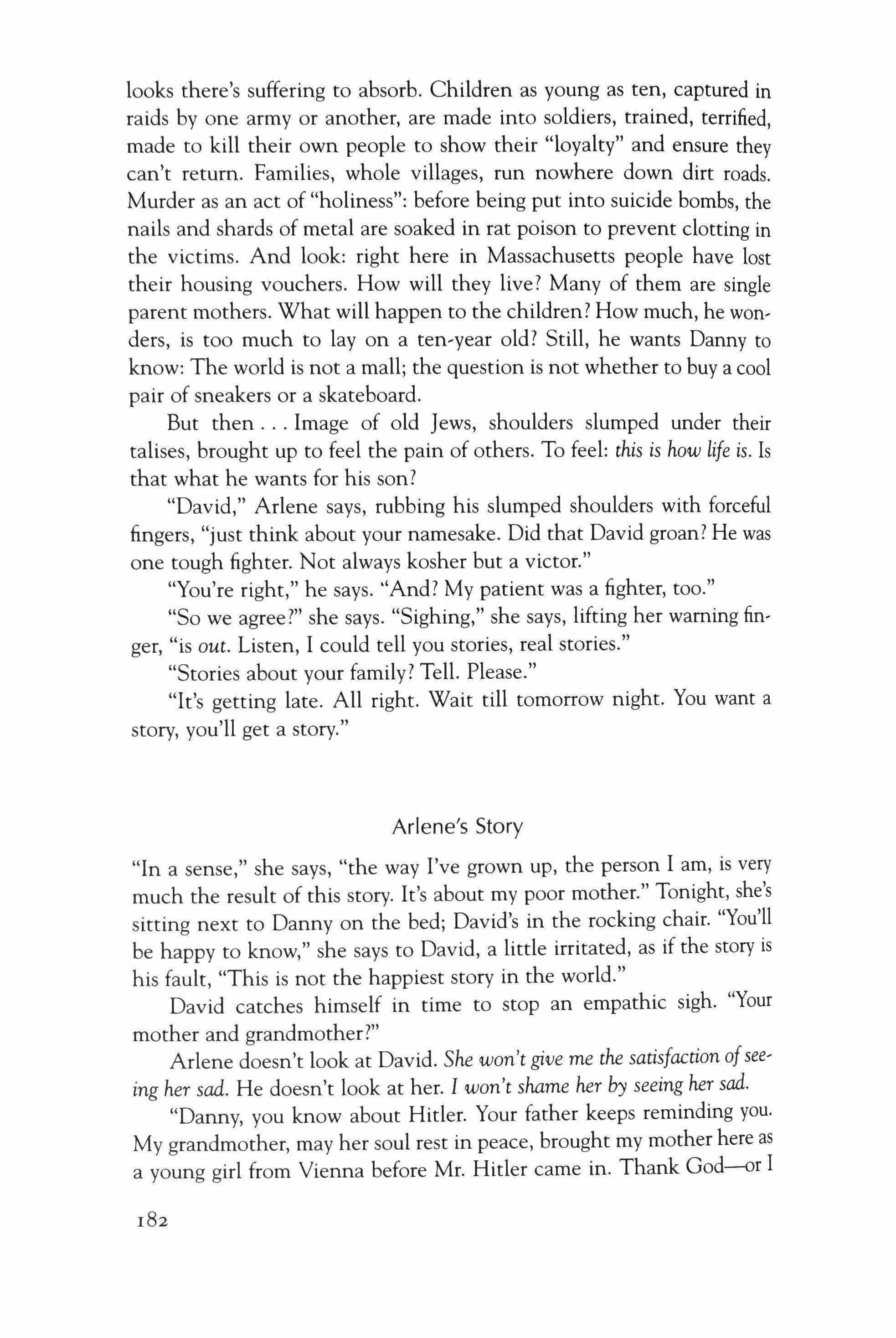
looks there's suffering to absorb. Children as young as ten, captured in raids by one army or another, are made into soldiers, trained, terrified, made to kill their own people to show their "loyalty" and ensure they can't return. Families, whole villages, run nowhere down dirt roads. Murder as an act of "holiness": before being put into suicide bombs, the nails and shards of metal are soaked in rat poison to prevent clotting in the victims. And look: right here in Massachusetts people have lost their housing vouchers. How will they live? Many of them are single parent mothers. What will happen to the children? How much, he wonders, is too much to lay on a ten-year old? Still, he wants Danny to know: The world is not a mall; the question is not whether to buy a cool pair of sneakers or a skateboard.
But then Image of old Jews, shoulders slumped under their talises, brought up to feel the pain of others. To feel: this is how life is. Is that what he wants for his son?
"David," Arlene says, rubbing his slumped shoulders with forceful fingers, "just think about your namesake. Did that David groan? He was one tough fighter. Not always kosher but a victor."
"You're right," he says. "And? My patient was a fighter, too."
"So we agree?" she says. "Sighing," she says, lifting her warning finger, "is out. Listen, I could tell you stories, real stories."
"Stories about your family? Tell. Please."
"It's getting late. All right. Wait till tomorrow night. You want a story, you'll get a story."
Arlene's Story
"In a sense," she says, "the way I've grown up, the person I am, is very much the result of this story. It's about my poor mother." Tonight, she's sitting next to Danny on the bed; David's in the rocking chair. "You'll be happy to know," she says to David, a little irritated, as if the story is his fault, "This is not the happiest story in the world."
David catches himself in time to stop an empathic sigh. "Your mother and grandmother?"
Arlene doesn't look at David. She won't give me the satisfaction of seeing her sad. He doesn't look at her. I won't shame her by seeing her sad.
"Danny, you know about Hitler. Your father keeps reminding you. My grandmother, may her soul rest in peace, brought my mother here as a young girl from Vienna before Mr. Hitler came in. Thank God-or I
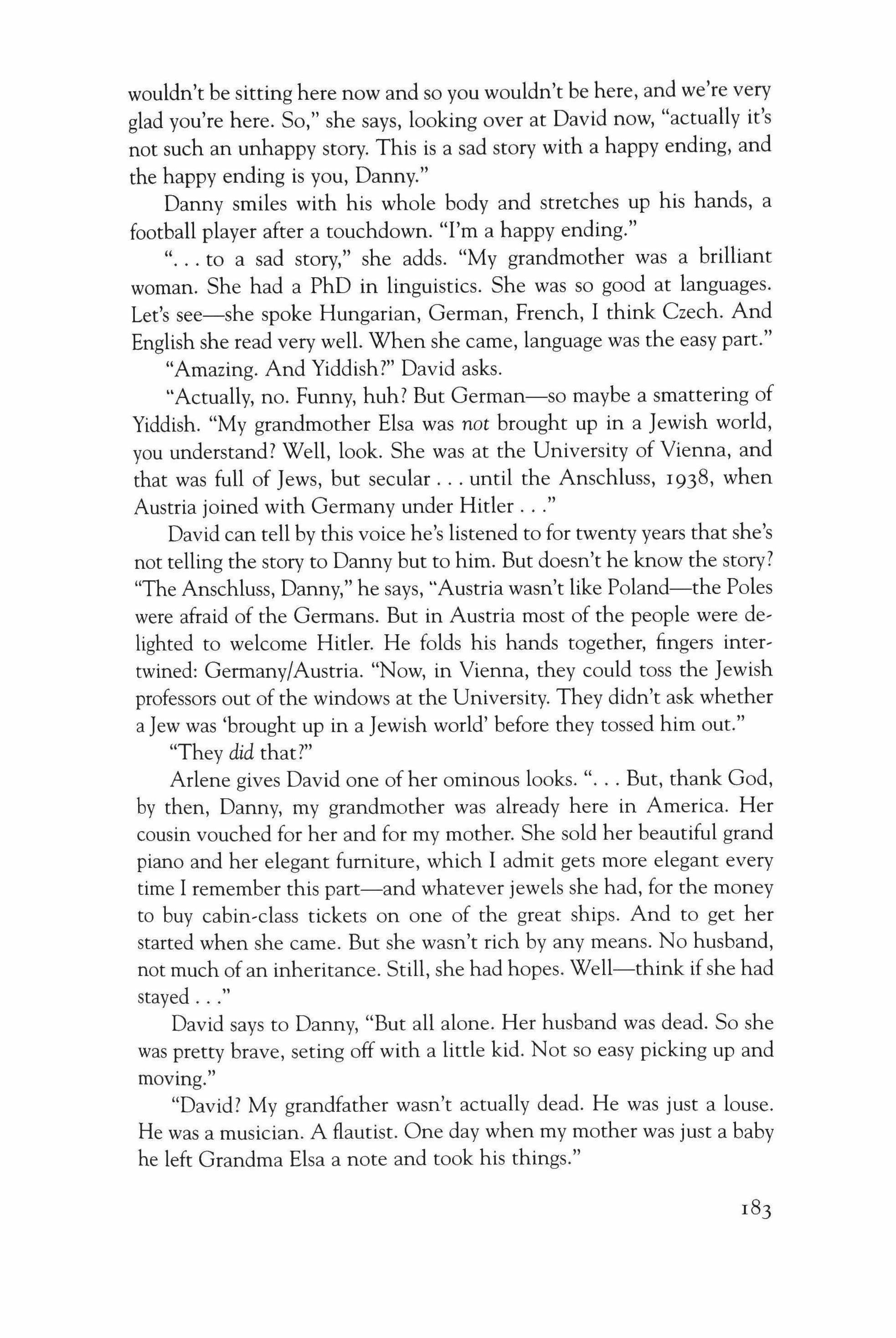
wouldn't be sitting here now and so you wouldn't be here, and we're very glad you're here. So," she says, looking over at David now, "actually it's not such an unhappy story. This is a sad story with a happy ending, and the happy ending is you, Danny."
Danny smiles with his whole body and stretches up his hands, a football player after a touchdown. "I'm a happy ending." to a sad story," she adds. "My grandmother was a brilliant woman. She had a PhD in linguistics. She was so good at languages. Let's see-she spoke Hungarian, German, French, I think Czech. And English she read very well. When she came, language was the easy part."
"Amazing. And Yiddish?" David asks.
"Actually, no. Funny, huh? But German-so maybe a smattering of Yiddish. "My grandmother Elsa was not brought up in a Jewish world, you understand? Well, look. She was at the University of Vienna, and that was full of Jews, but secular until the Anschluss, 1938, when Austria joined with Germany under Hitler "
David can tell by this voice he's listened to for twenty years that she's not telling the story to Danny but to him. But doesn't he know the story? "The Anschluss, Danny," he says, "Austria wasn't like Poland-the Poles were afraid of the Germans. But in Austria most of the people were delighted to welcome Hitler. He folds his hands together, fingers intertwined: Germany/Austria. "Now, in Vienna, they could toss the Jewish professors out of the windows at the University. They didn't ask whether a Jew was 'brought up in a Jewish world' before they tossed him out."
"They did that?"
Arlene gives David one of her ominous looks. " But, thank God, by then, Danny, my grandmother was already here in America. Her cousin vouched for her and for my mother. She sold her beautiful grand piano and her elegant furniture, which I admit gets more elegant every time I remember this part-and whatever jewels she had, for the money to buy cabin-class tickets on one of the great ships. And to get her started when she came. But she wasn't rich by any means. No husband, not much of an inheritance. Still, she had hopes. Well-think ifshe had stayed
David says to Danny, "But all alone. Her husband was dead. So she was pretty brave, seting off with a little kid. Not so easy picking up and moving."
"David? My grandfather wasn't actually dead. He was just a louse. He was a musician. A flautist. One day when my mother was just a baby he left Grandma Elsa a note and took his things."
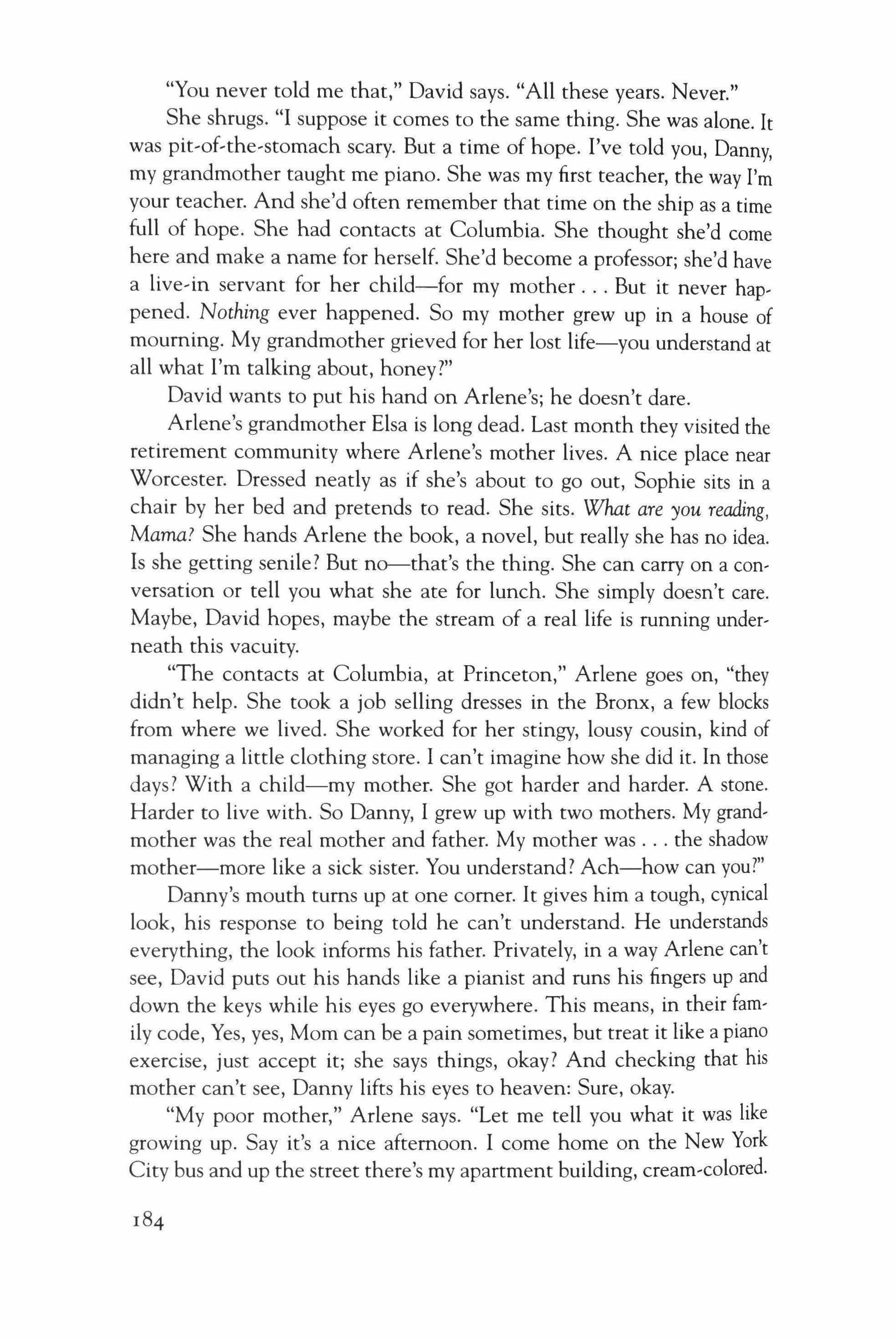
"You never told me that," David says. "All these years. Never."
She shrugs. "I suppose it comes to the same thing. She was alone. It was pit-of-the-stomach scary. But a time of hope. I've told you, Danny, my grandmother taught me piano. She was my first teacher, the way I'm your teacher. And she'd often remember that time on the ship as a time full of hope. She had contacts at Columbia. She thought she'd come here and make a name for herself. She'd become a professor; she'd have a live-in servant for her child-for my mother But it never happened. Nothing ever happened. So my mother grew up in a house of mourning. My grandmother grieved for her lost life-you understand at all what I'm talking about, honey?"
David wants to put his hand on Arlene's; he doesn't dare.
Arlene's grandmother Elsa is long dead. Last month they visited the retirement community where Arlene's mother lives. A nice place near Worcester. Dressed neatly as if she's about to go out, Sophie sits in a chair by her bed and pretends to read. She sits. What are you reading, Mama? She hands Arlene the book, a novel, but really she has no idea. Is she getting senile? But no-that's the thing. She can carry on a conversation or tell you what she ate for lunch. She simply doesn't care. Maybe, David hopes, maybe the stream of a real life is running underneath this vacuity.
"The contacts at Columbia, at Princeton," Arlene goes on, "they didn't help. She took a job selling dresses in the Bronx, a few blocks from where we lived. She worked for her stingy, lousy cousin, kind of managing a little clothing store. I can't imagine how she did it. In those days? With a child-my mother. She got harder and harder. A stone. Harder to live with. So Danny, I grew up with two mothers. My grandmother was the real mother and father. My mother was the shadow mother-more like a sick sister. You understand? Ach-how can you!"
Danny's mouth turns up at one comer. It gives him a tough, cynical look, his response to being told he can't understand. He understands everything, the look informs his father. Privately, in a way Arlene can't see, David puts out his hands like a pianist and runs his fingers up and down the keys while his eyes go everywhere. This means, in their family code, Yes, yes, Mom can be a pain sometimes, but treat it like a piano exercise, just accept it; she says things, okay? And checking that his mother can't see, Danny lifts his eyes to heaven: Sure, okay.
"My poor mother," Arlene says. "Let me tell you what it was like growing up. Say it's a nice afternoon. I come home on the New York City bus and up the street there's my apartment building, cream-colored-
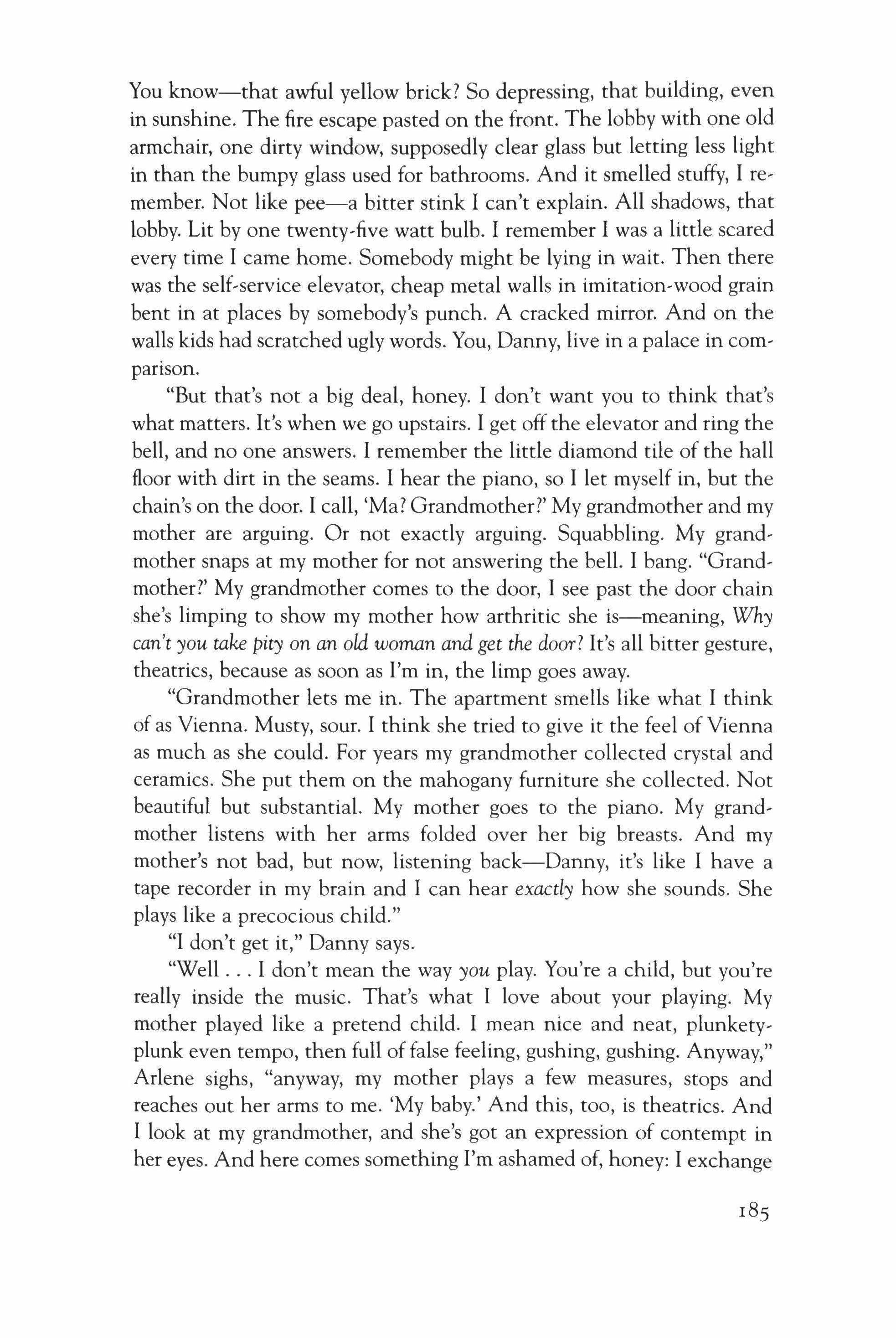
You know-that awful yellow brick? So depressing, that building, even in sunshine. The fire escape pasted on the front. The lobby with one old armchair, one dirty window, supposedly clear glass but letting less light in than the bumpy glass used for bathrooms. And it smelled stuffy, Ire, member. Not like pee-a bitter stink I can't explain. All shadows, that lobby. Lit by one twenty-five watt bulb. I remember I was a little scared every time I came home. Somebody might be lying in wait. Then there was the self-service elevator, cheap metal walls in imitation-wood grain bent in at places by somebody's punch. A cracked mirror. And on the walls kids had scratched ugly words. You, Danny, live in a palace in com' parison.
"But that's not a big deal, honey. I don't want you to think that's what matters. It's when we go upstairs. I get off the elevator and ring the bell, and no one answers. I remember the little diamond tile of the hall floor with dirt in the seams. I hear the piano, so I let myself in, but the chain's on the door. I call, 'Ma? Grandmother?' My grandmother and my mother are arguing. Or not exactly arguing. Squabbling. My grand, mother snaps at my mother for not answering the bell. I bang. "Grand, mother?' My grandmother comes to the door, I see past the door chain she's limping to show my mother how arthritic she is-meaning, Why can't you take pity on an old woman and get the door? It's all bitter gesture, theatrics, because as soon as I'm in, the limp goes away.
"Grandmother lets me in. The apartment smells like what I think of as Vienna. Musty, sour. I think she tried to give it the feel of Vienna as much as she could. For years my grandmother collected crystal and ceramics. She put them on the mahogany furniture she collected. Not beautiful but substantial. My mother goes to the piano. My grand, mother listens with her arms folded over her big breasts. And my mother's not bad, but now, listening back-Danny, it's like I have a tape recorder in my brain and I can hear exactly how she sounds. She plays like a precocious child."
"I don't get it," Danny says.
"Well I don't mean the way you play. You're a child, but you're really inside the music. That's what I love about your playing. My mother played like a pretend child. I mean nice and neat, plunketvplunk even tempo, then full of false feeling, gushing, gushing. Anyway," Arlene sighs, "anyway, my mother plays a few measures, stops and reaches out her arms to me. 'My baby.' And this, too, is theatrics. And I look at my grandmother, and she's got an expression of contempt in her eyes. And here comes something I'm ashamed of, honey: I exchange

a look with my grandmother to let her know I'm on her side. Why? Because she was where the power resided in our household. But I go over to my mother and stand like a wooden doll in her arms. And she says, Arlene, Arlene, my baby.' And there are tears in her eyes, but it's false feeling, and I wriggle free.
"And let's just say it's one of those days my mother turns from the piano and holds up her fingers like delicate crystal and says, 'Marna, maybe I should go to a conservatory.' Each time she said this it was as if it were for the first time. And my Grandmother Elsa says, 'Yes, yes, we've been through this a hundred times, Sophie. You know how absurd at your age .'
"Or my mother says, 'I'm lonely, Mama. I have you and Arlene, but I need other people.'
"'Didn't you decide to leave your husband? What in the world did you expect?' my grandmother says. You've got to understand-these lines, almost exactly the same, day after day.
"'This Friday night I think I'll go to temple.'
"And my grandmother says, 'And how many educated, eligible bachelors are you going to meet at services in the Bronx?' At first my mother had no intention of actually going to services."
"And then she went?"
"Finally she did. She went. Week after week-which was brave of her because when she came home, she faced contempt, contemptuous looks, faced silence, which was worst of all.
"My grandmother stayed strong-strong like a stone. She ran the shop. Her cousin sold the business, and that was a help. She didn't have to be beholden to him anymore. He used to come over on a Friday night when I was a little girl. He treated us like a charity case. Pat, pat, pat on my head and I was supposed to smile. So with her Ph.D. in Linguistics and her fine education, she ran a little hole-in-the-wall store and bought and sold dresses and got treated like poor-relations and came home to teach me piano and boss my mother around. My mother made the dinner and kept the house and cried a lot."
"Mom?" Danny interrupts. "I don't get it. Where's the story?"
"It's not a story like the stories you're used to. But all right. Here's my mother's story. She went to one of the best women's colleges, to Wellesley-"
"Grandma went to Wellesley?"
"That's part of why we're living here in Wellesley. My mother got honors in history, and right out of college she got married. A year later
186

I was born. Then her life folded. Danny. Give her a test, she'd get an 'A.' But she lost interest, or marriage scared her-she left her husbandI don't know why. She came home to her mother, your great grandmother. I was a baby. I never saw my father."
"She had a kind of breakdown," David says, "Give it a label."
"I'm sorry. You're right." David sees that Arlene's eyes are red. "I think about my grandmother with her languages and education and brains," Arlene says. "-Imagine what it was like not to use any of it, to work all day in a store and bring up her daughter all by herself. And the sad thing is, to do that at all, to give herself the energy to do that, she had to take it out on her daughter, to become the kind of person who would ruin her daughter, my mother."
"Why did your mom take it," Danny asks, "being bossed around? She should have gotten a job. Why didn't she get a job and go away with you?"
"Sure. She should have." A sigh. "But she became a child again, she reduced her life to simple things; and even those were too much for her. "My grandmother worked in the store and gave a few lessons. She didn't like teaching. And Danny, the decent thing about her, the noble thing, is that she stayed alive until I was old enough to take care of my mother. She must have been in terrible pain. She waited until I was out of college."
"I don't get it."
"Dear, I mean, then my grandmother killed herself."
"She killed herself? She killed herself? How, Mom? Did it hurt?"
"Hurt? No. She took pills. She laid out bankbooks and financial documents and a will and a letter to my mother and a letter to me. Very calm. Very clear-headed. Imagine-she even put a sheet ofpolyethylene under the sheets in case she soiled herself. She made sure I was the one to find her. Her letter asked me to take good care of my mother. So I became my mother's mother."
"And that's how you broke the cycle," David says.
"Your father means I didn't tum out like my mother."
"Well, isn't it true? You identified with your grandmother."
"You think I'm a stone, Davie?"
"Am I saying that? A stone? Would that break the cycle? No. But you run things. You teach with kindness. You play with heart. You get pretty severe, but you have a loving heart."
"You think I boss you around?"
"What's this-a quiz?"
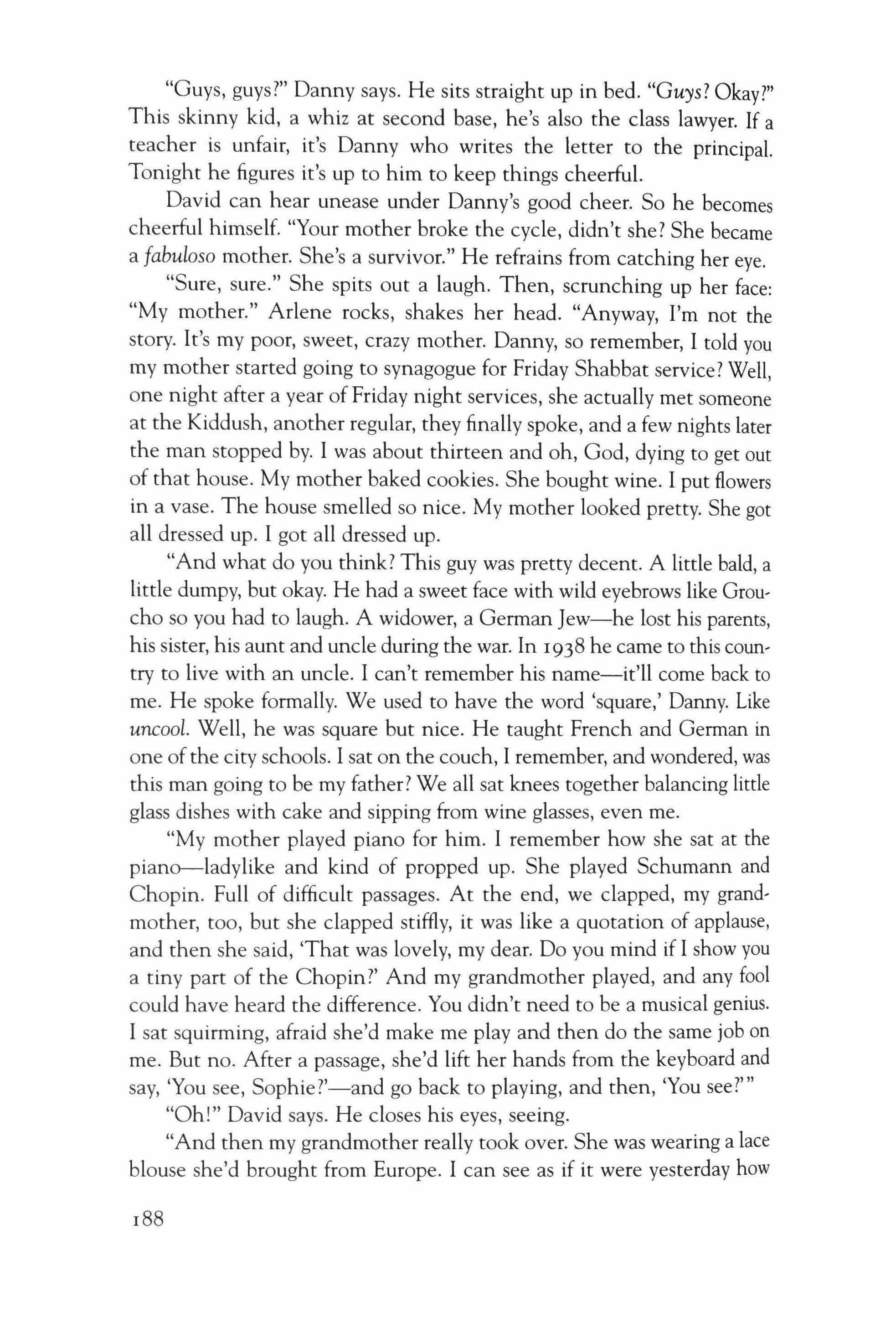
"Guys, guys?" Danny says. He sits straight up in bed. "Guys? Okay?" This skinny kid, a whiz at second base, he's also the class lawyer. If a teacher is unfair, it's Danny who writes the letter to the principal. Tonight he figures it's up to him to keep things cheerful.
David can hear unease under Danny's good cheer. So he becomes cheerful himself. "Your mother broke the cycle, didn't she? She became a fabuloso mother. She's a survivor." He refrains from catching her eye.
"Sure, sure." She spits out a laugh. Then, scrunching up her face: "My mother." Arlene rocks, shakes her head. "Anyway, I'm not the story. It's my poor, sweet, crazy mother. Danny, so remember, I told you my mother started going to synagogue for Friday Shabbat service? Well, one night after a year of Friday night services, she actually met someone at the Kiddush, another regular, they finally spoke, and a few nights later the man stopped by. I was about thirteen and oh, God, dying to get out of that house. My mother baked cookies. She bought wine. I put flowers in a vase. The house smelled so nice. My mother looked pretty. She got all dressed up. I got all dressed up.
"And what do you think? This guy was pretty decent. A little bald, a little dumpy, but okay. He had a sweet face with wild eyebrows like Groucho so you had to laugh. A widower, a German Jew-he lost his parents, his sister, his aunt and uncle during the war. In 1938 he came to this country to live with an uncle. I can't remember his name-it'll come back to me. He spoke formally. We used to have the word 'square,' Danny. Like uncool. Well, he was square but nice. He taught French and German in one ofthe city schools. I sat on the couch, I remember, and wondered, was this man going to be my father? We all sat knees together balancing little glass dishes with cake and sipping from wine glasses, even me.
"My mother played piano for him. I remember how she sat at the piano-ladylike and kind of propped up. She played Schumann and Chopin. Full of difficult passages. At the end, we clapped, my grandmother, too, but she clapped stiffly, it was like a quotation of applause, and then she said, 'That was lovely, my dear. Do you mind if I show you a tiny part of the Chopin?' And my grandmother played, and any fool could have heard the difference. You didn't need to be a musical genius. I sat squirming, afraid she'd make me play and then do the same job on me. But no. After a passage, she'd lift her hands from the keyboard and say, 'You see, Sophie?'-and go back to playing, and then, 'You see?'"
"Oh!" David says. He closes his eyes, seeing.
"And then my grandmother really took over. She was wearing a lace blouse she'd brought from Europe. I can see as if it were yesterday how
188
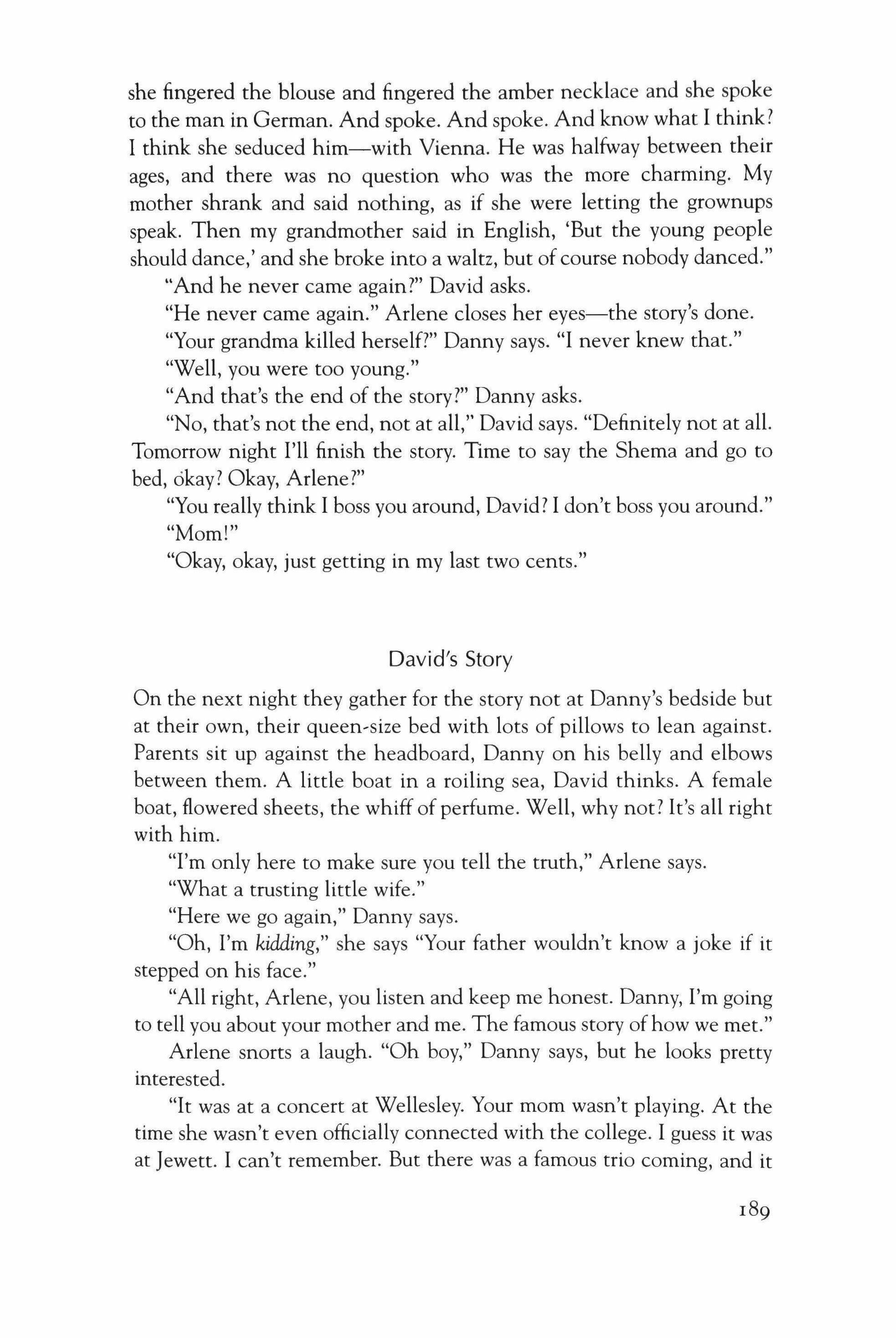
she fingered the blouse and fingered the amber necklace and she spoke to the man in German. And spoke. And spoke. And know what I think? I think she seduced him-with Vienna. He was halfway between their ages, and there was no question who was the more charming. My mother shrank and said nothing, as if she were letting the grownups speak. Then my grandmother said in English, 'But the young people should dance,' and she broke into a waltz, but of course nobody danced."
"And he never came again?" David asks.
"He never came again." Arlene closes her eyes-the story's done.
"Your grandma killed herself?" Danny says. "I never knew that."
"Well, you were too young."
"And that's the end of the story?" Danny asks.
"No, that's not the end, not at all," David says. "Definitely not at all. Tomorrow night I'll finish the story. Time to say the Sherna and go to bed, okay? Okay, Arlene?"
"You really think 1 boss you around, David? I don't boss you around."
"Mom!"
"Okay, okay, just getting in my last two cents."
David's Story
On the next night they gather for the story not at Danny's bedside but at their own, their queen-size bed with lots of pillows to lean against. Parents sit up against the headboard, Danny on his belly and elbows between them. A little boat in a roiling sea, David thinks. A female boat, flowered sheets, the whiff of perfume. Well, why not? It's all right with him.
"I'm only here to make sure you tell the truth," Arlene says.
"What a trusting little wife."
"Here we go again," Danny says.
"Oh, I'm kidding," she says "Your father wouldn't know a joke if it stepped on his face."
"All right, Arlene, you listen and keep me honest. Danny, I'm going to tell you about your mother and me. The famous story ofhow we met."
Arlene snorts a laugh. "Oh boy," Danny says, but he looks pretty interested.
"It was at a concert at Wellesley. Your mom wasn't playing. At the time she wasn't even officially connected with the college. 1 guess it was at Jewett. 1 can't remember. But there was a famous trio coming, and it
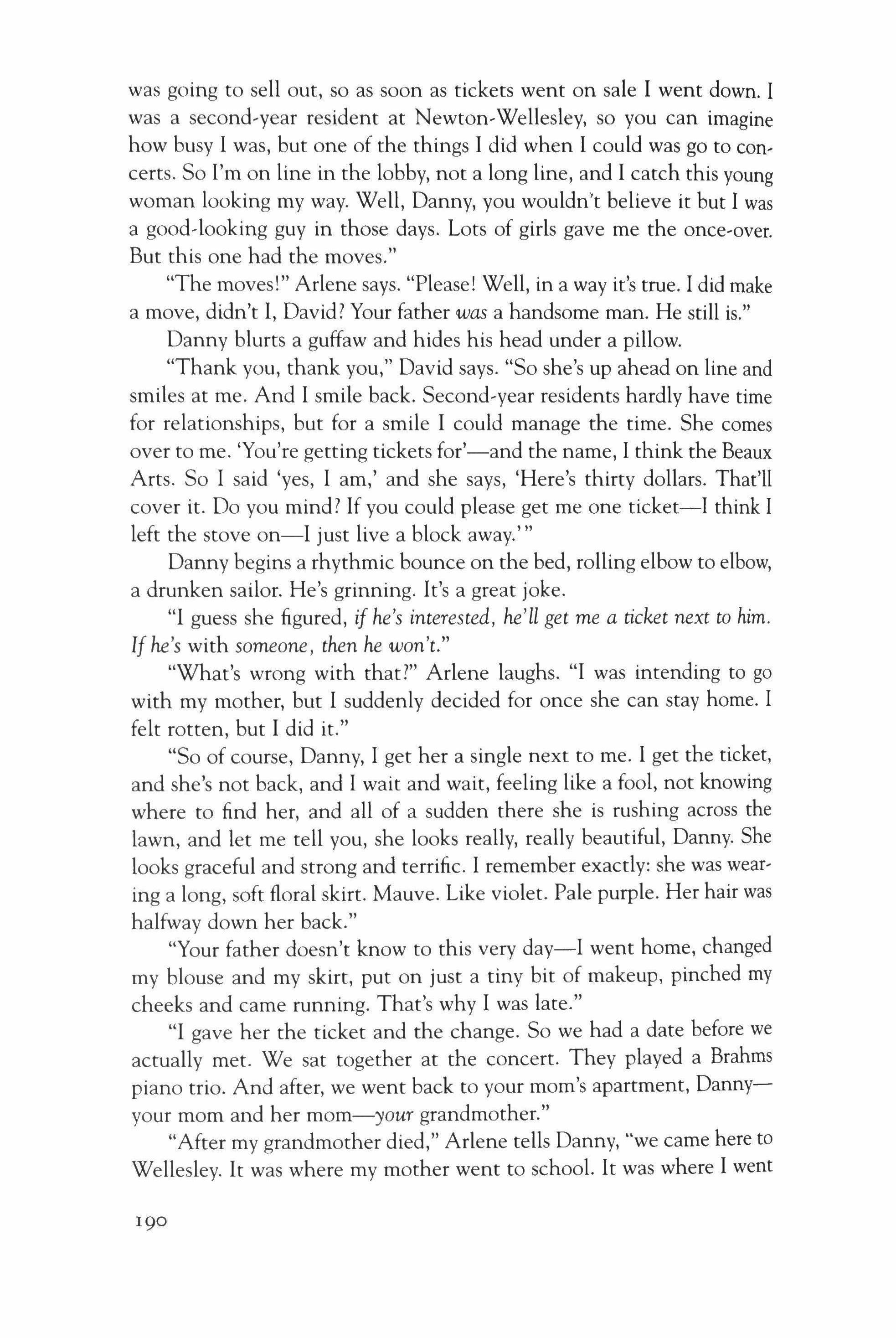
was going to sell out, so as soon as tickets went on sale I went down. I was a second-year resident at Newton-Wellesley, so you can imagine how busy I was, but one of the things I did when I could was go to concerts. So I'm on line in the lobby, not a long line, and I catch this young woman looking my way. Well, Danny, you wouldn't believe it but I was a good-looking guy in those days. Lots of girls gave me the once-over. But this one had the moves."
"The moves!" Arlene says. "Please! Well, in a way it's true. I did make a move, didn't I, David? Your father was a handsome man. He still is."
Danny blurts a guffaw and hides his head under a pillow.
"Thank you, thank you," David says. "So she's up ahead on line and smiles at me. And I smile back. Second-year residents hardly have time for relationships, but for a smile I could manage the time. She comes over to me. 'You're getting tickets for'-and the name, I think the Beaux Arts. So I said 'yes, I am,' and she says, 'Here's thirty dollars. That'll cover it. Do you mind? If you could please get me one ticket-I think I left the stove on-I just live a block away.'"
Danny begins a rhythmic bounce on the bed, rolling elbow to elbow, a drunken sailor. He's grinning. It's a great joke.
"I guess she figured, if he's interested, he'll get me a ticket next to him. If he's with someone, then he won't."
"What's wrong with that?" Arlene laughs. "I was intending to go with my mother, but I suddenly decided for once she can stay horne. I felt rotten, but I did it."
"So of course, Danny, I get her a single next to me. I get the ticket, and she's not back, and I wait and wait, feeling like a fool, not knowing where to find her, and all of a sudden there she is rushing across the lawn, and let me tell you, she looks really, really beautiful, Danny. She looks graceful and strong and terrific. I remember exactly: she was wearing a long, soft floral skirt. Mauve. Like violet. Pale purple. Her hair was halfway down her back."
"Your father doesn't know to this very day-I went home, changed my blouse and my skirt, put on just a tiny bit of makeup, pinched my cheeks and came running. That's why I was late."
"I gave her the ticket and the change. So we had a date before we actually met. We sat together at the concert. They played a Brahms piano trio. And after, we went back to your mom's apartment, Dannyyour mom and her mom-your grandmother."
"After my grandmother died," Arlene tells Danny, "we came here to Wellesley. It was where my mother went to school. It was where I went
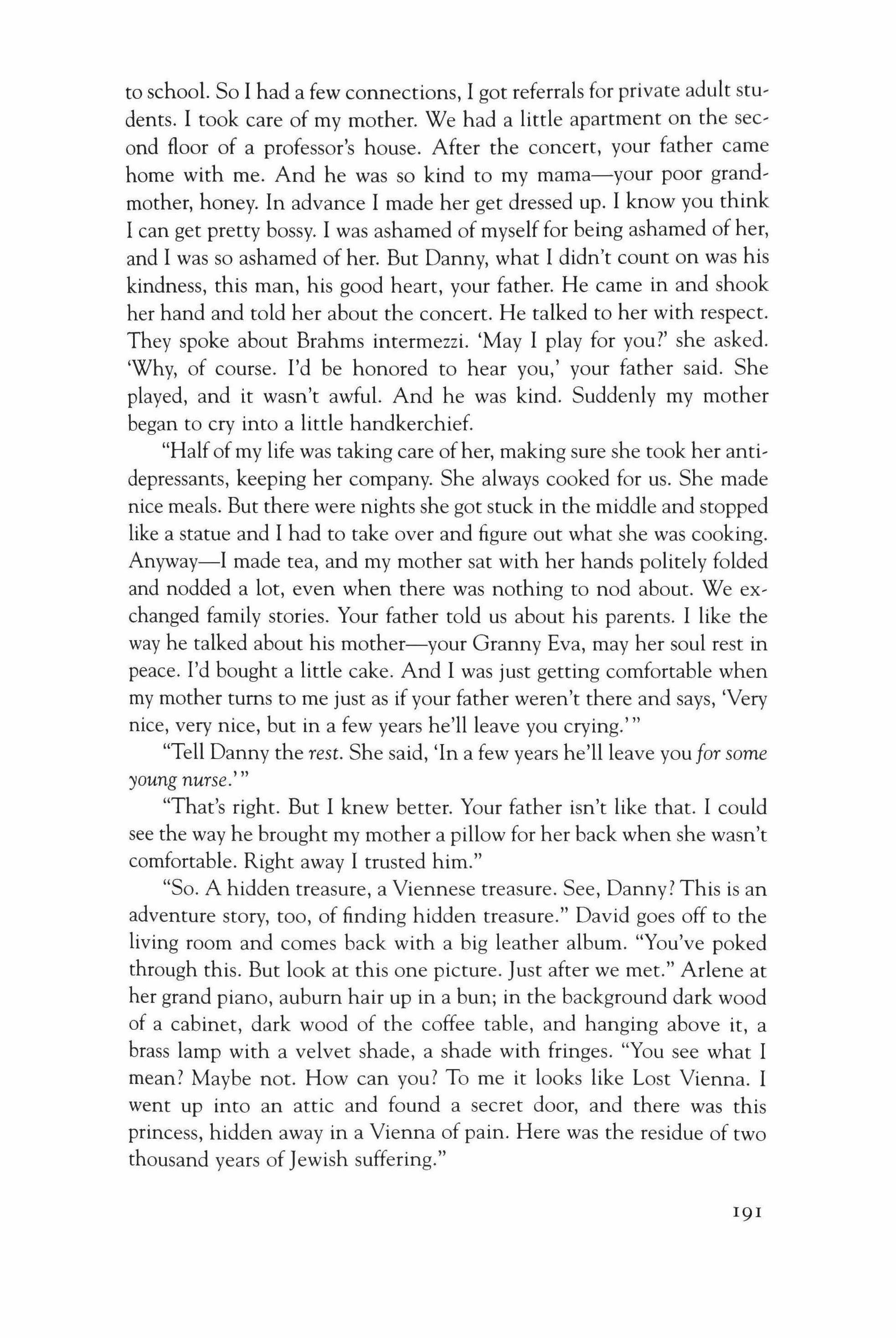
to school. So I had a few connections, I got referrals for private adult students. I took care of my mother. We had a little apartment on the second floor of a professor's house. After the concert, your father came home with me. And he was so kind to my mama-your poor grandmother, honey. In advance I made her get dressed up. I know you think I can get pretty bossy. I was ashamed of myself for being ashamed of her, and I was so ashamed of her. But Danny, what I didn't count on was his kindness, this man, his good heart, your father. He came in and shook her hand and told her about the concert. He talked to her with respect. They spoke about Brahms intermezzi. 'May I play for you?' she asked. 'Why, of course. I'd be honored to hear you,' your father said. She played, and it wasn't awful. And he was kind. Suddenly my mother began to cry into a little handkerchief.
"Halfof my life was taking care ofher, making sure she took her antidepressants, keeping her company. She always cooked for us. She made nice meals. But there were nights she got stuck in the middle and stopped like a statue and I had to take over and figure out what she was cooking. Anyway-I made tea, and my mother sat with her hands politely folded and nodded a lot, even when there was nothing to nod about. We exchanged family stories. Your father told us about his parents. I like the way he talked about his mother-your Granny Eva, may her soul rest in peace. I'd bought a little cake. And I was just getting comfortable when my mother turns to me just as if your father weren't there and says, 'Very nice, very nice, but in a few years he'll leave you crying.'"
"Tell Danny the rest. She said, 'In a few years he'll leave you for some young nurse.'''
"That's right. But I knew better. Your father isn't like that. I could see the way he brought my mother a pillow for her back when she wasn't comfortable. Right away I trusted him."
"So. A hidden treasure, a Viennese treasure. See, Danny? This is an adventure story, too, of finding hidden treasure." David goes off to the living room and comes back with a big leather album. "You've poked through this. But look at this one picture. Just after we met." Arlene at her grand piano, auburn hair up in a bun; in the background dark wood of a cabinet, dark wood of the coffee table, and hanging above it, a brass lamp with a velvet shade, a shade with fringes. "You see what I mean? Maybe not. How can you? To me it looks like Lost Vienna. I went up into an attic and found a secret door, and there was this princess, hidden away in a Vienna of pain. Here was the residue of two thousand years of Jewish suffering."
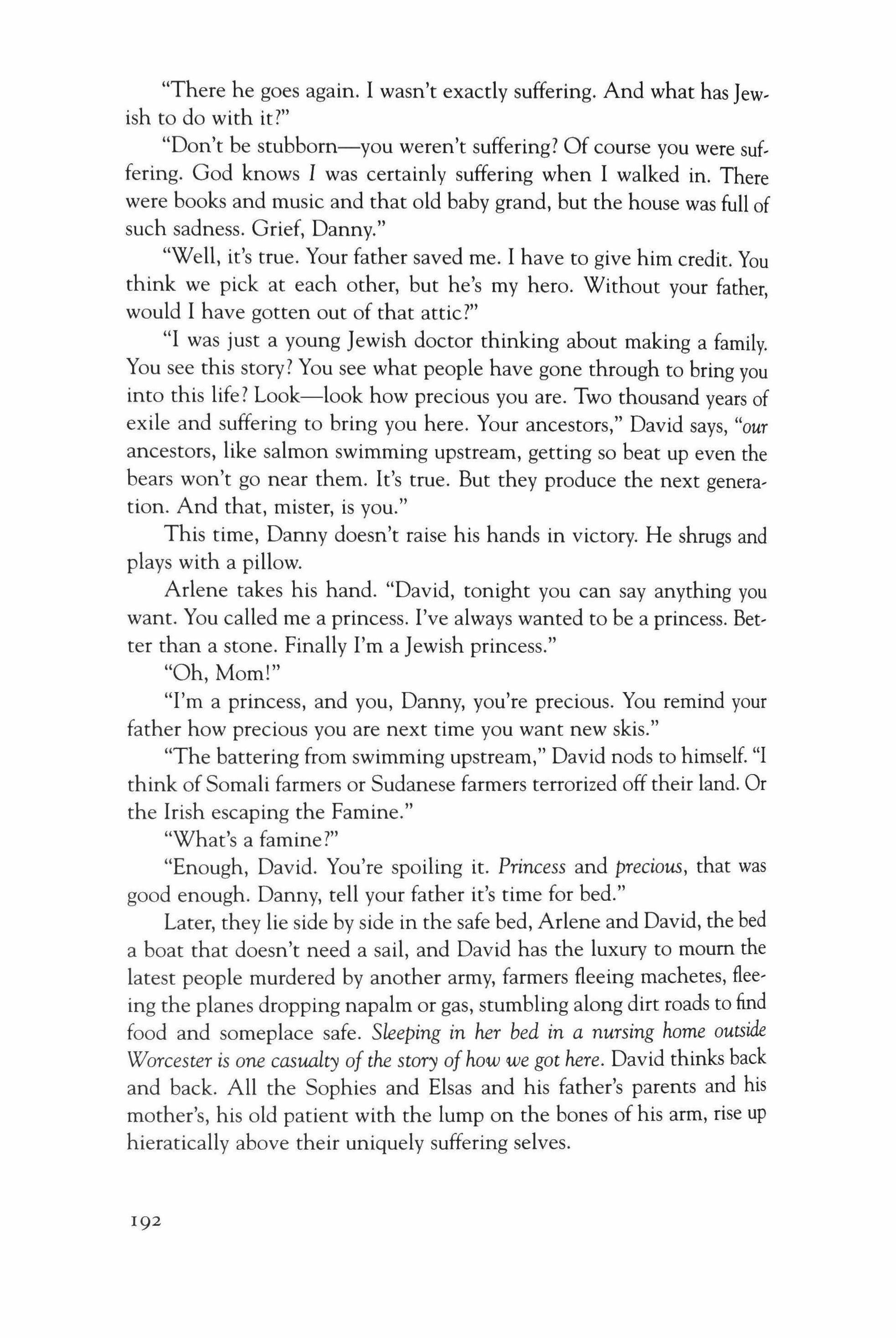
"There he goes again. I wasn't exactly suffering. And what has Jewish to do with it?"
"Don't be stubborn-you weren't suffering? Of course you were suffering. God knows I was certainly suffering when I walked in. There were books and music and that old baby grand, but the house was full of such sadness. Grief, Danny."
"Well, it's true. Your father saved me. I have to give him credit. You think we pick at each other, but he's my hero. Without your father, would I have gotten out of that attic?"
"I was just a young Jewish doctor thinking about making a family. You see this story? You see what people have gone through to bring you into this life? Look-look how precious you are. Two thousand years of exile and suffering to bring you here. Your ancestors," David says, "our ancestors, like salmon swimming upstream, getting so beat up even the bears won't go near them. It's true. But they produce the next generation. And that, mister, is you."
This time, Danny doesn't raise his hands in victory. He shrugs and plays with a pillow.
Arlene takes his hand. "David, tonight you can say anything you want. You called me a princess. I've always wanted to be a princess. Better than a stone. Finally I'm a Jewish princess."
"Oh, Mom!"
"I'm a princess, and you, Danny, you're precious. You remind your father how precious you are next time you want new skis."
"The battering from swimming upstream," David nods to himself. "I think of Somali farmers or Sudanese farmers terrorized off their land. Or the Irish escaping the Famine."
"What's a famine?"
"Enough, David. You're spoiling it. Princess and precious, that was good enough. Danny, tell your father it's time for bed."
Later, they lie side by side in the safe bed, Arlene and David, the bed a boat that doesn't need a sail, and David has the luxury to mourn the latest people murdered by another army, farmers fleeing machetes, fleeing the planes dropping napalm or gas, stumbling along dirt roads to find food and someplace safe. Sleeping in her bed in a nursing home outside Worcester is one casualty of the story ofhow we got here. David thinks back and back. All the Sophies and Elsas and his father's parents and his mother's, his old patient with the lump on the bones of his arm, rise up hieratically above their uniquely suffering selves.
Erika Dreifus
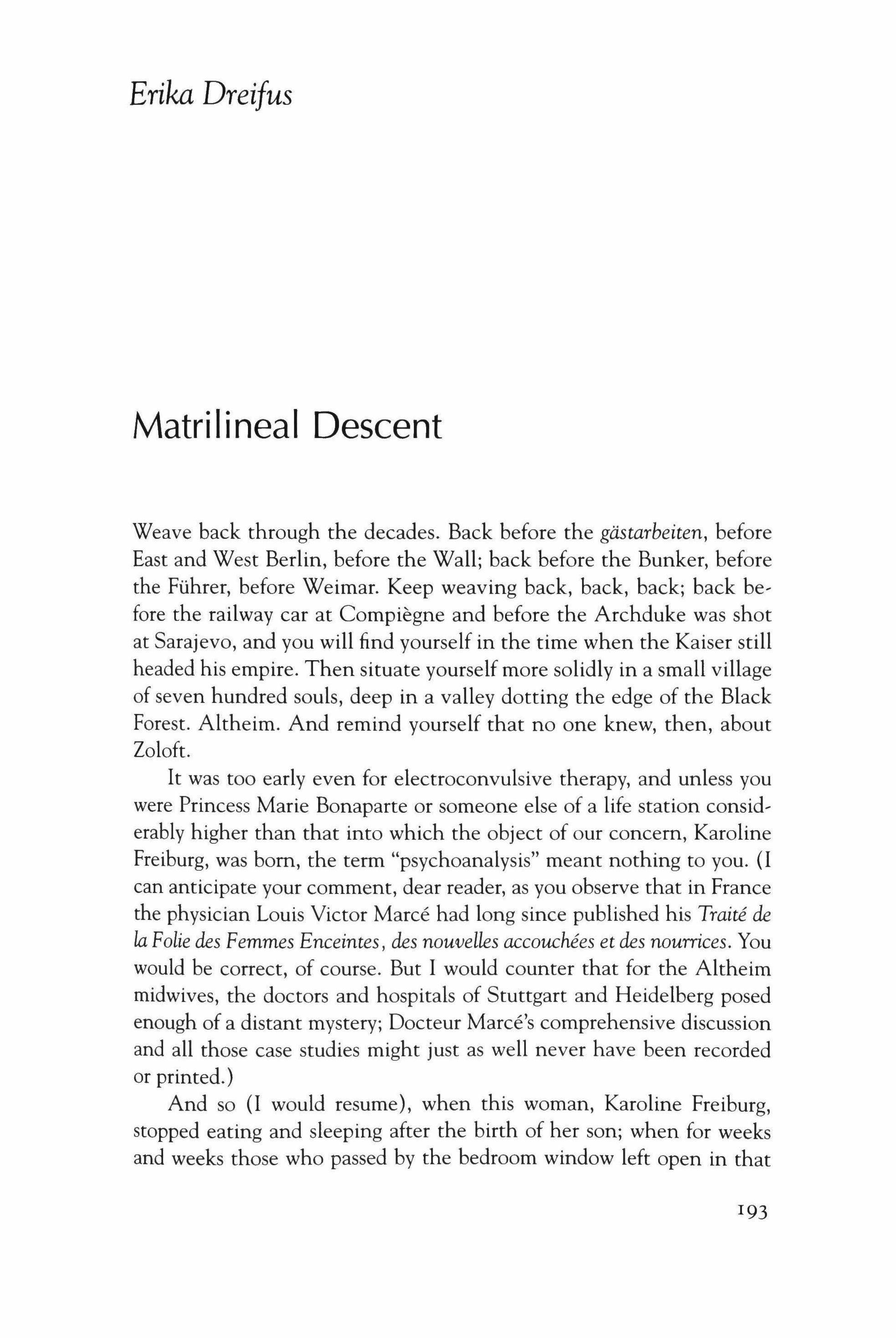
MatrilineaI Descent
Weave back through the decades. Back before the giistarbeiten, before East and West Berlin, before the Wall; back before the Bunker, before the Fuhrer, before Weimar. Keep weaving back, back, back; back before the railway car at Compiegne and before the Archduke was shot at Sarajevo, and you will find yourself in the time when the Kaiser still headed his empire. Then situate yourself more solidly in a small village of seven hundred souls, deep in a valley dotting the edge of the Black Forest. Altheim. And remind yourself that no one knew, then, about Zoloft.
It was too early even for electroconvulsive therapy, and unless you were Princess Marie Bonaparte or someone else of a life station considerably higher than that into which the object of our concern, Karoline Freiburg, was born, the term "psychoanalysis" meant nothing to you. (l can anticipate your comment, dear reader, as you observe that in France the physician Louis Victor Marce had long since published his Traiti de la Folie des Femmes Enceintes, des nouvelles accouchees et des nourrices. You would be correct, of course. But I would counter that for the Altheim midwives, the doctors and hospitals of Stuttgart and Heidelberg posed enough of a distant mystery; Docteur Marce's comprehensive discussion and all those case studies might just as well never have been recorded or printed.)
And so (l would resume), when this woman, Karoline Freiburg, stopped eating and sleeping after the birth of her son; when for weeks and weeks those who passed by the bedroom window left open in that
193
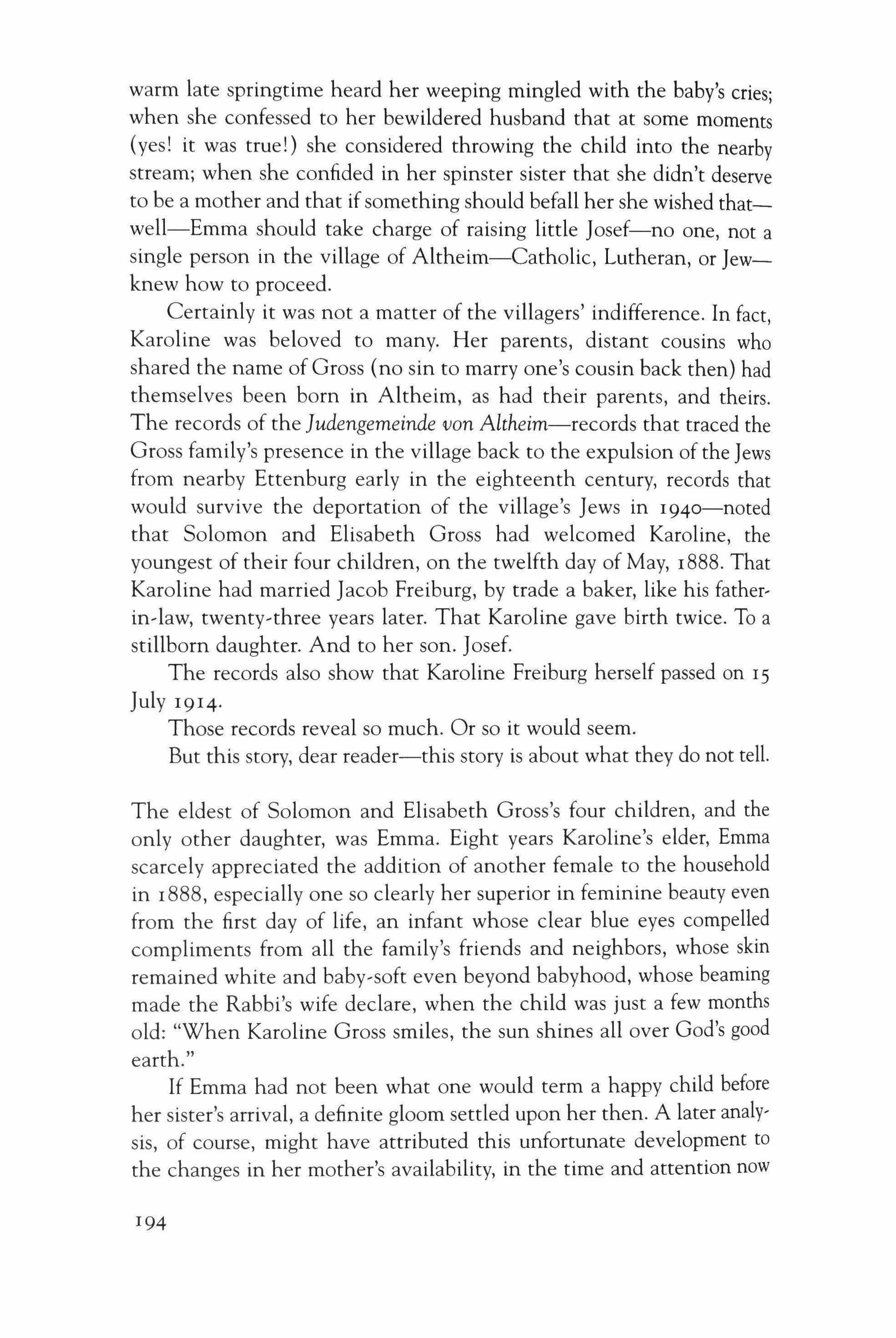
warm late springtime heard her weeping mingled with the baby's cries; when she confessed to her bewildered husband that at some moments (yes! it was truel ) she considered throwing the child into the nearby stream; when she confided in her spinster sister that she didn't deserve to be a mother and that ifsomething should befall her she wished thatwell-Emma should take charge of raising little Josef-no one, not a single person in the village of Altheim-Catholic, Lutheran, or Jewknew how to proceed.
Certainly it was not a matter of the villagers' indifference. In fact, Karoline was beloved to many. Her parents, distant cousins who shared the name of Gross (no sin to marry one's cousin back then) had themselves been born in Altheim, as had their parents, and theirs. The records of the ludengemeinde von Altheim-records that traced the Gross family's presence in the village back to the expulsion of the Jews from nearby Ettenburg early in the eighteenth century, records that would survive the deportation of the village's Jews in 194o-noted that Solomon and Elisabeth Gross had welcomed Karoline, the youngest of their four children, on the twelfth day of May, 1888. That Karoline had married Jacob Freiburg, by trade a baker, like his fatherin-law, twenty-three years later. That Karoline gave birth twice. To a stillborn daughter. And to her son. Josef.
The records also show that Karoline Freiburg herself passed on 15 July 1914.
Those records reveal so much. Or so it would seem.
But this story, dear reader-this story is about what they do not tell.
The eldest of Solomon and Elisabeth Gross's four children, and the only other daughter, was Emma. Eight years Karoline's elder, Emma scarcely appreciated the addition of another female to the household in 1888, especially one so clearly her superior in feminine beauty even from the first day of life, an infant whose clear blue eyes compelled compliments from all the family's friends and neighbors, whose skin remained white and baby-soft even beyond babyhood, whose beaming made the Rabbi's wife declare, when the child was just a few months old: "When Karoline Gross smiles, the sun shines all over God's good earth."
If Emma had not been what one would term a happy child before her sister's arrival, a definite gloom settled upon her then. A later analysis, of course, might have attributed this unfortunate development to the changes in her mother's availability, in the time and attention now
194
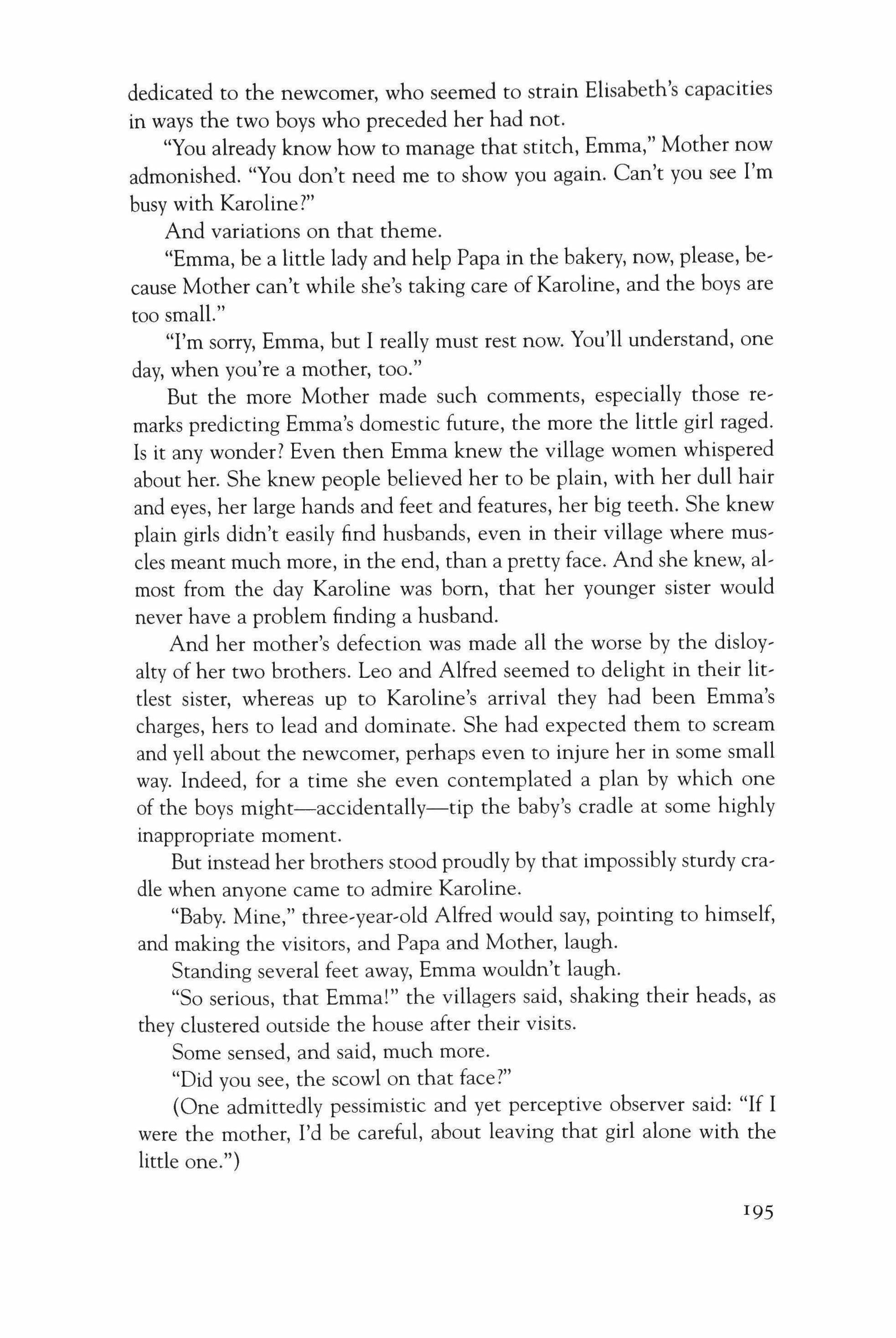
dedicated to the newcomer, who seemed to strain Elisabeth's capacities in ways the two boys who preceded her had not.
"You already know how to manage that stitch, Emma," Mother now admonished. "You don't need me to show you again. Can't you see I'm busy with Karoline?"
And variations on that theme.
"Emma, be a little lady and help Papa in the bakery, now, please, because Mother can't while she's taking care of Karoline, and the boys are too small."
"I'm sorry, Emma, but I really must rest now. You'll understand, one day, when you're a mother, too."
But the more Mother made such comments, especially those remarks predicting Emma's domestic future, the more the little girl raged. Is it any wonder? Even then Emma knew the village women whispered about her. She knew people believed her to be plain, with her dull hair and eyes, her large hands and feet and features, her big teeth. She knew plain girls didn't easily find husbands, even in their village where muscles meant much more, in the end, than a pretty face. And she knew, almost from the day Karoline was born, that her younger sister would never have a problem finding a husband.
And her mother's defection was made all the worse by the disloyalty of her two brothers. Leo and Alfred seemed to delight in their littlest sister, whereas up to Karoline's arrival they had been Emma's charges, hers to lead and dominate. She had expected them to scream and yell about the newcomer, perhaps even to injure her in some small way. Indeed, for a time she even contemplated a plan by which one of the boys might-accidentally-tip the baby's cradle at some highly inappropriate moment.
But instead her brothers stood proudly by that impossibly sturdy cradle when anyone came to admire Karoline.
"Baby. Mine," three-year-old Alfred would say, pointing to himself, and making the visitors, and Papa and Mother, laugh.
Standing several feet away, Emma wouldn't laugh.
"So serious, that Emma!" the villagers said, shaking their heads, as they clustered outside the house after their visits.
Some sensed, and said, much more.
"Did you see, the scowl on that face?"
(One admittedly pessimistic and yet perceptive observer said: "If I were the mother, I'd be careful, about leaving that girl alone with the little one.")
195
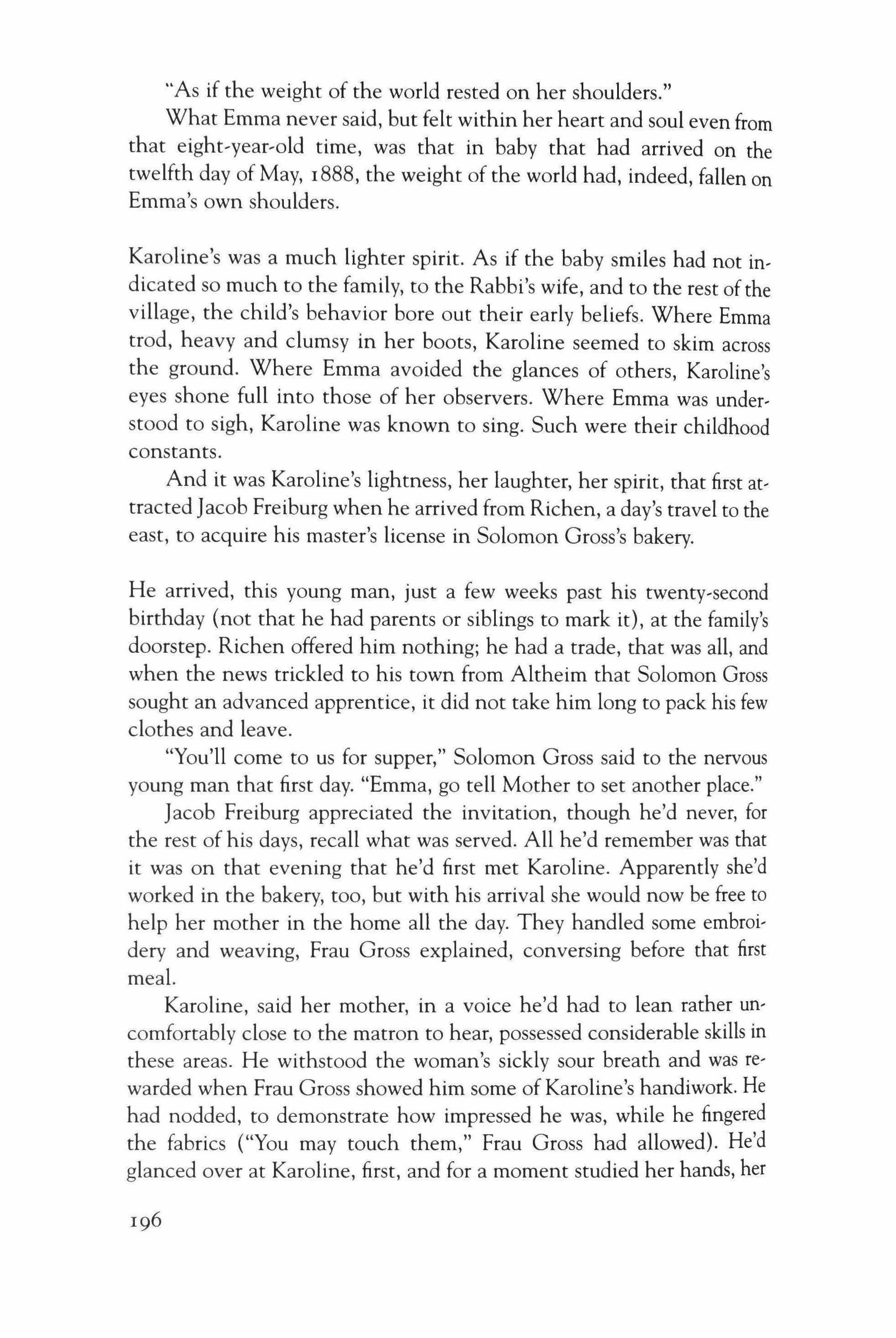
"As if the weight of the world rested on her shoulders."
What Emma never said, but felt within her heart and soul even from that eight-year-old time, was that in baby that had arrived on the twelfth day of May, 1888, the weight of the world had, indeed, fallen on Emma's own shoulders.
Karoline's was a much lighter spirit. As if the baby smiles had not indicated so much to the family, to the Rabbi's wife, and to the rest ofthe village, the child's behavior bore out their early beliefs. Where Emma trod, heavy and clumsy in her boots, Karoline seemed to skim across the ground. Where Emma avoided the glances of others, Karoline's eyes shone full into those of her observers. Where Emma was understood to sigh, Karoline was known to sing. Such were their childhood constants.
And it was Karoline's lightness, her laughter, her spirit, that first attracted Jacob Freiburg when he arrived from Richen, a day's travel to the east, to acquire his master's license in Solomon Gross's bakery.
He arrived, this young man, just a few weeks past his twenty-second birthday (not that he had parents or siblings to mark it), at the family's doorstep. Richen offered him nothing; he had a trade, that was all, and when the news trickled to his town from Altheim that Solomon Gross sought an advanced apprentice, it did not take him long to pack his few clothes and leave.
"You'll come to us for supper," Solomon Gross said to the nervous young man that first day. "Emma, go tell Mother to set another place."
Jacob Freiburg appreciated the invitation, though he'd never, for the rest of his days, recall what was served. All he'd remember was that it was on that evening that he'd first met Karoline. Apparently she'd worked in the bakery, too, but with his arrival she would now be free to help her mother in the home all the day. They handled some embroidery and weaving, Frau Gross explained, conversing before that first meal.
Karoline, said her mother, in a voice he'd had to lean rather uncomfortably close to the matron to hear, possessed considerable skills in these areas. He withstood the woman's sickly sour breath and was rewarded when Frau Gross showed him some of Karoline's handiwork. He had nodded, to demonstrate how impressed he was, while he fingered the fabrics ("You may touch them," Frau Gross had allowed). He'd glanced over at Karoline, first, and for a moment studied her hands, her
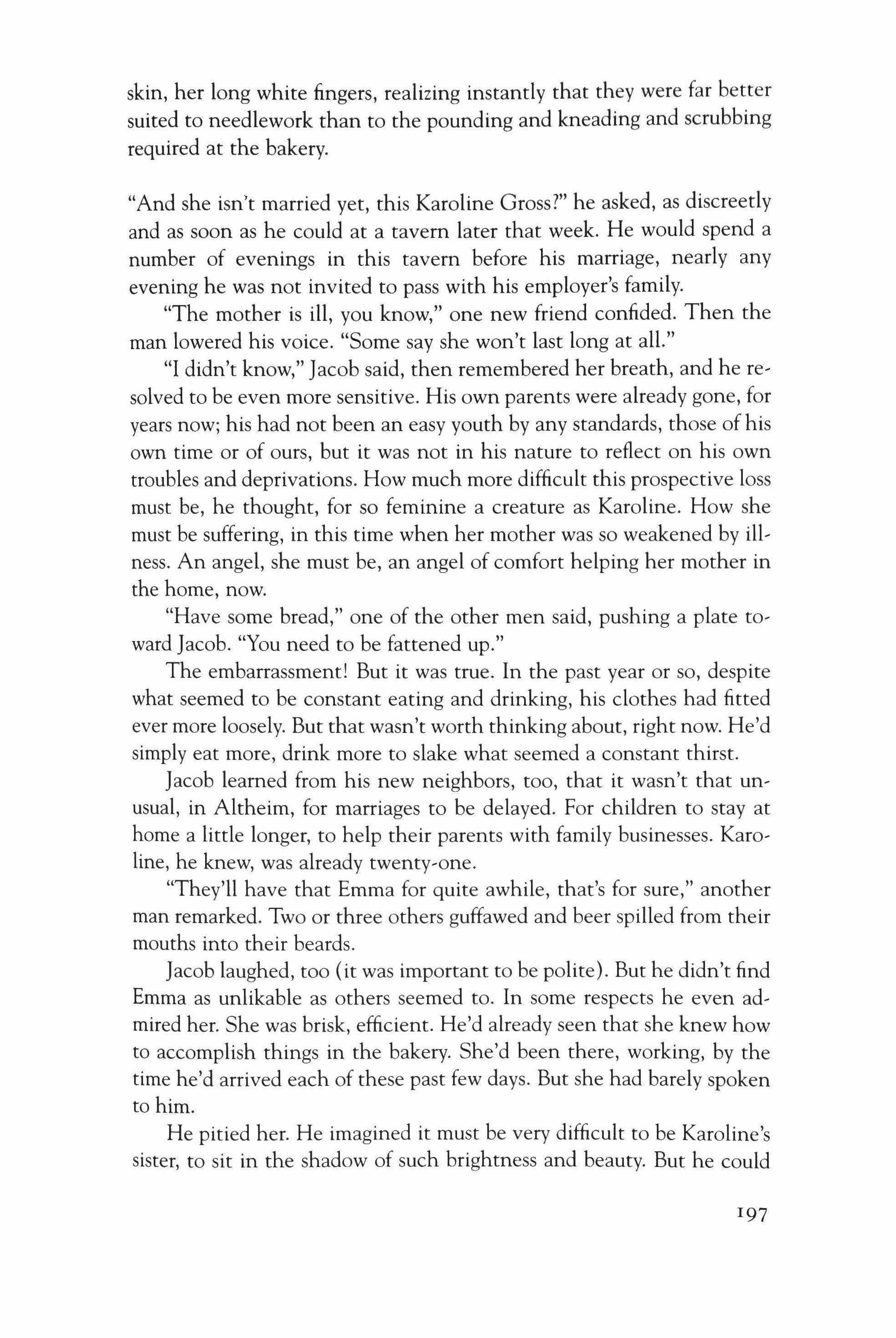
skin, her long white fingers, realizing instantly that they were far better suited to needlework than to the pounding and kneading and scrubbing required at the bakery.
"And she isn't married yet, this Karoline Gross?" he asked, as discreetly and as soon as he could at a tavern later that week. He would spend a number of evenings in this tavern before his marriage, nearly any evening he was not invited to pass with his employer's family.
"The mother is ill, you know," one new friend confided. Then the man lowered his voice. "Some say she won't last long at all."
"I didn't know," Jacob said, then remembered her breath, and he resolved to be even more sensitive. His own parents were already gone, for years now; his had not been an easy youth by any standards, those ofhis own time or of ours, but it was not in his nature to reflect on his own troubles and deprivations. How much more difficult this prospective loss must be, he thought, for so feminine a creature as Karoline. How she must be suffering, in this time when her mother was so weakened by illness. An angel, she must be, an angel of comfort helping her mother in the home, now.
"Have some bread," one of the other men said, pushing a plate toward Jacob. "You need to be fattened up."
The embarrassment! But it was true. In the past year or so, despite what seemed to be constant eating and drinking, his clothes had fitted ever more loosely. But that wasn't worth thinking about, right now. He'd simply eat more, drink more to slake what seemed a constant thirst.
Jacob learned from his new neighbors, too, that it wasn't that unusual, in Altheim, for marriages to be delayed. For children to stay at home a little longer, to help their parents with family businesses. Karoline, he knew, was already twenty-one.
"They'll have that Emma for quite awhile, that's for sure," another man remarked. Two or three others guffawed and beer spilled from their mouths into their beards.
Jacob laughed, too (it was important to be polite). But he didn't find Emma as unlikable as others seemed to. In some respects he even admired her. She was brisk, efficient. He'd already seen that she knew how to accomplish things in the bakery. She'd been there, working, by the time he'd arrived each of these past few days. But she had barely spoken to him.
He pitied her. He imagined it must be very difficult to be Karoline's sister, to sit in the shadow of such brightness and beauty. But he could
197
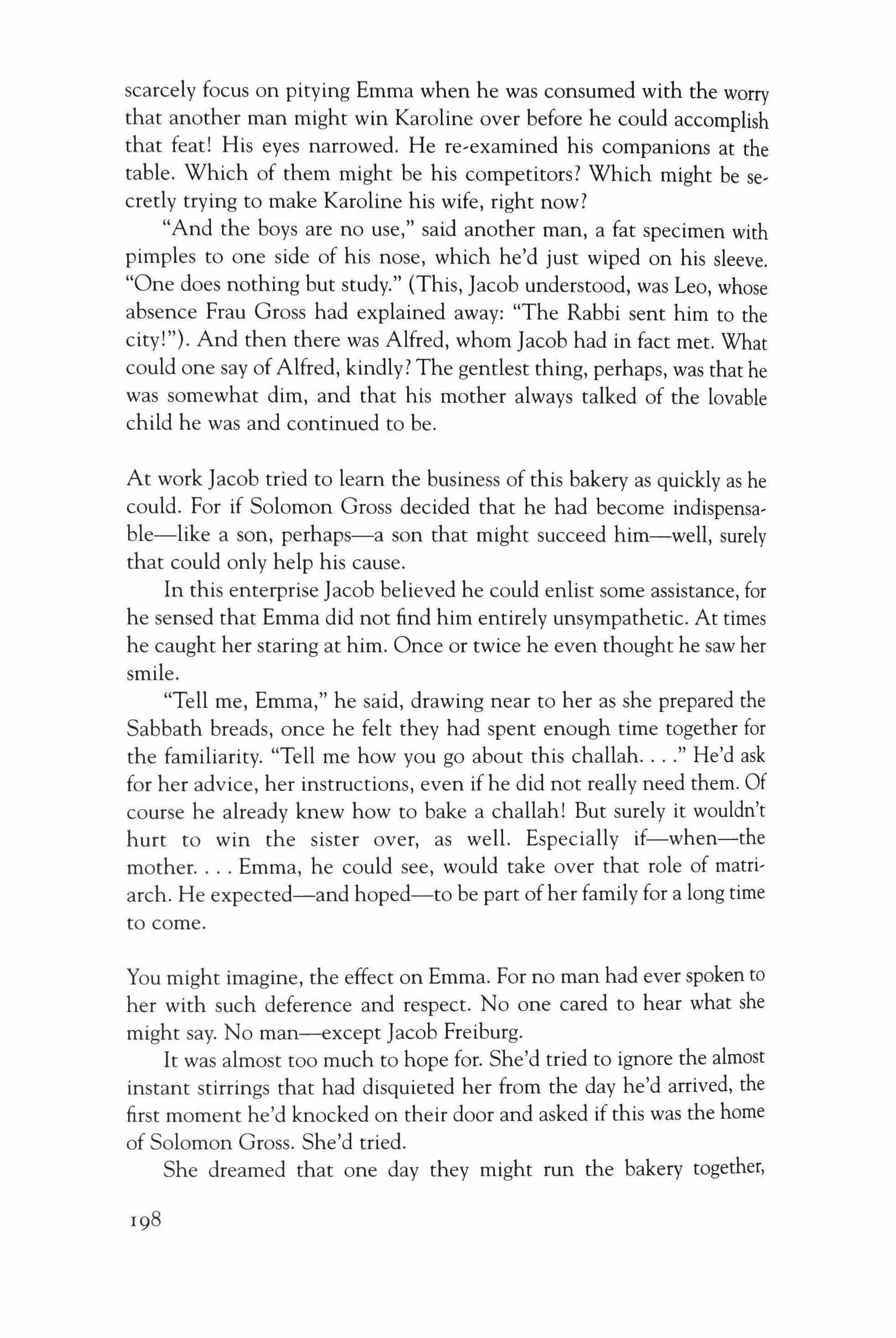
scarcely focus on pitying Emma when he was consumed with the worry that another man might win Karoline over before he could accomplish that feat! His eyes narrowed. He re-examined his companions at the table. Which of them might be his competitors? Which might be secretly trying to make Karoline his wife, right now?
"And the boys are no use," said another man, a fat specimen with pimples to one side of his nose, which he'd just wiped on his sleeve. "One does nothing but study." (This, Jacob understood, was Leo, whose absence Frau Gross had explained away: "The Rabbi sent him to the city!"). And then there was Alfred, whom Jacob had in fact met. What could one say ofAlfred, kindly? The gentlest thing, perhaps, was that he was somewhat dim, and that his mother always talked of the lovable child he was and continued to be.
At work Jacob tried to learn the business of this bakery as quickly as he could. For if Solomon Gross decided that he had become indispensable-like a son, perhaps-a son that might succeed him-well, surely that could only help his cause.
In this enterprise Jacob believed he could enlist some assistance, for he sensed that Emma did not find him entirely unsympathetic. At times he caught her staring at him. Once or twice he even thought he saw her smile.
"Tell me, Emma," he said, drawing near to her as she prepared the Sabbath breads, once he felt they had spent enough time together for the familiarity. "Tell me how you go about this challah He'd ask for her advice, her instructions, even if he did not really need them. Of course he already knew how to bake a challah! But surely it wouldn't hurt to win the sister over, as well. Especially if-when-the mother Emma, he could see, would take over that role of matriarch. He expected-and hoped-to be part ofher family for a long time to come.
You might imagine, the effect on Emma. For no man had ever spoken to her with such deference and respect. No one cared to hear what she might say. No man-except Jacob Freiburg.
It was almost too much to hope for. She'd tried to ignore the almost instant stirrings that had disquieted her from the day he'd arrived, the first moment he'd knocked on their door and asked if this was the home of Solomon Gross. She'd tried.
She dreamed that one day they might run the bakery together,
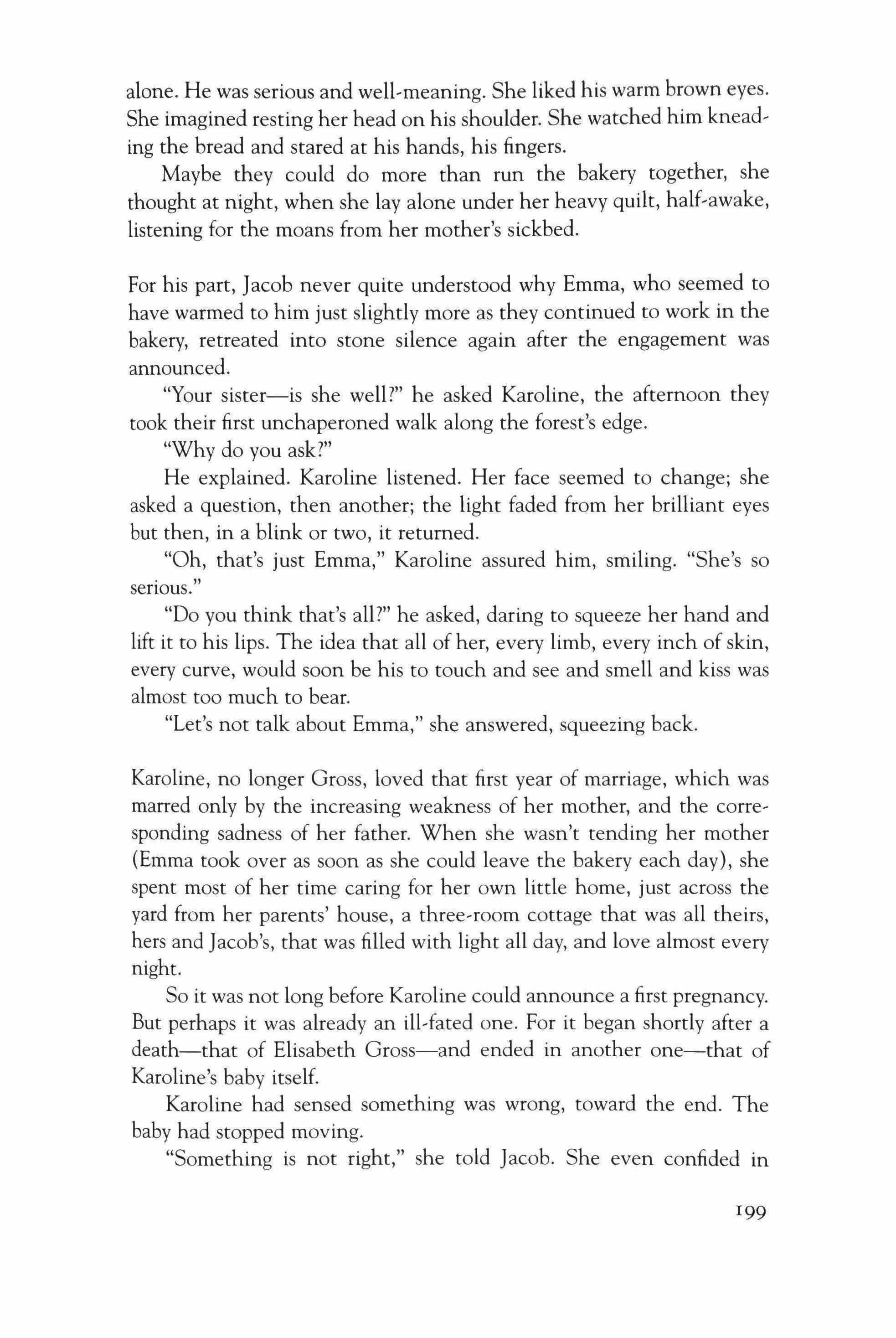
alone. He was serious and well-meaning. She liked his warm brown eyes. She imagined resting her head on his shoulder. She watched him kneading the bread and stared at his hands, his fingers.
Maybe they could do more than run the bakery together, she thought at night, when she lay alone under her heavy quilt, half-awake, listening for the moans from her mother's sickbed.
For his part, Jacob never quite understood why Emma, who seemed to have warmed to him just slightly more as they continued to work in the bakery, retreated into stone silence again after the engagement was announced.
"Your sister-is she well?" he asked Karoline, the afternoon they took their first unchaperoned walk along the forest's edge.
"Why do you ask?"
He explained. Karoline listened. Her face seemed to change; she asked a question, then another; the light faded from her brilliant eyes but then, in a blink or two, it returned.
"Oh, that's just Emma," Karoline assured him, smiling. "She's so senous.
"Do you think that's all?" he asked, daring to squeeze her hand and lift it to his lips. The idea that all of her, every limb, every inch of skin, every curve, would soon be his to touch and see and smell and kiss was almost too much to bear.
"Let's not talk about Emma," she answered, squeezing back.
Karoline, no longer Gross, loved that first year of marriage, which was marred only by the increasing weakness of her mother, and the corresponding sadness of her father. When she wasn't tending her mother (Emma took over as soon as she could leave the bakery each day), she spent most of her time caring for her own little home, just across the yard from her parents' house, a three-room cottage that was all theirs, hers and Jacob's, that was filled with light all day, and love almost every night.
So it was not long before Karoline could announce a first pregnancy. But perhaps it was already an ill-fated one. For it began shortly after a death-that of Elisabeth Gross-and ended in another one-that of Karoline's baby itself.
Karoline had sensed something was wrong, toward the end. The baby had stopped moving.
"Something is not right," she told Jacob. She even confided in
199
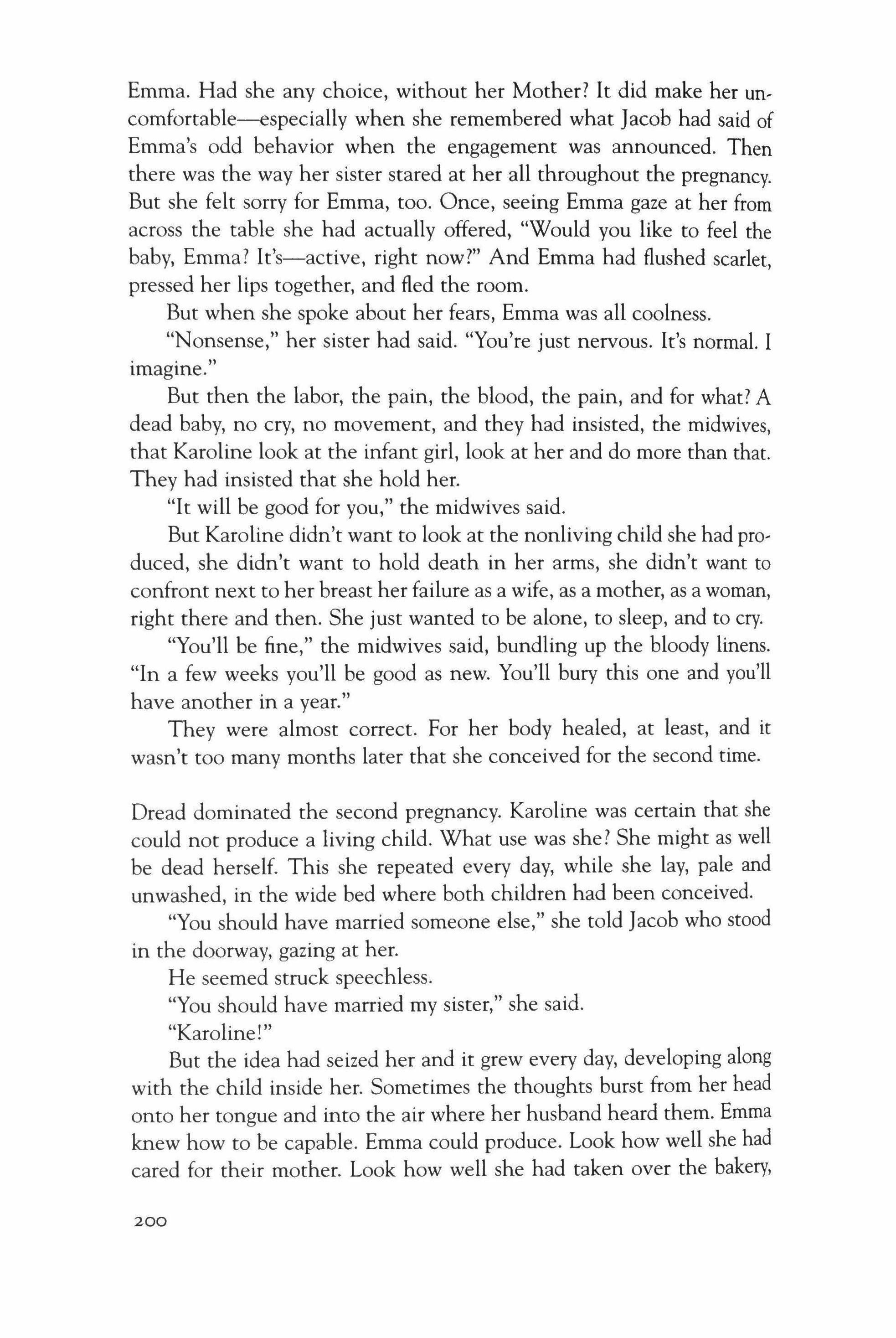
Emma. Had she any choice, without her Mother? It did make her uncomfortable-especially when she remembered what Jacob had said of Emma's odd behavior when the engagement was announced. Then there was the way her sister stared at her all throughout the pregnancy. But she felt sorry for Emma, too. Once, seeing Emma gaze at her from across the table she had actually offered, "Would you like to feel the baby, Emma? It's-active, right now?" And Emma had flushed scarlet, pressed her lips together, and fled the room.
But when she spoke about her fears, Emma was all coolness.
"Nonsense," her sister had said. "You're just nervous. It's normal. I imagine."
But then the labor, the pain, the blood, the pain, and for what? A dead baby, no cry, no movement, and they had insisted, the midwives, that Karoline look at the infant girl, look at her and do more than that. They had insisted that she hold her.
"It will be good for you," the midwives said.
But Karoline didn't want to look at the nonliving child she had produced, she didn't want to hold death in her arms, she didn't want to confront next to her breast her failure as a wife, as a mother, as a woman, right there and then. She just wanted to be alone, to sleep, and to cry.
"You'll be fine," the midwives said, bundling up the bloody linens. "In a few weeks you'll be good as new. You'll bury this one and you'll have another in a year."
They were almost correct. For her body healed, at least, and it wasn't too many months later that she conceived for the second time.
Dread dominated the second pregnancy. Karoline was certain that she could not produce a living child. What use was she? She might as well be dead herself. This she repeated every day, while she lay, pale and unwashed, in the wide bed where both children had been conceived.
"You should have married someone else," she told Jacob who stood in the doorway, gazing at her.
He seemed struck speechless.
"You should have married my sister," she said.
"Karoline!"
But the idea had seized her and it grew every day, developing along with the child inside her. Sometimes the thoughts burst from her head onto her tongue and into the air where her husband heard them. Emma knew how to be capable. Emma could produce. Look how well she had cared for their mother. Look how well she had taken over the bakery,
200

now that Papa was so sad and silent he could barely shuffle to the baking table every day. (Loyal as she was, Karoline knew she could not credit Jacob with the business's survival.) And if Emma had delivered a stillborn child (God forbidl) you could be sure she wouldn't be sitting around all day, sighing and weeping and sleeping.
"Karoline, dearest," Jacob ventured one day. "Perhaps we might go for a walk? Just out behind the house? By the stream, perhaps?" He paused. "It would do you good-and the baby, too-." Here he stared at her round belly, rising beneath the sheet. "To get some air?"
She said nothing.
Jacob paused, then an expression came over his face, as ifhe had dis, covered a pot of gold.
"Karoline, my love, I only suggested it because-I asked Emma first and-well, she thought it was a good idea."
Karoline turned in the bed, to avoid her husband's stare. After what must have been several long minutes she pulled herself upright.
"Find my shoes," she said.
This baby survived the birth, but his mother nearly did not. So weak was she that she could not nurse him for the first week; she could not venture from her bed to sit, comforted by the other women, while the men attended his ritual circumcision; for nearly three weeks she could not even hold him without the support of a pillow and her sister's close and watchful eye. And then, when others expected her to shower him with the love she might have given his elder sister, she waited for others to lift him, crying, from his cradle and bring him to her breast.
"What kind of mother am I?" she wondered, aloud, while Emma placed the crying baby back in the cradle Karoline herself had once occupied, the cradle Emma had once studied while complicated thoughts boiled within her head.
Staring at the baby, Emma said only: "He looks exactly like his father."
No reassurances from Karoline's husband sufficed. No declarations of love and gratitude for the remarkable gift she had given him-a son to name for his own departed father!-no protestations that in mother, hood she was even more beautiful than she had been as a maiden could convince her of her value in Jacob's eyes.
"Look at me," she said. "Look how pale. Look-." She pointed to this mark, to that fold, to anything that could possibly be construed as a blemish.
201
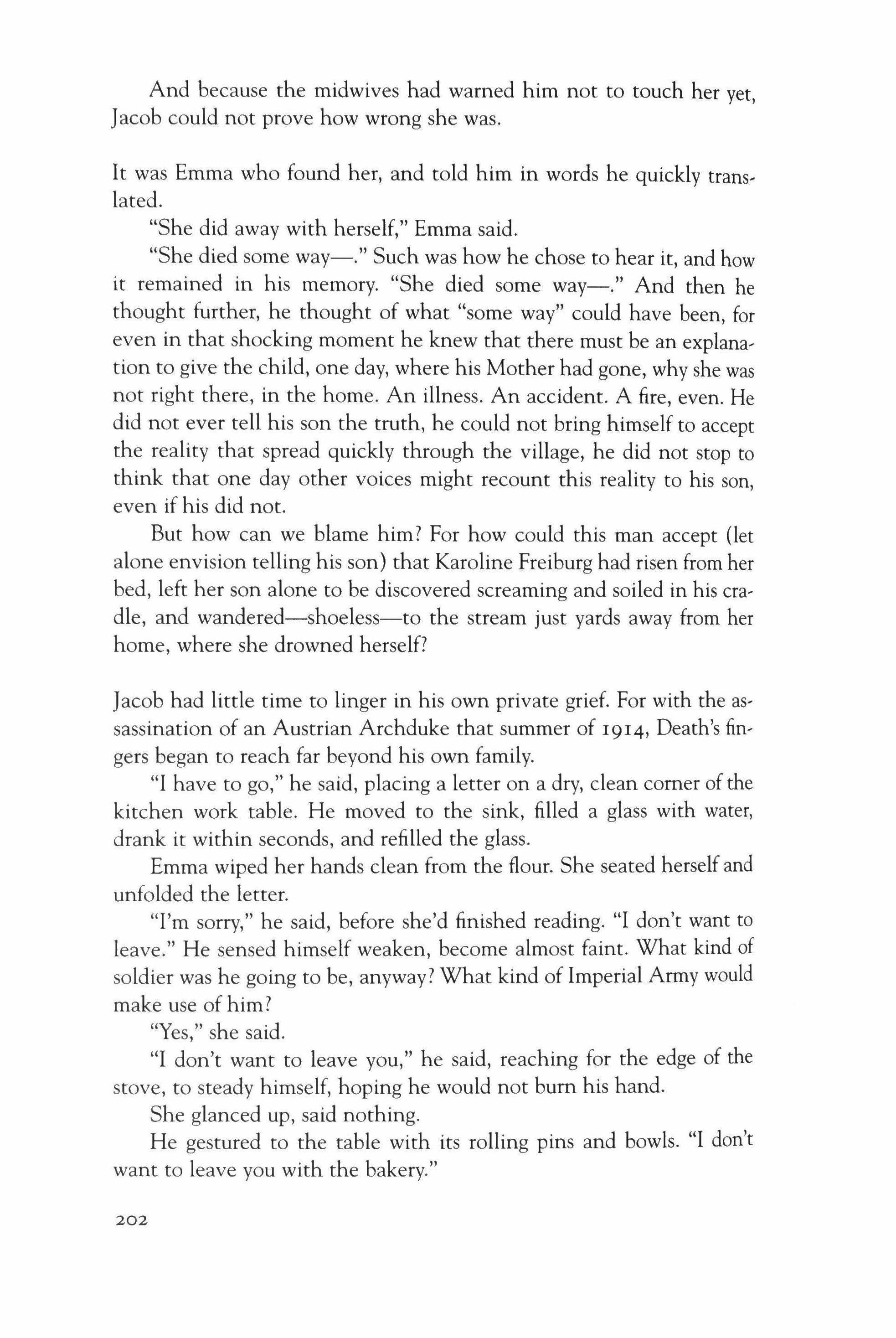
And because the midwives had warned him not to touch her yet, Jacob could not prove how wrong she was.
It was Emma who found her, and told him in words he quickly translated.
"She did away with herself," Emma said.
"She died some way-." Such was how he chose to hear it, and how it remained in his memory. "She died some way-." And then he thought further, he thought of what "some way" could have been, for even in that shocking moment he knew that there must be an explanation to give the child, one day, where his Mother had gone, why she was not right there, in the home. An illness. An accident. A fire, even. He did not ever tell his son the truth, he could not bring himself to accept the reality that spread quickly through the village, he did not stop to think that one day other voices might recount this reality to his son, even if his did not.
But how can we blame him? For how could this man accept (let alone envision telling his son) that Karoline Freiburg had risen from her bed, left her son alone to be discovered screaming and soiled in his cradle, and wandered-shoeless-to the stream just yards away from her home, where she drowned herself?
Jacob had little time to linger in his own private grief. For with the assassination of an Austrian Archduke that summer of 1914, Death's fingers began to reach far beyond his own family.
"I have to go," he said, placing a letter on a dry, clean corner of the kitchen work table. He moved to the sink, filled a glass with water, drank it within seconds, and refilled the glass.
Emma wiped her hands clean from the flour. She seated herself and unfolded the letter.
"I'm sorry," he said, before she'd finished reading. "I don't want to leave." He sensed himself weaken, become almost faint. What kind of soldier was he going to be, anyway? What kind of Imperial Army would make use of him?
"Yes," she said.
"I don't want to leave you," he said, reaching for the edge of the stove, to steady himself, hoping he would not burn his hand.
She glanced up, said nothing.
He gestured to the table with its rolling pins and bowls. "I don't want to leave you with the bakery."
202
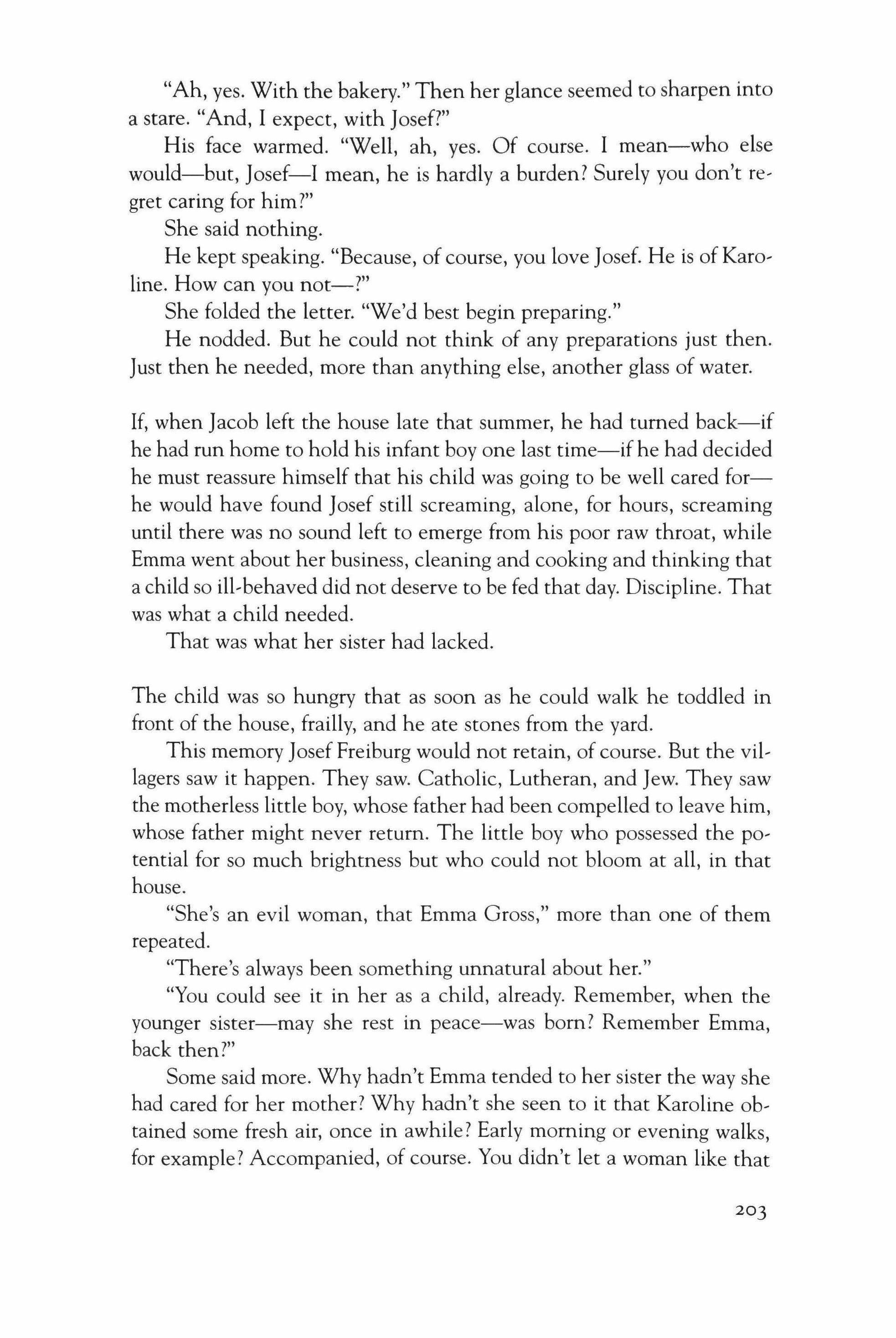
"Ah, yes. With the bakery." Then her glance seemed to sharpen into a stare. "And, I expect, with Josef?"
His face warmed. "Well, ah, yes. Of course. I mean-who else would-but, Josef-I mean, he is hardly a burden? Surely you don't regret caring for him?"
She said nothing.
He kept speaking. "Because, of course, you love Josef. He is of Karoline. How can you not-?"
She folded the letter. "We'd best begin preparing."
He nodded. But he could not think of any preparations just then. Just then he needed, more than anything else, another glass of water.
If, when Jacob left the house late that summer, he had turned back-if he had run home to hold his infant boy one last time-if he had decided he must reassure himself that his child was going to be well cared forhe would have found Josef still screaming, alone, for hours, screaming until there was no sound left to emerge from his poor raw throat, while Emma went about her business, cleaning and cooking and thinking that a child so ill-behaved did not deserve to be fed that day. Discipline. That was what a child needed.
That was what her sister had lacked.
The child was so hungry that as soon as he could walk he toddled in front of the house, frailly, and he ate stones from the yard.
This memory JosefFreiburg would not retain, of course. But the villagers saw it happen. They saw. Catholic, Lutheran, and Jew. They saw the motherless little boy, whose father had been compelled to leave him, whose father might never return. The little boy who possessed the potential for so much brightness but who could not bloom at all, in that house.
"She's an evil woman, that Emma Gross," more than one of them repeated.
"There's always been something unnatural about her."
"You could see it in her as a child, already. Remember, when the younger sister-may she rest in peace-was born? Remember Emma, back then?"
Some said more. Why hadn't Emma tended to her sister the way she had cared for her mother? Why hadn't she seen to it that Karoline obtained some fresh air, once in awhile? Early morning or evening walks, for example? Accompanied, of course. You didn't let a woman like that
203
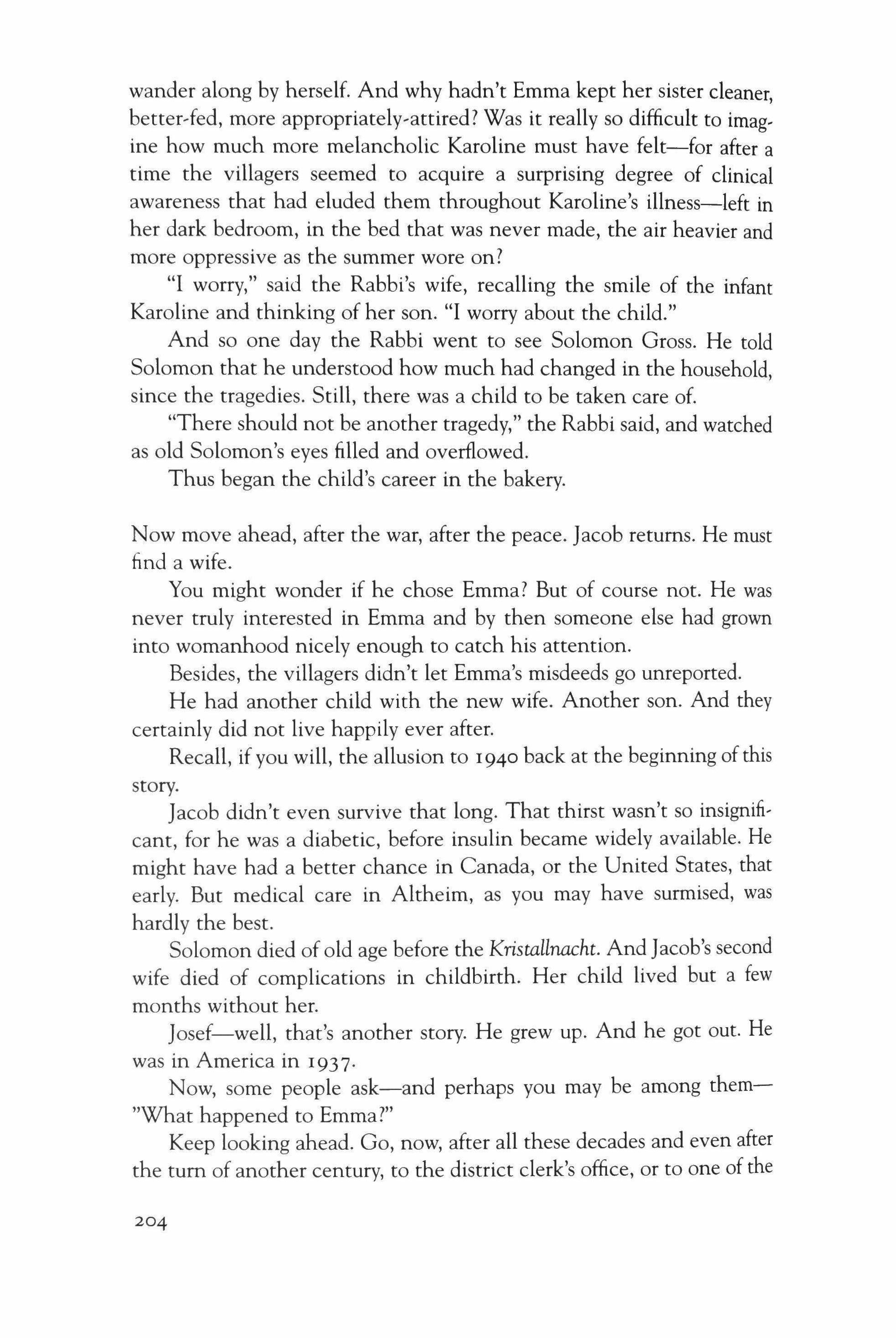
wander along by herself. And why hadn't Emma kept her sister cleaner, better-fed, more appropriately-attired! Was it really so difficult to imagine how much more melancholic Karoline must have felt-for after a time the villagers seemed to acquire a surprising degree of clinical awareness that had eluded them throughout Karoline's illness-left in her dark bedroom, in the bed that was never made, the air heavier and more oppressive as the summer wore on?
"I worry," said the Rabbi's wife, recalling the smile of the infant Karoline and thinking of her son. "I worry about the child."
And so one day the Rabbi went to see Solomon Gross. He told Solomon that he understood how much had changed in the household, since the tragedies. Still, there was a child to be taken care of.
"There should not be another tragedy," the Rabbi said, and watched as old Solomon's eyes filled and overflowed.
Thus began the child's career in the bakery.
Now move ahead, after the war, after the peace. Jacob returns. He must find a wife.
You might wonder if he chose Emma? But of course not. He was never truly interested in Emma and by then someone else had grown into womanhood nicely enough to catch his attention.
Besides, the villagers didn't let Emma's misdeeds go unreported.
He had another child with the new wife. Another son. And they certainly did not live happily ever after.
Recall, if you will, the allusion to 1940 back at the beginning ofthis story.
Jacob didn't even survive that long. That thirst wasn't so insignificant, for he was a diabetic, before insulin became widely available. He might have had a better chance in Canada, or the United States, that early. But medical care in Altheim, as you may have surmised, was hardly the best.
Solomon died of old age before the Kristallnacht. And Jacob's second wife died of complications in childbirth. Her child lived but a few months without her.
Josef-well, that's another story. He grew up. And he got out. He was in America in 1937.
Now, some people ask-and perhaps you may be among them"What happened to Emma?"
Keep looking ahead. Go, now, after all these decades and even after the tum of another century, to the district clerk's office, or to one of the
204

libraries where you will find the published volume holding the records of the ]udengemeinde von Altheim. Tum enough pages and eventually you will read of Emma Gross: fur tot erkliirt seit 30 Oktober 1940.
And if you don't read German, I'll translate. "Believed dead"-since the day she was deported.
205
David Wagoner
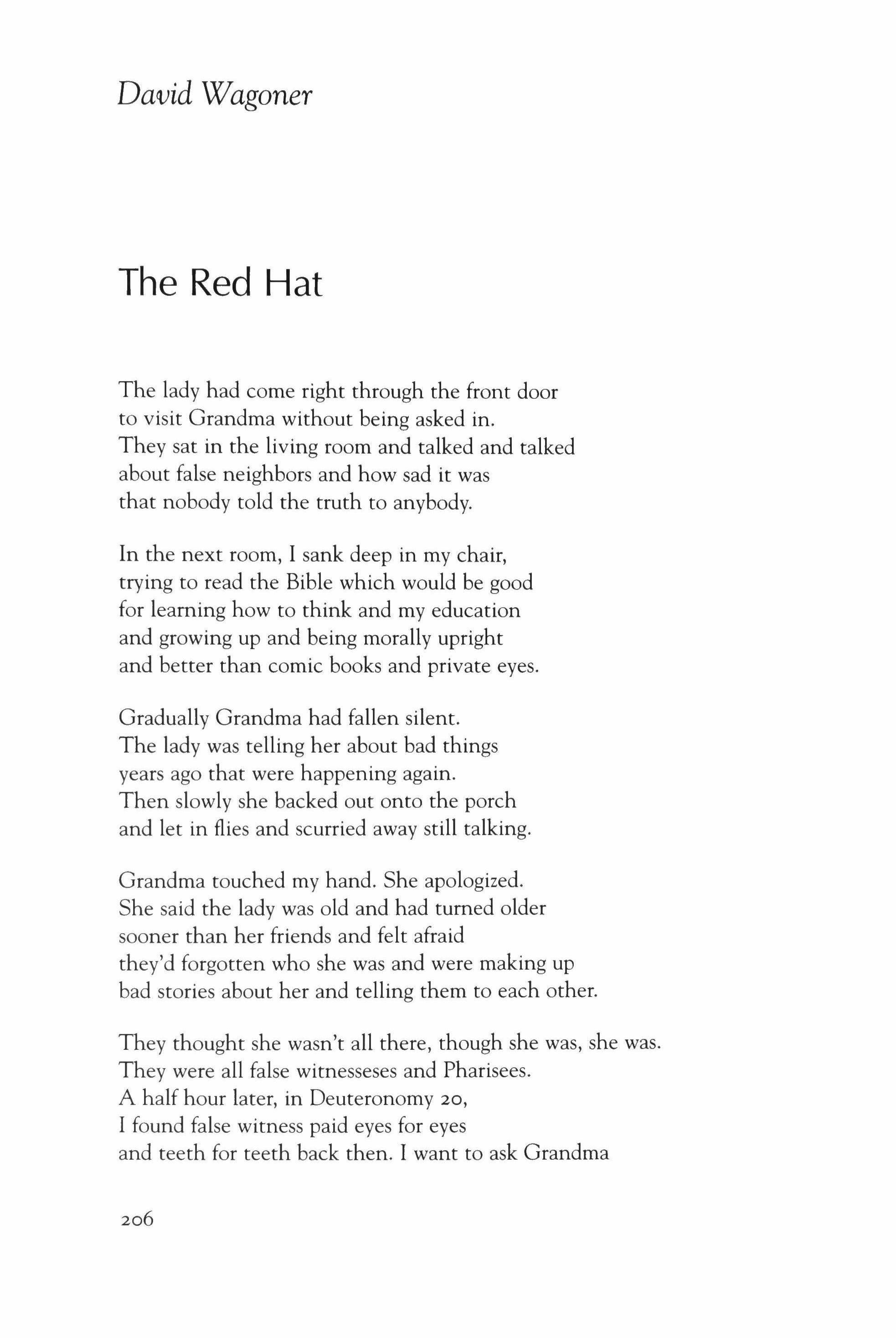
The Red Hat
The lady had come right through the front door to visit Grandma without being asked in. They sat in the living room and talked and talked about false neighbors and how sad it was that nobody told the truth to anybody.
In the next room, I sank deep in my chair, trying to read the Bible which would be good for learning how to think and my education and growing up and being morally upright and better than comic books and private eyes.
Gradually
Grandma had fallen silent. The lady was telling her about bad things years ago that were happening again. Then slowly she backed out onto the porch and let in flies and scurried away still talking.
Grandma touched my hand. She apologized. She said the lady was old and had turned older sooner than her friends and felt afraid they'd forgotten who she was and were making up bad stories about her and telling them to each other.
They thought she wasn't all there, though she was, she was. They were all false witnesseses and Pharisees. A half hour later, in Deuteronomy 20, I found false witness paid eyes for eyes and teeth for teeth back then. I want to ask Grandma
206
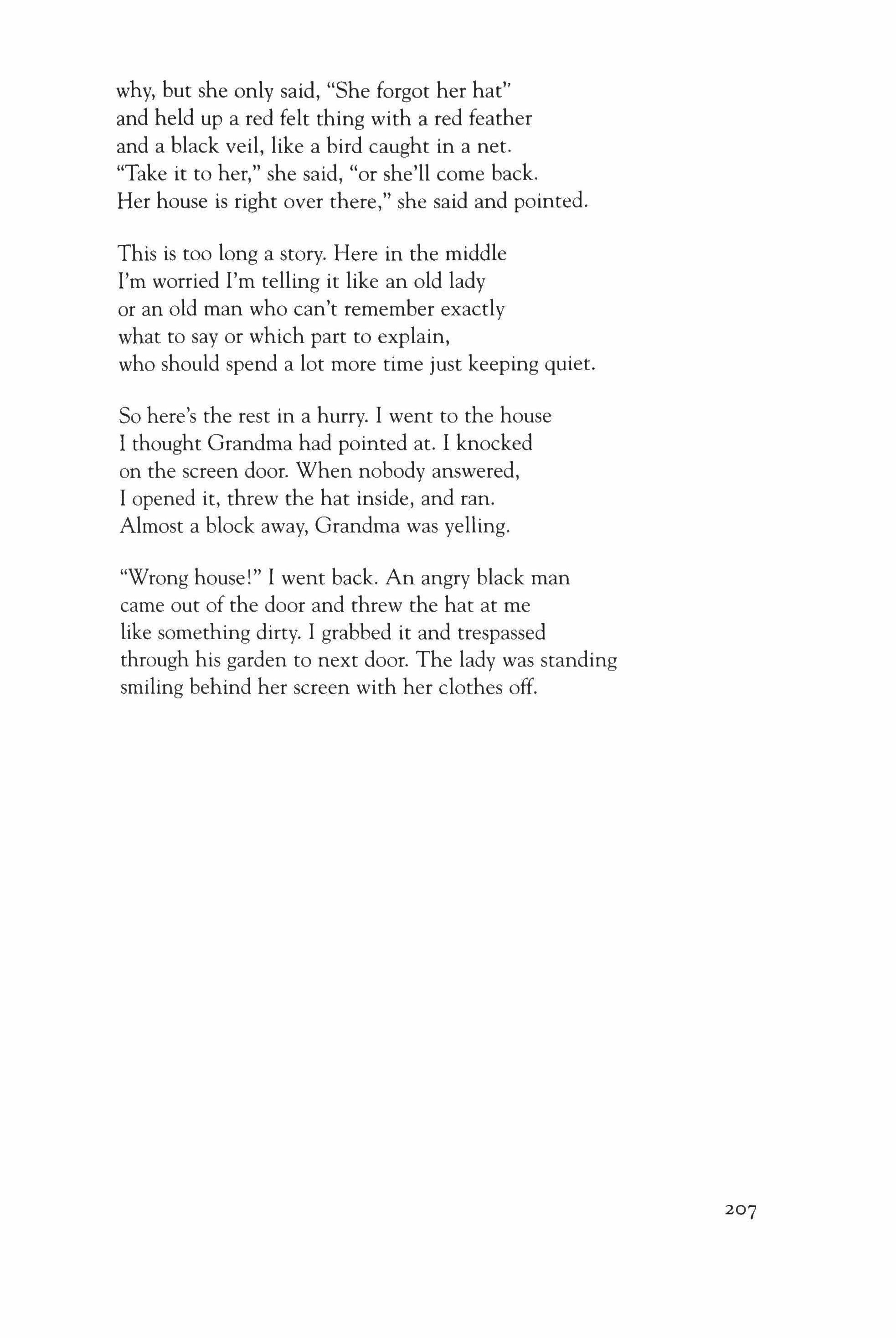
why, but she only said, "She forgot her hat" and held up a red felt thing with a red feather and a black veil, like a bird caught in a net. "Take it to her," she said, "or she'll come back. Her house is right over there," she said and pointed.
This is too long a story. Here in the middle I'm worried I'm telling it like an old lady or an old man who can't remember exactly what to say or which part to explain, who should spend a lot more time just keeping quiet.
So here's the rest in a hurry. I went to the house I thought Grandma had pointed at. I knocked on the screen door. When nobody answered, I opened it, threw the hat inside, and ran. Almost a block away, Grandma was yelling.
"Wrong house!" I went back. An angry black man came out of the door and threw the hat at me like something dirty. I grabbed it and trespassed through his garden to next door. The lady was standing smiling behind her screen with her clothes off.
207
The Other Flower
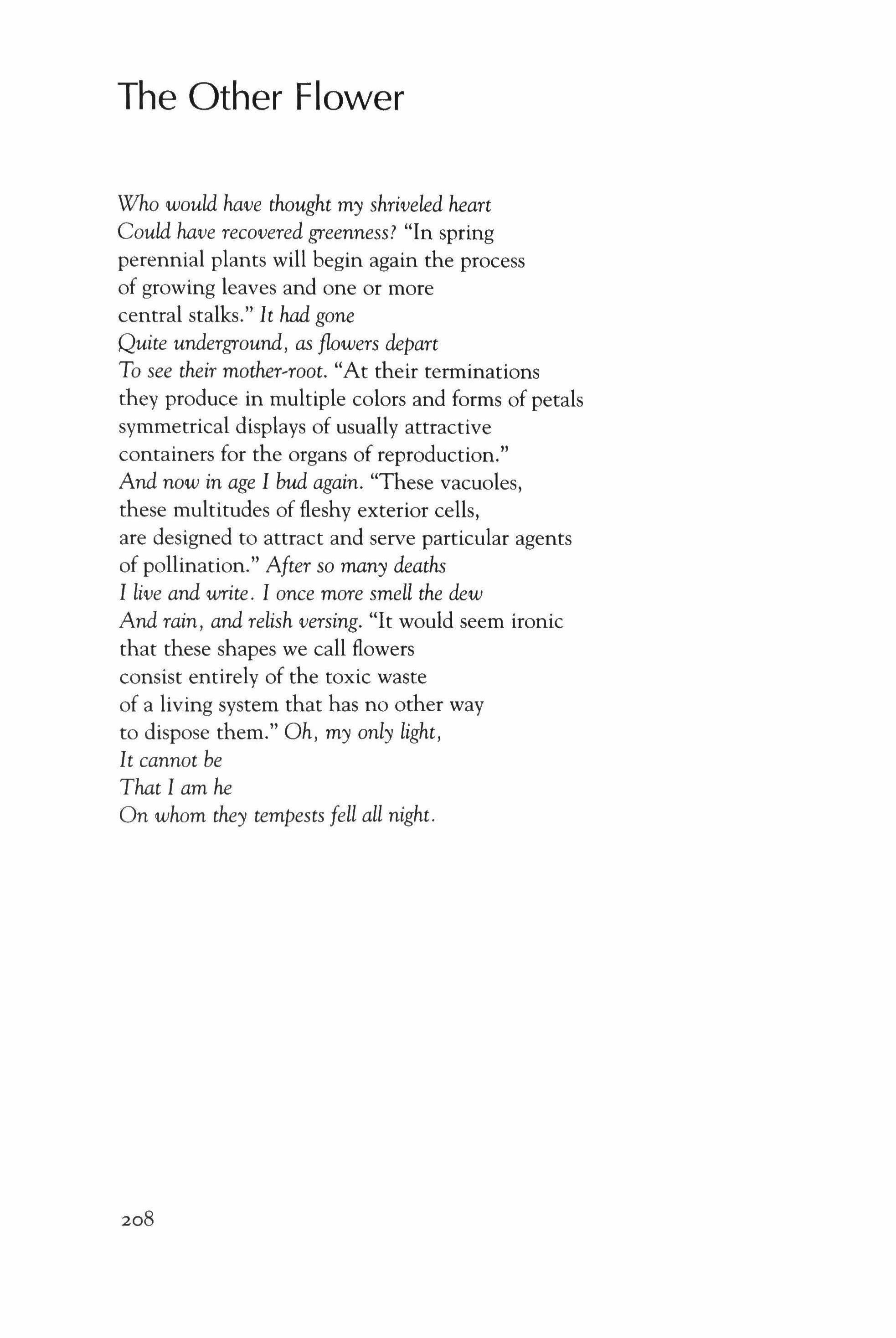
Who would have thought my shriveled heart
Could have recovered greenness? "In spring perennial plants will begin again the process of growing leaves and one or more central stalks." It had gone Quite underground, as flowers depart To see their morher-roor. "At their terminations they produce in multiple colors and forms of petals symmetrical displays of usually attractive containers for the organs of reproduction." And now in age I bud again. "These vacuoles, these multitudes of fleshy exterior cells, are designed to attract and serve particular agents of pollination." After so many deaths I live and write. I once more smell the dew And rain, and relish versing. "It would seem ironic that these shapes we call flowers consist entirely of the toxic waste of a living system that has no other way to dispose them." Oh, my only light, It cannot be
That I am he On whom they tempests fell all night.
208
The Solution to Yesterday's Puzzle
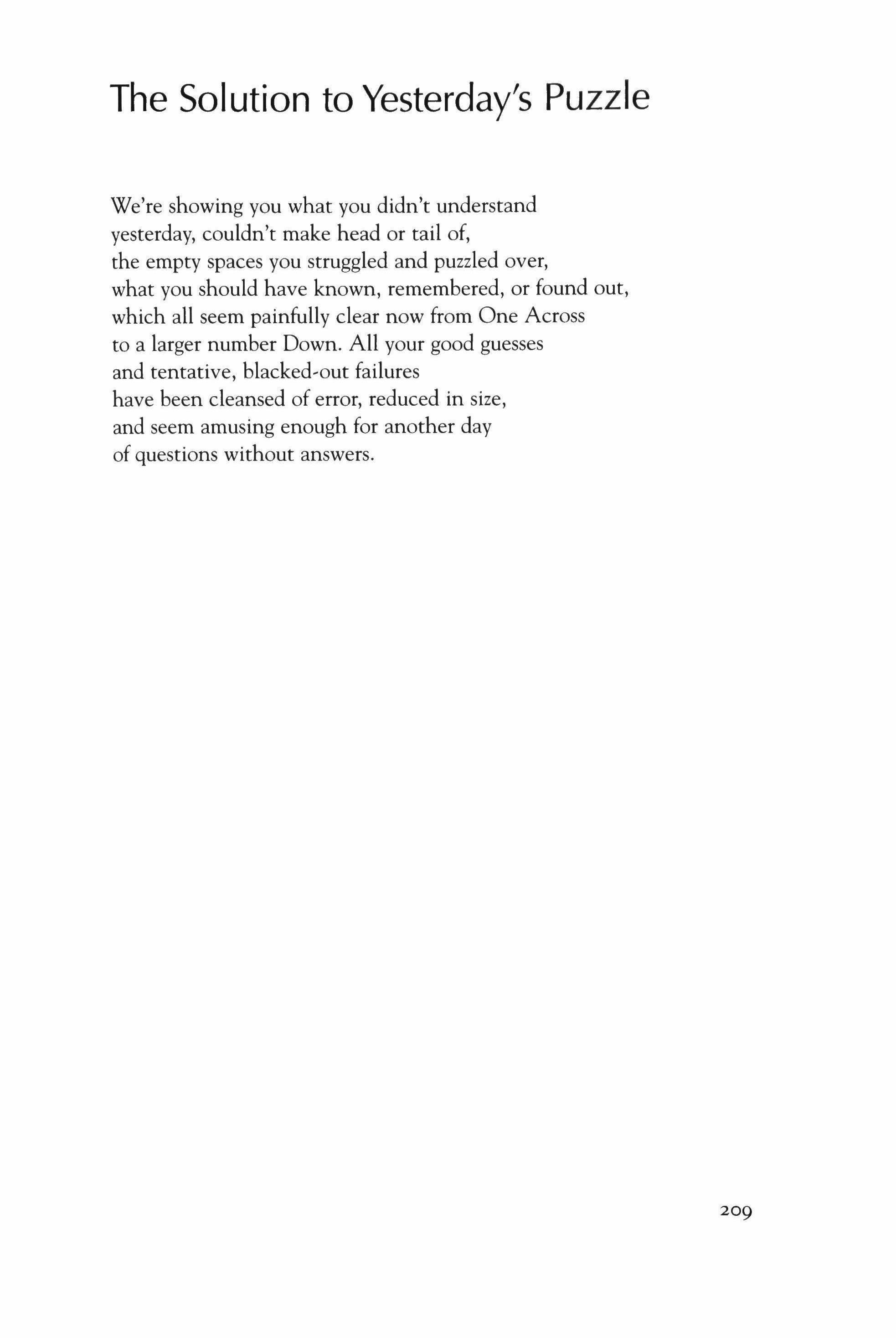
We're showing you what you didn't understand yesterday, couldn't make head or tail of, the empty spaces you struggled and puzzled over, what you should have known, remembered, or found out, which all seem painfully clear now from One Across to a larger number Down. All your good guesses and tentative, blacked-out failures have been cleansed of error, reduced in size, and seem amusing enough for another day of questions without answers.
209
Charlie Smith
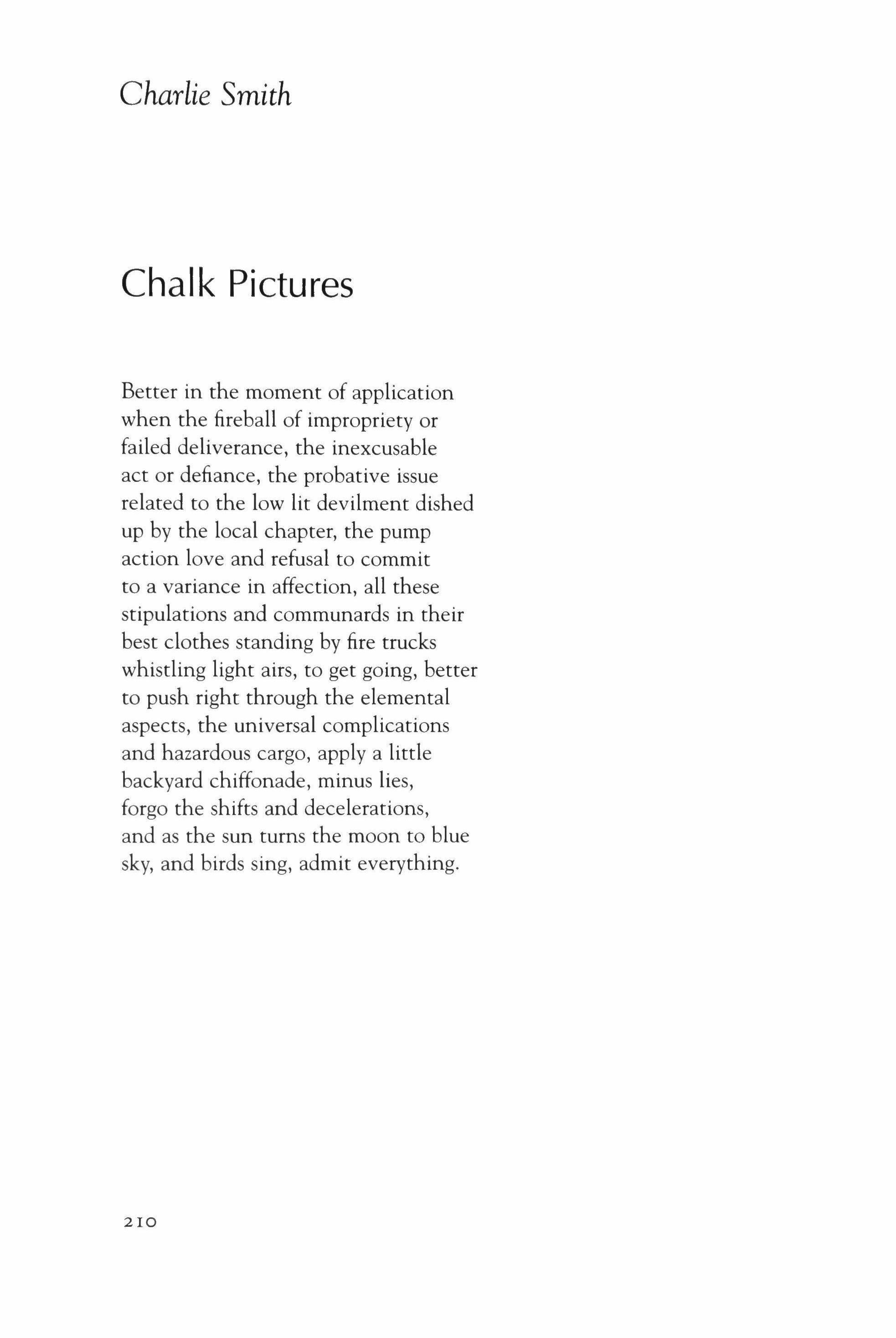
Chalk Pictures
Better in the moment of application when the fireball of impropriety or failed deliverance, the inexcusable act or defiance, the probative issue related to the low lit devilment dished up by the local chapter, the pump action love and refusal to commit to a variance in affection, all these stipulations and communards in their best clothes standing by fire trucks whistling light airs, to get going, better to push right through the elemental aspects, the universal complications and hazardous cargo, apply a little backyard chiffonade, minus lies, forgo the shifts and decelerations, and as the sun turns the moon to blue sky, and birds sing, admit everything.
210
Kingdom

I lay my hand on your chest and for a sec can't feel anything
tin roof on an empty cotton shed
late winter in the ruined kingdom of the fields
no approach saintly
the register tallying a number unfathomable to scientists or lovers turns taken brisk wind at the comer of Washington and Spanish Way
old men pretending the dark's holding steady
another marooned in a philosophy junk or tricky love affair
we say tenderness still seek restitution
anything you can name or not
the numbers add up they say
211
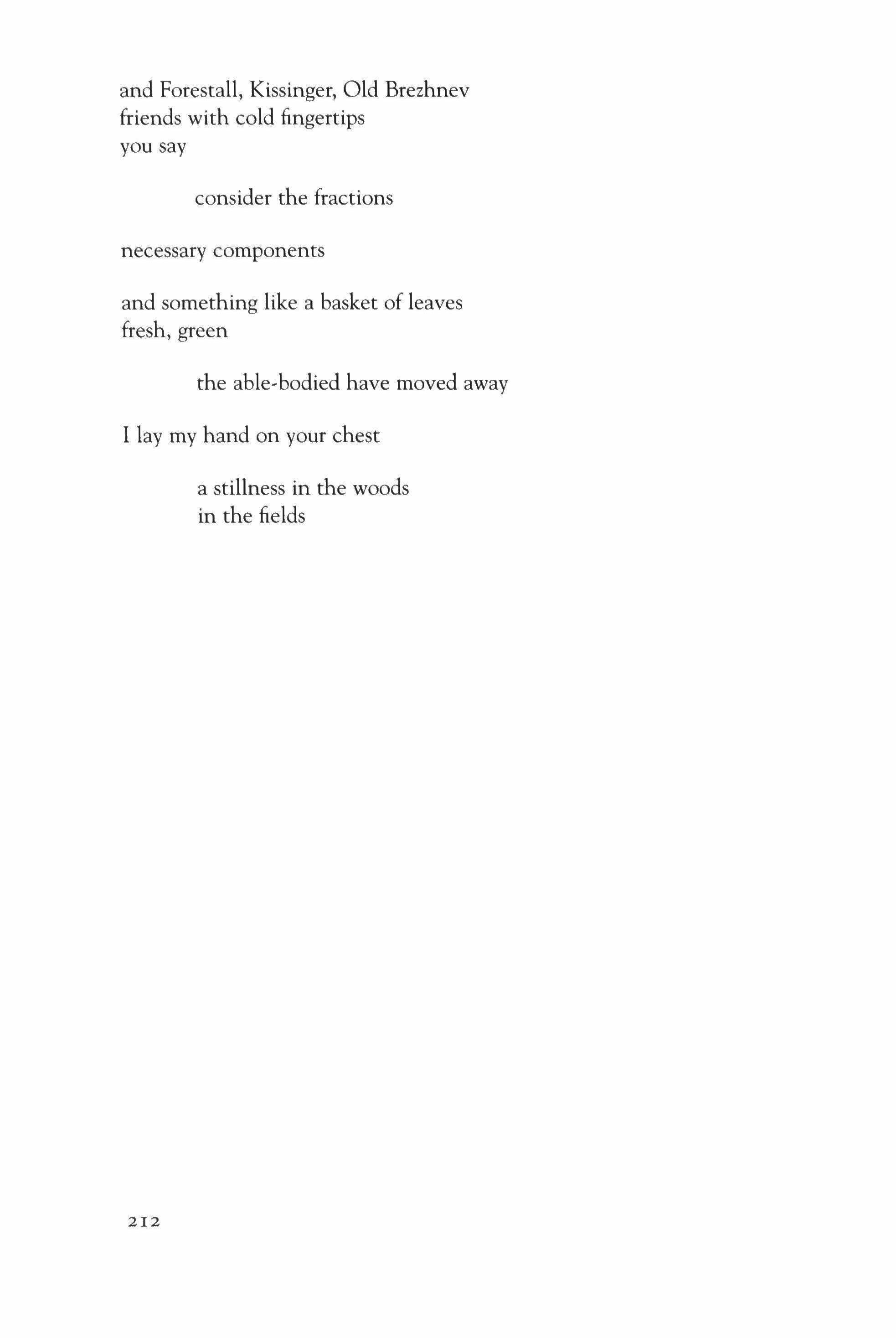
and Forestall, Kissinger, Old Brezhnev friends with cold fingertips
you say
consider the fractions
necessary components
and something like a basket of leaves fresh, green
the able-bodied have moved away
I lay my hand on your chest
a stillness in the woods in the fields
212
Pimone Triplett
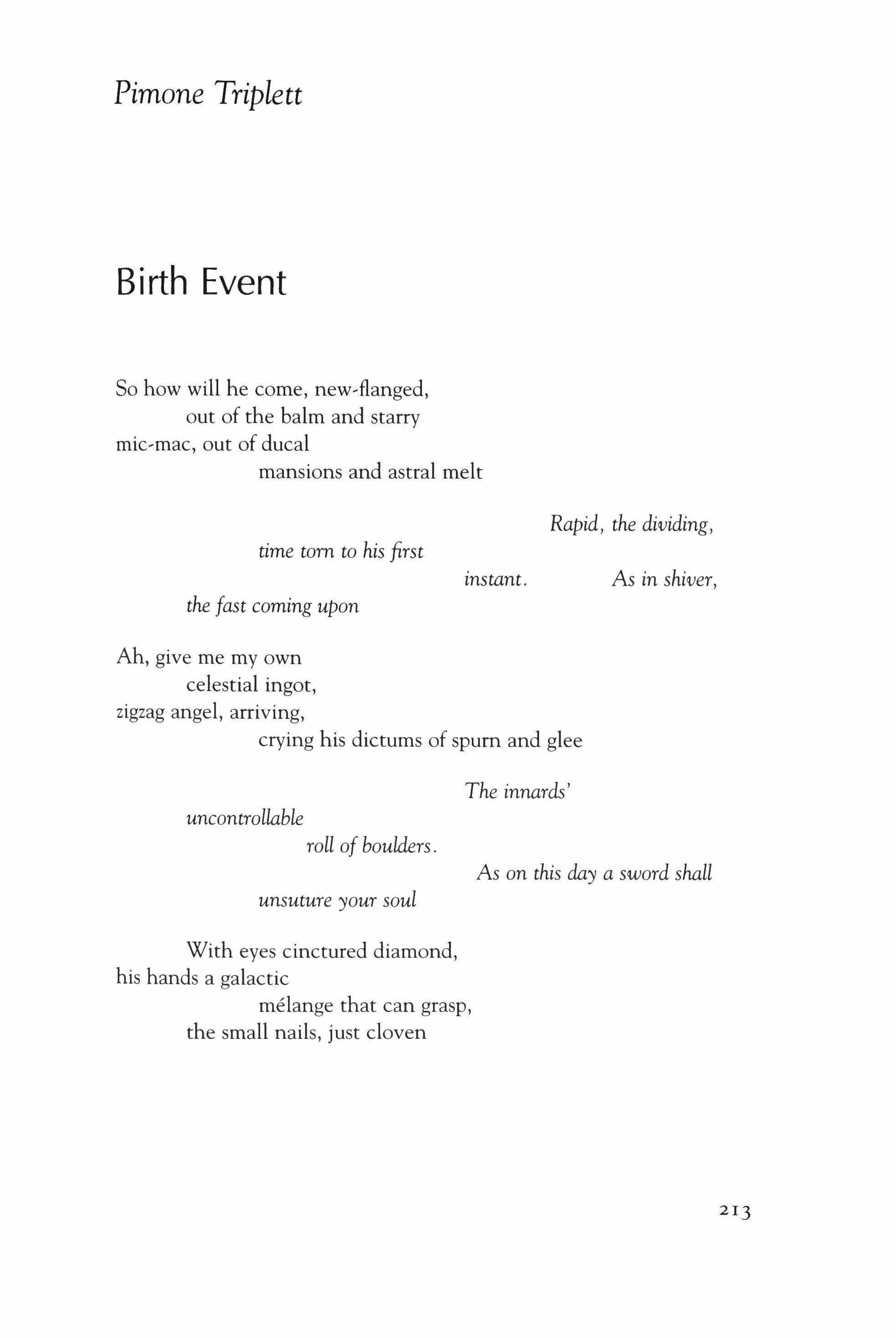
Birth Event
So how will he come, new-flanged, out of the balm and starry mic-rnac, out of ducal mansions and astral melt
Rapid, the dividing, instant. the fast coming upon
time tom to his first
Ah, give me my own celestial ingot, zigzag angel, arriving, crying his dictums of spurn and glee
The innards' uncontrollable roll of boulders.
As on this day a sword shall
As in shiver, unsuture your soul
With eyes cinctured diamond, his hands a galactic melange that can grasp, the small nails, just cloven
213
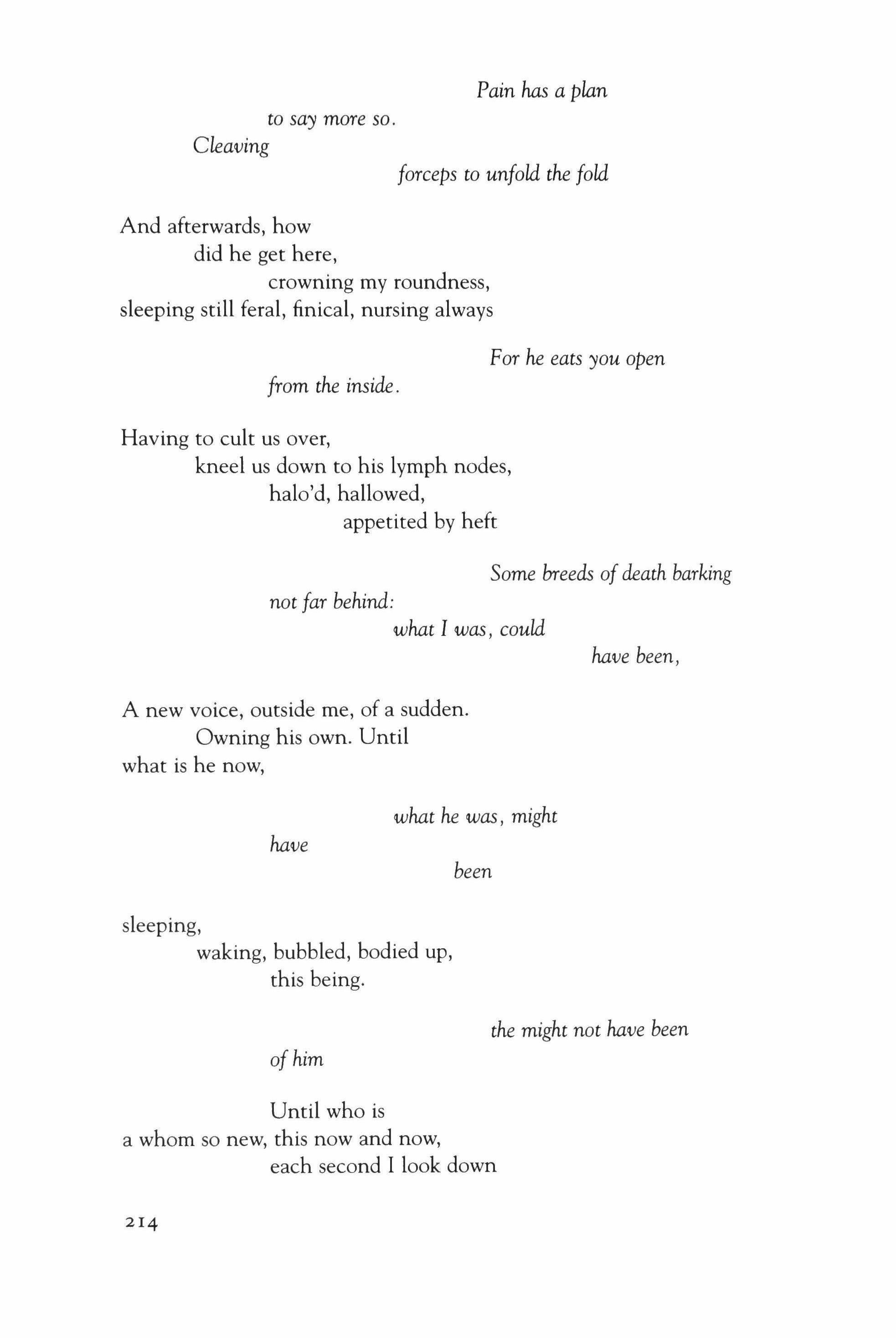
Cleaving
Pain has a plan to say more so.
forceps to unfold the fold
And afterwards, how did he get here, crowning my roundness, sleeping still feral, finical, nursing always
For he eats you open from the inside.
Having to cult us over, kneel us down to his lymph nodes, halo'd, hallowed, appetited by heft
Some breeds of death barking not far behind: what I was, could have been,
A new voice, outside me, of a sudden. Owning his own. Until what is he now, what he was, might have been sleeping, waking, bubbled, bodied up, this being.
the might not have been of him
Until who is a whom so new, this now and now, each second I look down
214

if not for the knot of him, becoming his all and only, two wild blues beseeching
215
The Rumor of Evolution
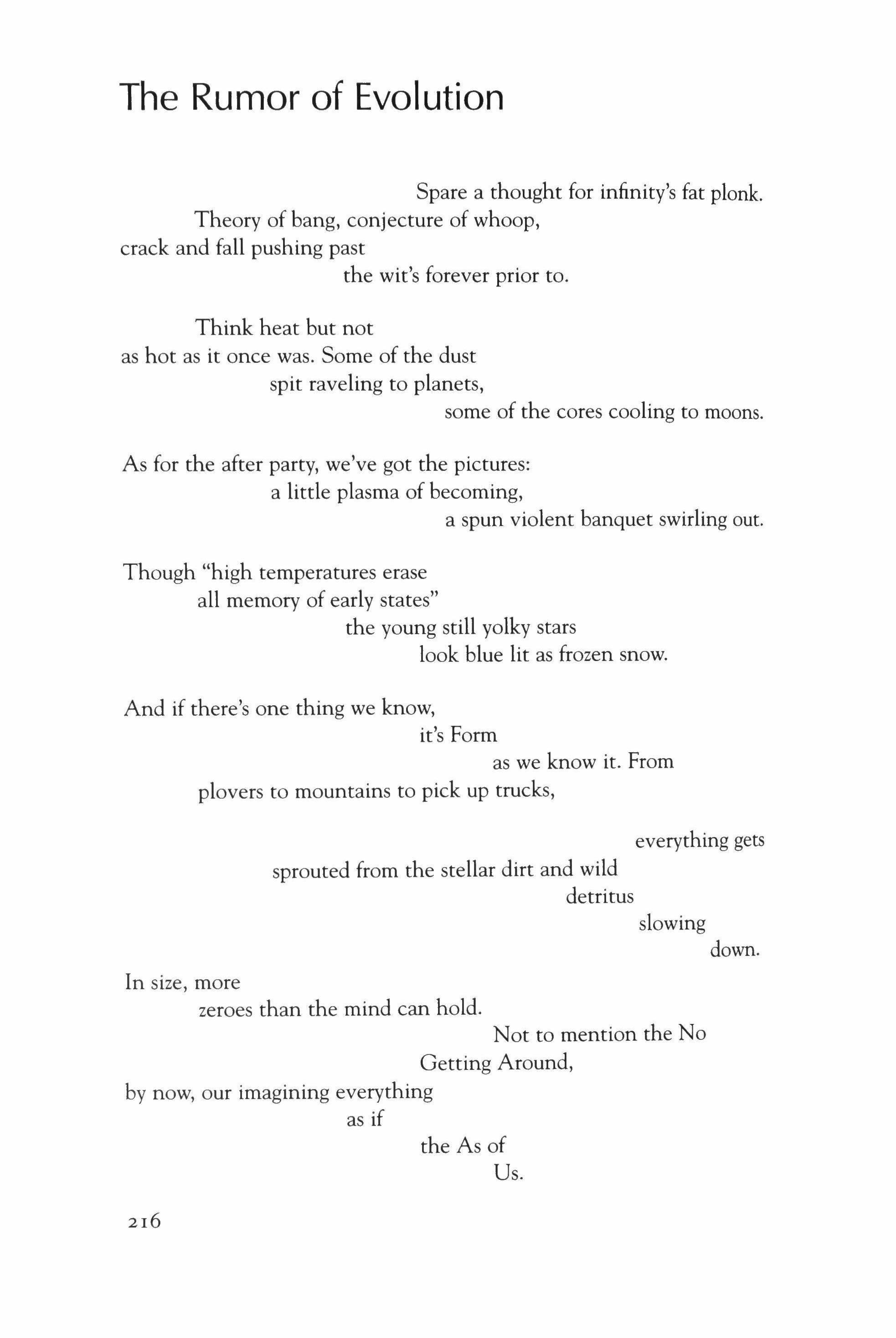
Spare a thought for infinity's fat plonk. Theory of bang, conjecture of whoop, crack and fall pushing past the wit's forever prior to.
Think heat but not as hot as it once was. Some of the dust spit raveling to planets, some of the cores cooling to moons.
As for the after party, we've got the pictures: a little plasma of becoming, a spun violent banquet swirling out.
Though "high temperatures erase all memory of early states" the young still yolky stars look blue lit as frozen snow.
And if there's one thing we know, it's Form as we know it. From plovers to mountains to pick up trucks, everything gets sprouted from the stellar dirt and wild detritus slowing down.
In size, more zeroes than the mind can hold. Not to mention the No Getting Around, by now, our imagining everything as if the As of Us.
216
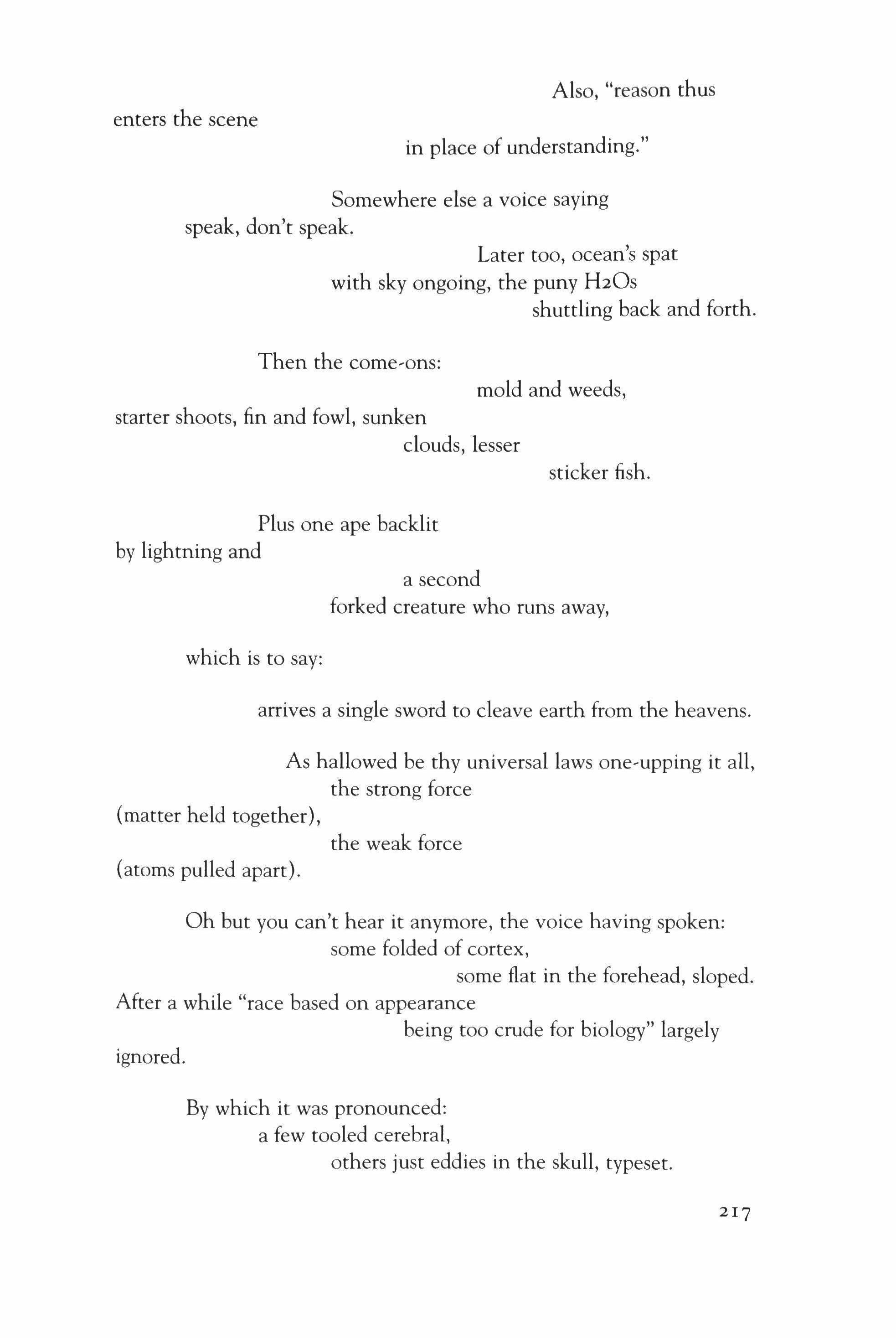
Also, "reason thus enters the scene in place of understanding."
Somewhere else a voice saying speak, don't speak.
Later too, ocean's spat with sky ongoing, the puny H20S shuttling back and forth.
Then the come-ons: mold and weeds, starter shoots, fin and fowl, sunken clouds, lesser sticker fish.
Plus one ape backlit by lightning and a second forked creature who runs away, which is to say:
arrives a single sword to cleave earth from the heavens.
As hallowed be thy universal laws one-upping it all, the strong force (matter held together), the weak force (atoms pulled apart).
Oh but you can't hear it anymore, the voice having spoken: some folded of cortex, some flat in the forehead, sloped. After a while "race based on appearance being too crude for biology" largely ignored.
By which it was pronounced: a few tooled cerebral, others just eddies in the skull, typeset.
217

Giving us, at the end of each single stem, brain's hills and valleys, our three pound home in the head, solid as an egg, hard boiled.
Afloat in its little bath of seawater, coddled with ganglia, nerve endings, descended to the wondrous so-called uncus.
Also someone told us to question the question, mumbling at one another on the long spectrum: soul, self, separate, sidereal, sidelong, sex
Given: a spank of mind over matter looking like the cattle all ours, quartered in barns.
Given: "organisms unequipped to generate core consciousness are condemned
Meanwhile, the cities planted, root bulb after root bulb breaking the land. Blooming emperors and rent boys, steam engines and water closets, arsenals, smallpox, art to making images of sight or sound or touch
Building slums and Hvbombs, cloverleafs and capitals but they cannot come to know what they did"
Until it's after the need of god it's another force granting as fronds of rockweed dangle across the rock
218
the army must be agile, and lethal readily deployable as colored holdfasts in the base, buoyed by aidilled bladders and require a minimum of logistical support as the battle may go on indefinitely " a rising and swaying with ocean surge, ridden, the waters flowing over, the small periwinkles feeding every which way they can-
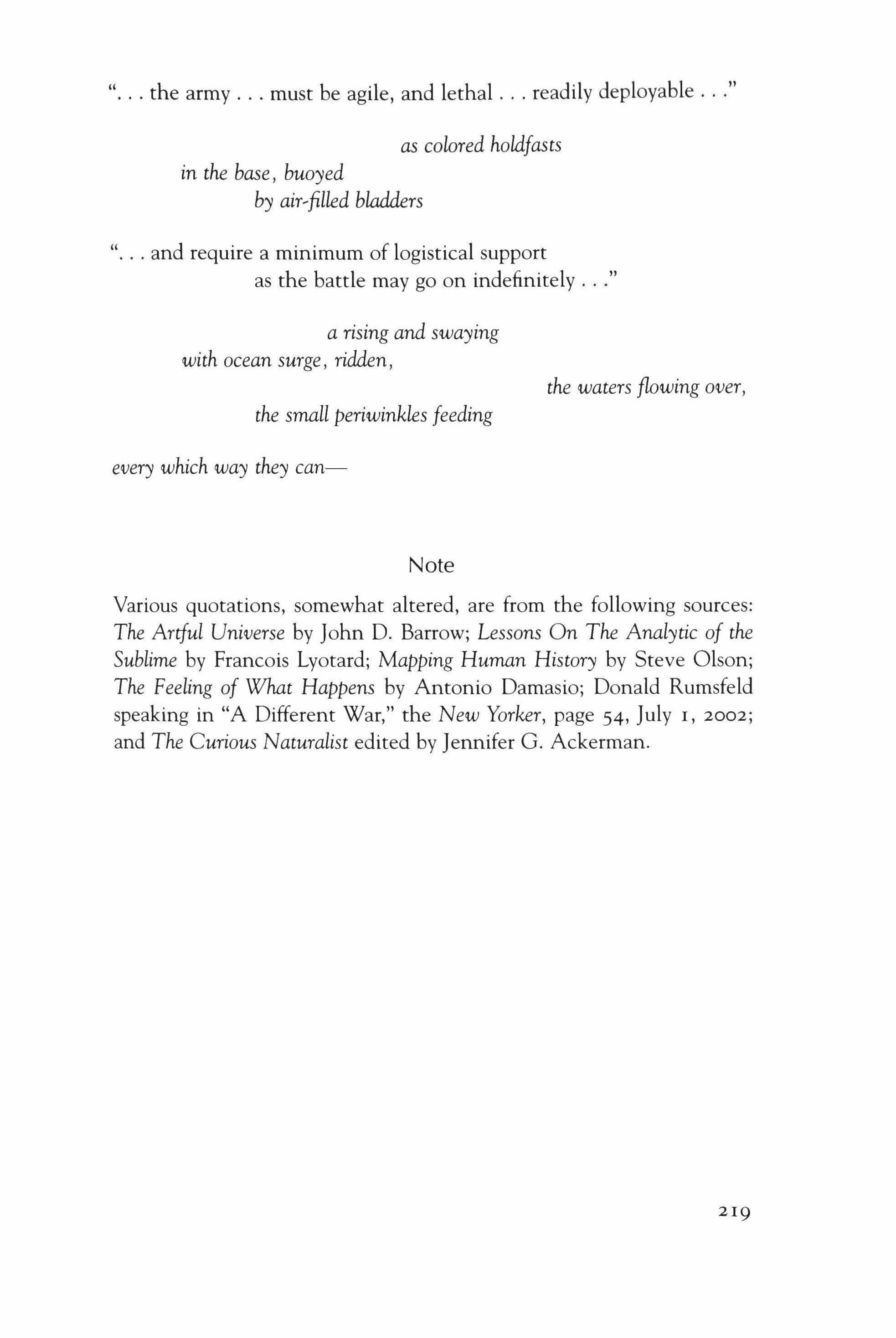
Note
Various quotations, somewhat altered, are from the following sources: The Artful Universe by John D. Barrow; Lessons On The Analytic of the Sublime by Francois Lyotard; Mapping Human History by Steve Olson; The Feeling of What Happens by Antonio Damasio; Donald Rumsfeld speaking in "A Different War," the New Yorker, page 54, July I, 2002; and The Curious Naturalist edited by Jennifer G. Ackerman.
219
Megan Harlan
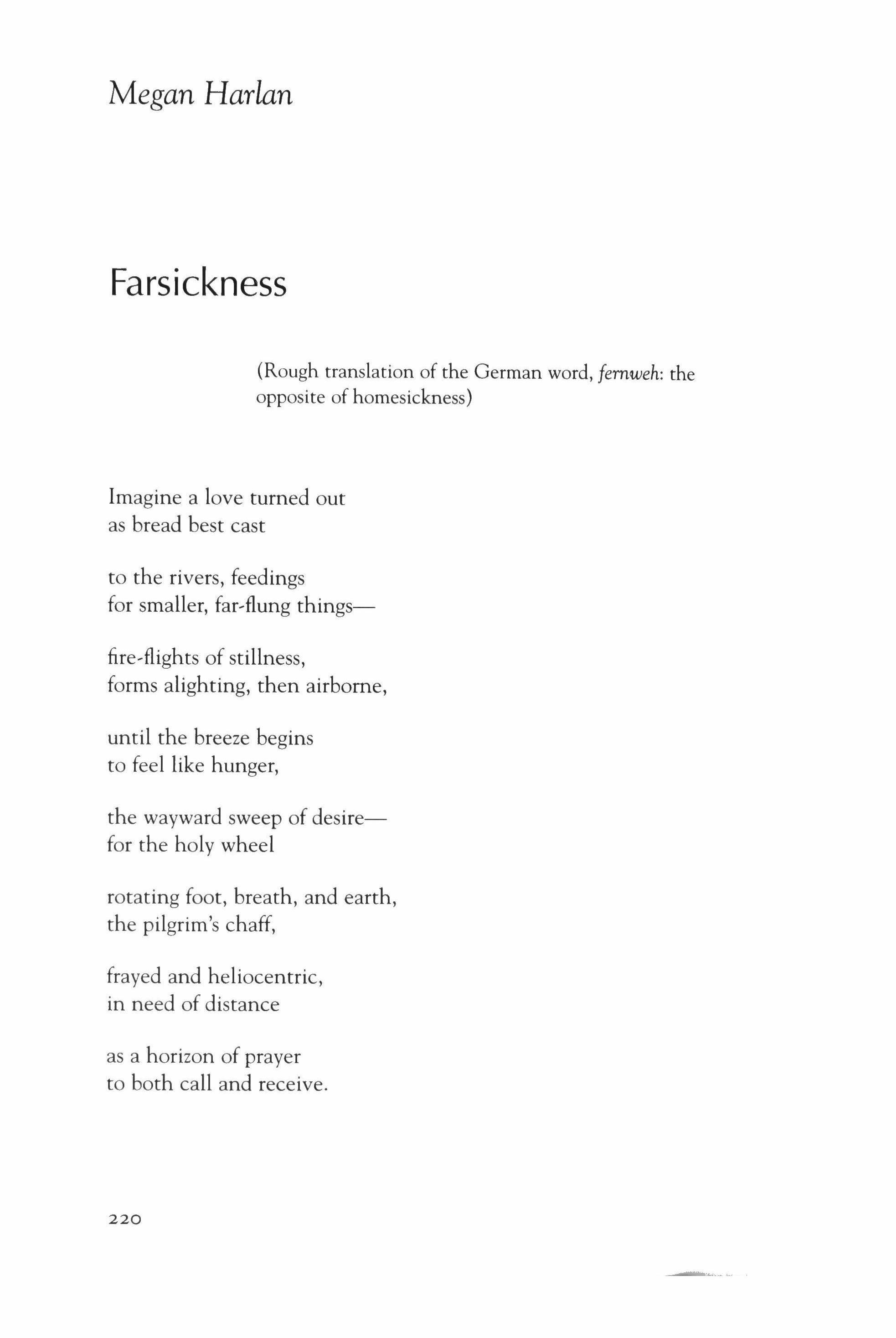
Farsickness
(Rough translation of the German word, femweh: the opposite of homesickness)
Imagine a love turned out as bread best cast
to the rivers, feedings for smaller, far-flung things-
fire-flights of stillness, forms alighting, then airborne, until the breeze begins to feel like hunger, the wayward sweep of desirefor the holy wheel rotating foot, breath, and earth, the pilgrim's chaff, frayed and heliocentric, in need of distance
as a horizon of prayer to both call and receive.
220
Multiverse
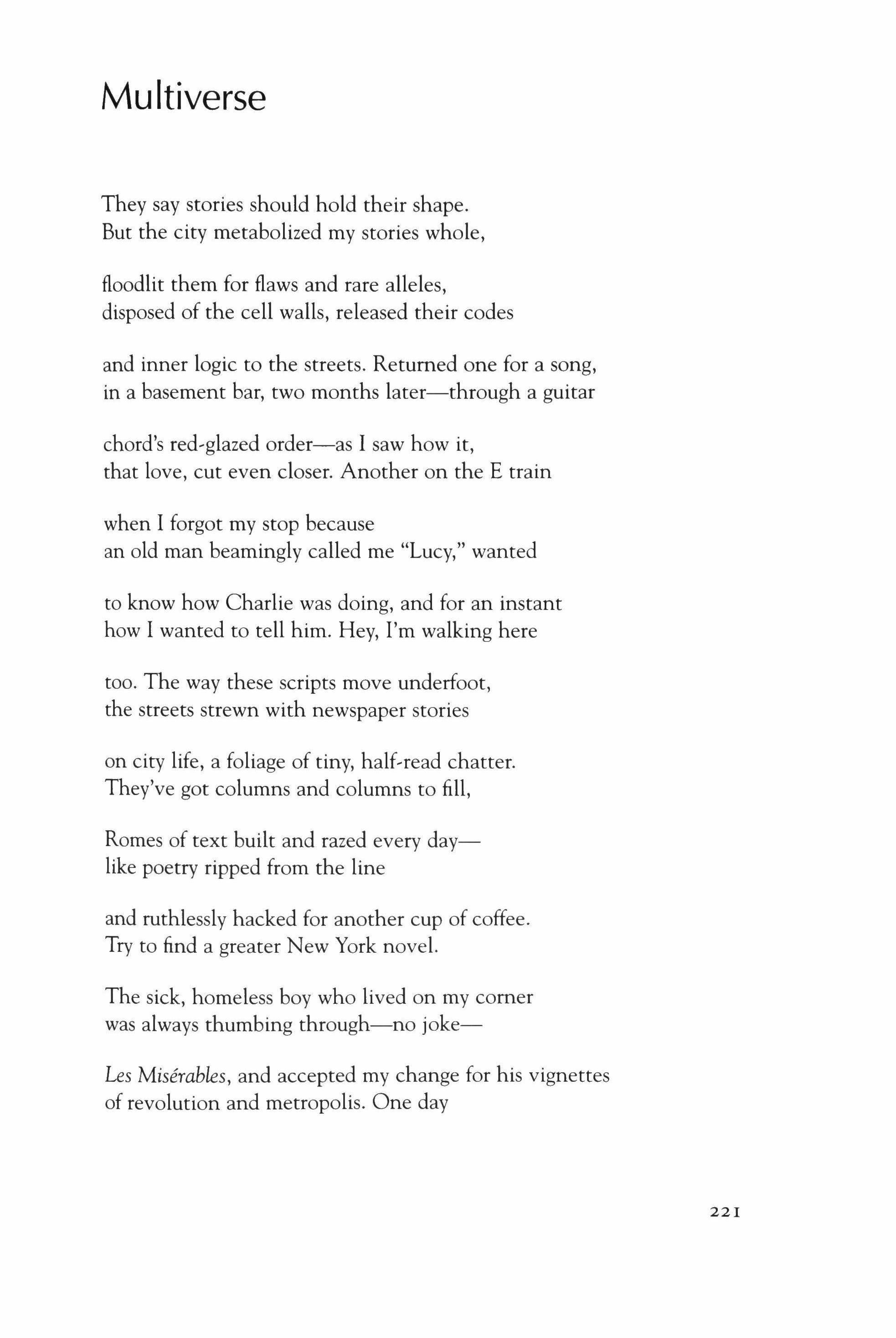
They say stories should hold their shape. But the city metabolized my stories whole,
floodlit them for flaws and rare alleles, disposed of the cell walls, released their codes and inner logic to the streets. Returned one for a song, in a basement bar, two months later-through a guitar chord's red-glazed order-as I saw how it, that love, cut even closer. Another on the E train
when I forgot my stop because an old man beamingly called me "Lucy," wanted
to know how Charlie was doing, and for an instant how I wanted to tell him. Hey, I'm walking here
too. The way these scripts move underfoot, the streets strewn with newspaper stories
on city life, a foliage of tiny, half-read chatter. They've got columns and columns to fill,
Romes of text built and razed every daylike poetry ripped from the line and ruthlessly hacked for another cup of coffee. Try to find a greater New York novel.
The sick, homeless boy who lived on my comer was always thumbing through-no joke-
Les Miserables, and accepted my change for his vignettes of revolution and metropolis. One day
221
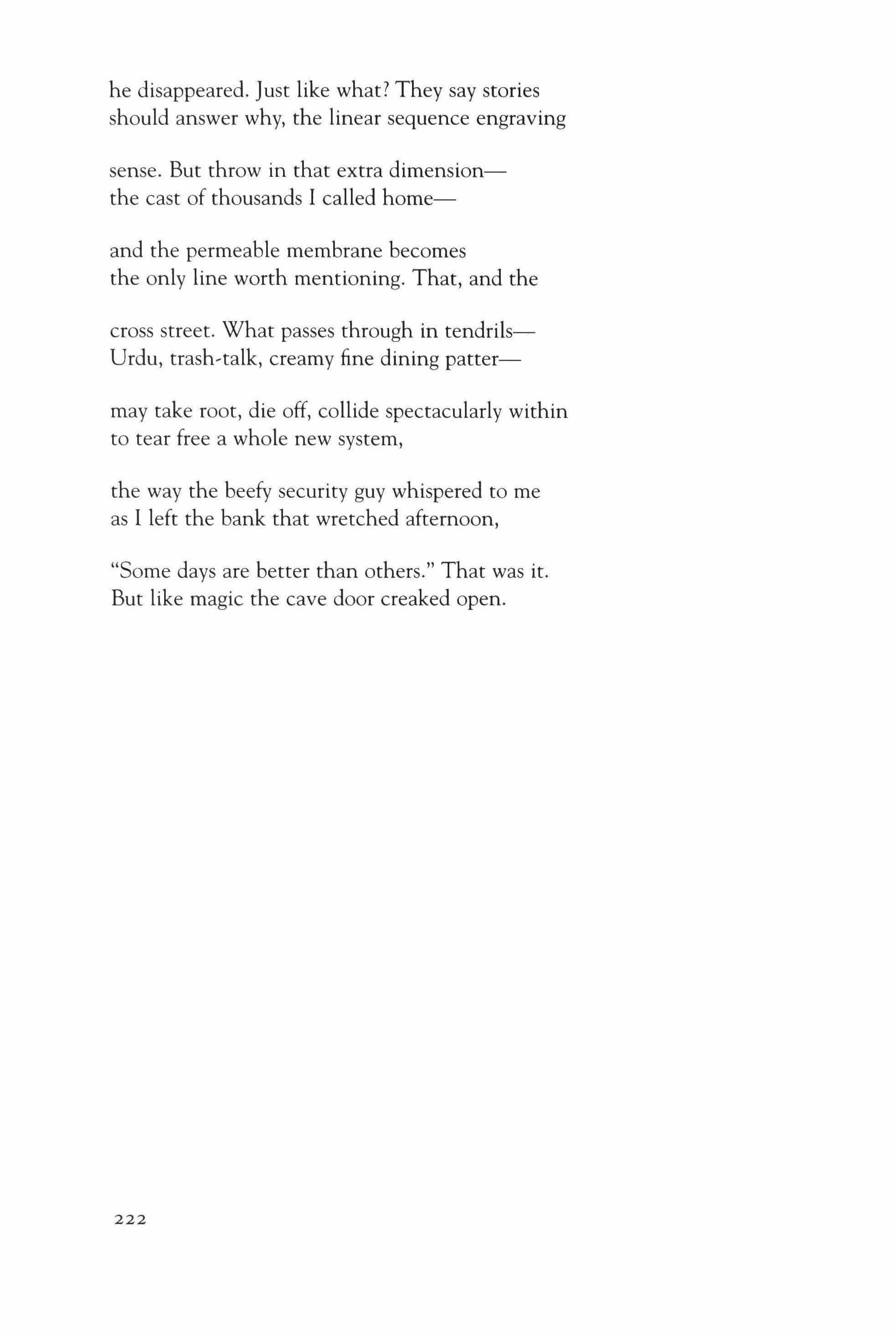
he disappeared. Just like what? They say stories should answer why, the linear sequence engraving
sense. But throw in that extra dimensionthe cast of thousands I called homeand the permeable membrane becomes the only line worth mentioning. That, and the cross street. What passes through in tendrilsUrdu, trash-talk, creamy fine dining pattermay take root, die off, collide spectacularly within to tear free a whole new system, the way the beefy security guy whispered to me as I left the bank that wretched afternoon,
"Some days are better than others." That was it. But like magic the cave door creaked open.
222
The Promise of the Body Is Its Dream
After the drawings of Leonardo da Vinci
 I. Vitruvian Man
I. Vitruvian Man
I wake into the body's spellthe hand that sketches other hands, the finger bones and arm, the socket and the shoulder blade. They form the wings of birds, the wayan elbow tilts, the spreading muscles of the back. There is proportion to its willthe perfect circle on the page. And where the compass left its mark I draw the belly of a man; how all things radiate from here, the true machine. The man is standing as a cross, his arms outstretched so that they form a perfect line. At fingertips I mark the square that passes at the head, beneath the feet. The body seems at perfect ease, as if it holds, unwilled, the border simply by its touch. And where the arms are hinged, two others seem to sprout. The legs unfold another pair, the hands and feet all pressing fingertips and toes against the circle's rim. The hips retain a rectangle that matches with the one across the chest.
]onathan
Fink
223
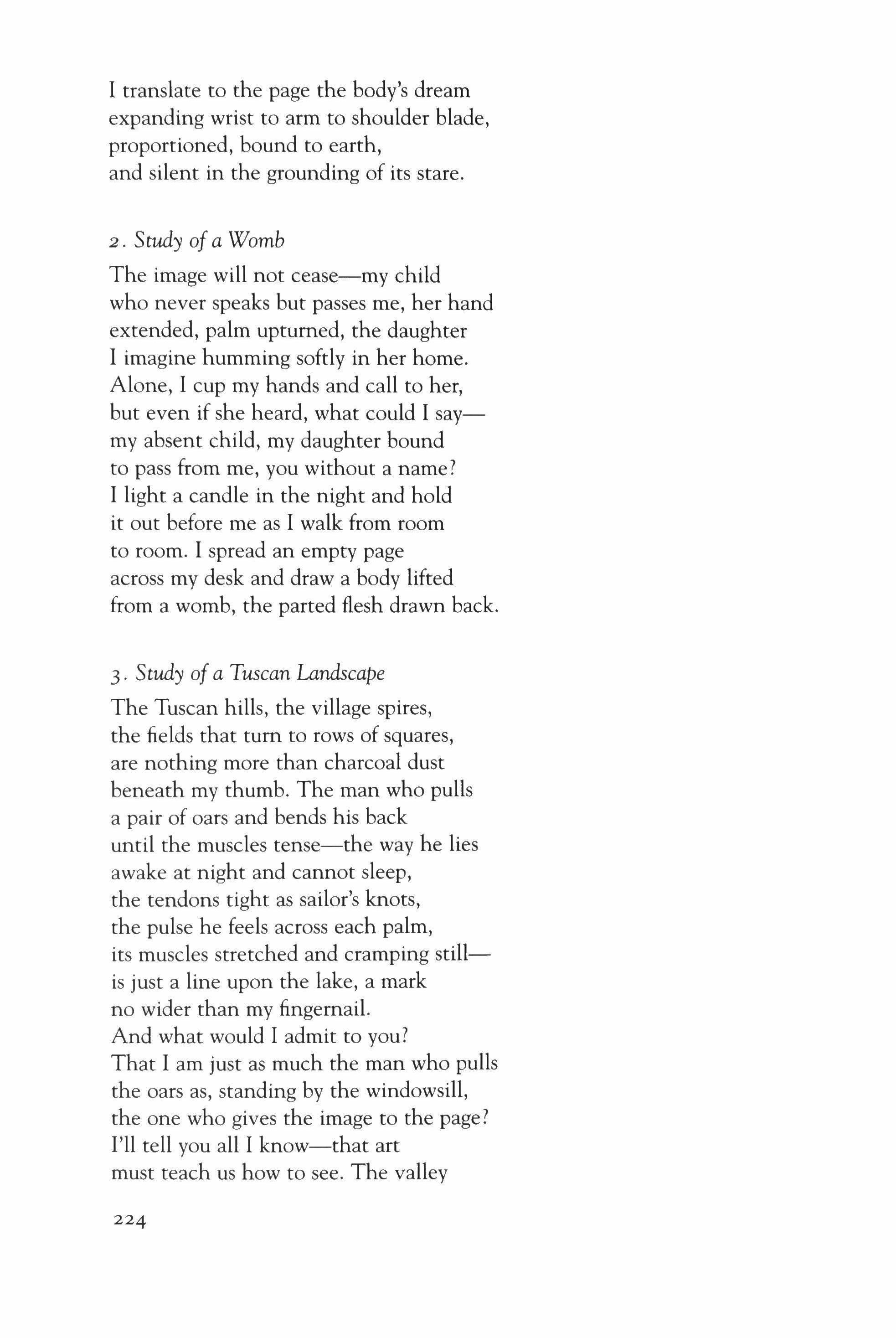
I translate to the page the body's dream expanding wrist to arm to shoulder blade, proportioned, bound to earth, and silent in the grounding of its stare.
2. Study of a Womb
The image will not cease-my child who never speaks but passes me, her hand extended, palm upturned, the daughter I imagine humming softly in her home. Alone, I cup my hands and call to her, but even if she heard, what could I saymy absent child, my daughter bound to pass from me, you without a name? I light a candle in the night and hold it out before me as I walk from room to room. I spread an empty page across my desk and draw a body lifted from a womb, the parted flesh drawn back.
3. Study of a Tuscan Landscape
The Tuscan hills, the village spires, the fields that turn to rows of squares, are nothing more than charcoal dust beneath my thumb. The man who pulls a pair of oars and bends his back until the muscles tense-the way he lies awake at night and cannot sleep, the tendons tight as sailor's knots, the pulse he feels across each palm, its muscles stretched and cramping stillis just a line upon the lake, a mark no wider than my fingernail. And what would I admit to you?
That I am just as much the man who pulls the oars as, standing by the windowsill, the one who gives the image to the page? I'll tell you all I know-that art must teach us how to see. The valley 224

that extends beneath my hand is nothing more than ash against the page, but still I feel a presence therea woman turning from the windowsill, her laughter spilling out into the street so that a neighbor pauses in his walk and stares above to find the shrieking bird. All this is but a speck-a window dotted dark, the building white. Teach me to see, the artist prays.
4. Five Characters in a Comic Scene
A man is laughing, head thrown back, his body shaking as he breathes. He bends into each gasp as if he were along a galley's rail and calling out to those who stand on shore. His mouth is spread so wide it seems the jaw has come unhinged, the tongue pressed flat. The grooves within the mouth's pink roof convey to me the belly of a whale, the spine and ribs. But then his laughter is a bird, frantic in the pub, pulsing through the air as men around him look away. Perhaps they are embarrassed at the sound, the muscles of his face drawn back, the skin pulled tight, the wetness of his eyes and how he wipes the comers with his thumbs. His body quivers as he breathes, each man remembering that shudder first, when young, the body giving way.
5· Design for a Flying Machine
The metal joints and struts, the fabric taut and bound across the frame, must slip onto the back and shoulders of a man as easily as if it were his coat. I feel the dream that turns in himthere's weight within the muscles of his arms, his hips, the tendons rising parallel along his neck, his head bent forward
225
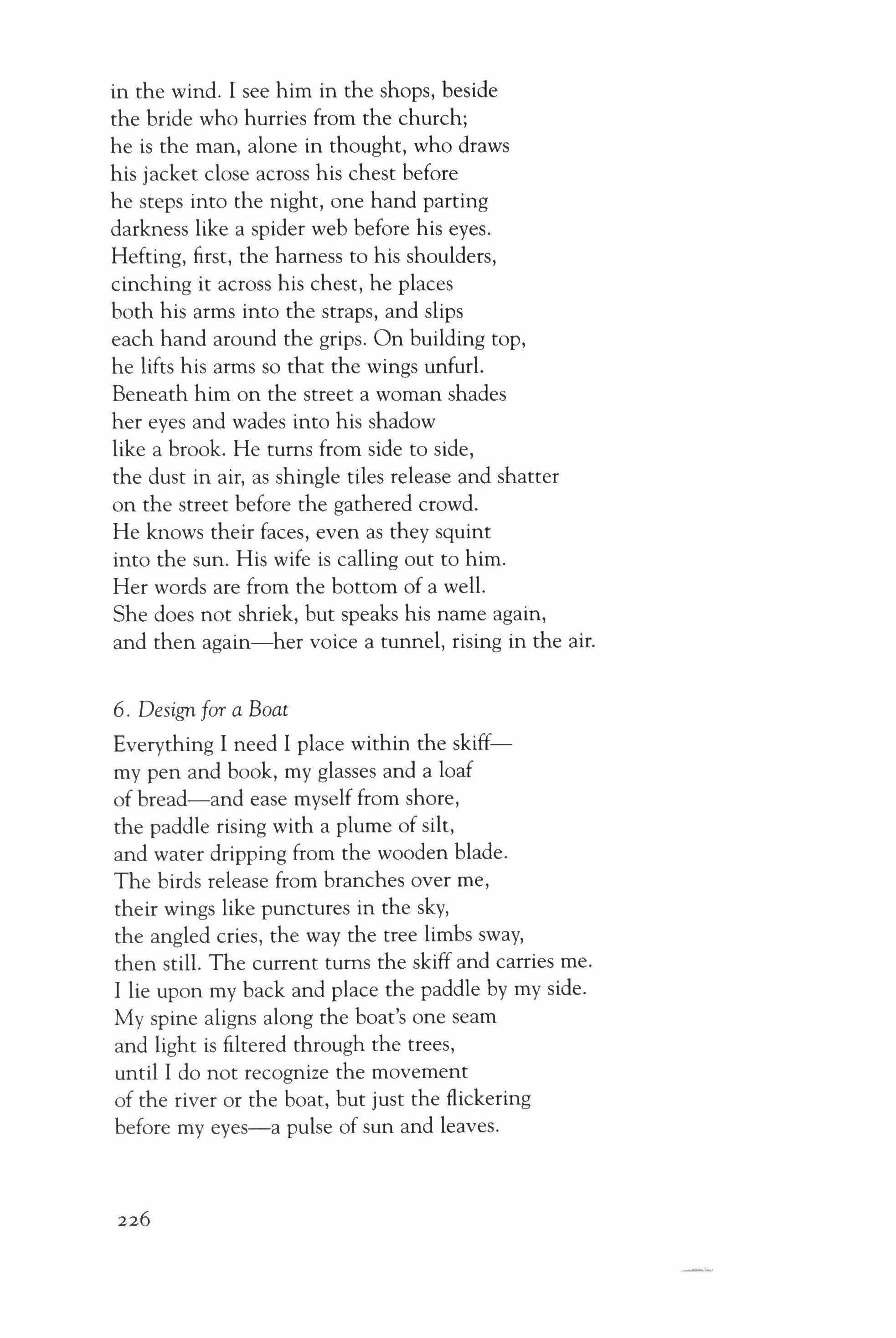
in the wind. I see him in the shops, beside the bride who hurries from the church; he is the man, alone in thought, who draws his jacket close across his chest before he steps into the night, one hand parting darkness like a spider web before his eyes. Hefting, first, the harness to his shoulders, cinching it across his chest, he places both his arms into the straps, and slips each hand around the grips. On building top, he lifts his arms so that the wings unfurl. Beneath him on the street a woman shades her eyes and wades into his shadow like a brook. He turns from side to side, the dust in air, as shingle tiles release and shatter on the street before the gathered crowd. He knows their faces, even as they squint into the sun. His wife is calling out to him. Her words are from the bottom of a well. She does not shriek, but speaks his name again, and then again-her voice a tunnel, rising in the air.
6. Design for a Boat
Everything I need I place within the skiffmy pen and book, my glasses and a loaf of bread-and ease myself from shore, the paddle rising with a plume of silt, and water dripping from the wooden blade. The birds release from branches over me, their wings like punctures in the sky, the angled cries, the way the tree limbs sway, then still. The current turns the skiff and carries me. I lie upon my back and place the paddle by my side. My spine aligns along the boat's one seam and light is filtered through the trees, until I do not recognize the movement of the river or the boat, but just the flickering before my eyes-a pulse of sun and leaves.
226
Corey Marks
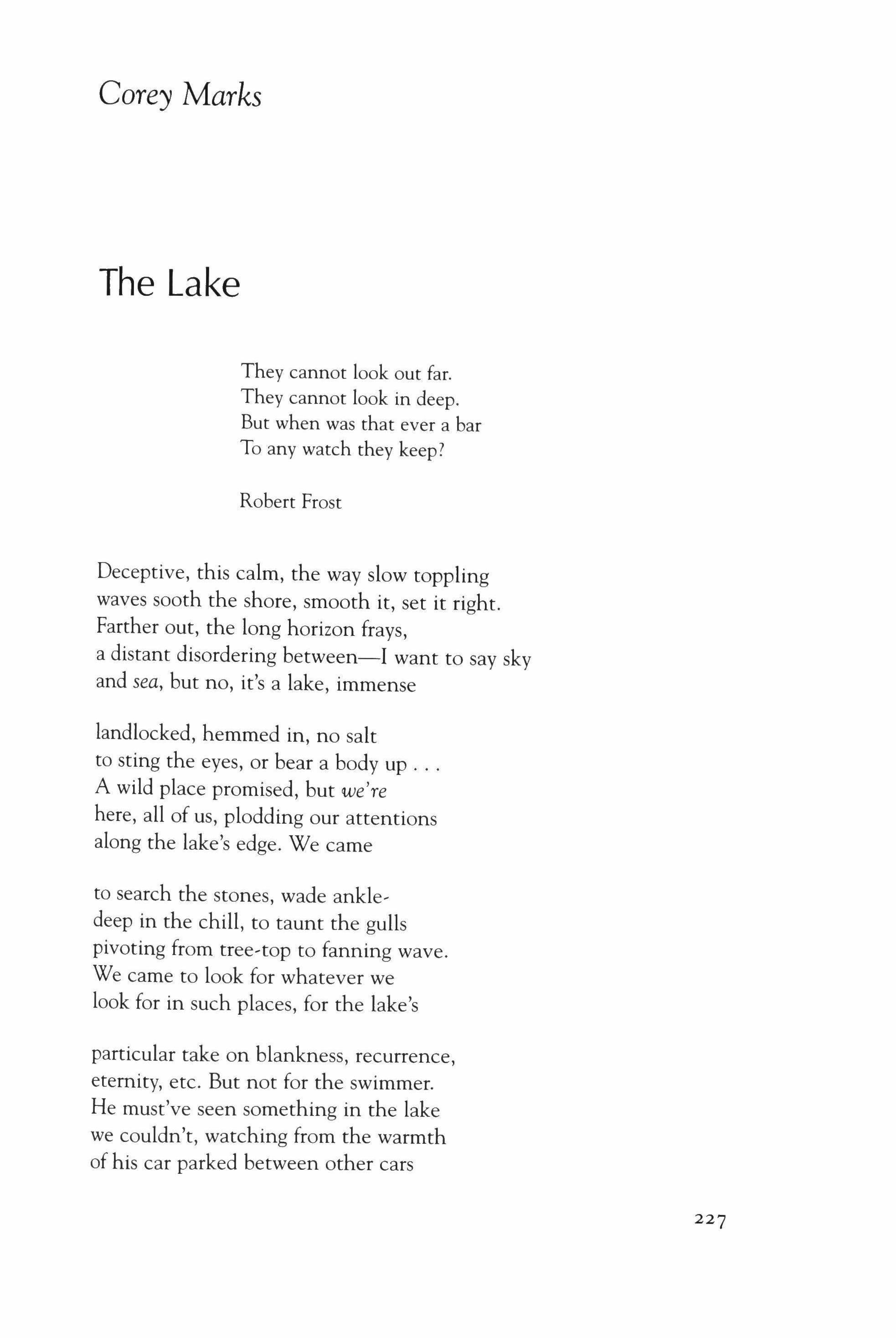
The Lake
They cannot look out far. They cannot look in deep.
But when was that ever a bar
To any watch they keep?
Robert Frost
Deceptive, this calm, the way slow toppling waves sooth the shore, smooth it, set it right. Farther out, the long horizon frays, a distant disordering between-I want to say sky and sea, but no, it's a lake, immense
landlocked, hemmed in, no salt to sting the eyes, or bear a body up A wild place promised, but we're here, all of us, plodding our attentions along the lake's edge. We came
to search the stones, wade ankledeep in the chill, to taunt the gulls pivoting from tree-top to fanning wave. We came to look for whatever we look for in such places, for the lake's particular take on blankness, recurrence, eternity, etc. But not for the swimmer. He must've seen something in the lake we couldn't, watching from the warmth of his car parked between other cars
227
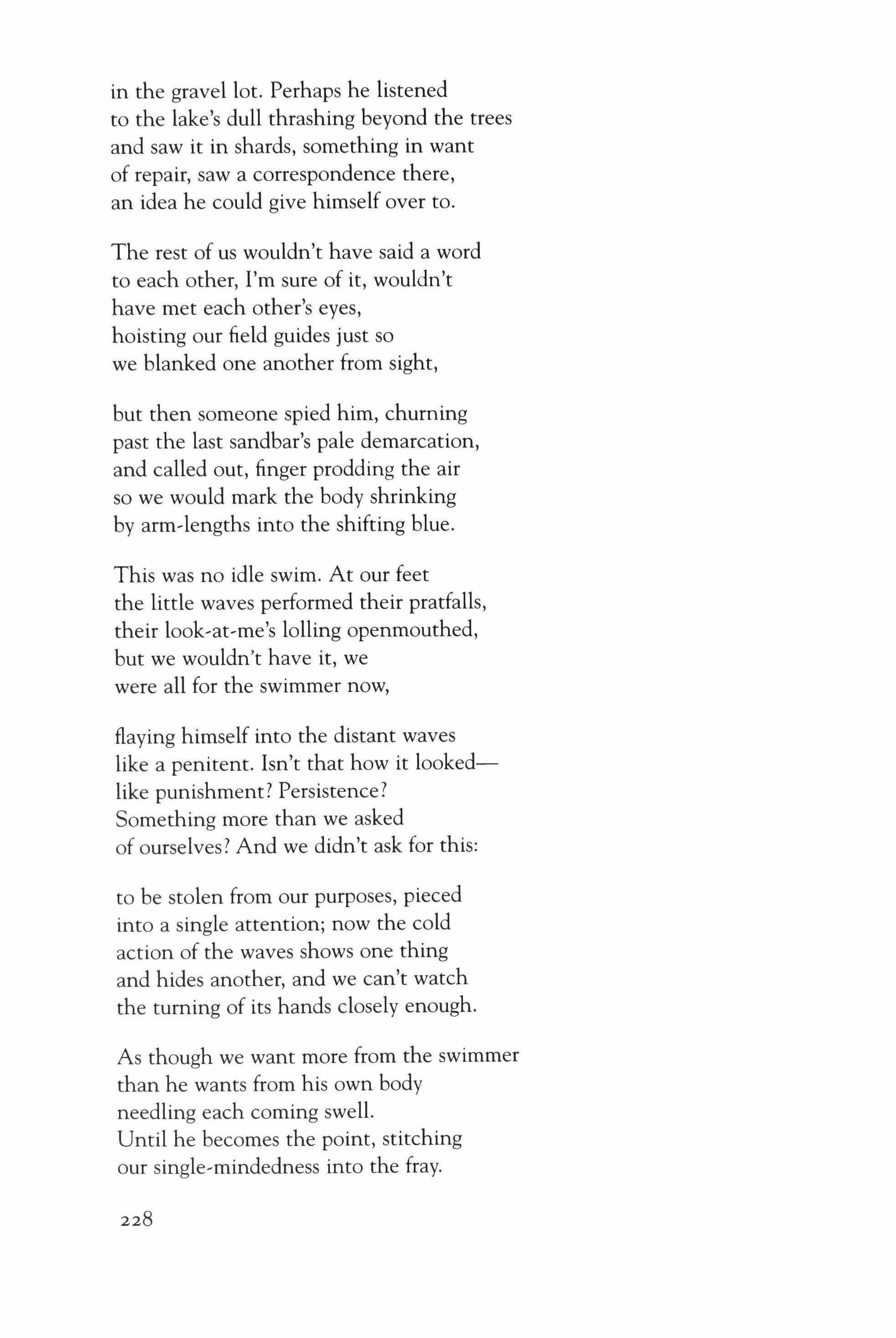
in the gravel lot. Perhaps he listened to the lake's dull thrashing beyond the trees and saw it in shards, something in want of repair, saw a correspondence there, an idea he could give himself over to.
The rest of us wouldn't have said a word to each other, I'm sure of it, wouldn't have met each other's eyes, hoisting our field guides just so we blanked one another from sight,
but then someone spied him, churning past the last sandbar's pale demarcation, and called out, finger prodding the air so we would mark the body shrinking by arm-lengths into the shifting blue.
This was no idle swim. At our feet the little waves performed their pratfalls, their look-at-me's lolling openmouthed, but we wouldn't have it, we were all for the swimmer now,
flaying himself into the distant waves like a penitent. Isn't that how it lookedlike punishment? Persistence? Something more than we asked of ourselves? And we didn't ask for this:
to be stolen from our purposes, pieced into a single attention; now the cold action of the waves shows one thing and hides another, and we can't watch the turning of its hands closely enough.
As though we want more from the swimmer than he wants from his own body needling each coming swell. Until he becomes the point, stitching our single-rnindedness into the fray.
228
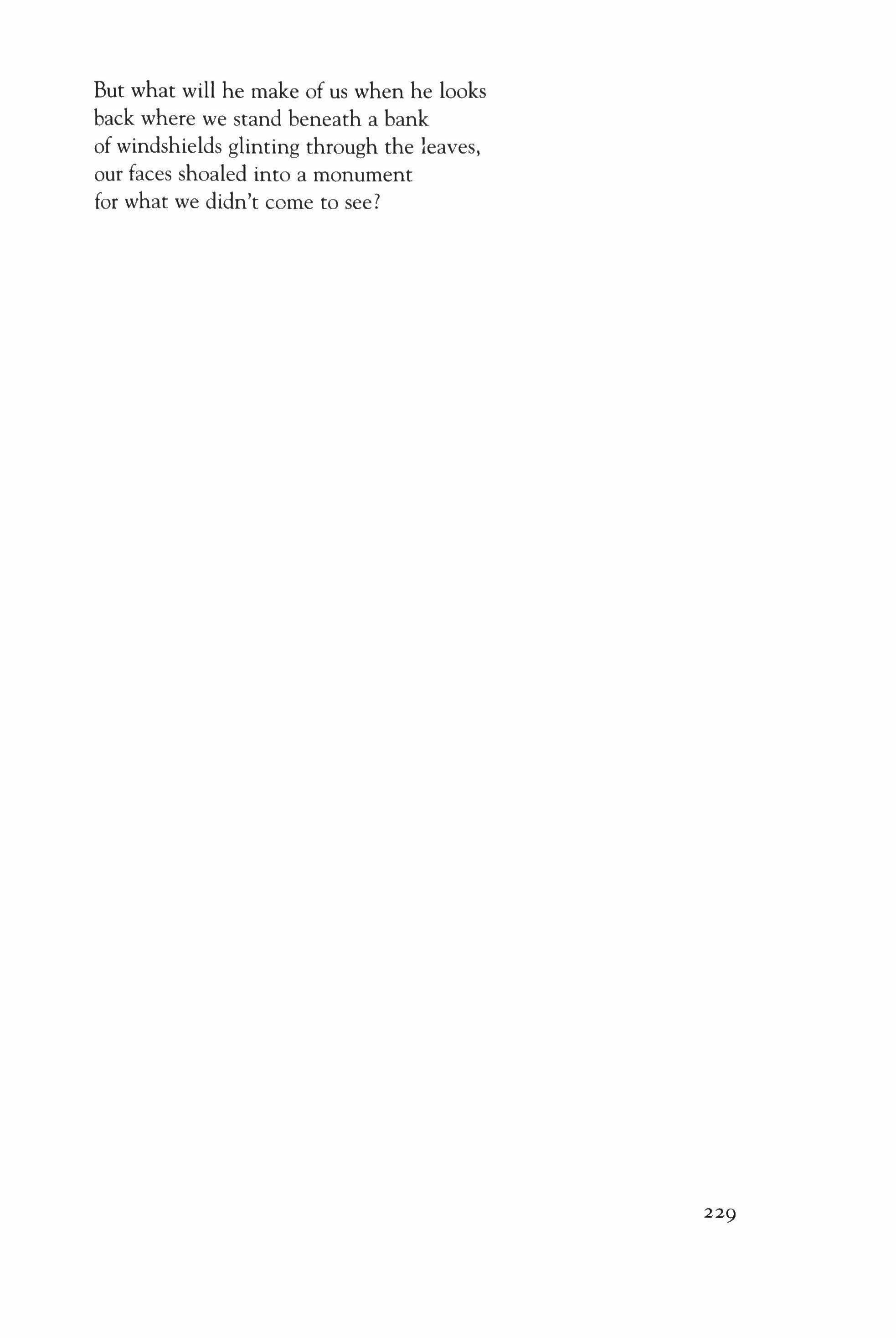
But what will he make of us when he looks back where we stand beneath a bank of windshields glinting through the leaves, our faces shoaled into a monument for what we didn't come to see?
229
The Empty Theater
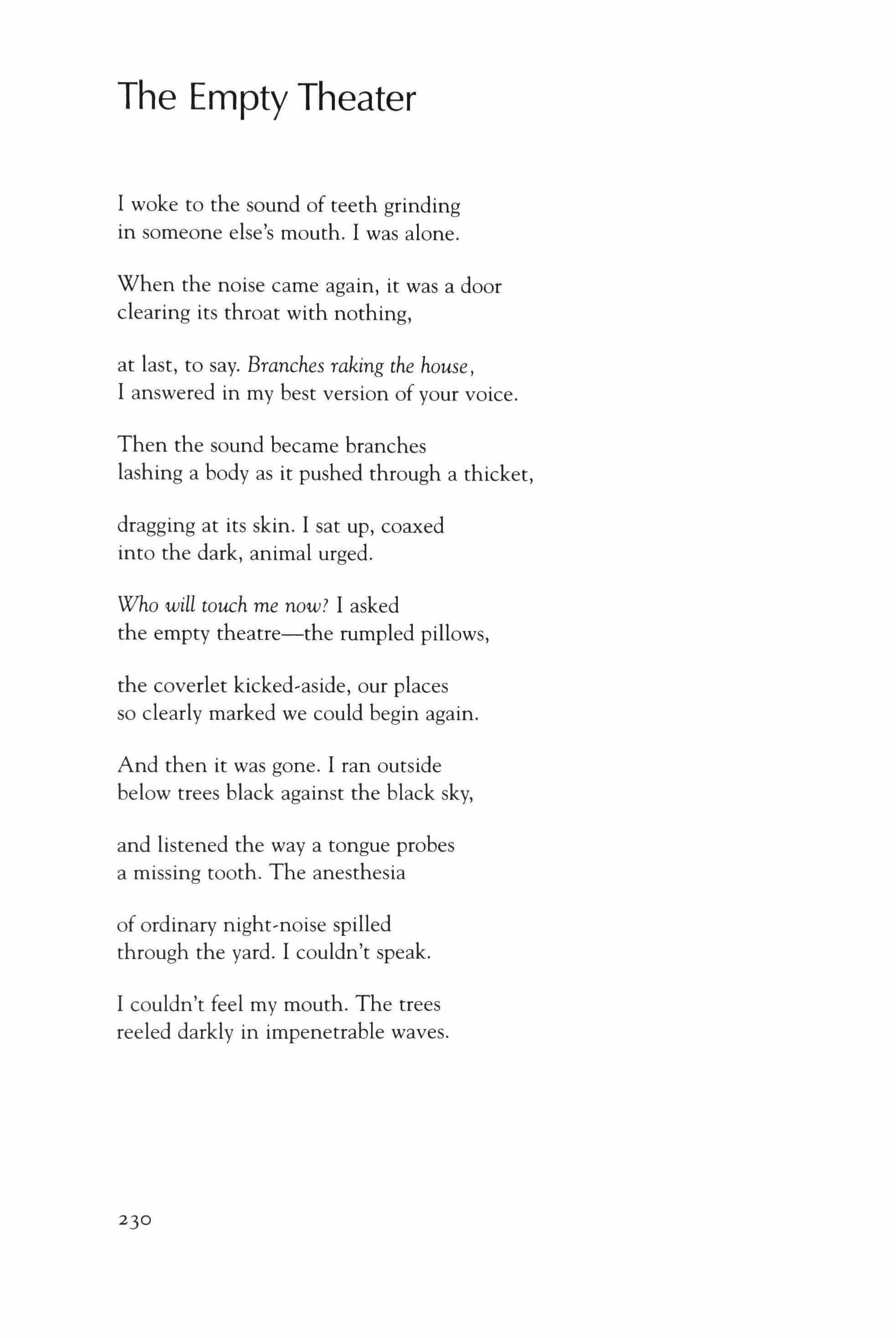
I woke to the sound of teeth grinding in someone else's mouth. I was alone.
When the noise came again, it was a door clearing its throat with nothing, at last, to say. Branches raking the house, I answered in my best version of your voice.
Then the sound became branches lashing a body as it pushed through a thicket, dragging at its skin. I sat up, coaxed into the dark, animal urged.
Who will touch me now? I asked the empty theatre-the rumpled pillows, the coverlet kicked-aside, our places so clearly marked we could begin again.
And then it was gone. I ran outside below trees black against the black sky, and listened the way a tongue probes a missing tooth. The anesthesia of ordinary night-noise spilled through the yard. I couldn't speak.
I couldn't feel my mouth. The trees reeled darkly in impenetrable waves.
230
Hotel Fire
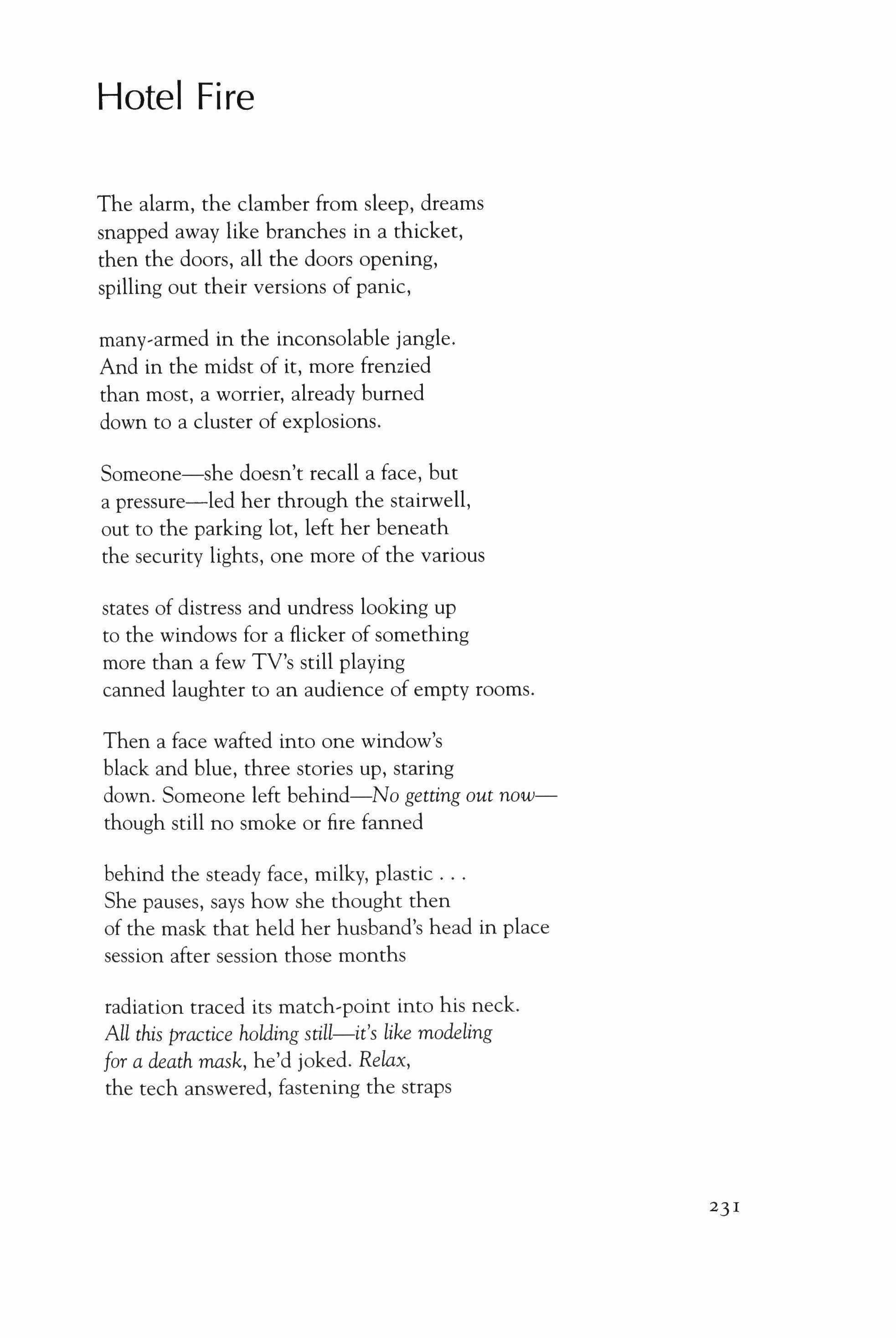
The alarm, the clamber from sleep, dreams snapped away like branches in a thicket, then the doors, all the doors opening, spilling out their versions of panic, many-armed in the inconsolable jangle. And in the midst of it, more frenzied than most, a worrier, already burned down to a cluster of explosions.
Someone-she doesn't recall a face, but a pressure-led her through the stairwell, out to the parking lot, left her beneath the security lights, one more of the various states of distress and undress looking up to the windows for a flicker of something more than a few TV's still playing canned laughter to an audience of empty rooms.
Then a face wafted into one window's black and blue, three stories up, staring down. Someone left behind-No getting out nowthough still no smoke or fire fanned behind the steady face, milky, plastic She pauses, says how she thought then of the mask that held her husband's head in place session after session those months radiation traced its match-point into his neck. All this practice holding still-it's like modeling for a death mask, he'd joked. Relax, the tech answered, fastening the straps
23I

behind his head. But how could he relax into the stillness required, how could he lower his face to the task with all his concentration focused
the way a carp tests the frozen surface of the winter pond? How could he make a joke of it? How could he make her think such a thing? And how could anyone
save the face risen to the window now? She worried about smoke roiling under the door, over the bed, the heat, dust and ash, the coughing fit that wouldn't unclench,
doubling the body like laughter, but not funny, nothing funny about it, worried one more of the many deaths to die before anyone dies, pored over like scales
she never meant to practice But what happened? you insist, impatient as any son. But you know this one already: the mask in the window raised a hand, pale blue
and waving. Someone laughed, someone shouted. The siren died. And in her chest, blood trundled over itself like hands fastening and unfastening what they couldn't secure.
232
Anne Harding Woodworth
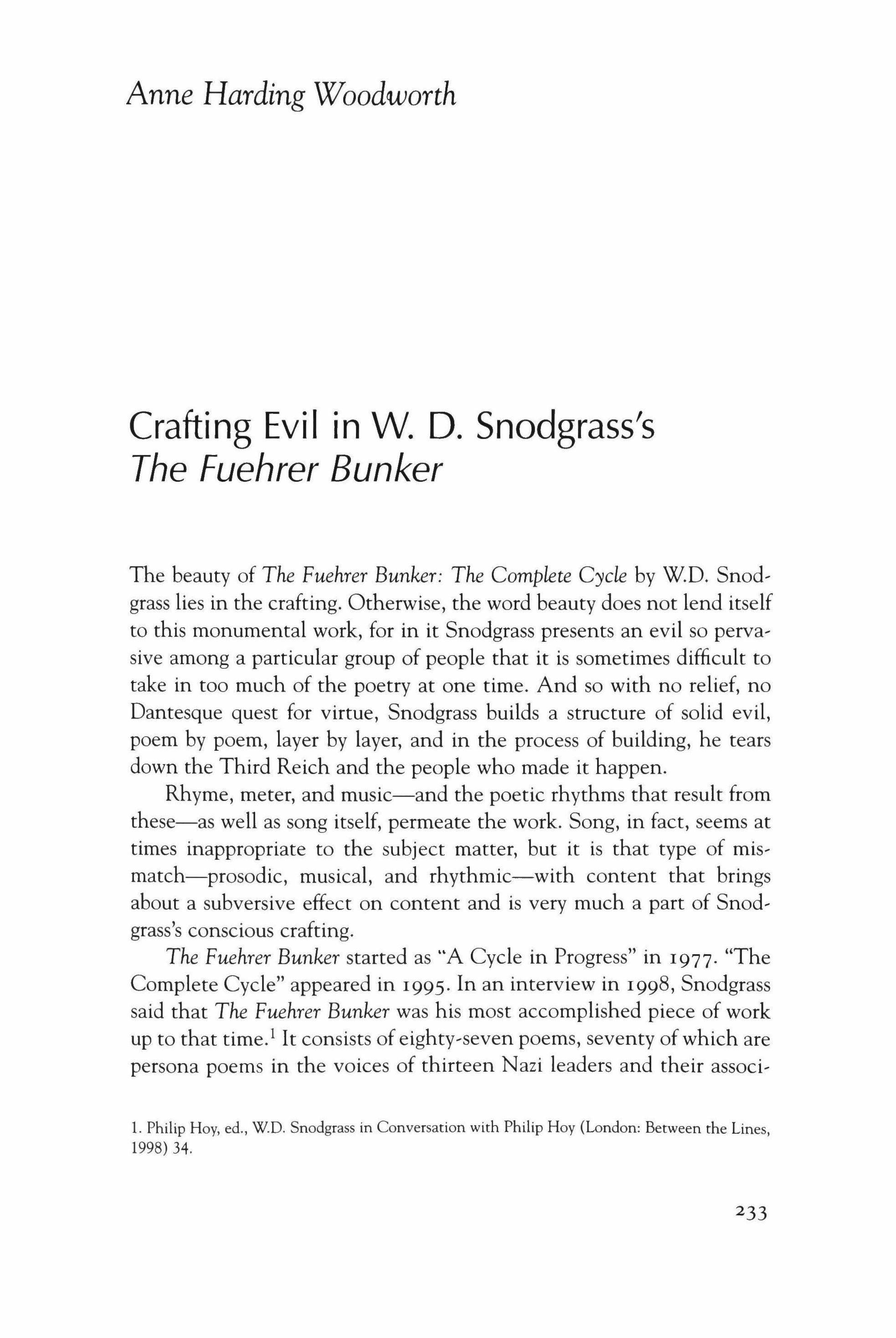
Crafting Evil in W.
D. Snodgrass's
The Fuehrer Bunker
The beauty of The Fuehrer Bunker: The Complete Cycle by w.o. Snodgrass lies in the crafting. Otherwise, the word beauty does not lend itself to this monumental work, for in it Snodgrass presents an evil so pervasive among a particular group of people that it is sometimes difficult to take in too much of the poetry at one time. And so with no relief, no Dantesque quest for virtue, Snodgrass builds a structure of solid evil, poem by poem, layer by layer, and in the process of building, he tears down the Third Reich and the people who made it happen.
Rhyme, meter, and music-and the poetic rhythms that result from these-as well as song itself, permeate the work. Song, in fact, seems at times inappropriate to the subject matter, but it is that type of mismatch-prosodic, musical, and rhythmic-with content that brings about a subversive effect on content and is very much a part of Snodgrass's conscious crafting.
The Fuehrer Bunker started as "A Cycle in Progress" in 1977. "The Complete Cycle" appeared in 1995. In an interview in 1998, Snodgrass said that The Fuehrer Bunker was his most accomplished piece of work up to that time.' It consists of eighty-seven poems, seventy ofwhich are persona poems in the voices of thirteen Nazi leaders and their associ-
1. Philip Hoy, ed., W.D. Snodgrass in Conversation with Philip Hoy (London: Between the Lines, 1998) 34.
233
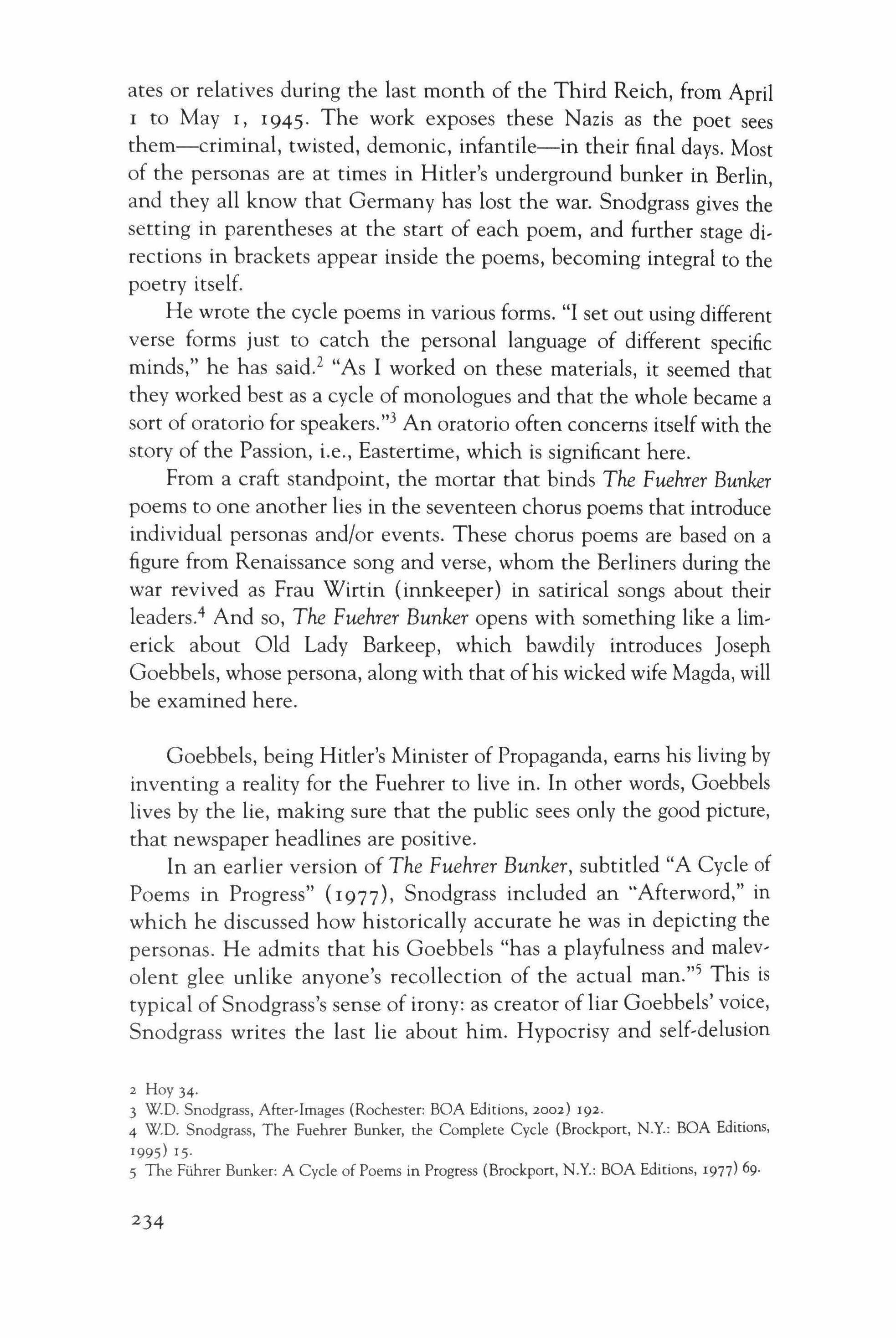
ates or relatives during the last month of the Third Reich, from April 1 to May I, 1945. The work exposes these Nazis as the poet sees them-criminal, twisted, demonic, infantile-in their final days. Most of the personas are at times in Hitler's underground bunker in Berlin, and they all know that Germany has lost the war. Snodgrass gives the setting in parentheses at the start of each poem, and further stage directions in brackets appear inside the poems, becoming integral to the poetry itself.
He wrote the cycle poems in various forms. "I set out using different verse forms just to catch the personal language of different specific minds," he has said.? "As I worked on these materials, it seemed that they worked best as a cycle of monologues and that the whole became a sort of oratorio for speakers.l" An oratorio often concerns itself with the story of the Passion, i.e., Eastertime, which is significant here.
From a craft standpoint, the mortar that binds The Fuehrer Bunker poems to one another lies in the seventeen chorus poems that introduce individual personas and/or events. These chorus poems are based on a figure from Renaissance song and verse, whom the Berliners during the war revived as Frau Wirtin (innkeeper) in satirical songs about their leaders." And so, The Fuehrer Bunker opens with something like a limerick about Old Lady Barkeep, which bawdily introduces Joseph Goebbels, whose persona, along with that ofhis wicked wife Magda, will be examined here.
Goebbels, being Hitler's Minister of Propaganda, earns his living by inventing a reality for the Fuehrer to live in. In other words, Goebbels lives by the lie, making sure that the public sees only the good picture, that newspaper headlines are positive.
In an earlier version of The Fuehrer Bunker, subtitled "A Cycle of Poems in Progress" (1977), Snodgrass included an "Afterword," in which he discussed how historically accurate he was in depicting the personas. He admits that his Goebbels "has a playfulness and malevolent glee unlike anyone's recollection of the actual man.'? This is typical of Snodgrass's sense of irony: as creator of liar Goebbels' voice, Snodgrass writes the last lie about him. Hypocrisy and self-delusion
2 Hoy 34.
3 W.D. Snodgrass, After-Images (Rochester: BOA Editions, 2002) 192.
4 W.D. Snodgrass, The Fuehrer Bunker, the Complete Cycle (Brockport, N.Y.: BOA Editions, 1995) IS·
5 The FUhrer Bunker: A Cycle of Poems in Progress (Brockport, N.Y.: BOA Editions, 1977) 69·
234
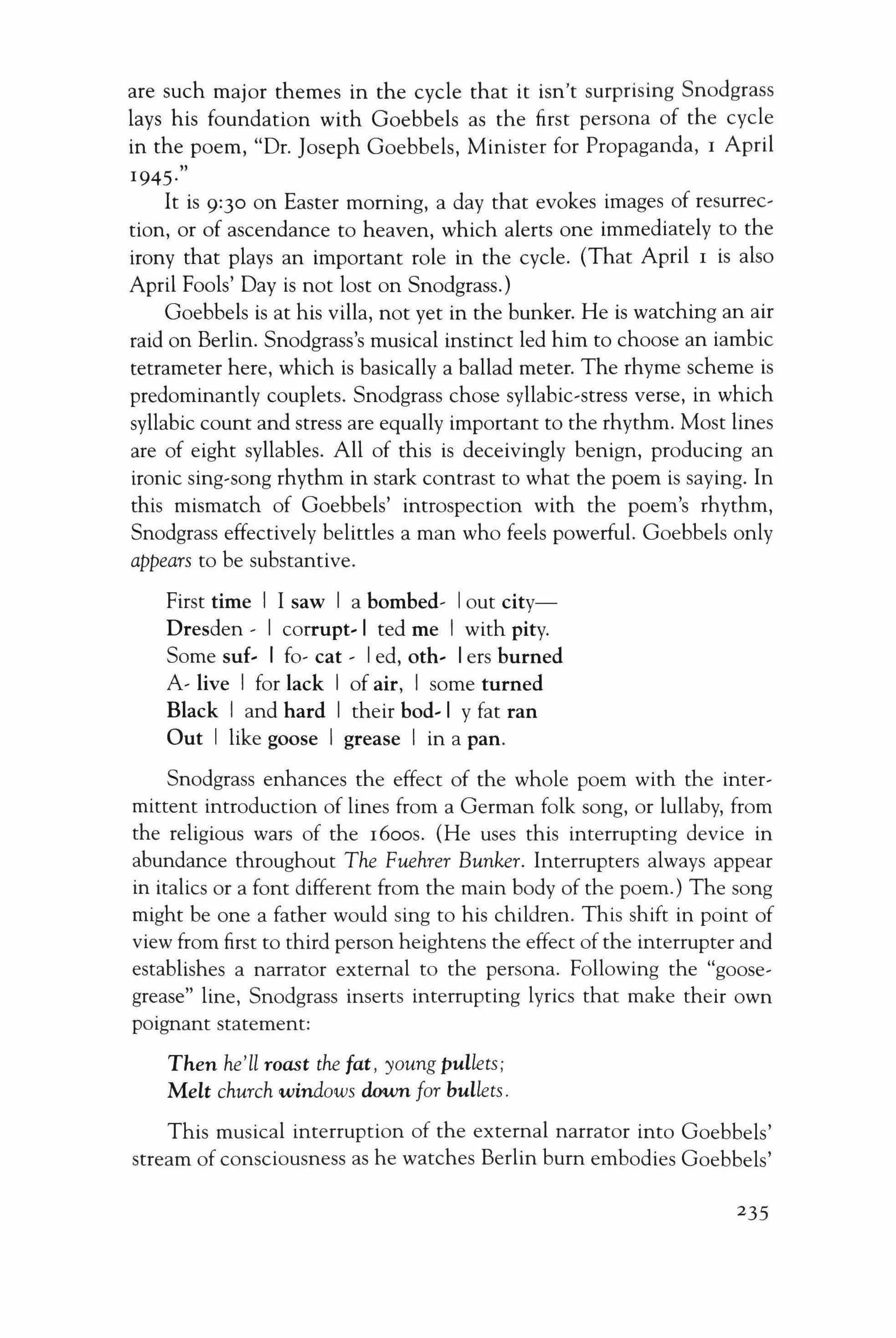
are such major themes in the cycle that it isn't surprising Snodgrass lays his foundation with Goebbels as the first persona of the cycle in the poem, "Dr. Joseph Goebbels, Minister for Propaganda, 1 April 1945·"
It is 9:30 on Easter morning, a day that evokes images of resurrection, or of ascendance to heaven, which alerts one immediately to the irony that plays an important role in the cycle. (That April 1 is also April Fools' Day is not lost on Snodgrass.)
Goebbels is at his villa, not yet in the bunker. He is watching an air raid on Berlin. Snodgrass's musical instinct led him to choose an iambic tetrameter here, which is basically a ballad meter. The rhyme scheme is predominantly couplets. Snodgrass chose syllabic-stress verse, in which syllabic count and stress are equally important to the rhythm. Most lines are of eight syllables. All of this is deceivingly benign, producing an ironic sing-song rhythm in stark contrast to what the poem is saying. In this mismatch of Goebbels' introspection with the poem's rhythm, Snodgrass effectively belittles a man who feels powerful. Goebbels only appears to be substantive.
First time I I saw I a bombed- lout cityDresden I corrupt- I ted me I with pity.
Some suf- I fo- cat � I ed, oth- I ers burned
A� live I for lack I of air, I some turned Black I and hard I their bod- I y fat ran Out like goose I grease I in a pan.
Snodgrass enhances the effect of the whole poem with the intermittent introduction of lines from a German folk song, or lullaby, from the religious wars of the 1600s. (He uses this interrupting device in abundance throughout The Fuehrer Bunker. Interrupters always appear in italics or a font different from the main body of the poem.) The song might be one a father would sing to his children. This shift in point of view from first to third person heightens the effect of the interrupter and establishes a narrator external to the persona. Following the "goosegrease" line, Snodgrass inserts interrupting lyrics that make their own poignant statement:
Then he'll roast the fat, young pullets; Melt church windows down for bullets.
This musical interruption of the external narrator into Goebbels' stream of consciousness as he watches Berlin bum embodies Goebbels'
235

own wickedness. The rhyme, "bullets" with "pullets," is unexpected and emphasizes the inappropriateness of such words in a lullaby. Although the song cuts into the organic quality of the persona poem, it reveals the whole man, a liar and a father of unconvincing paternal instinct.
In this poem, Snodgrass gives the lullaby lines first in English, and later-most likely for sound-in German, mixed in with English. Historically, this lullaby was meant to frighten children about the arrival of the blood-thirsty Swedes, particularly a man named Axel Oxenstierna.
Mo-- I gen komm I der Ox-I enstjer-] na
Once, I my news-] cast-ers would I dis-guise Each loss I as a tri-umph. I Those I lies Were mere I truths I we mis-] under-stood: There's I no ev- I il we can't I find good.
Will I der kin' I der bet- I en Ier-ne.
[turns back to the window}
Let it all fall in, I burn I and burst. Blest be I who dares I act out I his worst Im- pulses, I give way I to the I thirst For blood I and show I this for I the accursed Inferno we I took it for, I right from the I first.
Bet, kinder, bet; Pray children, pray.
The rhyme "lies" with "disguise" is almost preordained. The monosyllabic stress groups, "Those" and "lies," on the heels of an end stop, syncopate the rhythm and amplify the meaning ofwhat Goebbels is saying about truth-how, to him, truth and lies are interchangeable. He turns back to the window; a rhythmic lilt sets in with "Let it all fall in," and the lines seem to pick up speed that is not hindered by the alliteration of "bum," "burst," and "Blest be." The last line of the stanza, which is syllabically longer than any other in the poem, has a hickory-dickorvdock sound to it created by three dactyls, which point up Goebbels' inconstant thoughts. Enjambment, especially combined with the five'time rhyme of the -irst sound, moves things rapidly and headlong to the prayerful, heavy, shocking end.
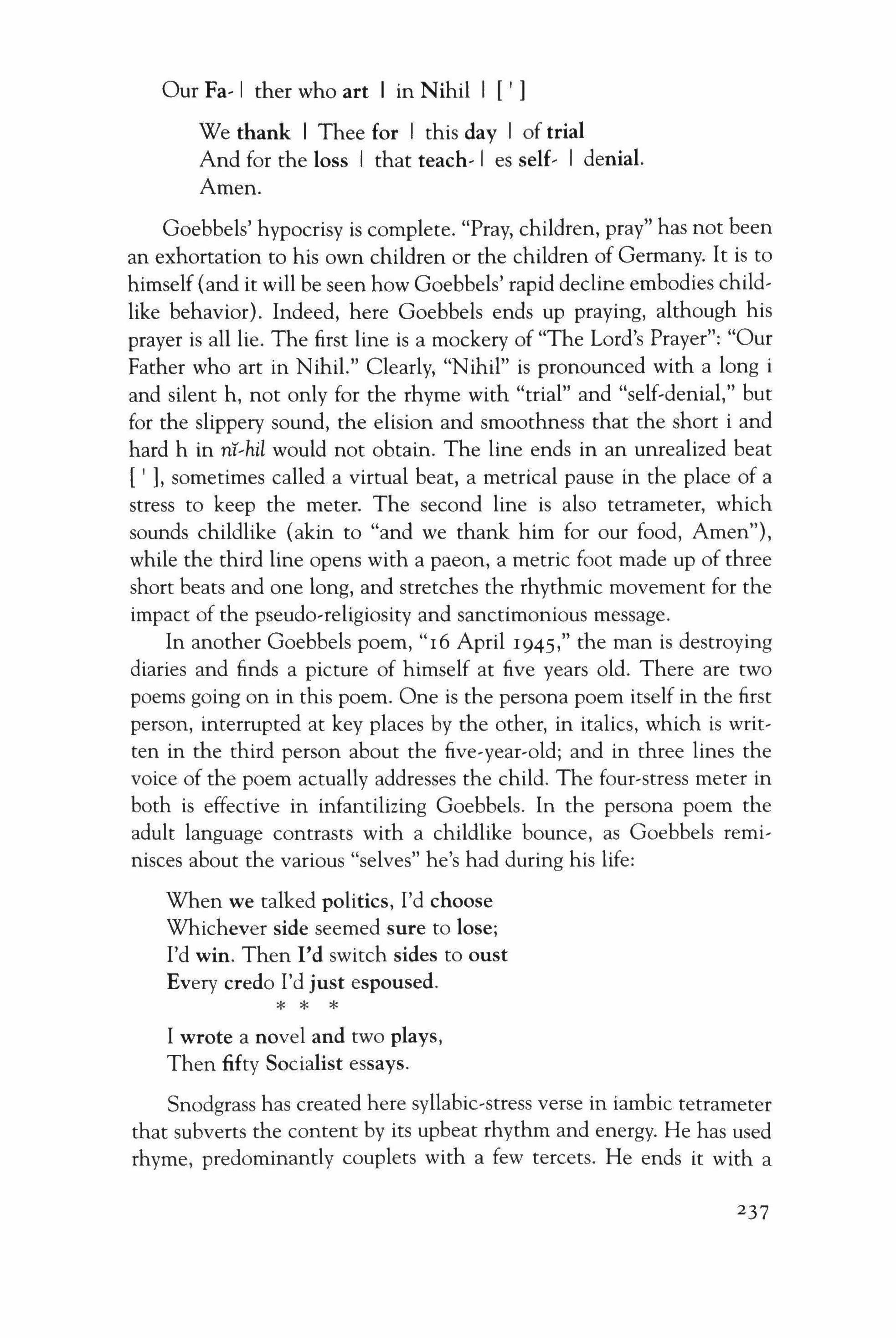
We thank I Thee for I this day I of trial And for the loss I that teach- es self- I denial. Amen.
Goebbels' hypocrisy is complete. "Pray, children, pray" has not been an exhortation to his own children or the children of Germany. It is to himself (and it will be seen how Goebbels' rapid decline embodies childlike behavior). Indeed, here Goebbels ends up praying, although his prayer is all lie. The first line is a mockery of "The Lord's Prayer": "Our Father who art in Nihil." Clearly, "Nihil" is pronounced with a long i and silent h, not only for the rhyme with "trial" and "self-denial," but for the slippery sound, the elision and smoothness that the short i and hard h in nz-hil would not obtain. The line ends in an unrealized beat [ I ], sometimes called a virtual beat, a metrical pause in the place of a stress to keep the meter. The second line is also tetrameter, which sounds childlike (akin to "and we thank him for our food, Amen"), while the third line opens with a paeon, a metric foot made up of three short beats and one long, and stretches the rhythmic movement for the impact of the pseudo-religiosity and sanctimonious message.
In another Goebbels poem, "16 April 1945," the man is destroying diaries and finds a picture of himself at five years old. There are two poems going on in this poem. One is the persona poem itself in the first person, interrupted at key places by the other, in italics, which is written in the third person about the five-year-old; and in three lines the voice of the poem actually addresses the child. The four-stress meter in both is effective in infantilizing Goebbels. In the persona poem the adult language contrasts with a childlike bounce, as Goebbels reminisces about the various "selves" he's had during his life:
When we talked politics, I'd choose Whichever side seemed sure to lose; I'd win. Then I'd switch sides to oust Every credo I'd just espoused. * * *
I wrote a novel and two plays, Then fifty Socialist essays.
Snodgrass has created here syllabic-stress verse in iambic tetrameter that subverts the content by its upbeat rhythm and energy. He has used rhyme, predominantly couplets with a few tercets. He ends it with a
Our
Nihil
Fa- I ther who art I in
I [I]
237
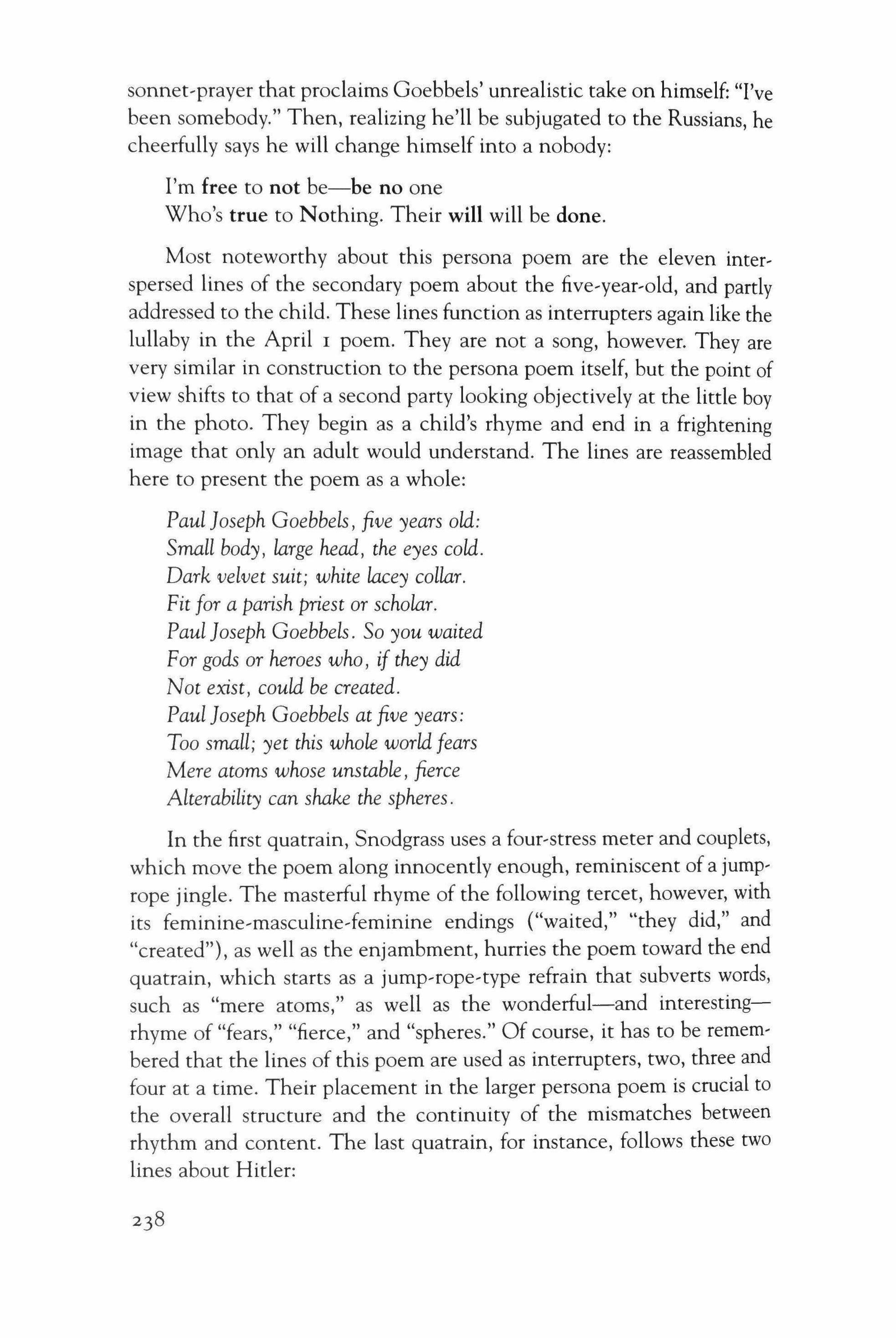
sonnet-prayer that proclaims Goebbels' unrealistic take on himself: "I've been somebody." Then, realizing he'll be subjugated to the Russians, he cheerfully says he will change himself into a nobody:
I'm free to not be-be no one
Who's true to Nothing. Their will will be done.
Most noteworthy about this persona poem are the eleven interspersed lines of the secondary poem about the tive-year-old, and partly addressed to the child. These lines function as interrupters again like the lullaby in the April I poem. They are not a song, however. They are very similar in construction to the persona poem itself, but the point of view shifts to that of a second party looking objectively at the little boy in the photo. They begin as a child's rhyme and end in a frightening image that only an adult would understand. The lines are reassembled here to present the poem as a whole:
Paulloseph Goebbels, five years old:
Small body, large head, the eyes cold. Dark velvet suit; white lacey collar. Fit for a parish priest or scholar.
Paul}oseph Goebbels. So you waited For gods or heroes who, if they did Not exist, could be created.
Paul}oseph Goebbels at five years: Too small; yet this whole world fears Mere atoms whose unstable, fierce Alterability can shake the spheres.
In the first quatrain, Snodgrass uses a four-stress meter and couplets, which move the poem along innocently enough, reminiscent of a jumprope jingle. The masterful rhyme of the following tercet, however, with its feminine-masculine-ferninine endings ("waited," "they did," and "created"), as well as the enjambment, hurries the poem toward the end quatrain, which starts as a jump-rope-type refrain that subverts words, such as "mere atoms," as well as the wonderful-and interestingrhyme of "fears," "fierce," and "spheres." Of course, it has to be remembered that the lines of this poem are used as interrupters, two, three and four at a time. Their placement in the larger persona poem is crucial to the overall structure and the continuity of the mismatches between rhythm and content. The last quatrain, for instance, follows these two lines about Hitler:
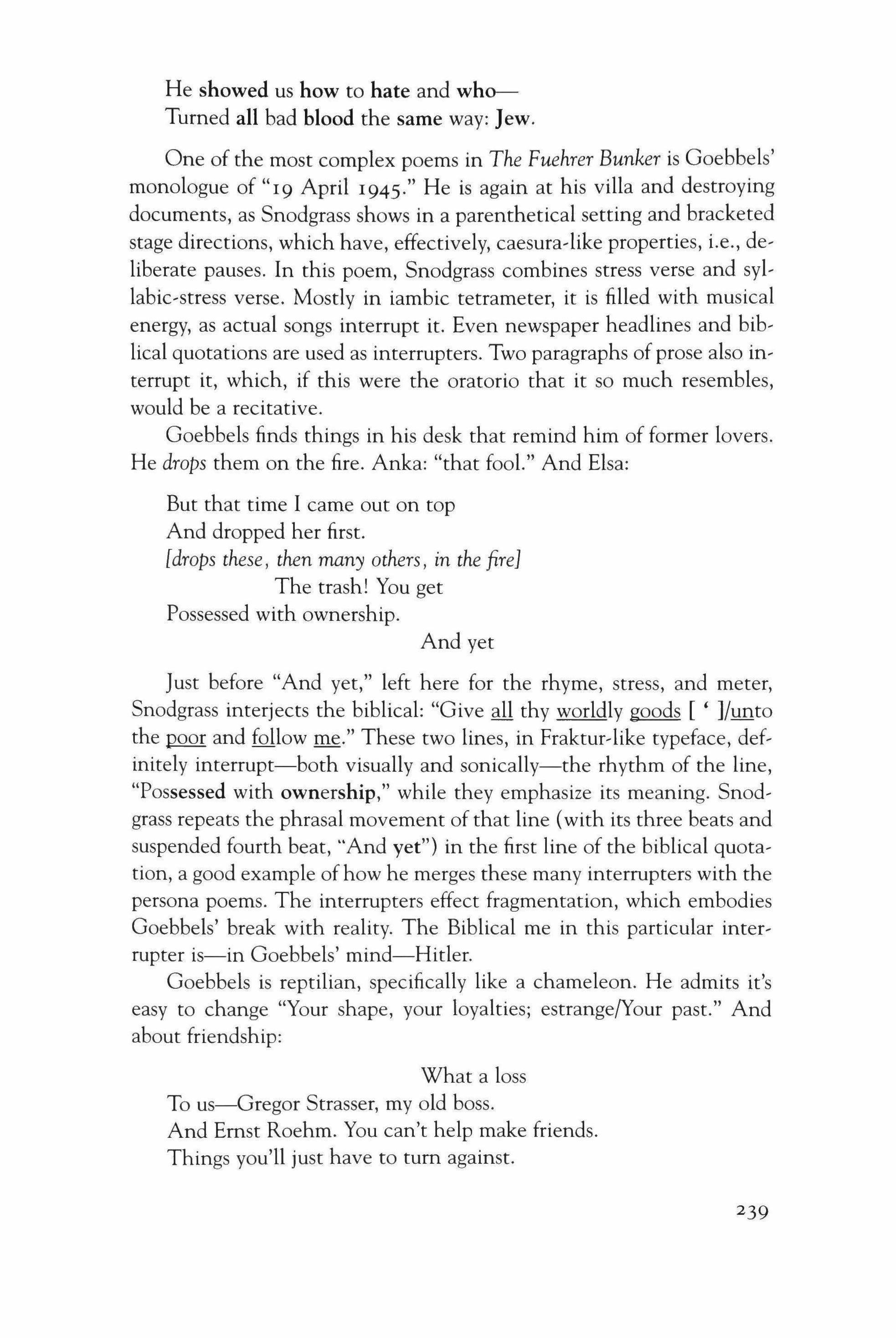
He showed us how to hate and who
Turned all bad blood the same way: Jew.
One of the most complex poems in The Fuehrer Bunker is Goebbels' monologue of "19 April 1945." He is again at his villa and destroying documents, as Snodgrass shows in a parenthetical setting and bracketed stage directions, which have, effectively, caesura-like properties, Le., deliberate pauses. In this poem, Snodgrass combines stress verse and syllabic-stress verse. Mostly in iambic tetrameter, it is filled with musical energy, as actual songs interrupt it. Even newspaper headlines and biblical quotations are used as interrupters. Two paragraphs of prose also interrupt it, which, if this were the oratorio that it so much resembles, would be a recitative.
Goebbels finds things in his desk that remind him of former lovers. He drops them on the fire. Anka: "that fool." And Elsa:
But that time I came out on top And dropped her first.
[drops these, then many others, in the fire}
The trash! You get Possessed with ownership.
And yet
Just before "And yet," left here for the rhyme, stress, and meter, Snodgrass interjects the biblical: "Give all thy worldly goods [ ]/unto the poor and follow me." These two lines, in Fraktur-like typeface, definitely interrupt-both visually and sonically-the rhythm of the line, "Possessed with ownership," while they emphasize its meaning. Snodgrass repeats the phrasal movement of that line (with its three beats and suspended fourth beat, "And yet") in the first line of the biblical quotation, a good example ofhow he merges these many interrupters with the persona poems. The interrupters effect fragmentation, which embodies Goebbels' break with reality. The Biblical me in this particular interrupter is-in Goebbels' mind-Hitler.
Goebbels is reptilian, specifically like a chameleon. He admits it's easy to change "Your shape, your loyalties; estrange/Your past." And about friendship:
What a loss
To us-Gregor Strasser, my old boss. And Ernst Roehm. You can't help make friends. Things you'll just have to turn against.
239
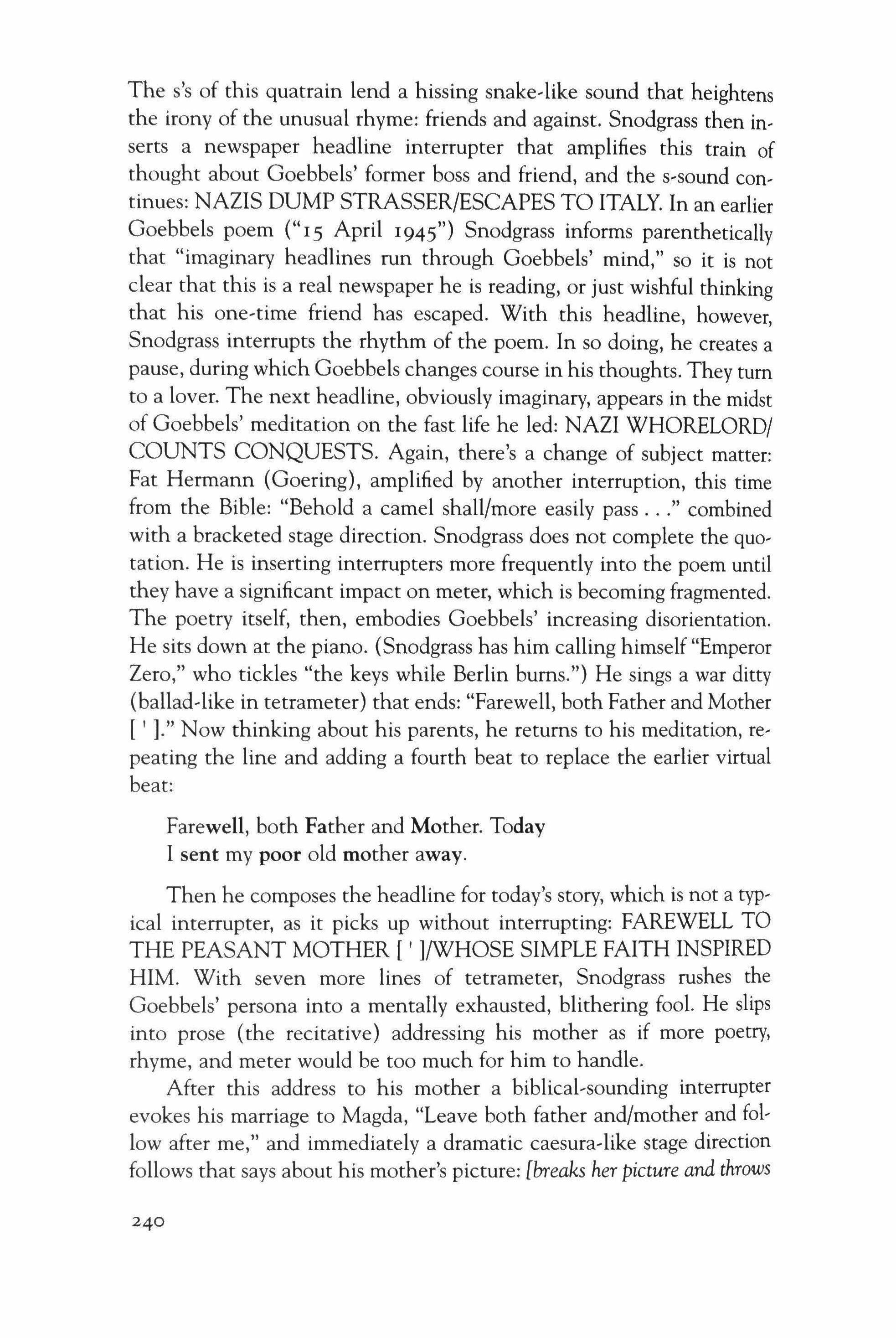
The s's of this quatrain lend a hissing snake-like sound that heightens the irony of the unusual rhyme: friends and against. Snodgrass then inserts a newspaper headline interrupter that amplifies this train of thought about Goebbels' former boss and friend, and the s-sound continues: NAZIS DUMP STRASSER/ESCAPES TO ITALY. In an earlier Goebbels poem ("15 April 1945") Snodgrass informs parenthetically that "imaginary headlines run through Goebbels' mind," so it is not clear that this is a real newspaper he is reading, or just wishful thinking that his one-time friend has escaped. With this headline, however, Snodgrass interrupts the rhythm of the poem. In so doing, he creates a pause, during which Goebbels changes course in his thoughts. They tum to a lover. The next headline, obviously imaginary, appears in the midst of Goebbels' meditation on the fast life he led: NAZI WHORELORDj COUNTS CONQUESTS. Again, there's a change of subject matter: Fat Hermann (Goering), amplified by another interruption, this time from the Bible: "Behold a camel shall/more easily pass combined with a bracketed stage direction. Snodgrass does not complete the quotation. He is inserting interrupters more frequently into the poem until they have a significant impact on meter, which is becoming fragmented. The poetry itself, then, embodies Goebbels' increasing disorientation. He sits down at the piano. (Snodgrass has him calling himself "Emperor Zero," who tickles "the keys while Berlin bums.") He sings a war ditty (ballad-like in tetrameter) that ends: "Farewell, both Father and Mother [ ]." Now thinking about his parents, he returns to his meditation, re� peating the line and adding a fourth beat to replace the earlier virtual beat:
Farewell, both Father and Mother. Today I sent my poor old mother away.
Then he composes the headline for today's story, which is not a rypical interrupter, as it picks up without interrupting: FAREWELL TO THE PEASANT MOTHER [ ]/WHOSE SIMPLE FAITH INSPIRED HIM. With seven more lines of tetrameter, Snodgrass rushes the Goebbels' persona into a mentally exhausted, blithering fool. He slips into prose (the recitative) addressing his mother as if more poetry, rhyme, and meter would be too much for him to handle.
After this address to his mother a biblical-sounding interrupter evokes his marriage to Magda, "Leave both father and/mother and follow after me," and immediately a dramatic caesura-like stage direction follows that says about his mother's picture: [breaks her picture and throws
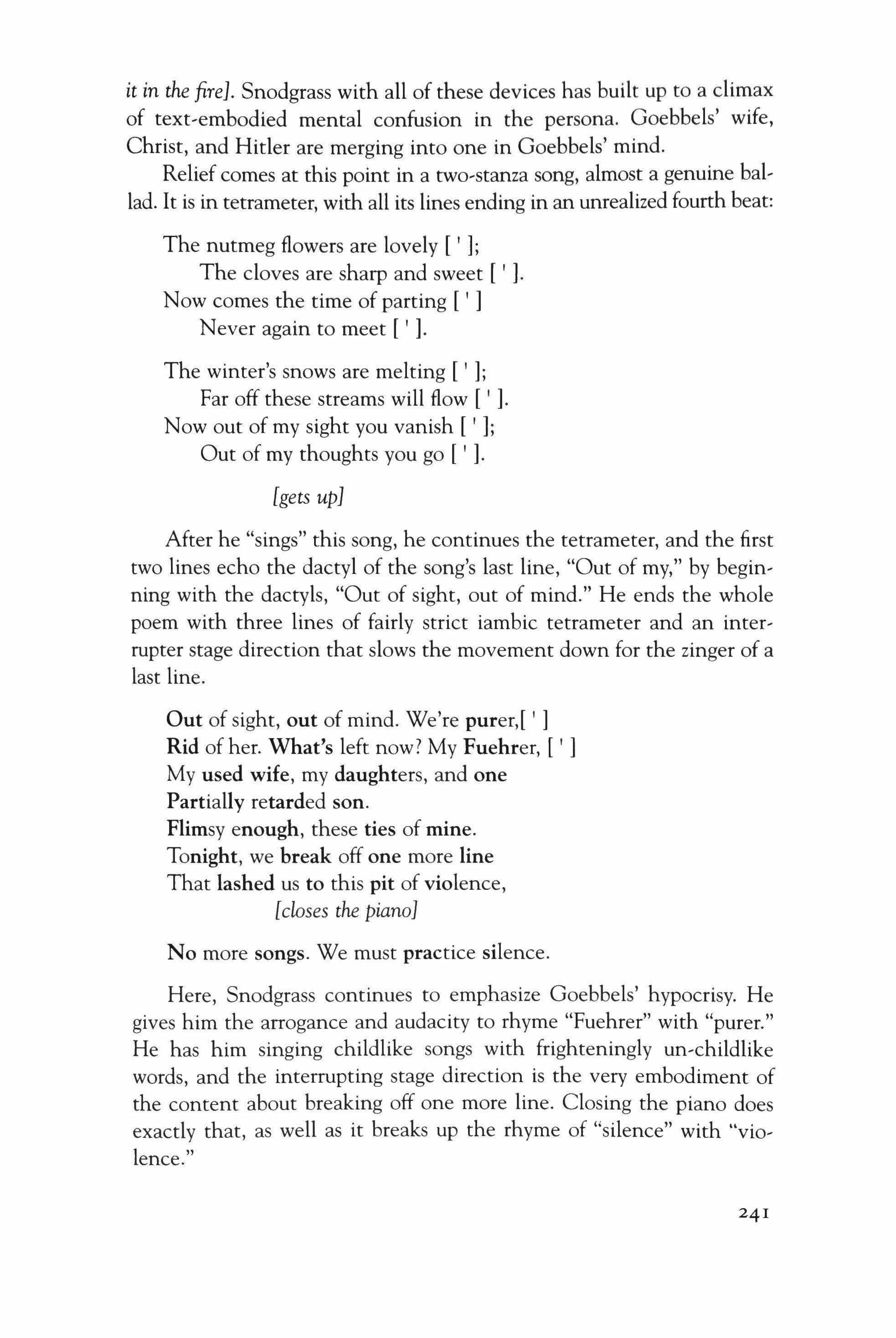
it in the fire}. Snodgrass with all of these devices has built up to a climax of text-embodied mental confusion in the persona. Goebbels' wife, Christ, and Hitler are merging into one in Goebbels' mind.
Relief comes at this point in a two-stanza song, almost a genuine ballad. It is in tetrameter, with all its lines ending in an unrealized fourth beat:
The nutmeg flowers are lovely [ I ];
The cloves are sharp and sweet [ I ].
Now comes the time of parting [ I]
Never again to meet [ I ].
The winter's snows are melting [ I ];
Far off these streams will flow [ I ].
Now out of my sight you vanish [ I ];
Out of my thoughts you go [ I ].
[gets up}
After he "sings" this song, he continues the tetrameter, and the first two lines echo the dactyl of the song's last line, "Out of my," by begin, ning with the dactyls, "Out of sight, out of mind." He ends the whole poem with three lines of fairly strict iambic tetrameter and an inter' rupter stage direction that slows the movement down for the zinger of a last line.
Out of sight, out of mind. We're purer,[ I] Rid of her. What's left now? My Fuehrer, [ I ] My used wife, my daughters, and one Partially retarded son.
Flimsy enough, these ties of mine.
Tonight, we break off one more line That lashed us to this pit of violence, [closes the piano}
No more songs. We must practice silence.
Here, Snodgrass continues to emphasize Goebbels' hypocrisy. He gives him the arrogance and audacity to rhyme "Fuehrer" with "purer." He has him singing childlike songs with frighteningly uri-childlike words, and the interrupting stage direction is the very embodiment of the content about breaking off one more line. Closing the piano does exactly that, as well as it breaks up the rhyme of "silence" with "violence."
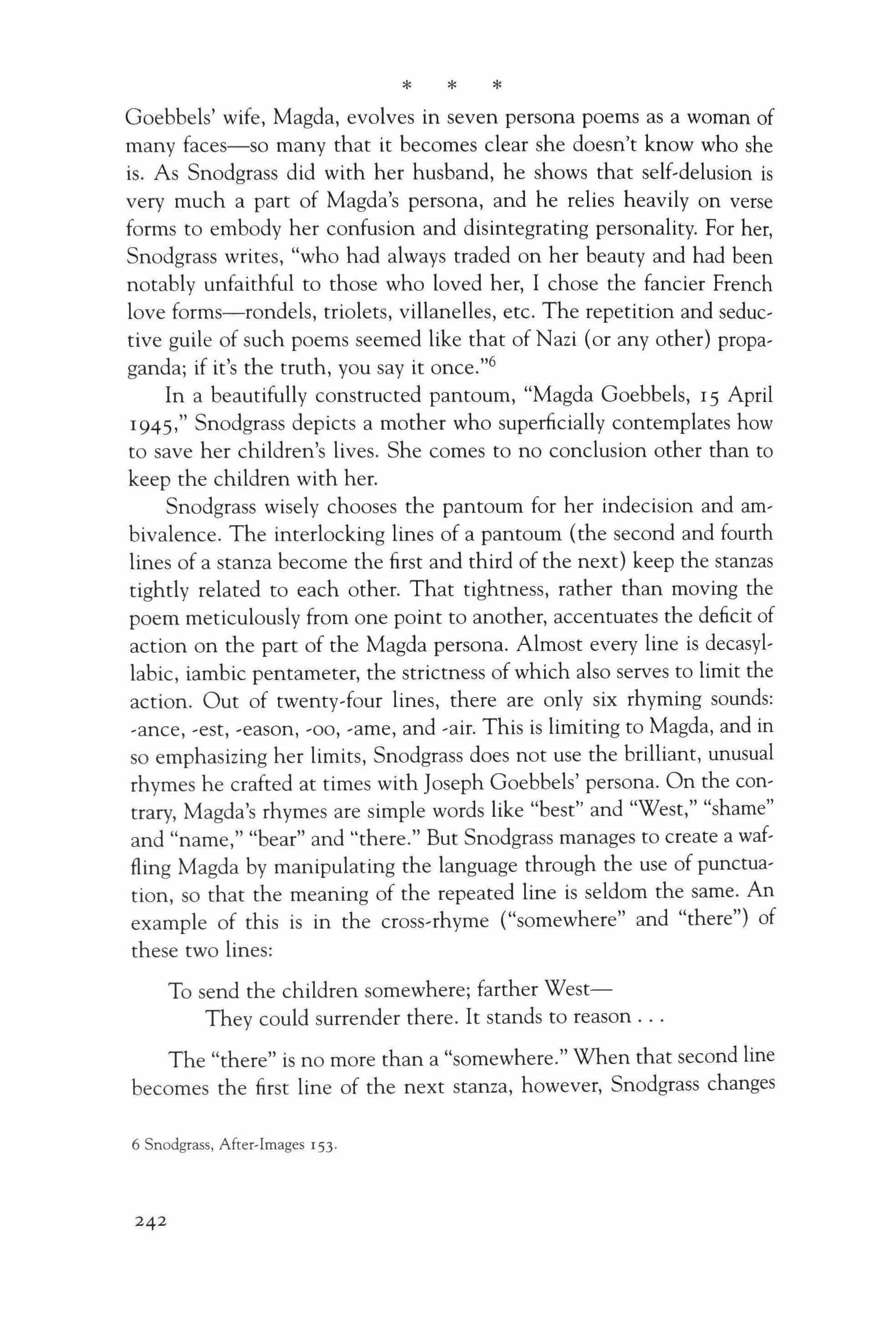
* * *
Goebbels' wife, Magda, evolves in seven persona poems as a woman of many faces-so many that it becomes clear she doesn't know who she is. As Snodgrass did with her husband, he shows that self-delusion is very much a part of Magda's persona, and he relies heavily on verse forms to embody her confusion and disintegrating personality. For her, Snodgrass writes, "who had always traded on her beauty and had been notably unfaithful to those who loved her, I chose the fancier French love forms-rondels, triolets, villanelles, etc. The repetition and seductive guile of such poems seemed like that of Nazi (or any other) propaganda; if it's the truth, you say it once. "6
In a beautifully constructed pantoum, "Magda Goebbels, 15 April 1945," Snodgrass depicts a mother who superficially contemplates how to save her children's lives. She comes to no conclusion other than to keep the children with her.
Snodgrass wisely chooses the pantoum for her indecision and ambivalence. The interlocking lines of a pantoum (the second and fourth lines of a stanza become the first and third of the next) keep the stanzas tightly related to each other. That tightness, rather than moving the poem meticulously from one point to another, accentuates the deficit of action on the part of the Magda persona. Almost every line is decasyllabic, iambic pentameter, the strictness of which also serves to limit the action. Out of twenty-four lines, there are only six rhyming sounds: -ance, -est, -eason, -00, -ame, and -air, This is limiting to Magda, and in so emphasizing her limits, Snodgrass does not use the brilliant, unusual rhymes he crafted at times with Joseph Goebbels' persona. On the contrary, Magda's rhymes are simple words like "best" and "West," "shame" and "name," "bear" and "there." But Snodgrass manages to create a waffling Magda by manipulating the language through the use of punctuation, so that the meaning of the repeated line is seldom the same. An example of this is in the cross-rhyme ("somewhere" and "there") of these two lines:
To send the children somewhere; farther WestThey could surrender there. It stands to reason
The "there" is no more than a "somewhere." When that second line becomes the first line of the next stanza, however, Snodgrass changes
6 Snodgrass, After-Images 153·
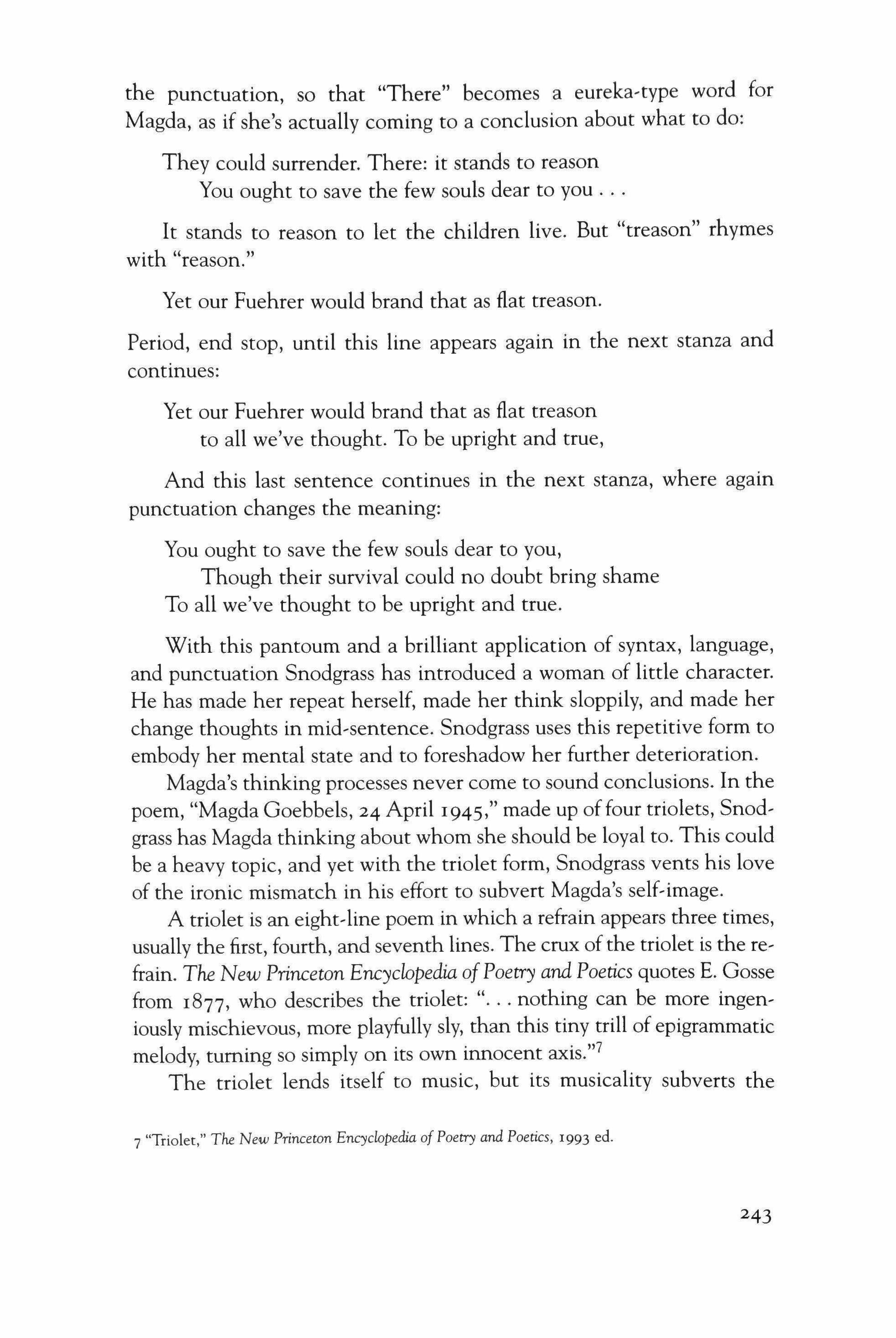
the punctuation, so that "There" becomes a eureka-type word for Magda, as if she's actually coming to a conclusion about what to do:
They could surrender. There: it stands to reason You ought to save the few souls dear to you
It stands to reason to let the children live. But "treason" rhymes with "reason."
Yet our Fuehrer would brand that as flat treason. Period, end stop, until this line appears again in the next stanza and continues:
Yet our Fuehrer would brand that as flat treason to all we've thought. To be upright and true,
And this last sentence continues in the next stanza, where again punctuation changes the meaning:
You ought to save the few souls dear to you, Though their survival could no doubt bring shame
To all we've thought to be upright and true.
With this pantoum and a brilliant application of syntax, language, and punctuation Snodgrass has introduced a woman of little character. He has made her repeat herself, made her think sloppily, and made her change thoughts in mid-sentence. Snodgrass uses this repetitive form to embody her mental state and to foreshadow her further deterioration.
Magda's thinking processes never come to sound conclusions. In the poem, "Magda Goebbels, 24 April 1945," made up offour triolets, Snodgrass has Magda thinking about whom she should be loyal to. This could be a heavy topic, and yet with the triolet form, Snodgrass vents his love of the ironic mismatch in his effort to subvert Magda's self-image.
A triolet is an eight-line poem in which a refrain appears three times, usually the first, fourth, and seventh lines. The crux ofthe triolet is the refrain. The New Princeton Encyclopedia ofPoetry and Poetics quotes E. Gosse from 1877, who describes the triolet: nothing can be more ingeniously mischievous, more playfully sly, than this tiny trill of epigrammatic melody, turning so simply on its own innocent axis."?
The triolet lends itself to music, but its musicality subverts the
7 "Triolet," The New Princeton Encyclopedia of Poetry and Poetics, 1993 ed.
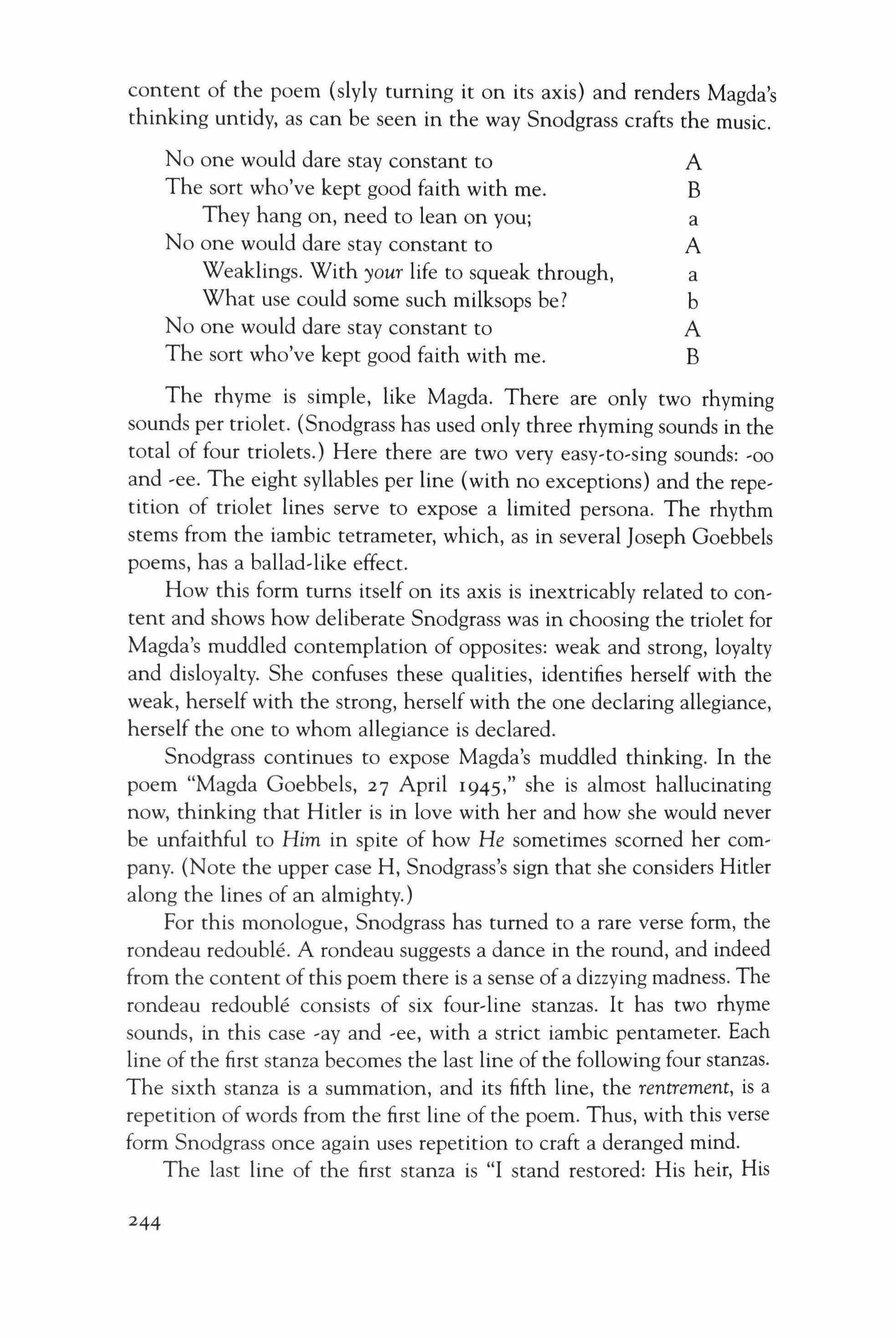
content of the poem (slyly turning it on its axis) and renders Magda's thinking untidy, as can be seen in the way Snodgrass crafts the music.
No one would dare stay constant to A
The sort who've kept good faith with me. B They hang on, need to lean on you; a
No one would dare stay constant to A
Weaklings. With your life to squeak through, a What use could some such milksops be? b
No one would dare stay constant to A
The sort who've kept good faith with me. B
The rhyme is simple, like Magda. There are only two rhyming sounds per triolet. (Snodgrass has used only three rhyming sounds in the total of four triolets.) Here there are two very easy-to-sing sounds: -oo and �ee. The eight syllables per line (with no exceptions) and the repetition of triolet lines serve to expose a limited persona. The rhythm stems from the iambic tetrameter, which, as in several Joseph Goebbels poems, has a ballad-like effect.
How this form turns itself on its axis is inextricably related to content and shows how deliberate Snodgrass was in choosing the triolet for Magda's muddled contemplation of opposites: weak and strong, loyalty and disloyalty. She confuses these qualities, identifies herself with the weak, herself with the strong, herself with the one declaring allegiance, herself the one to whom allegiance is declared.
Snodgrass continues to expose Magda's muddled thinking. In the poem "Magda Goebbels, 27 April 1945," she is almost hallucinating now, thinking that Hider is in love with her and how she would never be unfaithful to Him in spite of how He sometimes scorned her company. (Note the upper case H, Snodgrass's sign that she considers Hider along the lines of an almighty.)
For this monologue, Snodgrass has turned to a rare verse form, the rondeau redouble. A rondeau suggests a dance in the round, and indeed from the content of this poem there is a sense of a dizzying madness. The rondeau redouble consists of six four-line stanzas. It has two rhyme sounds, in this case -ay and �ee, with a strict iambic pentameter. Each line of the first stanza becomes the last line of the following four stanzas. The sixth stanza is a summation, and its fifth line, the rentrement, is a repetition of words from the first line of the poem. Thus, with this verse form Snodgrass once again uses repetition to craft a deranged mind.
The last line of the first stanza is "I stand restored: His heir, His
244
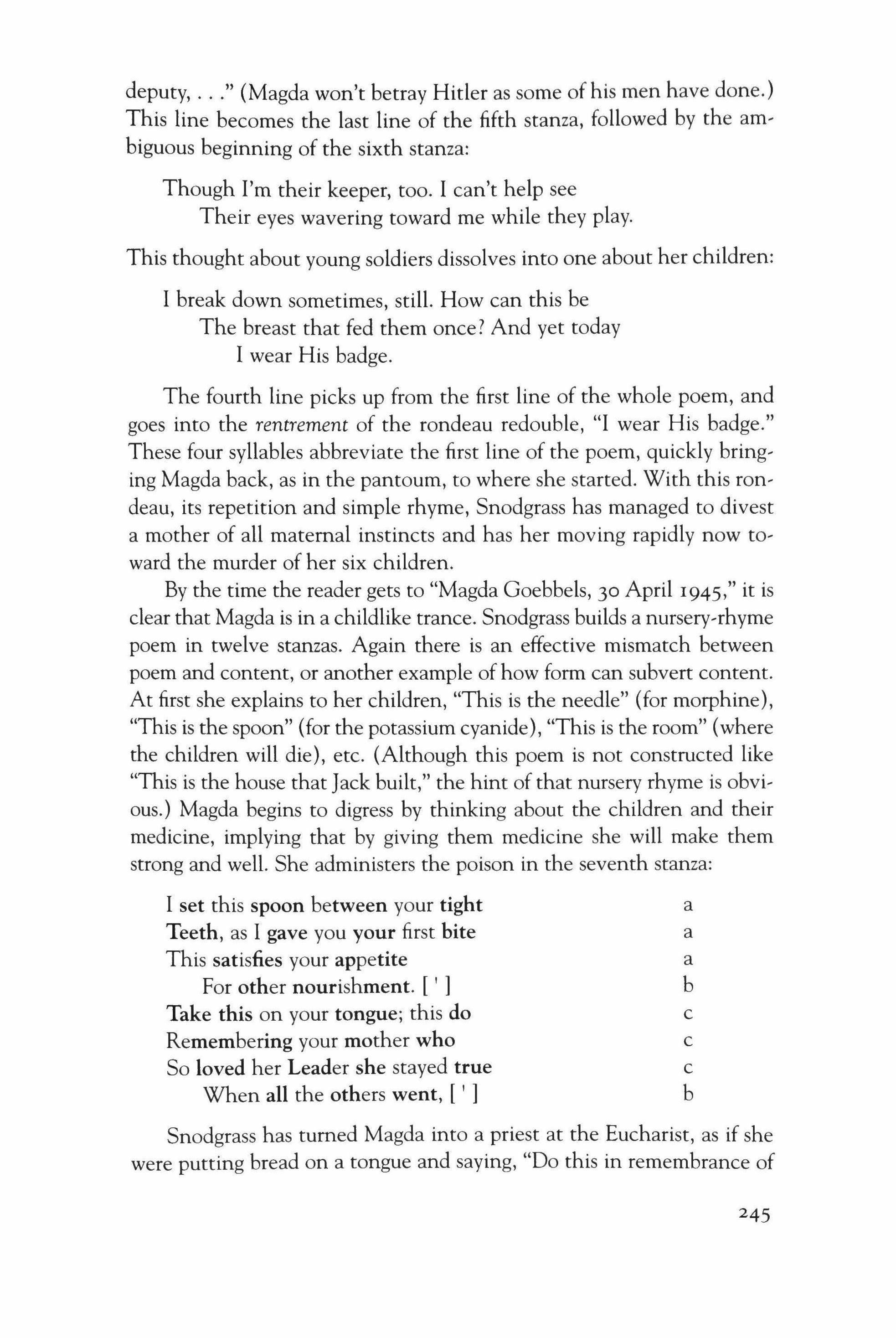
deputy, (Magda won't betray Hitler as some of his men have done.) This line becomes the last line of the fifth stanza, followed by the ambiguous beginning of the sixth stanza:
Though I'm their keeper, too. I can't help see Their eyes wavering toward me while they play. This thought about young soldiers dissolves into one about her children:
I break down sometimes, still. How can this be The breast that fed them once? And yet today I wear His badge.
The fourth line picks up from the first line of the whole poem, and goes into the rentrement of the rondeau redouble, "I wear His badge." These four syllables abbreviate the first line of the poem, quickly bringing Magda back, as in the pantoum, to where she started. With this rondeau, its repetition and simple rhyme, Snodgrass has managed to divest a mother of all maternal instincts and has her moving rapidly now toward the murder of her six children.
By the time the reader gets to "Magda Goebbels, 30 April I945,,, it is clear that Magda is in a childlike trance. Snodgrass builds a nursery-rhyme poem in twelve stanzas. Again there is an effective mismatch between poem and content, or another example ofhow form can subvert content. At first she explains to her children, "This is the needle" (for morphine), "This is the spoon" (for the potassium cyanide), "This is the room" (where the children will die), etc. (Although this poem is not constructed like "This is the house that Jack built," the hint of that nursery rhyme is obvious.) Magda begins to digress by thinking about the children and their medicine, implying that by giving them medicine she will make them strong and well. She administers the poison in the seventh stanza:
I set this spoon between your tight Teeth, as I gave you your first bite This satisfies your appetite For other nourishment. [ ] Take this on your tongue; this do Remembering your mother who So loved her Leader she stayed true When all the others went, [ , ]
Snodgrass has turned Magda into a priest at the Eucharist, as if she were putting bread on a tongue and saying, "Do this in remembrance of
a a a b c c c b
245
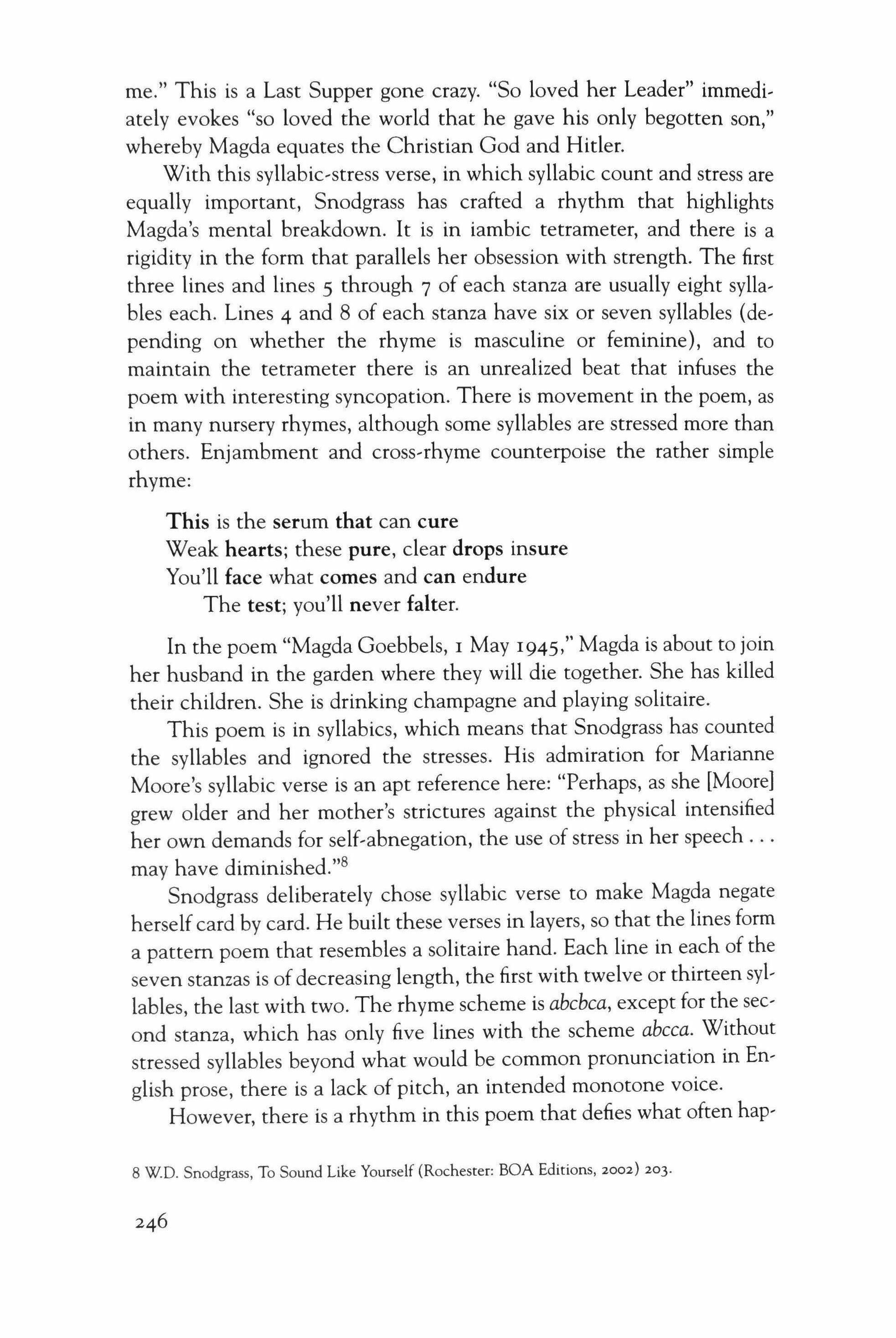
me." This is a Last Supper gone crazy. "So loved her Leader" immediately evokes "so loved the world that he gave his only begotten son," whereby Magda equates the Christian God and Hitler.
With this syllabic-stress verse, in which syllabic count and stress are equally important, Snodgrass has crafted a rhythm that highlights Magda's mental breakdown. It is in iambic tetrameter, and there is a rigidity in the form that parallels her obsession with strength. The first three lines and lines 5 through 7 of each stanza are usually eight syllables each. Lines 4 and 8 of each stanza have six or seven syllables (depending on whether the rhyme is masculine or feminine), and to maintain the tetrameter there is an unrealized beat that infuses the poem with interesting syncopation. There is movement in the poem, as in many nursery rhymes, although some syllables are stressed more than others. Enjambment and cross-rhyme counterpoise the rather simple rhyme:
This is the serum that can cure Weak hearts; these pure, clear drops insure You'll face what comes and can endure The test; you'll never falter.
In the poem "Magda Goebbels, I May 1945," Magda is about to join her husband in the garden where they will die together. She has killed their children. She is drinking champagne and playing solitaire.
This poem is in syllabics, which means that Snodgrass has counted the syllables and ignored the stresses. His admiration for Marianne Moore's syllabic verse is an apt reference here: "Perhaps, as she [Moore] grew older and her mother's strictures against the physical intensified her own demands for self-abnegation, the use of stress in her speech may have diminished.t"
Snodgrass deliberately chose syllabic verse to make Magda negate herself card by card. He built these verses in layers, so that the lines form a pattern poem that resembles a solitaire hand. Each line in each of the seven stanzas is ofdecreasing length, the first with twelve or thirteen syllables, the last with two. The rhyme scheme is abebea, except for the second stanza, which has only five lines with the scheme aheca. Without stressed syllables beyond what would be common pronunciation in English prose, there is a lack of pitch, an intended monotone voice.
However, there is a rhythm in this poem that defies what often hap-
8 W.O. Snodgrass, To Sound Like Yourself (Rochester: BOA Editions, 2002) 203·

pens in syllabic verse. The two-syllable last line enjambment of each stanza pushes one inexorably into the next stanza. It is the five-line stanza that is of particular interest to me because it embodies a sense of lacking. A line is missing, like the eye of a jack. Either Magda is drunk and having trouble counting or she's cheating (later she misses the four altogether)
We link these cards, now, building always
Down; we call them "marriages." The black eight, there
On the red nine; red goes on black.
The one-eyed jack,
There, plays
On the queen of hearts or diamonds. Kings fill any space
Left vacant
There is a downward trend in both form and content here. Magda's marriage-and everything else in her life-is in the final stage of plummeting. She is building a house of cards down, not up, just as one goes down into the bunker, or to hell. Magda is finished. Her husband is finished. Her family is finished. And Snodgrass has finished them off with his consummate, relentless craft.
Selected Bibliography
Attridge, Derek. Poetic Rhythm: An Introduction. Cambridge: Cambridge University Press, 1995.
Hecht, Anthony. "On Rhyme," in Melodies Unheard. Baltimore: The Johns Hopkins University Press, 2003.
Hollander, John. Rhyme's Reason: A Guide to English Verse. New Haven: Yale University Press, 1989.
Hoy, Philip, ed. W. D. Snodgrass in Conversation with Philip Hoy. London: Between the Lines, 1998.
Preminger, Alex, et al., eds. The New Princeton Encyclopedia ofPoetry and Poetics. Princeton, NJ: Princeton University Press, 1993·
Smith, Pete. "The Rorschach Bunker," in Agenda, 34, no. 1 (Spring 1996), pp. 112-120.
Snodgrass, W.O. After-Images: Autobiographical Sketches. Rochester, NY: BOA Editions, 1999·
247

---. In Radical Pursuit. New York: Harper & Row, 1975, pp. 276-319.
---. The Fuhrer Bunker: A Cycle of Poems in Progress. Brockport, NY: BOA Editions, 1977.
The Fuehrer Bunker: The Complete Cycle. Brockport, NY: BOA Editions, 1995.
To Sound Like Yourself: Essays on Poetry. Rochester, NY: BOA Editions, Ltd., 2002.
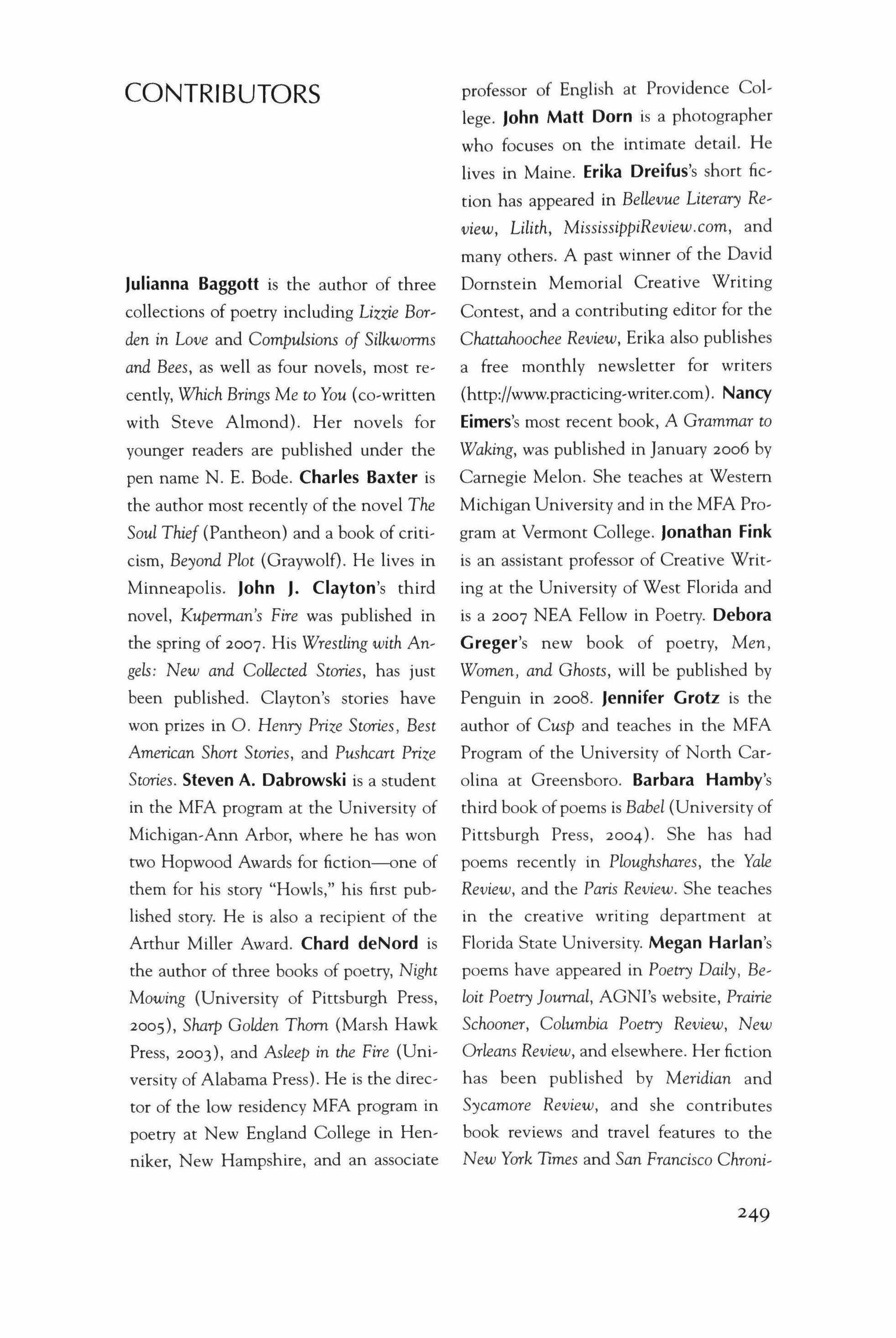
Julianna Baggott is the author of three collections of poetry including Lizzie Borden in Love and Compulsions of Silkworms and Bees, as well as four novels, most recently, Which Brings Me to You (co-written with Steve Almond). Her novels for younger readers are published under the pen name N. E. Bode. Charles Baxter is the author most recently of the novel The Soul Thief (Pantheon) and a book of criticism, Beyond Plot (Graywolf). He lives in Minneapolis. John J. Clayton's third novel, Kuperman's Fire was published in the spring of 2007. His Wrestling with Angels: New and Collected Stories, has just been published. Clayton's stories have won prizes in O. Henry Prize Stories, Best American Short Stories, and Pushcart Prize Stories. Steven A. Dabrowski is a student in the MFA program at the University of Michigan-Ann Arbor, where he has won two Hopwood Awards for fiction-one of them for his story "Howls," his first published story. He is also a recipient of the Arthur Miller Award. Chard deNord is the author of three books of poetry, Night Mowing (Universitv of Pittsburgh Press, 2005), Sharp Golden Thorn (Marsh Hawk Press, 2003), and Asleep in the Fire (University of Alabama Press). He is the director of the low residency MFA program in poetry at New England College in Henniker, New Hampshire, and an associate
professor of English at Providence College. John Matt Dorn is a photographer who focuses on the intimate detail. He lives in Maine. Erika Dreifus's short fiction has appeared in Bellevue Literary Review, Lilith, MississippiReview.com, and many others. A past winner of the David Dornstein Memorial Creative Writing Contest, and a contributing editor for the Chattahoochee Review, Erika also publishes a free monthly newsletter for writers (http://www.practicing-writer.com) Nancy Eimers's most recent book, A Grammar to Waking, was published in January 2006 by Carnegie Melon. She teaches at Western Michigan University and in the MFA Program at Vermont College. Jonathan Fink is an assistant professor of Creative Writing at the University of West Florida and is a 2007 NEA Fellow in Poetry. Debora Greger's new book of poetry, Men, Women, and Ghosts, will be published by Penguin in 2008. Jennifer Grotz is the author of Cusp and teaches in the MFA Program of the University of North Carolina at Greensboro. Barbara Hamby's third book of poems is Babel (University of Pittsburgh Press, 2004). She has had poems recently in Ploughshares, the Yale Review, and the Paris Review. She teaches in the creative writing department at Florida State University. Megan Harlan's poems have appeared in Poetry Daily, Beloit Poetry Journal, AGNl's website, Prairie Schooner, Columbia Poetry Review, New Orleans Review, and elsewhere. Her fiction has been published by Meridian and Sycamore Review, and she contributes book reviews and travel features to the New York Times and San Francisco Chroni-
CONTRIBUTORS
249
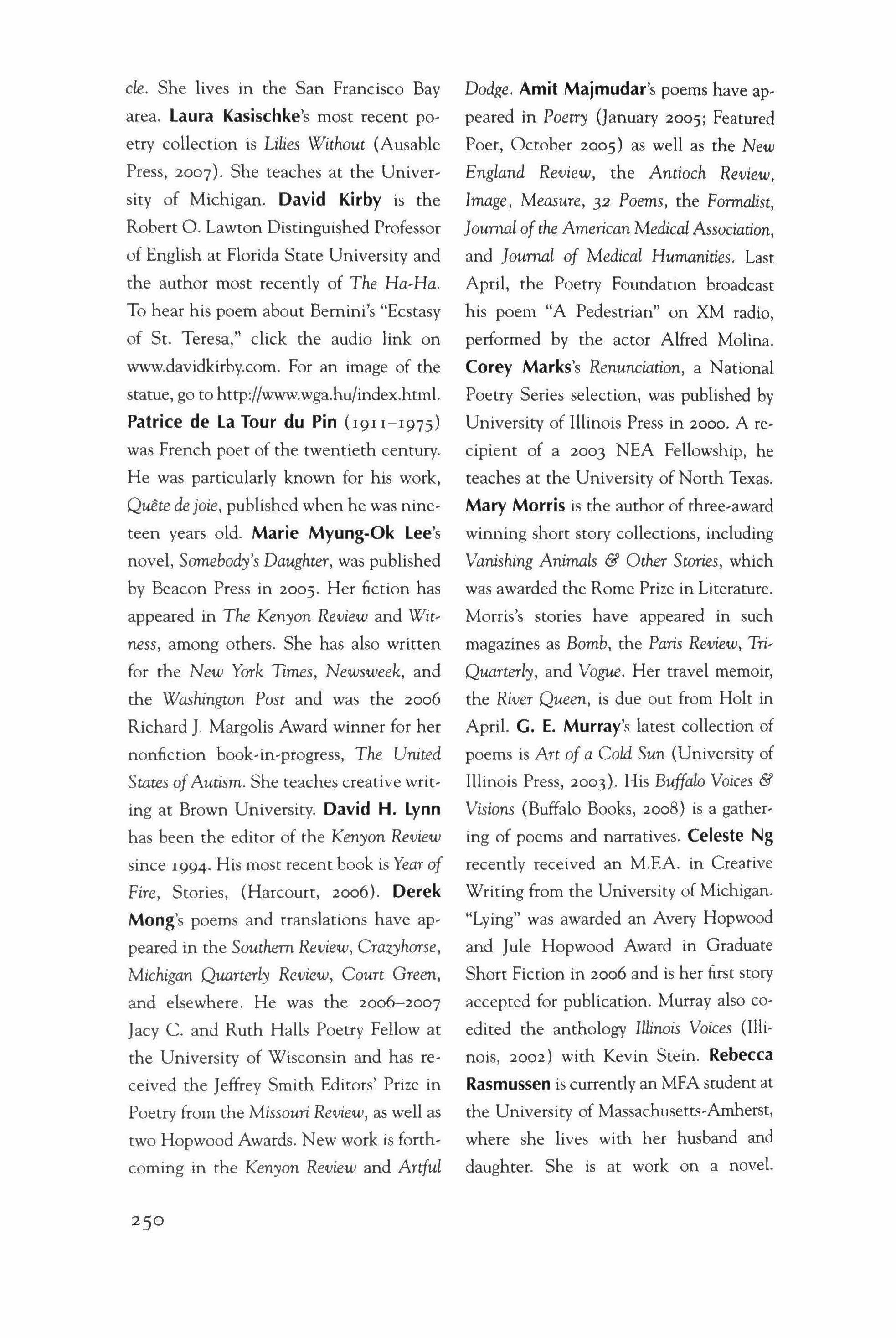
ele. She lives in the San Francisco Bay area. Laura Kasischke's most recent poetry collection is Lilies Without (Ausable Press, 2007). She teaches at the University of Michigan. David Kirby is the Robert O. Lawton Distinguished Professor of English at Florida State University and the author most recently of The Ha-Ha. To hear his poem about Bernini's "Ecstasy of St. Teresa," click the audio link on www.davidkirby.com. For an image of the statue, go to http://www.wga.hu/index.html. Patrice de La Tour du Pin (1911-1975) was French poet of the twentieth century. He was particularly known for his work, Quete dejoie, published when he was nineteen years old. Marie Myung-Ok Lee's novel, Somebody's Daughter, was published by Beacon Press in 2005. Her fiction has appeared in The Kenyon Review and Witness, among others. She has also written for the New York Times, Newsweek, and the Washington Post and was the 2006 Richard J. Margolis Award winner for her nonfiction book-in-progress, The United States ofAutism. She teaches creative writing at Brown University. David H. Lynn has been the editor of the Kenyon Review since 1994. His most recent book is Year of Fire, Stories, (Harcourt, 2006). Derek Mong's poems and translations have appeared in the Southern Review, Crazyhorse, Michigan Quarterly Review, Court Green, and elsewhere. He was the 2006-2007 Jacy C. and Ruth Halls Poetry Fellow at the University of Wisconsin and has received the Jeffrey Smith Editors' Prize in Poetry from the Missouri Review, as well as two Hopwood Awards. New work is forthcoming in the Kenyon Review and Artful
Dodge. Amit Majmudar's poems have appeared in Poetry (January 2005; Featured Poet, October 2005) as well as the New England Review, the Antioch Review, Image, Measure, 32 Poems, the Formalist, Journal ofthe American Medical Association, and Journal of Medical Humanities. Last April, the Poetry Foundation broadcast his poem "A Pedestrian" on XM radio, performed by the actor Alfred Molina. Corey Marks's Renunciation, a National Poetry Series selection, was published by University of Illinois Press in 2000. A recipient of a 2003 NEA Fellowship, he teaches at the University of North Texas. Mary Morris is the author of three-award winning short story collections, including Vanishing Animals & Other Stories, which was awarded the Rome Prize in Literature. Morris's stories have appeared in such magazines as Bomb, the Paris Review, TriQuarterly, and Vogue. Her travel memoir, the River Queen, is due out from Holt in April. G. E. Murray's latest collection of poems is Art of a Cold Sun (University of Illinois Press, 2003). His Buffalo Voices & Visions (Buffalo Books, 2008) is a gathering of poems and narratives. Celeste Ng recently received an M.EA. in Creative Writing from the University of Michigan.
"Lying" was awarded an Avery Hopwood and jule Hopwood Award in Graduate Short Fiction in 2006 and is her first story accepted for publication. Murray also coedited the anthology Illinois Voices (Illinois, 2002) with Kevin Stein. Rebecca Rasmussen is currently an MFA student at the University of Massachusetts-Amherst, where she lives with her husband and daughter. She is at work on a novel.
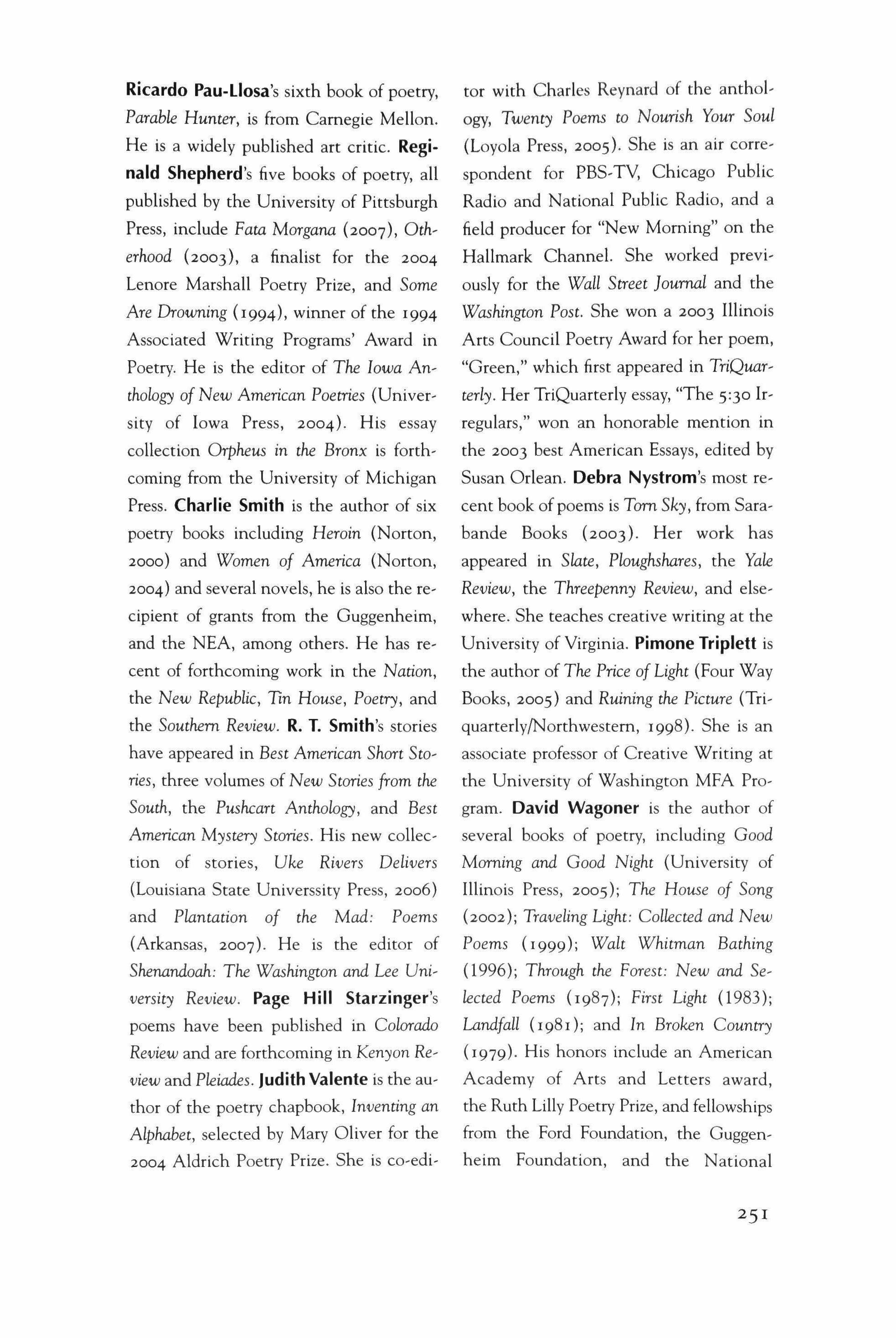
Ricardo Pau-L1osa's sixth book of poetry, Parable Hunter, is from Carnegie Mellon. He is a widely published art critic. Reginald Shepherd's five books of poetry, all published by the University of Pittsburgh Press, include Fata Morgana (2007), Otherhood (2003), a finalist for the 2004 Lenore Marshall Poetry Prize, and Some Are Drowning (1994), winner of the 1994 Associated Writing Programs' Award in Poetry. He is the editor of The Iowa Anthology of New American Poetries (University of Iowa Press, 2004). His essay collection Orpheus in the Bronx is forthcoming from the University of Michigan Press. Charlie Smith is the author of six poetry books including Heroin (Norton, 2000) and Women of America (Norton, 2004) and several novels, he is also the recipient of grants from the Guggenheim, and the NEA, among others. He has recent of forthcoming work in the Nation, the New Republic, Tin House, Poetry, and the Southern Review. R. T. Smith's stories have appeared in Best American Short Stories, three volumes of New Stories from the South, the Pushcart Anthology, and Best American Mystery Stories. His new collection of stories, Uke Rivers Delivers (Louisiana State Universsity Press, 2006) and Plantation of the Mad: Poems (Arkansas, 2007). He is the editor of Shenandoah: The Washington and Lee University Review. Page Hill Starzinger's poems have been published in Colorado Review and are forthcoming in Kenyon Review and Pleiades. Judith Valente is the author of the poetry chapbook, Inventing an Alphabet, selected by Mary Oliver for the 2004 Aldrich Poetry Prize. She is co-edi-
tor with Charles Reynard of the anthology, Twenty Poems to Nourish Your Soul (Loyola Press, 2005). She is an air correspondent for PBS-TV, Chicago Public Radio and National Public Radio, and a field producer for "New Morning" on the Hallmark Channel. She worked previously for the Wall Street Journal and the Washington Post. She won a 2003 Illinois Arts Council Poetry Award for her poem, "Green," which first appeared in TriQuarterly. Her TriQuarterly essay, "The 5:30 Irregulars," won an honorable mention in the 2003 best American Essays, edited by Susan Orlean. Debra Nystrom's most recent book of poems is Torn Sky, from Sarabande Books (2003). Her work has appeared in Slate, Ploughshares, the Yale Review, the Threepenny Review, and elsewhere. She teaches creative writing at the University of Virginia. Pimone Triplett is the author of The Price ofLight (Four Way Books, 2005) and Ruining the Picture (Triquarterly/Northwestern, 1998). She is an associate professor of Creative Writing at the University of Washington MFA Program. David Wagoner is the author of several books of poetry, including Good Morning and Good Night (University of Illinois Press, 2005); The House of Song (2002); Traveling Light: Collected and New Poems (1999); Walt Whitman Bathing (1996); Through the Forest: New and Selected Poems (1987); First Light (1983); Landfall (1981); and In Broken Country (1979). His honors include an American Academy of Arts and Letters award, the Ruth Lilly Poetry Prize, and fellowships from the Ford Foundation, the Guggenheim Foundation, and the National
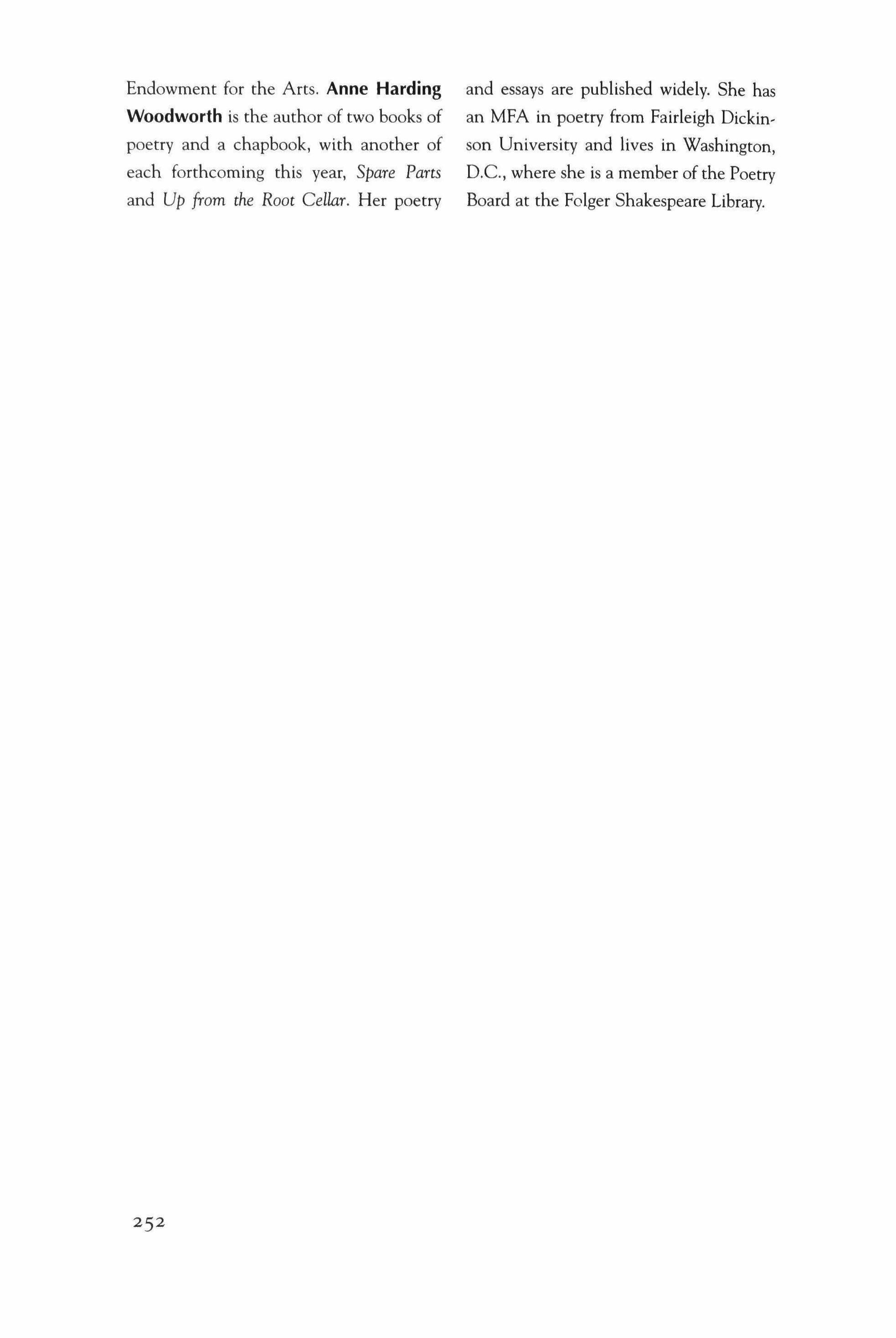
Endowment for the Arts. Anne Harding Woodworth is the author of two books of poetry and a chapbook, with another of each forthcoming this year, Spare Parts and Up from the Root Cellar. Her poetry and essays are published widely. She has an MFA in poetry from Fairleigh Dickinson University and lives in Washington, D.C., where she is a member of the Poetry Board at the Folger Shakespeare Library.
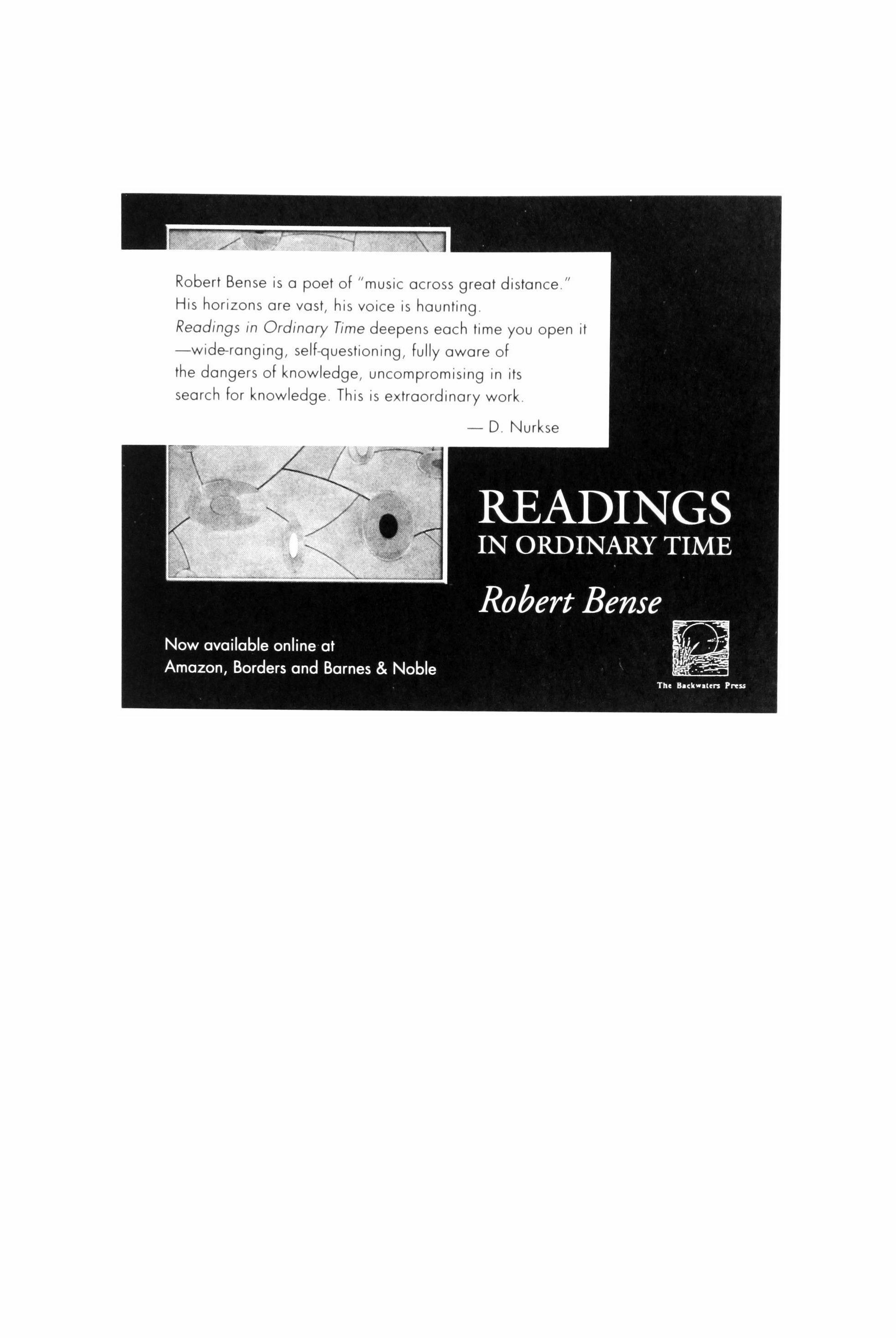
Robert Bense is a poet of "music across great distance." His horizons are vast, his voice is haunting.
Readings in Ordinary Time deepens each time you open it -wide-ranging, self-questioning, fully aware of the dangers of knowledge, uncompromising in its search for knowledge This is extraordinary work.
Subscriptions
Three issues per year. Individuals: one year $24; two years $44; life $600. Institutions: one year $36; two years $68. Overseas: $5 per year additional. Price of back issues varies. Sample copies $5. Address correspondence and subscriptions to TriQuarterly, Northwestern University, 629 Noyes St., Evanston, IL 60208-4210. Phone (847) 491-7614.
Submissions
The editors invite submissions of fiction, poetry and literary essays, which must be postmarked between October 1 and March 31; manuscripts postmarked between April 1 and September 30 will not be read. No manuscripts will be returned unless accompanied by a stamped, self-addressed envelope. All manuscripts accepted for publication become the property of TriQuarterly, unless otherwise indicated.
Reprints
Reprints of issues 1 - 1 7 of TriQuarrerly are available in full format from Kraus Reprint Company, Route 100, Millwood, NY 10546, and all issues in microfilm from Universiry Microfilms International, 300 North Zeeb Road, Ann Arbor, MI 48106.
Indexing
TriQuarrerly is indexed in the Humanities Index (H. W. Wilson Co.), the American Humanities Index (Whitson Publishing Co.), Historical Abstracts, MLA, EBSCO Publishing (Peabody, MA) and Information Access Co. (Foster Ciry, CAl.
Distributors
Our national distributors to retail trade are Ingram Periodicals (La Vergne, TN); B. DeBoer (Nutley, NJ); Ubiquity (Brooklyn, NY); Armadillo (Los Angeles, CAl.
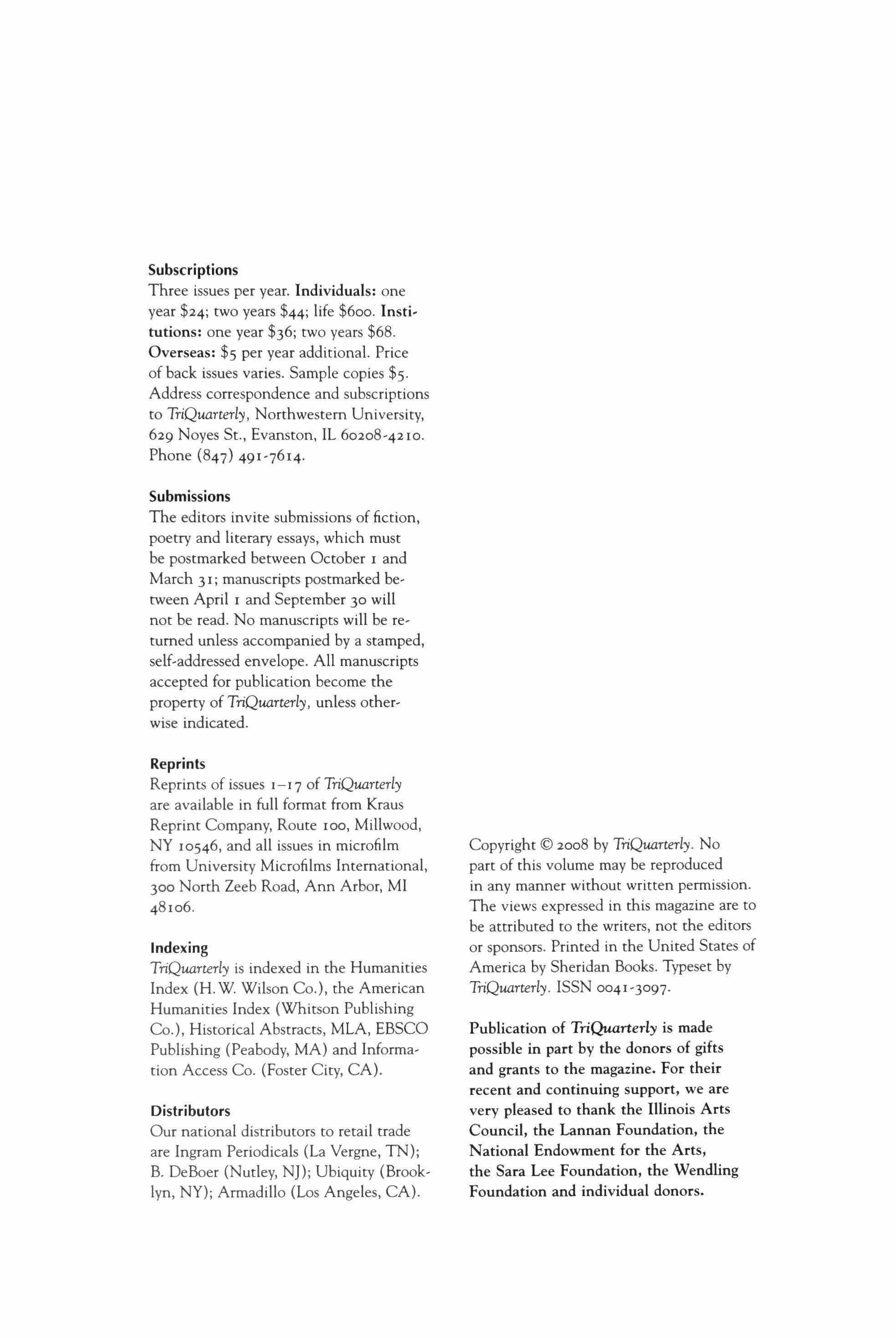
Copyright © 2008 by TriQuarrerly. No part of this volume may be reproduced in any manner without written permission. The views expressed in this magazine are to be attributed to the writers, not the editors or sponsors. Printed in the United States of America by Sheridan Books. Typeset by TriQuarrerly. ISSN 0041-3097.
Publication of TriQuarterly is made possible in part by the donors of gifts and grants to the magazine. For their recent and continuing support, we are very pleased to thank the Illinois Arts Council, the Lannan Foundation, the National Endowment for the Arts, the Sara Lee Foundation, the Wendling Foundation and individual donors.
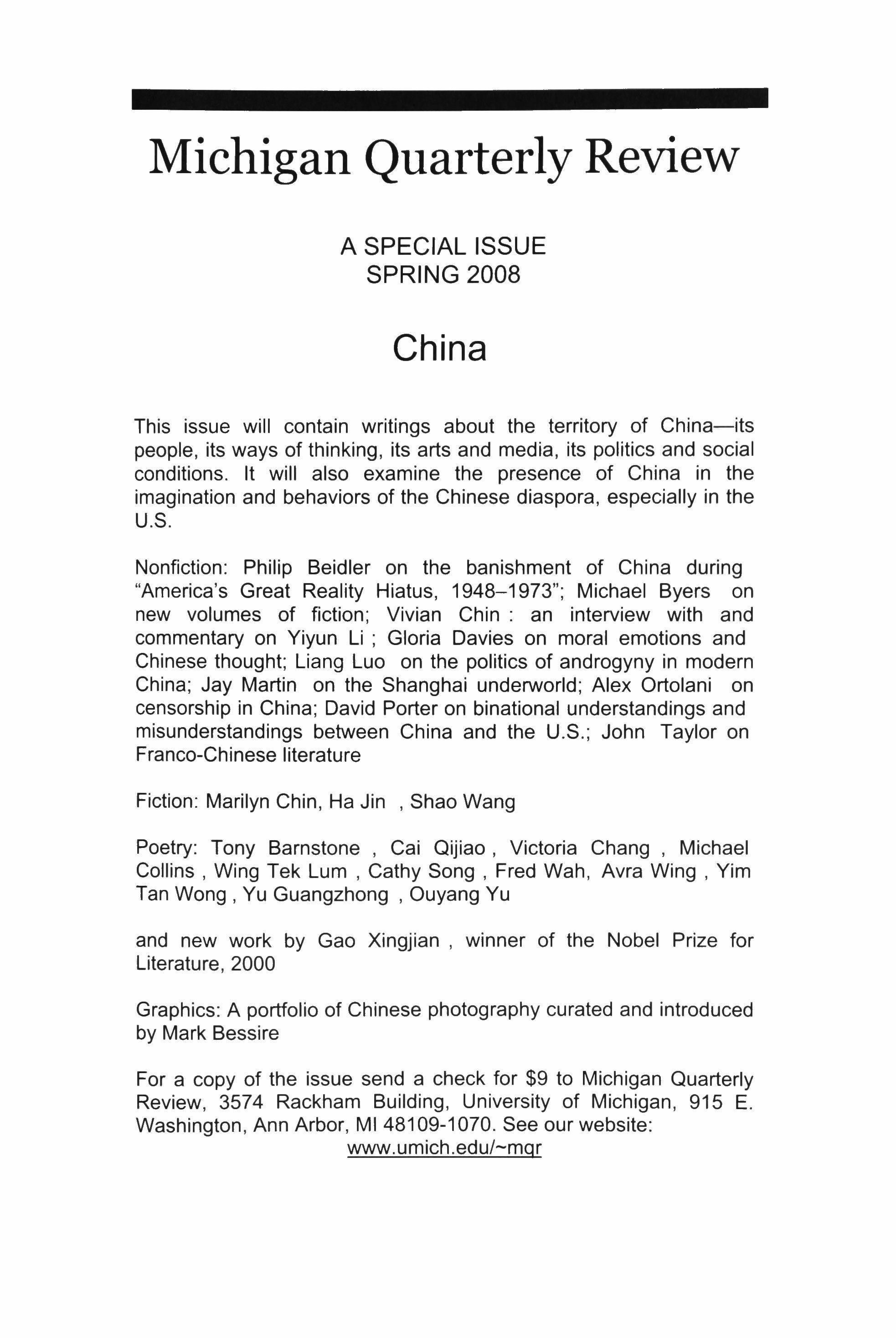
Michigan Quarterly Review
A SPECIAL ISSUE SPRING 2008
China
This issue will contain writings about the territory of China-its people, its ways of thinking, its arts and media, its politics and social conditions. It will also examine the presence of China in the imagination and behaviors of the Chinese diaspora, especially in the U.S.
Nonfiction: Philip Beidler on the banishment of China during "America's Great Reality Hiatus, 1948-1973"; Michael Byers on new volumes of fiction; Vivian Chin: an interview with and commentary on Yiyun Li ; Gloria Davies on moral emotions and Chinese thought; Liang Luo on the politics of androgyny in modern China; Jay Martin on the Shanghai underworld; Alex Ortolani on censorship in China; David Porter on binational understandings and misunderstandings between China and the U.S.; John Taylor on Franco-Chinese literature
Fiction: Marilyn Chin, Ha Jin ,Shao Wang
Poetry: Tony Barnstone Cai Qijiao, Victoria Chang, Michael Collins, Wing Tek Lum Cathy Song, Fred Wah, Avra Wing, Vim Tan Wong, Yu Guangzhong Ouyang Yu
and new work by Gao Xingjian winner of the Nobel Prize for Literature, 2000
Graphics: A portfolio of Chinese photography curated and introduced by Mark Bessire
For a copy of the issue send a check for $9 to Michigan Quarterly Review, 3574 Rackham Building, University of Michigan, 915 E. Washington, Ann Arbor, MI48109-1070. See our website: www.umich.edu/-mqr

A QUARTERLY REVIEW ofFiction, Poetry, Essays, and Art, since 1959
M\? u.n. �� �LUU 4' the MASSACHUSETTS REVIEW
massrev@externa1.umass.edu I www.massreview.org

DAVID KIRBY
CHARLES BAXTER
DAVID H. LYNN
MARIE MYUNG-OK LEE
BARBARA HAMBY
MARY MORRIS
DEBORA GREGER

STEVrN A. DABRO
CrUST[ NG
NANCY EIMERS
CHARD DENIORD
LAURA Kxs: CHKE
DEREK MONG
JUDITH VALENTE
REGINALD SHEPHERD DEBRA Nv TROM
AMIT MAJMUDAR
PAGE HILL STARZINGER
RICARDO PAu-lLOSA
JULIANNA BAGGOTI
G. E. MURRAY
JOHN J. CLAYTON
ERIKA DREIFUS
DAVID WAGONER
CHARLIE SMITH
PIMONl: TRIPLElT
PATRICE DE LA TOUR DU PIN Ml:GAN HARLAN
TRANSLATED FROM TH E JONATHAN FINK
FRENCH BY JENNIfI R GROrZ COREY MARKS
R T. SMITH
REBECCA RAsMUSSEN
�� 'i� ::r�l� 'I ;g�;�':;"'\;,1 � �, � .'��£ :' �




































































































 For Richard Wilbur
For Richard Wilbur




























































































































 I. Vitruvian Man
I. Vitruvian Man

































